eru8tateCollege
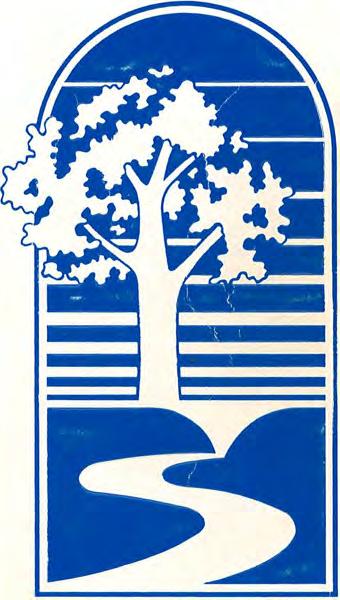
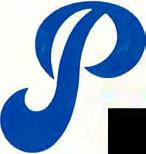
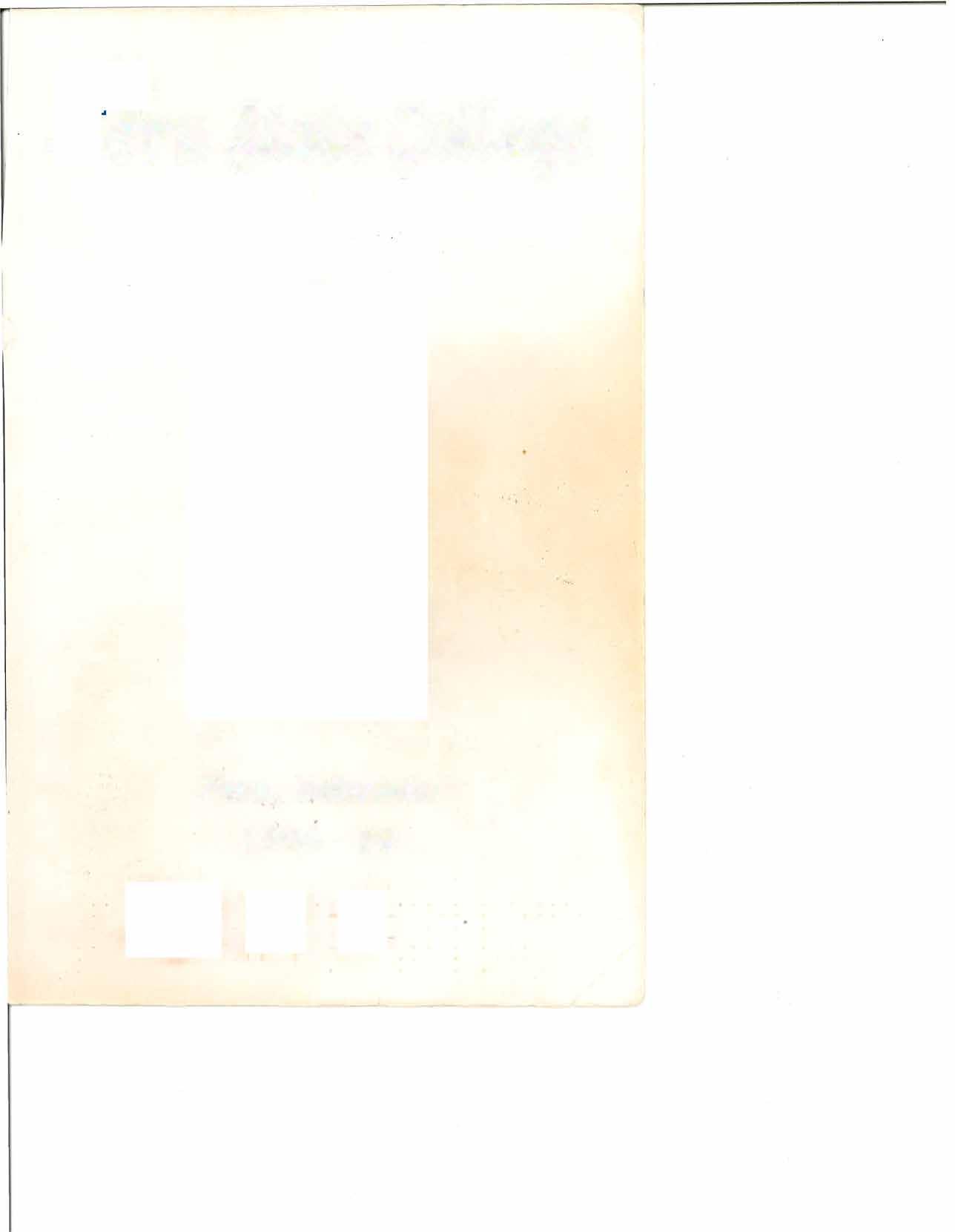
1994
Peru, Nebraska
- 96
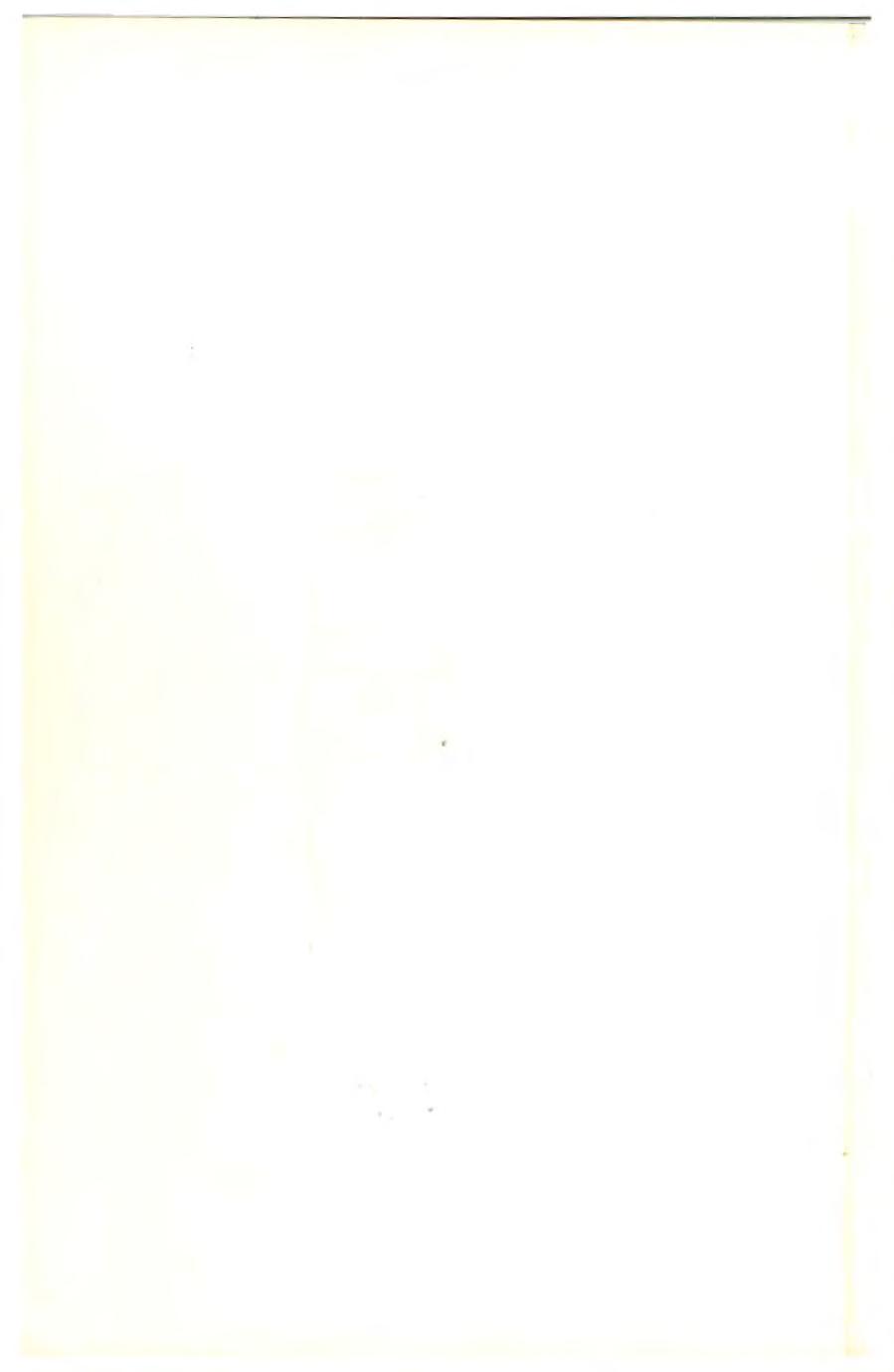
Information about student retention and completion as required by the Higher Education Amendments of 1976 is available through the Office of Student Affairs.
No person attending Peru State College shall, on the grounds of race, color, national origin, handicap, or gender, be excluded from participation in, be denied of, or be subjected to discrimination und er any program or activity receiving federal financial assistance. Inquiries regarding these matters should be directed to the Vice President for Administration and Finance.
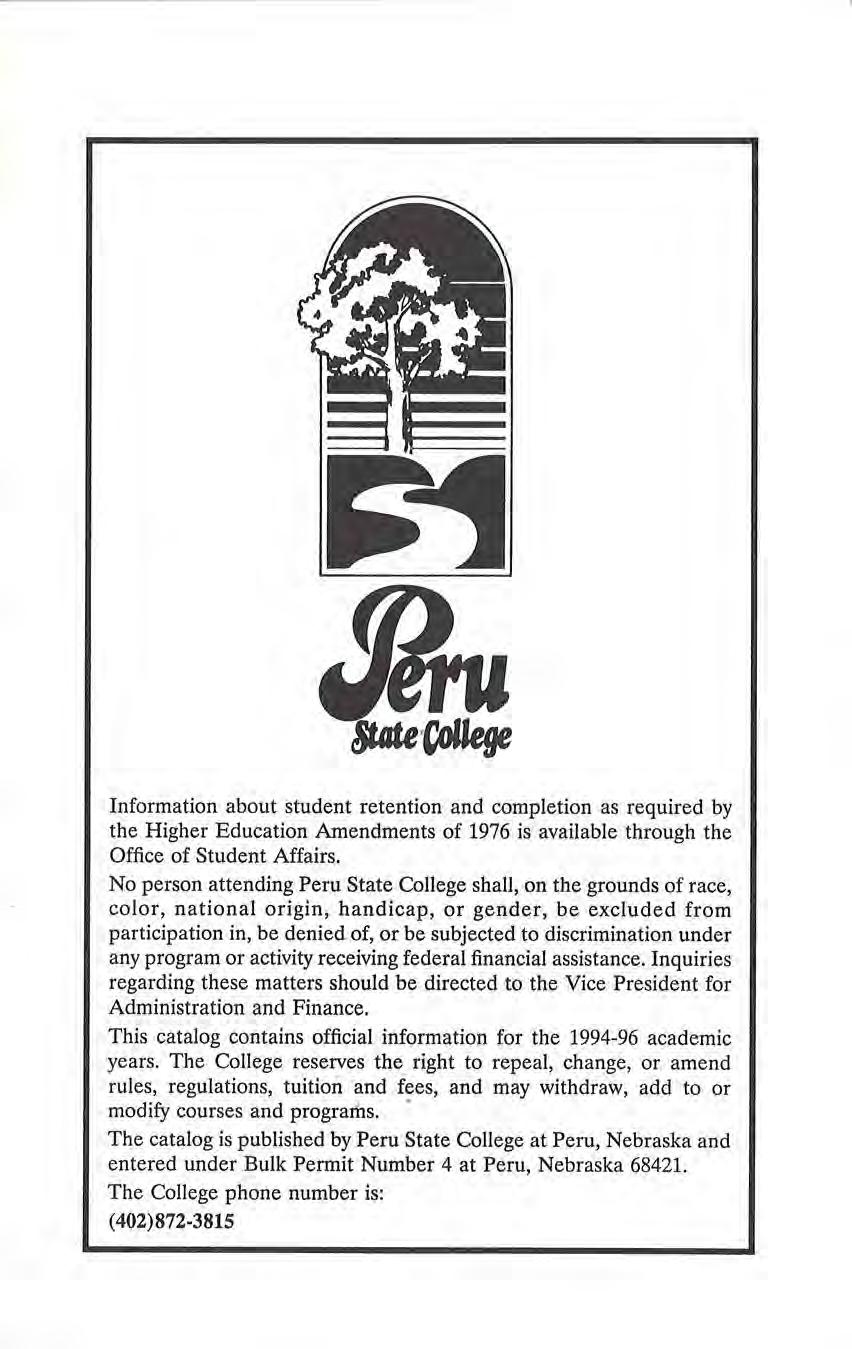
This catalog contains official information for t h e 1994-96 academic years. The College reserves the r ight to repeal, change, or amend rules, regulations, tuition and fees, and may withdraw, add to or modify courses and programs. •
The catalog is published by Peru State College at Peru, Nebraska and entered under Bulk Permit Number 4 at Peru, Nebraska 68421.
The College phone number is:
(402) 872-3815
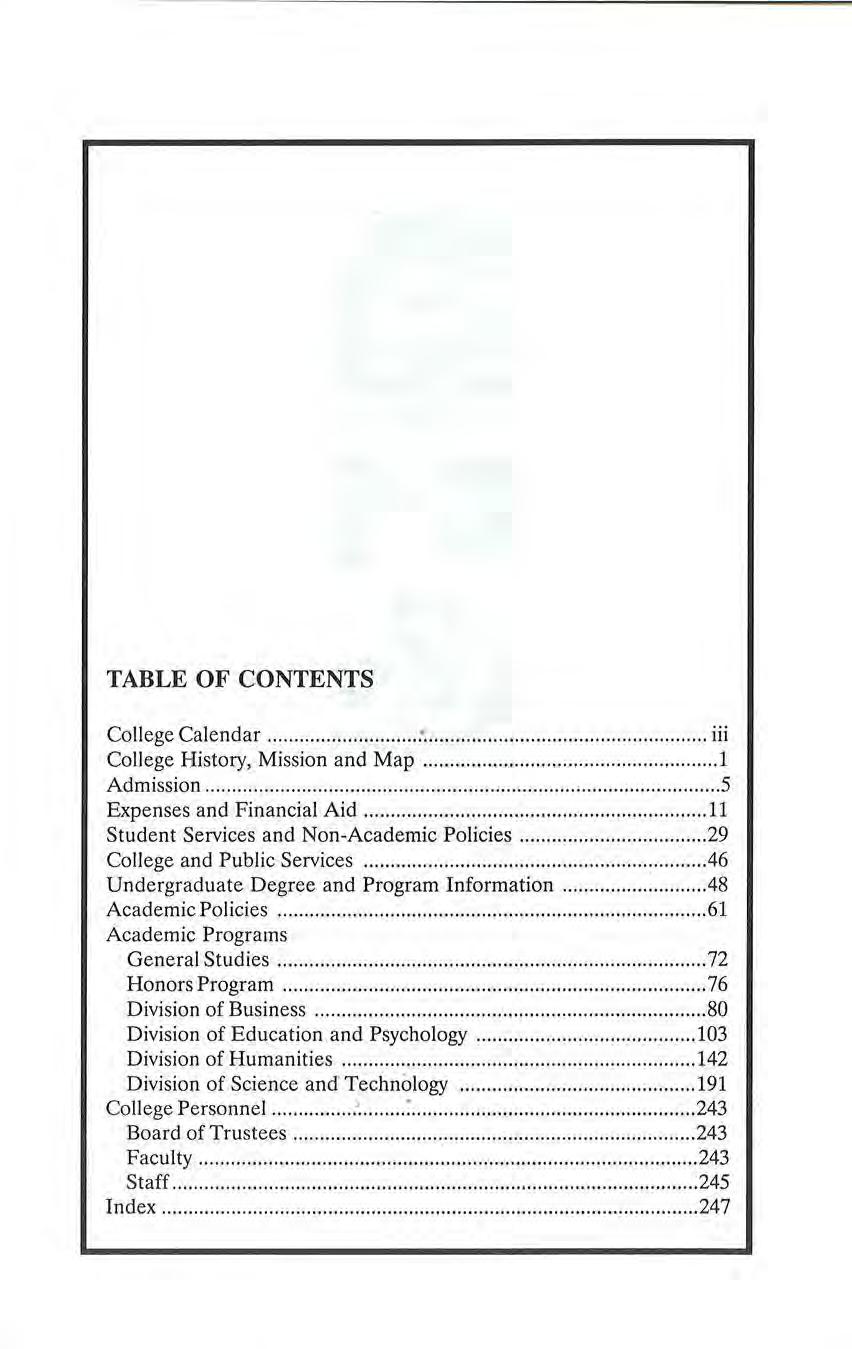
TABLE OF CONTENTS College Calendar ' iii College History, Mission and Map ....... .. .. . ... .. .. . ....... .. . ... ........ . ........ .... . 1 Admission 5 Expenses and Financial Aid ...................... ...... .................................... 11 Student Services and Non-Academic Policies 29 College and Public Services ....... . .. . .... . ...... .. ............ ..... ...................... .46 Undergraduate Deg ree and P rogram Information .48 Academ ic Policies ... ..... . .... ........ ........ . .. ... .. ..... .... .. . .... ... . ...... ... ....... .. .. . .. 61 Academ ic Programs General Studies 72 H onors Program 76 Division of B usiness 80 Division of Education and Psyc hol ogy ............ ... ....... ... .. .. ..... .... . .. 103 Division of Humanities 142 Division of Science and Technology ............................................ 191 College Personnel .... . .. .. ... ... .'.. .. .... .:.... ....... ... .. .. . .. ... ... ...... .. ... ... .. . .. .. . ....243 Board of Trustees 243 Faculty ......... .... .. . ........................................... ...... ....... ... ................ ..243 Staff ... .. .. ........ .... ....... .. ... . .. . .... ..... .. ......... .. .. . ...... ... .............................2 45 Index ............. .. .............................. .. .. ... .................. .. .... . ...... .............. ... 247
1994-1 995 ACADEMJC CALENDAR
FALL SEMESTER 1994
Freshman Welcome and Orieniation
Registration ( late rcgi~tration after this date)
Evening C lasses Begin (after 5:00 p.m)
Day Classes Begin
Tuition and Fee Payment
Labor Day Holiday ( no classes-offices closed)
Classes Resume
Last Day to Add/Drop
Applications for Mid-Year Certification of Completion Due
St udent Teacher Appliaations Due for Fall 1995
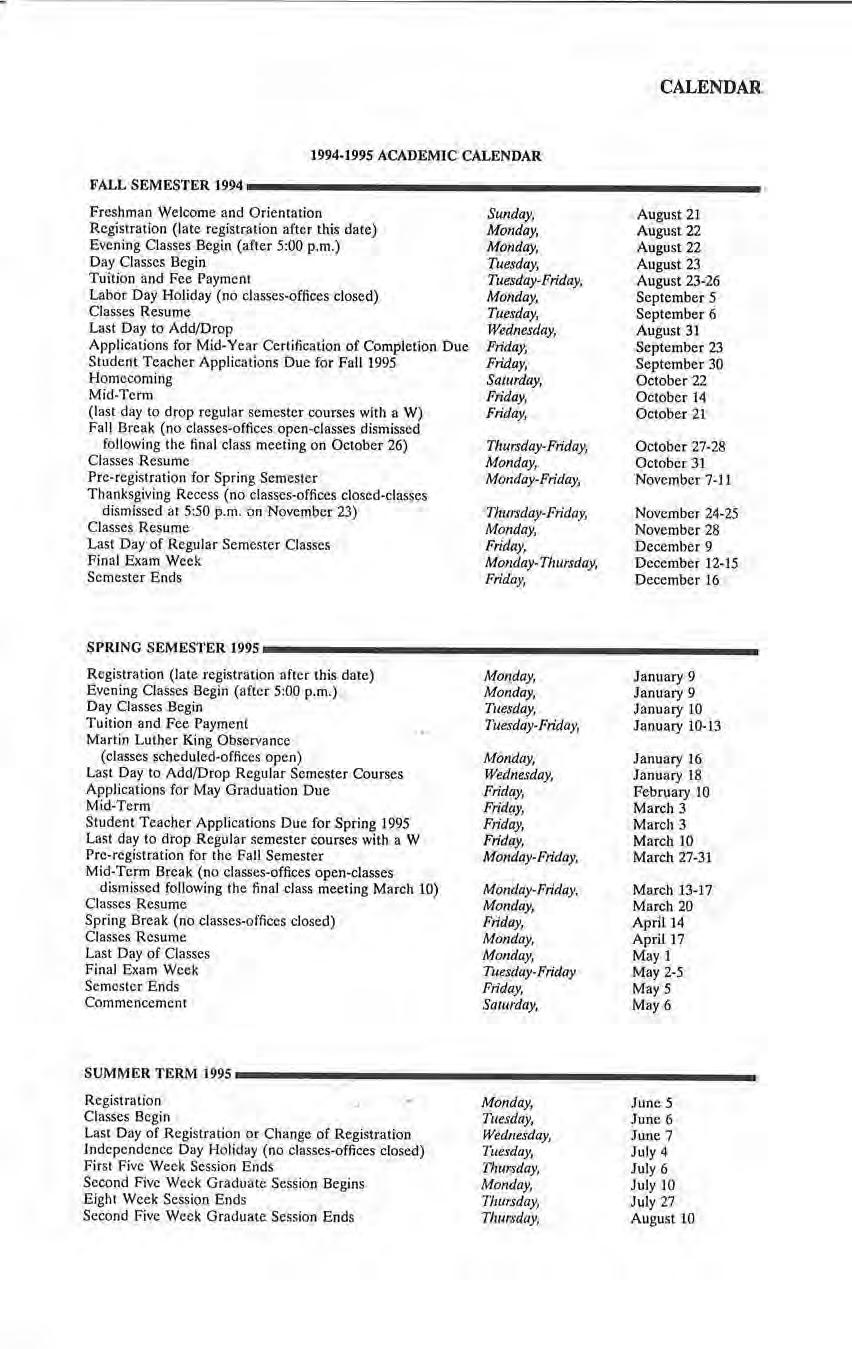
H omecoming
Mid-Tenn
(last day to drop regular semester courses with a W)
Fa ll Break (no classes-offices open-classes dismissed following the ijnal class meeting on October 26)
Classes Resume
Pre-reg istration for Spring Semester
Thanksgiving Recess (no classes-offices closed-classes dismi ssed at 5:50 p.m. on November 23)
Classes Resume
Last Day of Regular Semester Classes
Pinal Exam Weck
Semester E nds
SPRING SEMESTER 1995
Registration (late registrat ion nfter this date)
Evening C lasses Begin (after 5:00 p m.)
Day Classes Begin
Tuition and Fee l'ayment
Martin Luther King Observance {classes scheduled-offices open)
Last Day to Add/Drop Regu lar Semester Courses
Applications for May Graduation Due
Mid-Term
Student Teacher Applicat ions Due for Spring 1995
Lost day to drop Regular semester courses with a W
Pre-registration for the Fall Semester
Mid-Term Break (no classes-offices open-classes dismissed following the final class meeting March 10)
Classes Resume
Spring Break (no classes-offices closed)
Classes Resume
Last Day of Classes
Final Exam Week
Semester Ends Commencement
Sw1day, Monday, Monday, Tuesday, Tuesday-Friday, Monday, · Tuesday, Wednesday, Friday, Friday, Saturdtly, Friday, Friday, Th ursday-Friday, Monday, Monday-Friday, Tl111rsday-Friday, Monday, Friday, Monday- 11111,sday, Friday,
August 21
August 22
August 22
August 23
August 23-26
September 5
September 6
August 31
September 23
September 30
October22
October 14
October 21
October 27-28
October JI
November 7-11
November 24-25
November 28
December 9
December 12-15
December 16
Monday, Monday, Tuesday, Tuesday-Friday, Monday, Wednesday, Friday, Friday, Fn"day, Friday, Monday-Friday, Monday-Friday, Monday, Friday, Monday, Monday, Tuesday-Friday Friday, Saturday,
January 9
January 9
January 10
January 10-13
January 16
January 18
February 10
March 3
March 3
March to
March 27-31
Murel, 13-17
March 20
Aprll 14
April 17
May l
May 2-5
May 5
May6
SUMMER TERM t.99s------------------------
Reg istration
Classes Begin
Last Day of Registration or Change of Reg istration
Independence Day Holiday (no classes-of/ices closed)
F irst Five Weck Session Ends
Second F ive Weck Graduate Session Begins
Eig ht Week Session Ends
Second Five Weck Graduate Session Ends
Monday, Tuesday, Wed11esday, Tuesday, T1111rsday, Monday, 11wrsday, Thursday,
June5
June 6
June 7
J uly 4
July 6
July JO
July 27
Augu~t 10
CALENDAR
________________________
CALENDAR
199S - 1996 ACADEM IC CALEN DAR
FALL SEMESTER 199s------------------------
Freshman Welcome & Orientation
Registration (late registration after this date)
Evening C lasses Begin (after 5:00 p.m.)
Day Classes Begin
T uition and Fee Paymen t
Labor Day Holiday (no classes-office closed)
Classes Resume
Last Day to Add/Drop
Applications for Mid -Year Certification of Compl etion Due
Student Teach e r Applications Due for Fall 1996
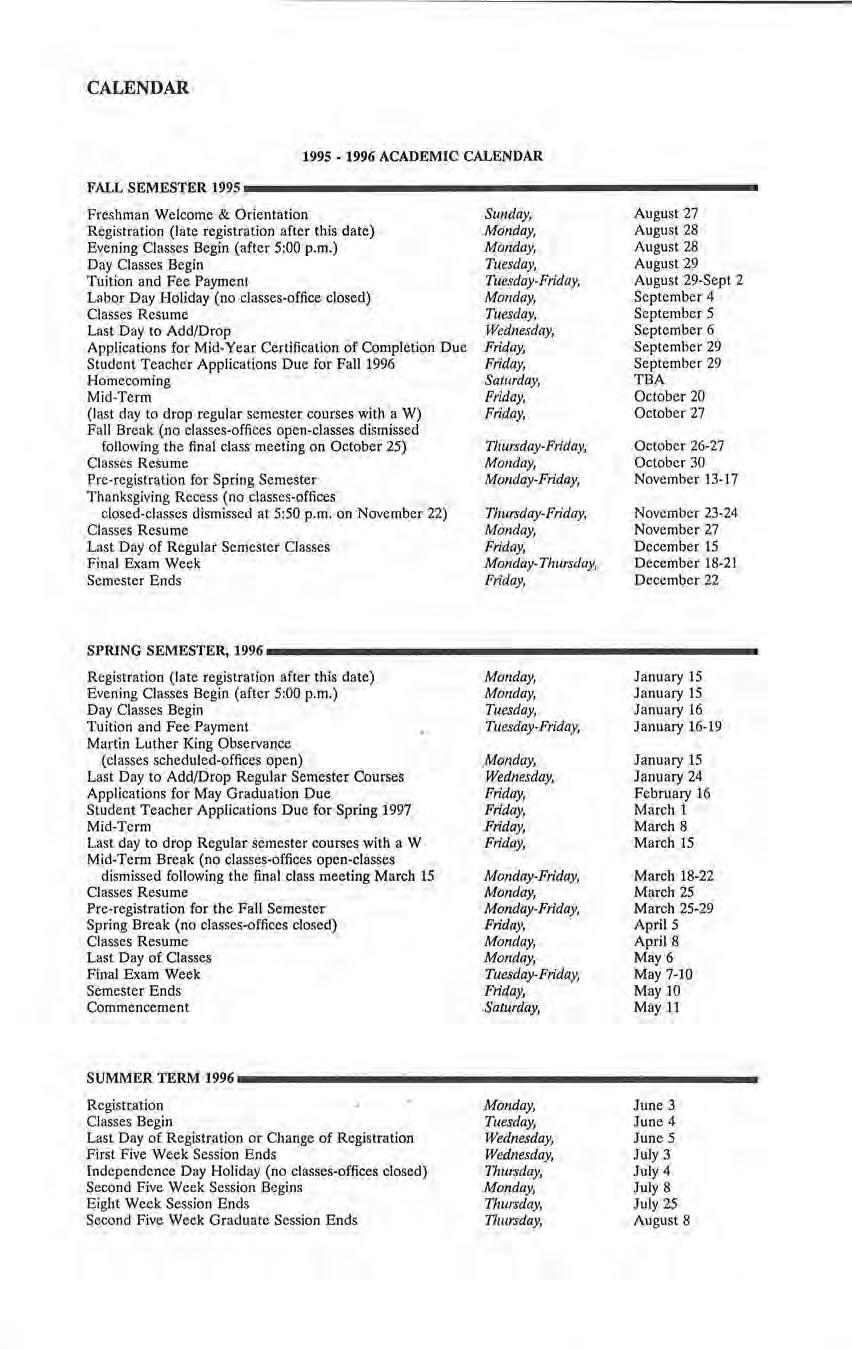
Homecoming
M id-Term
(last day to drop regular semester courses with a W)
Fall Break (no classes-offices open-classes d ismissed following the final class meeting on October 25)
Classes Resume
Pre-registration for Spriug Semester
Than ksgiving Recess (no c lasses-offices closed-classes dismissed at 5:50 p m on November 22)
Classes Resume
Last Day of Regular Semester Classes
Final Exam Week
Semester Ends
SPRI NG SEMESTER, 1996
R egistra tion (late registration ofter t hi s date) Evening Classes Begin (after 5:00 p.m.)
Day Classes Begin
Tuition and Fee Payment
Martin Luther King Observance (classes sche d uled-offices open)
Last Day to Add/Drop Regular Sem ester Courses
Applicat ions for May Graduation D ue
Student Teacher Applications Due for Spring 1997
Mid-Term
Last day to drop Regu lar semester courses with a W
Mid-Tenn Break (no classes-offices open-classes dism issed following t h e fin al class meeting March 15
Classes Resume
Pre-registration for the Fall Semester
Sprin g Break (no classes-offices closed)
Classes R esume
Last Day of Classes
F inal Exam Week
Semester Ends
Commenceme nt
S1111day, Monday, Monday, Tuesday, Tuesday-Friday, Monday, Tuesday, Wednesday, Fn'day, Friday, Satrirday, Friday, Friday, Thursday-Friday, Monday, Monday-Friday, Thursday-Friday, Monday, Friday, Monday-Thursday, Friday,
August 27
August 28
August 28
August 29
August 29-Sept 2
September 4
Sept ember 5
September 6
September 29
Sept embe r 29
TBA
October 20
October 27
October 26-27
October 30
Novembe r 13-17
November 13-24
November 27
December 15
De<:cmber 18-2J
December 22
Mo nday, Monday, Tu esday, T11esday-Frfday,
Mo nday, Wednesday, Friday, Friday, Friday, Friday, Monday"Friday, Monday, Monday-Friday, Friday,
Monday, Monday, Tuesday-Fliday, Friday, Sati,rday,
January 15
January IS
January 16
January 16-19
Janu<1ry 15
January 24
February 16
March 1
March 8
March 15
March 18-22
March 25
March 25-29
April 5
April 8
May6
May 7-10
May JO
May 11
S UMMER TERM 1996 ________________________
Registration
C lasses Beg in
Last Day of Registration or Change of Registrn tion
First Five Week Session Ends
Indepen dence Day Holi day (no classes-offices closed)
Secon d Five Week Session Begins
Eight Weck Session Ends
Second Five Week Graduate Session Ends
Monday, Tuesday, Wednesday, Wednesday, 71.ursday, Mor,day, Thursday, 11wrsday,
J une 3
Jun e 4
J une 5
July 3
July 4
July 8
July 25
August 8
________________________
AN INTRODUCTION TO PERU STATE COLLEGE
Peru State College was founded in 1867 as Nebraska's first college and was the third teacher educatio n institution established west of th e Missouri River. For more than a century, thousands of young people have crossed the Campus of a Thousand O aks to become teachers and leaders in Nebraska and throughout the nation.
The people of Nebraska have made the facilities of the College available to students at a minimum of personal cost. The ta>..'J)ayers of the state bear the major portion of the cost of ed ucating the College's students.
Peru State admits a ll graduates of accredited Nebraska high schools and qualified out-of-state students. The philosophy of the College is that each person is entitled to the opportunity to succeed at the collegiate level. All who have the ability and the willingness to work will have an excellent chance to succeed at P eru State.
The College believes in academ ic excellence, in opportunities for personal growth, and in student self-determination consistent with the principles of a democratic society. Administrative intent is to involve students in the decisions which affect them. The Coll ege's educational experience is design ed to enable students to learn, to equip themselves for mean ingful careers, and to be productive members of society. Peru State students have the opportunity to know their instructors well and to be working partners with the staff and other students. Living a nd working with other people offe rs many opportunities for friendship, growth, and personal development.

The College's faculty and staff are here to serve you. We welcome the oppo rtu n ity to assist you in realizing your personal, educational, and career objectives.
History
In 1867, the same year that N ebraska became a state, the new state' s legislature established a training school for teachers at Peru. Th e school actually began on December 2, 1865, when its predecessor, Mount Vernon College, was organized by a group of early settlers who resolved to place the school under the "care and management of the Methodist Episcopal Church."
Co lonel T.J. Majors, a leader during the Civil War and a state legislator, proposed that the school be made into a state university. Although the offer was rejected, the sta te legislature on June 20, 1867, did accept th e school as a "normal school" several months before the state university was established. For the next 38 years, the Peru school was the only teacher education institution in the state.
INTRODUCTION•·l
As Nebraska's population increased, the legislature extended the normal schools from a two-year to a four-year institution and authorized them to grant the degrees of Bachelor of Arts in Education, Bachelor of Science in Education, and Bachelor of Fine Arts in Education. At the same time, the name of the school was changed from State Normal School to State Teachers College. In 1963, Peru's name was changed to Peru State College. When the United States entered World War II, the College trained officers for the armed forces. The first unit of men in the Navy's V-12 program arrived on campus July 1, 1943. During that time nearly 500 servicemen received their training. The College operated an accelerated program for both civilian students and naval trainees. Since then, many of the trainees have used the hours of college credit they earned to complete their degrees at Peru State or other institutions of higher learning throughout the nation. In 1949, the legislature authorized the Nebraska State Colleges to confer the Bachelor of Arts degree. The Bachelor of Science degree was authorized in 1965. Emerging from its role as a single-purpose teachers college, the College is now a regional state college offering a wide variety of programs to meet the changing needs of southeast Nebraska and beyond.
Philosophy
Peru State College is committed to the belief that all persons are endowed with potential which, if developed, will benefit both the individual and the society. Each person, who is exposed to the influences of the College, is encouraged to develop his or her potential as well as understand and appreciate the contributions of others.
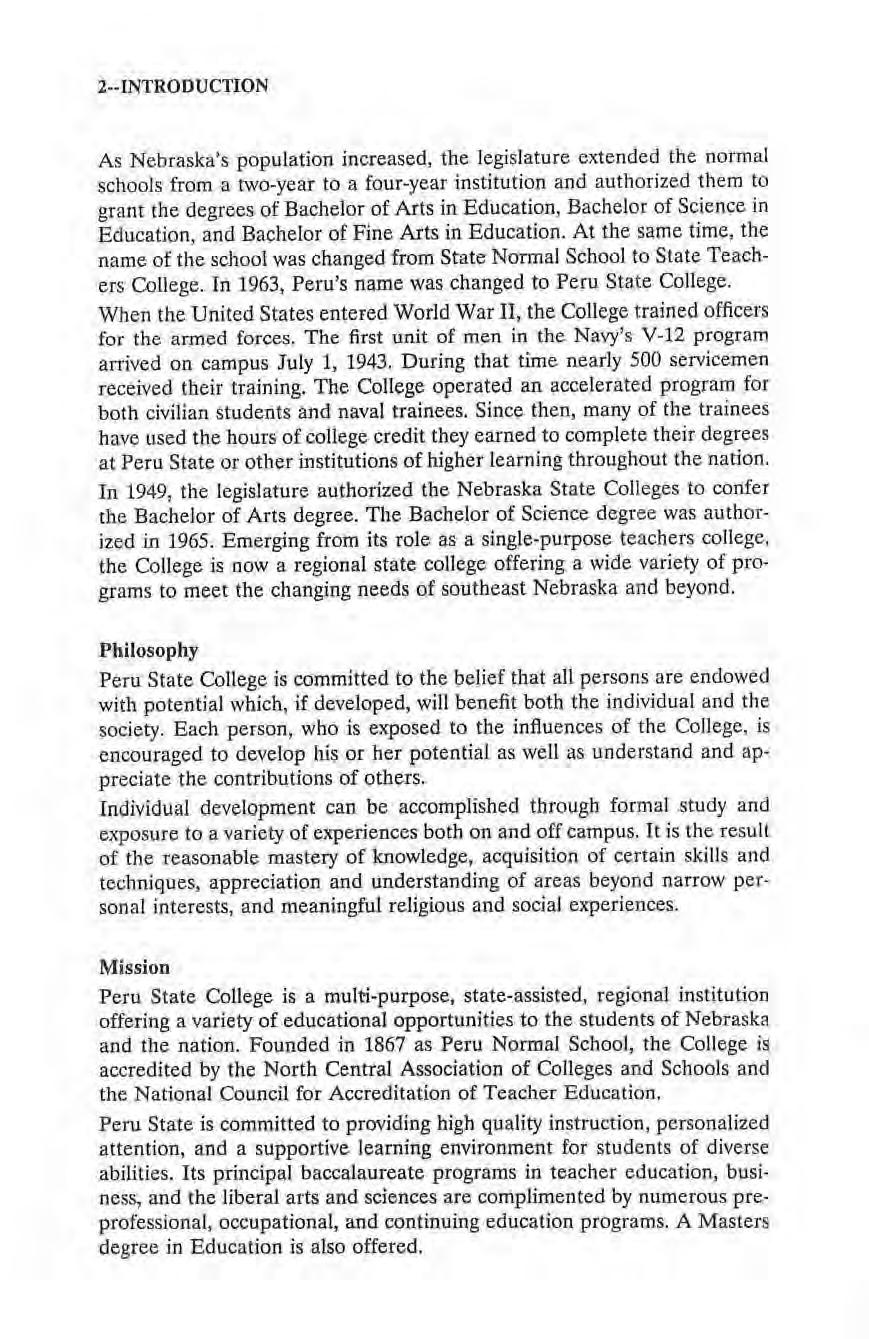
Individual development can be accomplished through formal study and exposure to a variety of experiences both on and off campus. It is the result of the reasonable mastery of knowledge, acquisition of certain skills and techniques, appreciation and understanding of areas beyond narrow personal interests, and meaningful religious and social experiences .
Mission
Peru State College is a multi-purpose, state-assisted, regional institution offering a variety of educational opportunities to t he sn1dents of Nebraska and the nation. Founded in 1867 as Peru Normal School, the College is accredited by the North Central Association of Colleges and Schools and the National Council for Accreditation o f Teacher Education.
Peru State is committed to providing high quality instruction, personalized attention, and a supportive learning environment for students of diverse abilities. Its principal baccalaureate programs in teacher education, business, and the liberal arts and sciences are complimented by numerous preprofessional, occupational, and continuing education programs. A Masters degree in Education is also offered.
2--INTRODUCTION
The College believes in a strong, coherent general education program designed to ensure that its graduates: I) can write, speak, and compute effectively, 2) are computer literate, 3) can think critically and independently, 4) are open to and have the capacity for change, 5) are prepared to assume their social and civic roles as leadei:s in an increasingly interdependent world, and 6) are equipped to pursue lives that are intellectually, et hically, aesthetically, and physically r ewarding.
Students are e ncouraged to participate in a balanced program of co-curricular activities. These group or individual activities include cultural, social, and physical pursuits which augment or support the instructional program, sustain tradition, and strengthen the college community.
The College is committed to continuing and enhancing its role as a center for regional development. Through its cultural, educational, research and public service efforts, Peru State assists other institutions and agencies in community and economic development for the benefit of all.
Goal s
In order to fulfill its mission, Peru State has established the following goals:
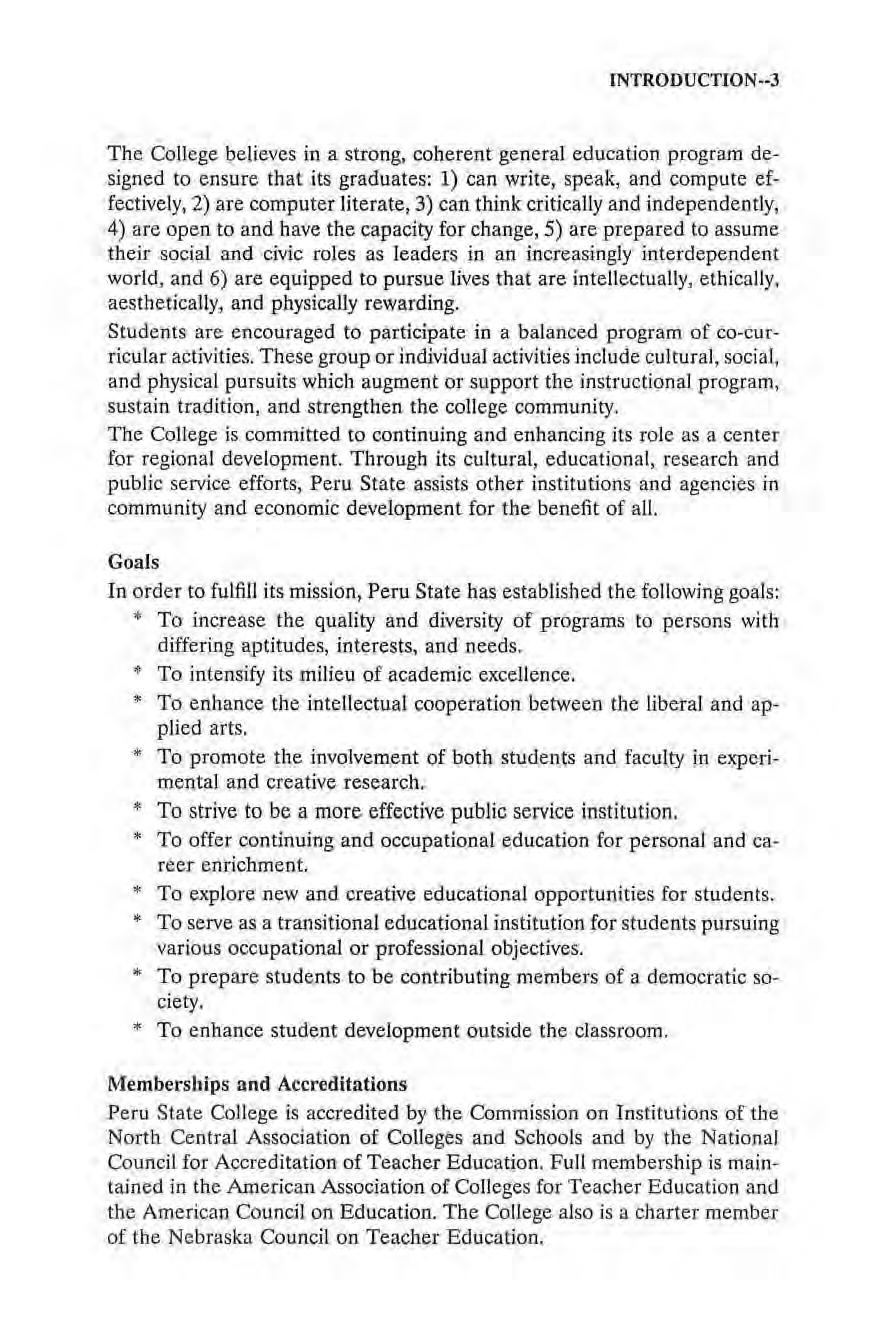
" To increase the quality and diversity of programs to persons with differing aptitudes, interests, an d needs.
* To intensify its milieu of academic excellence.
* To enhance the intellectual cooperation between the liberal and applied arts.
* To promote the involvement of both students and faculty in experimental and creative research.
* To strive to be a more effective public service institution.
* To offer continuing and occupational education for personal and career enrichment.
* To explore new and creative educational opportunities for students.
* To serve as a transitional educational institution for students pursuing various occupational or professional objectives.
* To prepare students to be contributing m embers of a democratic society.
* To enhance student development outside the classroom.
Memberships and Acc1·editations
Peru State College is accredited by the Commission on Institutions of the North Central Association of Colleges and Schools and by the National Council for Accreditation of Teacher Education. Full membership is maintained in the American Association of Colleges for Teacher Education and the American Council on Education. The College also is a charter member o f the Nebraska Council on Teacher Education.
INTRODUCTION•-3
Peru State Coll ege Peru, Nebraska 68421
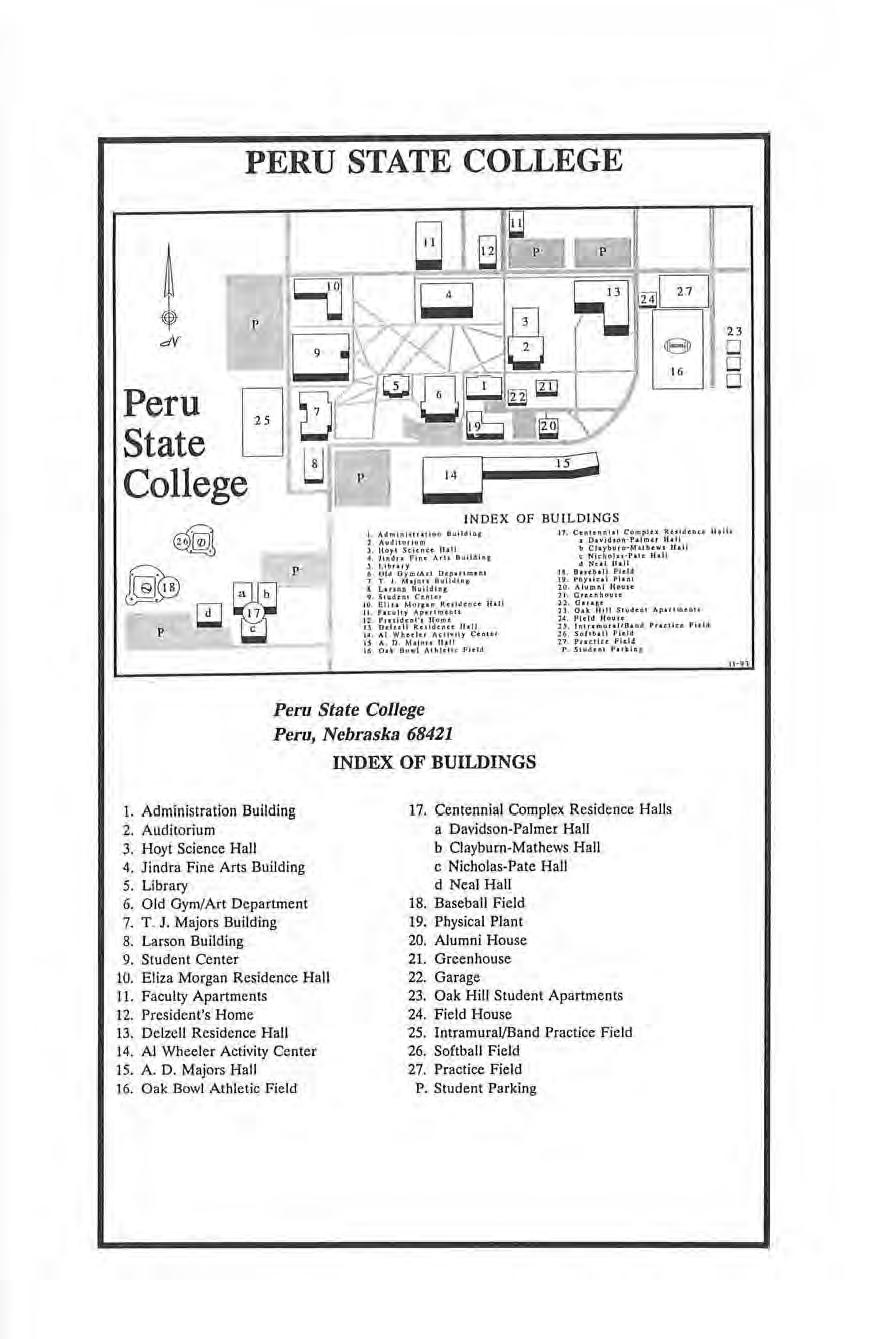
INDEX OF BUILDINGS
l 7, ~mcnni~I CQmp!e~ !lesidcnce H alls
a Davidson-Palmer Hall
b C layburn-Mathews Hall
c Nicholas-Pate Hall
i dV Peru State College @.@1 p p I I NDIJX OF BUILDI NGS I •11IHl11 J Aw•l 1 1l11111 l , 11 071 !clc" t c. 11111 • H• •·· ''"" Arll , l , l , lti11 f1 014 Oim1Af1 0111111 o l l "1 T J h lllU h l 4 L11••• lh;IU•1 • • $ 114c•1 Cc.•1•1 10 e11 u M11rJ• • llol••• u 11, 11 11 P.cwl! j i'lp1,1"'u11 ~i· &~·1~1.~rr:.1~!::. ,,.1. •• • Al Wt. u tu 11,n•hr c;::e Gul U A 1) ~hjllFI 1hll 16 0 1\ l"or\ i'i l 1 1ic. P,1Jd ll c • • u 111 c ,,. wIUolh H I h1 ih 1 D1 vid1 u·l'.olmu H i ll t, Chybu •·Mt1.tcW1 Hill tii,h•l 01 P11t Hi ll • N'ct l lhl t It l ,.d,11 fljtJ ,i 1, P1y1lul '11111 l ll A l1i1 I H1uu lt Q riu1h u u ~t g:~•,11111$1<11401 A p U la1lh H ll i 1 l d ll•un l.), 1",,.,..,,.11a1al , ,u1lu fl i 1 lil H , Sthl1ll flicltl 11 Pue.tlu li"l &hl I" 5 U4tOII r 11\ l I
PERU STATE COLLEGE
I. Administration Building 2. Auditorium 3. Hoyl Science Hall 4. Jindra Fine Arts Building 5. Library 6. O ld Gym/Art Department 7. T J Majors Building 8. Larson Building 9. Student Center 10. E liza Morgan Residence Hall 11 Faculty Apartmenls 12. President's Home 13. Delzell Residence Hall 14 Al Wheeler Activity Center 15. A. D. Majors Hall l(i. Oat< Bowl Athle tic Field
18. Baseball Field 19. Physical Plant 20. Alumni H ouse 21. Greenhouse 22 Garage 23. Oak Hill Student Apartments 24. Field House 25. lntramuraVBand Praclice Field 26. Softball Field 27. Practice Field P. S t udent Parking
d Neal Hall
ADMISSION
Peru State College welcomes applications from students who wish to pursue their educational and vocational goals.
En tering Freshman
Admission to Peru State College (PSC) is granted to students who have graduated from accredited Nebraska high schools and who have not previously attended college, or out-of-state students who meet the College's admissions standards.
Entering freshmen who are seeking an undergraduate degree should follow these steps for admission to Peru State College:
.1. Submit an application for admission to the Office of Admissions.
2 Submit a nonrefundable application fee of $10.00 with the application form .
3. Provide an official transcript. Request that your high school Records Office mail an official transcript which bears the seal or other official designation of the institu tion directly to the PSC Office of Admissions. The transcript should include at least six semesters of study up to your Senior year. I mmediately upon graduation from high school you will need to submit a final high school transcript inrucating your graduation date, cumulative grade point average, and class rank. Out-of. state appliqmts must have a minimum c umulative grade point average of 2.0 or "C" average.
4. Provide test scores. Request that the results of your ACT (American College Test), or SAT (Scholastic Aptitude T est) be sent to the PSC Office of Admissions by indicating PSC as a recipient of your scores or by contacting the appropriate testing agency if the test has a lready been taken. Out-of-state applicants must have minimum composite scores of 14 on the ACT or 560 on the SAT. Students who have been high school graduates for more t han one year, or who hold the GED, do not need to submit test scores. Out-of-state applicants who do not meet the minimum requirements outlined above may be admitted by submitting a letter of recommendation from their high school counselor.
5. Submit the PSC Medical Form. This form is available from the PSC Office of Admissions This information is not used to evaluate an applicant for admission to the college. The completed form is forwarded to the PSC Health Center. The information is used to provide the medical staff with a confidential medical history which is used should medical treatment become necessary. Proof of medical immunizations is required for admission .
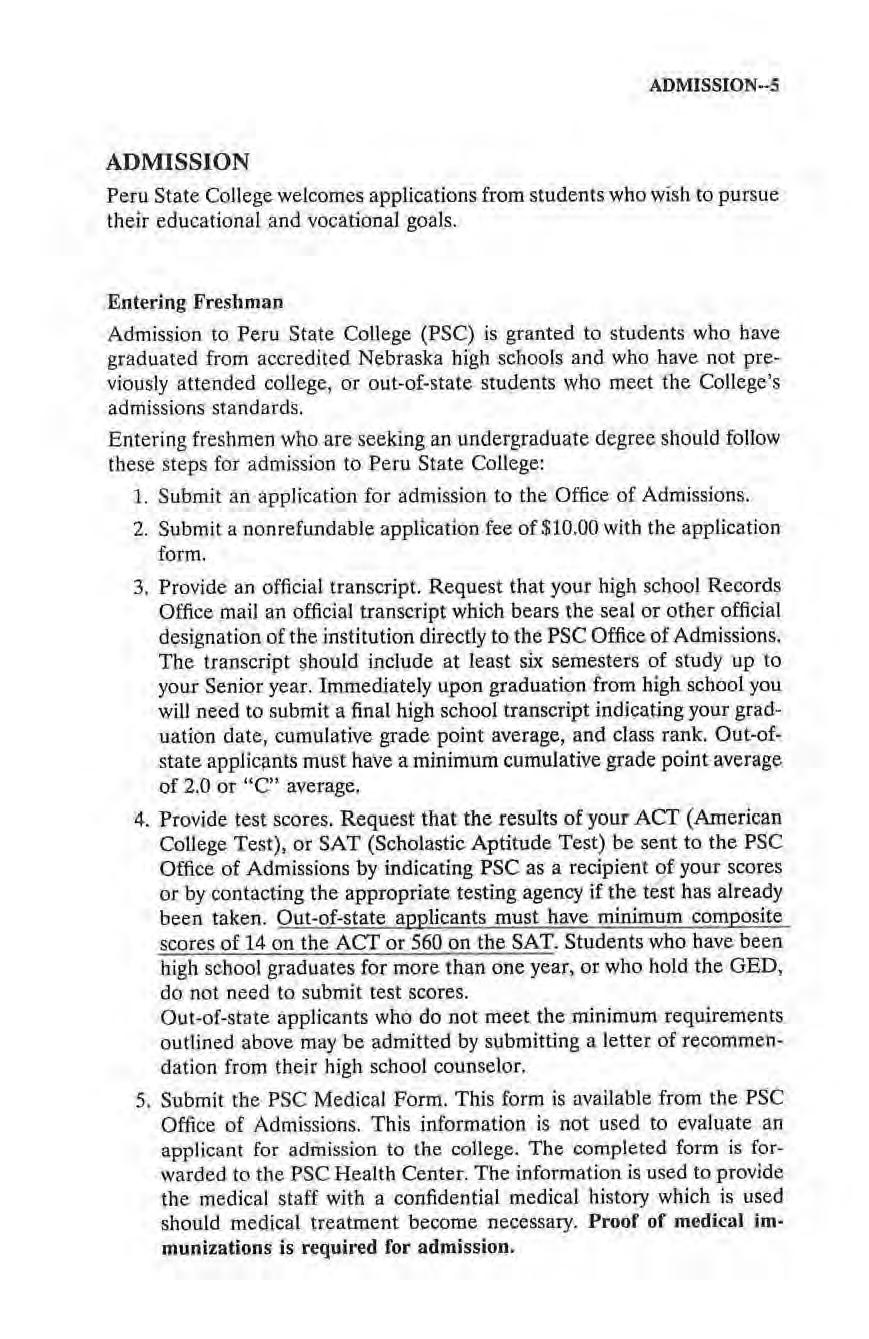
ADMISSION--5
When to apply . You may apply for admission after you have completed your junior year. It is recommended that you apply during the first semester of your senior year or at least six months in advance of the semester in which you p lan to enroll.
College Transfer Students
Peru State College accepts transfer students from other accredited colleges and universities. Transfer students who are seeking an undergraduate degre e should follow these steps for admission to Peru State College:
1. Subm it an application for admission to the Office of Adm issio n s.
2. Submit a nonrefundab le application fee of $10.00 with the application form .
3. Provide an official transcript(s). Request that the Office of the Registrar of each college or university you have attended forward an official transcript direc tly to the PSC Office of Admissions. A transcript is required from each postsecondary institution in which you have been enrolled whether or not c red it was earned. A n official high school transcript is also required if you have completed fewer than 64 transferable semester credits. To be consider ed official, a t r anscript must be sent to the Office of Admissions directly from th e issuing institution and bear the sea l or other official designation of the institution.
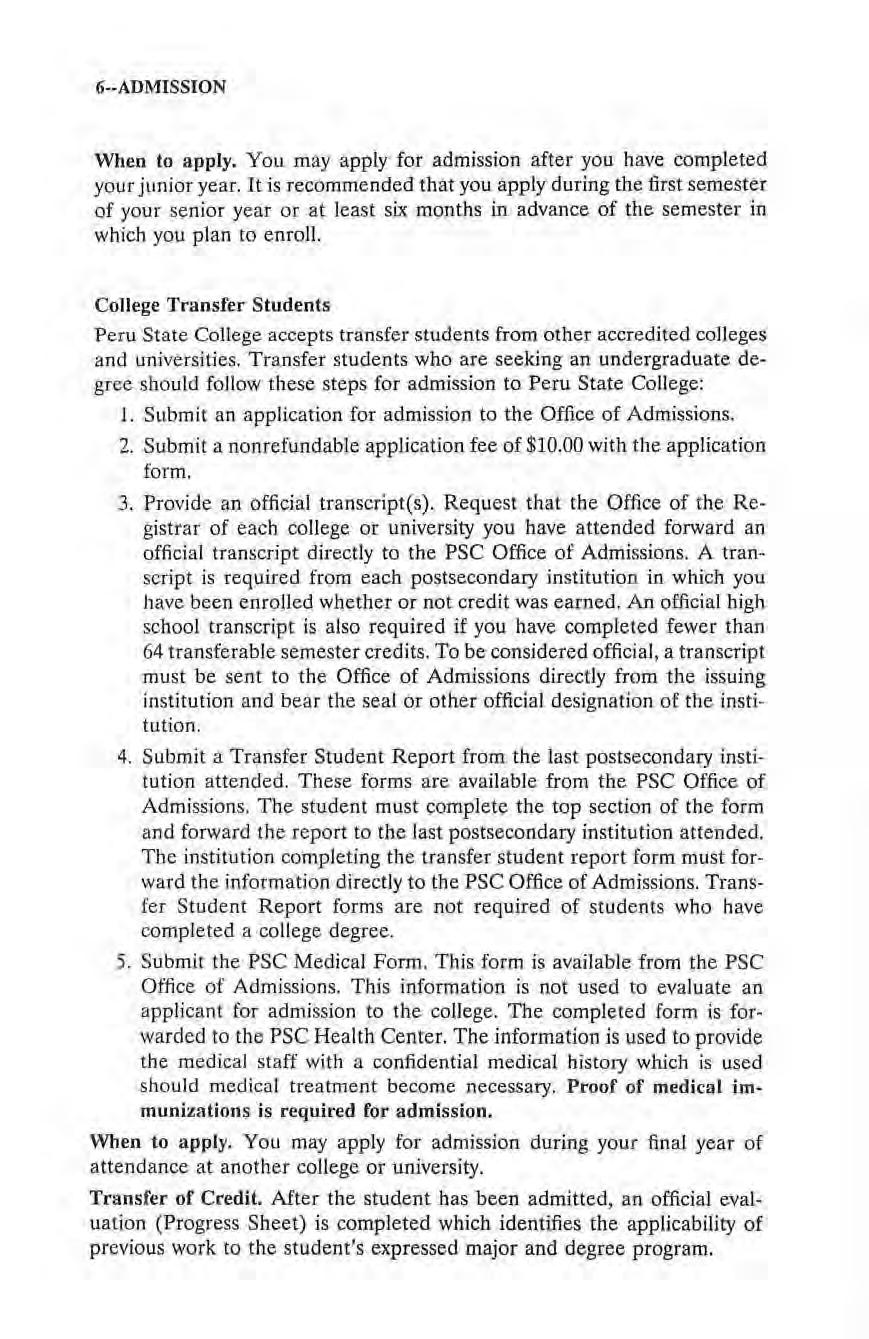
4. Submit a Transfer Student Report from the last postsecondary institution attended. These forms are available from the PSC Office of Admissions. The student must complete t he top section of the form a nd forward the report to the last postsecondary insti tuti on attended. The institution completing the transfer student report form m ust forward the information directly to the PSC Office of Admissions. Transfer St udent Repor t forms are not required of students who have compl eted a college degree.
5. Submit the PSC Medical Form. This form is available from the PSC Office of Adm issions. This information is not used to evaluate an app licant for admission to the co llege. The completed form is forwarded to the PSC H ealt h Center. The information is used to provide the medical staff with a confidential medical history which is used should medical treatment become necessary. Proof of medical immunization s is required for admission.
When to app ly. You may apply for admission during your final year of attendance at another college or university.
Trans fer of Credit. After the student has been admitted, an official evaluation ( Progress Sheet) is compl eted which identifies the applicability of previous work to t he student' s expressed major and degree program.
6--ADMISSION
A maximum of 66 semester credit hours from a vocational/technical/community college may be applied toward the minimum 125 semester hours required for a bachelors degree.
A maximum of 95 semester credit hours from a regionally accredited fouryear college or university may be apelied toward the minimum 125 semester hours required for a bachelors degree.
Transfer students who already have a significant amount of credit hours toward their major will have their transcripts reviewed by the appropriate Division Chairperson.
Students who seek admission and are accepted while on probation from their last college are placed on probation for one semester and are subject to all the policies of probation at the College.
Students who have been suspended from another college will not be considered for admission until the period of suspension has expired and the facts of the dismissal are provided.
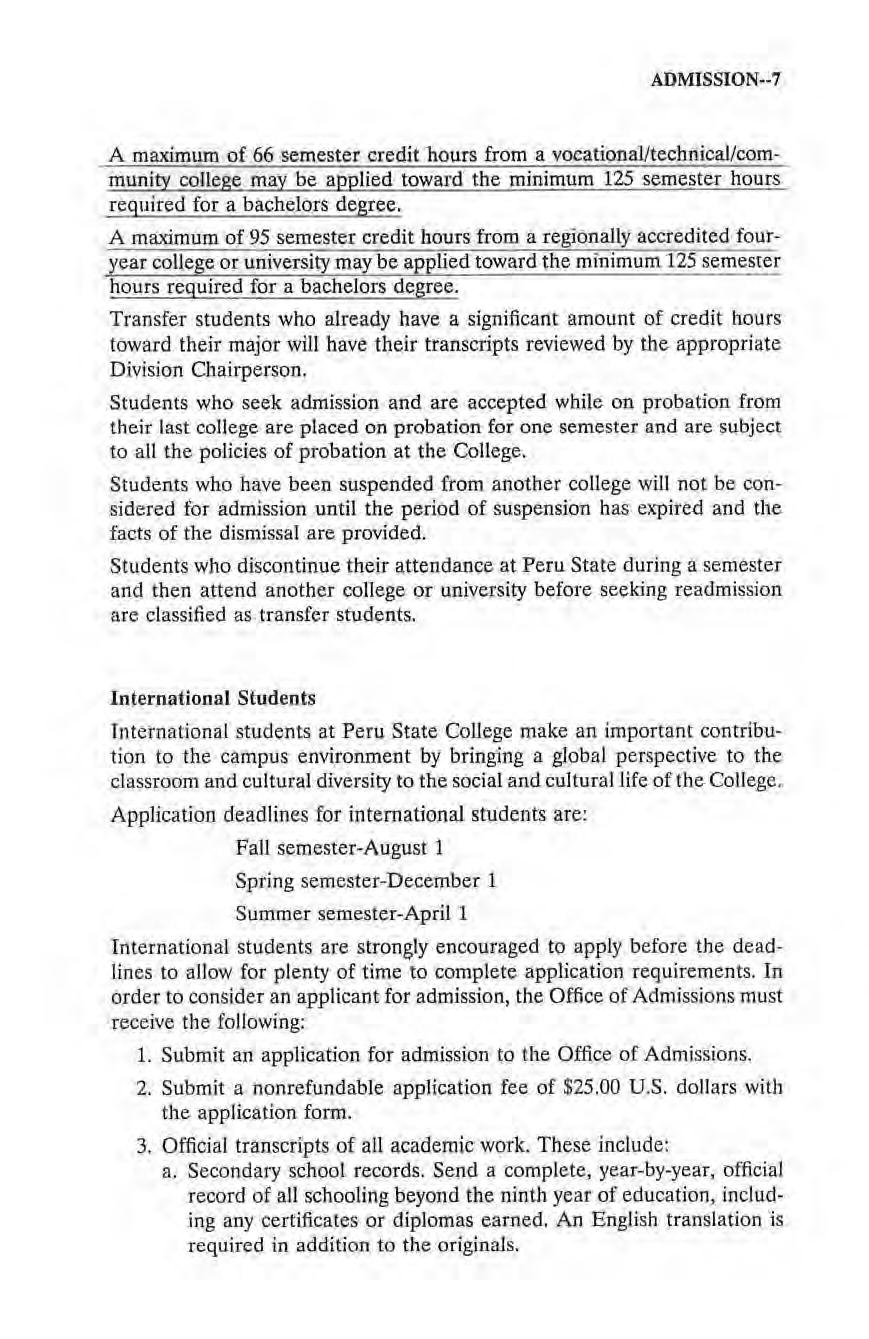
Students who discontinue their attendance at Peru State during a semester and then attend another college or university before seeking readmission are classified as transfer students.
I n ternatio nal Students
international students at Peru State College make an important contribution to the campus environment by bringing a global perspective to the classroom and cultural diversity to the social and cultural life of the College.
Application deadlines for international students are:
Fall semester-August 1
Spring semester-December 1
Summer semester-April 1
International students are strongly encouraged to apply before the deadlines to allow for plenty of time to complete application requirements. I n order to consider an applicant for admission, the Office of Admissions must rece ive the following:
1. Submit an application for admission to the Office of Admissions.
2. Submit a nonrefundable application fee of $25.00 U.S. dollars witl1 the application form.
3. Official transcripts of all academic work. These include:
a. Secondary school records. Send a complete, year-by-year, official record of all schooling beyond the ninth year of education, including any certificates or diplomas earned. An English translation is required in addition to the originals.
ADMlSSION--7
b. College or university records (if applicable). Send a complete, yearby-year official record of academic performance for all postsecondary schooling including any certificates or diplomas earned. An English translation is required in addition to the originals.
For admission to PSC, average marks during schooling and on final examinations must be a minimum 2.0 grade point average in the PSC grading system.
In the PSC grading system, A is 4.0, B is 3.0, C is 2.0, D is 1.0 and F 0.0. International students may need to send their transcripts to an international credentials evaluation service for evaluation. The students will be notified by the Office of Admissions if this is necessary and will be sent a list of agencies that perform this service. The cost will depend upon the type and complexity of the evaluation.
4. Evidence of English language profidency. Scores from the Test of English as a Foreign Language (TOEFL) must be provided by those who come from areas in which English is not the dominant language spoken and written. The minimum acceptable score is 550 for an undergraduate An individual must be proficient at speaking and writing English to be exempt from this step.

5. I nternational Student Financial Certificate and supporting documents. A one-year guaranteed funding source is required of all internationa l students.
6. Submit the PSC Medical Form. This form is available from the PSC Office of Admissions. This information is not used to evaluate an applicant for admissions to the college. The completed form is forwarded to the PSC Health Center. The information is used to provide the medical staff with a confidential medical history which is used should medical treatment become necessary. Proof of medical immunizations is required for admission. Upon admission to Per u State College, the student will be sent a Form I-20. The prospective student then takes the I-20 and other supporting academic and financial documents to the nearest U.S . embassy or consulate to apply for an F-1 (student) visa.
Admission Of Non-high School Graduates Seeking A Degree
Peru S t ate College requires verification of high school graduation prior to enrolling as a student seeking a degree. For the student with a nontraditional educational background, PSC accepts the successful completion of th e General Education Development test (GED) in lieu of a formal h igh school diploma. Non-high school graduates seeking a degree should follow these steps for admission to Peru State College:
8--ADMISSION
1. Submit an application for admission to the Office of Admissions.
2. Submit a nonrefundable application fee of $10.00 with the application form.
3. Provide an official copy of Gene ral Education Development test ( GED).
4. Submit the PSC Medical Form. This form is available from the PSC Office of Admissions. This information is not used to evaluate an applicant for admission to the college. The completed form is forwarded to the PSC Health Center. The information is used to provide the medical staff with a confidential medical history which is used should medical treatment become necessary, Proof of medical im• munizations is required for admission.
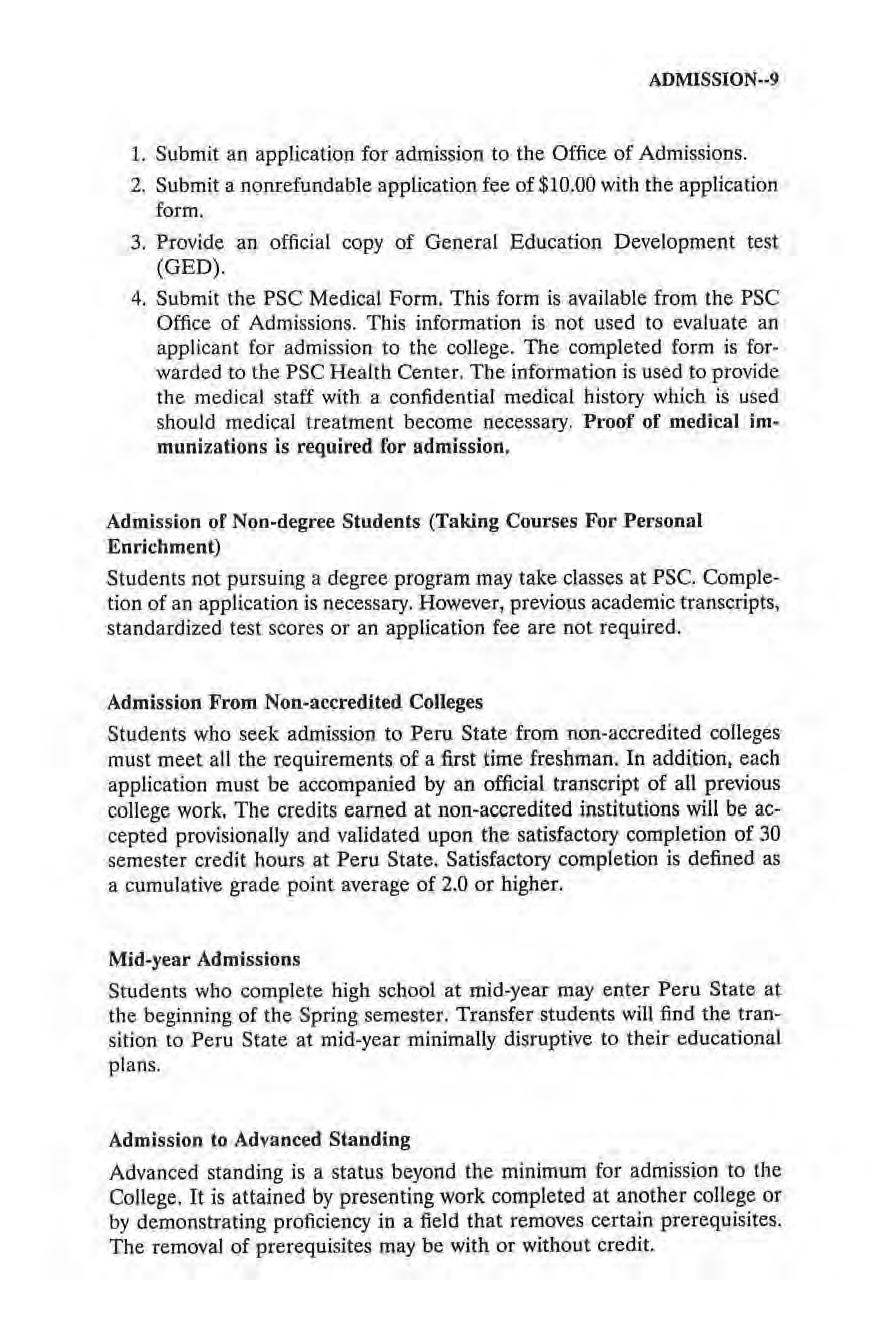
Admission or Non-degree Students (Taking Courses For Personal Enrichment)
Students not pursuing a degree program may take classes at PSC. Completion of a n application is necessary. However, previous academic transcripts, stan dardized test scores or an application fee are not required.
Admission From Non-accredited Colleges
Students who seek admission to Peru State from non-accredited coJleges must meet all the requirements of a fust time freshman. In addition, each application must be accompanied by an official transcript of all previous college work, The credits earned at non-accredited institutions will be accepted provisionally and validated upon the satisfactory completion of 30 semester credit hours at Peru State. Satisfactory completion is defined as a cumulative grade point average of 2.0 or higher.
Mid-year Admissions
Students who complete high school at mid-year may enter Peru State at the beginning of the Spring semester. Transfer students will find the transition to Peru State at mid-year minimally disruptive to their educational plans.
Admission to Advanced Standing
Advanced standing is a status beyond the minimum for admissio n to the College It is attained by presenting work completed at another college or by demonstrating proficiency in a field that removes certain prerequisites. The removal of prerequisites may be with or without credit.
ADMISSION--9
Readmission
All undergraduate students who have previously attended Peru State and were admitted to an academic program, students who wi t hdrew during a semester or cliscontinued their studies for a semester or more (s ummer session excluded), and all post-graduates seeking an additional academic program must apply to the Office of Admissions for readmission. Students suspended for academic or socia l reasons must also reappl y to the Office of Admiss ions.
Students are generally readmitted for the semester or summer term they wish, provided they left the College in good standing.
Students who interrupted their studies, and who were on academic probation, will generally be readmitted for the semester or summer term they wish, provided they are in good standing through out the College.
Students who are academically suspended will not be considered for readmission for two semesters.
Previously suspended students who are readmitted will generally be subject to permanent suspension if they are suspended a second time.
S t udents readmitted following academic suspension must maintain an average of 2.0 or higher for the re-entry term and for each successive term until the required cumulative grade point average of 2.0 has been achieved. Failure to meet the above conditions will result in academic suspension. A student who has been suspended twice is generally not conside r ed for readmission.
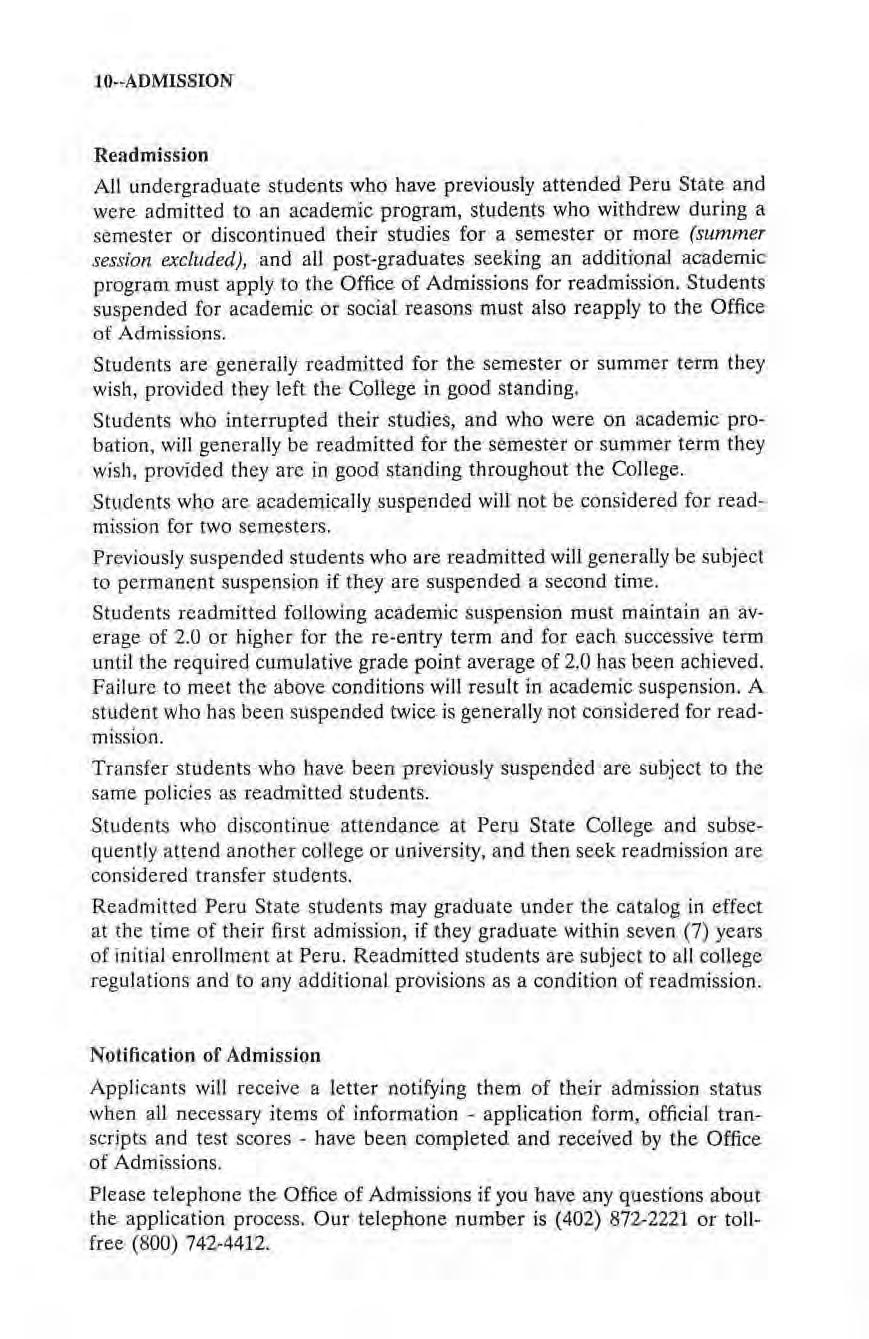
Transf er Students who have been previously suspended are subject to the same policies as readmitted students
Students who discontinue attendance at Peru State College and subsequen tly attend anot her college or university, and then seek readmission are considered transfer students.
Readmitted Peru State students may graduate under the catalog in effect at t he time of their first admission, if they graduate within seven (7) years of initial enrollment at Peru. Readmitted students are s ubj ect to all college regulations and to any add itional provisions as a condition of readmission.
Notification of Admission
Applica nts will receive a letter not ifying them of their admission status when a ll necessa ry items of information - application form, official transcrip ts and test scores - have been completed and received by the Office of Admissions.
Please telephone the Office of Admissions if you have any questions about the applicat ion process. Our telephone number is (402) 872-2221 or tollfree (800) 742-4412.
10--ADMISSION
EXPENSES AND FINANCIAL AID
The expenses for attending Peru State College are set by the Board of Trustees of the Nebraska State Colleges and P eru State. The College .reserves the right to change its tuition, fees, and other charges at any time. Additional expenses for books and supplies, travel, and personal items will vary for individual students. Tuition rates for 1994-1995 are:
Nebraska residency for tuition purposes is determin ed in accordance with Nebraska statutes and the policies of the Board of Trustees. Residency status is based upon evidence provided in a student's application for admission and related documents. The Office of Admissions and School Relations classifies all new students.
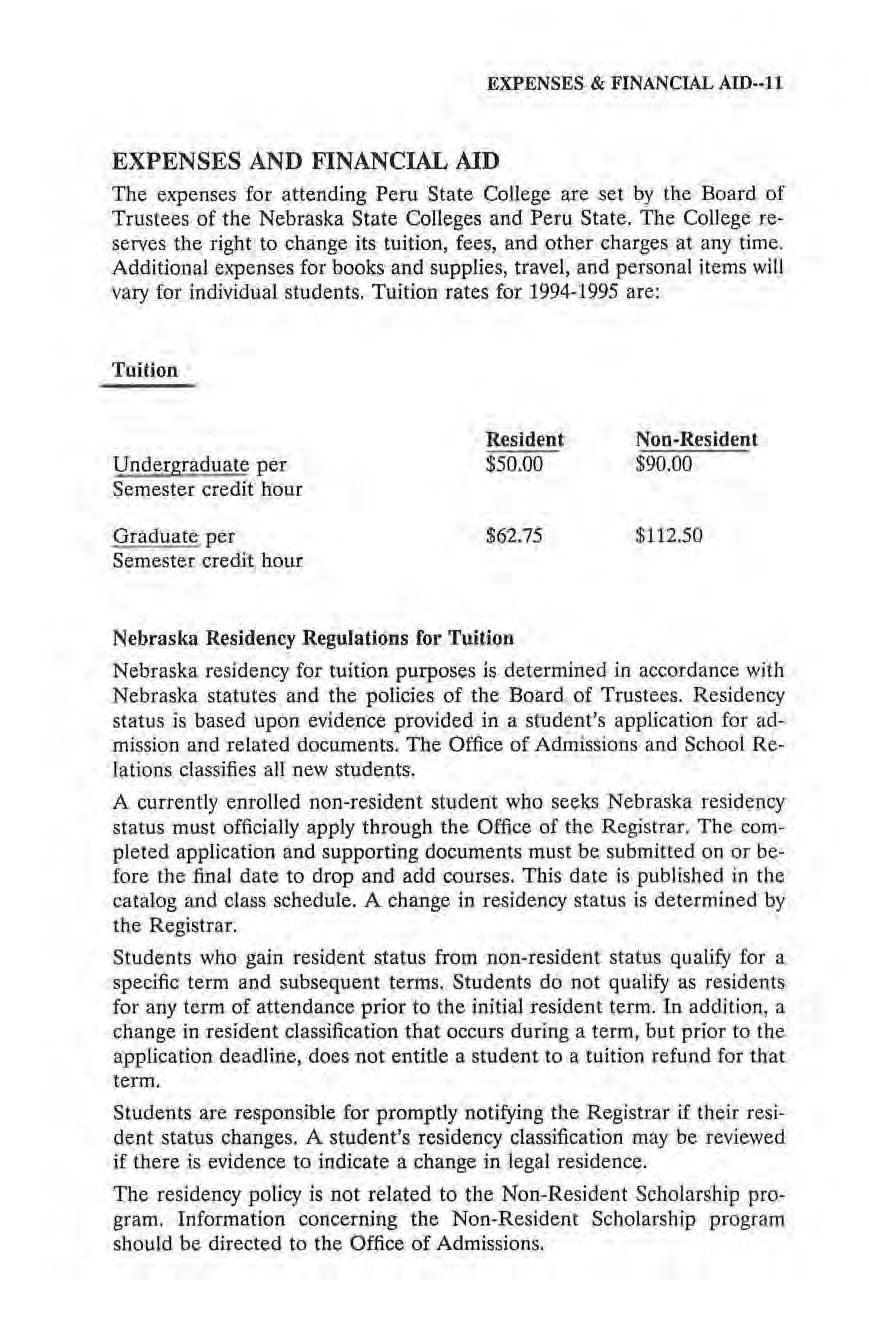
A currently enrolled non-resident student who seeks Nebraska residency status must officia1ly apply through the Office of th e Registrar. The completed application and supporting documents must be submitted on or before the final date to drop and add courses. This date is published in the catalog and class schedule. A change in residency status is determined by the Registrar.
Students who gain resident status from non-resident status qualify for a specific term and subsequent terms. Students do not qualify as residents for any term of attendance prior to the initial resident term ln addition, a change in resident classification that occurs during a term, but prior to the applicat ion deadline, does not entitle a s tudent to a tuition refund for that term.
Students are responsible for promptly notifying the Registrar if their resident status changes. A student's residency classification may be reviewed if there is evidence to indicate a change in legal residence.
The residency policy is not related to the Non-Resident Scholarship program. Infonnation concerning the Non-Resident Scholarship program should be directed to the Office of Admissions.
EXPENSES & FINANCIAL AID-·11
Tuition Undergraduate per Semester credit hour Graduate per Semester credit hour Resident $50.00 $62.75 Nebraska Residency Regulations for Tuition Non-Resident $90.00 $112.50
EXPENSES & FINANCIAL AID
Fees
Fees must be paid each semester at the time ind icated in the academic calendar. Course credit will not be awarded unless debts have been paid or arrangements for late payments have been approved by the Busjness Office. Fees for 1994-95 are:
Mandatory, On-Campus Fees:
Facilities Fee 1-11 hours 12 + hours
S tud ent Activity Fee 1-6 hours 7 + hours
Student Event Fee 1-6 hours 7 + hours
Computer Lab Fee (Fall, Spring and Summer Sessions) 1- 6 hours 7 + hours
Publications Fee 4 + hours
Health Center Fee Regular Semester 3 + hours
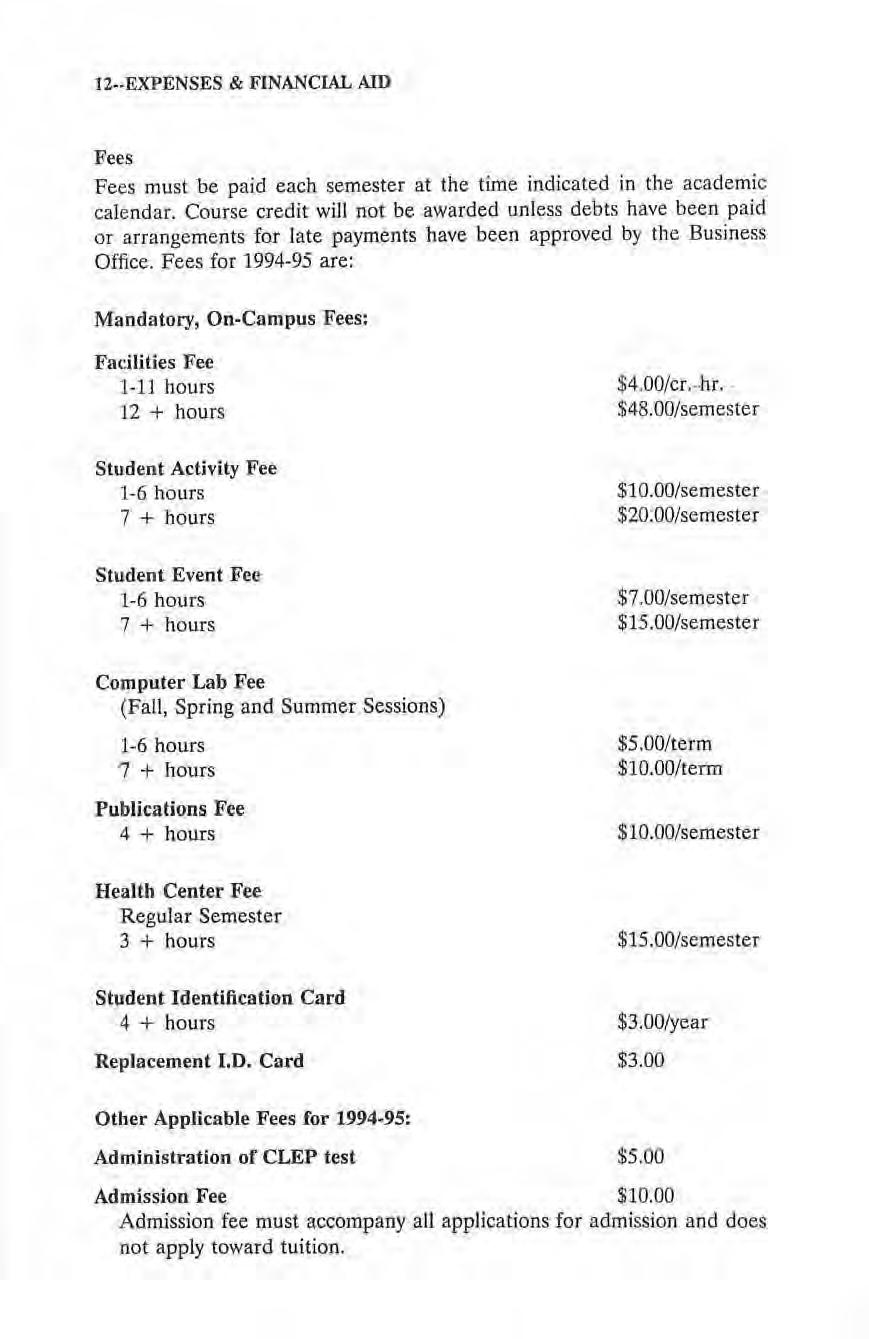
Student Identification C ard 4 + hours
Replacement I.D. Card
Other Applicable Fees for 1994-95:
Administration of CLEP test
Admission Fee $10.00
Admjssion fee must accompany all applications for admission and does not apply toward tuition.
12
$4.00/cr. -,hr. $48.00/semester $10.00/semester $20.00/semester $7 .OD/semester $15.00/semester $5.00/term $10.00/term $10.00/semester $15.00/semester $3.00/year $3.00
$5.00
Course Fees
Varies
Some courses require additional materials, supplies, or laboratory fees.
Credentia l File Fee $3.00
Degree Fee Undergraduate $20.00 Graduate $35.00
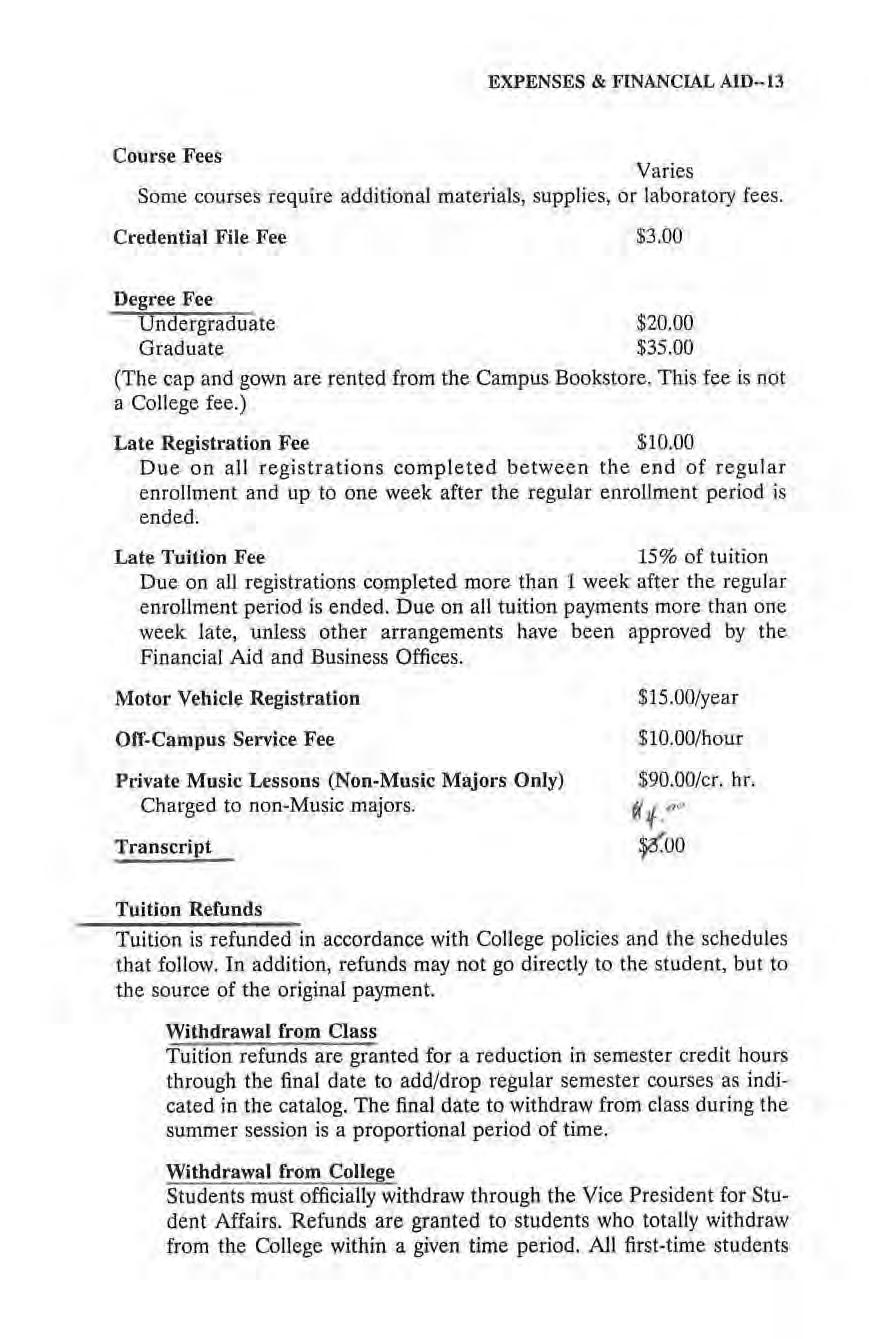
(The cap and gown are rented from the Campus Bookstore. This fee is not a College fee.)
Late Registration Fee $10.00
Due on all registrations completed between the end of regular enrollment and up to one week after the regular enrollment period is ended.
Late Tuition Fee 15% of tuitio n
Due on all registrations completed more than 1 week after the regular e nrollment period is ended. Due on all tuition payments more than one week late, unless other arrangements have been approved by the Financial Aid and Business Offices.
Motor Vehicle Registration
Off-Campus Service Fee
Private Mus ic Lessons (Non-Music Majors Only)
Charged to non-Music majors.
Refunds
Tuition is refunded in accordance with College policies and the schedules that follow. I n addition, refunds may not go directly to the student, but to the source of the original payment.
Withdrawal from Class
Tuition refunds are granted for a reduction in semester credit hours through the final date to add/drop regular semester courses as indicated in the catalog. The final date to withdraw from class during the summer session is a proportional period of time.
Withdrawal from College
Students must officially withdraw through the Vice President for Student Affairs. Refunds are granted to students who tota lly withdraw from the College within a given time period. All first-time students
EXPENSES & FlNANClAL AJD--13
Transcript Tuition
$15.00/year $10.00/hour $90.00/cr. hr. «4, "" ~00
are subject to the Department of Education Calculation Guidelines for refunds. All other students receive a proportional refund according to the following schedule:
Regular Semester
First week 80% of tuition (the F,iday after classes begin marks the end of the first week)
Second and third weeks
Fourth, fifth, and sixth weeks
After the sixth week
week
week After the second week
No refunds are granted for workshops of ten days or less after they begin. The refund schedule for workshops of more tlrnn ten days is prorated as a percentage of the class sessions remaining. No refunds are granted for any workshop after 40 percent of the sessions have been held.
Fee Refunds
Generally, fees are not refunded, unless they were collected in error.
Housing and F ood Serv ice Contracts
Housing and Food Service contracts are academic year annual contracts. Room reservations require a deposit of $75.00 and must accompany the h ousing co ntract. The deposit is refundable if the student completes bis/ her co ntract, withdraws for approved reasons, or there are no damages to the facility. Students have the opportunity to change meal plans. Meal plans may be changed until the last day of add/drop. Students may appeal to be re leased from a meal plan by formally appealing to the Director of Residential Life. Food Service rates for 1994-95 are:
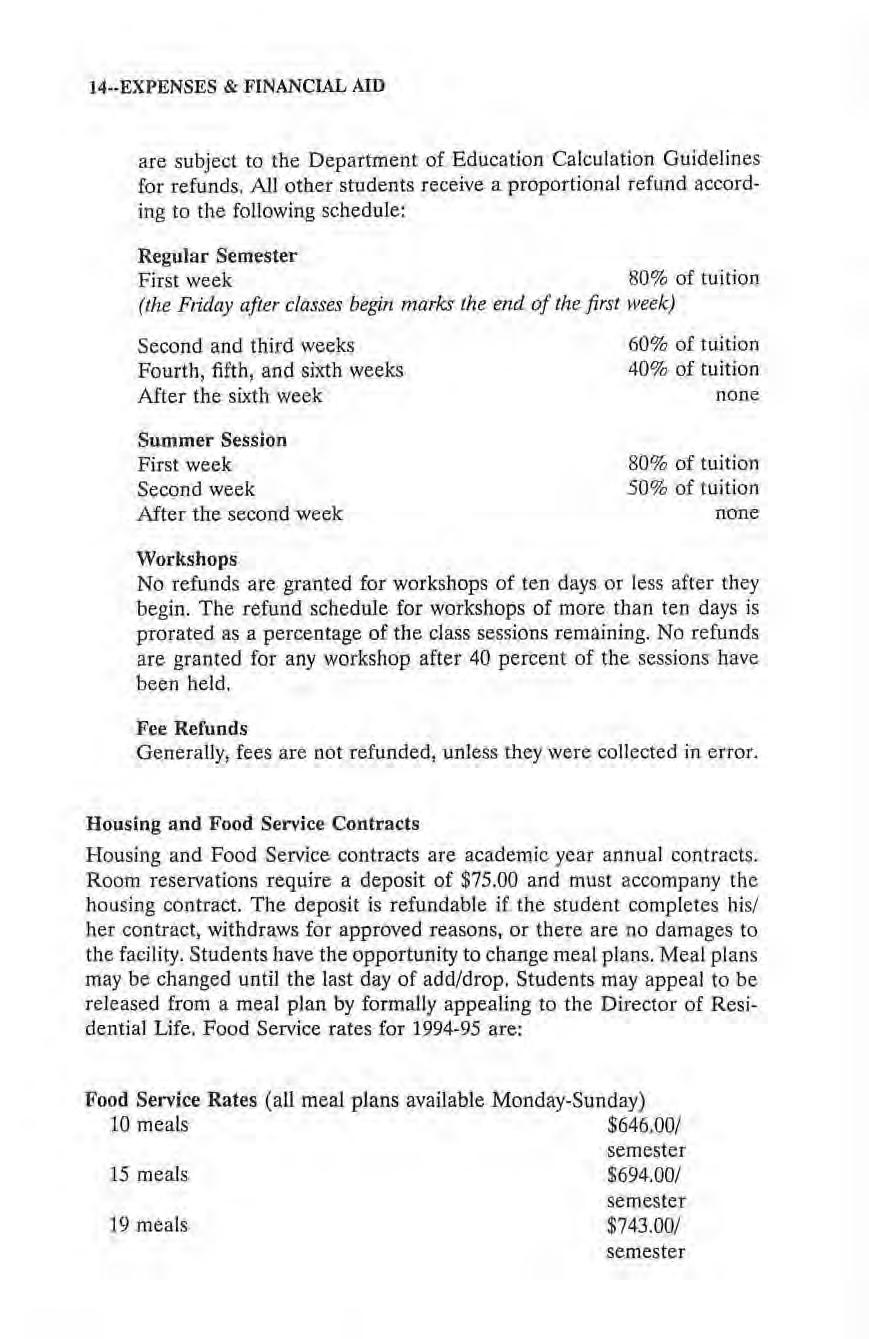
14--EXPENSES & FINANCIAL AID
Summer
First
Workshops 60% of tuition 40% of tuition none 80% of tujtion 50% of tuition none
Session
Second
F ood Se rvice Rates (all meal plans ava ilab le Monday-Sunday) 10 meals $646.00/ 15 meals 19 meaJs semester $694.00/ semester $743.00/ semester
Ho usi ng R ates
Delzell and Morgan Halls (per semester)
Centennial Complex (per semester)
Oak Hill Apartments (partially furnished)
$673 00
$757.00
One-bedroom un it $178.00/month
Two-bedroom unit $217.00/month
Both the one-bedroom unit and the two-bedroom unit in Oak Hill include water and gas, but not electricity. Utilities are taxed and subject to a monthly surcharge based on utility cost.
Nich olas Hall Apar tme nts (furnished with utilities included)
One-bedroom u nit $238.00/mon th Two-bedroom unit $289.00/month
Private Room Charge (additiona l per semester)
H ousing Deposit
Housing and Food Service Refunds
$245.00 $75.00
Students who withdraw from school or whose housing contract is canceled (both require approval of the Vice President for Student Affairs) may receive prorated refunds of their housing and food service fees. Refunds are pro-rated on the number of days in the semester and the date of approved cancellation of the contract.
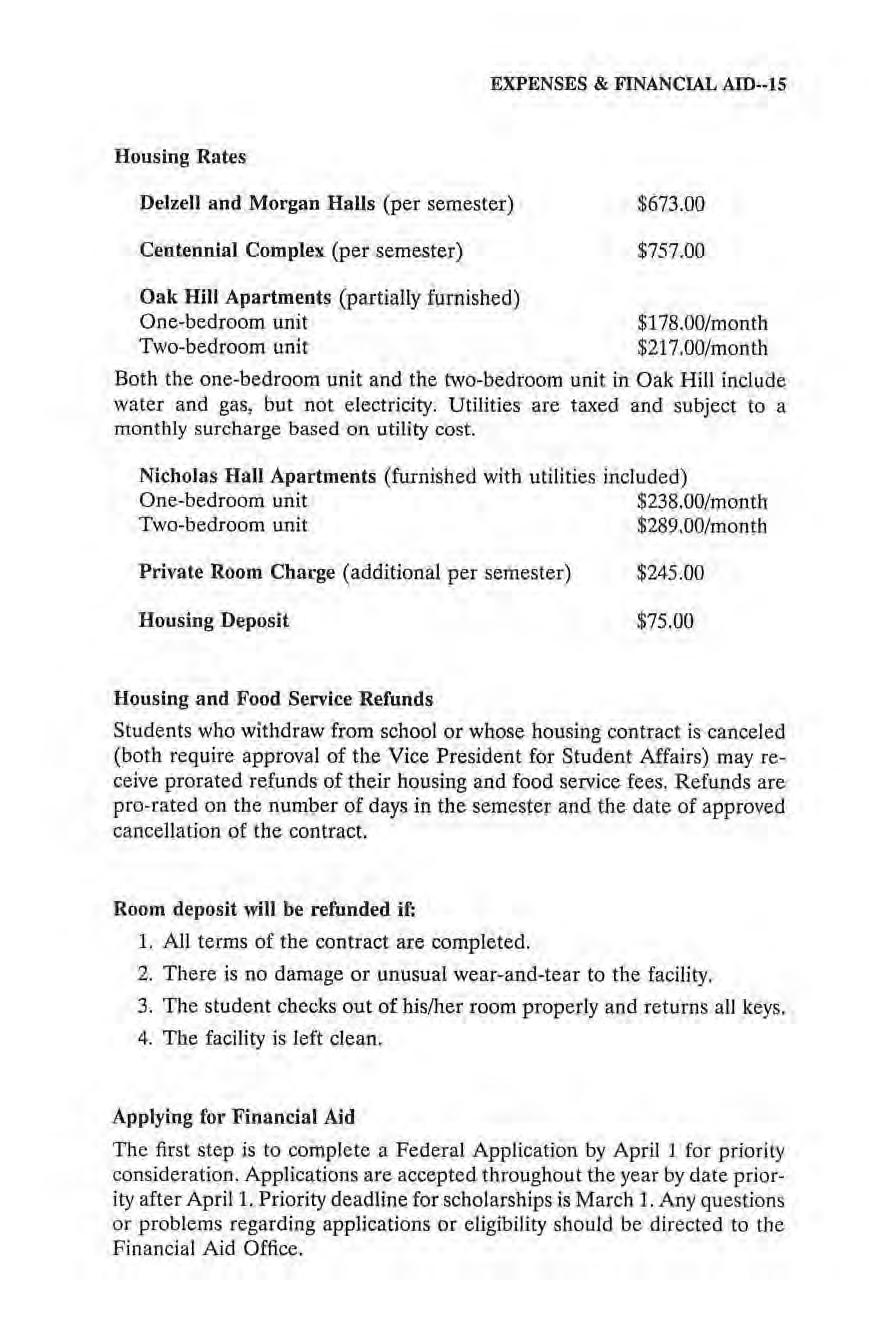
Room depos it will be refunded if:
1. All terms of the contract are completed.
2. There is no damage or unusual wear-and-tear to the facility
3. The student checks out of his/her room properly and returns all keys
4. The facili ty is left clean.
Applying for Financial A id
The first step is to complete a Federal Application by April 1 for priority consideration . Appl ica,tions are accepted throughout the year by date priority after April 1. Priority deadline for scholarships is March 1. Any ques tions or problems regarding applications or eligibility should be directed to the Financial Aid Office.
EXPENSES & FINANCIAL AID--15
Federally-Fu nd ed Progra ms (Eligi bili ty Determined by Federa l Standa rd s)
Federa l Pell Gran ts
Federal Pell Grants are determined after considering student need and college costs. Eligibility is calculated from the Student Aid Report.
Federal Supplemental Educational Opportunity Grants (FSEOG)
These grants are awarded to students who have exceptional financial need. The grants range from $200 to $1,000 a year. All grants are awarded yearly.
Federa l Work-Study (FWS)
The Federal Work-Study is a need-based program. Its purpose is to permit students to pay for a portion of their education by working. When attending college full time, students can work a maximum Of 15 hours per week; during vacation periods, students are allowed to work 40 hours per week. Federal Work-Study jobs are usually on campus and vital to the efficient operation of the College.
Federal Perkins Loans
These low interest, long-term loans are made to students who are in good standing and show financial need.
Federa l Fami ly Education Loan Programs
This program makes long-term ioans available to students attending an eligible institution of higher education. The loans included in this program are: Federal Stafford Loans, Federal PLUS, Federal SLS, and Federal Consolidation Loan Program.
State-Funded Programs
State Scholars hip Award Program (SSAP)
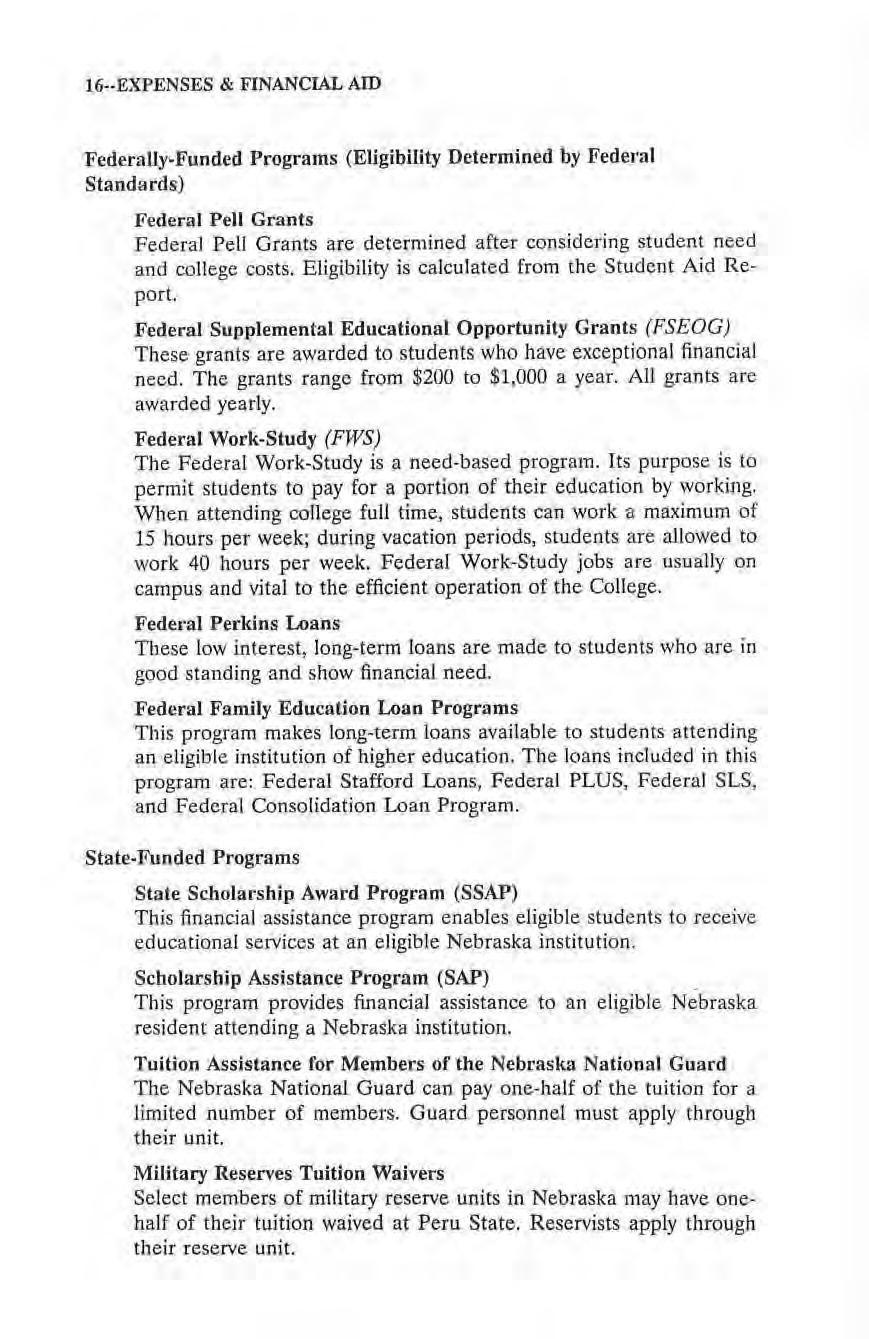
This financial assistance program enables eligible students to receive educational services at an eligible Nebraska institution.
Scho lars hip Assis tance Program (SAP)
This program provides financial assistance to an eligible Nebraska resident attending a Nebraska institution.
Tu ition Assistance for Members of th e Neb raska Natio n al Guard
The Nebraska National Guard can pay one-half of the tuition for a limited number of members. Guard personnel must apply through their unit.
M ilit ary Reserves Tuition Waivers
Select members of military reserve units in Nebraska may have onehalf of their tuition waived at Peru State. Reservists apply through their reserve unit.
16--EXPENSES & FINANCIAL AID
Institutionally-Funded Programs
College Work Job s
These jobs are similar to Federal Work-Study jobs in pay, type of work, and hours worked,
Board of Trustees Scholarships
The Board of Trustees of the Nebraska State Colleges provides full tuition scholarships for current graduates of Nebraska high schools who have demonstrated outstanding academic achievement based on class rank and entrance examinations. The scholarships are renewable to cover four regular academic years. The application deadline is January 15.
Coopera ting Schools Scholarships
Scholarships are available to designated graduates of school systems which assist Peru State with its teacher education program. The scholarships are for one-half the basic tuition costs per semester for eight semesters. Potential applicants should inquire at their high school.
Special Activity Tuition Scholarships
These scholarships are a type of financial ass istance in the form of partial tuition waivers granted to students with special abilities in athletics, art, drama, music, etc. Applicants should contact the appropriate department head or coach indicating their desire to be considered for a scholarship. The waivers are approved for one academic year, but are renewable.
Peru State Colle.ge Foundation Scholarships
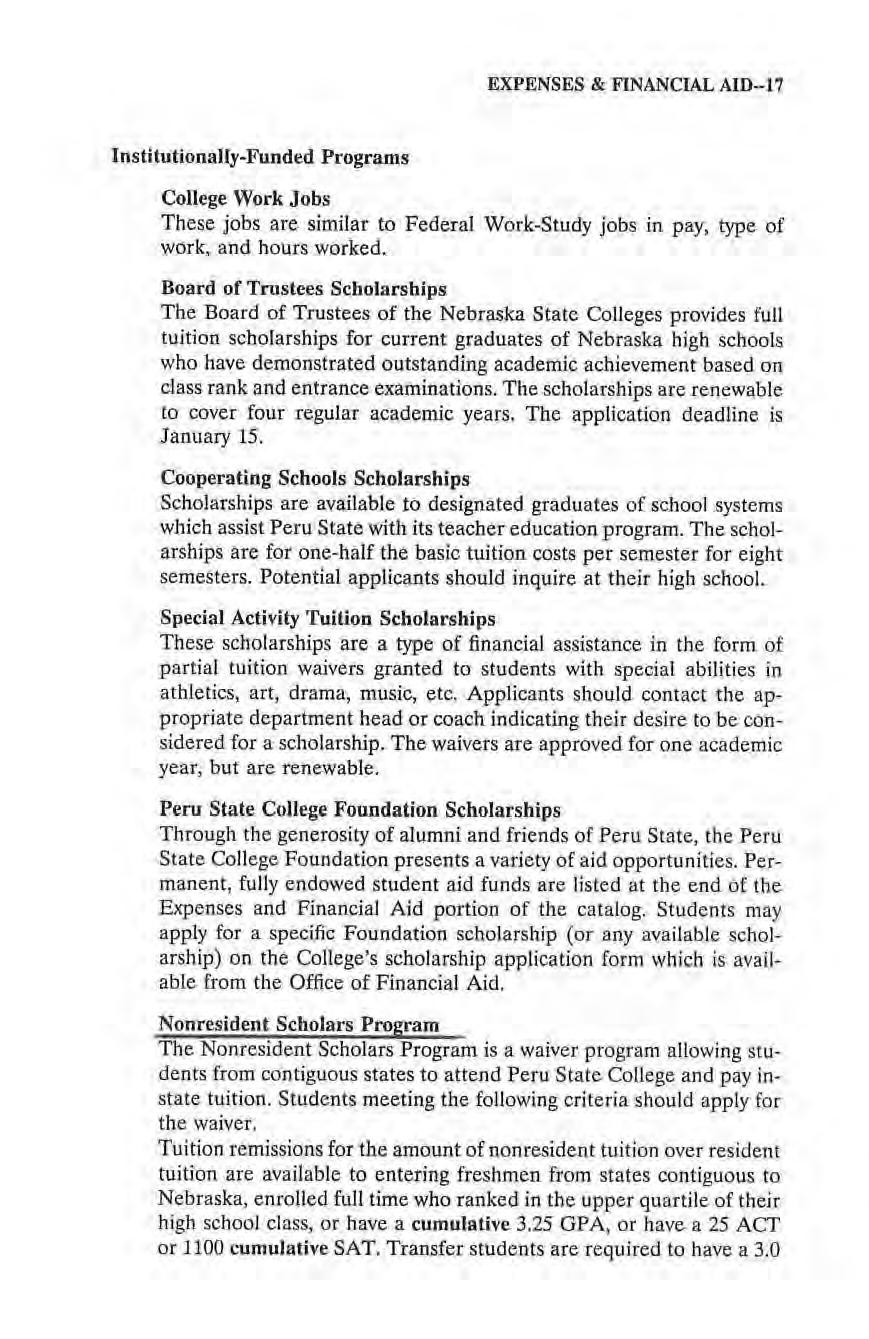
Through the generosity of a lumni and friends of Peru State, the Peru State College Foundation presents a variety of aid opportu ni ties. Permanent, fully endowed student aid funds are listed at the end of the Expenses and Financial Ajd portion of the catalog. Students may apply for a specific Foundation scholarship (or any available scholarship) on the College's scholarship application form which is available from the Office of Financial Aid.
Nonresident Scholars Prog-ram
The Nonresident Scholars Program is a waiver program allowing students from contiguous states to attend Peru State College and pay instate tuition. Students meeting the following criteria sho uld apply for the waiver.
Tuition r e missions for the amount of nonresident tuition over resident tuition are available to entering freshmen from states contiguous to Nebraska, enrolled full time who ranked in the upper quartile of their high school class, or have a cumulative 3.25 GPA, or have a 25 ACT or 11:00 cumulative SAT. Transfer students are required to have a 3.0
EXPENSES & FINANCIAL AID--17
cumulative GPA from previous college work. To continue in the program, students are required to maintain a cum ula tive 3.0 GPA. Entering graduate students must have a cumulative G PA of 3.5 for all previous work attempted at all colleges attended prior to their enrollment at a Nebraska State College. To continue in the program, gcaduate students are required to maintain a 3.5 c umul ative GPA Students desiring to con t in ue with the Nonresident Scholars Program m ust rea ppl y each se mester through the Vice President fo1· Student Affairs.
Oth er Sou rces of Fi nancia l Aid
Neb raska Co ng ress of Parents and Teacher·s Scho larships
The Nebraska Congress of Parents and Teachers awards schola rships to full - time students of the Nebraska State Colleges who are Nebraska residents studying to be teachers. T o be eligible, students must have a pleasing personality, high moral and social standards, and show an aptitude fo r teaching. Appl ications are availab le at the Office of Financial Aid shortly after the beginni·ng of the Fall semester.
Sta te Vocat ional Re h abilitation Aid
Students with physical disabilities that constitute a vocational handi J cap are e ligible for financial assistance to meet their costs of tuition and other financia l needs through the Division of Vocational Rehabi li tation. Potential applicants should contact their Vocational Rehabilitation counselor.
Vete ran's Benefi ts
Peru State is an approved institution under the provisions of Chapter 36, Title 38 of the U.S. Code where any eligible veteran or dependent may receive VA benefits while attending College. Any student receiving benefits through the Veteran's Administration is required to meet the Scholastic Standards outlined in the catalog. In addition, these students are requ ired to make normal progress toward their educational objectives as defined in this Catalog.
Aca dem ic Re qu ire me nts fo r F in an ci al E ligibili ty
Students who receive financial a id from any federal, state or college administered financial aid program are required to maintain satisfactory academic standing and progress. Academic good standing is a 2.0 GPA (4.0 scale). Satisfactory progress is completing a term of enrollment at th e enrolled status for which the student received aid, such as, full time, ¾ time or ½ time (grades of "F", Withdrawals, or I ncomple tes produce no credit hours and are not included). Full-time students must complete a minimum

18- -EXPENSES & FINANCCAL AID
of 12 credit hours with a 2 .0 GPA per semester. The standards for satisfactory academic standing are published under the Academic Standards portion of this catalog.
Scho larships
The Peru State College Foundation administers various scholarship funds. Scholarships are awarded on the basis of academic achie vement, financial need and/or a combina tion of both. Scholarships and other financial aid are available to deserving full-time Students because of the generous contributions of alumni, friends, corporations and foundations.
Hanson and Amber Aldrich Scholarship
This scholarship is provided to an incoming freshman from Nemaha County planning to enroll in Education at PSC. Amber Jodry Aldrich was a 1923 graduate of Peru State.
Laurine Anderson Tri Beta Scholarship
The recipient of this scholarship is selected by the Natural Science Division and must be a Biology major and member of Tri Beta. The scholarship was established by Laurine Anderson, class of 1928, and a charter member of the Peru Chapter of Tri Beta.
Marian Anderson Scholarship
This scholarship is awarded to an incoming freshman African-American student.
Charles Andrews Memorial Scholarship
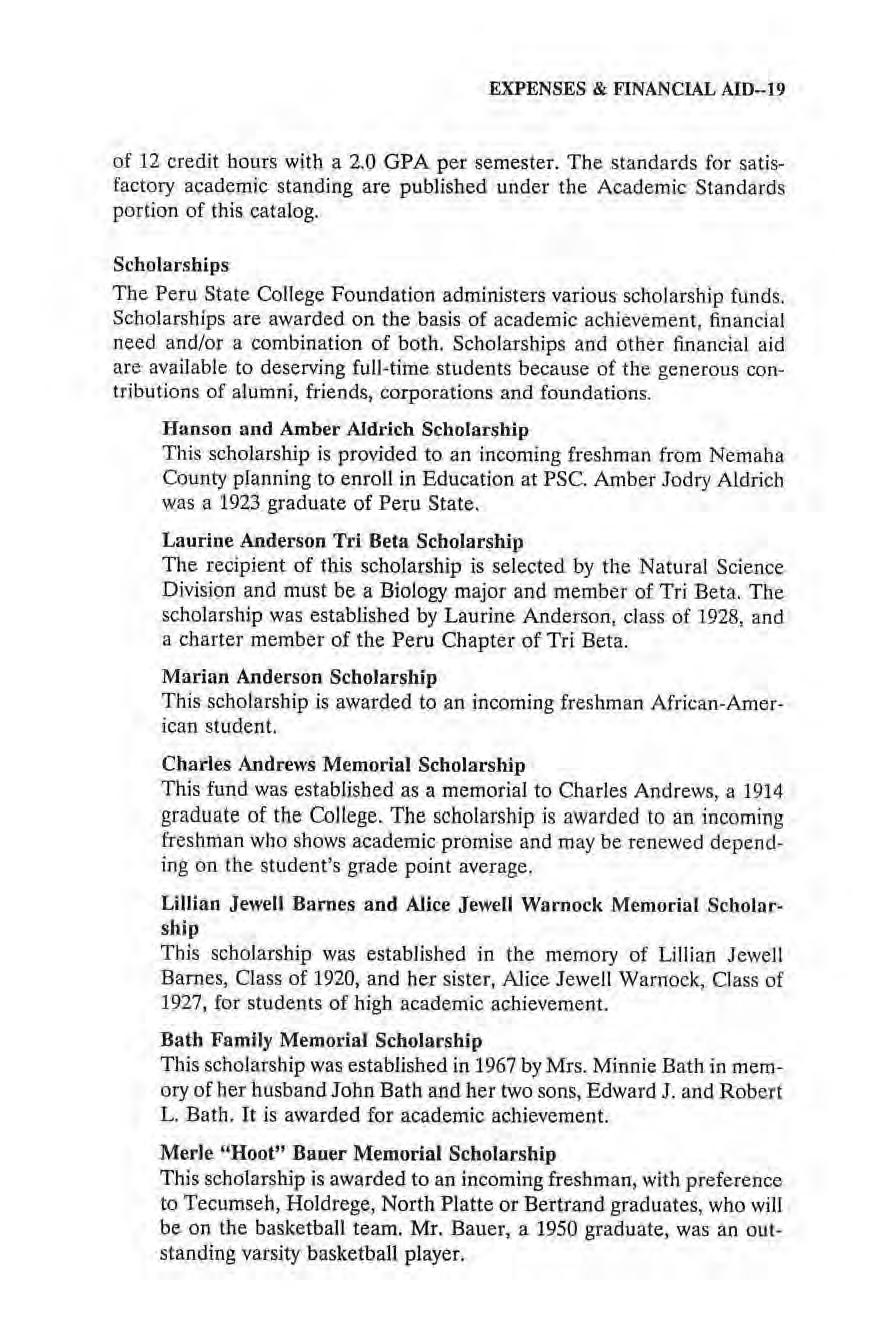
This fund was established as a memorial to Charles Andrews, a 1914 graduate of the College. The scholarship is awarded to an incoming freshman who shows academic promise and may be renewed depending on the student's grade point average.
Lillia n Jewell Barnes and Alice Jewell Warnock Memoria l Scholarship
This scholarship was established in the memory of Lillian Jewell Barnes, Class of 1920, and her sister, Alice Jewell Warnock, Class of 1927, for students of high academic achieveme nt.
Bath Family Memorial Scholarship
This scholarship was established in 1967 by Mrs. Minnie Bath in memory of her husband John Bath and her two sons, Edward J. and Rob e rt L. Bath. It is awarded for academic achievement.
Merle "Hoot" Bauer Memorial Scholarship
This scholarship is awarded to an incoming freshman, with preference to Tecumseh, Holdrege, North Platte or Bertrand graduates, who will be on the basketball team. Mr. Bauer, a 1950 graduate, was an outstanding varsity basketball player.
EXPENSES & FINANCIAL AID--19
E.C. and Mae Miller Beck Scholarship
This schol arship was establis hed by Dr. and Mrs. Beck m 1967 for an English major wit h athletic ability.
Albert Brady Scholarsh ip
Established by the Peru State College Letterman's Club and the friends of Albert Brady, the scholarship is awarded to a Biology major with athletic ability.
Esther Delzell Brownell Memorial Scholarship Fund
Mrs. Brownell's family established this scholarship in her memory. It is awarded to a deserving student. An interest in dramatic activities is encouraged.
Pearl Morgan Butler Memorial Scholarship
The schol arship provides for tuition as the fund allows. It was established by Joy Elmer Morgan in the memory of his sister who attended the College in 1905.
Roy Chamberlain Scholarship
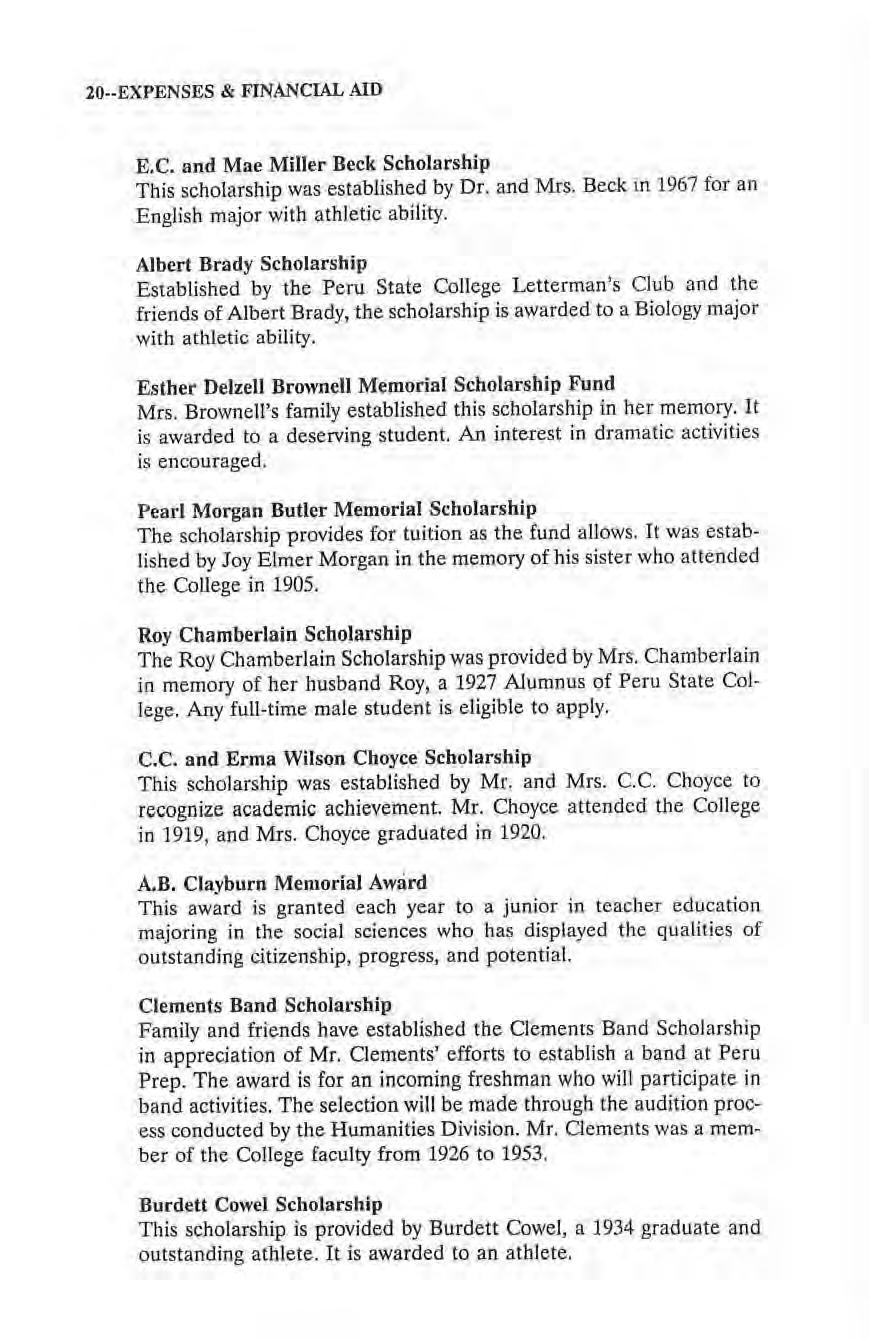
The Roy Chamberlain Scholarship was provided by Mrs. Chamberlain in memory of her husband Roy, a 1927 Alumnus of Peru State College. Any full-time male student is el igib le to apply.
C.C. and Erma Wifson Choyce Scholarship
This scholarship was established by Mr. and Mrs. C.C. Choyce to recognize academic achievement. Mr. Choyce attended the College in 1919, and Mrs. Choyce graduated in 1920.
A.B. Clayburn Memorial Award
This award is granted each year to a junior in teacher education majoring in the social sciences who has displayed the qualities of outstanding citizenship, progress, a nd potential.
Clements Band Schola1·sbip
Family and friends have established the Clements Band Scholarship in appreciation of Mr. Clements' efforts to establish a band at Peru Prep. The award is for an incoming freshman who will participate in band activities. The selection will be made through t he audition process conducted by the Humanities Division. Mr. Clements was a member of the College faculty from 1926 to 1953 .
Burdett Cowel Scholarship
This scholarsh ip is provided by Burdett Cowel, a 1934 graduate and outstanding athlete. It is awarded to an ath lete.
20- -EXPENSES & FINANCIAL
AID
Crabtree Memorial Scholarship
Dr. Eunice Crabtree established this scholarship in 1982 in th e memory of her father, Dr James Crabtree and in memory of her brother James Wilson Crabtree who died in infancy. Dr. Crabtree was President of Peru State College from 1904-1910 who then went on to found the National Educational Association. The scholarship is awarded for academ ic achievement.
Ada Crooker Memorial Scholarship
This scholarship was established in the memory of Ada Crooker who taught business at Auburn High School. The recipient must be a woman grad uate of Auburn High School majoring in Bu siness at the College.
Hobart Davidson Scholarship
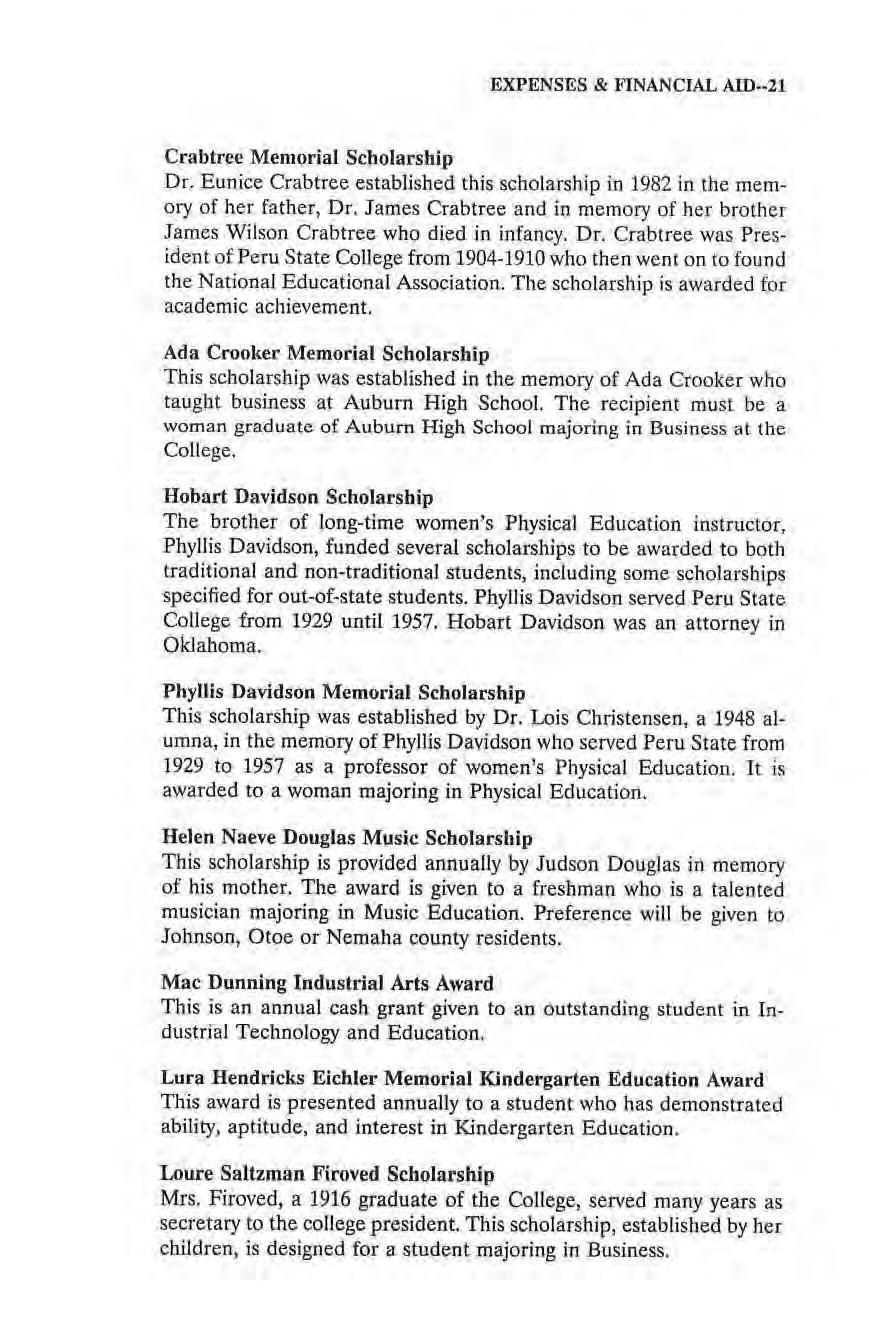
The brother of long-time women's Physical Education instructor, Phyllis Davidson, funded several scholarships to be awarded to both traditional and non-traditional students, including some scholarships specified for out-of-state students. Phyllis Davidson served Peru State College from 1929 until 1957. Hobart Davidson was an attorney in Oklahoma.
Phyllis Davidson Memorial Scholarship
This scholarship was established by Dr. Lois Christensen, a 1948 alumna, in the memory of Phyllis Davidson who served Peru State from 1929 to 1957 as a professor of women's Physical Education. lt is awarded to a woman majoring in Physical Education.
Helen Naeve Douglas Music Scholarship
This scholarship is provided annually by Judson Douglas in memory of his mother. The award is given to a freshman who is a talented musician majoring in Music Education. Preference will be given to Johnson, Otoe or Nemaha county residents.
Mac Dunning lodustrial Arts Award
This is an annual cash grant given to an outstanding student in Industrial Technology and Education.
Lura Hendricks Eichler Memorial IGndergarten Education Award
This award is presented annually to a student who has demonstrated ability, aptitude, and interest in Kindergarten Education.
Loure Saltzman Firoved Scholarship
Mrs, Firoved, a 1916 graduate of the College, served many years as secretary to the coflege president. This scholarship, established by her children, is designed for a student majoring in Business.
EXPENSES & FINANCIAL AID--21
Elsie I. Fisher Memorial Scholarship
This scholarship was established in memory of Elsie I. Fisher, a graduate, who taught for 39 years in the Omaha school system. It is awarded to students in Art Education.
Esther Cole Franklin Memorial Scholarship
Dr. Franklin was a 1920 graduate of the College who was recognized as a distinguished alumna in 1977. This scholarship was established in her memory and is awarded to an outstanding student.
Glen and Verda Frary Scholarship

Glen and Verda Hauptman Frary were both 1927 graduates of Peru State who devoted their careers to educating youth. This scholarship is to be awarded to a sophomore or junior Education major.
Helen Hart Fuller Scholarship
H elen Hart Fuller, who graduated from Peru State in 1919, left a sizeable bequest to assist non-traditional students who have been out of high school at leas t ten years.
Chris Haddad Memorial Scholarship
Established by friends and family, this scholarship is awarded to a business student, with preference to someone from Seward County. Chris Haddad was a 1989 graduate and was an admissions counselor a t Peru State College.
Jess A. Barris Memorial Scholarship
This schola rship is provided in the memory of Jess A Harris, Class of 1909. There are no restrictions for this scholarship.
Benjamin Harrison Memorial Scholarship
The family of Benjamin Harrison, Class of 1907, established this memorial to provide scholarships to worthy Peru State students.
Harrison Family Scholarship
This scholarship provides partial tuition for a student pursuing a career in Education and was established by Mrs. Benjamin Harrison of Omaha.
Arnold and Bertha Hilterman Scholarship
This scholarship was established by Charles Masopust in memory of his sister and her husband. It is presented to a deserving Peru State st ud ent.
Lena Huff Memorial Scholarship
This scholarship is awarded for scholastic excellence in the memory of Lena Huff, a 1909 graduate of the College.
22--EXPENSES & FINANCIAL AID
Harry and Mary Hutchinson Memorial Scholarship
This scholarship is provided by Charles Masopust in memory of the parents of his sister-in-law, Hollis. It is to be given to an outstanding sophomore or junior who has excellent potential to be an outstanding teacher. The recipient should demonstrate campus leadership and a need for financial assistance.
Dee V. and Kathleen Jarvis Industrial Education Scholarship
Dee V. and Kathleen Jarvis provide a scholarsbjp for a student majoring in Industrial Arts Education. Mr. Jarvis, a 1948 graduate of the College, served on the staff as a professor of Industrial Education for 30 years before retiring in 1978.
Glenn D. Jenkins Memorial Scholarship
The family and friends of Glenn D. Jenkins, Class of 1909, established this scholarship for students from Humboldt and Richardson Cbunty.
Victor H. Jindra Memorial Scholarship
This scholarship for students in Music was established from the estate of Victor H. Jindra, a professor of Music at the College from 1923 to 1961.
Johnson County Bank Scholarship
This scholarship is provided annually by the Johnson County Bank. It is awarded to a student from the Johnson County area.
Pearl A, Kenton Language Arts Award
This award is presented annually to an outstanding stude nt majoring in Language Arts.
Coretta Scott JGng Scholarship
These scholarships are provided annually by an anonymous donor. They are awarded to black women students.
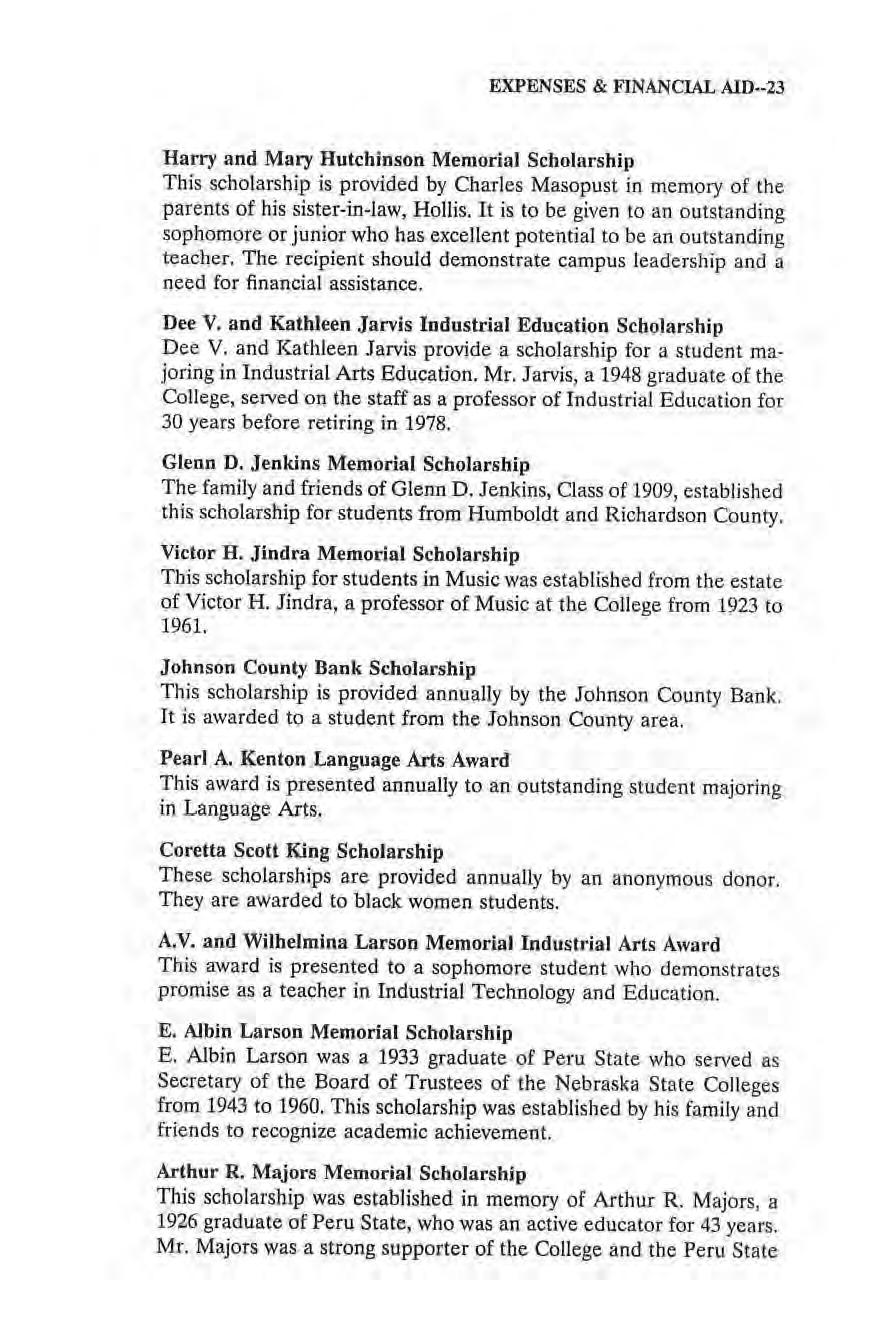
A.V. and Wilhelmina Larson Memorial Industrial Arts Award
This award is presented to a sophomore student who demonstrates promise as a teacher in Industrial Technology and Education.
E. Albin Larson Memorial Scholarship
E. Albin Larson was a 1933 graduate of Peru State who served as Secretary of the Board of Trustees of the Nebraska State Colleges from 1943 to 1960. This scholarship was established by his family and friends to recognize academic achievement.
Arthur R. Majors MemoriaJ Scholarship
This scholarship was established in memory of Arthur R. Majors, a 1926 graduate of P•eru State, who was an active educator for 43 years Mr. Majors was a strong supporter of the College and the Peru State
EXPENSES & FINANCIAL AID--23
College Foundation. The scholarship is awarded to a student majoring in Biology, Chemistry, or Physics.
Ch arles Mas opust Scholarship
This scholarship is donated by Charles Masopust. Although he never attended Peru State, Mr. Masopust developed an interest in the College through his brother Joe, a supporter of the College and Peru resident. This award is given to a deserving student who may not qualify for other scholarship funds based on outstanding academic accomplishments, but who demonstrates personal qualities that are a credit to the College and student body and who distinguishes himself/ herself through involvement in co-curricular activities.
Hollis Hutchinson Masopust Memorial Sch ol arship
This scholarship is donated by Charles Masopust in memory of his sister-in-law, a 1933 graduate of Peru State College. The award is to be given to an outstanding sophomore or junior student who has participated above and beyond average in math and science and to whom this award will make a difference in achieving his/her education.
Joe Masopust Memorial Scholarship
This scholarship is donated by Charles Masopust in memory of his brother, a friend and benefactor of Peru State College. The scholarship is to be given to the outstanding sophomore or junior student who l'tas contributed the most to Peru State College in non-scholastic activities (not sports), has good scholastic potential and to whom this assistance will make a difference in achieving the student's education.
John and Ji'rancis Schima Masopust Scholarship
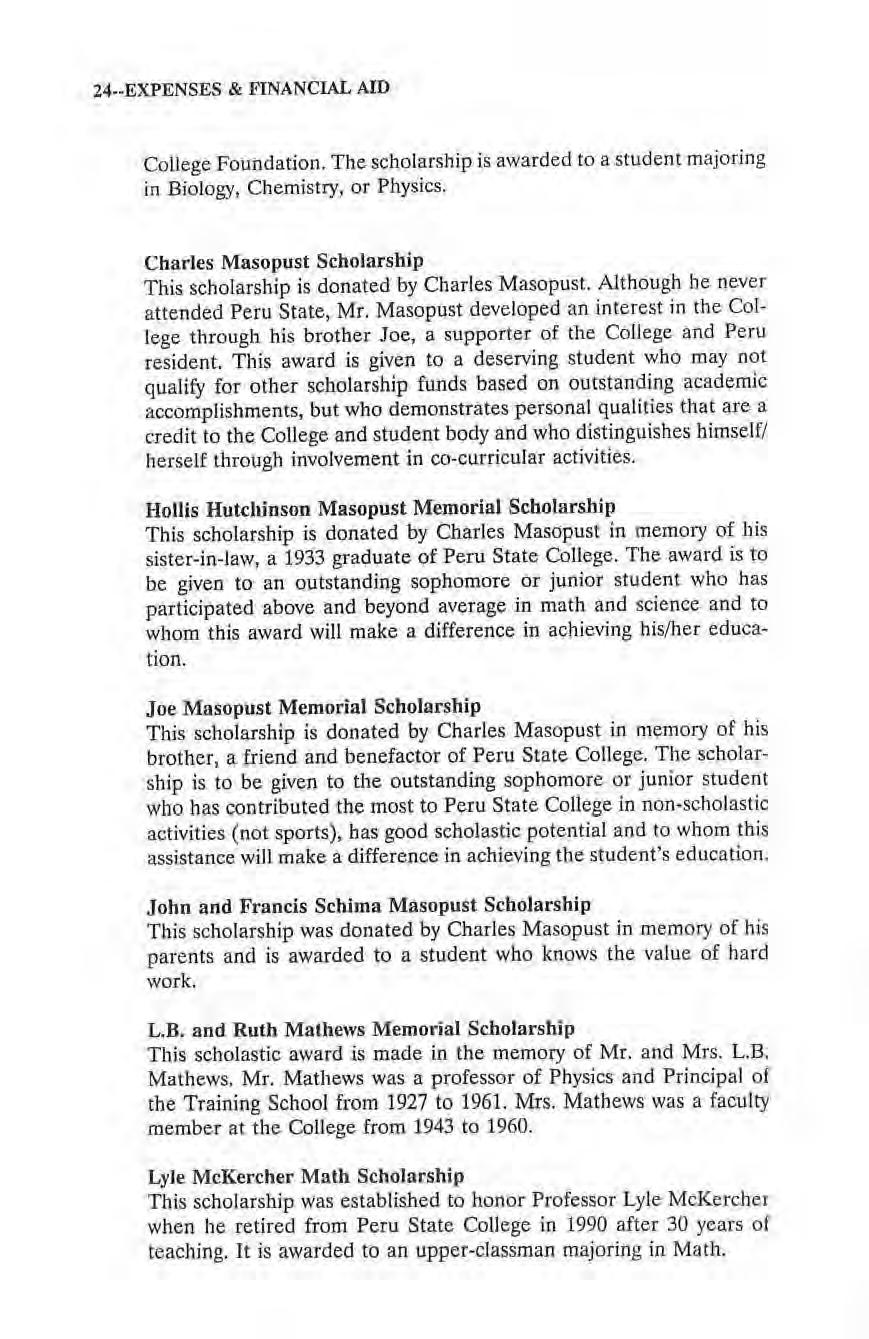
This scholarship was donated by Charles Masopust in memory of his parents and is awarded to a student who knows the value of hard work.
L .B. and Ruth Mathews Memorial Scholarship
This scholastic award is made in the memory of Mr. and Mrs. L.B. Mathews. Mr. Mathews was a professor of Physics and Principal of the Training School from 1927 to 1961. Mrs. Mathews was a facu lty member at the Coliege from 1943 to 1960.
Ly le McKercher Math Scholarship
This scholarship was established to honor Professor Lyle McKercher when he retired from Peru State College in 1990 after 30 years of teaching. It is awarded to an upper-classman majoring in Math.
24 --EXPENSES & FINANCIAL AID
Dr. Joy Elmer Morgan Memorial Scholarship
This scholarship was provided by the estate of Dr. Morgan, a 1912 graduate of Peru State College and long time Secretary of the National Education Association. The award is to be given to outstanding students preparing to become teachers.
The Omaha World Herald Scholarships
Among Peru State College's most prestigious scholarships are the Omaha World Herald Scholarships, funded by the World Herald foundation. Requirements for recipients of these scholarships are the same as the Board of Trustees Scholarships.
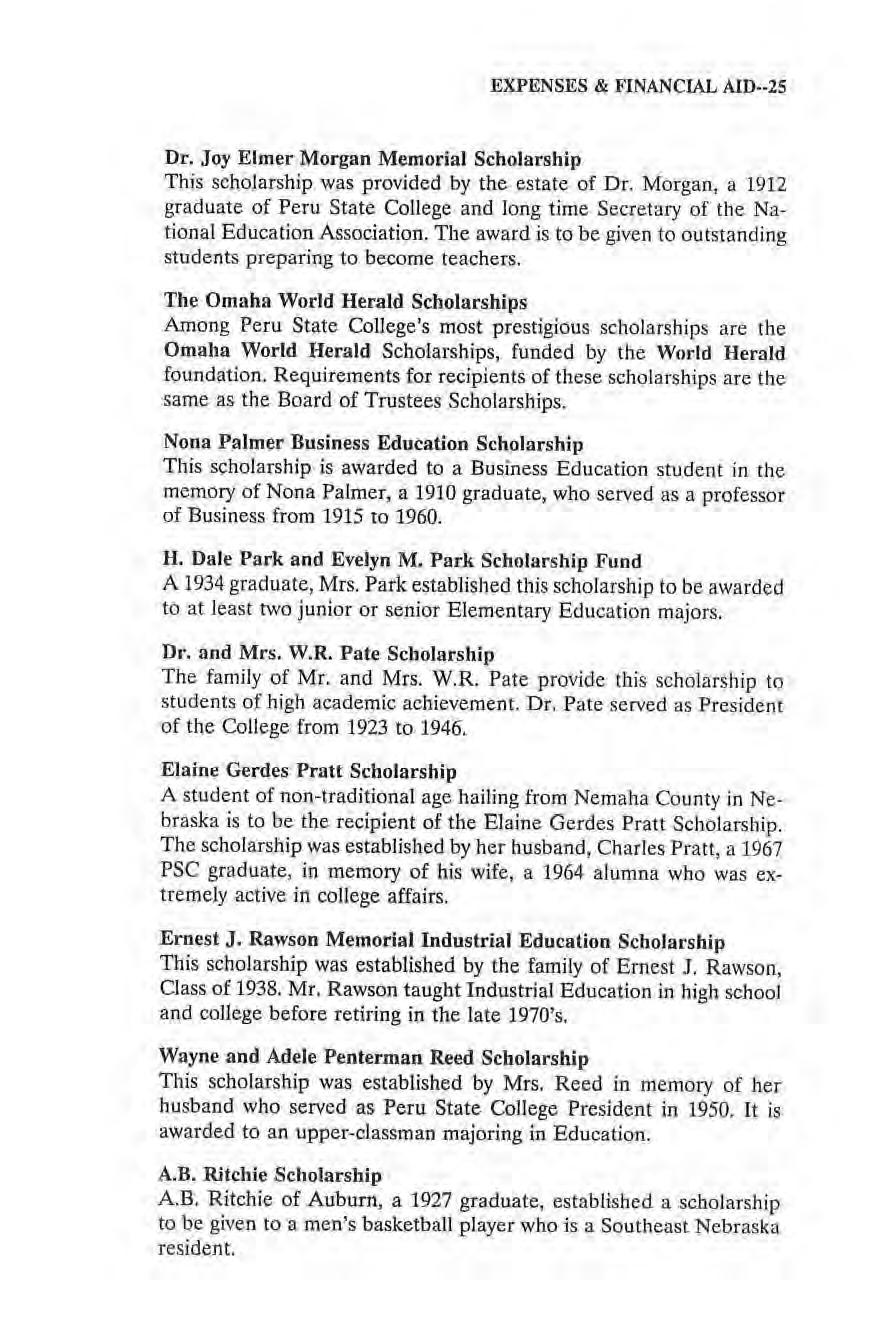
Nona Palmer Business Education Scholarship
This. scholarship is awarded to a Business Education student in the memory of Nona Palmer, a 1910 graduate, who served as a professor of Business from 1915 to 1960.
H. Dale Park and Evelyn M. Park Scholars hip Fund
A 1934 graduate, Mrs. Park established this scholarship to be awarded to at least two junior or senior Elementary Education majors.
Dr. and Mrs. W.R. Pate Sch olarship
The family of Mr. and Mrs. W.R. Pate provide this scholarship to students of high academic achievement. Dr. Pate served as President of the College from 1923 to 1946.
Elaine Gerdes Pratt Scho la rs hip
A student of non-traditional age hailing from Nemaha County in Nebraska is to be the recipient of the Elaine Gerdes Pratt Scholarship. The scholarship was established by her husband, Charles Pratt, a 1967 PSC graduate, in memory of his wife, a 1964 alumna who was extremely active in college affairs.
Ernest J. Rawson Memorial Industrial Education Scholarship
This scholarship was established by the family of Ernest J. Rawson , Class of 1938. Mr Rawson taught Industrial Education in high school a nd college before retiring in the la te 1970's.
Wayne and Adele Penterman Reed Scholarship
This scholarship was established by Mrs. Reed in memory of her husband who served as Peru State College President in 1950. I t is awarded to an upper-classman majoring in Education.
A.B. Ritchie Scholarship
AB. Ritchie of Auburn, a 1927 graduate, established a scholarship to be given to a men's basketball player who is a Southeast Nebraska resident.
EXPENSES & FINANCIAL AID--25
Jose ph R ob ertson F oreig n Stu de nt Schol arship
This scholarship is provided by Joseph R obertson, a 1928 graduate, for a foreign student.
C la re n ce L. a nd Mild re d R usse ll Memo l'i al Sch o lars hip
This scholarship was established in memory of the Rus sells. Mr , Russell was a 1917 graduate of Peru State, and the Ru ssells were long time supporters of the College. The recip ient of the scholarship is to be in the Industrial Technology and Education program and is selected by the faculty of the department.
Ru th M . Ru sse ll Sch olars hip F und
This fund was created by family and friends of Mrs. Russell, a long time Peru resident, in honor of her 100th birthday. Students eligible for this scholarship shall have graduated in the upper one-third of their high school class The scholarship shall alternate each year between students studying in the Arts/Humanities and Science.
Vince S ab atin e lli Me moria l S chol ars hip
This scholarship is awarded to a deserving athlete in the memory of Vincent Sabatinelli, a former member of the Peru State football team, who gave his life in the seivice of his country in Vietnam.
George Schotte nhame l Sch ola rs h ip
This sc holarship is in memory of George Schottenhamel, Professo r of Social Sciences at the College from 1957 to 1987. It is awa rd ed to a student studying History, Social Science or Fine Arts,
Ke n S ims Indu stria l Arts S ch ol ars hip
T h is me morial schol a rship was established by Mr. Sims' wife, Linda. Both graduated from Peru State College in 1964. It is awarded to a student majoring in Industrial Technology.
Cha rl es Fred S p eck a nd Lilli a n Mae S mith Sc hol a rs hip
C.F, Speck endowed this scholarship in memory of his a unt, Lillian Mae Smith, an 1894 graduate of Peru State and long-time educator. T.he recipien t is to be a woman majori ng in E lementary Education.
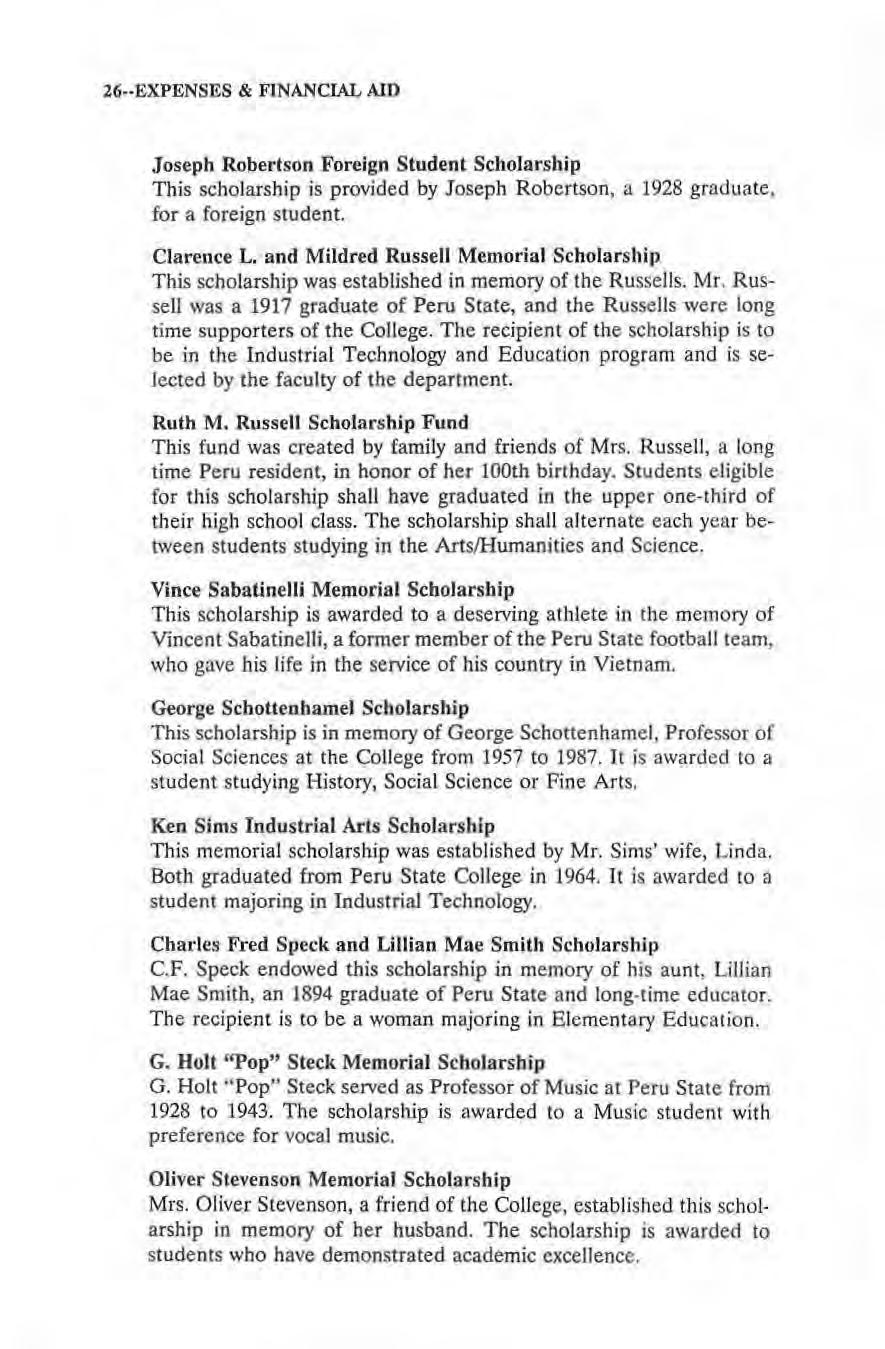
G. Holt "Pop" Stec k Memorial Sc holars h i p
G. Holt "Pop" Steck served as Professo r of Music at Peru Sta te from 1928 to 1943 . The scholarship is awarded to a Music student with preference for vocal music.
Oliver Steven so n Me moria l Sch o la rs hi p
Mrs. Olive r Stevenson, a friend of t he College, established this scholarship in memory of her husband. The scholarship is awarded to s tudents who have demonstrated academic excellence,
26--EXPENSES & FJ NANCJAL AID
B. E. Swenson, Jr. Athletic Award
This award was established in 1925 by Bert E. and Stella Swenson in memory of their son B. E. Jr., and their parents who made possible their early education at Peru. Juniors and seniors are eligible for the award based on general character and personality, scholarsh ip, school loyalty, and athletics. A student may win the award only once.
Bill and Jeanne Tynon Memorial Scholarship
This award is presented to a Nebraska resident student in good standing who has participated in inter-colJegiate sports at Peru State College. The Bill Tynon Memorial Scholarship fund was established by Mrs. Jeanne Rhinehart Tynon, a 1965 graduate, in memory of her husband, a 1964 graduate of Peru State, who was active in athletics at the college. Jeanne Tynon passed away in 1986 and the name of the scholars hip has been changed in memory of Jeanne also.
Maude Phelps Vacek Scholarship
This scholarship was established by her children and grandchildren. It is awa rded to a full-time student living in Pawnee City or Pawnee County who will be pursuing a degree in teacher education.
Evan Van Zant Teacher Education Scholarship
The recipient of this scholarship is selected by the Educatio n Division for academic excellence, dedication to the teaching profession, and an aptitude for teaching. It was established in the memory of Evan Van Zant, Professor of Education from 1961 to 1980.
John and Daisy Clark Wear Scholarship
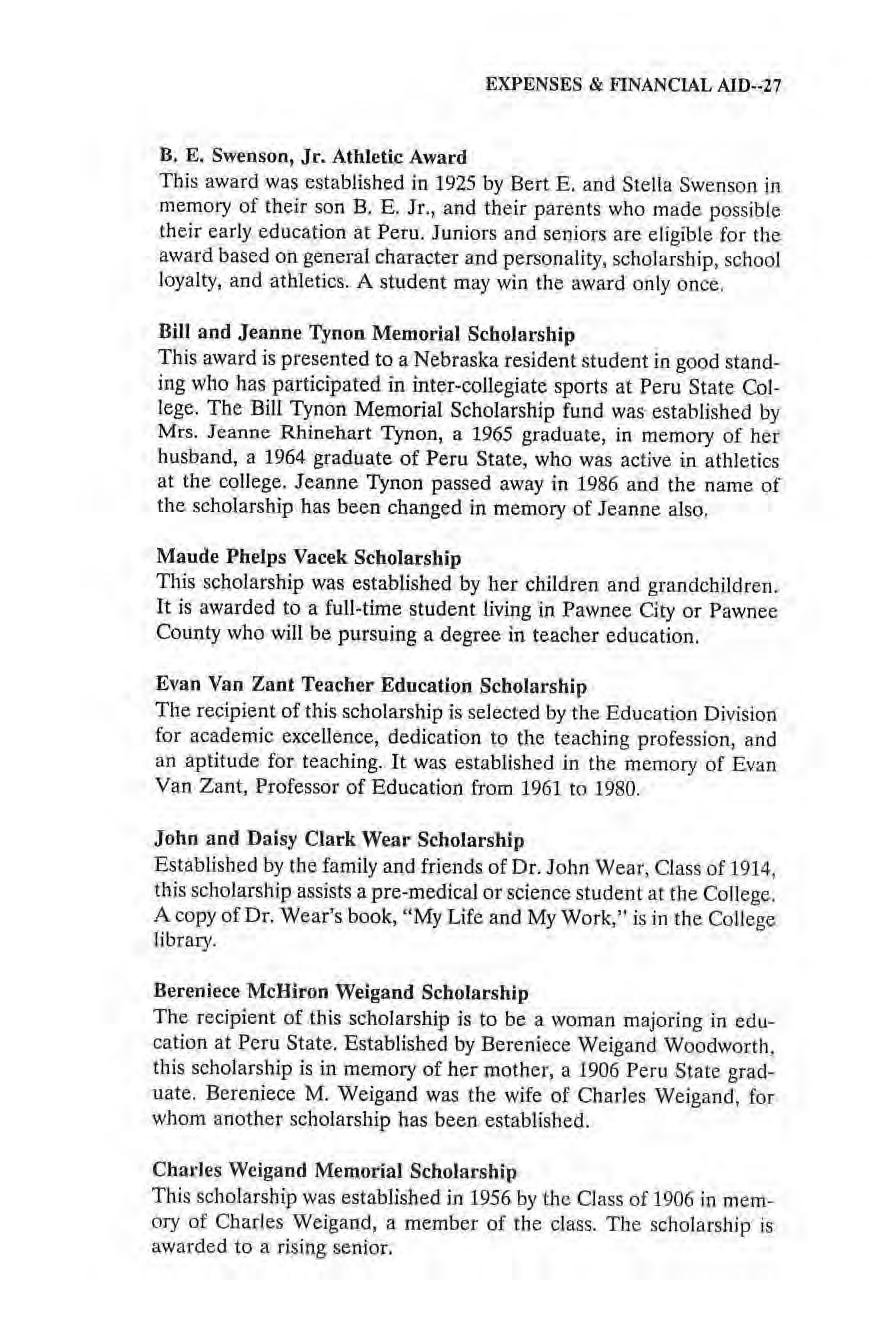
Established by the family and friends of Dr. J ohn Wear, Class of 1914, this scholarship assists a pre-medical or science student at the College. A copy of Dr. Wear's book, "My Life and My Work," is in the College library.
Bereniece McHiron We~gand Scholarship
The recipient of this scholarship is to be a woman majoring in education at Peru State. Established by Bereniece Weigand Woodworth, this scholarship is in memory of her mother, a 1906 Peru State graduate. Bereniece M. Weigand was the wife of Charles Weigand, for whom another scholarship has been established.
Chal'les Weigand Memoria l Scholarship
This scholars hip was established in 1956 by the Class of 1906 in memory of Charles Weigand, a member of the class. The scholarship is awarded to a rising senior.
EXPENSES & FINANCIAL AID--27
Lisa Jo Weis Sc ho larsh ip
The Lisa Jo Weis Scholarship is awarded to a freshman volleyball player who is not recruited, who has not been recruited for any other sport, and who would be primarily a setter.
Whee ler Language Arts Sch ol ars hip
Mr. and Mrs. Dennis Wheeler provide a scholarship that is awarded to a L anguage Arts major at the College.
T he Al Whee ler Sch o la rs hip
Funds for this scholarship have been provided by Fran Wheeler Kendrick, son Dr. Al Wheeler, Jr., a nd frien ds of the long-time coach and athletic administrator who served Peru State from 1938 to 1965. The recipient is to be a male majoring in Physical Education, who participates in intercollegiate athletics, with preference given to a football player.
Pau l V. and Marga ret T hom as Wil cox
This scholarship was established by Mrs. Wilcox. Paul and Margaret were students at PSC in the early 1920's. Paul was active in sports whi le a student on campus and is credited with giving Peru State the nickname of Bobcats. There are no restrictions for this scholarship.
Ha ro ld E. Willey Memo rial Sc ho la rs hip
Mr Willey, who was a farmer near Mead, is memorialized in this endowment. Scho larships are awarded to students who are ch ild ren of farm or ranch families or their employees, and who are of sophomore rank or above, with a B average.
Jack D . an d Eul a M. Wol ke n Schol a r ship
No restrictions. Amount of scholarship should be sufficient to pay the majority of tuition for one year.
Ze lma R. Wo nde rly Award
This annua l award is presented to an outstanding second grade student teacher.
Will ia m Henry Wo r tm an Memoria l Scholars hip
This scholarship is awarde d to minor ity students with a preference being given to Native Americans. It was established by the family and friends of William Henry Wortman.
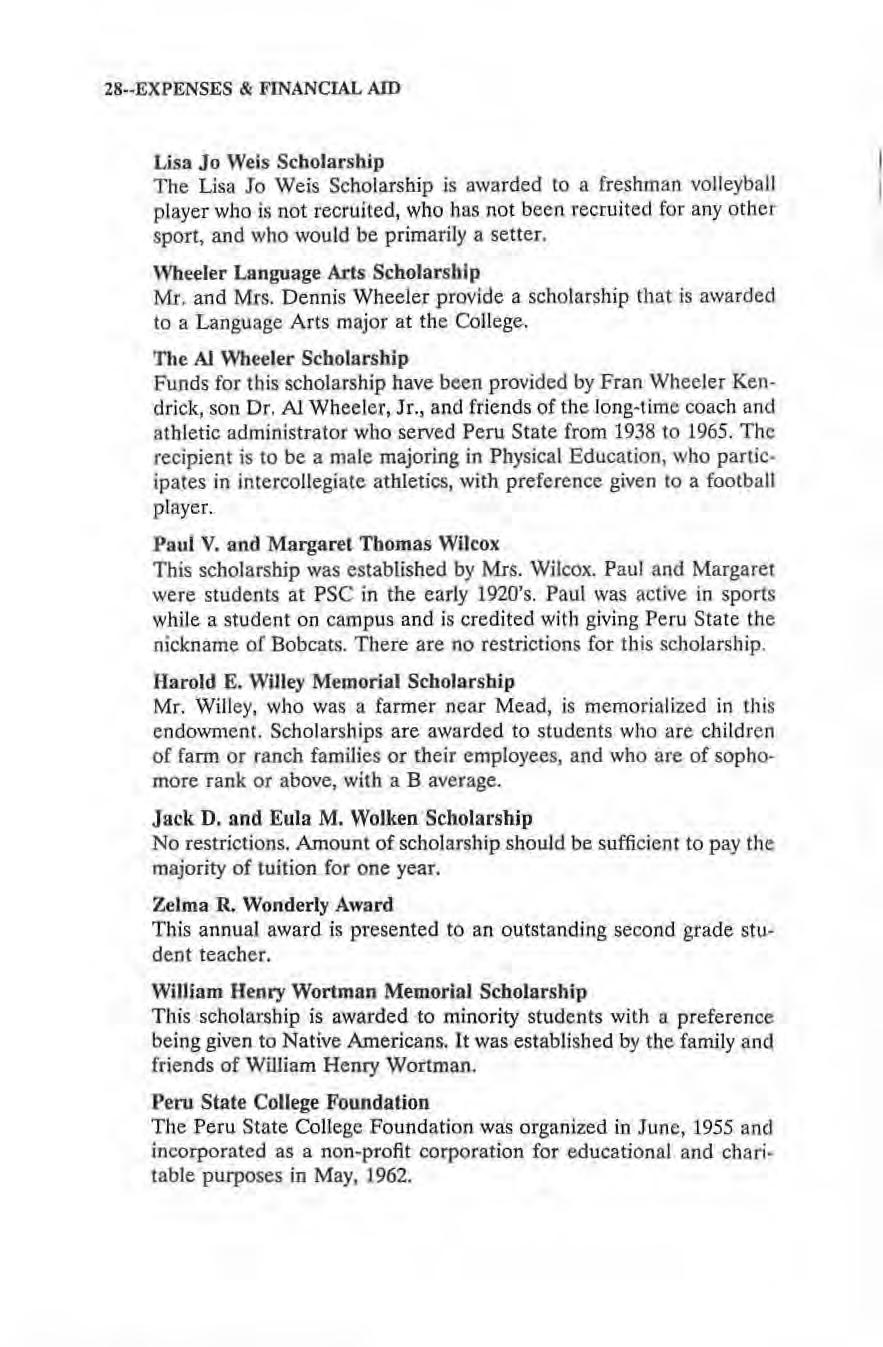
Peru State College Foundation
The Peru State College Foundation was organized in June, 1955 and incorporated as a non-profit corporation for educational and charitable purposes in May, 1962.
28--EXPENSES & FINANCIAL AID
STUDENT SERVICES
Student Affairs Mi ssion Stateme nt
The mission of Student Affairs is to provide an environment that supports the development of the student as a who le person. Education of the whole studen t encompasses academic training as well as social, spiritual, cul tural , physical a nd emotional development. Student Affairs encourages students to be active participants in the formation and fruition of their educa tional process to clarify values, to solve problems an d to discover, app ly and integrate knowledge.
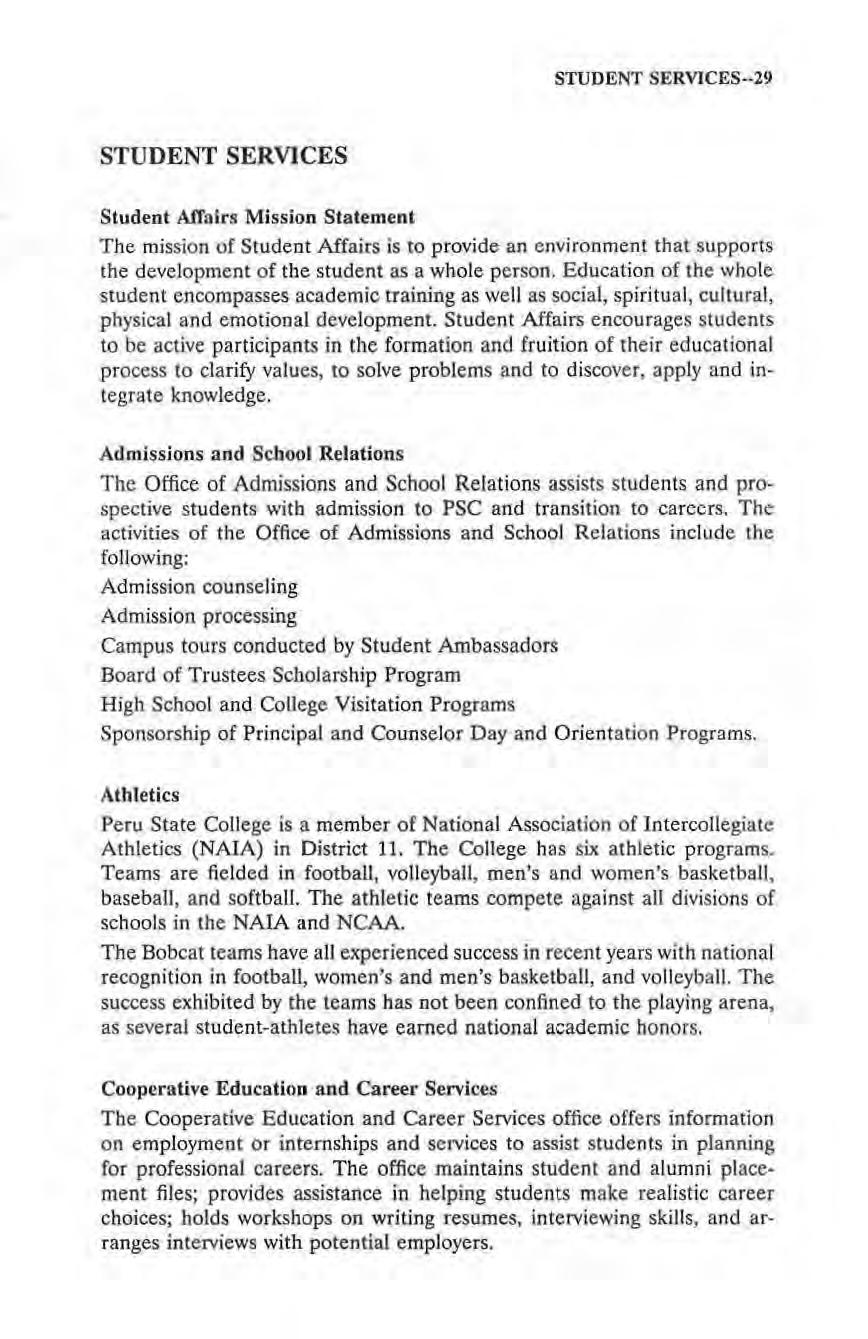
Ad m iss io ns a nd Scho() I Rela tio ns
The Office of Admissions and School Relations assists st udents and prospective students with admission to PSC and transition to careers. The activities of the Office of Admissions and School R elations include the following:
Admission co unseling
Admission processing
Campus tours conducted by Student Ambassadors
Board of Trustees Scholarship Program
High School and College Visitation Programs
Sponsorship of Principa l and Counselor Day and Orientation Programs
Athlet ics
Peru State College is a member of National Association of Intercollegiate Athletics (NA1A) in District 11. The College has six athletic programs. Teams are fi e lded in football, volleyball, men's and women's basketball , baseball, a nd softball. The athletic teams compete against all divisions of schools in the NAIA and NCAA.
The Bobcat teams have all experienced success in recent years with national recognition in football, women's and men's basket b all, and volleyb al l. The success exhibited by the teams has not been confined to th e playing arena, as several st udent-athletes have earned national academic ho nors.
Coo perati ve Educa ti o n a n d Career Services
The Cooperative Education and Career Services office offers information on employment or internships and services to ass:ist st ud e nts in planning for professional caree rs The office maintains student and alumni placement files; provides assistance in helping students make realistic career choices; holds workshops on wr iting resumes, interviewing skills, and arranges interviews with potential e mployers.
STUDENT SERVICES--29
The Cooperative Education and Career Services office provides the following resources and materials:
Bulletin Board and Notebooks of Current Job Listings
Career Information
Internship and Cooperative Education Listings
Study Abroad Opportunities
Summer Employment Job Listings
Test Application/Study Guides for GMAT, GRE, LSAT, MAT, and NTE Testing administered for: ACT/ACT Residual, P PST, MAT. and CLEP Undergraduate/Graduate Program Directories for U.S. and I nternational I nstitutional Institutions and Programs.
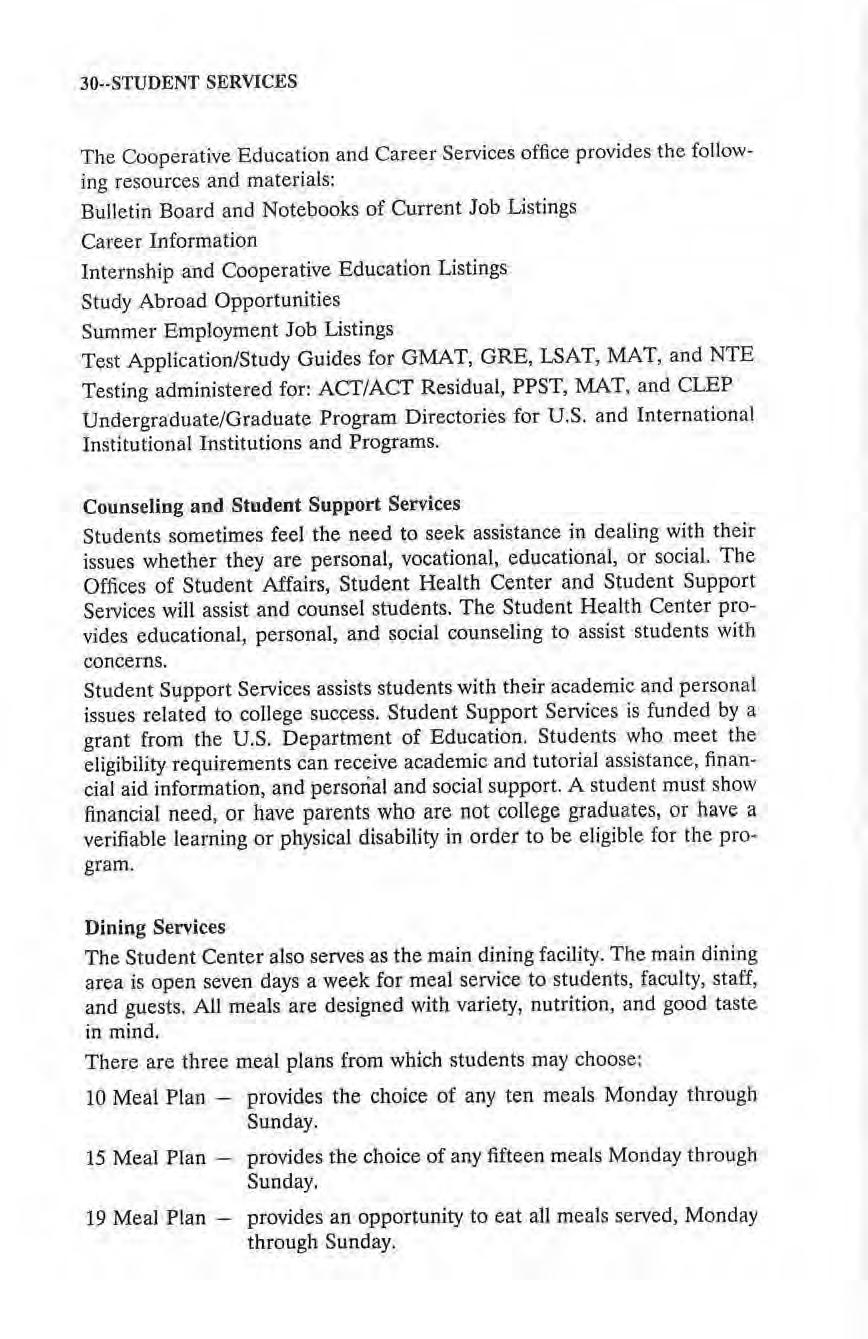
Counse lin g and Student Support Services
Students sometimes feel the need to seek assistance in dealing with their issues whether they are personal, vocational, educational, or social. The Offices of Student Affairs, Student H ealth Center and Student Support Services will assist and counsel students. Tile Student Health Center provides educational, personal, and social counseling to assist students with concerns.
Student Support Services assists students with their academic a nd personal issues related to college success. Student Support Services is funded by a grant from the U.S. Department of Education. Students who meet the eligibility requirements can receive academic and tutorial assistance, financial aid information, and personal and social support. A student must show financial need, or have parents who are not college graduates, or have a verifiable learning or physical disability in order to be eligible for the pro • gram.
Dining Services
The Student Center also serves as the main dining facility. The main dining area is open seven days a week for meal service to students, faculty, staff, and guests. All meals are designed with variety, nutrition, and good taste in mind.
There are three mea l plans from which students may choose:
10 Meal Plan - provides the choice of any ten meals Monday through Sunday.
15 Meal Plan - provides the choice of any fifteen meals Monday through Sunday.
19 Meal Plan - provides an opportunity to eat all meals served, Monday through Sunday.
30--STUDENT
SERVICES
The contracted food service vendor offers a meal plan for commuter students. Students may purchase a punch ticket from the Food Service office and use it in the cafeteria. Punch tickets can be purchased for any meal or a combination of all meals. The "Bob Inn" is also located in the Student Center and offers grill items, deli sandwiches, pizza, coffee and cold drinks.
Financial Aid
The College provides a variety of ways for students with limited resources to meet educational costs. An extensive program of Federal and State grants, scholarships, loans, and jobs are available to students with financial need. A Free Application for Federal Aid mus t be completed and filed. The U.S. Department of Education will determine the student's need and eligibility. (See Expenses and Financial Aid section in this catalog for further information.)
Intramurals and Recreation
Intramurals and other rncreational activities offer each individual an opportunity to choose the type of activity in which they wish to participate. Intramural activities are offered each semester and are coordinated by the Athletic Department. Other recreational opportunities for students include use of the weight room, pool, hiking/fitness trail, and the Al Wheeler Activity Center. Activities are added to the program as the needs and interests indicate depending large ly on the participation of the students and their involvement.
Orientation
The College conducts several orientation sessions designed to address the special concerns of incoming students. Each program acquaints students ( and their parents) with the College and campus life. The goal of the orientation program is to have the student leave campus that day being knowledgeable about college life, academically advised, and registered. The New Student Weekend is the first weekend prior to class each Fall semester. The weekend is designed to acquaint students with their new campus and expose them to new skills that will help them be successful both academically and socially.
Residence Hall s and Living Accommodations
All req uests for information about living accommodations sho uld be directed to the Office of Residence Life. The schedule of room and board rates is listed in the Expenses and Financial Aid section of the catalog. Living in a residence hall exposes students to a wonderful new environment; it is a living-learning environment that strives to assist students with their academic and personal development.

STUDENT SERVICES- -31
There are many advantages to living in the residence haJls, with the most obvious being their proximity to the College's educational and recreational facilities. The library, laboratories, music practice rooms, workrooms, and the campus recreational centers are only a short walk from any residence hall.
Resid ence hall living affords students considerable freedom. Paraprofessional staff members supervise and assist stude nts with educational and social programs, augmenting the academic program. These programs provide the assistance that may be needed to adjust to college life.
Peru State offers a variety of alternative living accommodations for student s to choose from. There are separate residence halls for men and women as well as co-educational halls. Each residence hall has its own visitation policies and unique physicaJ layout. Students are responsible for supplying their own linen and bedding including pillows and mattress pads. Residents are we lcome to bring other personal items from home such as radios, stereos, etc. Hot plates, microwave ovens, and air conditioners are not permitted. The lower level of each hall is equipped with kitchen facilities, microwave oven, washers and dryers, and recreationa l eq uipm ent such as pool and ping-pong tables.
The residence hall and/o r food contracts are for the full academic year. Students should understand that the contract is a financially binding agreement that obligates them for rental rates for the academic year. Contracts will be voided only for the following documentable reasons: unforeseen financial hardship, medicaJ, withdrawal from college, graduation, transfer, or marriage (a ppropriate verification is required).
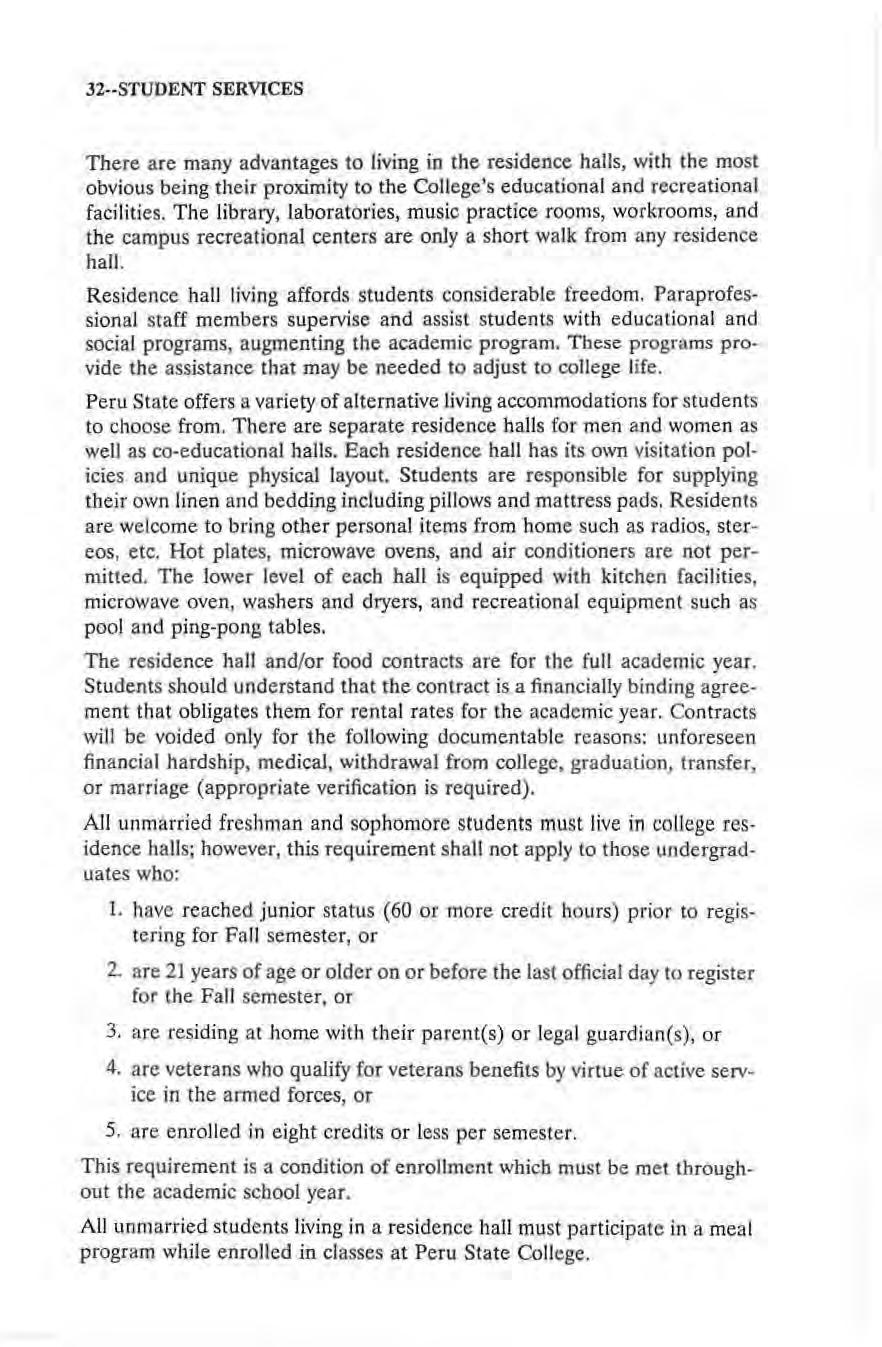
All unmarried freshman and sophomote s tudents must live in college residence halls; however, this requirement shall not apply to those undergraduates wbo:
1. have reached junior status (60 or more credit hours) prior to registering for Fall semester, or
2. are 21 years of age or older on or before the last official day to register for the Fall semester, or
3. are residing at home with their parent(s) or legal guardian(s), or
4. are veterans who quaJify for veterans benefits by virtue of active service in the armed forces, or
5. are enrolled in e ight credits or less per semester. This requirement is a condition of enrollment whicb must b e met throughout the academic school year.
All unmarried students living in a residence hall must participate in a meal program while enrolled in classes at Peru State College.
32--STUDENT SERVICES
Centennial Complex
I n the Fall of 1967, a new co-educational residence hall complex was opened to commemorate Peru State's first one hundred years of service. The Centennial Complex consists of three groups of two residence halls each, which house sophomores, juniors, seniors and graduate students. Davidson/Palmer Hall houses both men and women in separate wings. Clayburn/Mathews Hall is co-educational. Nicholas/Pate Hall houses both single and married/family s tudents.
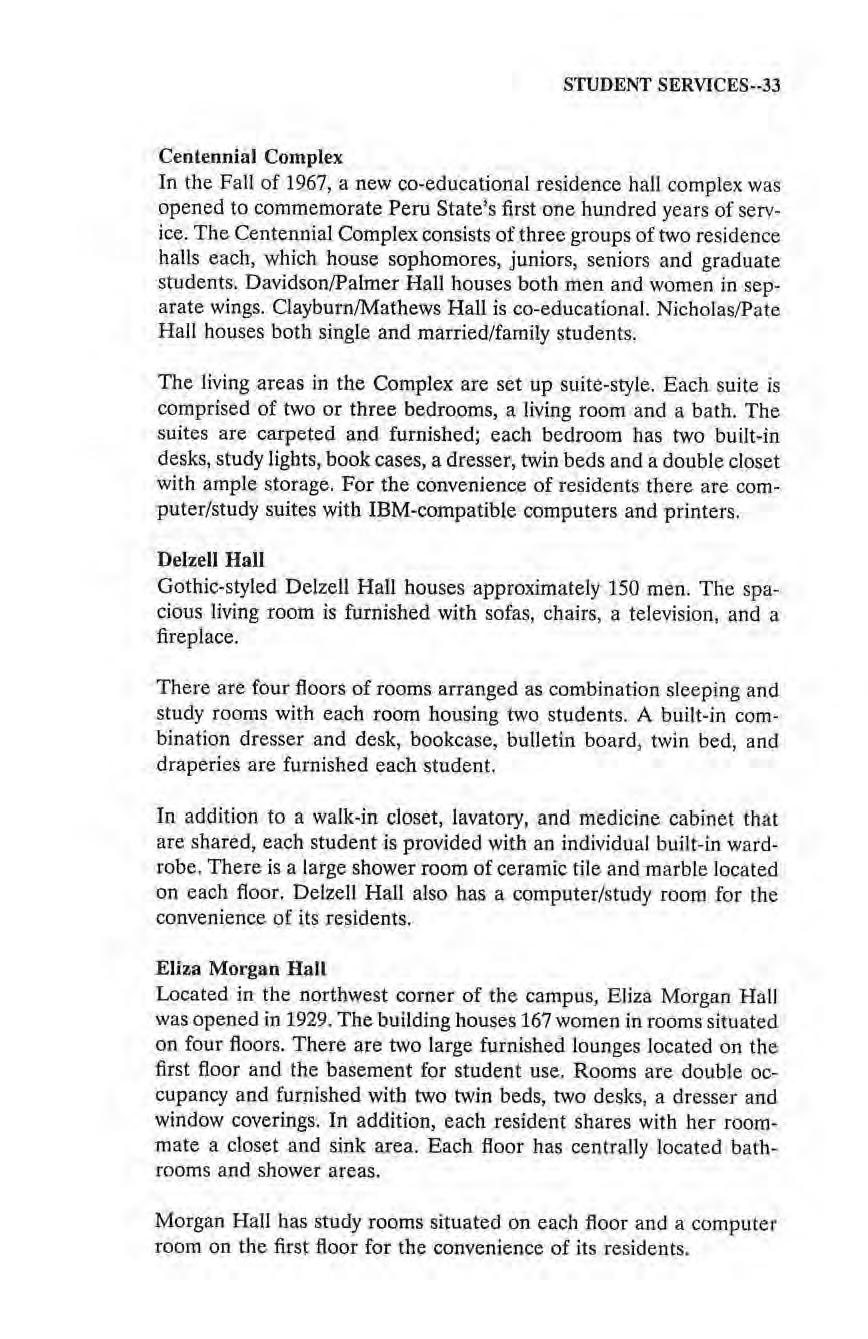
The living areas in the Complex are set up suite-style. Each suite is comprised of two or three bedrooms, a living room and a bath. The suites are carpeted and furnished; each bedroom has two built-in desks, study lights, book cases, a dresser, twin beds and a double closet with ample storage. For the convenience of residents there are computer/study suites witb IBM-compatible computers and printers .
Delzell Hall
Gothic-styled Delzell Hall houses approximately 150 men. The spacious living room is furnished with sofas, chairs, a television, and a fireplace.
There are four floors of rooms arranged as combination sleeping and s tudy rooms with each room housing two students. A built-in combination dresser and desk, bookcase, bulletin board, twin bed, and draperies are furnished each st udent.
I n addition to a walk-in closet, lavatory, and medicine cabinet that are shared, each student is provided with an individual built-in wardrobe. There is a large shower room of ceramic tile and marble located on each floor. Delzell Hall also has a computer/study room for the convenience of its residents.
Eliza Morgan Hall
Located in the northwest corner of the campus, Eliza Morgan Hall was opened in 1929. The building houses 167 women in rooms situated on four floors. There are two large furnished lounges located on the first floor and the basement for student use, Rooms are double occupancy and furnished with two twin beds, two desks, a dresser and window coverings. I n addition, each resident shares with her roommate a closet and sink area. Each floor has centrally located bathrooms and shower areas.
Morgan Hall has study rooms situated on each floor and a computer room on the first floor for the convenience of its residents.
STUDENT SERVICES--33
Oak Hill Married/Family Student Hou s ing
Th e r e are o ne and two bedroom units available in Oak H i ll. Eac h unit is furni s he d with a stove and refr ige rator. M a rried/fa mily housin g apa rtment s are leased on a renewable sem ester basis. A deposit is required and is refundable a t the end of the lease agreement provided the prope rty is left in good conditio n. Rent is due the first of the mo nth and is payable in the College business office.
Inquiries abou t married/family housing m ay be made at the Office of Residence Life.
S t udent Handbook
The Student H andbook is a g uide for college success, colJege services, campus living and student conduct. Students are ex pected to acqu a int themselves and comply with the rules and policies within this catalog and Student Handbook.
Student Health Services
The College maintains its H ealth Cente r in AD. M ajors H a ll. Students may visit the college nurse, doctor or counselor at the H ealt h Center during regul arly scheduled office ho urs or make ap pointments through the nurse with ot her health ca re providers. Some nonprescription drugs, first-aid, and primary care are ad ministered at the H ealth Center. The College's resp ons ibility for medical expen ses is limited to these services. It is recommended that students have health insurance. The College doe s not insure stud ents for health care. Students who wish to participate in intercollegiate at hletics must b e certified each season as physically fit by a physician and provide insurance information before beginning their sp o r t.
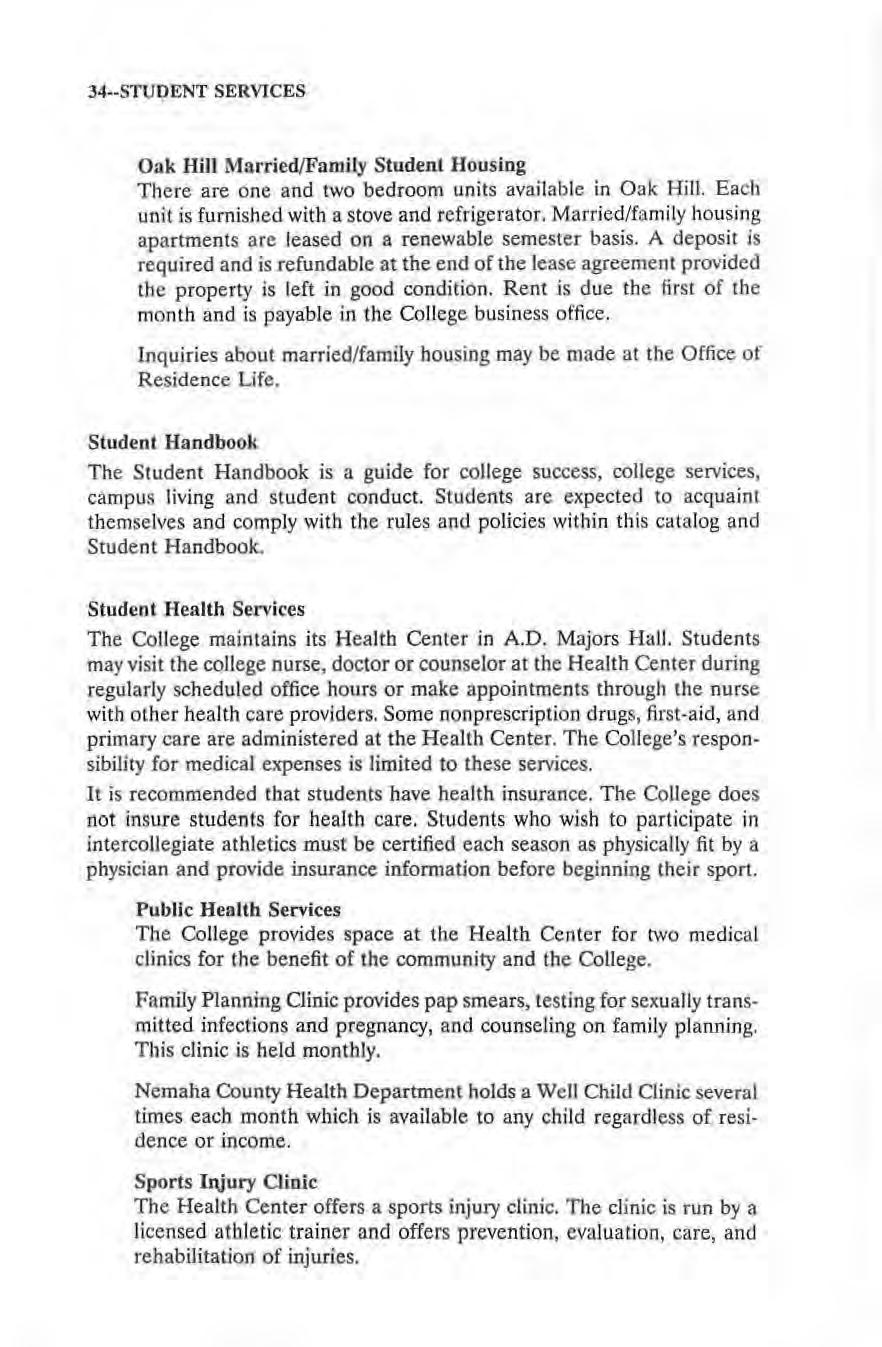
Public Health Services
The College provides space at the Health Center for two medical clinics for the benefit o f the community and the College.
Family Planning Clinic provides p ap smea rs , testing for sexually transmitted infections and pregnancy, and counseling on fami ly planning. T his clinic is held monthly.
Nemaha County Health D e partment holds a We ll Child Clinic several times each month which is available to any child regardl ess of r esidence or income.
Sports Iajury C linic
The Health Center offers a sports injury clinic. The clinic is ru n by a licensed athletic trainer and offers prevention, eval uatio n, care, and rehabilitation of injuries.
34--ST UOENT SERVICES
Student Programs and Student Life
Peru State College provides opportunities for students to grow outside the classroom setting.
Student life on campus may be enhanced through many avenues. Students have the opportunity to become an integral part of campus activit ies through Student Senate, the student governing body of the campus. The Student Senate provides a link between the College faculty and adm inistration and the student body by setving on many College committees. The student representative to the State College Board of Trustees also reports regularly to the Student Senate. The Student Senate is an elected body representative of the student community.
Students may also elect to be involved in Campus Activities Board (CAB), a volunteer student organization that provides campus educational, social, cultural, and recreational programs. CAB offers individuals opportunities to select, develop, and present quality programming. Throughout the year CAB sponsors a wide variety of activities including: professional artists, dances, picnics, non-traditional student programming, low-budget activities, ethnic cultural events, Women's History Month, Homecoming and Spring Fling activities.
Students also have the opportunity to become involved in other organizations on campus. Participation in these organizations a nd programs provides students an opportunity to develop leadersh ip and social skills.
Student Organizations
Students at Peru State may participate in a wide variety of student organizations for their personal, social, academic, or professional benefit.
The Art Club is a social club for art majors and students interested in art
The Accounting Association is affiliated with the Institute of Management Accountants. Its purpose is to increase student awareness of careers in accounting and to inc rease employers' awareness of Peru State graduates.
The Association of Challenged and Enabled Students (ACES) provides support and information for those having or concerned with learning disabilities or physical disabilities and to expose the nondisabled population to a more realistic perspective of those with disabilities.
The Campus Activites Board (CAB) is the central agency to provide and assist with co-curricular and recreational programs for the benefit of PSC and the surrounding community, and to develop sound student leadership through planning and executing co-curricular activities.
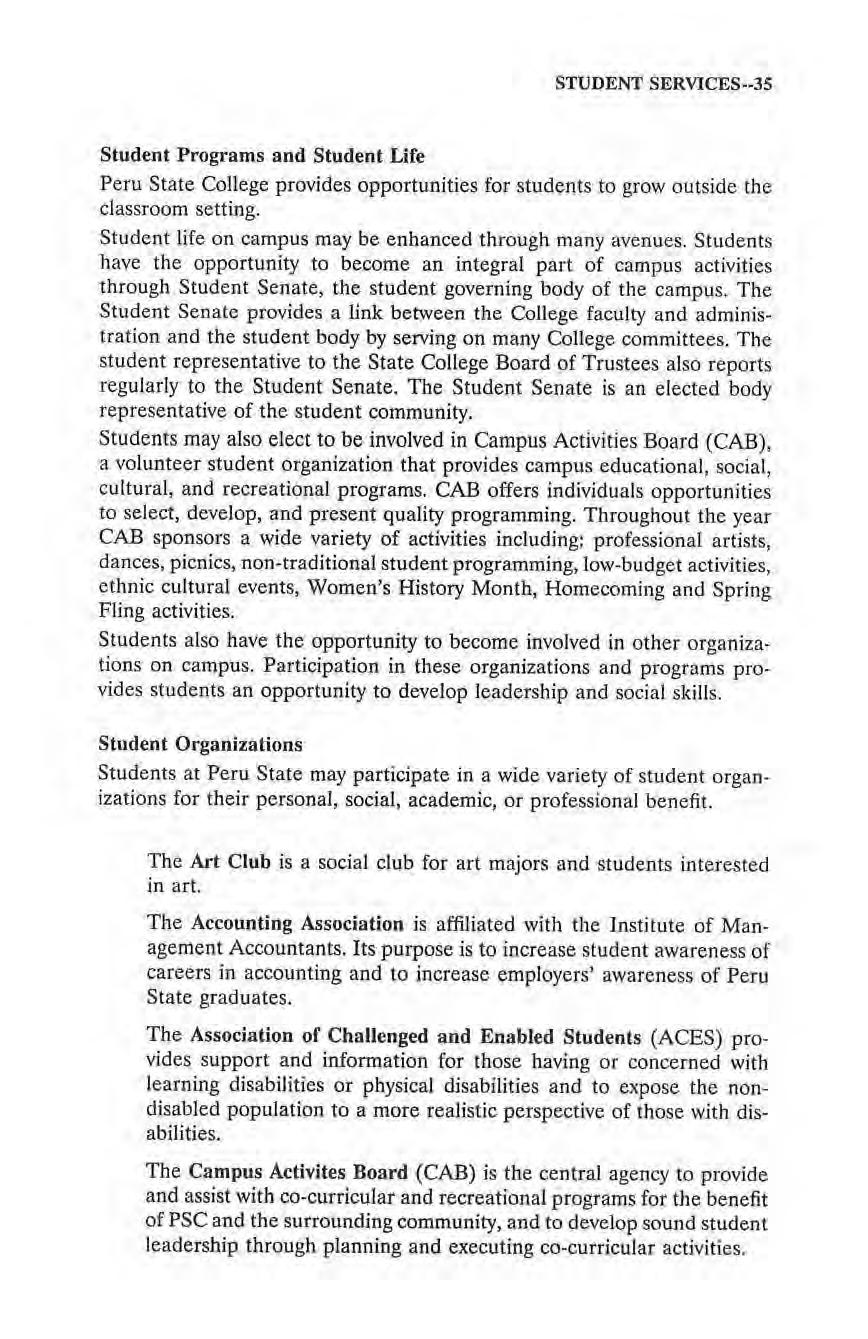
STUDENT SERVICES--35
The English Club promotes the mastery of written expression, encourages worthwhile reading, and fosters fellowship among students specializing in English or literature.
The Industrial Arts Club is devoted to promoting interest in the industrial arts and vocational education.
The Multicultural Committee is a campus-wide committee composed of students, faculty and staff that assists the campus in increasing awaren ess and respect for the variety of cultures that inhabit the earth.
The Peru Players is the state' s oldest college dramatic organization, The members assist in presenting the best in drama to the College and the community. The Peru Players membership is open to all interested students.
The Peru Social Science Society strives to provide an informal setting for socialization and discussion.
Peru State Management Association is open to all students and provides a wide range of activities to enhance members' knowledge in the field of Business Management.
Phi Beta Lambda is a state and national business fraternity. Peru State's chapter, Epsilon Tau, is open to all students interested in business.
The Student Education Association is an organization for potential teachers and is affiliated with the Nebraska State Education Association and the National Education Association. Its activ ities are devoted to the improvement of education.
The Varsity Club is made up of stude nts who have lettered in an intercollegiate sport. Th e club's purpose is to foster good sportsmanship.
The Weekend Club provides members a wide range of cuJtural and recreational activities on weekends.
The Wildlife Club stresses the importance of maintaining wildlife in the region.
Honorary Societies
A1pha Chi is the College's national honorary scholarship society. I t recognizes academic scholarship, good reputation, and character. The society's members are selected from the top ten percent of the junior and senior classes.
A1pha Mu Omega is an honorary mathematics fraternity which aims to develop and promote interest in the study of mathematics. Students

36--STUDENT
SERVICES
with above-average grades in mathematics who have taken at least ten hours of mathematics are eligible for membership.
Alpha Psi Omega, the national honorary theater fraternity, is represented on the Peru State campus by the Zeta Lambda Chapter. Scholastic ability and active theater participation are the criteria for membership.
Beta Beta Beta is the College's professional honorary biology fraternity open to junior and senior biology students. Candidates for membership must have above-average grades and plan to continually study biology.
Epsilon Pi Tau, an honorary professional fraternity in technology education, selects juniors and seniors based on their grade point averages in the industrial arts and other fields.
Kappa DeJta Pi is a national honorary education fraternity open to juniors who rank in the upper quintile of their class and who show evidence of a contin ued interest in education.

Lambda Delta Lambda is an honorary fraternity for students interested in physical science.
Phi Alpha Theta, a national honorary history fraternity, is open to students with more than 12 hours of history and high scholastic standing.
Sigma Tau Delta, the national honorary English fraternity, granted Peru State its Phi Alpha Chapter in 1926. Students who demonstrate an inte r est in literature and creative writihg and who are above average in scholarship are eligible for membership. The chapter assists the English Club in publishing Sifting Sands.
Music Organizations
The College's band program is divided into the Marching Band, the Conce1·t Band, and the Instrumental Ensembles.
The Peru Chorus is open to all students and is devoted to the study and performance of choral literature.
The Student M.E.N.C. is the student chapter of the Music Educators National Conference and is open to all students interested in music. The club annually sponsors instrumental and vocal clinics, as well as other musical productions.
Religious Organizations
There are several religious groups available to Peru State studentscurrent'Jy there is the Fellowship of Christian Athletes, the U nited Ministry to Higher Education, and the Campus Crusade for Christ.
STUDENT SERVICES--37
S tud ent Government
The S tudent Senate of Peru State College consists of elected representatives from a variety of constituencies and is dedicated to focusing student interests and opinions in the operation of the College. The Senate has voting- members on the College Affairs Council, L ibrary Committee, Teacher Education Committee, and Student Affairs Commission; it has non-voting membership on Faculty Senate.
Residential Ha ll Council s are representative councils selected by the members of each residence hall. These governing bodies r ecom mend solutions to student issues, plan educational and social activities for hall residents, and recommend b u ilding improvements.
Student Publicatio n s
The Peru State Times is the official college newspaper. It is published during the school year under the supervision of an academic advisor. Student contributions are welcomed.
The P innacle is a monthly newsletter publisned by Residence Life, Campus Activities Board and Intramurals. The Pinna cl e reports on activities that have taken place in the above areas, as well as provides information about up-coming events and activites.
Sifti ng Sands is a magazine of student writing that is published in the spring by the English Club and Sigma Tau Delta.
STUDENTS RIGHTS , FREEDOMS, AND RESPONSIB ILITIES
The role of Peru State College is to encourage people of all ages to develop th eir skil ls and talents, according to individual abilities and inte rests, so that collectively they contribute to the continuum of democracy. College policies, procedures, and regulations are formulated to guarantee each student's freedom to learn and to protect the constitutional rights of others. The concept of rights and freedoms, no matter how basic or widely accepted, carries with it corresponding responsibilities. Students, as well as other members of the College community, enjoy the same constitutional and civil rights guaranteed all citizens; at the same time, they are subject to the laws of the nation, the State of Nebraska, the local communjty and the College. All members of the College community have a strong r esponsibility to protect and maintain an academic climate in which the freedom to learn can be enjoyed by all. To this end, certain basic regu lations and policies have been developed to govern the behavior of students and emp loyees as members of the college community
Violations of student conduct regulations will be handl ed through the Office of the Vice President for Student Affairs. Violations of federal, state, and/or local laws make a student subject to civil and/or criminal action in additio n to disciplinary action by the College. Each student is responsible for knowing and complying with PSC policies, procedures and deadlines,
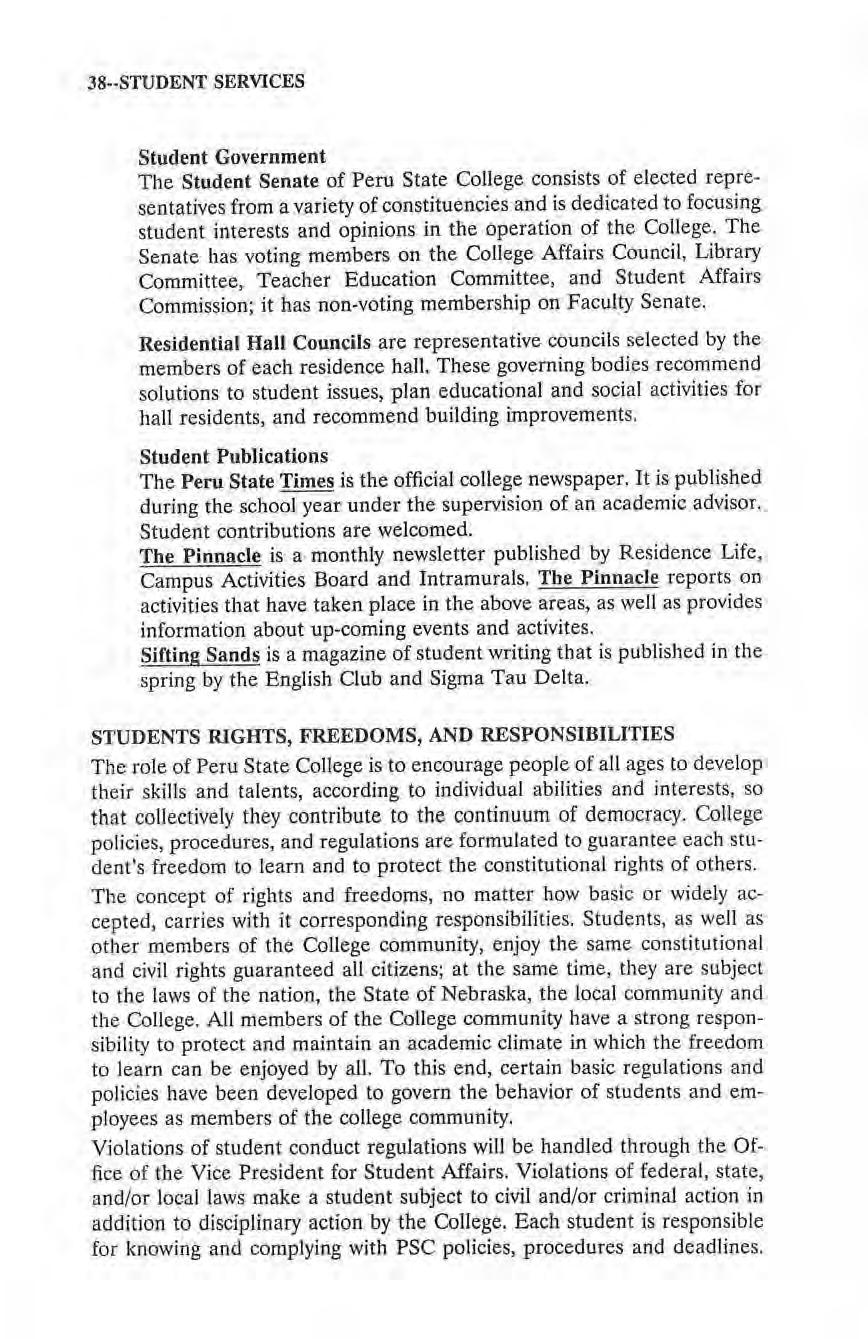
38--STUDENT SERVICES
Policies and regulations may be found in the College Catalog, the Student Handbook, and in the Student Affairs Office.
Academic IDghts of Students
The College has the responsibility of providing a program of quality education in keeping with its financial resources. Students have protection through campus-designed procedures against prejudiced or capricious academic evaluation. Student performance shall be evaluated solely on an acadernjc basis, not on opinions or conduct in matters unrelated to academic standards. Students are responsible for the proper completion of their academic program, for familiarity with all requirements of the College Catalog, and for maintaining an acceptable grade point average for degree requirements. Students have the right to be informed at the beginning of each term of the nature of the course, course expectations, evaluation standards, and the grading system.
Code of Conduct
Students at the College have certain rights and responsibilities. Included in the responsibilities is an awareness of the standards of appropriate behavior. The College e.,'<Pects each student to exercise self-discipline which will enhance the individual's educational experience and the total learning environment of the College.

fn general, the off-campus activities of students are viewed as their personal business. However, when a student violates local, state, or federal laws and at the same time violates the Code of Conduct, either on or off-campus, the College reserves the option of initiating disciplinary action on its own independent of legal processes. Disciplinary action may be initiated by the College and sanctions imposed against any student or student organization found guilty of committing, attempting to commit, or intentionally assisting in the commission of any of the following prohibited forms of conduct.
1 , Disru ption or Obs truction: Conduct which materially or substantially disrupts or obstructs the educational process of the College.
2. Harassment: Physical abuse, physical injury, verbal abuse, sexual assault or sexual harassment of another person, or conduct, including but not limited to hazing, which threatens or endangers the health and safety of others. Fighting words shall be considered harassment. Fighting words are defined as: spoken or written words or symbols directed at an individual that incite riot, violence or destruction of property and infringement of ability to engage ,in one's collegiate activities.
STUDENT SERVICES--39
3. Hazing: Student organizations or individuals shall neither enga ge in nor condone any form of hazing. Hazing may include but is not limited to: a) any action taken or situation intentionally created to s ubject another person to mental or physical discomfort, embarrassment, ris k or ridicule; b) verbal or physical harassment or abuse ; c) encouragement, facilitation or participation in public stunts, violations of law as college policy, morally degrading or humiliating behavio r or games on or off campus which inte rfere with academic performance or unreasonably crea te a hostile or offensive learning environment; or d) the physical marking of students, e.g., branding, tattooing or other disfigur e me nt.
4. Intoxicants and Drugs: Possession, consumption, being under tbe influence, or furnishing of alcoho lic beverages, narcotic or dangerous drugs on campus prope r ty or at supervised functions of student organizations is prohibited. Possession , consump ti on, being perceptibly under the influence, or furn ishing of any narcotic or dangerous drugs is prohibited except when use or possession is lawfully p rescribed by an authorized medical doctor or dentist.
5. Dangerous C he mical s and Devices: Unauthorized use, possession, or sale of firearms, explosives, chemicals, or other dangerous weapons on College property except as expressly authorized by campus procedures.
6. Other Forms of Misconduct: Violations of local, state and/or federal laws, forgery, alteration, or misuse of College documents, r ecords or deliberate misrepresentatio n, theft, damage or misuse of College or private property. Unauthorized use of College funds , equipment and supplies (including but not limited to falsely representing oneself as an agent of the College, incurring debts or entering into contracts on behalf of the College).
7. Violations of College Re.gulations: Violating published College regulations, including those related to entry and use of College facilities , the rules in this section , and any other rules or regulations which may be enacted by the College. Failure to comply with the lawful directions of College personnel act ing in the performance of their duties.
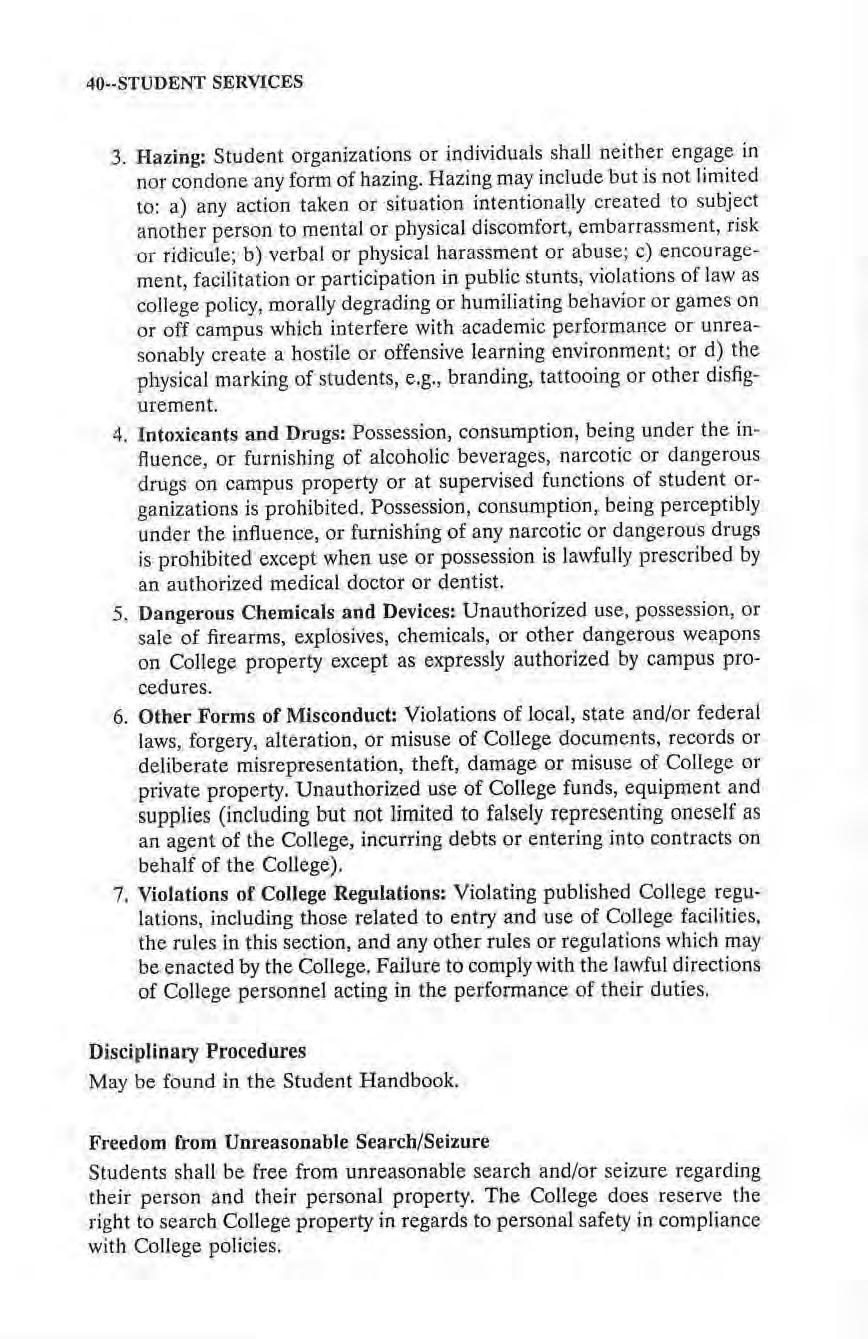
Disciplinary Procedures
May be found in the Student Handbook.
Freedom from Unreasonable Search/Seizure
Students shall be free from unreasonable search and/or seizure regarding their person and their personal property. Th e College does reserve the right to search College property in regards to personal safety in compliance with College policies.
40--STUDENT SERVICES
Freedom of Access
Within the limits of its resources, P eru State College shall be open to all applicants who are qualified according to current admission requirements. Peru State College does not discriminate on the basis of race, creed, color, national origin, mental or physical disabilities, age, sex, or sexual orientation in any of its policies, practices, or procedures. This includes, but is not limited to, admissions, employment, financial aid, and educational services, programs, and activities.
Freedom of Association
Students are free to associate and promote their common interests. They have the right to seek, through official procedures, the establishment of organizations as long as t h ey are not in conflict with the educational purposes of the College. Students have the right to affiliate with officially recognized campus organizations of their choice, within the membership requirements of those o r ganizations.
Freedom of Expression
The rights of free speech and peaceable assembly are fundamental to the democratic process. The College supports the rights of students of the College communi ty to express their views and opinions on actions or ideas, to associate freely with others, and to assemble peacefully. The College reserves the right to determine or regulate time, place and manner of expression, demonstrations, or meetings.
Whether expressing themselves as individuals or in organized groups, members of the College community are expec ted to conduct themselves responsibly, according to law and to respect the basic educational goals of the College. Accordingly, the College insists that free expression not vio late t he r ights of others. Disruption of the educational processes and functions of the College, violation of law, and fighting words would constitute such violation of the Student Code of Conduct, for example.
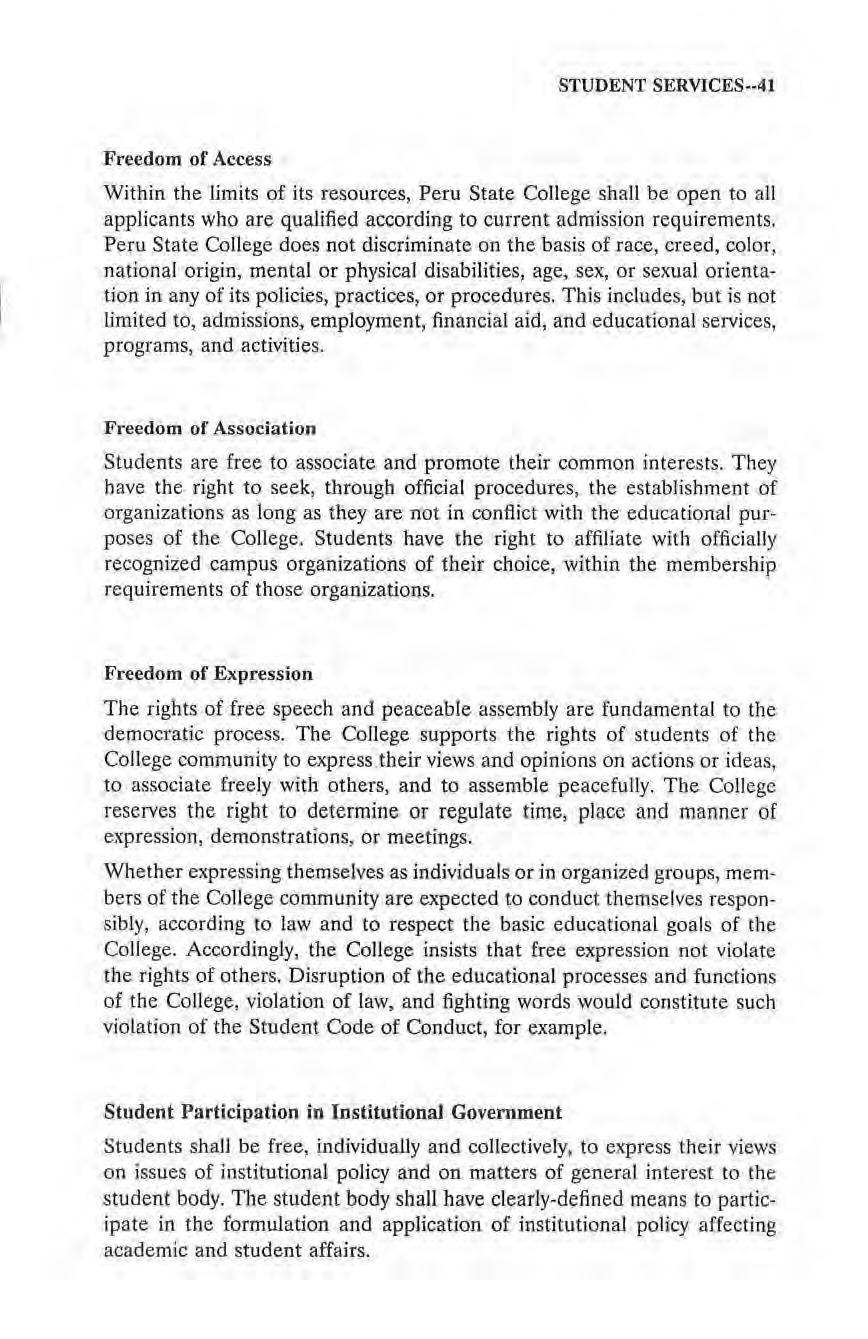
Student Participation in Institutional Government
Students shall be free, individually and collectively, to express their views on issues of institutional policy and on matters of general interest to the s tu dent body. Th e student body shall have clearly-defined means to participate in the formulation and application of institutional policy affecting academic and student affairs.
STU DENT SERVI CES- -41
42--STUDENT SERVICES
Residence Hall Regulations
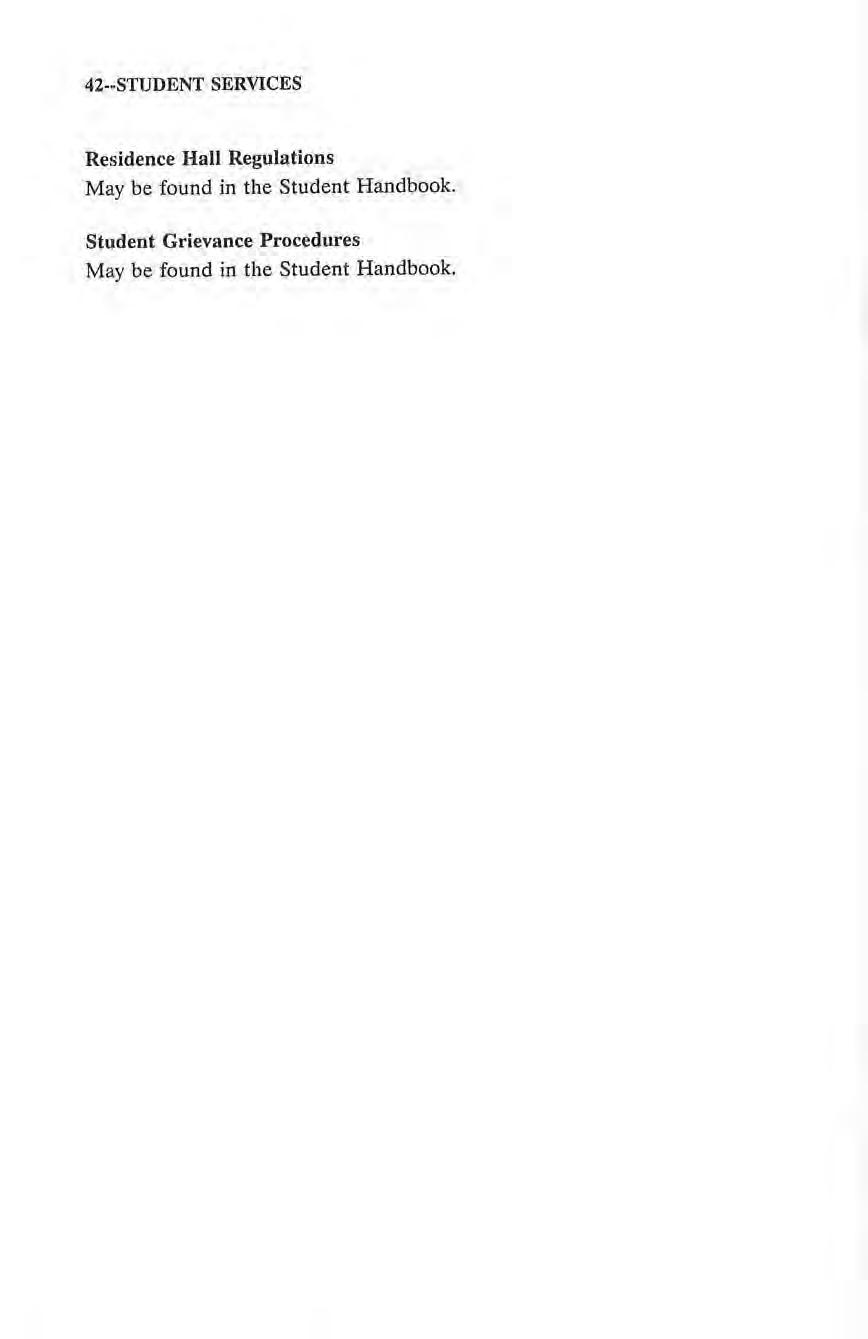
May be found in the Student Handbook.
Student Grievance Procedures
May be found in the Student Handbook.
NON-ACADEMIC POLICIES
AIDS
This policy is followed in the event any student, employee, or other school contact has contracted AIDS (Acquired Immune Deficiency Syndrome), ARC (Aids Related Complex), or has been diagnosed by a physician as being infected with the HIV virus ( H uman Immune Virus).
The goals of Peru State College are to :
1. Provide an app ropriate and least restrictive work/study setting as feasible for AIDS, ARC, a nd HIV persons.
2. Provide a safe e nvironment for the College community.
3. Ma in tain and protect all rights and privacy of AIDS, ARC, and HIV persons.
4. Continue to observe non-discriminatory guidelines for all areas of campus life (i.e. social, academic, and cultural).
5. Assure that students/staff are not put at risk because of Jack of knowledge, education, or proper equipment.
6. Increase awareness and provide education to prevent further spread of the disease.
Discrimination
Pe ru State College believes that fostering d iversity and respect for difference is a fundamental goal of higher educational institutions. The refore, the College takes the unequivocal stance that the subordination of a person or a group based on race, color, creed , disability, marital status, national origin, race, sex, or sexual orientation, cannot be tolerated, Peru State College will take strong and effective steps to achieve a diverse learning environment and a workplace respectful of differences. Clear, fa ir and effective policies will be formulated and communicated to all members of the campus community, and will respond promptly and consistently to complaints about any acts t hat violate those policies.
Fa mily Education Rights and Privacy Act of 1974
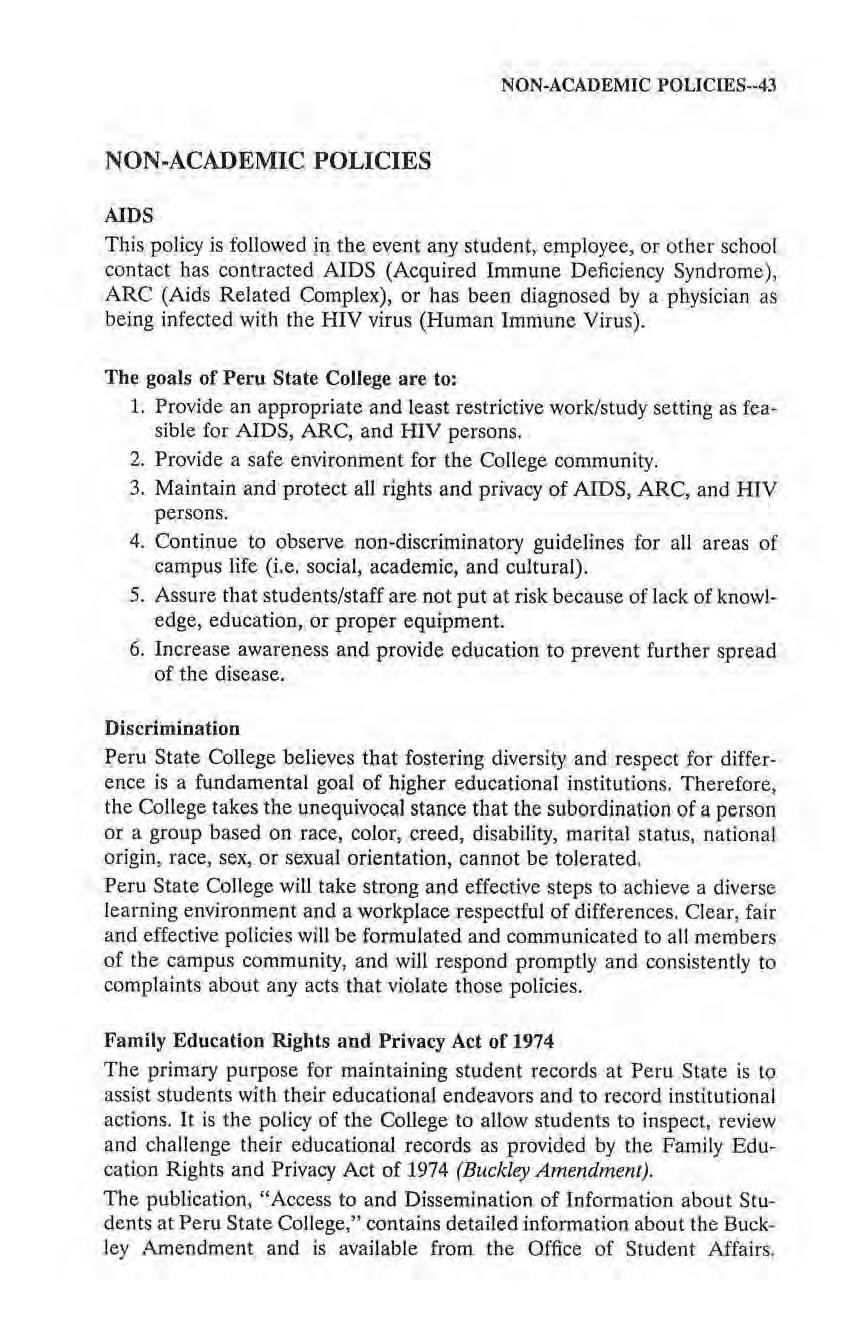
The primary purpose for maintaining student records at Peru State is to assist students with their educational endeavors and to record institutional actions. It is the policy of the College to allow students to inspect, review and challenge their educational records as provided by the Family Education Rights and Privacy Act of 1974 (Buckley Amendment).
The publication, "Access to an d Dissemination of Infor mation about Students at Peru State College," contains detailed information about the Buckley Amendment and is available from th e Office of Student Affairs.
NON-ACADEMIC POLICIES--43
Complaints about the alleged failure of the College to comply with the requirements of the Buckley Amendment should be first addressed to the Office of the Vice President for Academic Affairs.
Sexual Assau lt a nd Sex ua l Harassment
The College is concerned about the safety and well-being of its students and staff and will promote awareness of sexual harassment, rape, acquaintance rape, and other sex offenses through educational programs, ,vorkshops, counseling and printed materials.
Sexual assault or harassment are violations of the Student Code of Conduct and the Board of T rustees policy concerning employees, and are prohibited. All allegations of sexual assault and/or harassment should be made in a timely manner directly to the Vice President for Stu.dent Affairs. All allegations will be investigated thoroughly and will require det a iled accounts of the incident(s). The investigation will be as confidential as possible. In cases of sexual assault the victim will be encouraged to immediately contact the proper legal and medical authorities in order to preserve evidence and prove criminal sexual assault.
Allegations of sexual assault or sexual harassment wi ll result in a disciplinary and/or grievance procedure as outlined in the Student Handbook. The results of disciplinary and/or grievance hearings evolving from allegations of sexual assault or sexual harassment will be made known to both the p laintiff and accused within forty-eight ( 48) hours after the conclusion of the hearing. The physical violation of one person by another is deemed as most serious, and all appropriate campus and legal sanctions will be brought to bear on all guilty persons.
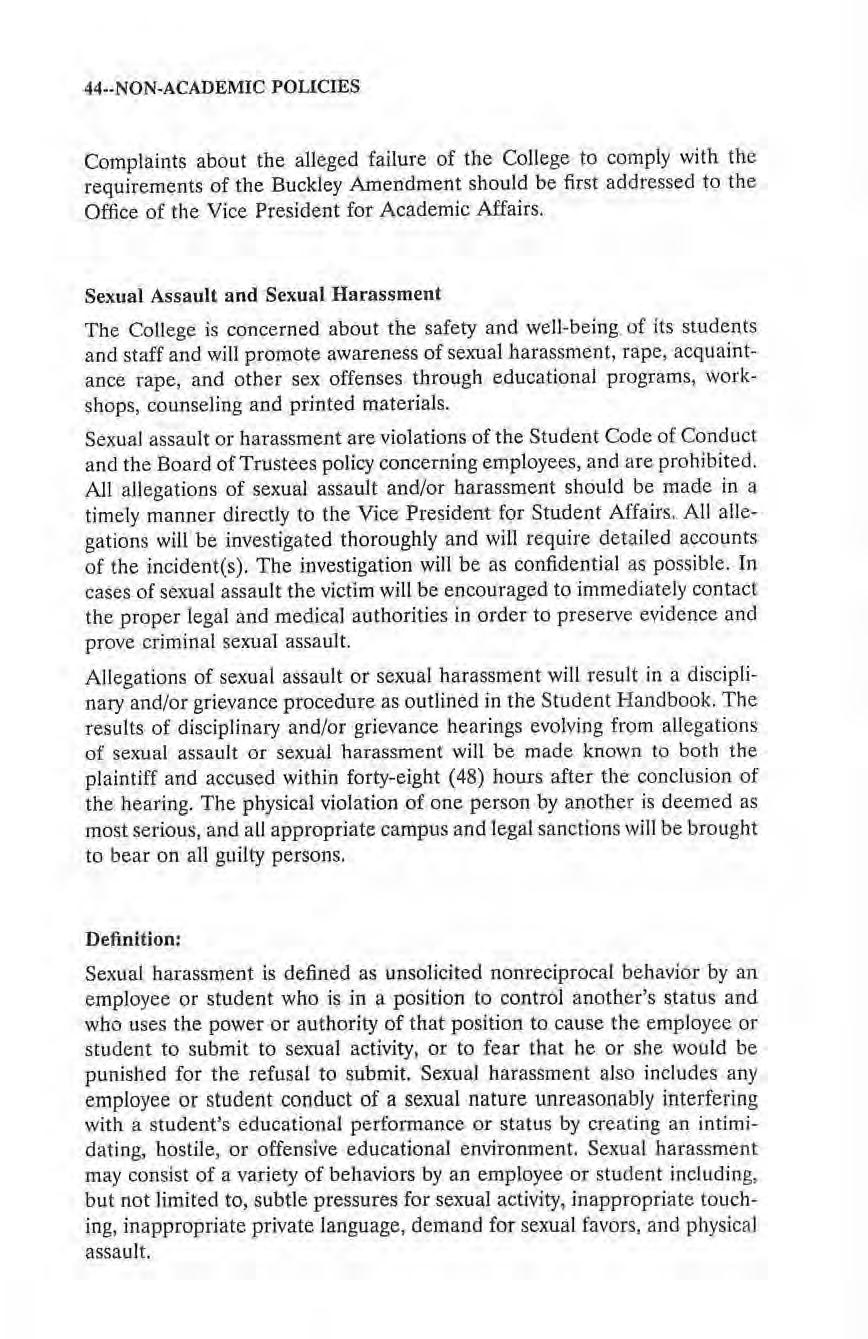
Definition :
Sexual harassment is defined as unsolicited nonreciprocal behavior by an employee or student who is in a position to control another's status and who uses the power or authority of that position to cause the employee or student to submit to sexual activity, or to fear that he or she wou ld be punished for the refusal to submit. Se:>..'Ual harassment also includes any employee or student conduct of a sexual nature unreasonably interfering with a student's educational performance or status by creating an intimidating, hostile, or offensive educational environment. Sexual harassment may consist of a variety of behaviors by an employee or student including, but not limited to, subtle pressures for sexual activity, inappropriate touching, inappropriate private language, demand for sexual favors, and physical assault.
44--NON-ACADEMIC POLICIES
Students with Disabilities
The Rehabilitation Act of 1973 (public law 93-112) section 504, provides that "no otherwise qualified disabled individual in the United States shall solely by reason...disabled, be excluded from the participation in, be denied the benefits of, or be subjected to discrimination under any program or activity receiving federal financial assistance."
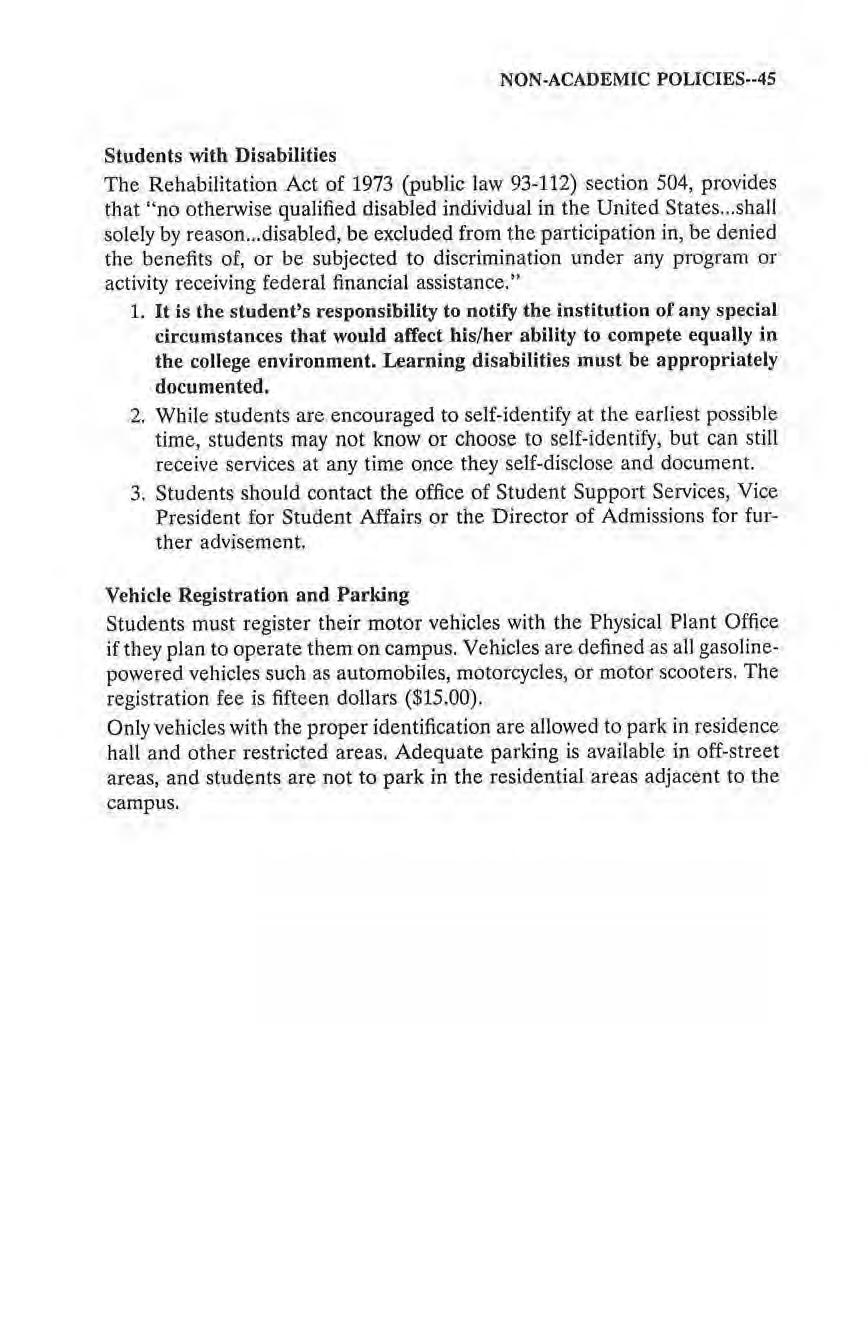
1. lt is the student's responsibility to notify the institution of any special circumstances that would affect his/her ability to compete equally in the college envfronment. Learning disabilities must be appropriately documented.
2. While students are encouraged to self-identify at tJ1e earliest possible time, students may not know or choose to self-identify, but can still receive services at any time once they self-disclose and document.
3. Students should contact the office of Student Support Services, Vice President for Student Affairs or the Director of Admissions for further advisement.
Vehicle Registration and Parking
Students must register their motor vehicles with the Physical Plant Office if they plan to operate them on campus. Vehicles are defined as all gasolinepowered vehicles such as automobiles, motorcycles, or motor scooters. The registration fee is fifteen dollars ($15.00).
Only vehicles with the proper ide ntifi cation are allowed to park in residence hall and other restricted a rea s. Adequate parking is available in off-street areas, and students are not to park in the residential areas adjacent to the campus.
NON-ACADEMIC POLICIES--45
COLLEGE AND PUBLIC SERVICES
Economic Development
Peru State College provides an educational program and a full range of econom ic development services to communities in Southeast Nebraska. The Economic Development Program is headed by an experienced, full-time director. Commun ity service activities of the Economic Development Program include short courses and workshops, assistance to communities in strategic planning, site evaluation, marketing, business retention, and other as pects of development as requested by communities and development agencies. In addition, the College's Economic Development Program seives as a liaison between state and regional development agencies and community development groups within its service area.
Peru State College offers a degree program in economic development through its Business Division to meet the need for trained development personnel within Southeast Nebraska and throughout the state. Peru's is the only degree program in economic development in the nation endo rsed by the American E conomic Development Council. Activities of the Economic Development Program are overseen by an Advisory Council composed of financial contributors and community representatives from the Peru State College service area.
Nebraska Busi n ess Development Center
The Nebraska Business Development Cen ter on the College camp us provides free consulting to businesses or persons wanting to start a business. Clients may be assisted with management, financial projections, marketing, writing business plans, selecting computers, or o th er concerns. The NBDC is funded by the SmaU Business Administration, the State of Nebraska, and the College.

Peru AJumni Association
All graduates of Peru State College, as well as former students, faculty and staff who request it, are considered members of the Peru State College Alumni Association. There are no annual dues or fees. Active chapters include Lincoln (organized in 1955), Omaha (1955), Rocky Mountain (1957, includes Colorado, Wyoming, western Kansas, and western Nebraska), and Northern California (1958). In active chapters include Southern California (1961), and local Thousand Oaks chapter (1973), and the East Coast chapter (1988, includes Maine to North Carolina a long eastern seaboard).
PSC a lumni activities are based in the Alumni/Foundation Building, located on the southeast corner of campus. Current mailing lists of graduates, m any
46--COLLEGE AND PUBLIC SERVICES
former students, and some former faculty are maintained there, as are collections of yearbooks, photos, publications and other memorabilia.
The Peru Stater, the College's official alumru newsletter, is distributed at no charge to alumni and others on the current mailing list. The College encourages submission of items for inclusion in this publication.
Peru State Co llege Library and Media Center
The Peru State College fully automated library contains more than 100,000 volumes and subscribes to nearly 800 periodicals. Special collections include the original manuscripts of authors Marion Marsh Brown, E.P. Conkle, Ruth Crone, and Louise Mears. The library assists patrons through its extensive inter-library loan services and provides typewriters and microcomputers for student use. 1
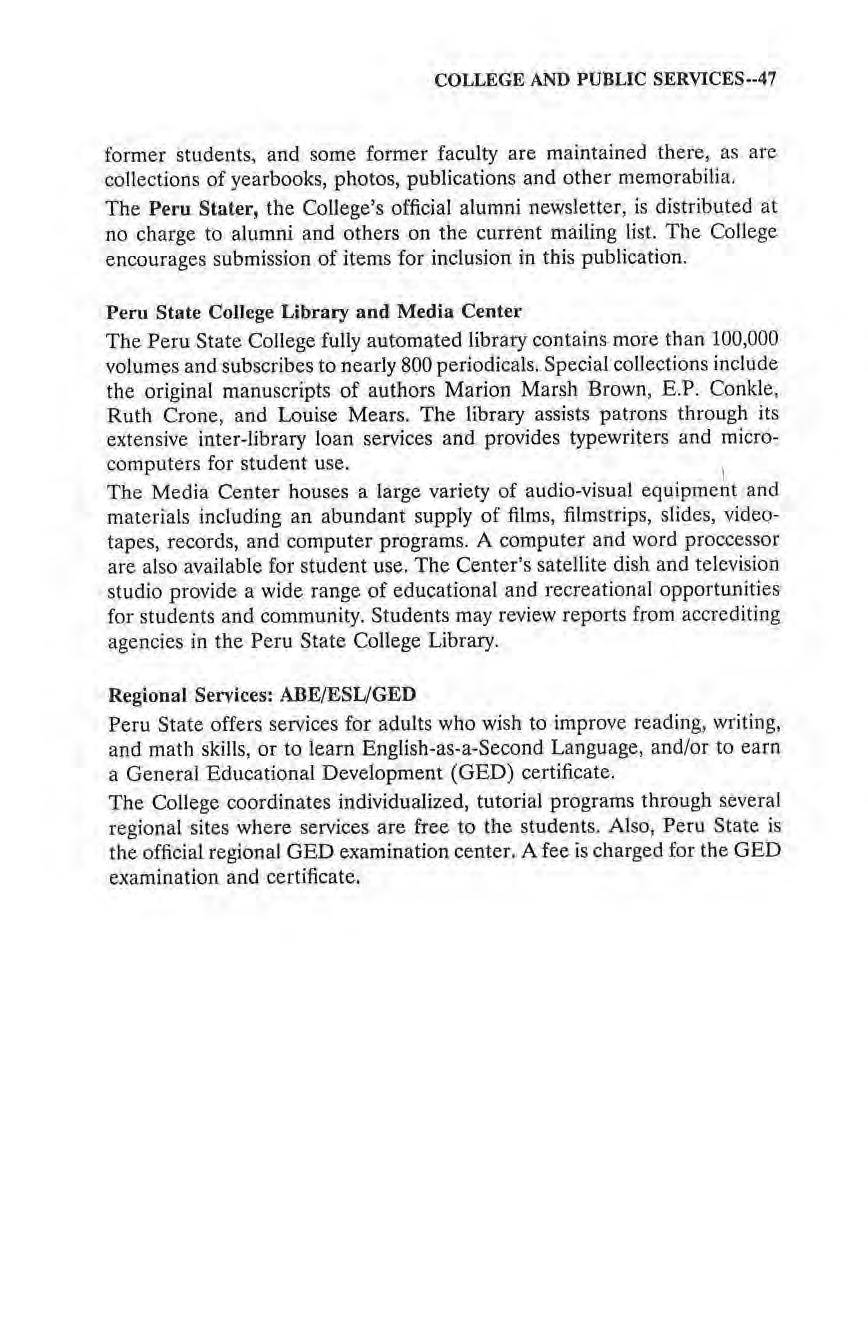
The Media Center houses a large variety of audio-visual equipment and mate rials including an abundant supply of films, filmstrips, slides, videotapes, records, and computer programs. A computer and word proccessor are also available for student use, The Center' s satellite dish and television studio provide a wide range of educational and recreational opportunities for students and community. Students may review reports from accrediting agencies in the Peru State College Library.
Regional Serv ice s: ABE/ESL/GED
Peru State offers services for adults who wish to improve reading1 writing, and math skills, or to learn English-as-a-Second Language, and/or to earn a General Educational Development (GED) certificate. The College coordinates individualized, tutorial programs through several regional sites where services are free to the students. Also, P eru State is the official regional GED examination center , A fee is charged for the GED examination and certificate.
COLLEGE AND PUBLIC SERVICES--47
UNDERGRADUATE DEGREE AND PROGRAM INFORMATION
Graduation Requirements
In compliance with Board of Trustees policy, this catalog is intended as a description of the educational programs and activities offered by Peru State. Information in the catalog is correct according to information ava ilable at the time of publication. The catalog is explanatory in nature and is not a contract between the student and Peru State College. Peru State College reserves the right to withdraw courses at anytime, change the rules and requirements regulating admission and graduation requirements, and change other regulations affecting the student body.
New students admitted to PSC under this catalog may graduate under its requirements if they graduate within seven (7) years of initial enrollment. Unless otherwise noted, all academic policies in this catalog that do not pertain to specific academic programs are effective immediately for all enrolled students.
Degree and Program Information

The programs offered by the College include four-year professional curricula in elementary and secondary education, a four-year liberal arts program, a flexible bachelm· of science program, and a number of preprofessional curricula.
Each program at the College consists of general studies courses and specialized courses. The general studies courses are important to effective living for all persons regardless of their vocations. The specialized courses prepare an individual for a specific occupation, or satisfy a particular avocational or cultural interest.
Upon enrolling, students select a program and degree objective that determines their curriculum and academic advisor.
This choice may be tentative and changed later. Students who desire special assistance in selecting a program may request counseling from their academic adv isor or the Director of Cooperative Education and Career Services.
Degrees
Peru State College is authorized by law and the rules of the Board of Trustees of the Nebraska State Colleges to issue the Master of Science in Education (see the graduate catalog for details) and the following undergraduate degrees:
48--DEGREE
INFORMATION
AND PROGRAM
Bachelor of Arts (B.A.)
Thjs degree is awa rd ed to candidates who may elect any major . In additio n to general undergraduate degree requirements, candidates must complete the following requirements, listed below:
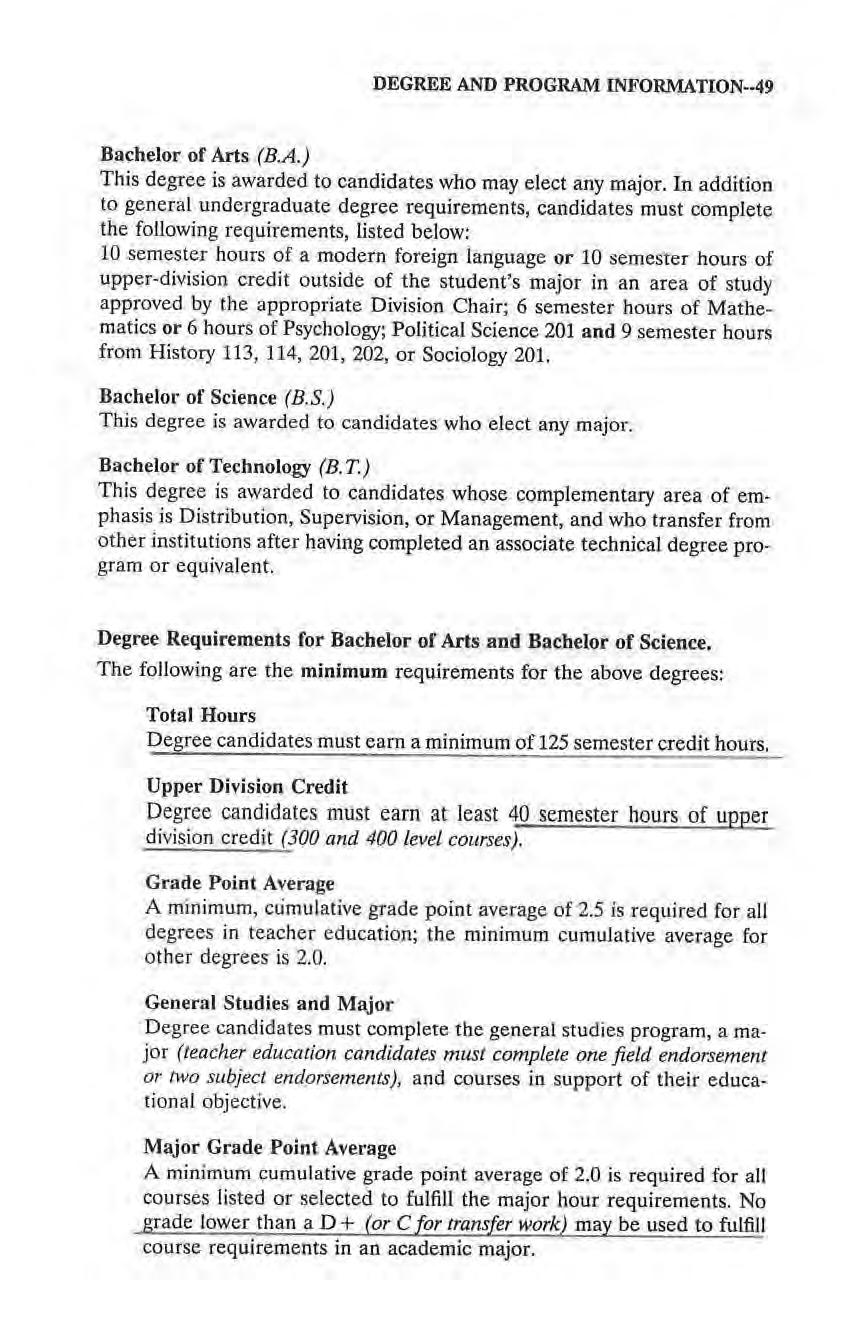
10 semester hours of a modem foreign language or 10 semester hours of upper-division cred it outside of the student's major in an area of study approved by the appropriate Division Chair; 6 semester hours of Mathematics o r 6 hours of Psychology; Political Science 201 and 9 semester hours from History 113, 114, 201, 202, or Sociology 201.
Bachelor of Science (B.S.)
This degree is awarded to candidates who e lect any maj or.
Bachelo r of Technology (B.T.)
This d egree is awarded to candjdates whose complementary area of emphasis is D istrib u tion, Supervision, or Management, and who tr a nsfer from other institutions after having completed an associate technical degree program or equ ivalent.
Degree Requirements for Bachelor of Arts a nd Bachelor of Science.
The following are the minimum requirements for t h e above degrees:
Tota l Hours
Degree candidates must earn a minimum of 125 semester credit h ours.
Upper Division Credit
Degree candid ates must earn at least 40 semester hours of upper division credit (300 and 400 level courses).
Grade Point Average
A minimum, cumulative grade point average of 2.5 is required for all degrees in teacher education; the min imum cumulative average for other degrees is 2.0.
General Studies and Major
Degree candidates must complete the gener al studies program, a major (teacher education can didates must complete one field endorsement or two subject endorsements), and courses in support of t h e ir educat ional objective.
Major Grade Point Average
A minimum cumulative grade point average of 2 .0 is required for all courses listed or selected to fulfill the major hour requirements. No grade lower than a D + (or C for transfer work) may be used to fulfill course req uirem ents in an aca dem ic major.
DEGREE AND PROGRAM INFORMATION--49
50--DEGREE AND PROGRAM INFORMATION
Peru State Credits
A minimum of 30 semester hours must be earned from Peru State -College
Resident Cred its
A minimum ~f 24 o! the la~t 30 seme~ter ~ours must be ea rned in residence. T his requirement may be waived in cases where any of the required resident credit is earned at another Nebraska state college or where official cooperative agreements with other institutions exist.
Co ll ege Survival Skill s
College 100 - A one semester hour course is required by all full tim e on-campus, undergraduate, degree seeking students (carryi ng 12 or more hours per semester). This class can be waived under the following conditions:
1. Transfer students who have completed at least thirty (30) semester hours before t he tenn of admission.
2. PSC students who have accumulated at least thirty (30) c redit hours at a part-time level before attending PSC on a full -time level.
3. Readmitted st ude nts who have not maintained normal progress and who completed at least thirty (30) semester hours.
4. Transfer students with less than thirty (30) semester hours before the term of admission and who can transfer in a similar course from another college.
Degree Requirements fo r Bachelor of Tec hn o logy

The follow ing arc the minimum requirements for the Bachelor of Technology degree:
Prerequisites
Degree candidates must have a technical assoc iate degree from a regionally-accredited ins titution or its equivalent. Students who have completed technical programs of less than two years will be required to take additiona l technical coursework that is equivalent to an associate degree program. The additiona l work may be t aken at a community college or other applicable institution, but must be ap proved by the Chair of the Business Division at Peru State College.
Tota l Hours
Degree candidates must earn a minimum of 125 semester credit hours. A minimum of 59 semester hours are to be completed through accredited institutions a uth orized to grant a baccalaureate or higher degree. A minimum of 30 semester hours must be Peru St ate College instruction.
U pper Di vision C red it
Degree candidates must earn at least 20 semester credit hours of 300 level (or higher) coursework.
Grade Po int Average
A minimum, cumulative grade point average of 2.0 is required for all coursework completed at Peru State.
The Bachelor of Technology degree is designed for transfer students wh o have an associate degree or its equivalent and a techn ical major. The degree is flexible enough to accommodate the transfer student who meets the fo llowing additional requirements:
Tra nsfer Studen ts with an Assoc iate Degree
General S t udi es
Thirty semester credit hours are required. At least 3 hours must be selected from each area listed below and no more than 9 hours of the total can be in any one area. Courses selected must be exclusive of those completed for the area of emphasis.
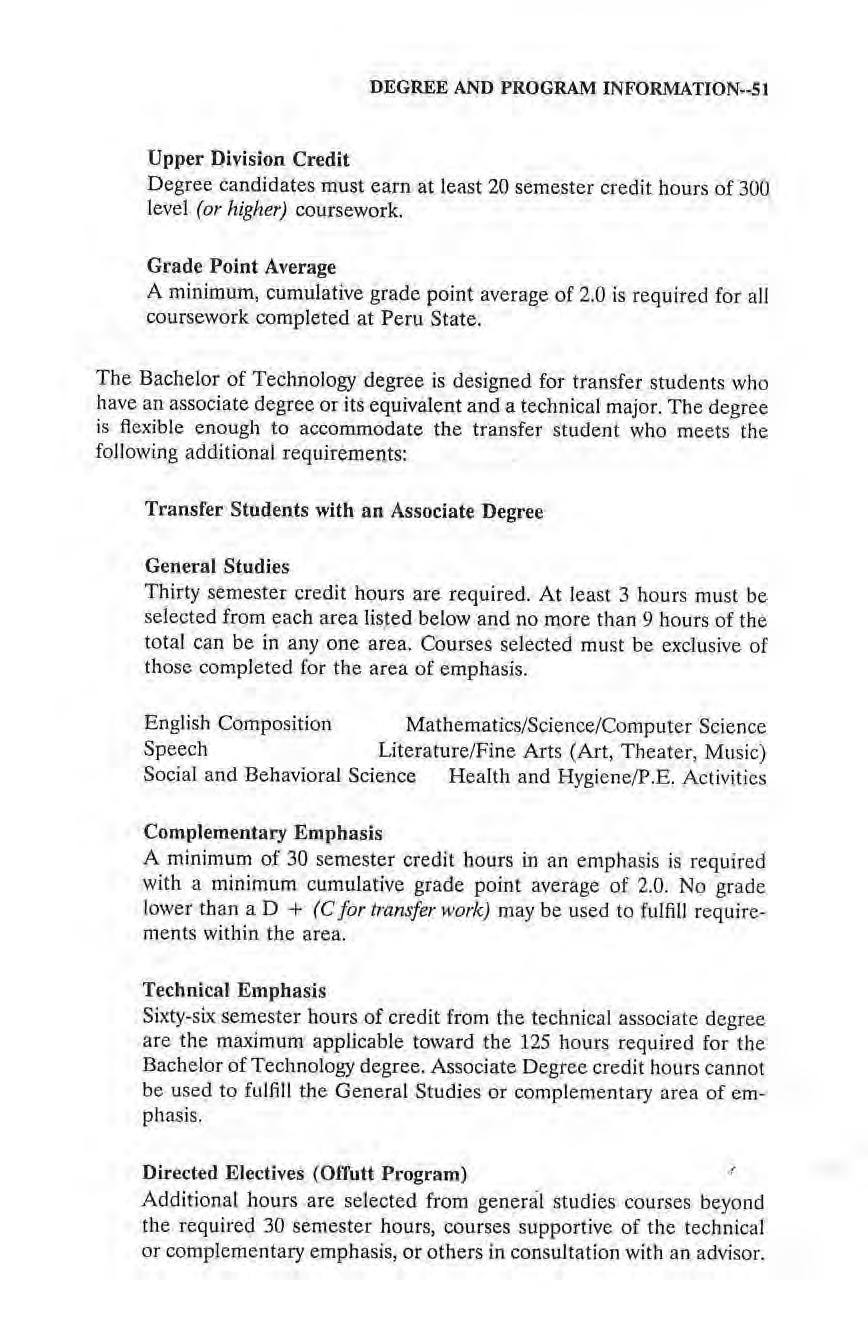
English Composition Mathematics/Science/Compute r Science
Speech Literature/Fine Arts (Art, Theater, Mttsic)
Social and Behavioral Science Health and Hygie ne/P.E. Activities
Complementary Emphasis
A minimum of 30 semester credit hours in an emphasis is required with a minimum cumulative grade point average of 2.0. No grade lower than a D + (C for transfer work) may be used to fulfill requirements within the area.
Technical Emphasis
Sixty-six semester bours of credit from the technical associate degree are the maximum applicable toward the 125 hours required for the Bachelor of Technology degree. Associate D egree credit hours cannot be used to fulfill the General Studies or complementary area of emphasis.
Directed Electives (Offutt Program) .r
Additional hours are selected from general studies courses beyond the required 30 semester hours, courses supportive of the technical or complementary emphasis, or others in consultation with an advisor.
DEGREE AND PROGRAM IN FORMATJON--5 1
Degree Regulations
In addition to the above degree requirements, the following regulations apply to Peru State bachelor degrees:
Extra- ins titutional Credits
The semester credit hours awarded through the College's approved procedures for determining ext ra-institutional learning are considered transfer credits. Unless otherwise specified, a maximum of 66 transfer credits, awarded either individually or collectively, via extra-institutional procedures, may be applied toward the 125 credit hour minimum required for a bachelor's degree.
Correspondence and Extension Credits
No more than one-eighth of the total credits required for a degree may be satisfied t hrough correspondence courses, and no more than one-fourth of th e total may be correspondence and extension credits. Extension or off-campus courses conducted by Peru Sta te are considered resident credits.
Professional School Residence Credits
Pre-professional students, who have successfully completed three years in a specifically approved program may transfer to an accredited professional school during their fourth year and qualify for a bachelor's degree provided they meet aJJ other graduation requirements.
Varsity Sports Credits
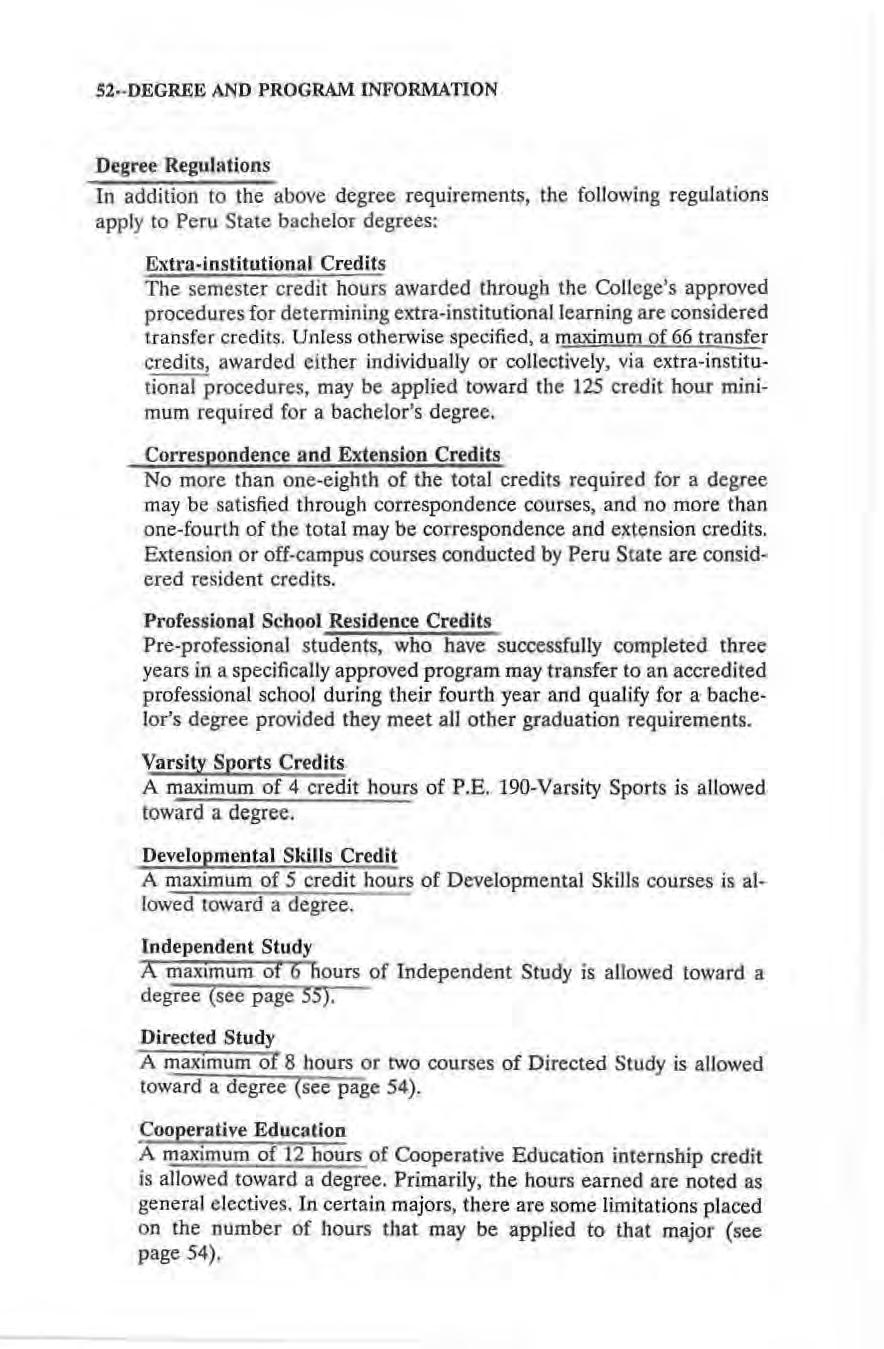
A maximum of 4 credit hours of P.E. 190-Varsity Sports is allowed toward a degree.
Developmental Skills Credit
A maximum of 5 credit hours of Developmental Skills cou rses is allowed toward a degree.
Independen t Study
A maximum of 6 hours of Independe nt Study is allowed toward a degree (see page 55).
Directed Study
A maximum ot 8 hours or two courses of Directed Study is allowed toward a degree (see page 54).
!=ooperative Education
A maximum of 12 hours of Cooperative Education internship credit is allowed toward a degree. Primarily, the hours earned are noted as ge neral e lectives. I n certain majors, there are some limitations placed on the number of hours t hat may be applied to that major (see page 54).
52--DEGREE
AND PROGRAM INFORMATION
Application for Degree
Peru State College has three graduation dates: D ecember, May a nd summer. D egree ca ndid ates, upon e nrolling for their final coursewor k, mu st complete a deg ree application through the Registrar's Office. The application must be completed w ithin the first five weeks of th e semester or within the first two weeks of the first summer term . Students are expected to have completed all degree requirements on or before the planned date of graduation. December graduates receive a sta tement of completion. Diplomas are given at the subseque nt May graduation.
Second Undergraduate Degree
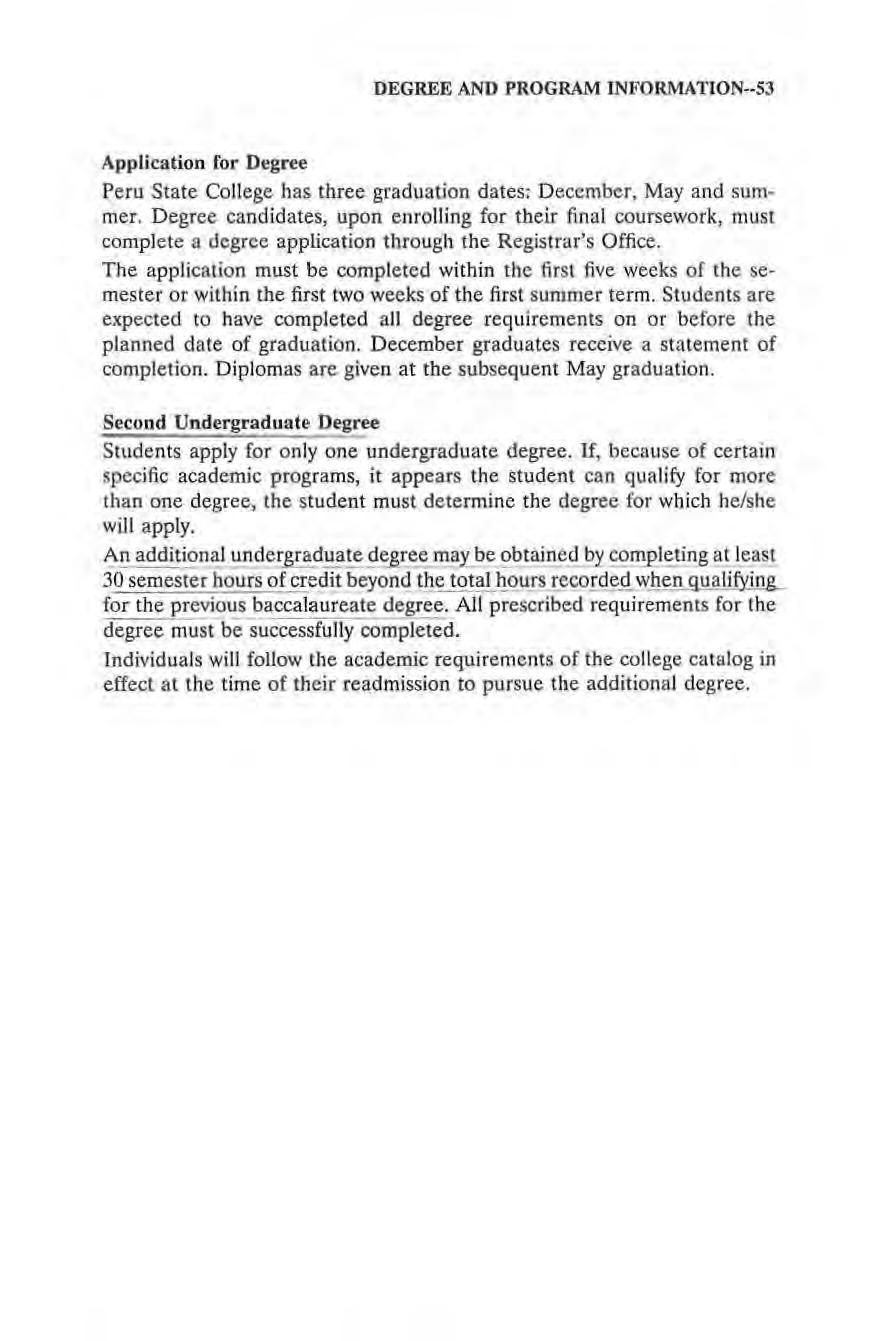
Students apply for on ly one undergraduate degree. If, because of certain specific academic programs, it appears the student can qualify for more than one degr ee, the stude nt must determine the degree for which he/she will apply.
A£! additional undergraduate may be obtained by CQmpleting ?t least 30 semester hours of credit beyond the tot?ll}ours recordeJ!_when gua lif.Yi.M.. for the previous baccalaureate degree. All prescribed requirements for the degree must be successfully completed.
Individuals will follow the academic requirements of the college ca talog in effect at the time of their read mi ssion to pursue the additional degree.
DEGREE AND PROGRAM INFORMATION--53
SPECIAL ACADEMIC PROGRAMS
Cooperative Education
T he Cooperative Education Internship Program provides students with the opportunity t o explore the field of work or gain valuable work expe r ience while earni ng academ ic credit in a ll majors. The maximum number of hours allowed for grad u at ion is 12. Employment occurs in positions which are relevant to a stude nt's major or career inter ests. The prog ram is available to all students including off-campus and non-traditional students. A flexible reg is tration sched ul e allows students to enroll through the middle of each semester. T o help facilitate a mutually beneficial work experience for the student, each placement is approved by the cooperative education staff and the respective div is ion c hairs. Each internship is monitored by the cooperative education staff.
First year students who have completed 15 credit hours and are in good academic s t and ing a re eligible to enroll for exploratory o r m ajor-related cooperative education experiences at the Bus 241, GS ci 241, Educ 241, or H um 241 level. Students may take one to four hours at this level.
Students who have completed 45 credit hours a nd are in good academic standing are e ligible to enroll for major or career related cooperative education experiences at the Bus 441, GSci 441, Educ 441 , or Hu m 441 leve l. Students may take from one to twelve hours at this level.
A total of twelve hours maximum may be used toward gra duation .
All tr a nsfer stud ents must complete 15 hours at PSC before being eligible for the program.
All students must bave a permission slip signed by a cooperative education staff member and the respective division chair before enrollin g.
Directed Study
A Directed Study (Subject 297 or 497) may be taken as a course substitu ti on when a s tuden t has been unable to meet a course requirement in the normal manner and can demonstrate a need to take the course via Directed Study to graduat e. In a Directed Study, the student must meet the same requirements as in the course being substituted for. D irected Study is avai lable in nearly every subject area and is numbered either 297 or 497. To be e ligible to take a Directed Study, a student should have completed a minimum of 90 semester hours (senior sta nd ing) and be within two semesters of graduating.
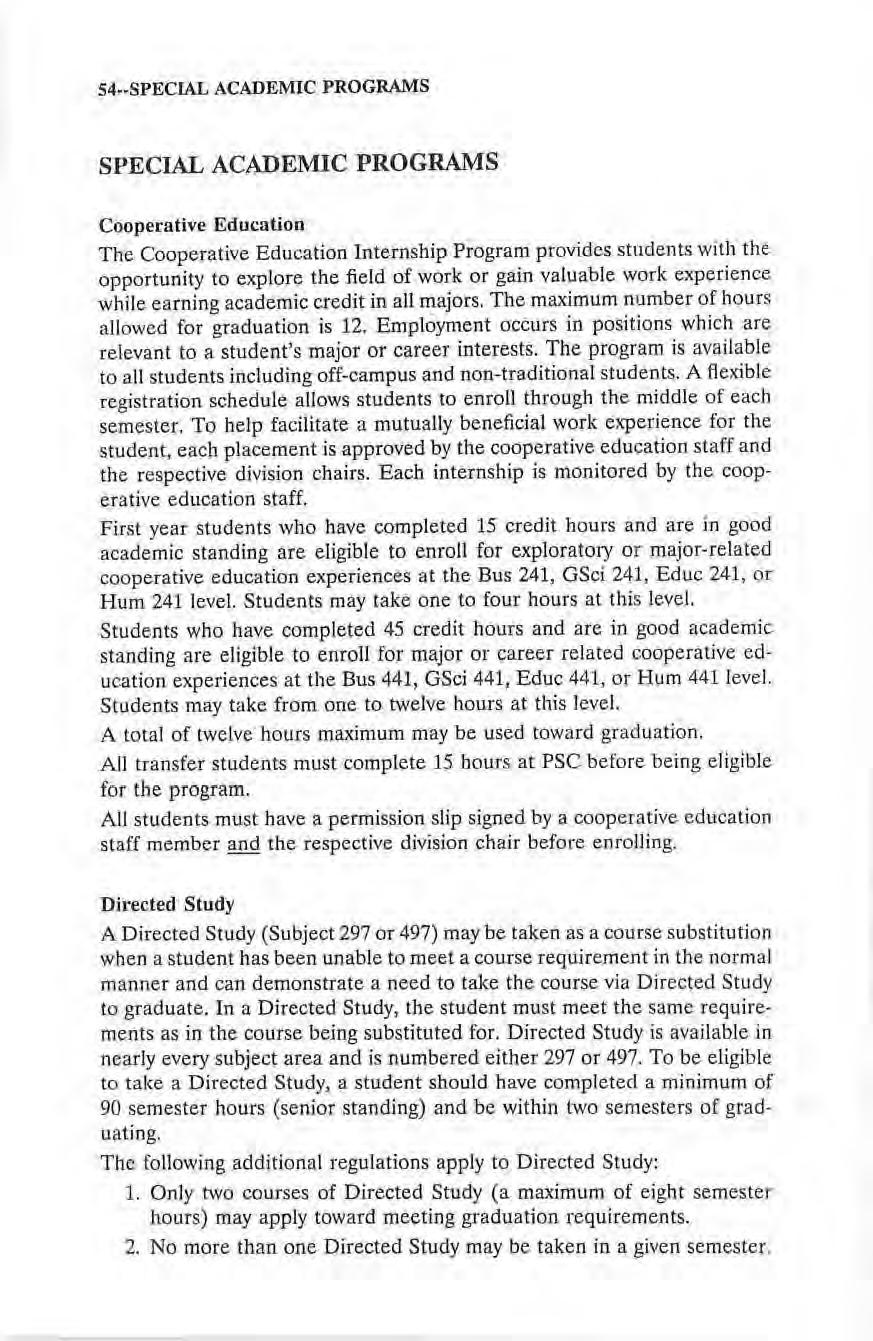
The following addit ional regulations apply to Directed Study:
1. Only two courses of D irected Study (a maximum of eigh t semester hours) may app ly toward meeting graduat ion requirements.
2 No more than one Directed Study may be taken in a given semester.
54--SPECIAL ACADEMIC PROGRAMS
3. If a student does not meet the eligibility requirements but can demonstrate a need to take a Directed Study, the appropriate Division Chair will make the final decision on approval to register.
4. The student must meet with the instructor at least once each week.
5. A Directed Study Form must be completed and submitted to the Division Chair, the Registrar, and Vice President for Academic Af. fairs by the end of the second week of the semester.
Independent Study
An Independent Study is a carefully organized learning activity with specific objectives and methods of evaluation developed in consultation with a faculty member. Independent Study courses are available in nearly every subject area and are numbered 499. To be eligible to take an Independent Study a student must have completed 60 semester hours Gunior standing) and be capable of doing independent research, work, and study. The following additional regulations apply to Independent Study courses:
1. No more than 6 semester hours of Independent Study may be counted toward meeting graduation requirements.
2 . No more than one Independent Study (a maximum of three hours) may be taken in a given semester.
3. The student must communicate with the instructor at least once each week.
4. A Independent Study Form must be completed and submitted to the Division Chair, the Registrar, and the Vice President for Academic Affairs by the end of th e second week of the semester.
5 A copy of the Independent Study final project should be submitted to the Division Chair as well as the instructor for Departmental archives.
Pre-Professional Programs
The entrance requirements of most professionaJ schools require programs of general studies which vary only slightly from one profession to another. These programs usually require two years or more of study. Since such work is also required in the professional curriculum of teachers, Peru State's general studies program meets the pre-professiohal needs of prospective doctors, dentists, pharmacists, optometrists, nurses, vete rinarians, lawyers, engineers, agriculturists, foresters, morticians, journalists, and others Students following a pre-professional program are urged to check the catalogs of professional schools so that specific en trance requirements can be met at Peru State.
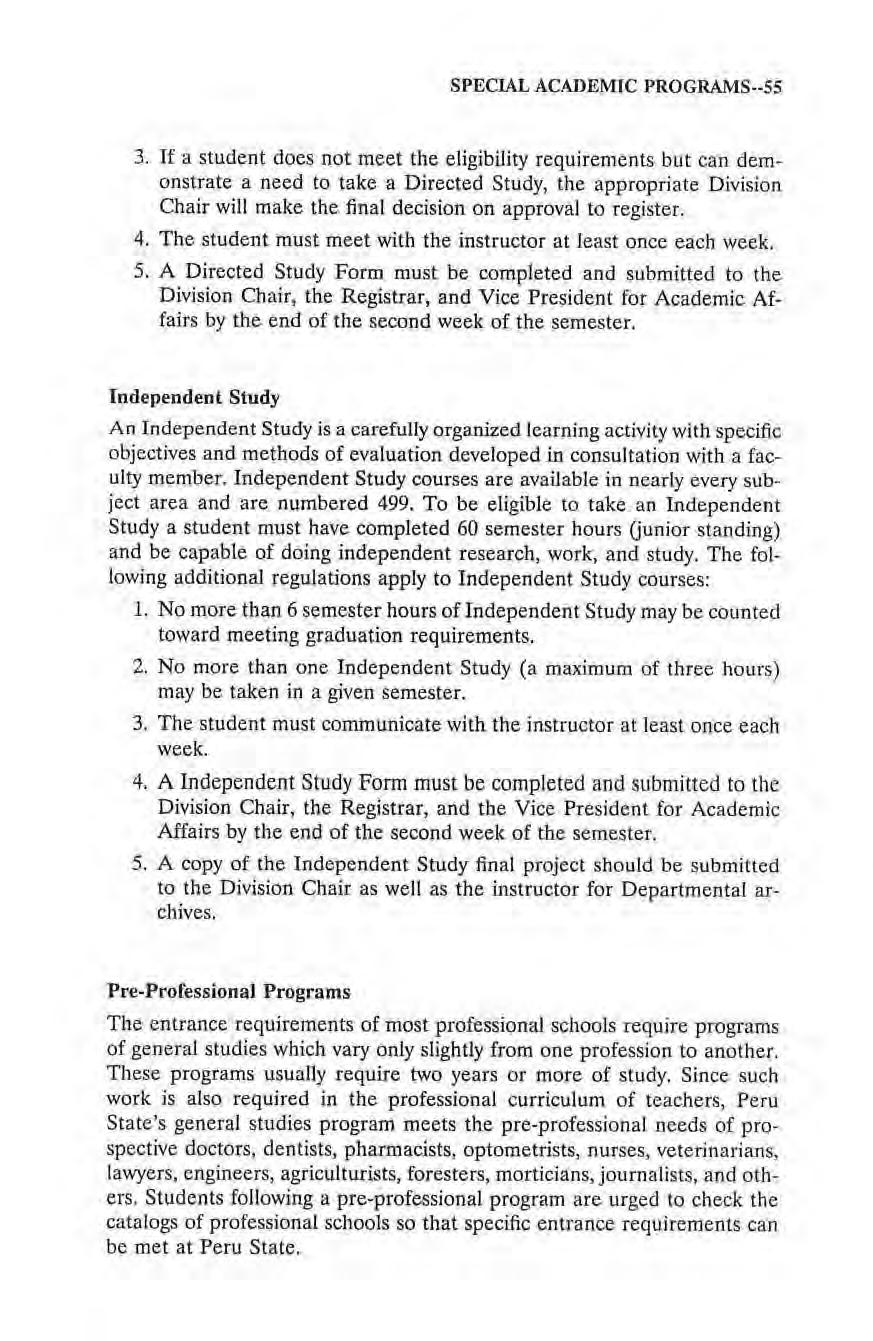
SPECIAL ACADEMrc PROGRAMS--SS
56--SPECIAL ACADEMLC PROGRAMS
General Agricultura l Transfer Program
Peru State and the College of Agriculture at the University of NebraskaLincoln cooperate to offer a transfer program for agriculture students. Under the terms of this agreement, students may complete a specified group of courses at Peru State and then transfer to the University's College of Agriculture.
Extension Programs and Services
The Office o f Continuing Education offers a variety of programs and services to meet the educational needs of the College's service area.
Pe ru State/Southeast Community College Program
Peru State and Southeast Community College offe r a cooperative degree program on the Beatrice and Milford campuses of Southeast Community College. Students may take up to 66 semest er credit hours with Southeast Community College before transferring into the Peru State program. Peru State offers the remaining degree courses at Beatrice and Milford so that students may compl e te a bachelor's degree vlithout actually coming to the Peru campus. The Transfer Guide assists both students and advisors. It lists the course equivalencies at both insti tutions, the specific course requirements for each degree, and the procedures for admission, regjstration, and payment of tuition and fees. Students who enter the program with a significant amount of credit toward their major will have their transcripts reviewed by the appropriate division chair, in consultation with the Vice President for Academic Affairs, to determine if a possible 6-15 credit hours of designated coursework in the major is required
Peru State/Offutt Air Force Base
In cooperation with the Offutt Air Force Base Education Office, Peru State offers accelerated evening courses leading to the bachelor degree in elementary education, teacher certification/endorsement in elementary and secondary education, and the Bachelor of Technology degree with emphasis in Management/Supervision.
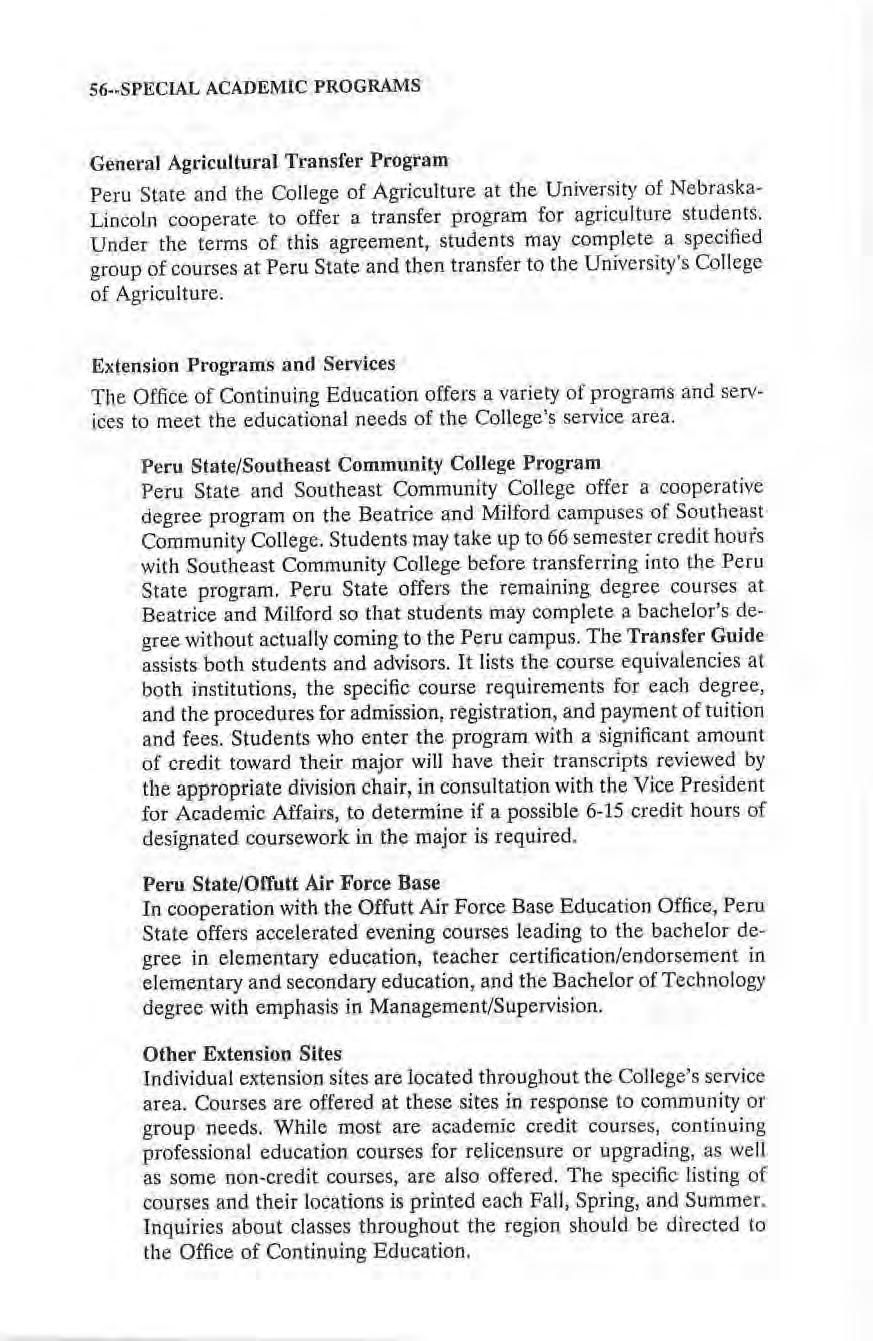
Other Extension Sites
individual extension sites are located throughout the College's service area. Courses are offered at these sites in response to community or group needs. While most are academjc credit co urses, continuing professional education courses for relicensure or upgrading, as well as some non-credit courses, are also offered. The specific listing of courses and their locations is printed each Fall, Spring, and Summer. Inquiries about classes throughout the region should be directed to the Office of Continuing Education.
Summer Sess ion
The College offers a Summer Session beginning around the first of June and running through the end of July. Courses are offered for five and eight weeks as well as in wotl<shop formats of one to three weeks .
Gra duate Programs
Peru State College offers a Master of Science in Education degree program for classroom teachers in element ary and secondary classrooms. It is a program designed in response to the assessed needs of teachers. The program features emphasis on the improvement of classroom teaching, tbe use of technology in teaching and the strengthening of the foundations of educational practice. Further information may be secured by con tacting the Division of Education.
Developmental Studies Program

The Developmental Studies program is designed to assist students in reaching their educational objectives The program is concentrated fo three areas that most often impact student success: English composit ion, mathematics and reading.
Placement in Developmental Studies is through the Computer Placement Test (CPT) which is required of all students entering Peru State College with fewer than 30 hours of college work and ACT scores lower than 20 in Reading, 21 in sentenc.e composition and 21 in mathematics.
The courses are taught through the use of compute r-assisted instruction and through one-to-one interaction between the student and the instructor. Students must sign up for developmental courses based on the following criteria:
Reading - Students scoring below 65 on the reading comprehension portion of the CPT are required to enroll in English 070 Reading r.
English Com position - Students scoring below 75 on the sentence skill portion of the CPT are required to enroll in English 080 Composition . Math - Students scoring below 60 on either or both the arithmetic and elementary algebra portions of the CPT are required to enroll in Math 080 Arithmetic.
Peru State College offers developmental reading English 070 and 071, composition English 080 and 081, mathematics Math 080 and 081. Students failing to pass the post-test of the first course in the sequence are required to register for the second course. Passing of the post-test in English is a requirement for entry into the General Studies English cu r ricu lum. Passing the post-test in mathematics is a requirement for entry into the General Studies mathematics curriculum.
SPECIAL ACADEMIC PROGRAMS- -57
Students fai ling to pass the post-test in the English 081 or Math 081 will be counseled by the Vice President for Student Affairs concerning their chances for academic success. Upon the recommendation of the Vice President, the student may continue through independent study to pass the post-test. After the third opportunity, Peru State College will no longer be able to provide assistance in the developmental studies area.
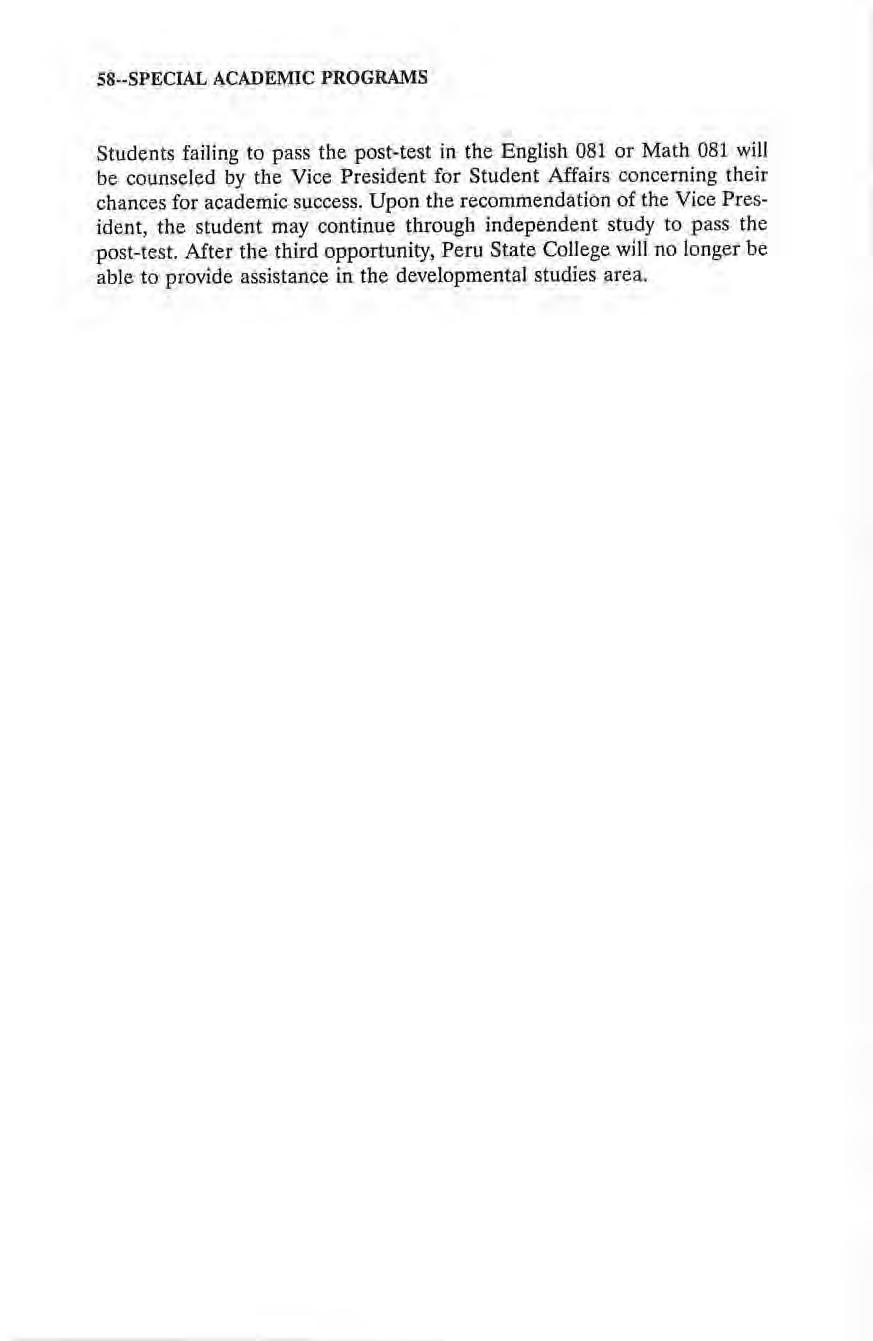
58--SPECIAL
ACADEMIC PROGRAMS
ASSESSMENT AT PERU
Peru State's outcomes assessmen t model assesses the three primary components of college student development: Skills delivered in general education through writing across the curriculum and student portfolios; attitudes of students about the overall Peru experience, and knowledge of the discipline by all graduating seniors.
Skills
The foundation for the sophomore skill assessment is the objectives of Peru's General Studies program: that all Peru graduates can write, speak, and compute effectively; a re computer literate; ca n think critically and independently; are open to and have the capacity for change; are prepared to assume their social and civic roles as leaders in an increasingly interdependent world; and are equipped to pursue lives that are intellectually, ethically, aesthetically, and physically rewarding.
Faculty goals, Each general education faculty member (including adjunct and part-time) prepares a Statement of Goals and Objectives describing the intellectual processes, skills, habits of mind, attitudes, and scholarly procedure that he/she models and encourages in each general education cou rse and deems essential for a student to master for success in upper level courses.
Synoptic essay questions. The general education facu lty prepare wide-ranging essay questions based on general education goals that are given on the exams ( usually the final) in each general education class.
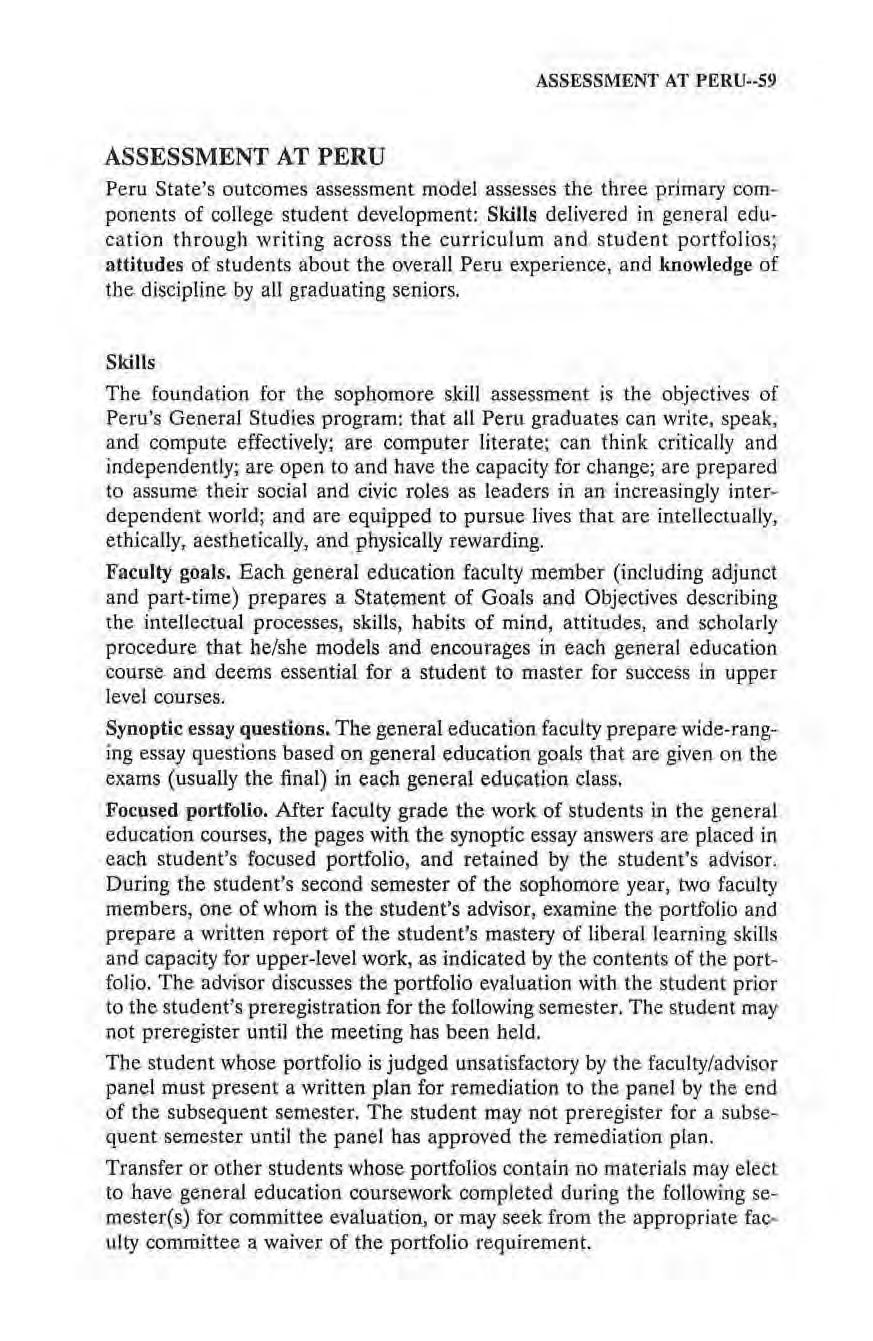
Focused portfolio, After faculty grade the work of students in th e gen eral education courses, the pages with the synoptic essay answers are placed in each student's focused portfolio, and retained by the student's advisor. During the student's second semester of the sophomo re year, two faculty members, one of whom is the student's advisor, examine the portfolio and prepare a written report of the student's mastery of liberal learning skills and capacity for upper-level wor k, as indicated by the contents of the portfolio . The advisor discusses the portfolio evaluation with the student prior to the student's preregistration for the following semester. The student may not preregister until the meeting has been held.
The student whose portfolio is judged unsatisfactory by the faculty/advisor panel must present a written plan for remediation to th e panel by th e end of the subsequent semester. The student may not preregister for a subsequent semester until the panel has approved the remediation plan.
Transfer or other students whose portfolios contain no materials may elect to have general education coursework completed during the following semester(s) for committee evaluation, or may seek from the appropriate faculty committee a waiver of the portfolio requirement.
ASSESSMENT AT PERU--59
At tit udes
Assessing student academic and intellectual development is primary and necessary but not sufficient. Tapping st udent attitudes and generally assaying the student experience gives information about the environment in which student learning takes place and identifies strengths and weaknesses in services, facilities, programs, and personnel. The student experience is assessed both qualitatively and quantitatively. All graduating seniors are exit-interviewed by Student Affairs staff and vo lunteer faculty. Also, a survey is administered to a sample of students during the spring of odd-numbered years. Results of these interviews and surveys annually are collected, analyzed, and distributed to faculty, staff~ and st ud ents and incorporated into college planning activities.
Knowledge
Each discipline in which a degree is awarded shall have a demonstration of senior competency. The appropriate faculty committee determines if a proposed competency plan meets "expected level of competency" set by faculty in that discipline to include command of the knowledge base and methodology fo r the major and competency in liberal learning sk ills. Competencies include: student teaching, capstone courses (e.g. , Business Policy and Experimental Biology), the senior art show and the senior re c it a l.
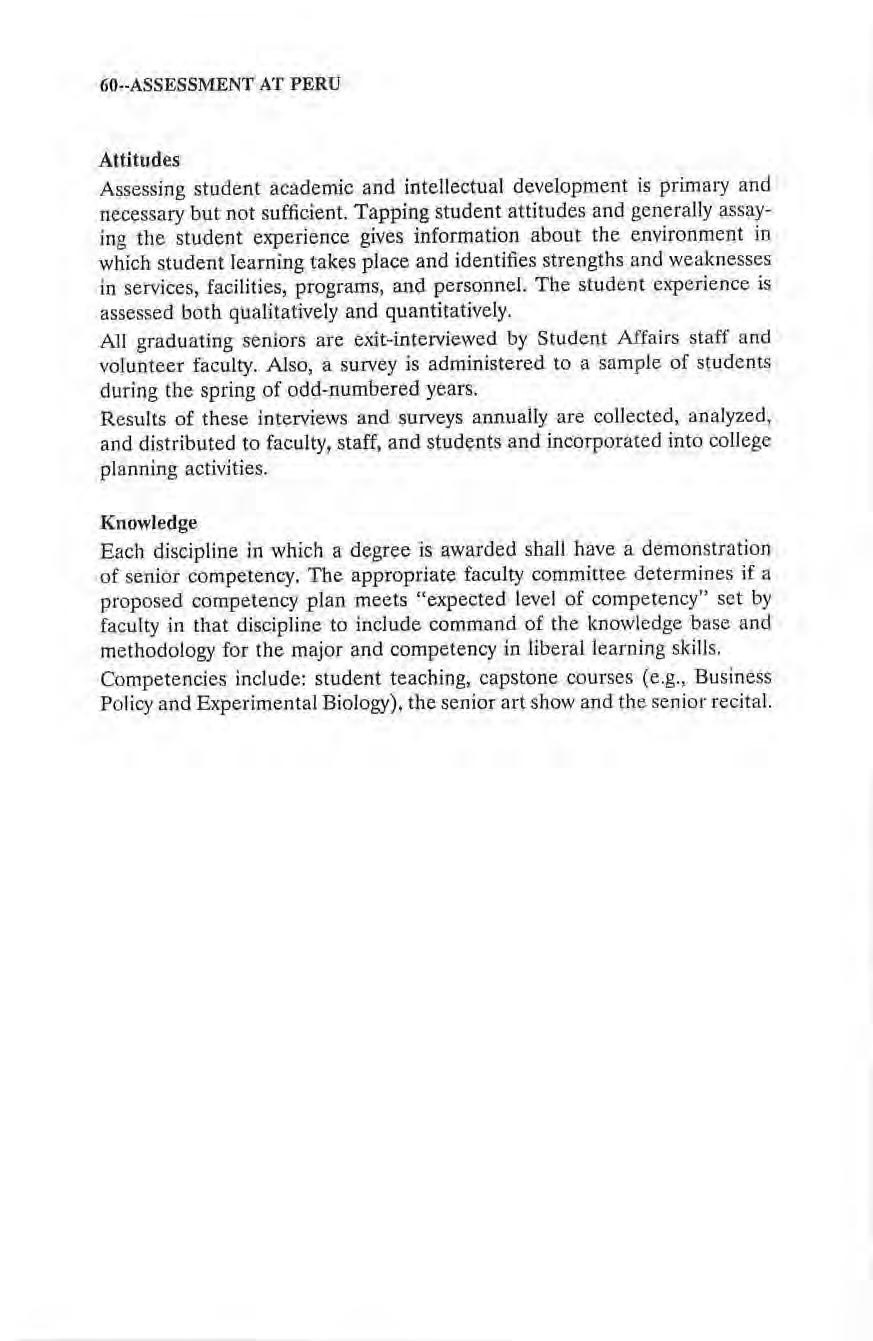
60--ASSESSMENT AT PERU
ACADEMIC POLICIES AND PROCEDURES
Academic Credit
How to Determine Credit
Peru State credit is expressed as semester credit hours. One credit hour is awarded to a student who satisfactorily completes (1) a course that meets one hour per week for a semester, or (2) a laboratory that meets for two hours per week for a semester, or (3) a laboratory that meets for three hours per week for a semester, or any combination of these depending upon the type of instruction and material covered in the course. Credit for internships, student teaching, and ot her instruc ti onal formats is determined u sing other appropriate standar ds.
Transfer
Peru State College accep ts credit hours successfully comple t ed at other accredited colleges and universities provided they are repo r ted on the official transcript of each previously attended institu t ion and in credit hou rs. This policy also app lies to Peru State College students who earn credits on an in terim basis at another college and provided t hey have the prior approval of the approp ri ate Division Chairperson. The required forms for reporting transfer credits a r e available at the Registrar 's Office.
Armed Services
Veterans of the armed forces who are honorably discharged and cur r ent act ive duty personnel will generally be granted credit for their military experience in accordance with t he recommendations of the American Council on Education. Air F orce records should be obtained from the Counci l on Education. Army records should be obtained from the Army/ American Council o n Education R egistry Transcript System (AARTS).
Extra-institutional
Students may earn college credit for experiences a nd accomplishments attained outside of the normal college setting. C r edit may be granted through standardized examination programs or the cre dit recommendations of the Guide to the Ev aluation of Educational Experiences in the Armed Service s and The National Guide to Educational Credit for Training Programs. The College' s general policy for awarding credit for extra-institutional learning is:
1. Only individuals who have not participated in sche duled coursework are eligible to receive extra- insti tu tional c redit.

ACADEMIC POLICIES & PROCED URES--61
2. Extra-institutional credits are considered transfer credits and are subject to the same policies as other transfer credits.
3. A maximum of 66 semester credit hours earned through extra-institutional validation may be applied to the 125 semester hour minimum required for a bachelor's degree, unless otherwise specified.
4. Credit examinations may be earned on ly once in a single subject. A similar subject test in a nother testing program will not earn additional credits.
Institutiona l Examinations
Students, due to experience and/or personal improvement, may qualify for credit in lower division courses through the procedure of an interview a nd a written examination provided the examination is made available by the respective aca demi c divisions. The student must, through an interview, satisfy a faculty committee that he/she has had a formal or informal experience in which the course content may have been met before the student will be given a written comprehensive examination. The amount of credit to be allowed, the course for which substitution, if any, is made, and the particular graduation requirements which may be satisfied, will be determined by the chair of the division and will be subject to all general graduation requirements. The student must register for the course and pay the tuition charges before writing the examinations. The letter grade received is recorded on the student's transcript.
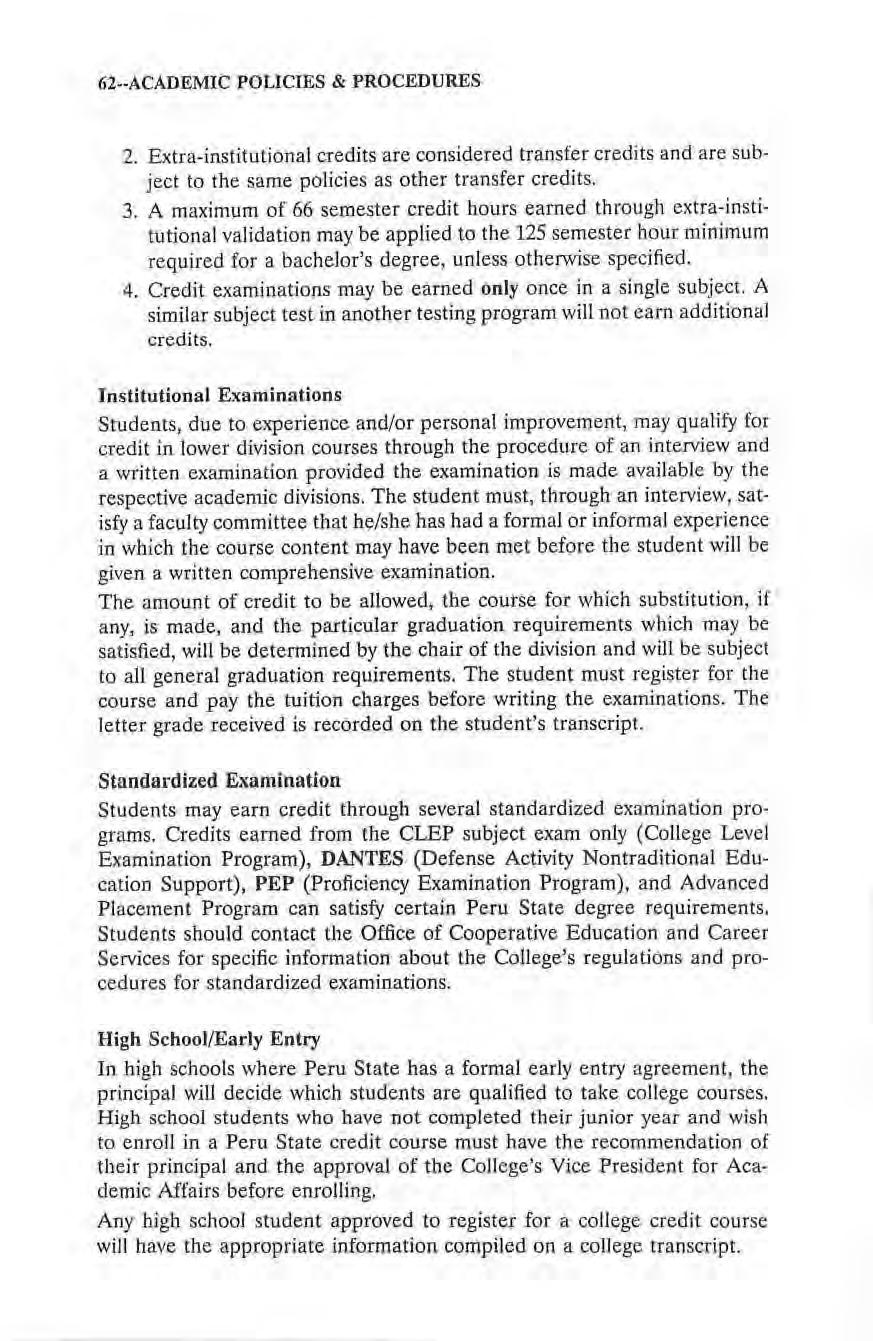
Standard ized Examination
Students may earn credit through several standardized examination programs. Credits earned from the CLEP subject exam only (College Level Examination Program), DANTES (Defense Activity Nontraditional Education Support), PEP (Proficiency Examination Program), and Advanced Pl acement Program can satisfy certain Peru State degree requirements. Students should contact the Office of Cooperative Education and Career Services for specific information about the College's regulations and procedures for sta ndardized examinations.
High School/Early Entry
In high schools where Peru State bas a formal early e ntry agreement, the principal will decide which students are qualified to t ake college courses. High school students who have not completed their junior year and wish to enroll in a Peru State credit course must have the recommendation of their principal and the approval of the College's Vice President for Academic Affairs before en rollin g
Any high school student approved to register for a college credit course will have the appropriate information compiled on a college transcript.
62- -ACADEMIC POLICIE.S & PROCEDURES
Correspondence Courses
Peru State does not offer correspondence courses, but is a correspondence testing center. Inquiries about testing should be directed to t he Office of Continuing Education.
Variable Credit Courses
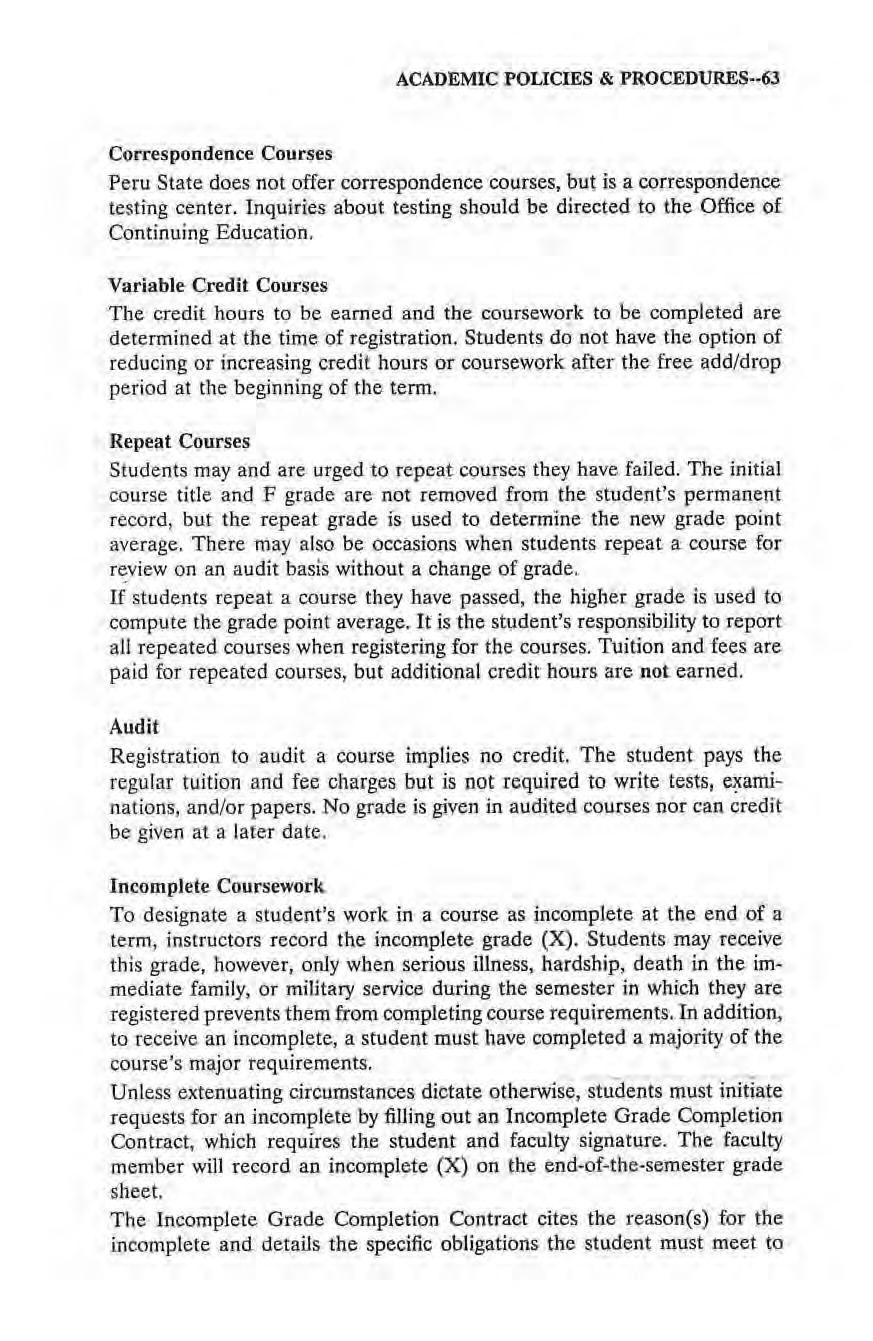
The credit hours to be earned and the coursework to be completed are determined at the time of registration. Students do not have the option of reducing or increasing credit hours or coursework after the free add/drop period at the beginning of the term.
Repeat Courses
Students may and are urged to repeat courses they have failed. The initial course title and F grade are not removed from t he student's permanent record, but the repeat grade is used to determine the new grade point average. There may also be occasfons when students repeat a course for r~view on an audit basis without a change of grade.
If students repeat a course they have passed, the higher grade is used to compute the grade point average. It is the student's responsibility to report all repeated courses when registering for the courses. Tuition and fees are paid for repeated courses, but additional credit hours are not earned.
Audit
Registration to audit a course implies no credit. The student pays the regular tuition and fee cha rges but is not required to write tests, e~aminations, and/or papers. No grade is given in audited courses nor can credit be given at a later date.
Incomplete Coursework
To designate a student's work in a course as incomplete at the end of a term , instructors record the incomplete grade (X). Students may receive this grade, however, only when serious illness, hardship, death in the immediate family, or military service during the semester in which they are registered prevents them from completing course requirements. In addition, to receive an incomplete, a student must have completed a majority of the course's major requirements. _
Unless extenuating circumstances dictate otherwise, students must ini ti ate requests for an incomplete by filling out an Incomplete Grade Completion Contract, which requires the student and faculty signature. The faculty member will record an incomplete (X) on the end-of-the-semester grade sheet.
The Incomplete Grade Completion Contract cites the reason(s) for the incomplete and details the specific obligations the student must meet to
ACADEMIC POLICIES & PROCEDURES--63
change the incomplete to a letter grade. If students agree to complete required work prior to the normal dead li ne for making up an incompletethe end of the subsequent semester -this date must appear in the contract. The division chair, the instructor, and the student receive signed copies of th e Incomplete Grade Completion Contract.
Even if the student does not attend Peru State College, a ll incomplete course work must be finished by the end of the subsequent semester. Unless the appropriate faculty committee approves an extension, if the student does not fulfi ll contract obligations in the allotted time, t he incomplete grade automatically becomes an F. Students who have filed an application for grad uation are not eligible for a grade of incomplete.
Classification o f Student s
Students are classified according to the number of semester credit hours earned:
Freshman Sophomore Junior Senior
0 to 29 c redits
30 to 5·9 credits
60 to 89 credits
90 and over
Post-graduate students have earned a bachelor's degree or higher and are earning additional undergraduate credit. Non-degree students are qualified persons who are enrolled primarily to satisfy an occupational need or personal interest.
Academ ic Progress Sheet
An academic progress sheet guides and records a student's progress to graduation and is maintained by the Registrar. The progress sheets are normally issued during the second semester of attendance for freshmen; transfer students' sheets are initiated as soon as possible following full admission to the College.
Full -Time Stu de nt Status
Peru State ·students who are enrolled for 12 credit hours or more during a semester are considered full-time students. However, the norma l course load for a student who ex'Pects to complete a bachelor's degree within eight semesters (4 years) is 15-16 hours. The maximum load without special permission is 17 hours; more than 17 hours requires the approval of the chair of the division in which the student is majoring. The Registrar may approve 18 credit hours provided the student obtained a minimum 3.5 grade point
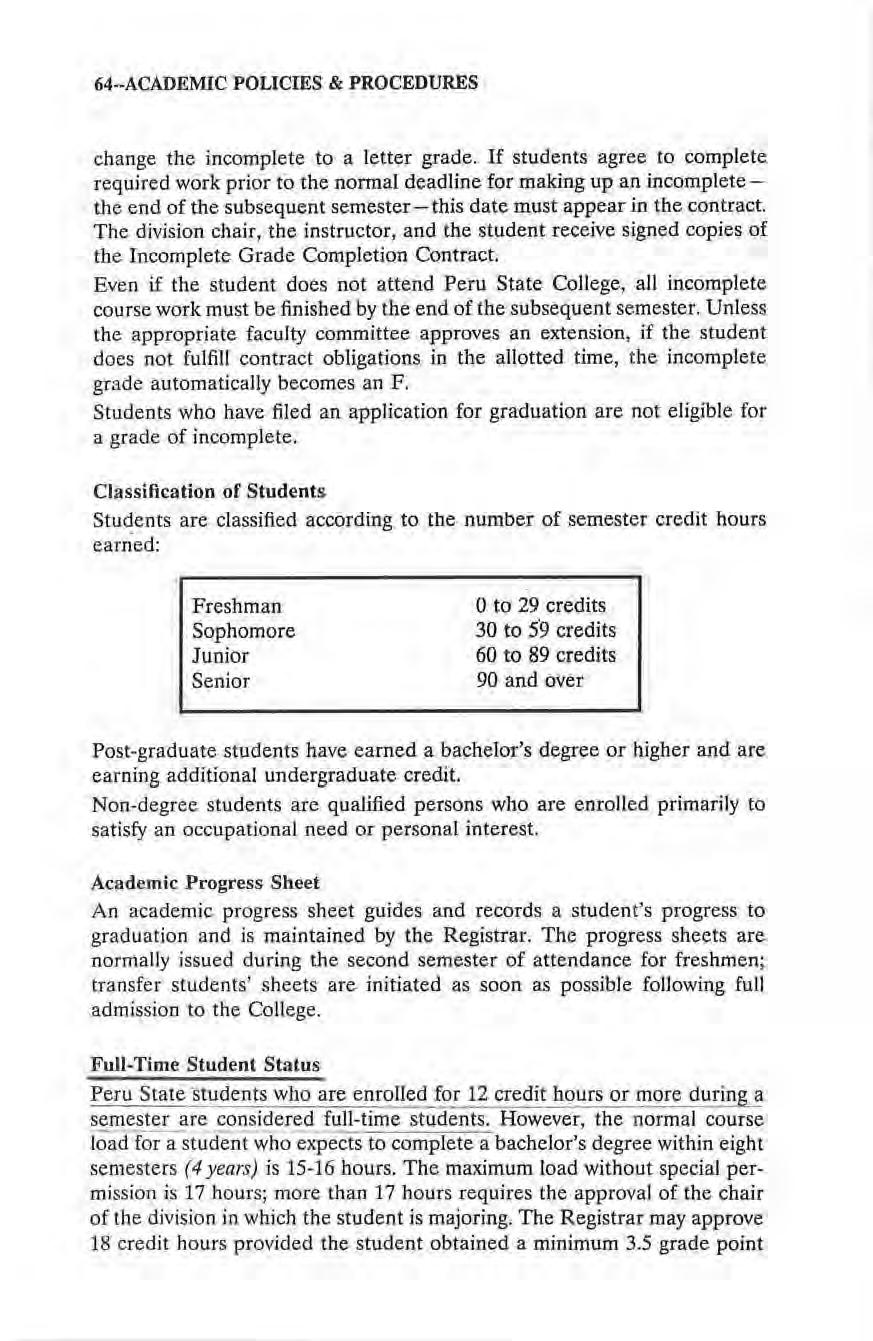
64--ACADEMIC
&
POLICIES
PROCEDURES
average the previous semester. The maximum credit hour load is 21 and may not be exceedeQ. Class withdrawals subsequent to the add/drop period are included in the credit hour load.
Veterans and other eligible persons attending Peru State under the benefits of Chapter 34 and 35, Title 38, U.S.C., as fuJl-time students must be enrolled for at least 12 semester hours, or the equivalent.
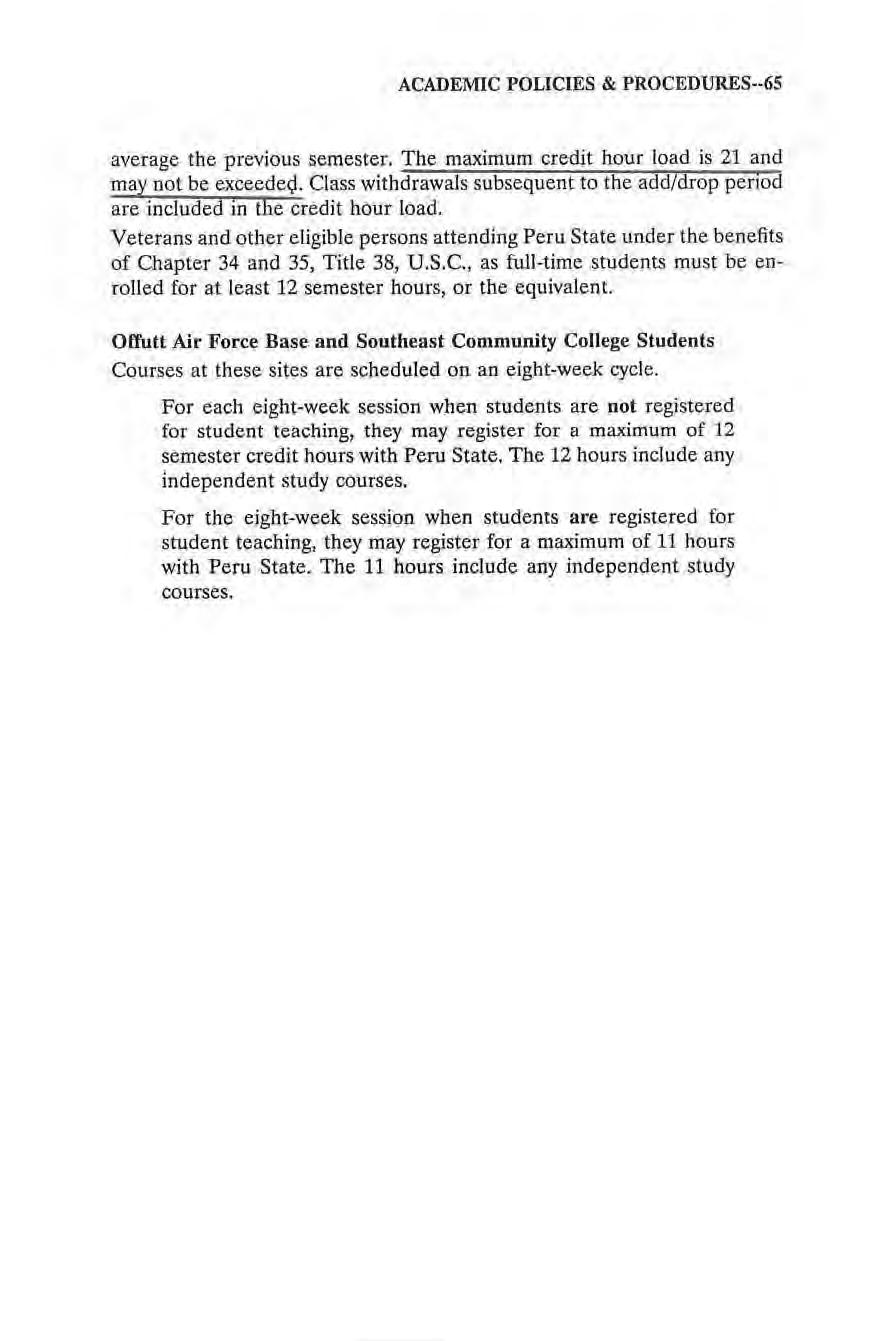
Offutt Air Force Base and Southeast Community College Students
Courses at these sites are scheduled on an eight-week cycle.
For each eight-week session when students are not registered for student teaching, they may register for a maximum of 12 semester credit hours with Peru State. The 12 hours include any independent study courses.
For the eight-week session when students are registered for student teaching, they may register for a maximum of 11 hours with Peru State. The 11 hours include any independent study courses.
ACADEMIC POLICIES & PROCEDURES--65
OTHER ACADEMIC POLICIES
Academic Appeals
Students who wish to appeal an academic decision made by the College may petition the Vice President for Academic Affairs in writing and should clearly and specifically state the grounds for the a ppeal. The Vice President for Academic Affairs takes the petition to the appropr iate faculty committee, which makes the decision on the appeal.
Academic Bankruptcy
A student may remove up to two complete semesters of work from his/her cumulative grade point average and degree considerations by petitioning for approval to the Office of Vice President for Academic Affairs for distribution to the appropriate faculty committee. To qualify, a student must have completed either 15 consecutive semester hours of credit with a minimum 3.0 term grade point average or 30 consecutive hours with a minimum
2.5 term grade point average at Peru State College following the semester(s) the student wishes to remove.
To declare a semester bankrupt, all courses taken during that semester are voided (both credit hours and grades). The bankrupt semester is removed from consideration for cumulative grade point average purposes and the ba11krupt credit is not used for degree requirements. The semester listing of courses and grades, however, remains on the academic transcript
Academic Dishonesty
Academic integrity is a basic principle which requires the student to take credit only for ideas and efforts that are his/her own. Cheating is defined as the submission of materials in assignments, exams, or other academic work that is based on sources prohibited by the faculty member. Cheating shall i nclude, but is not limited to, situations in which the students:
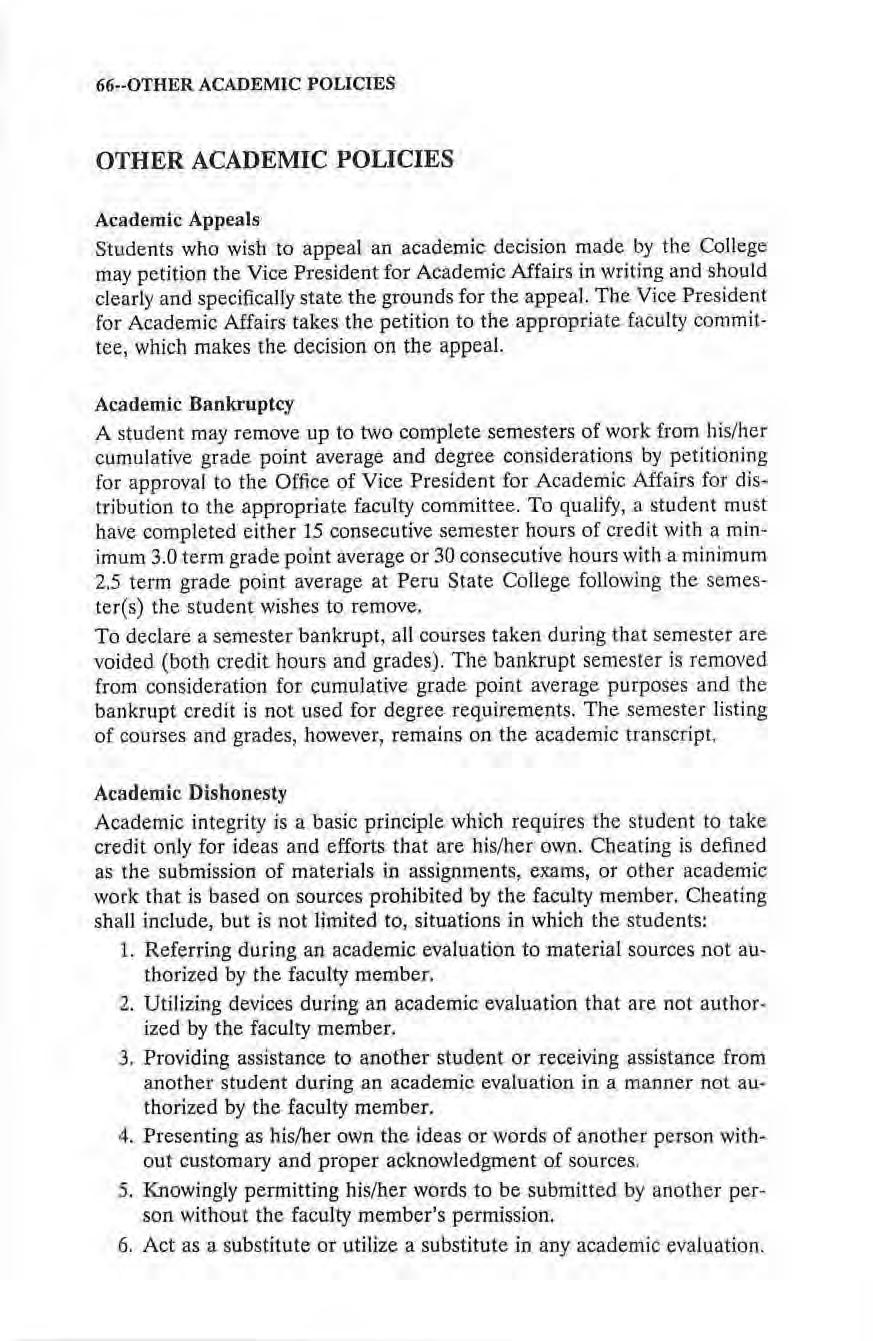
1. Referring during an academic evaluation to material sources not authorized by the faculty member.
2. Utilizing devices during an academic evaluation that are not authorized by the faculty member.
3. Providing assistance to another student or receiving assistance from anot her student during an academic evaluation in a manner not au• thorized by the faculty member.
4. Presenting as his/her own the ideas or words of another person without customary and proper acknowledgment of sources.
5 Knowingly permitting his/her words to be submitted by another person without the faculty member's permission.
6. Act as a substitute or utilize a substitute in any academic evaluation.
66--0THER
ACADEMIC POLICIES
7. Fabricate data in suppo rt of laboratory or field work.
8. Possessing, buying, selling, obtaining, or using a copy of any materials intended to be used as an instrument of academic evaluation in advance of its administration.
9. Altering grade records of his/her own or another student's work in a course or a component of a course.
In addition to any adverse academic action that may result from engaging in academically dishonest behavior, the College specifically reserves the right to address and sanction the conduct involved through the disciplinary procedures outlined in this catalog. Academic actions are reviewable under the Academic Appeals Policy contained in this catalog.
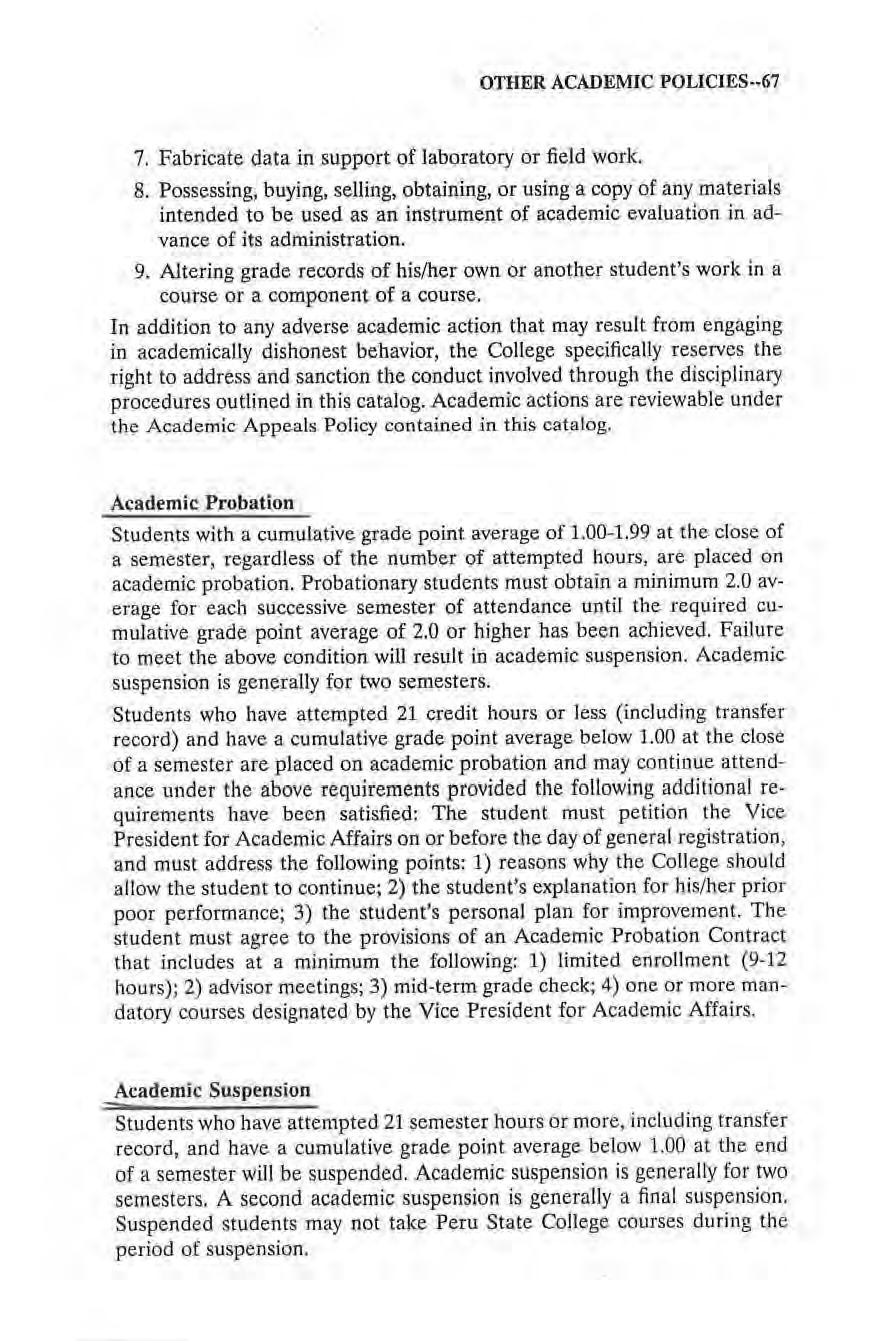
Academic Probation
Students with a cumulative gr ade point average of 1.00-1.99 at the close of a semester, regardless of the number of attempted hours, are placed on academic probation. Probationary students must obtain a minimum 2.0 average for each successive semester of attendance until the required cumulative grade point average of 2.0 or higher has been achieved. Failure to meet the above condition will result in academic suspension. Academic suspension is generally for two semesters. Students who have attempted 21 credit hours or less (including transfer record) and have a cumulative grade point average below 1.00 at t he close of a semester are placed on academic probation and may continue attendance u11det the above requirements provided the following addition a l requirements have been satisfied: The student must petition the Vice President for Academic Affairs on or before the day of general registration, and must address the following points: 1) reasons why the College should allow the s tud ent to continue; 2) the student's explanation for his/her prior poor performance; 3) the student's personal plan for improvement. The student must agree to the provisions of an Academic Probation Contract that includes at a minimum the following: 1) limited enrollment (9-12 hours) ; 2) advisor meetings; 3) mid-tenn grade check; 4) one or more mandatory courses designated by the Vice President for Academic Affairs.
Academic Suspension
Studen ts who have attempted 21 semester hours or more, including transfer record , and have a cumulative grade point average below 1.00 at the end of a semester will be suspended . Academic suspension is generally for two semesters. A second academic suspension is generally a final suspension. Suspended students may not take Peru State College courses duri n g the period of suspension.
OTHER ACADEMIC POLICIES--67
Administrative Withdrawal
Students who do not meet the prerequisjtes of a course as stated in the current catalog and who have not received instructor permission to enroll may be adm inistratively withdrawn from the course. Stude nts who are so identified after registering for a course will be notified within the add/drop period by the Division Chair that they do not meet the prerequisites and should institute the procedures for dropping the course. Students who do not withdraw will be notified by the Division Chairperson that they are being withdrawn. The Division Chairperson will notify the Registrar to have the student withdrawn. Such notification will be approved by the Vice Pres• ident for Academic Affairs.
Attendance and Scho lastic Attitude
Students are e;,,.'Pected to attend classes r egularly, to arrive punctually, and to complete all assjgned work. Attendance is a privilege and a responsibility represented by not only the student's investment, but also by a significant investment by the State.
When it is necessary for students to miss class, they have the responsibility to notify their instructor in advance whenever possible. Faculty members have the prerogative of allowing students to make up and complete work missed during the absence.
Instructors have the right to base a portion of a student's grade on attendance. They must present their grading practices in writing to both students and th eir division chair during the first week of the semester.
Whenever absences or other elements of scholastic attitude become det· rimental (regardless of cause) to the student's standing in class and /o r the success of the class as a whole, the instructo r may confer wi t h the student. The instructor and the student may mutually agree that the registration in the course should be dropped or the instructor may issue the student a "scholastic alert." Future conferences for the same or related reasons may result in the instructor dropping the student from the class, If the student requests, the Vice President for Academic Affairs may be asked to participate in the decision. The grade will be a W if the course is dropped prior to the last date to withdraw with a W. An F will be recorded after this date.
Changing a Major
Students wanting to change their initia l major or Premajor status will complete the Change of Major form avrulable at the Registrar's office.
Students who elect to change their major may have to follow t he requirements in the College catalog current at the time of change, rather than the one in effect at the time they were admitted to the College to pursue a degree program. A change in major may also require additional classes and delay the graduation date.
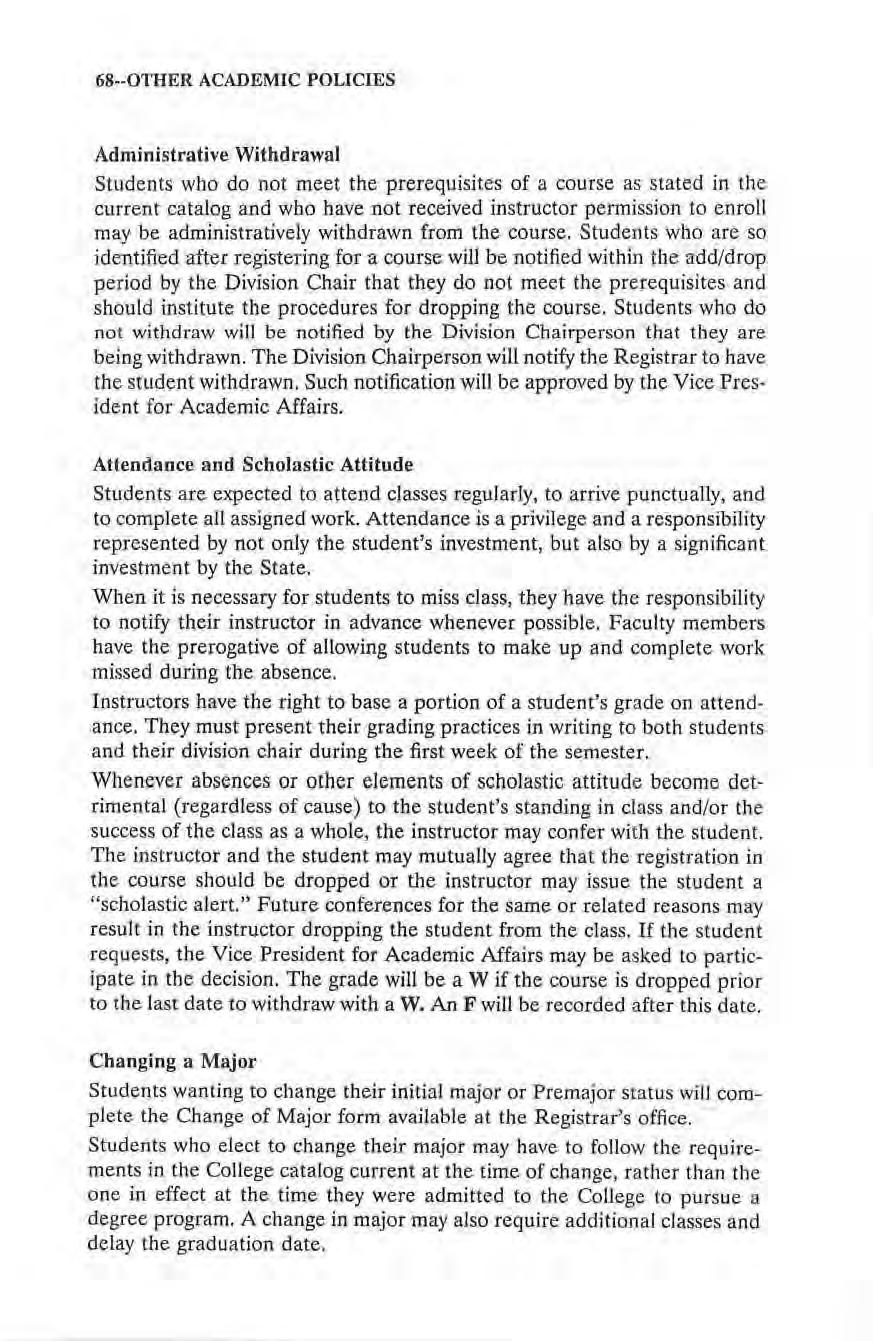
68--0TIIER ACADEMIC
POLICIES
Ch ange in Regi s tration/Drop-Add
Students are responsible for the accuracy of each registration and are ultimately responsible for meeting all degree requirements.
A cha nge in registration is processed at th e Registrar's Office. No full semester courses may be added after the published final date to add courses. When applicable, tuition charges will be refunded only during the official add/drop period.
Dead Week
Dead Week is the week prior to finals week and no exams are to be given during that week. Exceptions to this policy may be granted only by the Vice President for Academic Affairs.
Fina l Exams
Final exams are sched uled the last week of the semester. Coaches of varsity athletic teams are not to schedule regular games or events during this week. However, they may enter their teams in NAIA approved play-offs in which the College has declared an intention to participate if qualified. Students who participate in playoff events during finals week are still subject to the attendance policies of their instructors.
Grading System
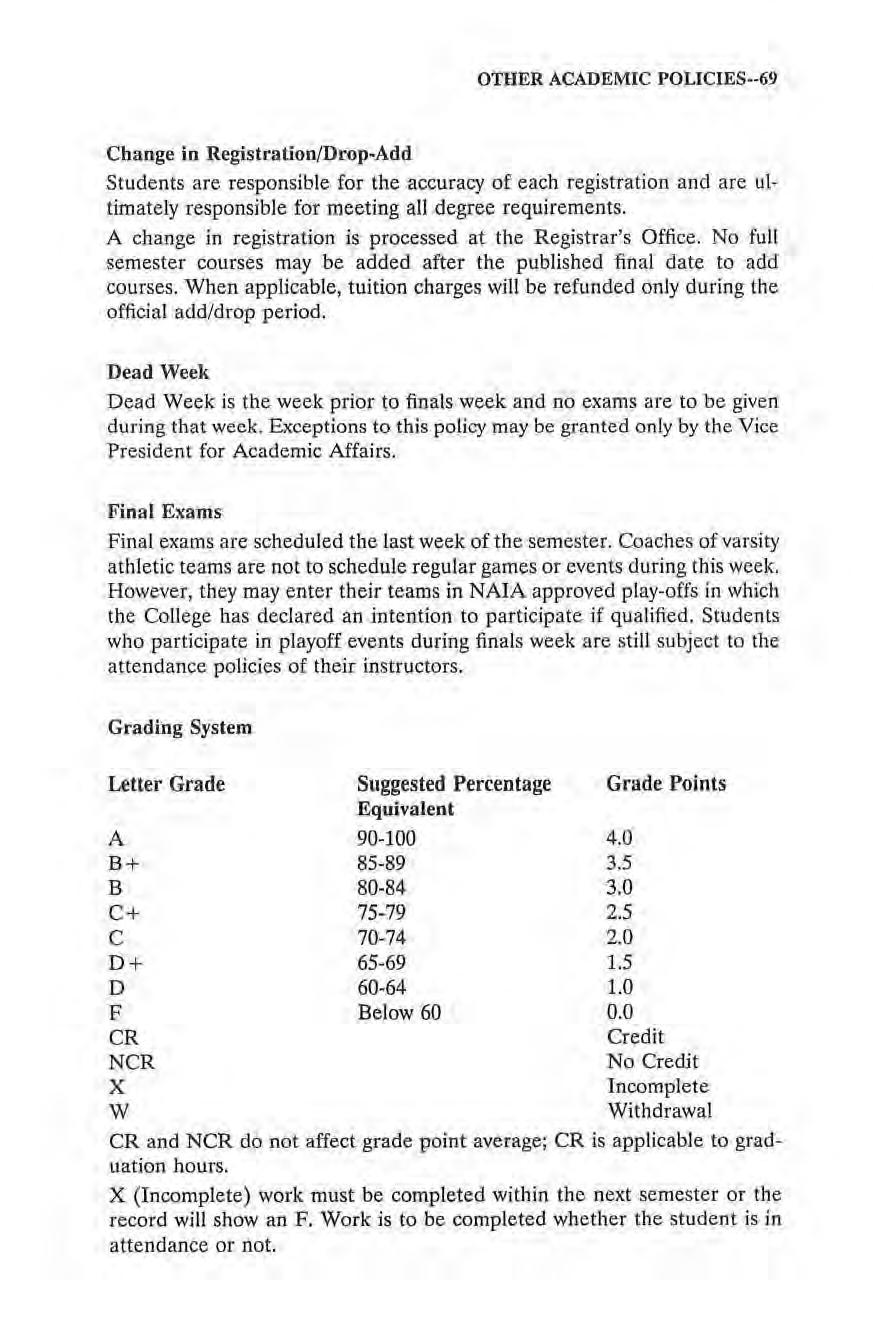
No Credit I ncomplete
CR and NCR do not affect grade point average; CR is applicable to graduation hours.
X (Incomplete) wor k must be completed within the next semester or the record wil! show an F. Work is to be completed whether the student is in attendance or not.
OTHER ACADEMIC POLICIES--69
Letter Grade A B + B c+ C D+ D F CR NCR X w Suggested Percentage Equivalent 90-100 85-89 80-84 75.79 70-74 65-69 60-64 Below 60 Grade Points 4.0 3.5 3.0 2.5 2.0 1.5 1.0 0.0 Credit
Withdrawal
Graduation Honors
Graduation honors are conferred on bachelor degree candidates who have earned a minimum of 60 Peru State College semester hour credits in graded courses (CR grades excluded). These hours must be resident credit hours. Grade s and credits earned at other colleges and universities do not apply toward graduation honors from Peru State
At the end of each semester the Vice President for Academic Affairs publishes the Academic Honors List. Students on the Academic Honors Li st must have a grade point average of 3.75 or higher for the s emeste r, have completed at le ast 12 hours (credit/no credit not included), have no incomplete grades for the semester, and have no "holds" on their academic record.
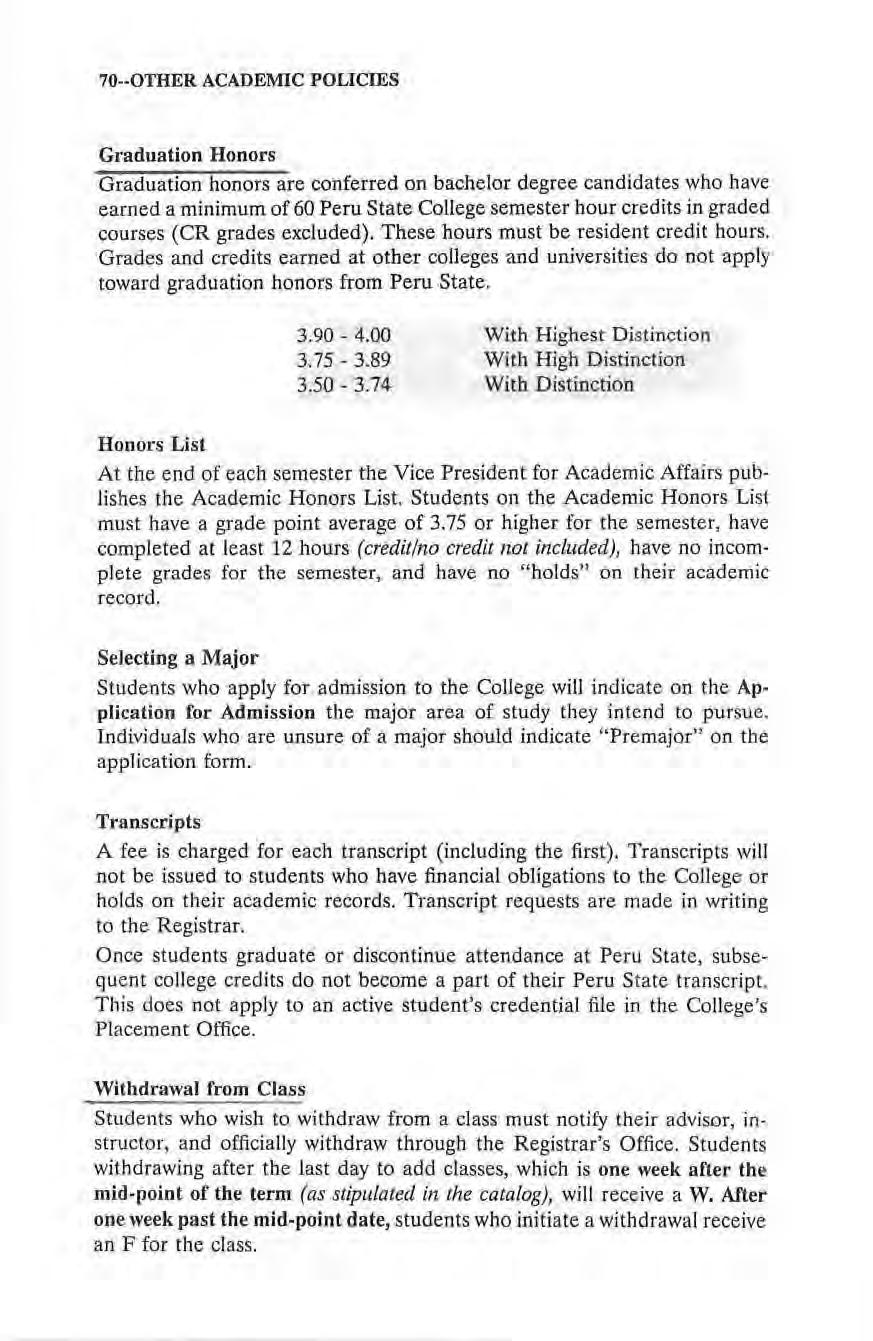
Selecting a Major
Students who apply for admission to the College will indica te on the Application for Admission the major area of study they inte nd to pursu e Individuals who are unsure of a major should indicate "Premajor" on the application form .
Transcripts
A fee is charged for each tra nscript (including the first). Transcripts will not be issued to students who have financial obligations to the College or holds on their academic records. Transcript requests are made in writing to the Registrar.
Once students graduate or discontinue attendance at Peru State, subseguent college credits do not become a part of their Peru S t ate transcript. This does not apply to an active student's credential file in the College's Placement Office.
Withdrawal from Class
Students who wish to withdraw from a class must notify the ir advisor, instructor, and officially withdraw through the Registrar's Office. Students withdrawing after the last day to add classes, which is one week after the mid-point of the term (as stipulated in the catalog), will receive a W. After one week past the mid-point date, students who initiate a withdrawal receive an F for the class.
70--OTHER
ACADEMIC POLICIES
4.00
75 · 3.89
• 3 .74
Honors List 3.90
3
3.50
With Highes t Dis tinction
With High Distinction With Distinction
Withdrawal from the College
Students who wish to withdraw from the College mus t initi ate their withdrawal with the Vice President for Student Affairs and complete all the appropriate paperwork. Proportional tui tion refunds are made in accor dance with the refund schedule (see the E--cpenses and Financial Aid section) to students who officially withdraw from the Coflege. After one week past the mid-point of the term, the Vice Pres ident for Student Affairs will determine u unusual or extenuating circumstances surround a withdrawal request and recommend either Withdrawal (W) or Failing (F) grades for all coursework. Poor academic performance is not sufficient reason to receive all W's.
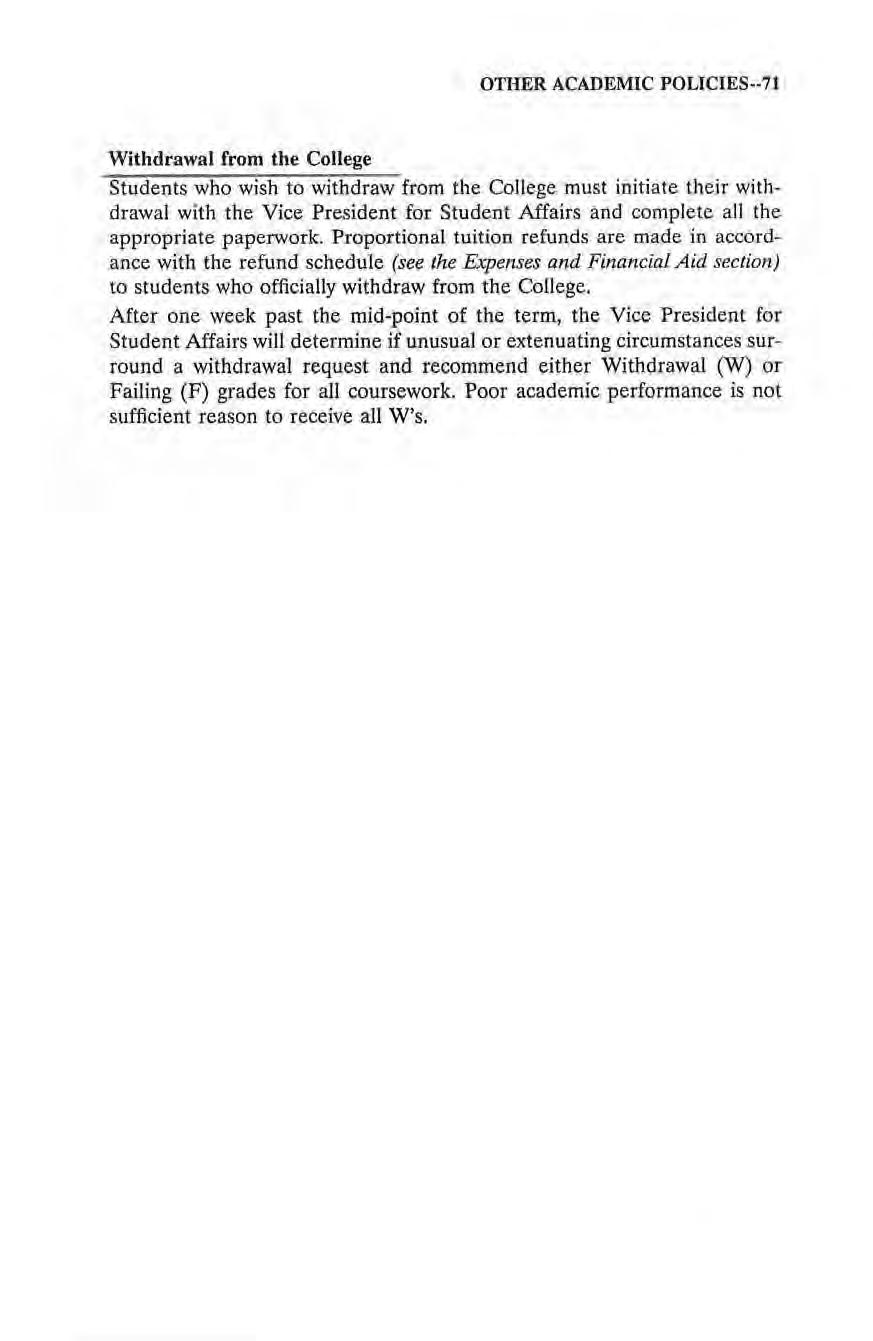
OTHER ACADEMIC POLICIES--71
STUDIES
GENERAL STUDIES
The purpose of the General Studies Program at Peru State is to prepare th e student for advanced college work as well as for life-Jong learning . The General Studies Program consists of specific courses that are designed to assist the student in acquiring the intellectual foundation that will last for a lifetime of learning.
The objectives of the General Studies Program are established in the Role and Mission statement. T his statement requires that Peru graduates ''1 ) can write, speak, and compute effectively, 2) are computer literate, 3) can think c ritically and independently, 4) are open to and have the capacity for cha nge, 5) are prepared to assume their social and civic roles as leaders in an increasingly interdependent world, and 6) are equipped to pursue lives that are intellectuaJiy, ethically, aesthetically, and physically rewarding. " Below is the actual program designed to m eet the above objectives.

General Studies C ourses
rank at the 85th percentile or higher on the English section of the ACT or SAT
waive the first course of the composition skills requirement (Eng 101).
72--GENERAL
BasicSkllls , , , , , . , 17-23 hours Mnthematlcs (Stude nts must complete a course in bot~ A and 8) , , S-8 hours Total A. General Mathematics • Choose One Math 110 E lements of Mathematics, . . 3 or Math 125 Precalculus • • or Math 225 Calculus with Analytic Geometry , . 5 Stude nts who rank at the1 85th pcrcen!ile or higher on th e mathematics section of the ACT or SAT test may woivc the three hour mathem~tics requirement Math 110 B. Statistics • Choose One Math 111 Elements of Statistics . 2 or Math 340 Statistics 3 Computer Science , . , . , . . • . , , , . , , , , . ,3-6 hours Totnl CSci 100 1ntro lo Computer Applications 3 or CSci 102 Intro to Computer Concepts • 3 and Bus 229 Software Applications , .•. , , , , 3 Composition • , . , , , • , , , , 6 h o urs Total Eng 101 English Composition . . , , . , , , , , . , , , , 3 Eng 201 Advanced English Composition , . , . . . , . . , , , . 3 Students who
tests may
Speech , , , . , , , , , 3 hours Total Speh 152 Fundamentals of Speech • , • • • 3 Perspectives Area: , . . . , . , , , , , . , . , , , , . , .28-30 hours Science (One class must have a lab component and students must complete a course in both A and B) , , , , , , , 6-8 hours Total A. Physical Science • • , • , , • • . • • , • . ,3 hou r ~ Chem 101 General Chemistry , . . , . . . . . 4• GSoi 206 Principles of Physical Science . . , ... , . .. 3 GSoi 232 Energy . , , , , , , . , , , , , , , , . , , • , 3 Phys 206 Great Ideas in Astronomy. , , , , , , 3 • B. Lire Science , , • . • 3 hours Biol 101 Introductory Botany • • , , , 4• Biol 102 Introductory Zoology . • . • , . . 4• GSci 205 Biological Science . . , , , , . . 3• HP 205 Science and Society • • , , . . 3 (•Coun;e15 contain a lab component)
Eng 202 Appreciation of Literature
Eng 325 American Literature 11
HP 101 201h Century lssues/Literary Style
Aest hetics
Art 206 Art Appreciation
HP 201 Making SJ:nse: Art in the World
Mus 211 Music Appreciation ,
Speh 232 Introduction t o Theatre
NonWestcrn Studies . ,
Eng 223 Non Western Literature
Hist 25 1 Modem Africa
HP 204 Contemporary Asian Culture
HP 212 Introdu ction to NonWestern Music Western Studies
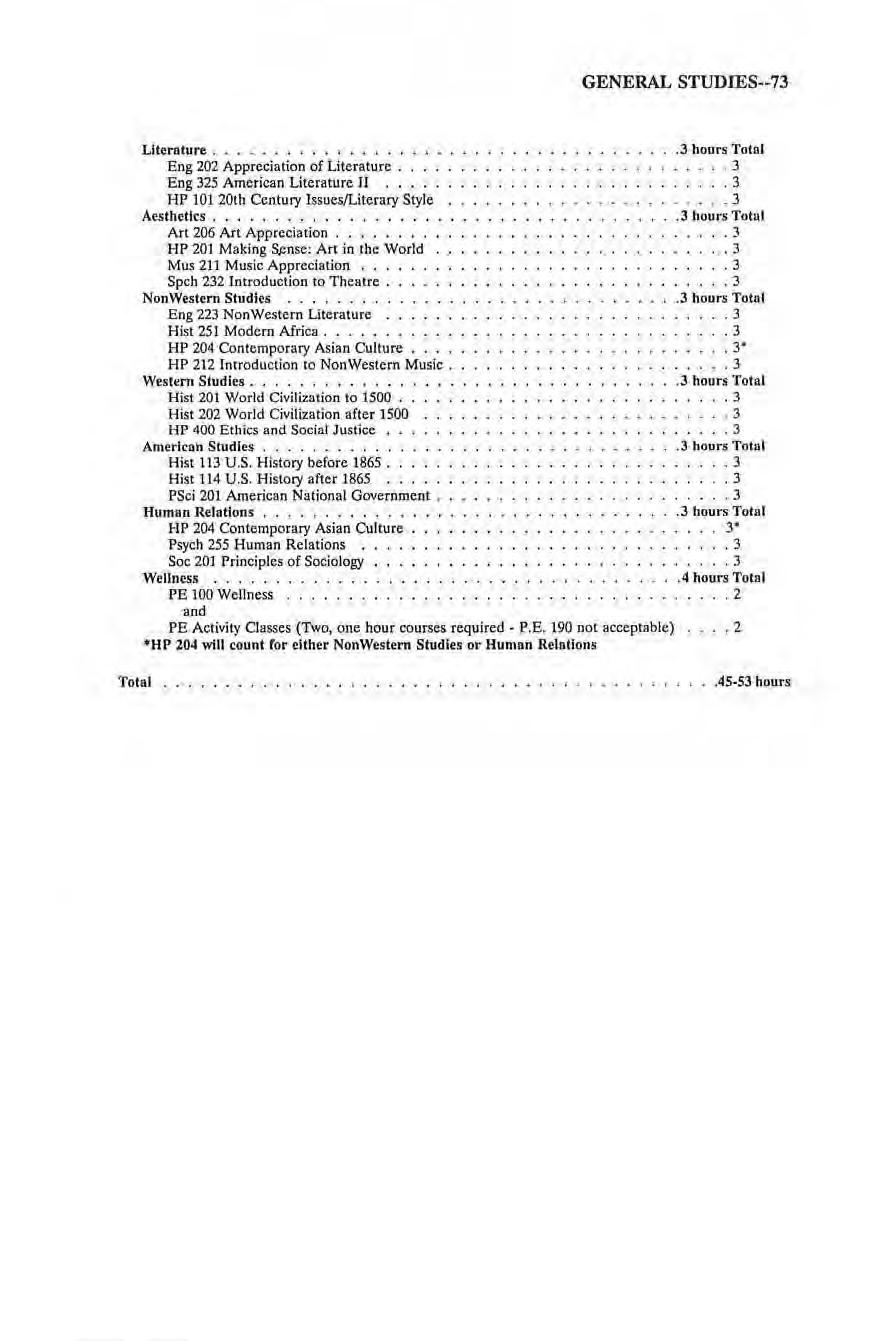
Hist 201 World Civilization to 1500
Hist 202 World Civilization after 1500
HP 400 Ethics and Social Justice , • American Studies ,
Hist 113 U.S. History before 1865
Hist 114 U.S. History after 1865
PSci 201 American N&tional Government ,
H uma n Relations ,
HP 204 Contemporary Asian Culture
Psych 255 Human Relations
Soc 201 Principles of Sociology
PE Activity Classes (Two, one hour courses required• P.E 190 not acceptable)
•HP 204 will count ror either NonWestern Studies or Humpn Re lntions
• , , , . , , , , .•.
Literature
. . . . . . . . , . . . , . . . . .
. . , . . . . . . . , . . .
..
,
.
Wellness . . . . . . . . . . , . . . PE 100 Wellness . , , , , , . . . , . . , . and
3 h ours Total 3 3 3 , 3 hours Totul .3 ,3 .3 .3 .3 hour s Totu l . 3 . 3 3• 3 . 3 hours Total .3 .3 liours Totul 3 3 ..... 3 .3 hours Total 3• 3 3 ,4 hours Total .2
GENERAL STUDIES--73
• 2 Total , , , , , , , . ; • • • , , , , 45-53 hours
DEGREE PROGRAMS
DEGREE PROGRAMS
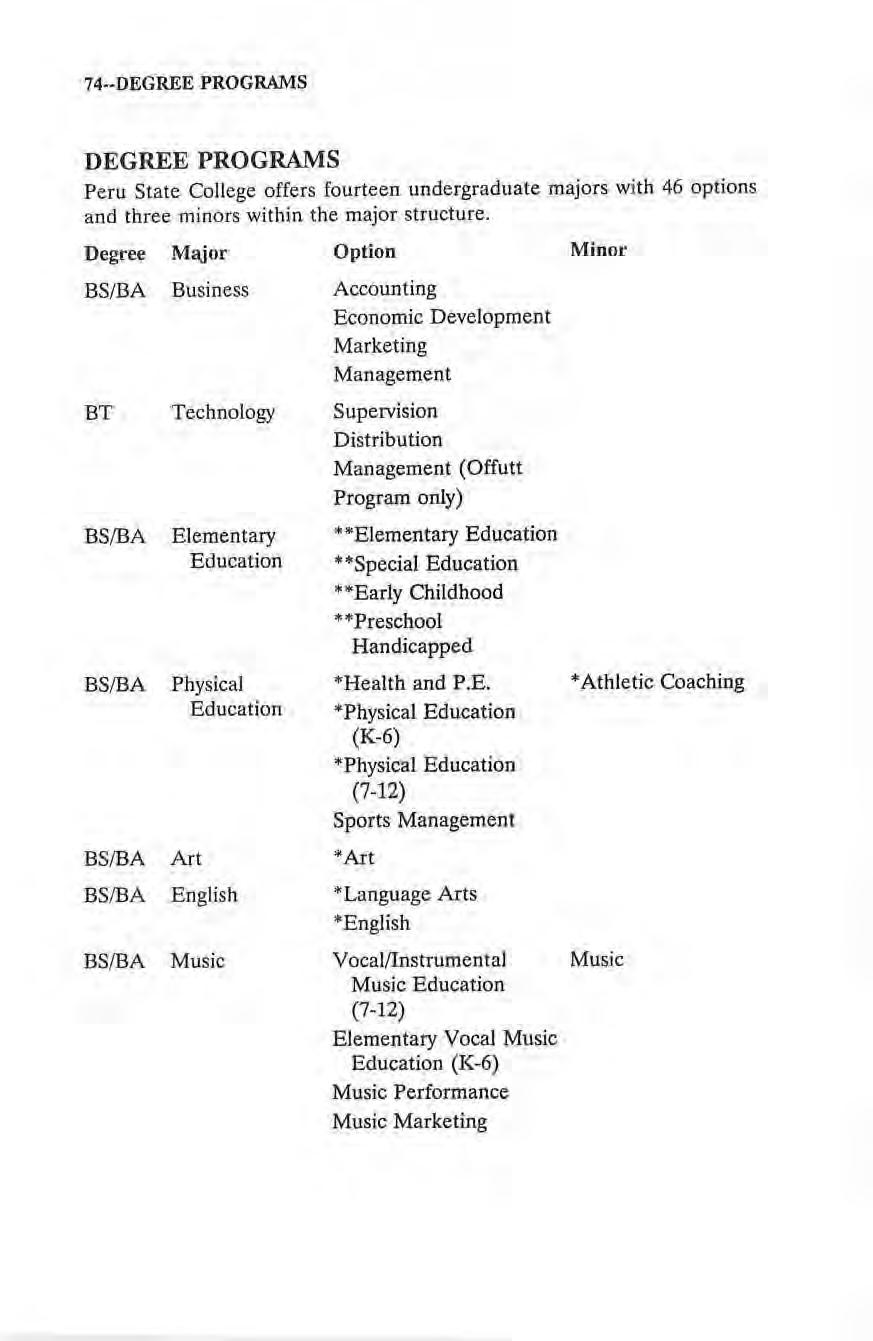
Peru State College offers fourteen undergraduate majors with 46 options and three minors within the major structure.
Degree Major Option
BS/BA Business Accounting
Economic Development
Marketing Management
BT Technology Supervision Distribution Management (Offutt Program only)
BS/BA Elementary
**Elementary Education Education
**Special Education
**Early Childhood
**Preschool
Handicapped
Minor
BS/BA Physical
*Health and P.E. *At h letic Coaching Education
*Physical Education (K-6)
*Physical Education
(7-12)
Sports Management
BS/BA Art
BS/BA English
BS/BA Music
*Art
*Language Arts
*English
Vocal/Instrumental Music Music Education
(7-12)
Elementary Vocal Music Education (K-6)
Music Performance
Music Marketing
74--
BS/BA Psychology/ Sociology

Psychology-Sociology
*Psychology
*Sociology
Human Services
BS/BA Social Science
*Social Science
History
BS/BA Speech & *Speech and Drama
Dra ma
BS/BA Natural Science
Biological Science
Wildlife Ecology
**Biology
"'*Chemistry
*Natural Science
Nuclear Technology
*Physical Science
BS/BA Computer
Technical Computer Science
Business Applications Science
** Computer Science
BS/BA Matbe mati cs
Mathematics
0 Mathematics
Education
BS/BA Industrial
*Industrial Technology Technology
Industrial Management Technology
Electronics/Robotics Technology
Power and Transportation Technology
Construction Technology
*Teaching endorsement available.
**Teach.ing endorsement only.
DEGREE PROGRAMS--75
PROGRAM
HONORS PROGRAM
The purpose of the Honors Program is to challenge academically-gifted students with new ideas and pe rspectives. An H onors course should be the beginning of a student's lifetime interest in the serious and difficu lt issues of our day. Honors courses are usually interdisciplinary in approach. Since class size is limited and student eligibility requires higher than average academic qualifications, Honors classes typically are challenging, innovative, and interesting.
Honors courses are designed to stimulate an inquiry model of learning through a seminar structure. The Honors Program is an opportunity for personal growth and an inspiration for a lifetime of intellectual curiosity . Honors Program students may attend special cultural or scholastic events throughout the academic year, as well as interact with visiting scholars on the Peru State College campus.
To complete the Honors Program, students need at least 15 hours of Honors classes. Two of these courses are required : HP 101 - Twentieth Century Issues-Literary Styles (meets the General Studies Literature requirement) and HP 400 - Ethics and Social Justice-Capstone course (meets th e General Studies Western Studies requirement). Four additional Honors courses are offered on a regular basis; students must take at least t hree of these courses to fulfill the 15 credit hour requirement. All regularly schedu led Honors courses fulfill requirements of Peru State College's General Studies Program. In addition to the two courses already described , the following four courses will be offered: (choose three)
1) HP 201 Making Sense: Art in the World (Satisfies the General Studies Aesthetics requirem e nt.)
2) HP 204 Contemporary Asian Cultures (Satisfies the General Studies Non-Western Studies or Huma n Relations r equirement, but not both.)
3) HP 205 Science an d Society (Satisfies one of the General Studies Science course requirements.)
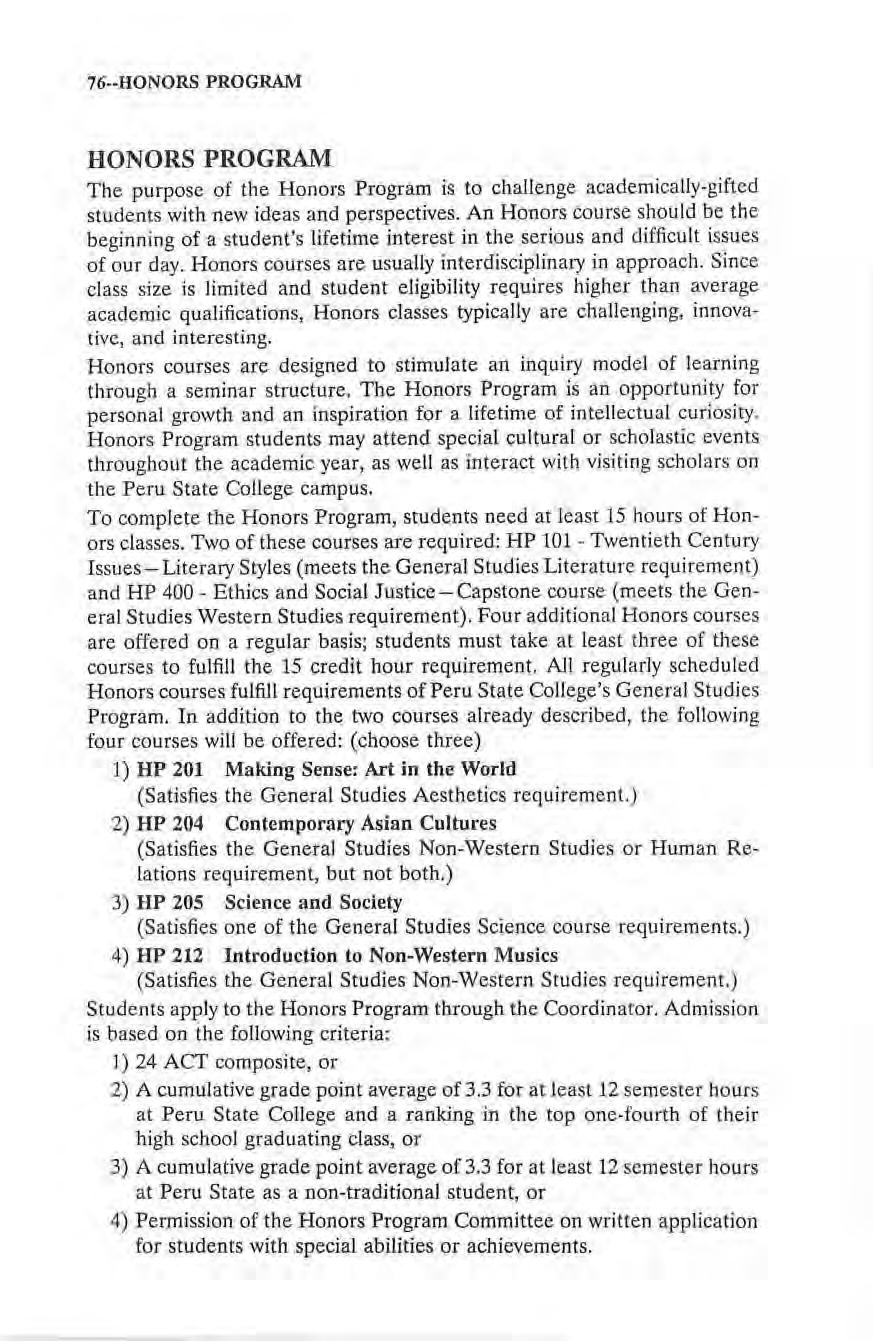
4) HP 212 Introduction to Non-Wes tern Musics (Satisfies the General Studies Non-Western Studies requirement.) Students app ly to the H onors Program through the Coo r dinator. Admission is based on the following criteria:
1) 24 ACT composite, or
2) A cumulative grade point average of 3.3 for at least 12 se mes ter hours at Peru State College and a ranking in the top one-fourth of their high school graduating class, or
3) A cumulative grade point average of 3.3 for at least 12 semester hours at Peru State as a non-traditional student, or
4) Pennission of the Honors Program Committee on written application for students with special abiliti es or achievements.
76--HONORS
If they meet the eligibility requ irements of the Honors Program, Preside ntial, Board of Trustee, and Non-Resident Scholars hi p, students are required to enroll in one Honors course during their firs t year at Peru State College. They then have the option to continue in or to drop the program.
All students wishing to continue in the program must finish each academic year with at least a 3.0 cumulative grade p oint average. To be considered Honors Program graduates, students must have maintained at least a 3.0 cumulative grade point average, and completed the 15 credit hour requirement.
Students who successfully complete the Honors Program are de s ignated as Honors Program graduates. T hey are recognized at Commencement and on their permanent college records.
Course Descriptions
Honors Program
101 Twentiet h Century Iss ue-Literary Styles (3 hou rs)
(Satisfies the General Studies Literature requi rement.)
T hroug h lit era t ure such as fict ion, poetry, drama, biography. autobiography, and historical narrative, this course will focus on selected issues s u c h as education, the environment, racism, behaviorism, nuclear war, political leadership and the psychology of leadership, mass political movements, and the use of propaganda .
Permission of Honors Program Coordinator requfred.
(Eac h Fall Semester)
201 Making Se n se: Art in the World (3 hours)
(Satisfies the General Studies Aesthetics requirement.)
This is an integrated Fine Arts course designed to provide studen ts the opportunity to view and discuss the interrelatedness of the fine arts, in particular the performance arts, e .g., classical theatre, modern theatre, musical theatre, ballet, m ode rn dance, cboral performance, orchest ral performance, opera, the visual arts in all media, film, photography, architecture, etc. I t will rely he avily upon on-campus seminar sessions and student attendance at on-campus a nd offcampus performances.
Permission of Honors Program Coordinator required.
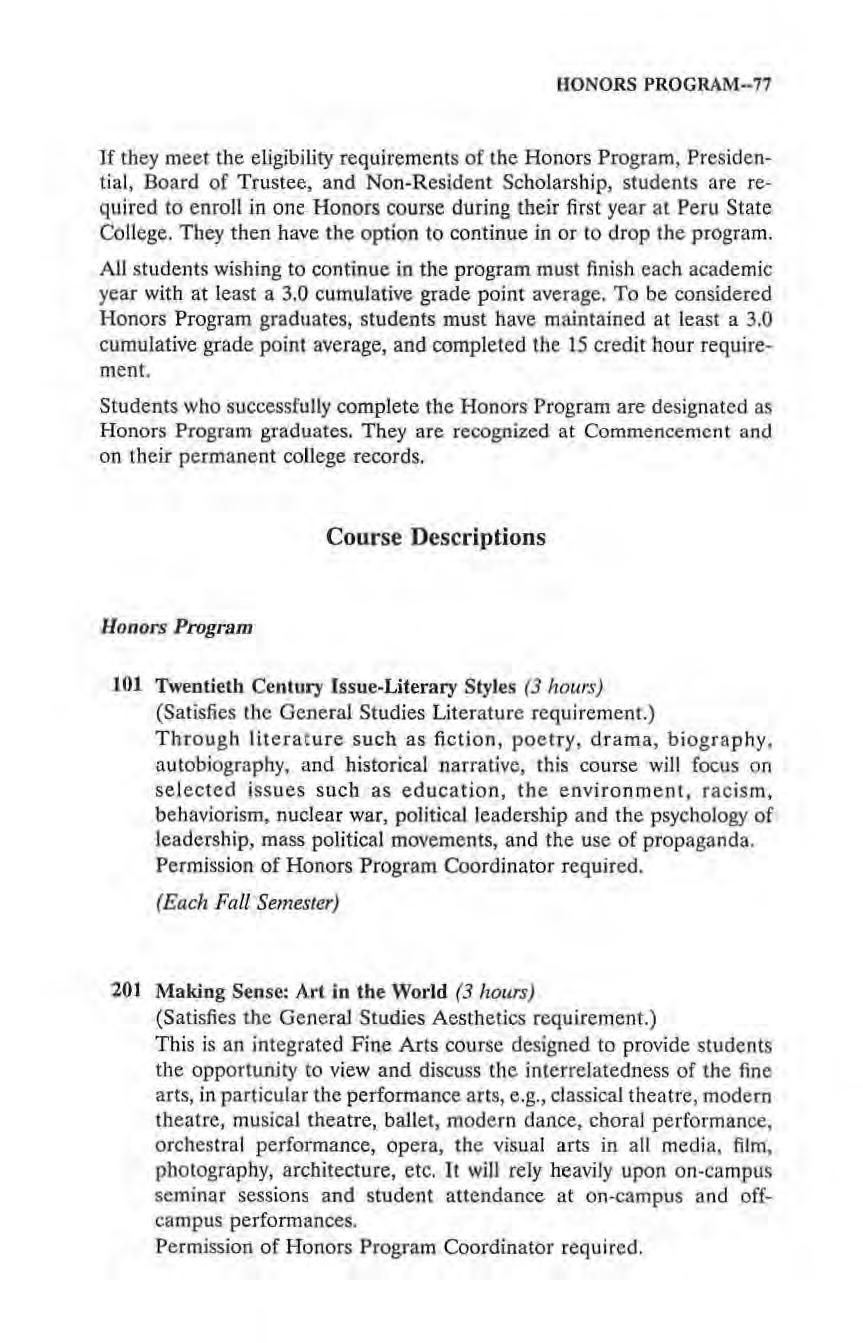
HONO RS PROGRAM--77
204 Contemporary Asian Cultures (3 hours)
(Satisfies the General Studies Non-Western Studies or Human Relations requirement, but not both.)
This course will introduce societies and cultures of the Far Eastern countries with emphasis on Japan, Korea, and China. The course covers such topics as the group, relativism, education, business, religion, role of women, and psychological traits. In addition, students will look at the current issues affecting the United States and Asian countries.
Permission of Honors Program Coordinator required.
205 Science and Society (3 hours)
(Satisfies one of the General Studies Science course requirements.)
This course will focus on the scientific method, and the impact that science has on society and individuals. Topics to be considered will be the relations hips of science, ethics, politics, moral issues, and societal goals. Students will re ad published articles, write about, and discuss the topics of this class. The course topics will be considered in light of a single discipline within science, evolutionary biology.
Permission of the Honors Program Coordinator required.
212 Introduction to Non-Western Musics (3 hours)
(Satisfies the General Studies Non-Western Stud ies requirement.)
This course is an introduction to ethnomuskology in which the student will learn to experience and understand music in the context of human life. Students will experience and analyze the musics of Africa, Native America, Black America, Asia, the Near East, the Pacific, and Eastern Europe. This course will also provide the student the tools with which to discover the meanings of musi c in the life of any society.
Permission of the Honors Program Coordi na tor required.
(Each Fall semeste, )
400 Ethics and Social Jus tice (3 hours)
(Satisfies the General Studies Western Studies requirement.)
This course examines contrasting conceptions of social justice and the ideal society as these appear in some of the major thinkers in the tradition of Western ethical philosophy.
Permission of the H onors Program Coordinator required .
(Each Spring semester)
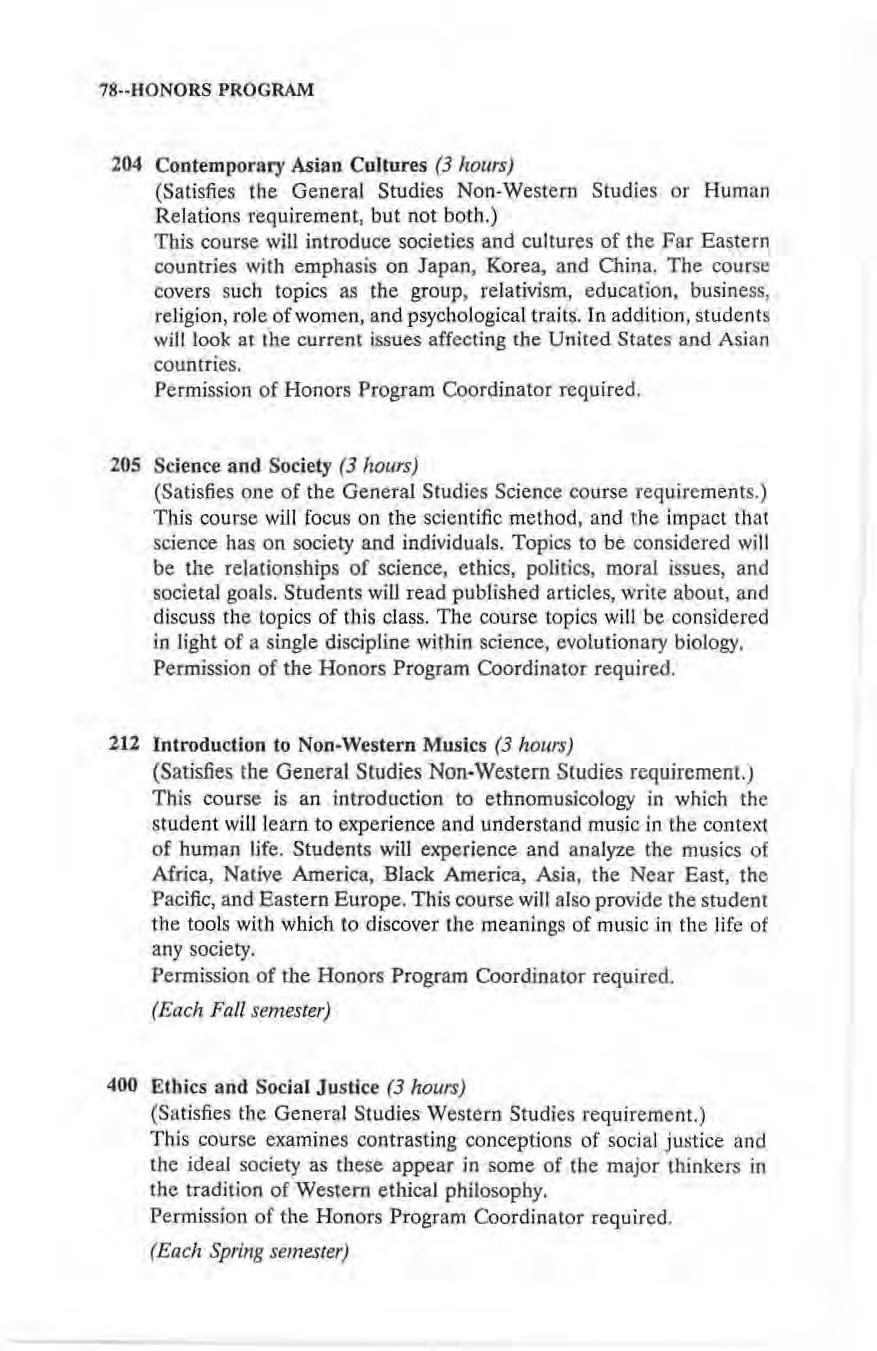
78--HONORS PROGRAM
COLLEGE 100 a nd COLLEGE 400
The purpose of College 100 is to introduce the new student to information and skills pertaining to college success. Among the subjects covered are academic expectations and planning, study skills, time management, financial aid, substance abuse, and divers ity issues. The purpose of College 400 is to provide credit-bearing caree r development opportunities, especially job search skills.
COURSE DESCRIPTIONS College
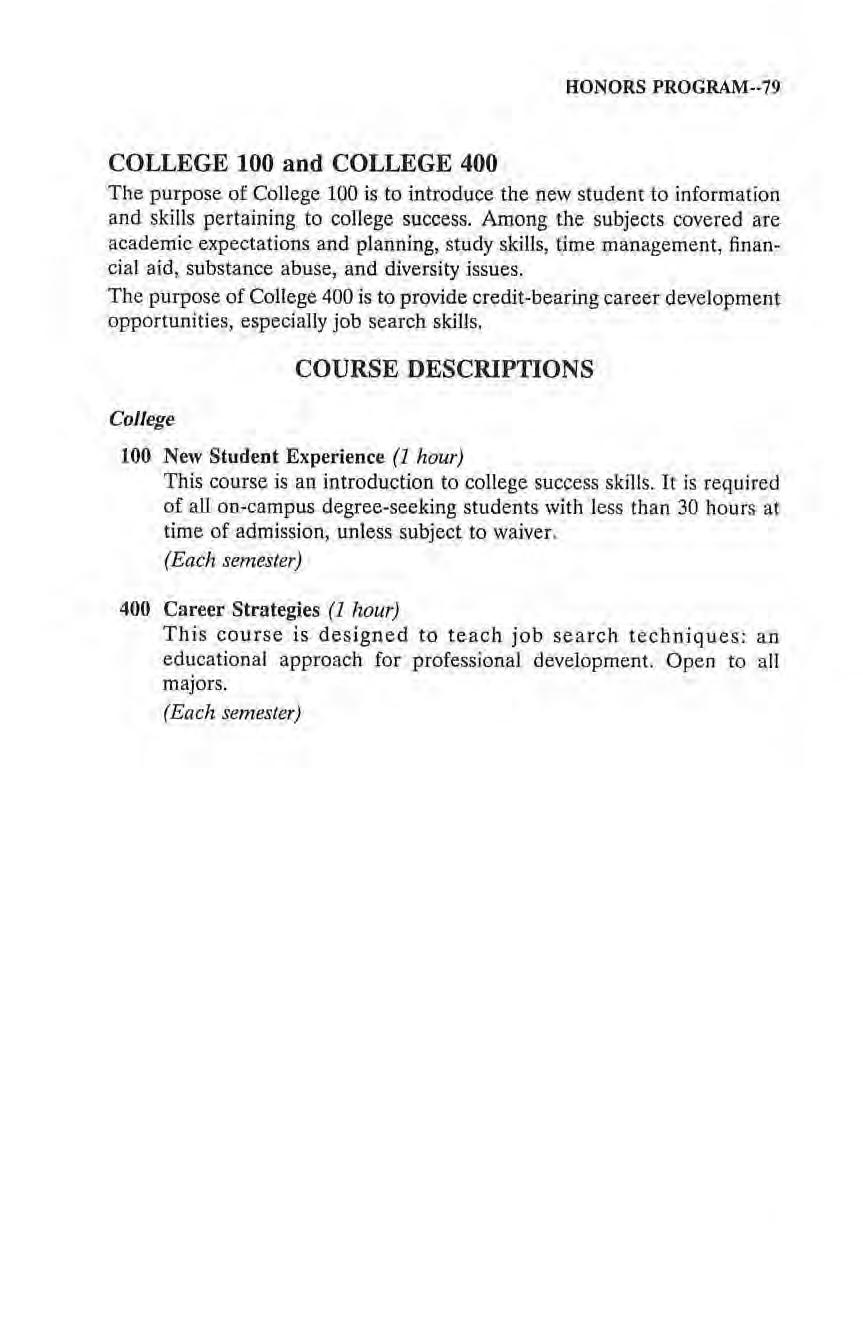
100 New Stu dent Ex perience (1 hour)
This course is an introduction to college success skills. It is required of all on-campus degree-seeking students with less than 30 hours at time of admission, unl ess subject to waiver ,
(Each semeste1)
400 Ca reer Strategies (1 hour)
This course is des i gned to teach job search techniques: an educational approach for professional devel opment. Open to a ll majors.
(Each semester)
HONORS PROGRAM--79
DMSION OF BUSINESS
Chairperson
Professors: Snyder, Thomas
Associate Professors: Mowbray

Assistant Professors: Beldin, Hamilton, Lewellen, Ruck
Instructors: Tabata, Philli ps
Nebraska Bus iness Development Center Director: Ruenholl
Small Business Ins titute Director: Ruenholl
Eco nomic Development Direc tor: Phillips
The Division of Business offers programs to prepare students for a wide range of occupations in industry, business, and community development. The programs are designed to provide marketable skills and know ledge, preparation for advancemen t on the job, and background for graduate study. B.A. and B.S. degrees are offered in Business Administration and the B.T. degree in Technology.
The Business Administration program offers a choice of options -Accounting, Management, Marketing, a nd Economic Development. The Technology program offers emphases in Supervision, Distribution, and Management.
80--DMSION OF BUSINESS
Business
BUSINESS PREMAJOR AND BUSINESS CORE
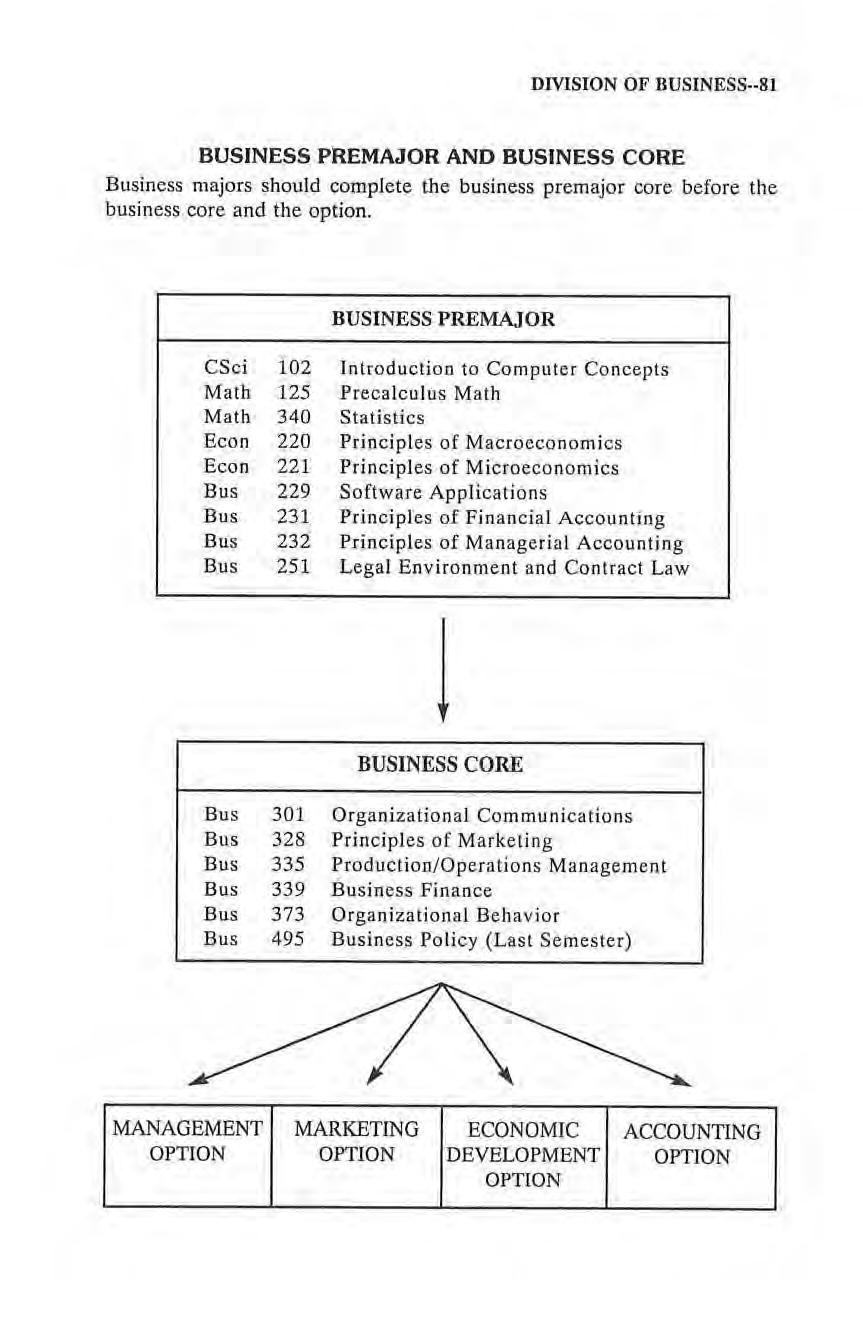
MANAGEMENT
MARKETING ECONOMIC ACCOUNTING OPTION OPTION DEVELOPMENT OPTION OPTION
DMSIO N OF BUS I NESS --8 1
majors should complete the business premajor core
iness co re and the
US INESS PREMAJOR CSc i 102 Int roduc ti on to Computer Concepts Math 125 Precalcu lu s Math Math 340 Statistics Eco n 220 Principles of Macroeconomics Econ 221 Principles of Microeconomics Bus 229 Software Applications Bus 23 1 Principles of Financial Accounting Bus 232 Princip les of Managerial Accounting Bus 25 1 Legal Enviro nm e nt and Contract Law
before the bus
option. B
B us 301 Organizational Communica ti ons Bu s 328 Principles of M arketi n g Bus 335 Production/Operations Management Bus 339 Business Fina n ce Bus 373 Organ izational B ehav ior Bus 495 Business P o licy (Last Semester)
lBUSINESS CORE
Bus in ess Admini s trai: ion - Accounti ng Opti o n
The Accounting option p repares graduates for several high-demand careers in financ ia l occupations. Initial coursework is designed to p r epa r e students for positions in private in dustry and the Certified Management Accountants (CMA) examination. Those students desiring to take the Certified Public Acco u ntants (CPA) e xaminatio n will need to co m plete the additional Requ ire me nts for Pu bli c Accounting/CPA Fo cus .
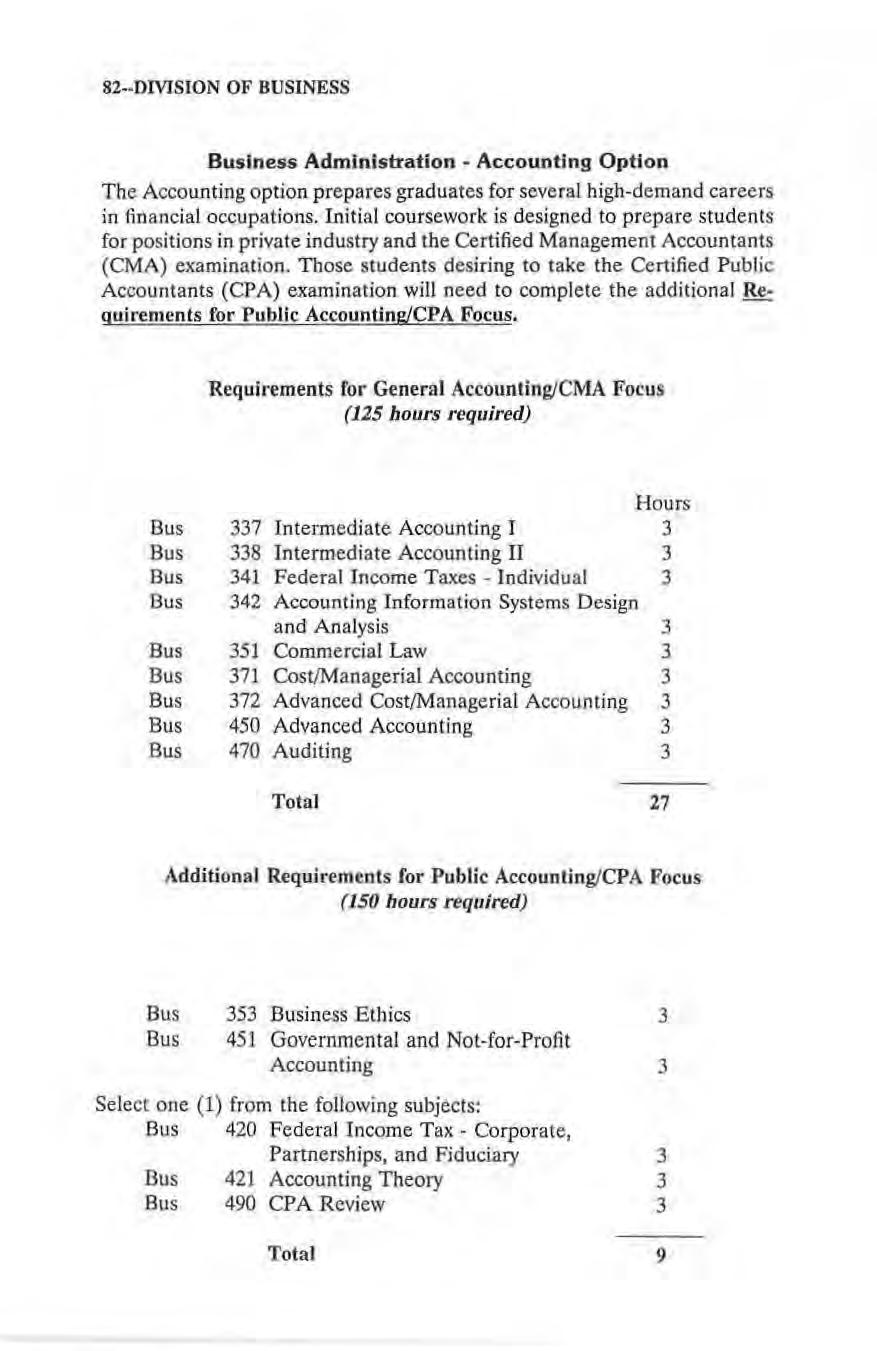
82- -DMS ION OF BUSINESS
Requirements for Ge neral Accountin g./CMA Focu s (1 25 hours r eq uired) Hours Bus 337 Intermediate AccoUJ1ting I 3 Bus 338 Intermediate A ccounting II 3 Bus 341 Federal Income Taxes - lndividu a l 3 Bus 342 Accounting I nformation Systems Design and Ana lys is 3 Bus 351 Commercia l Law 3 Bus 371 Cost/Ma nagerial Accounting 3 Bus 372 Advanced Cost/Managerial Account ing 3 Bus 450 Advanced Accounting 3 Bus 470 Auditing 3 T otal 27 Addit ional Requfremeots for Publ ic Accou ntin g/CPA Focus (150 hours require d) Bus Bus 353 Business Ethics 451 Governmental and Not-for- P rofit Accounting Select one (1) from the following subjects: Bus 420 Fede r a l Income Tax - Corporate, Partnerships, and Fiduciary Bus 421 Accounting Theory Bus 490 CPA R evie w T ota l 3 3 3 3 3 9
Students opting for t he C P A Focus are r equired to take a total of 60 hours of credit in general education excluding PE but including the current General Studies Program. Cred it ho urs beyon d t hose required by the General Studies Program can be from a ny area of general studies an d are not specifica'll y designated classes (i.e. any E nglish or ma th -class) . T h e CP A Fo cu s d eg ree re quirem ent i s 150 h ou rs rat her than 125 hours which is the State of Nebraska requ irement.
Busin e ss Admini s tration - Mana gem e nt Opt i on
The Management op tion offers a ge neral business approach and prepares graduates for entry and m id- level management positions.
Re quire men ts fo r M an a gem e nt Option
(Only 3 hours of Bus 441, Cooperative Education Internship, may count toward the Management option.)

Bus ines s AdmJ n istra tio n - Marke t i ng O p ti o n
The Mar keting option prepares graduates for high-demand careers in marketing and sales.
R equirements for M a rketi ng O pti o n
DMSION OF BUS INESS- -83
Commercial L aw O rganiza tional Ethics H ou rs 3 3 Bus Bus Bus Bus 351 353 380 433 Human R esources Management Admi nistrative M anagement Business/Economics/Computer E lectives 3 3 9 Tota) 2 1
Bus 250 Salesmanship Bus 410 Marketing Management Bus 494 Marketing Research
four (4) of the following courses: Bus 329 Advertising Bus 411 Marketing Strategies Bus 412 Sales Management Bus 413 Purchasing Bus 415 Credit Management Bus 430 Industrial Marketing T ota l H ours 3 3 3 3 3 3 3 3 3 21
Select
istration - Econ o mic D eve lopment Option
The Econo mic Development option prepares students for fulltime employment in the rapidly growing eco nomic deve lopment profession. It also prepares graduates to seive their communities in a volunteer leadership capacity, whatever their occupations.
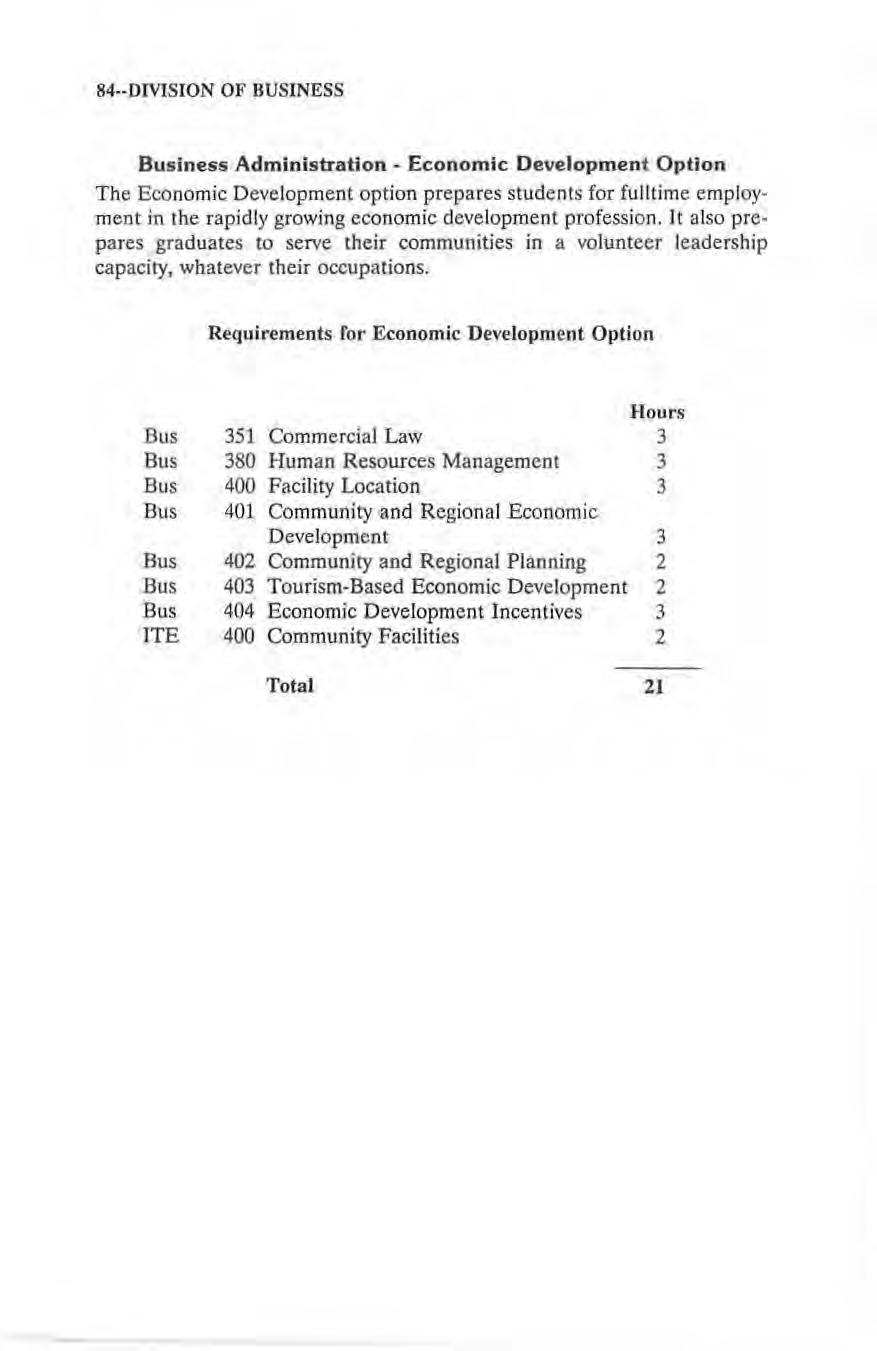
84--DMSION OF BUSINESS
Business Admin
B us Bus Bus Bus Bus Bus Bus 1TE Requi rement s fo r Economi c D evelopm e nt O pt ion 351 380 400 401 402 403 404 400 Co mmercial Law Human Resources Management Facility Location Community and Regional Economic Development Community and Regional Planning Touris m-Based Economic Deve lopment Economic Development I ncentives Community Facilities Total Hours 3 3 3 3 2 2 3 2 21
BACHELOR OF TECHNOLOGY CORE
The Bachelor of Technology requires a technical associate degree or equivalent. All majors should complete the t ech nology core before the option. Technology majors are not required to take the business premajor or business core.
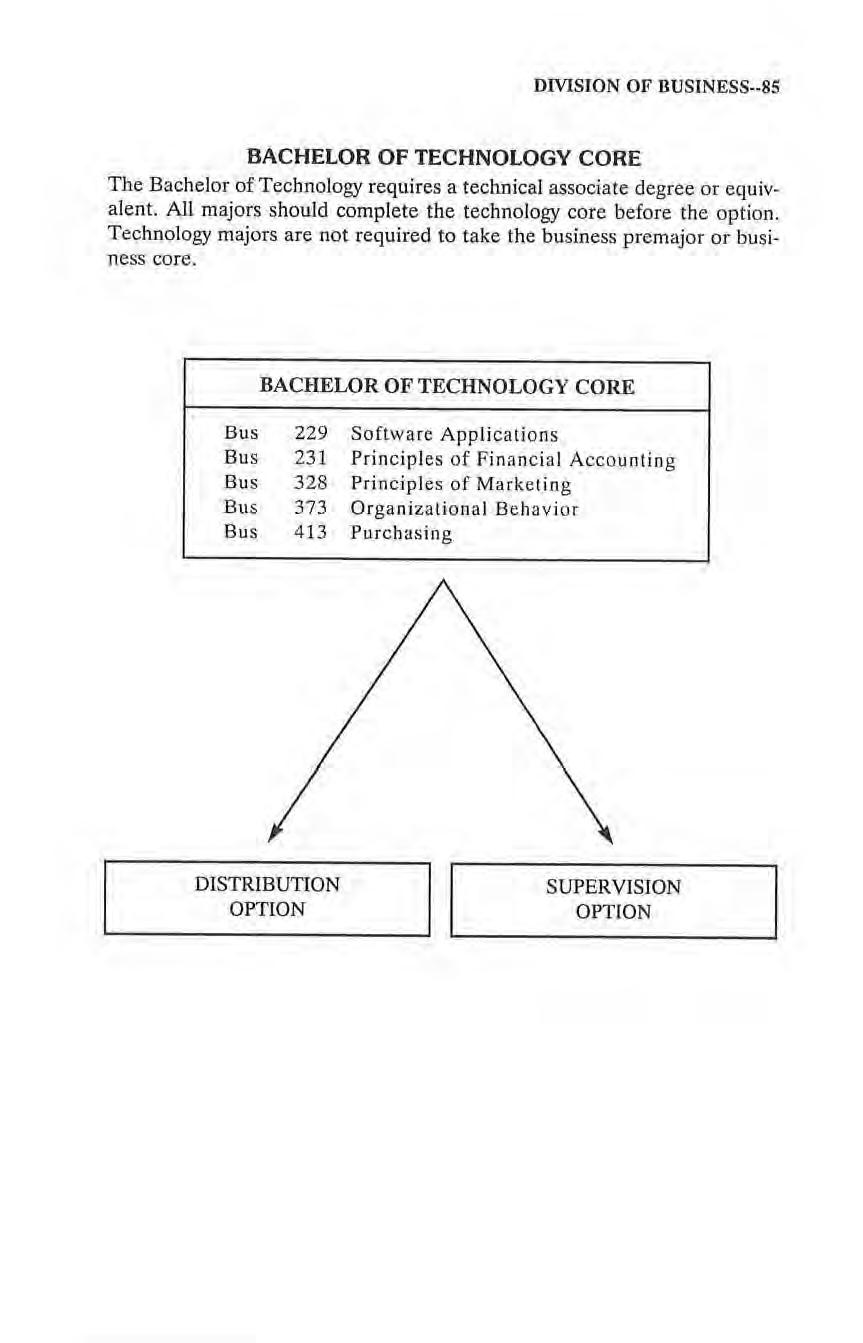
DMSIO N OF BUSINESS--8S
BACHELOR OF TECHNOLOGY CORE Bus 229 Software Applications Bus 231 Principles of Financial Accoun ti ng Bu s 328 Principles of Marketing Bus 373 Organizational B ehavior Bus 4 1 3 Purc hasin g DISTRIBUTION OPTION SUPERVISION OPTION
86--DIVISION OF BUSCNESS
Technology - Supervision Option
The Supervis ion option prepares graduat es for entry leve l management ca r eers in t he t echnical a r ea. The equivalent coursework offe red a t O ffu t AFB has a MGT p refix.
The Di stribu tion option prepares graduates for a var iety of marketing careers in the technical areas.
Bachelor of Technology Degree Program
Offutt Air Force Base
Th e Bachelo r of Technology-Ma n agement Option is designed to meet the needs of Air Force personnel. C ivilians may also elect th e Management Opti on and attend the Offut t program. Some restrictions app ly. Ca ll 1-402293-1764 for more information.
This degree requires completion of a t r a nsfer two -year t echnical associate degree and a minimum of 30 resident management option hours. (27 of the 30 hours must be co re courses .)

Req uirem e nts for Supervision Option Bus 380 Human R eso urces Management Bus 414 S up ervisory Problems Bus 435 Supervisory Strategies Bus 441 Industrial Supervisory I nternship Eco n 375 Labor an d Industrial R ela ti ons Total Technology - Distribution Option Hours 3 3 3 3 3 15
Bus Bus Bus Bus B us Require ment s for Dis tribution Option 250 Salesmanship 410 Marketing M anagemen t 411 Marketing Strategies 430 lndustri aJ Marketing 441 Industri a l Distribution Interns hip Total Ho urs 3 3 3 3 3 15
* Required for degree with mfoimum 2-hout Statistics prerequisite for Mgt, 440K.
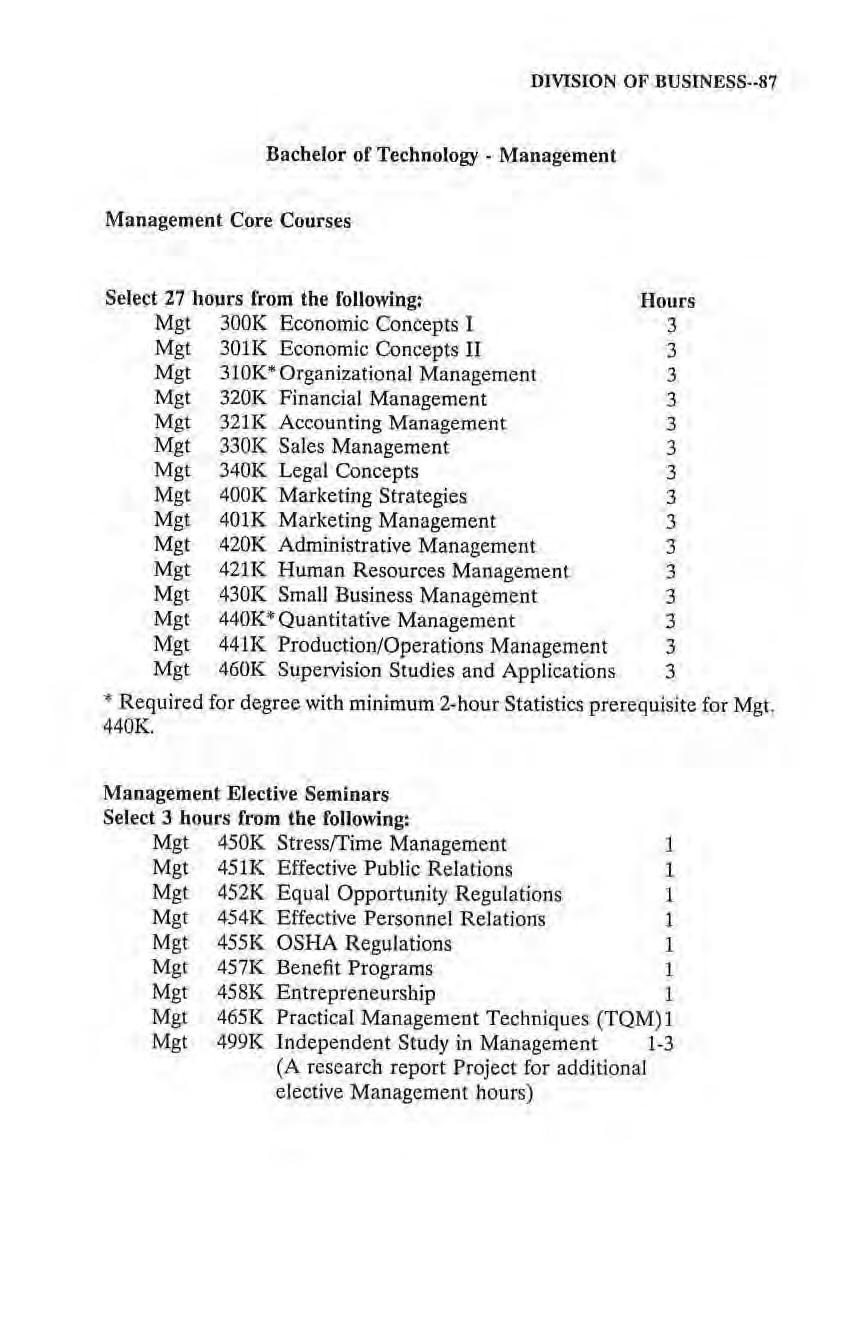
DMSION OF BUSINESS--87 Bac helor of Tech nology • Manageme n t Ma nage ment Core Courses Selec t 27 hours fro m the fo llowing: Mgt 300K Economic Concepts I Mgt 301K Economic Concepts II Mgt 31 OK"' Organizational Management Mgt 320K Financial Management Mgt 321K Accounting Management Mgt 330K Sales Management Mgt 340K Legal Concepts Mgt 400K Marketing Strategies Mgt 401K Marketing Management Mgt 420K Administrative Management Mgt 421K Human Resources Management Mgt 430K Small Business Management Mgt 440K* Quantitative Management Mgt 441K Production/Operations Management Mgt 460K Supervision Studies and Applications flours 3 3 3 3 3 3 3 3 3 3 3 3 3 3 3
Manageme nt Elective Seminars Select 3 ho u rs fro m the foll owing: Mgt 450K Sttessffime Management 1 Mgt 451K Effective Public Relations 1 Mgt 452K Equal Opportunity Regulations 1 Mgt 454K Effective Personnel Relations 1 Mgt 455K OSHA Regu lations 1 Mgt 457K Benefit Programs 1 Mgt 458K Entrepreneurship 1 Mgt 465K Practical Management Techniqu es (TQM) 1 Mgt 499K Independent Study in Management 1-3 (A rese arch report Project for additional elective Management hours)
Course Descriptions
Business
229 Software Appli ca tion s (3 hours)
Prerequisite: Keyboarding Ability
This course is an introduction to MS-DOS and IBM- based software currently used in industry. D evelopme nt of proficiency using selected commercial software packages is stressed.
(Each semester; Summer session)
231 Principles of Financial Accounting (3 hours)
This course introduces students to the process of reco rdin g financia l data and preparing periodic financial statements. The complete accounting cycle will be studj ed. Four h ours of atte ndance per week is required.
(Each Fall semeste,)
232 Principles of Manageria l Accounting (3 hours)
Prerequisite: Bus 231.
Tltis course is a conti n uation of Bus 231, consideri ng the accounting process for a corporation. The student is introduced to accounting theory, financial statement ana lysis and cost accounti ng. Four hours of attendance per week is r equired.
(Each Spring semester)
241 Coo perative E ducation Internship (1-4 hours)

Prerequisite: 15 hours of completed coursework, minimum GPA 2.0, Pe rmi ssion of Cooperative Education Staff and Division Chair. This program is designed for students with an intended major in the Business Division to explore and/or gain work experience related to their major and anticipated career goals. Students may enroll for 14 hours of credit which will be graded on a credit/no credit basis. A minimum of forty hours of work experie nce will be required for every hour of credit per semester. The st ude n t wi ll complete necessary papetwork with the employer and the Cooperative Ed uca ti on office. The student's work will be supervised by Cooperative Education s taff. A fina l paper will be prepared at the conclusion of the internship.
(Each semester; summer session)
88- - DMSION OF' BUSINESS
250 Salesmanship (3 hours)
Students focus on the skills and techniqu es used , in selling and persuasion. The course is designed to help the st udent learn to sell products and ideas through a study of proven techniques used by successful salespeople.
(Each Fall semester)
251 Legal Environment and Contract Law (3 hours)
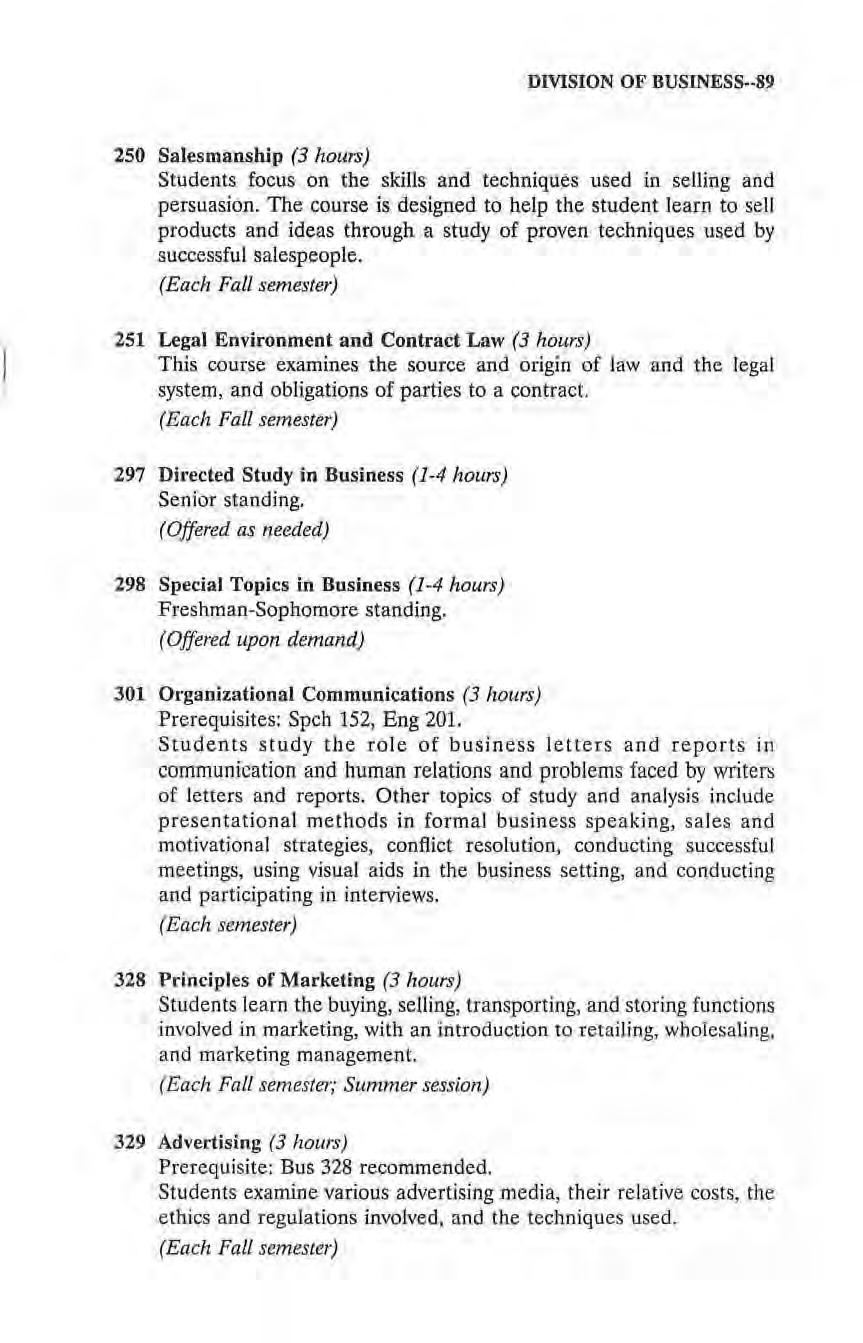
This course examines the source and origin of law and the legal system, and obligations of parties to a contract.
(Each Fall semester)
297 Directed Study in Business (1-4 hours)
Senior sta nding.
(Offered as needed)
298 Special Topics in Business (1 - 4 hours)
F reshman-Sopho more standing.
(Offered upon demand)
301 Organizational Communications (3 hours)
Prerequisites: Speh 152, Eng 201.
Students study the role of business letters and reports in communication alld human relations and problems faced by writers of letters and reports. Other topics of study and analysis include presentational methods in formal business speaking, sales and motivational strategies, conflict resolution, conducting successful m ee tings, using visual aids in the business setting, and conducting and participating in interviews.
(Each semester)
328 Principles of Marketing (3 hours)
Students learn the buying, selling, transporting, and storing functions involved in marketing, with an introduction t o retailing, wholesaling, and marketing management.
(Each Fall semester; Summer session)
329 Advertising (3 hours)
Prerequisite: Bus 328 recommended. Students examine various advertising media, their relative costs, the ethics and regulations involved, and the techniques used.
(Each Fall semester)
DIVISION OF BUSINESS--89
331 Insurance (3 hours)
This course presents essentials of an insurable risk, uses of insurance, and a brief study of the more important types of insurance.
(Offered upon demand)
332 Investments (3 hours)
This course utilizes economic principles in evaluating the major uses of investment funds, including saving accounts in banks and other financial institutions, government bonds, corporate stocks and bonds, annuities, and real estate.
(Offered upon demand)
335 Production/Operations Management (3 hours)
Prerequisites: Bus 232, Math 340, Econ 221. Students study the evolution of operational management and its relationship to the total enterprise. Decis ion making, production and plant planning, systems design, manpower planning, and control systems are considered.
(Each Fall semester)
337 Intermediate Accounting I (3 hours)
Prerequisites: Bus 232, Bus 229 or Permission of Instructor. This course focuses on the problems involved in establishing sound valuations for asset, liability, and net worth items; proper reporting of financial position and net income is stressed.
(Each Fall semester)
138 Intermediate Accounting II (3 hours)
Prerequisites: Bus 337, Bus 229 or Permission of In structor. This course is an in-depth continuation of Bus 337 with special emphasis on long-term liabilities, intangible assets, statement analysis, stockholders' equity, application of funds, and present value.
(Each Spring semester)
339 Business F inance (3 hours)
Prerequisites: Bus 232, Econ 220, Econ 221; Math 125 and Math 340 recommended.
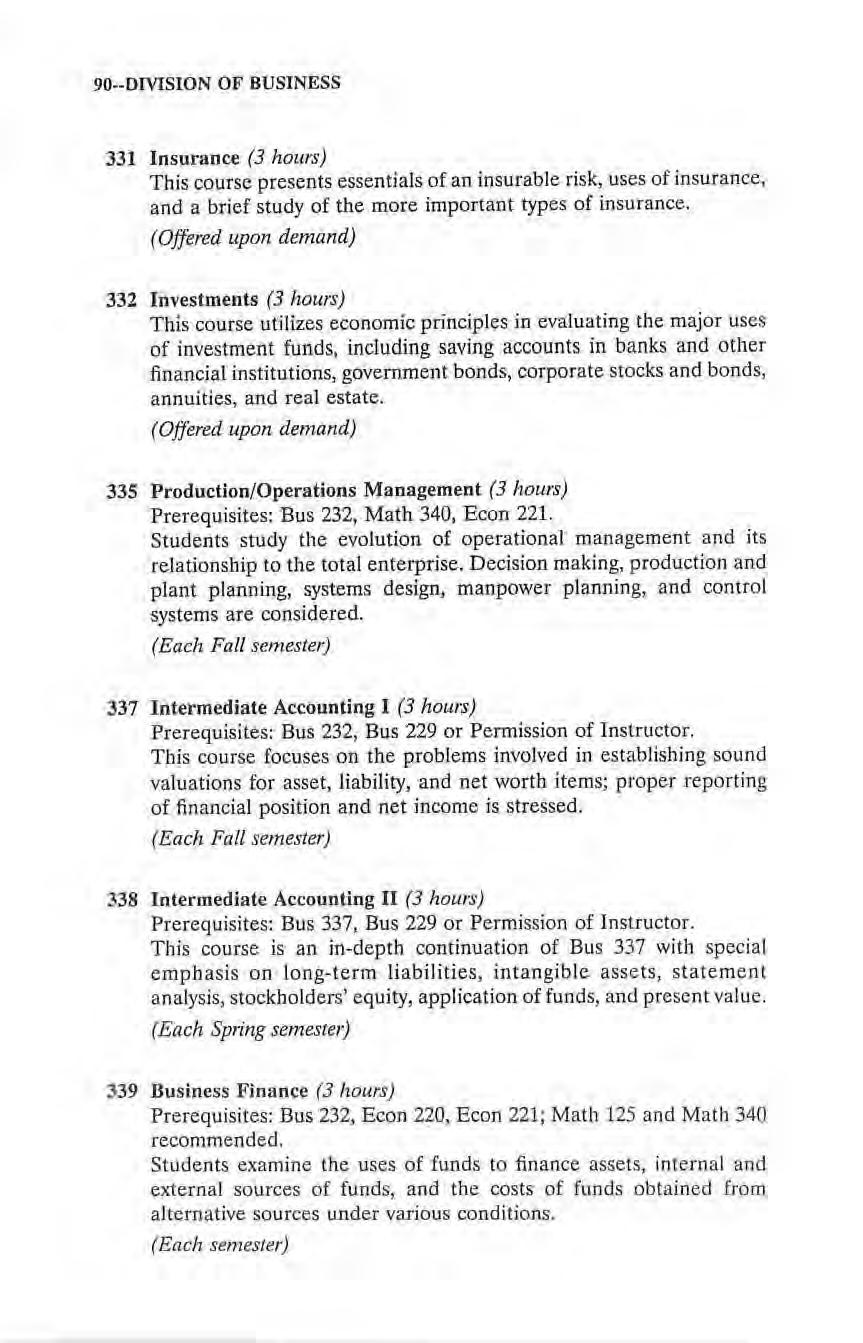
Students examine the uses of funds to finance asse ts, internal and external sources of funds, and the costs of funds obtained from alternative sources under various conditions.
(Each semeste1)
90--DMSION OF BUSINESS
341 Federal Income Taxes - Individual (3 hours)
Prerequisite: Bus 232.
This course details federal laws, regulations, etc., as they pertain to the income taxation of individuals. A review of the histo,y of taxation is included. Practice in tax return preparation and problem ,solving is provided.
(Each Fall semester)
342 Accounting Information Systems Design and Ana lysis (3 hours)
Prerequisite: Bus 232, Bus 229 or Permission of Instructor. This course provides an examination of accounting system concepts, applications, and the process by which they are analyzed, designed, and implemented. An emphasis is placed on computer-based systems through the use of extensive case analysis.
(Each Fall semester)
345 Real Estate Principles and Practices (3 hours)
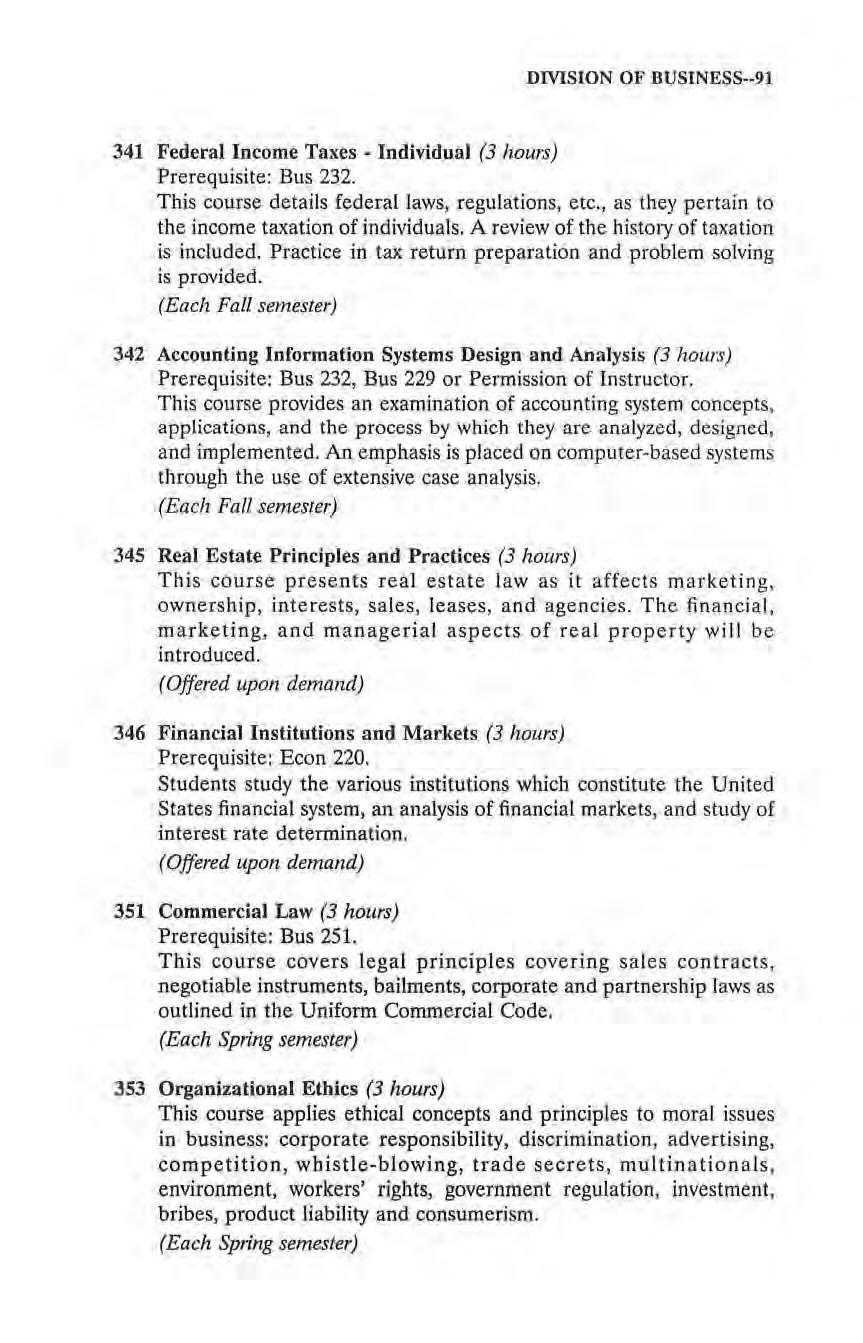
This course presents real estate law as it affects marketing , ownership, interests, sales, leases, and agencies. The financial, marketing, and managerial aspects of real property will be introduced.
(Offered upon demand)
346 Financial Institu tions and Markets (3 hours)
Prerequisite: Econ 220. Students study the various institutions which constitute the United States financial system, an analysis of financial markets, and study of interest rate determination.
(Offered upon demand)
351 Commercia l Law (3 hours)
Prerequisite: Bus 251.
This course covers legal principles covering sales contracts, negotiable instruments, bailments, corporate and partnership laws as outlined in the Uniform Commercial Code.
(Each Spn'ng semester)
353 Organizational Ethics (3 hours)
This course applies ethical concepts and principles to moral issues in business: corporate respons ibility, discrimination, advertising, competition, whistle-blowing, trade secrets, multinationals, environment, workers' rights, government regulation, investment, bribes, product liability and consumerism.
(Each Spring semester)
DMSION OF BUSINESS--91
360 Real Esta te Finance (3 hours)
Prerequisite: Bus 345.
This course is a detailed analysis of the methods and techniques of financing the purchase of real estate. Areas of study include fund sources, analysis of mortgage risk, FHA underwriting, other government influences and agencies, legal aspects, and the policies and procedures of lending institutions.
(Offered upon demand)
361 Real Estate Law (3 hours)
Prerequisite: Bus 345.
Students learn the legal implications of estates • land, deeds, leases, mortgages, easements, zoning ordinances, covenants, trespass, nuisance, licenses, invitees, and descendants' estates
(Offered upon demand)
371 Cost/Managerial Accounting (3 hours)
Prerequisites: Bus 232, Math 340, Bus 229 or Permission of Instructor.
Cost concepts, determination, control, and ana lysis are studied. Emphasis is placed on communicating cost data for internal decision making. Topics include cost behavior and estimation , direct costing, standard cost, capital budgeting, and inventory control.
(Each Pall semester)
372 Advanced Cost/Managerial Accounting (3 hours)
Prerequisites: Bus 335, Bus 371. Students study advanced topics in cost accounting including new costing methods , Coverage includes cost allocations, transfer pricing, and performance evaluation. An emphasis is placed on cost analysis for decision-making and budgeting as a planning and control tool for both operations and capital expenditures.
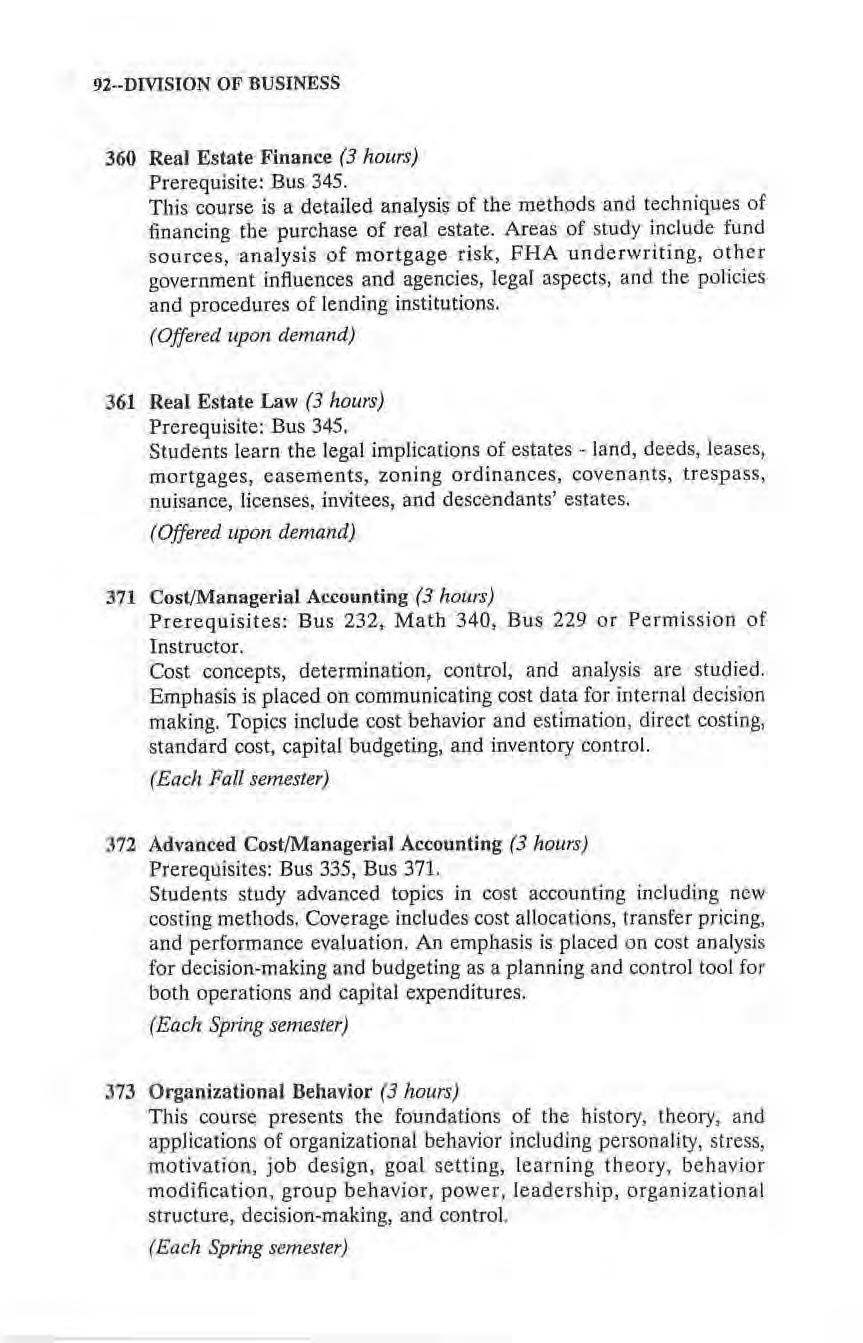
(Each Spring semester)
373 Organizational Behavior (3 hours)
This course presents the foundations of the history, theory, and applications of organizational behavior including personality, stress, motivation, job design, goal setting, learning th e ory, behavior modification, group behavior, power, leadership, organizational structure, decision-making, and control.
(Each Spring semester)
92--DMSlON OF BUSINESS
374 Advanced Spread sheet Applications (3 hours)
Prerequisite: Bus 229.
Tbis course s tarts at the depa rture point for LOTUS 1-2-3 in Bus 229, Software Applications. There will be a review of the material covered in Software Applications. This course will cover advanced techniques in LOTUS 1-2-3 using business appJications for the coursework. Advanced commands and so me macro programming in LOTUS will be covered. Advanced LOTUS applications will be utilized for case analysis including spreadsheet modeling, informat ion system development, and automated forms oriented database manageme n t.
(Each Fall semester)
375 Advanced Database Applications (3 hours)
Prerequisite: Bus 229.
This course starts at the departure point for dBASE IV in Bus 229, Software App lica tions. There will be a review of the material cover ed in Bus 229. This course will cove r advanced techniques in dBASE I V using business applications for the coursework. Advanced commands and some programming in dBASE IV will be covered.
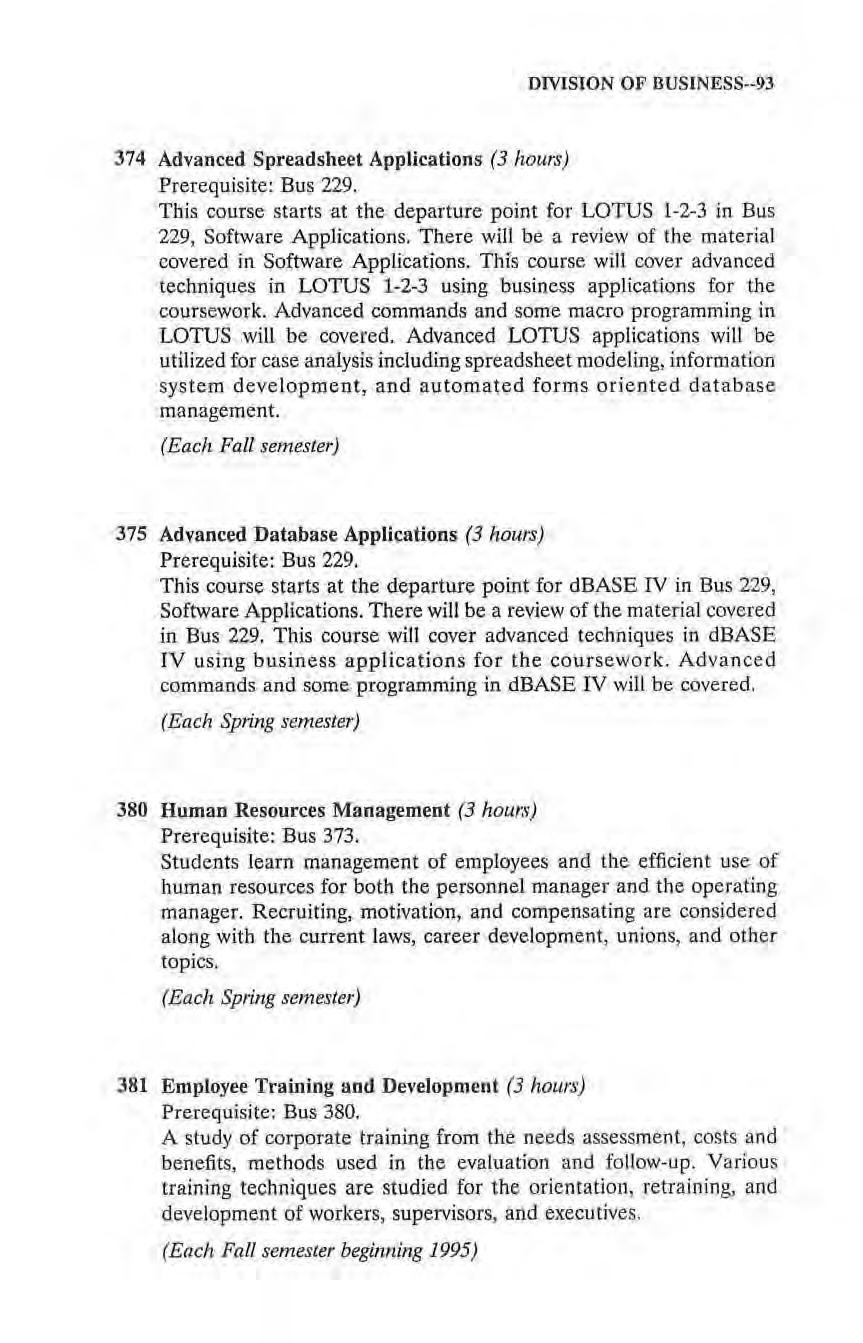
(Each Spring semester)
38 0 Human Resources Management (3 how:1')
Prerequisite: Bus 373.
Students learn management of employees and the efficient use of human resources for both the personnel manager and the operating manager. Recruiting, motivation, and compensating are considered along with the current laws, career development, unions, and other topics.
(Each Spring semeste, )
381 Em ployee Training and Development (3 hours)
Prerequisite: Bus 380.
A study of corporate training from the needs assessment, costs and benefits, methods used in the evaluation and follow-up. Various training techniques are s tudied for the orientation, retrain ing, and development of workers, supervisors, and executives.
(Each Fall semester beginning 1995)
DMSlON OF BUSCNESS--93
400 Facility Location (3 hours)
Th is course provides students with an introduction to the theory anJ practice of facility location. Students gain an understanding of relevant location factors, site selection techniques, and theoretica l principles used in s ite selection for manufacturing, distribution, office retail, and tourism facilities. Exercises and problems in which students apply course concepts and real-world case studies of facility locations are an important part of the course.
(Each Fall semester)
401
Co mmunity and Reg ional Economic Developmen t (3 hours)
This course provides students with an understanding of techn iq ues used by communities and re gions to enhance their economic development. Students gain an understand in g of community assess ment techniques, strategic planning for economic development, marketing of communities and regions, principles and practices of operation of an economic development agency, and relationships between local, regional, state, and federal economic development programs. Exercises and problems in which students apply course concepts and real-world case studies of community development are an important part of the course.
(Each Spring semester)
402
Community and Regional Planning (2 hours)
Students learn about planning theories and principles, compre h ensive plans, zoning, land use, environmental considerations, planning and zoning commissions.
(Each Fall semester)
403
Tourism-Based Economic Development (2 hours)
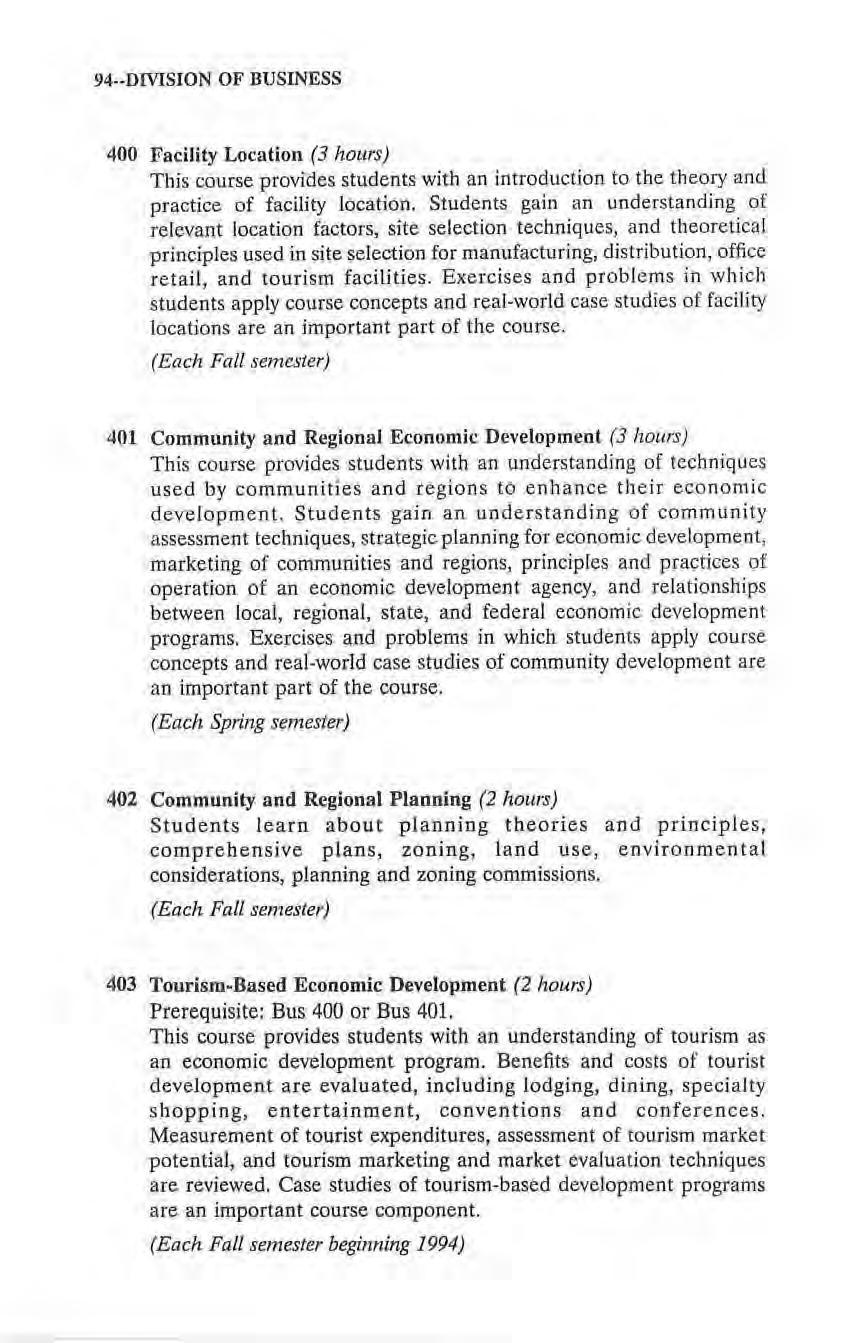
Prerequisite: Bus 400 or Bus 401.
This course provides students with an understanding of tourism as an economic development program. Benefits and cos ts of tourist development are evaluated, including lodging, dining, specialty shopping, entertainment, conventions and conferences. Measurement of tourist expenditures, assessment of to urism marke t potential, and tourism marketing and market evaluation techniques are reviewed. Case studies of tourism-based development programs a re an important course component.
(Each Fall semester beginning 1994)
94--DMSION OF BUSINESS
404 Econ omic Developme n t Incentives (3 hours)
Pre r equisite : Bus 400 or Bus 401.
The course provides students with an understanding of incentives used by economic deve lopment agencies to create, retain and attract businesses. Specific programs reviewed in detail incllfde: community development corporations, the Community Reinve s tment Act, enterprise zones, indus trial revenue bonds, revolving loan funds, tax abatements, and tax increment financing. Costs and benefits of incentive packages to communities and states are evaluated.
(Each Spring semester)
41 0 Marketing Management (3 hoars)
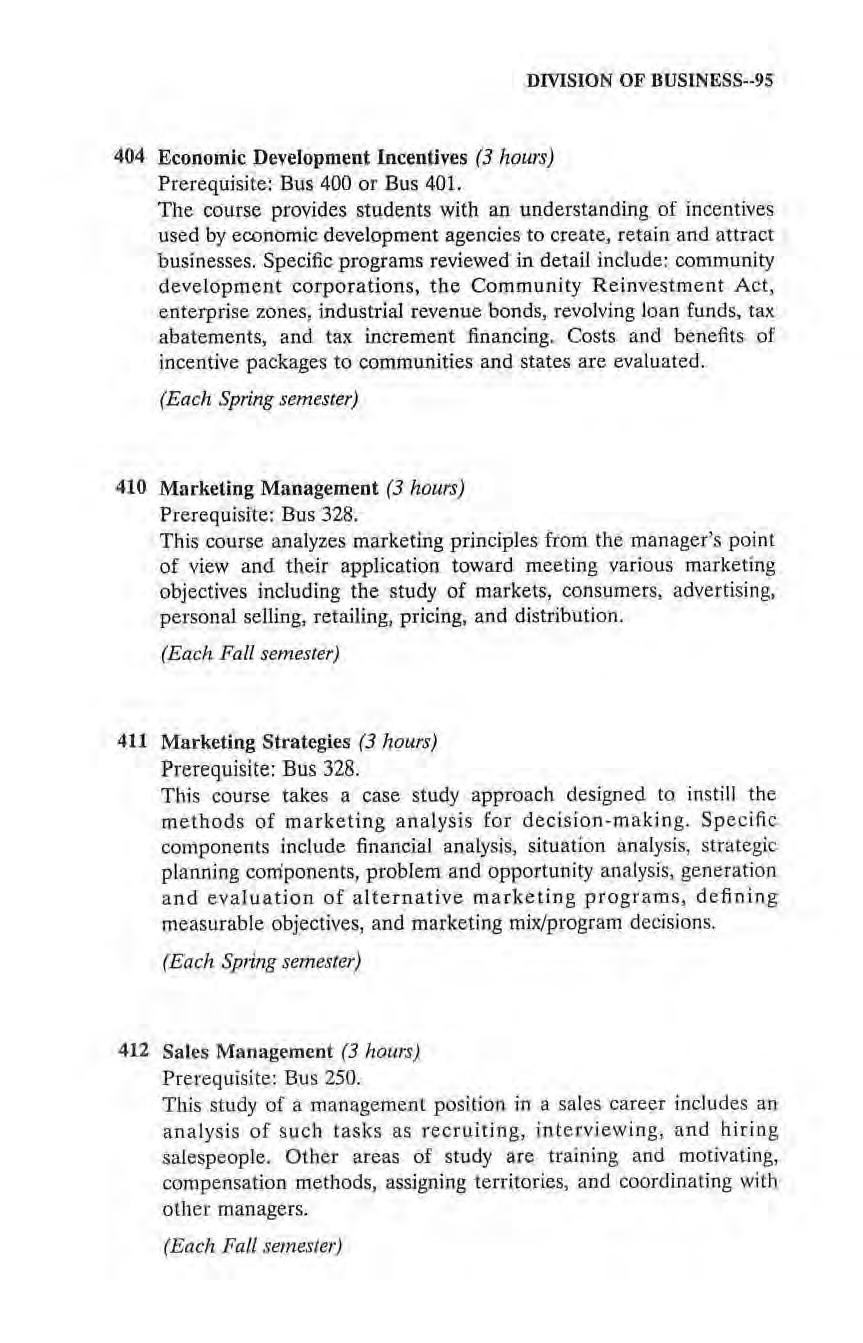
Prerequisite: Bus 328.
This course analyzes marketing principles from th e manager's point of view and their application toward meeting various marketing objectives incl uding the study of markets, consumers, adve rtis ing, p ersonal selling, retailing, pricing, and distrib ution.
(Each Fall semester)
411 Marketing S trategies (3 hours)
Prerequisite: Bus 328.
This course takes a case study approach designed to instill the methods of marketing analysis for decision-making. Specific components include financial analysis, situation analysis, strategic planning components, problem and opportunity analysis, gen eration and evaluation of alternative market ing program s, defining measurable objectives, a nd marketing mix/program decisions.
(Each Spring semester)
412 Sales Management (3 hours)
Prerequisite: Bus 250.
This study of a management position in a sales career includes an analysis of suc h tasks as recruiting, interview in g , and hiring salespeople. Other areas of study are training and motivating, compensation methods, ass igning territories, and coordinating with other managers
(Each Fall semeste1)
DMSlON OF BUSINESS 95
413 Purchasing (3 hours)
Prerequisite: Bus 328.
The study of the procuring of industrial materials includes such topics as SIC codes, negotiated contracts, reciprocity, buying committees, and bidding procedures Buying motives are studied as are procedures such as straight rebuying, value analysis, inventory analysis, and other topics from the buyer's viewpoint.
(Each Spring semester)
414 Supervisory Problems (3 hours)
Students learn the basis for effective supervision including worker motivation, leadership styles and practices, communications with workers, selection, promotion, compensation, training, counseling, evaluation, and discipline a ll within the confines of first-line management.
(Offered off campus only)
415 Credit Management (3 hours)
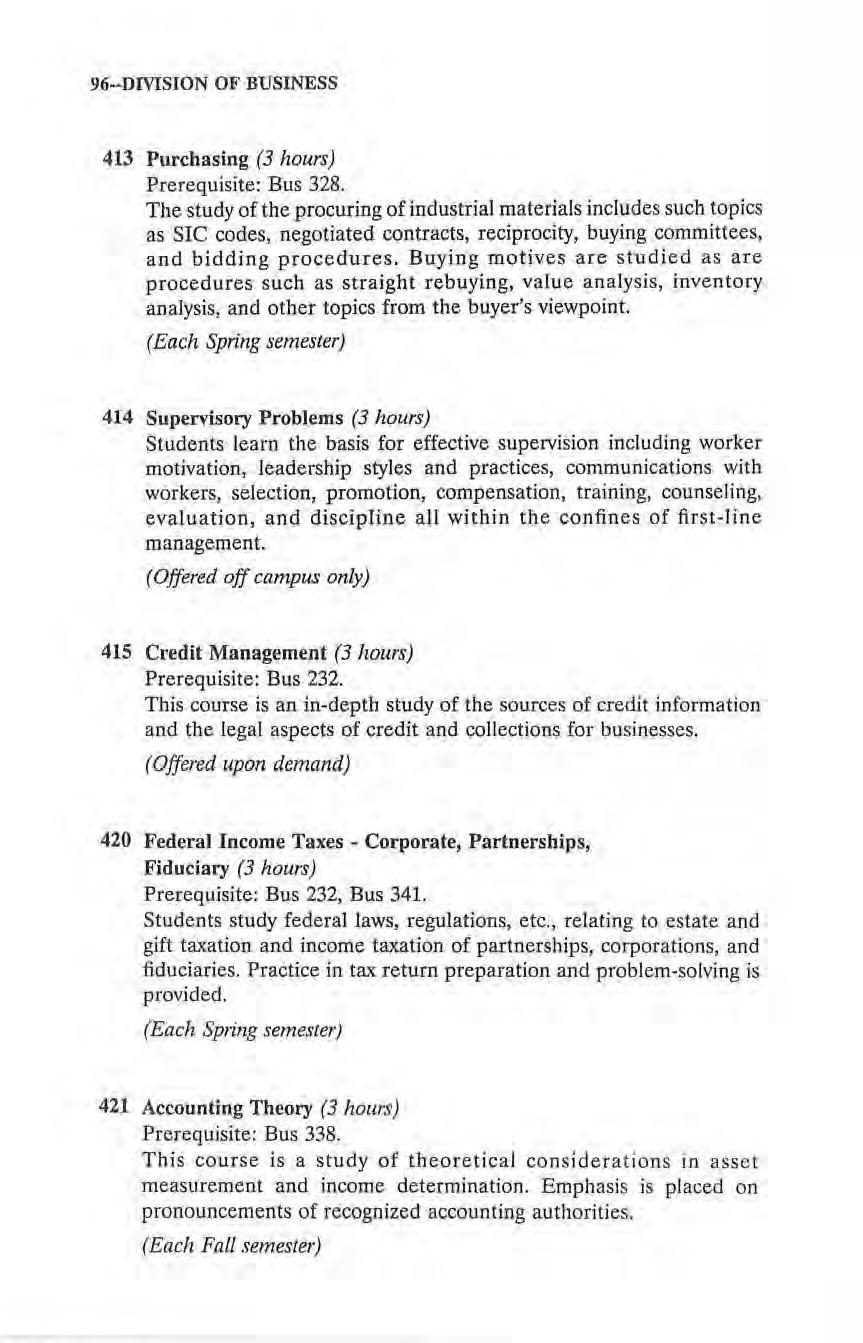
Prerequisite: Bus 232.
This course is an in-depth study of the source s of credit information and the legal aspects of credit and collections for businesses.
(Offered upon demand)
420 Federal Income Taxes - Corporate, Partnerships, Fiduciary (3 hours)
Prerequisite: Bus 232, Bus 341. Students study federal laws, regulations, etc., relating to estate and gift taxation and income taxation of partnerships, corporations, and -fiduciaries. Practice in tax return preparation and problem-solving is provided.
(Each Spring semeste,)
421 Acco unting Theory (3 hours)
Prerequjsite: Bus 338.
This course is a study of theoretical considera t ions in ass e t measurement and income determination. Emphasis is placed on pronouncements of recognized accounting authorities.
(Each Fall semeste,)
96--DIVISION OF BUSINESS
430 Industrial Marketing (3 hours)
Prerequisite: Bus 328.
Students analyze industrial distribution considering organizational consumers, demand, buying process, and strategies. Understanding planning, product lines, channels, logistics, pricing, and promotion are included.
(Each Fall semester)
433 Administrative Management (3 hours)

Prerequisite: Bus 373.
This course is a study of the management of an ofnce. Areas of study include location, layout, equipment, supplies, automation, controlling expenses, measuring efficiency of operation, establishing quantity and quality production standards, and the administration of personnel.
(Each Spring semester)
435 Supervisory Strategies (3 hours)
Students utilize real-world business cases, experiences, and readings to (1) develop analytical skills by reading cases and recommending action, (2) increase awareness of how one's attitude and behavior affect people in simulated management situations, and (3) expand knowledge of management concepts, theories, and principles.
(Each Spring semester, off campus onl.y)
441 Cooperative Education Internship (1-12 hours)
Prerequisite: 45 hours of completed coursework, minimum GPA 2.0, Permission of Cooperative Education Staff and Division Chair. This program is designed for students with a major in Business to gain work experience related to their major and career goals. Students may enroll for 1-12 hours of graded credit. A minimum of forty hours of work experience will be required for every hour of credit per semester. The student will complete necessary paperwork with employer and cooperative education office. The student's work wiJJ be supervised by Cooperative Education staff. A final paper will be prepared at the conclusion of the internship. Three semester hours may be applied toward the Management option.
(Each semeste,;· siimmer session)
DMSION OF BUSINESS- -97
443 Quantitative Management (3 lzoiirs)
Prerequisite: Math 340 or Permission of Instructor. This study of systems and management science includes the development of analyt ical reasoning and set concepts, as well as topics in decision processes, linear programming, wa iting lines, stochastic processes, forecasting methods, inventory control, in put/ output analysis, and general modeling.
(Offered upon demand)
450 Advanced Accounting (3 hours)
Prerequisite: Bus 338.
Students app ly accounting theory and practice to business combinations and consolidation of financial statements for parent/ subsidiary corporations. Additional emphasis is placed on accounting for international business activities and investments. SEC reporting, partnerships and other advanced topics are a lso addressed.

(Each Fall semeste1)
451 Governmental and Not-for-Profit Accounting (3 hours)
Prerequisite: Bus 338.
Accounting theory and practice are applied to governmental and other not-for-profit entities including hospitals and colleges Auditing of government entities is discussed.
(Each Spring semester)
470 Audjting (3 hours)
Prerequis ite : Bus 338, Bus 342. This course covers generally accepted auditing standards and procedures with the philosophy supporti n g them. Auditing techniques availab le to the independent public accountant are also s tudied.
(E ach Spring semester)
480 International Business (3 hours)
Prerequisites: Bus 328, Bus 339, and Bus 373. Students learn contemporary business and management practices in multinational market environmen t s with emphasis on cu'ltural, financial, and marketing differences.
(Each Fall semester)
98- -DMSION OF BUSINESS
490 CPA Review (3 hours)
Prerequisite: Bus 450.
This course is an intensive presentation of overall accounting and related materials summarizing CPA examinations and solutions with an in-depth study of APB opinions and financial research bulletins stressed.
(Offered upon demand)
494 Marketing Research (3 hours)
Prerequisite: Bus 328, Math 340 Students apply analytical tools to marketing problems including markets, products, distribution channels, sales efforts, and advertising. Emphasis is placed on planning, investigation, collect ion, interpretation of data and presentation of results.
(Each Spring semester)
495 Business Policy (3 hours)
Prerequisite: Senior business major having completed 45 semester hours of business major which includes: Bus 229, Bus 339, Econ 220, and Econ 221. Recommended for student's last semester. This course takes a case-study approach requiring in-depth analytical and communication skills Requirements include a thorough review of all given a nd acqu ired data, formulation of well-defined problems, and structured plans of action to be presented in written and oral form.

(Each Semeste11
497 Directed Study in Business (1-4 hours) Senior standing.
(Offered as needed)
498 Special Topics in Business (1-4 hours)
Junior/Senior standing
(Offered upon demand)
499 Independent Study in Business (1-3 hours)
Prerequisite: Junior standing; Permission of Instructor and prior approval of chairperson.
(Each semester)
699 Independent Study in Business (1-3 hours)
Prerequisite: Graduate status; Pennission of Graduate Dean .
(Each semester)
DIVISION OF B USINESS- -99
Economics
220 Principles of Macroeconomics (3 hours)
This course presents elementary concepts of macroeconomics with an emphasis on equilibrium analysis, monetary and fiscal policy, banking and developmental economics.
(Each Spring semester)
221 Principles of Microeconomics (3 hours)
Consideration is given to the microeconomics concepts of wages, interest, rent and profits, personal distribution of incom e, consu mpti on, monopolies, agriculture, government taxation and expenditures, international trade and comparative economic systems.
(Each Fall semester)
297 Directed Study in Economics (1-4 hours) Senior standing.
(Offered as needed)
298 Special Topics in Economics (1-4 hours)
Freshman/Sophomore standing.
(Offered upon demand)
375 Labor and Industria l Relations (3 hours)
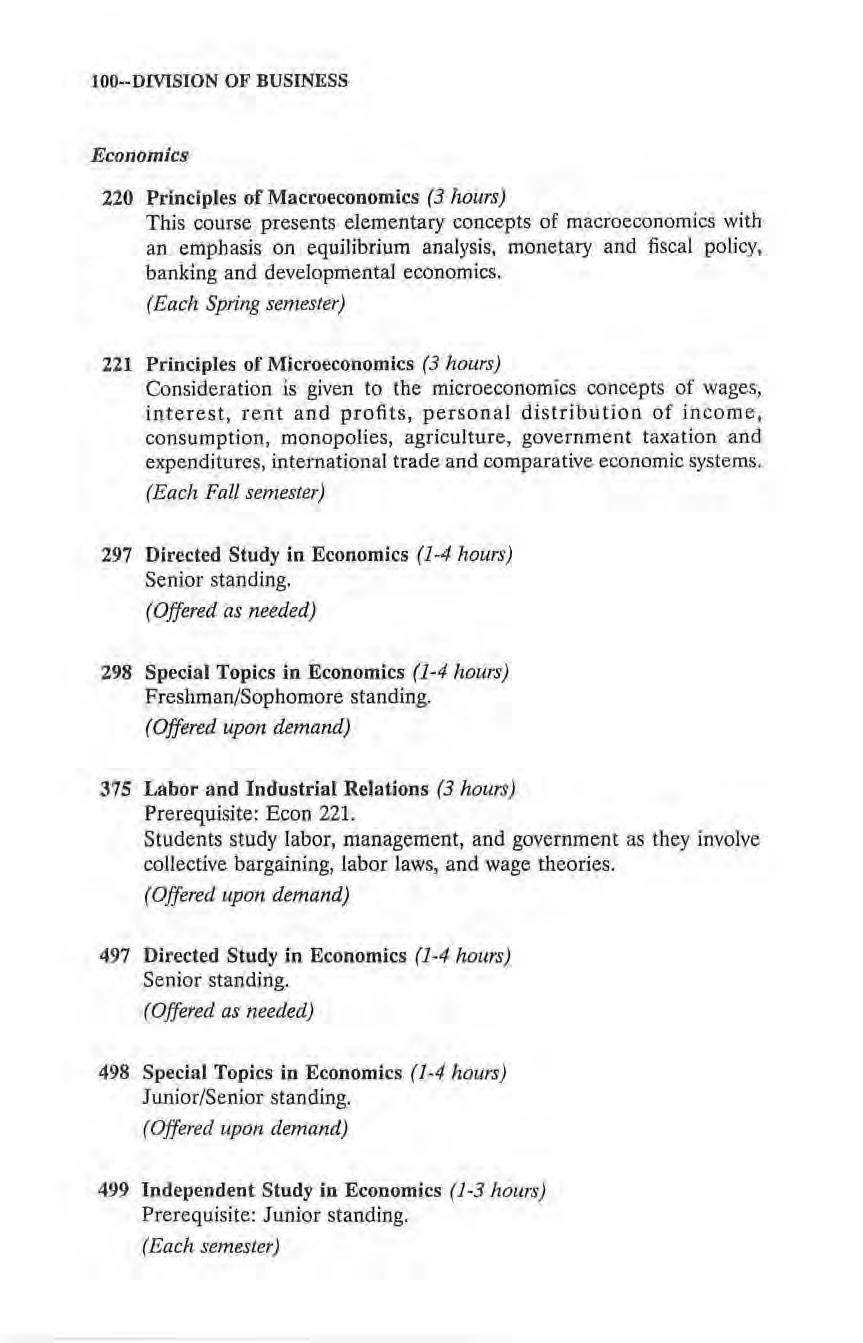
Prerequisite: Econ 221.
Students study labor, management, and government as they involve collective bargaining, labor laws, and wage theories.
(Offered upon demand)
497 Directed Study in Economics (1-4 hours) Senior standing.
(Offered as needed)
498 Special Topics in Economics (1-4 hours)
Junior/ Senior standing.
(Offered upon demand)
499 Independent Study in Economics (1-3 hours)
,Prerequisite: Junior standing.
(Each semester)
100--DMSION OF BUSINESS
Ma nagement
300K Economic Co n cepts I (3 hours)
Basic concepts in economics to cover macroeconomic principles and management applications.
301K Economic Concepts Il (3 hours)
Basic concepts in econmics to cover microeconomic principles and management applications.
3 10K Organizational Management (3 hours)
History and functions of management principles and systems to include organization theory, decision making, leadershi p , and motivation. Concentrating on existing business organization and the manager's responsibilities.
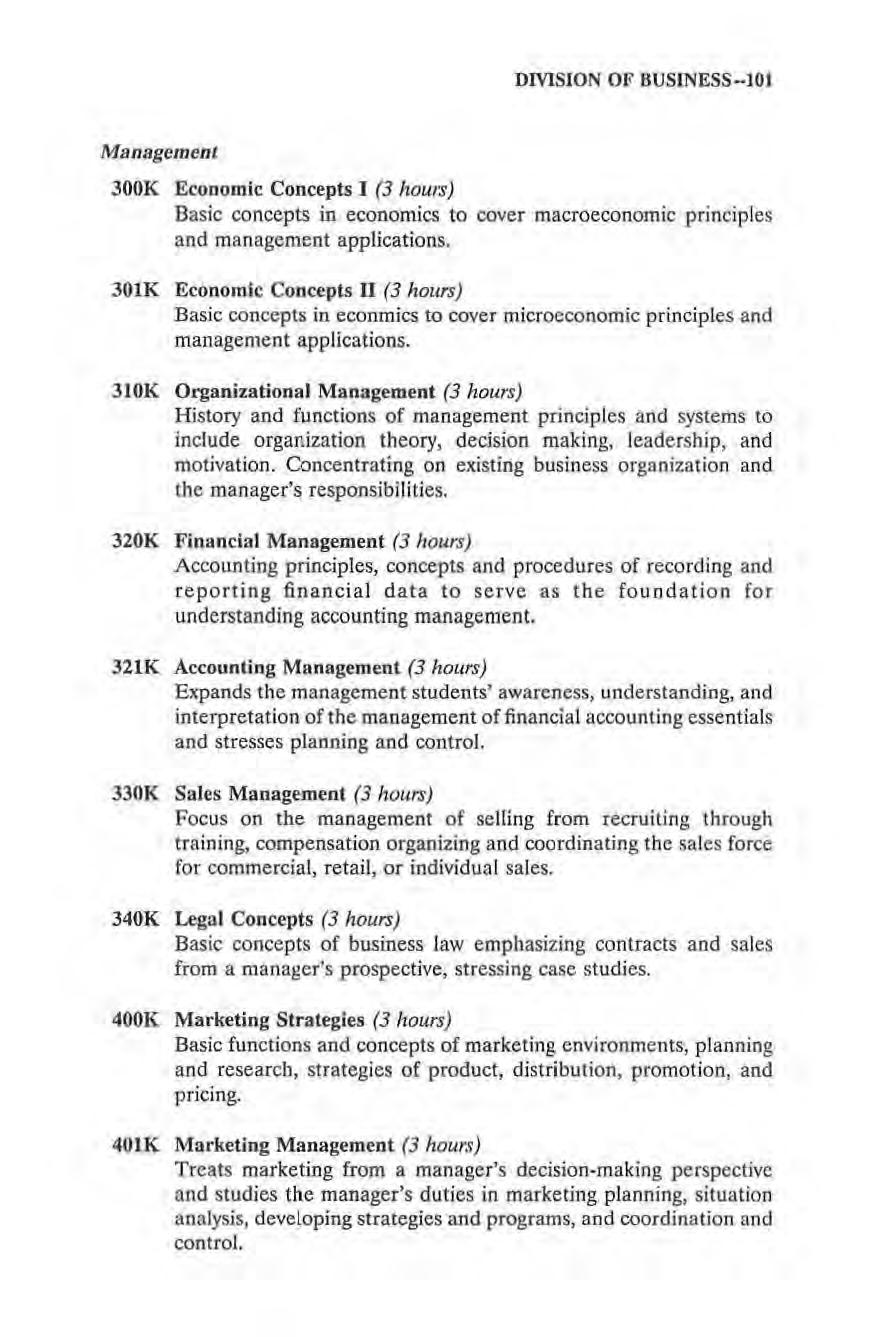
320K Financial Management (3 hours)
Accounting principles, concepts and procedures of recording and reporting financial data to serve as the fou n dation for understanding accoun ting management.
321K Acco un t in g Management (3 hours)
Expands the management students' awareness, understanding, and interpretation of the management offinancial accounting essentials and stresses planning and control.
330K Sales Management. (3 hours)
Focus on the management of selling from recruiling through training, compensation organizing and coordinating the sales force for comme rcial, retail, or individual sales.
340 K Lega l Concep ts (3 hours)
Basic concepts of business law emphasizing contracts and sales from a manag e r 's prospective, stressing case studies.
400K Marketing Strategies (3 h ours)
Basic functions and concepts of marketing environments, planning and research, strategies of product, distribution, pro moti on, and pricing.
401K Marketing Management (3 hours)
Treats marketing from a manager's decision-making perspective and studies th e manager's duties in marketi ng planning, sit uation analysfa, developing strategies and programs, and coordination and control.
DIVISION OF BUSrNESS--101
420K Administrative Management (3 hours)
Office systems management principles and techniques for office operations and management of data and information management.
421K Human Resources Management (3 hours)
Management of employees and the efficient use of human resources for both the personnel and operating managers. Case studies are used extensively.
430K Small Business Management (3 hour:.) Studies planning, requirements, resources, and operations involved in small business management/ownership.
440K Quantitative Management (3 hours)
Prerequisite: Minimum of 2 hours of Statistics Studies systems and management science and introduces quantitative analytical techniques, methods and practices.
441K Production/Operations Management (3 hours)
Studies analytical tools available for production and operation problem solving, decision-making situations through case st udies.
450K/
459K Management Seminars (1 hour)
460K Supervision Studies and Applications (3 hours) Involves practical management/supervision case applications utilizing computer assisted analysis as applicable and available.
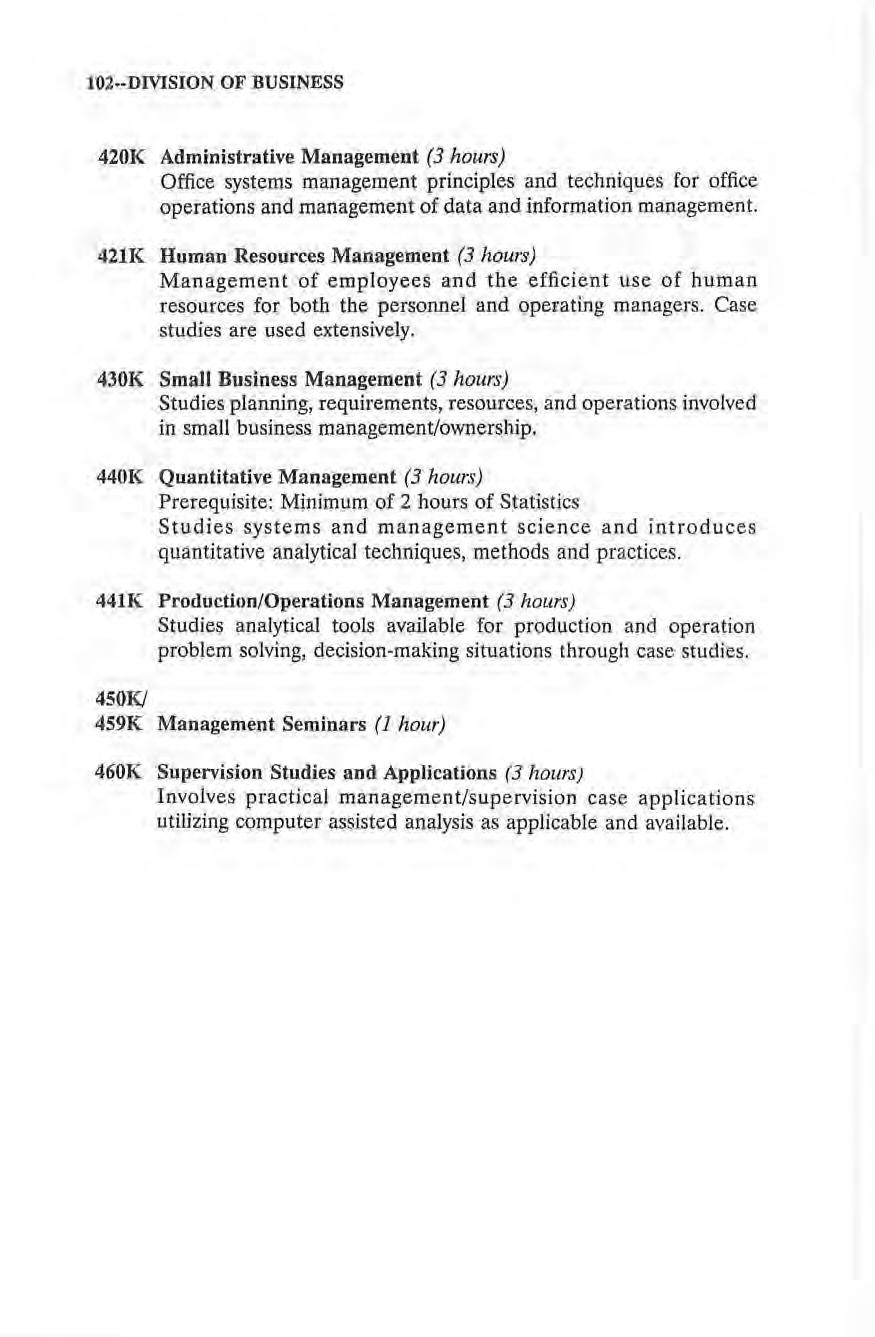
102--DIVISION OF BUSINESS
DIVISION OF EDUCATION AND PSYCHOLOGY
Chairperson
Professors: Citrin, Ferre, Hanson, Hytrek
Associate Professors: Cox, Davidson, Lundak
Assistant Professors: Callender, Rempp , Wilmes
Instructors : Gabriel, Gibbs, Johnson, Meadows
TEACHER EDUCATION
The Division of Education and Psychology provides teacher preparation programs in accordance with the Nebraska Department of Education. The Nebraska Department of Education requires that individuals seeking teacher certification be qualified for endorsement in either one field or two s ubjects. Subjects and fields are defined as follows:
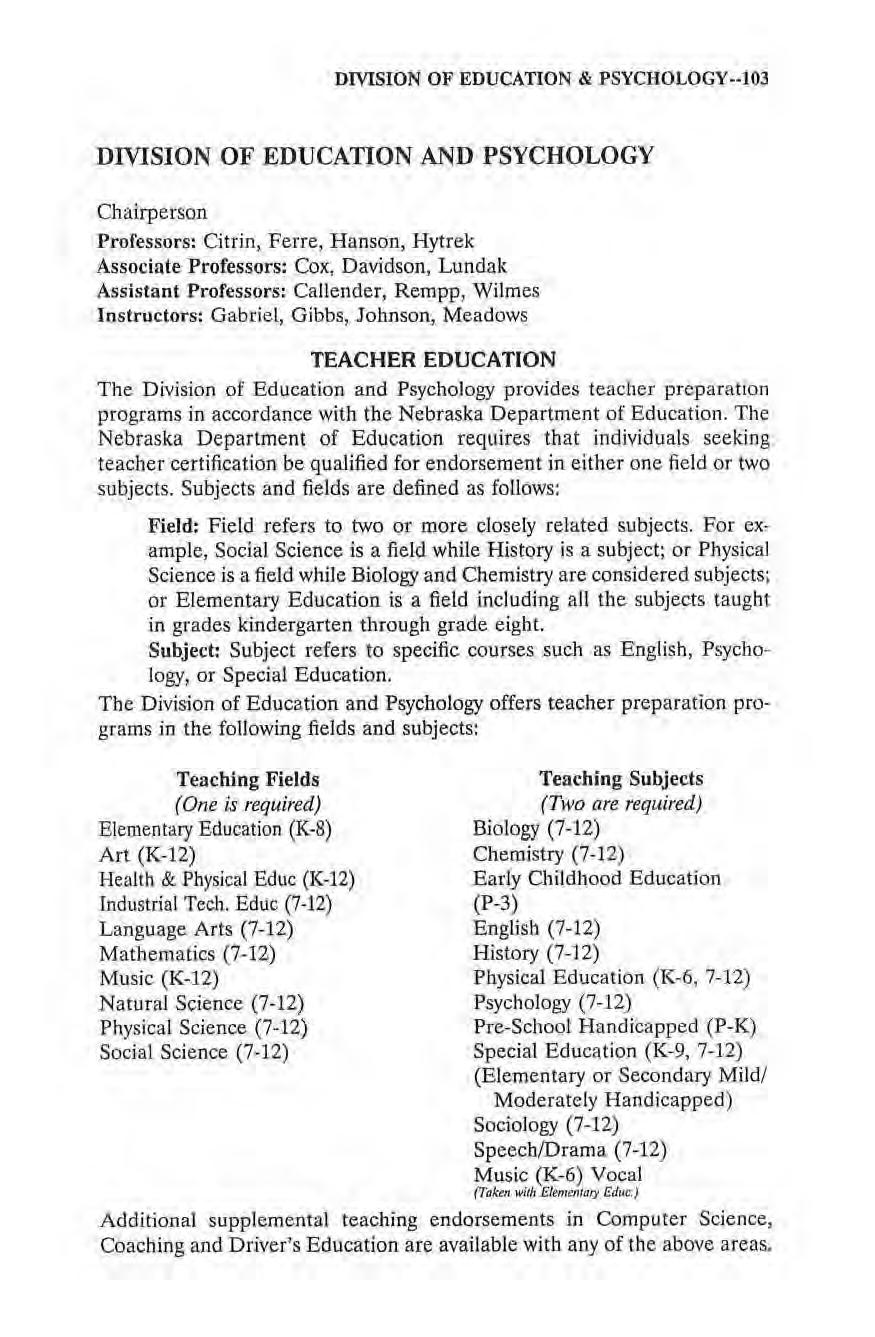
Field: Field refers to two or more closely related subjects. For example, Social Science is a field while History is a subject; or Physical Science is a field while Biology and Chemistry are considered subjects; or Elementary Education is a field including all the subjects taught in grades kindergarten through grade eight.
Subject: Subject refers to specific courses such as English, Psychology, or Special Education.
The Division of Education and Psychology offers teacher preparation programs in the following fields and subjects:
Teaching Fields
(One is required)
E lementary Education (1<.-8)
Art (K-12)
Health & Physical Educ (K-12)
Industrial Tech. Educ (7-12)
Language Arts (7-12)
Mathematics (7-12)
Music (K-12)
Natural Science (7-12)
Physical Science (7-12)
Social Science (7-12)
Teaching Subjects
(Two are required)
Biology (7-12)
Chemistry (7-12)
Early Childhood Education (P-3)
English (7-12)
History (7-12)
Physical Education (K-6, 7-12)
Psychology (7-12)
Pre-School H a ndicapped (P-K)
Special Educa tion (K-9, 7-12)
(Elementary or Secondary Mild/ Moderately Handicapped)
Sociology (7-12)
Speech/Drama (7-12)
Music (K-6) Vocal
(Toktn wilh E/eme,llary £due.)
Additional supplemental teaching endorsements in Computer Science, Coaching and Driver's Education are available with any of the above areas.
DIVISION OF EDUCATION & PSYCHOLOGY ··103
OF EDUCATION & PSYCHOLOGY
For complete information regarding teacher education requirements and teacher certification, contact the Certification Officer, Division of Education at Peru State College or the Director of Teacher Certification, State Department of Education, Lincoln, Nebraska 68509.
Offutt Air Force Base Extension Program
The Offutt AFB Extension Program offers non-traditiona l, accelerated teacher preparation programs with priority enrollment to active and retired military, Offutt AFB employees, their dependents, and as space is available, civilians. These programs include the Elementary Education field endorsement and selected general studies and the Secondary Education curriculum. These programs will meet the initial Nebraska teacher certification requirements. The secondary endorsement courses are not offered by the Offutt program. Admission, degree and course requirements are the same as oncampus. I nformation regarding the Offutt Extension Program is available from the above or directly by contacting the Peru State College Extension Office, Base Education, 55 MSS/MSE, Offutt AFB, NE 68 113. (402) 2931764

Admission to Teacher Education
Admission to Peru State College does not automatically permit admission to teacher education. Students planning to enter teach er ed ucation are required to file a formal application with the Teacher Education Committee.
Application for admission to teacher education will normally be made during the sophomore year in conjunction with enrollment in Ed 208: Orientation & Practicum. Students who transfer credit which includes this course will be required to make application during their first semester on campus. Non-degree students seeking endorsements only must apply immediately. The following criteria and conditions must be met by applicants for admission to teacher education:
1. Free from social probation.
2. Overall grade point average of at least 2.5.
3. Minimum score of 170-reading comprehension; 171-math; and 172composition on the Pre-Professional Skills Test (PPST).
4. Recommendations from three instructors who are in a position to assess the student as a prospe-ctive teacher.
5. Must participate in an interview.
104--DMSION
6. Evidence of proficiency in English and Mathematics as indicated by a grade of C or above in college level courses or scores at or above the fiftieth percentile on the English and Mathematics sections of th e ACT.
No student will be admitted to teacher education until all of the above criteria have been met.
After consideration by the Teacher Education Committee, the applicant will be approved or disapproved for admission to teacher education. Approved applicants and their advisors will be notified by letter from the Teacher Education Committee.
Applicants not approved for admission to teacher edu ca t ion and their advisors will be notified of the reasons for disapproval by the Teacher Education Committee. Applicants may request a review of the application and/ or a hearing before the Teacher Education Committee.

Admission to Student Teaching
Candidates who wish to student teach must submit a n application for student teach ing two semesters prior to the student teaching term. To be eligible to enter student teaching, students must meet the followin,g requ irements:
1. They must have received official notification of their acceptance into teacher education.
2. They must have an overall GPA of at least 2.5.
3. They must have earned enough credits to graduate within one semester following student teaching.
4. They must have completed a minimum of 12 hours of credit at Peru State College.
5. They must have provided a sworn statement that th ey have never been convicted of a feJony.
Elementary Education
The Division of Education offers the B.S. with a major in Education and three additional options which students may elect. The B.S. prepares a student to teach in Elementary Schools. The three additional op tions are: Elementary and Special Ed ucation; Elementary and Early Childhood Education; and Elementary and Preschool Handicapped Education. All s tudents completing the B.S. must complete the core in Elementary Education and then, if they choose an additional option, must complete the requirements of that option. Thus, a ll students are required to complete the core in Elementary Education.
DMSION OF EDUCATION & PSYCHOLOGY--105
OF EDUCATION & PSYCHOLOGY
The core courses required of all students completing the B.S. in Elementary Education are:
A detailed description of the Elementary Education endorsement program and of the three optional programs are listed under their titles on the pages which follow.
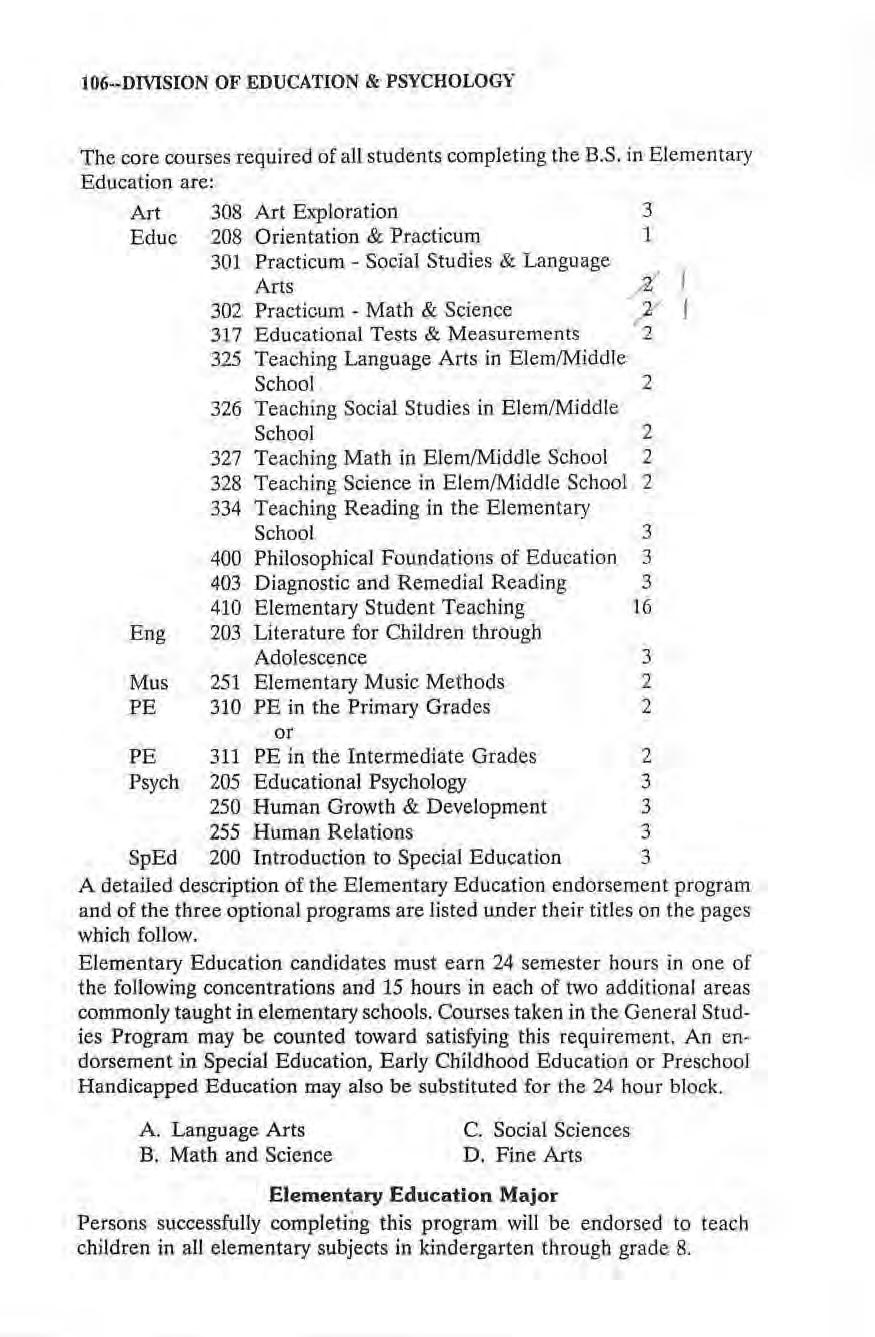
Elementary Education candidates must earn 24 semester hours in one of the following concentrations and 15 hours in each of two additional areas commonly taught in elementary schools. Courses taken in the General Studies Program may be counted toward satisfying this requirement. An endorsement in Specia l Education, Early Childhood Education or Preschool
Handicapped Education may also be substituted for the 24 hour block.
Elementary Education Major
Persons successfully completing this program will be endorsed to teach children in all elementary subjects in )cjndergarten through grade 8.
106--DMSION
Art 308 Art Ex-ploration 3 Educ 208 Orientation & Practicum 1 301 Practicum - Social Studies & Language Arts ;t 302 Practicum - Math & Science y 317 Educational Tests & Measureme nts /'2 325 Teaching Language Arts in Elem/Middle School 2 326 Teaching Social Studies in Elem/Middle School 2 327 T eaching Math in Elem/Middle School 2 328 Teaching Science in Elem/Middle School 2 334 Teaching Reading in the Elementary School 3 400 Philosophical Foundations of Education 3 403 Diagnostic and Remedial Reading 3 410 Elementary Student Teaching 16 Eng 203 Literature for Children through Adolescence 3 Mus 251 Elementary Music Methods 2 PE 310 PE in the Primary Grades 2 or PE 311 PE in the In termediate Grades 2 Psych 205 Educational Psychology 3 250 Human Growth & Development 3 255 Human Relations 3 SpEd 200 Introduction to Special Education 3
A. Language Arts C. Social Sciences B. Math and Science D. Fine Arts
* Social Studies/Language Arts Block
*Matb/Scieoce Block Prerequisites

DIVISION OF EDUCATION & PSYCHOLOGY--107
for Elementary Education Major LEVEL I • PRE-PROFESSIONAL Ed Psych P sych SpEd 208 Orien tation & Practicum 2 05 Educational Psychology Hours 1 250 Human Growth & Development 200 Introduction to Special Education Total 3 3 3 10
and
of
I
are
a student
1I)
Requirements
(Admittance to Teacher Education, General Studies Computer Science Requirements
completion
Level
courses
required before
may advance ·to Level
CURRICULUM
LEVEL II ·
& INSTRUCTION
Prerequisites for Social Studies/Language
(Eng 301, Eng 203, Hist 113, Hist 114 & Geog. 101) Educ 325 Teaching Lang. Arts in the Elem/Middle School 2 Educ 326 Teaching Soc Studies in the Elem/Middle School 2 Educ 301 Practicum - Soc. Studies & Lang. Arts 1 (T aken with Ed 325 & Ed 326)
Arts Block:
Math/Science
Educ 327 Teaching Math in the Elem/Middle School 2 Educ 328 Teaching Science in the Elem/Middle School 2 302 Practicum - Math & Science 1 (Taken with Ed 327 & Ed 328)
for
Block: (General Studies Math & Science Requirements)
(Admittance to Teacher Ed ucation and completion of Levels I & II courses are requ ired before a student may advance to Level III)

*Blocks may be taken in e ither order. SECONDARY
This program is for individuals seeking endorseme nt to teach in grades 7 t hrough 12.
(Admittance to Teacher Education, General Studies Computer Science Requirements and completion of L evel I cou rses are required before a student may advance to Leve l II )
108- - DMSlON OF EDUCATION & PSYCHOLOGY Additi<mal LEVEL II Educ 317 T ests & Measurements 2 Educ 334 T eaching Reading in the Elementary 3 School Educ 400 Philoso phical Foundations of Education 3 Educ 403 D iagnos ti c and Remedial Readin g 3 To tal 21
LEVEL III · PROFESSIONAL STUDENT TEACHING
Hours Ed 410 Elementary S tud ent Teaching 8-16
(Refer to Admis s ion to Student Teaching Requirement s)
EDUCATION
Educ P sych Psyc SpEd Requirements for Secondary Education Major LEVEL I · PRE-PROFESSIONAL 208 Orie nt ation & Practicum 205 Educational Psychology 250 Human Growth & Development 200 In troduction to Special Education Total Hours 1 3 3 3 10
(Admittance to Teacher Education and completion of Levels I & ll co urses ate required before a student may advance to Level III)
ADDITIONAL LEVEL II
1n addition to the above requirements, students must take Psych 255: Human Relations.
K-12 Teacher Education Programs
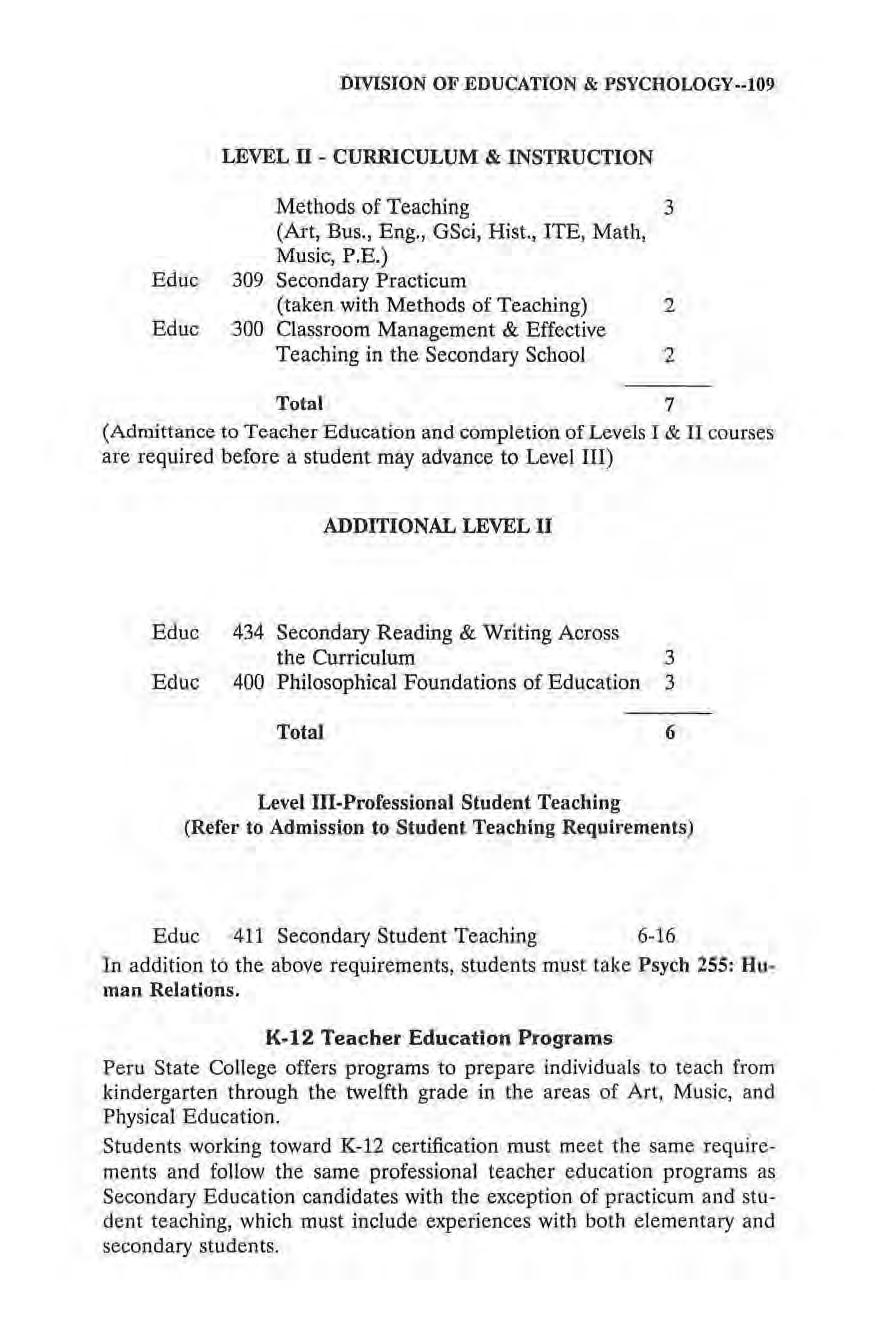
Peru State College offers programs to prepare individuals to teach from kindergarten through the twelfth grade in the areas of Art, Music, and PhysicaJ Education .
Students working toward K-12 certification must meet the same r e quirements and follow the same professional teacher education programs as Secondary Education candidates with the exception of practicum and student teaching, which must include experiences with both elementary and secondary students.
DMSION OF EDUCATION & PSYCHOLOGY- -109 LEVEL II - CURRICULUM & INSTRUCTION Methods of Teaching 3 (Art, Bus., Eng., GSci, Hist., ITE, Math, Music, P E.) Educ 309 Secondary Practicum (taken with Methods of Teaching) 2 Educ 300 Classroom Management & Effective Teaching in the Secondary School 2 Tota l 7
Educ 434 Secondary Reading & Writing Across the Curriculwn 3 Educ 400 Philosophical Foundations of Education 3 Total 6 Level
Educ 411 Secondary Student Teaching 6-16
III-Professional Student Teachin g (Refer to Admission to Student Teaching Requ irements)
This program prepares individuals to teach mild/moderately handicapped students. It may be used in lieu of the 24 hour block requirem e nt in Elementary Education or as one of the subject areas in Seconda ry Education. All K-9 Special Education students must also have an endorsement in Elementary Education. All 7-12 Special Education students must also have an ad d itional endorsement in another 7-12 subject or fi e ld.
Requit·ements for Special Education Option
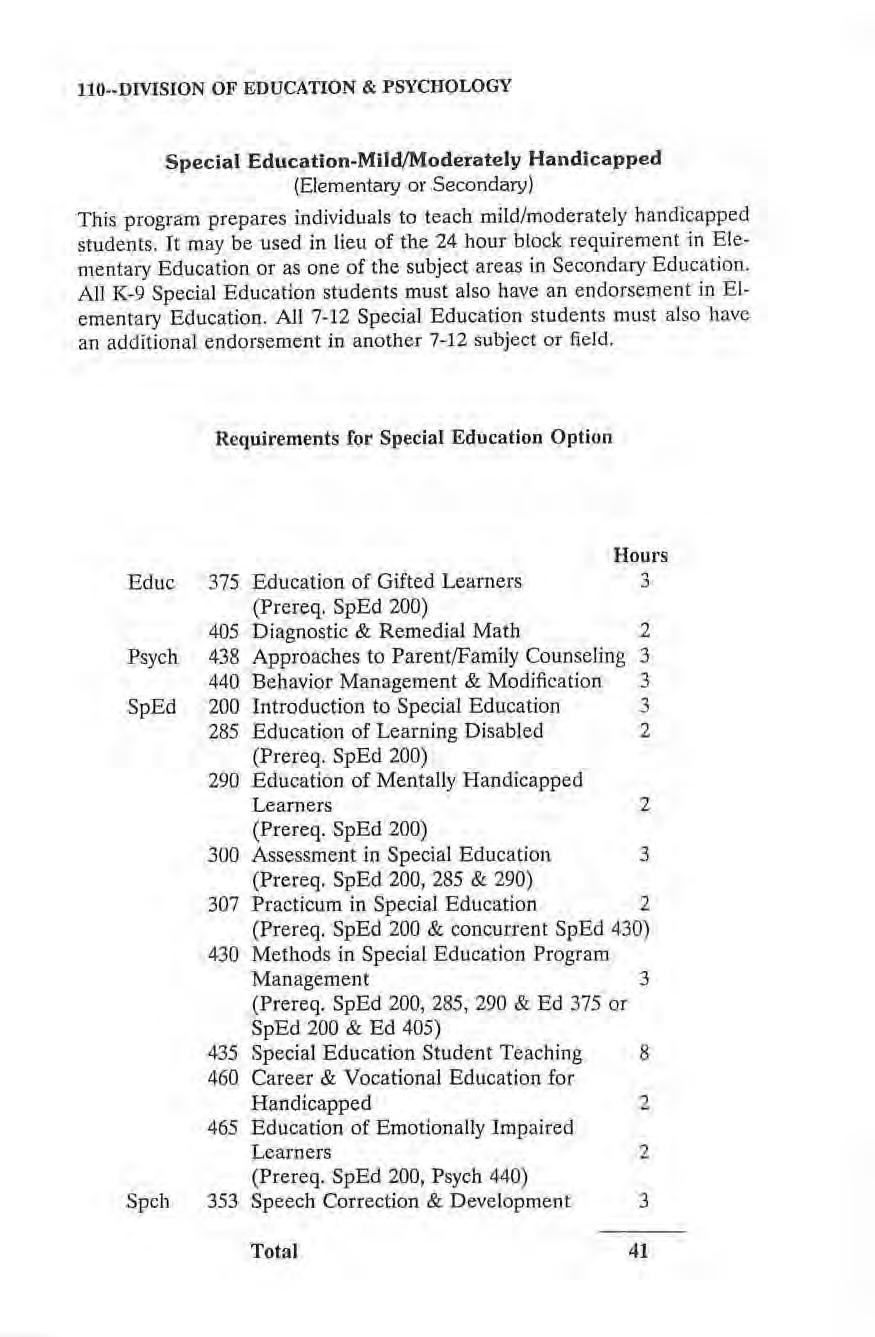
110--DIVISION OF EDUCATION & PSYCHOLOGY
Secondary}
Special Education-Mild/Moderately Handicapped (Elementary or
Hours Educ 375 Education of Gifted Learners 3 (Prereq. SpEd 200) 405 Diagnostic & Remedial Math 2 Psych 438 Approaches to Parent/Family Counseling 3 440 Behavior Management & Morufication 3 SpEd 200 Introduction to Special Education 3 285 Education of Learning Disabled 2 (Prereq. SpEd 200) 290 Education of Mentally Handicapped Learners 2 (Prereq. SpEd 200) 300 Assessment in Special Education 3 (Prereq. SpEd 200, 285 & 290) 307 Practicum in Special Education 2 (Prereq. SpEd 200 & concurrent SpEd 430) 430 Methods in Special Education Program Management 3 (Prereq. SpEd 200, 285, 290 & Ed 375 or SpEd 200 & Ed 405) 435 Special Education Student Teaching 8 460 Career & Vocational Education for Handicapped 2 465 Education of Emotionally Impaired Learners 2 (Prereq. SpEd 200, Psych 440) Speh 353 Speech Correction & Development 3 Tota l 41
Re qu i rements for Ea rly Chil d hood Edu cation Opt i o n
All students enrolled in th e Early Childhood Program must also complete the Elementary Education Program. The student successfully completing this program will be endorsed to teach children from birth thro ugh eight years, or third grade.
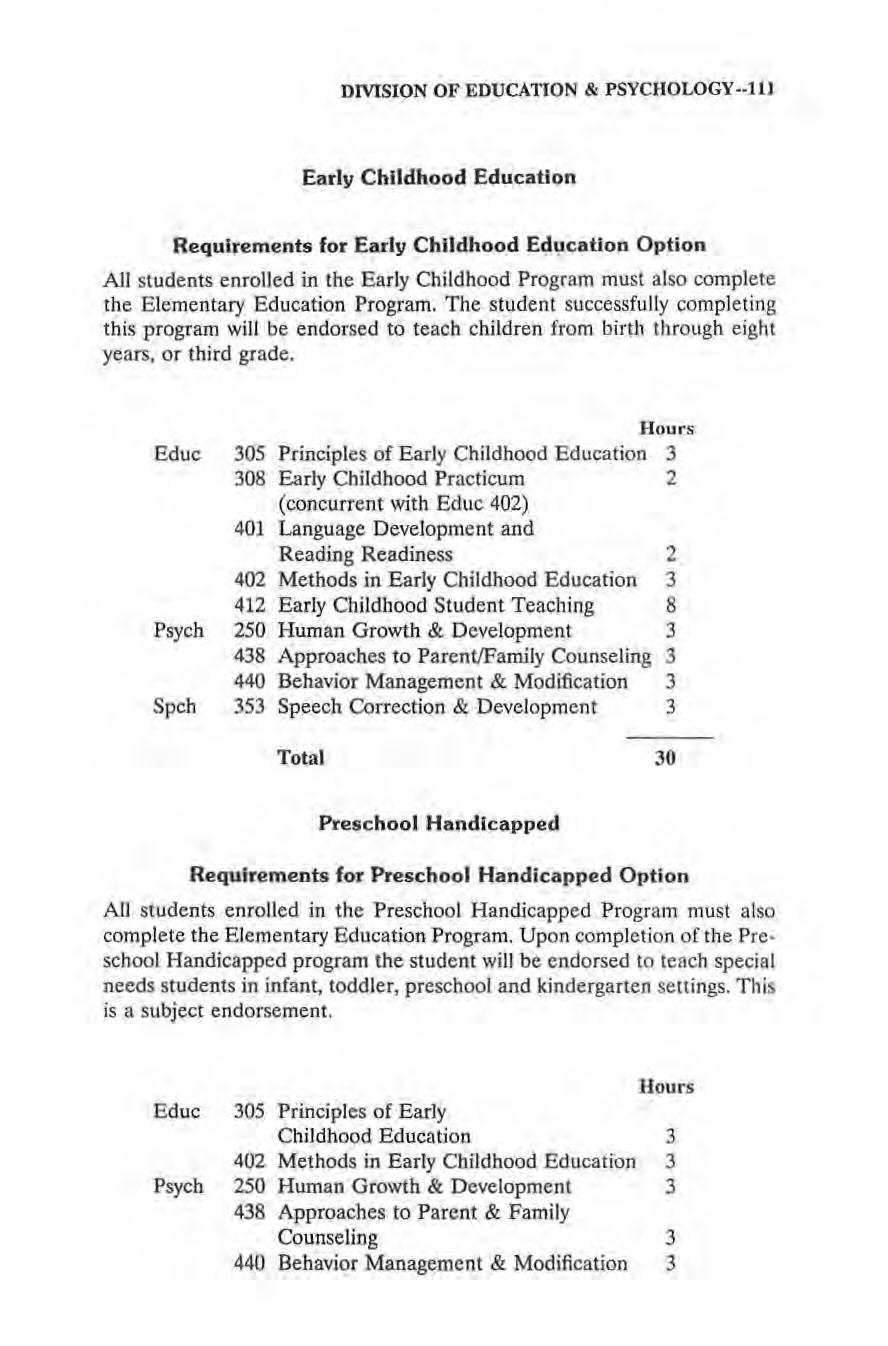
Re q u irements for Presch ool Han dicapped Option
All st udents enrolled in the Preschool Handicapped Progra m must a lso complete the E lementary Education Program. Upon completion of th e Preschool Handicapped program the student will be endorsed to teach special needs st udents in infant, toddler, preschool and kfadergarten settings. This is a subject endorsement.
DMSION OF EDUCATION & P SYCHOLOGY--111 Early Childho od E ducati o n
Hours Educ 305 Principles of Early Childhood Education 3 308 Early Childhood Practicum 2 (concurrent with Educ 402) 401 Language Development and Reading Readiness 2 402 Methods in Early Childhood Education 3 412 Early Childhood Student Teaching 8 Psych 250 Human Growth & Development 3 438 Approa c hes to Parent/Family Counseling 3 440 Behavior Management & Modification 3 Speh 353 Speech Correction & D evelopment 3 Tota l 30 Presch o ol Ha nd icap p e d
Hours Educ 305 Principles of Early Childhood Education 3 402 Methods in Early Childhood Education 3 Psych 250 Human Growth & D evelo pment 3 438 Approaches to Parent & Family Counseling 3 440 Behavior Management & Modifica tion 3
All students majoring in P sychol ogy must complete the psychology requirements listed below and any other degree requirements. Those students prepar ing t o teach psychology in high school must also comp lete the secondary professional education requirements.
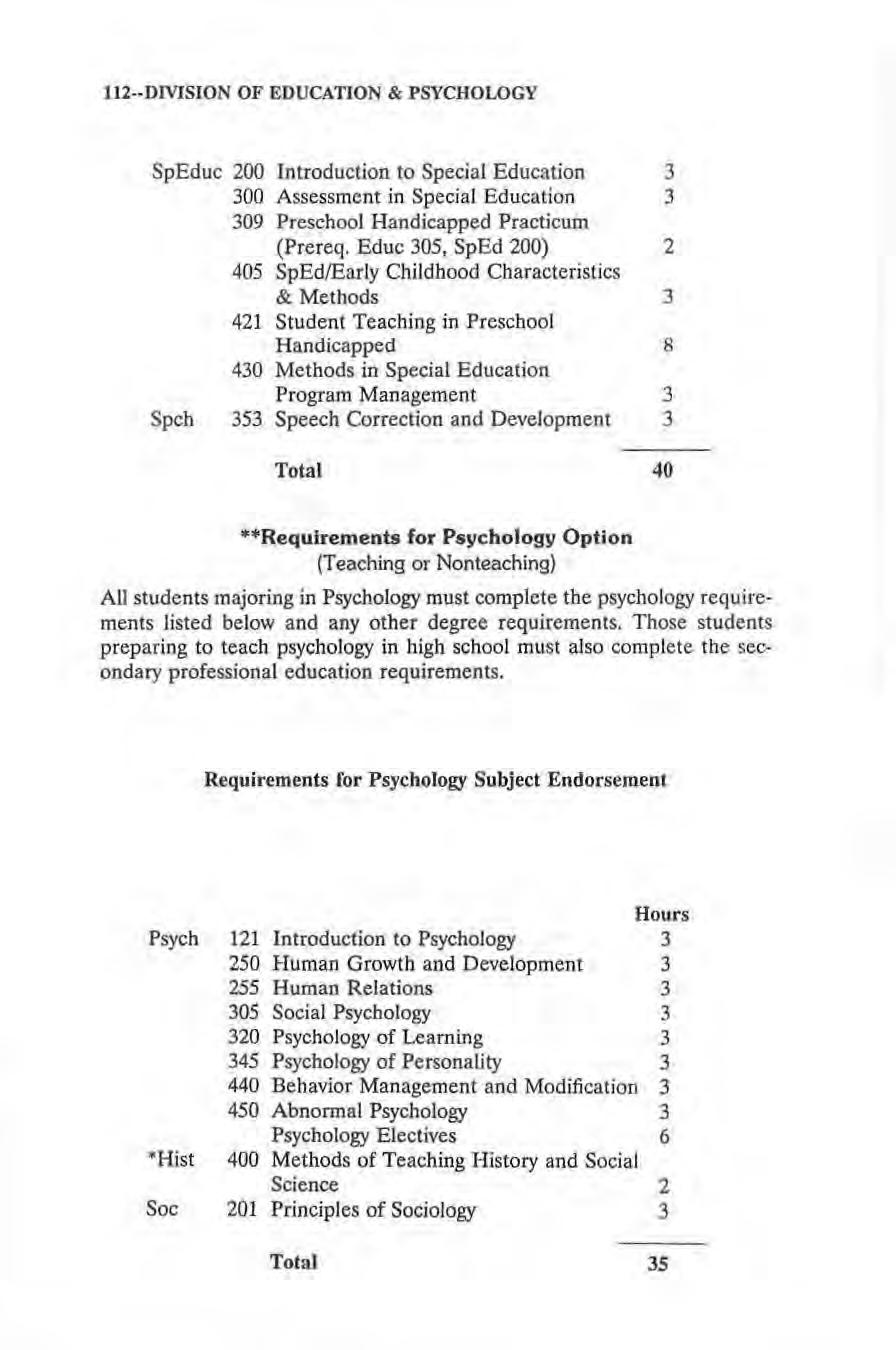
112--DMSION OF EDUCATION & PSYCHOLOGY SpEduc 200 Introduction to Special Education 3 Speh 300 Assessment in Special Education 3 309 Preschool Handicapped Practjcum (P rereq. Educ 305, SpEd 200) 2 405 SpEd/Early Childhood Characteristics & Methods 3 421 Student Teaching in Preschool H andicapped 430 Methods in Special Education Program Management 353 Speech Correction and Developmen t Total **Requirements for Psychology Option (Teaching or Nonteaching) 8 3 3 40
Requirements l'or Psychology Subject Endorsement Hours Psych 121 Introduction to Psychology 3 250 Human Growth a nd D evelopment 3 255 Human Relations 3 305 Social Psychology 3 320 Psychology of Leaming 3 345 Psychology of Personality 3 440 Behavior Management a nd Modification 3 450 Abnormal Psychology 3 Psychology E lectives 6 *Hi st 400 Methods of T eaching History and Social Science 2 Soc 20 1 Principles of Sociology 3 Total 35
Electives from one or more Social Science cognate areas: 3
History (not including Hist 400)
*Those students completing the requirements fo r th e nonteaching psychology major may substitute any psychology elective for History 400.
**Refer to the Psychology/Sociology major in the Hum a niti es section for other options.
HEALTH AND PHYSICAL EDUCATION
The Division of Education offers programs for individuals wishing to major in Physical Education which will enable graduates to be come certified as Physical Education teachers in the public schools, to prepare for other careers using the Health and Physical Education major, to become qualified for careers in Sport Management and to enable students to meet the requirements for certification as coaches.
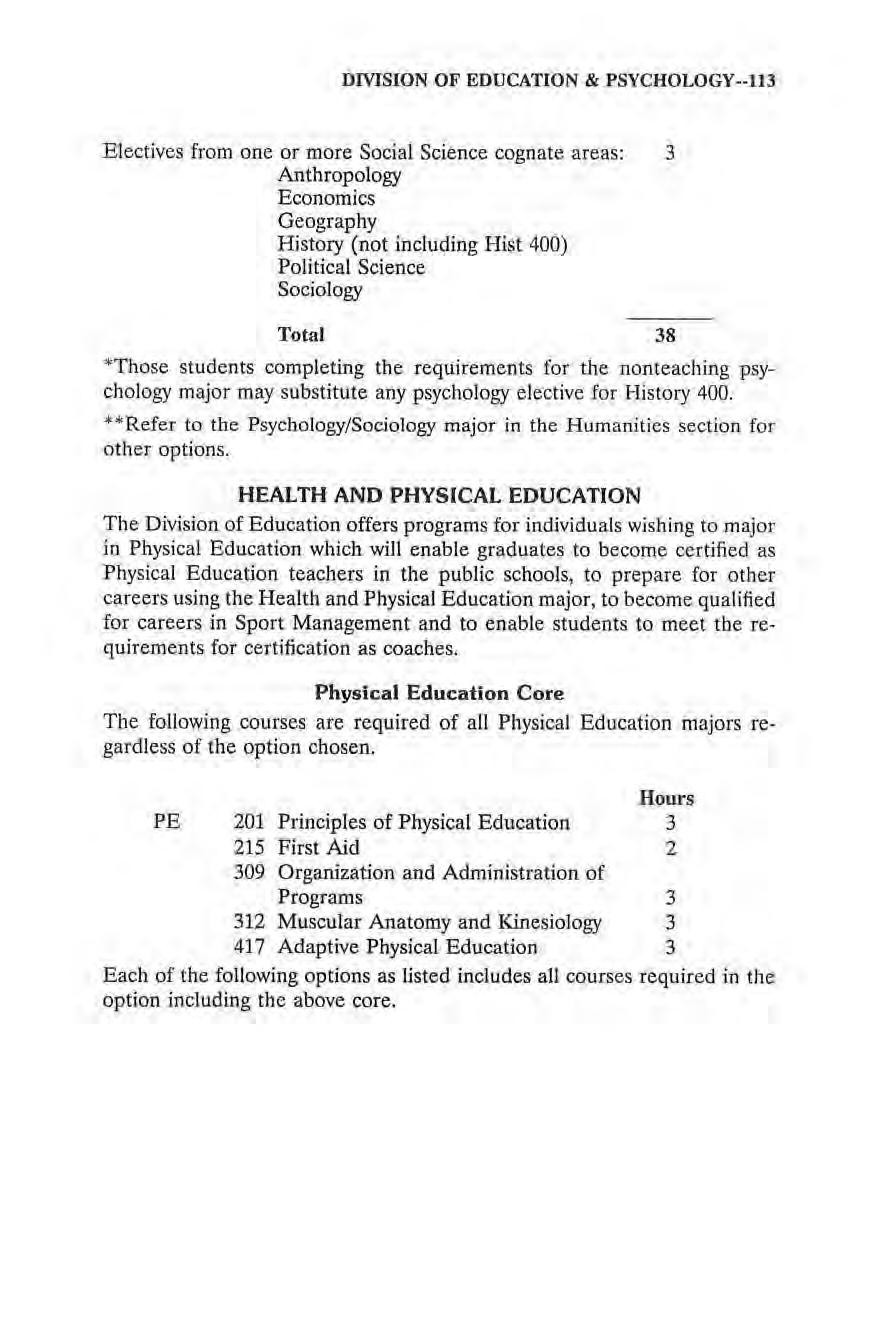
Physical Education Core
The following courses are required of all Physical Education majors regardless of the option chosen.
Each of the following options as listed includes all courses req uired in the option including the above core.
DMSION OF EDUCATION & PSYCHOWGY--113
Anthropology Economics Geography
Political Science Sociology Total 38
PE 201 Prin ciples of Physical Education 215 First Aid 309 Organization and Administration of Hours 3 2 Programs 3 312 Muscular Anatomy and Kinesiology 3 417 Adaptive Physical Education 3
Health and Phys ical Educa t ion (K-12 ) Option (Teachin
Th e field end orsement in H ealth and Physical Education (K- 12) will meet Nebraska state requirements to teach both H ealth and Physical Education. Students wh o seek the endo rseme nt must meet 1he same requirements and follow the same professional teacher education program as Secondary Education candidates
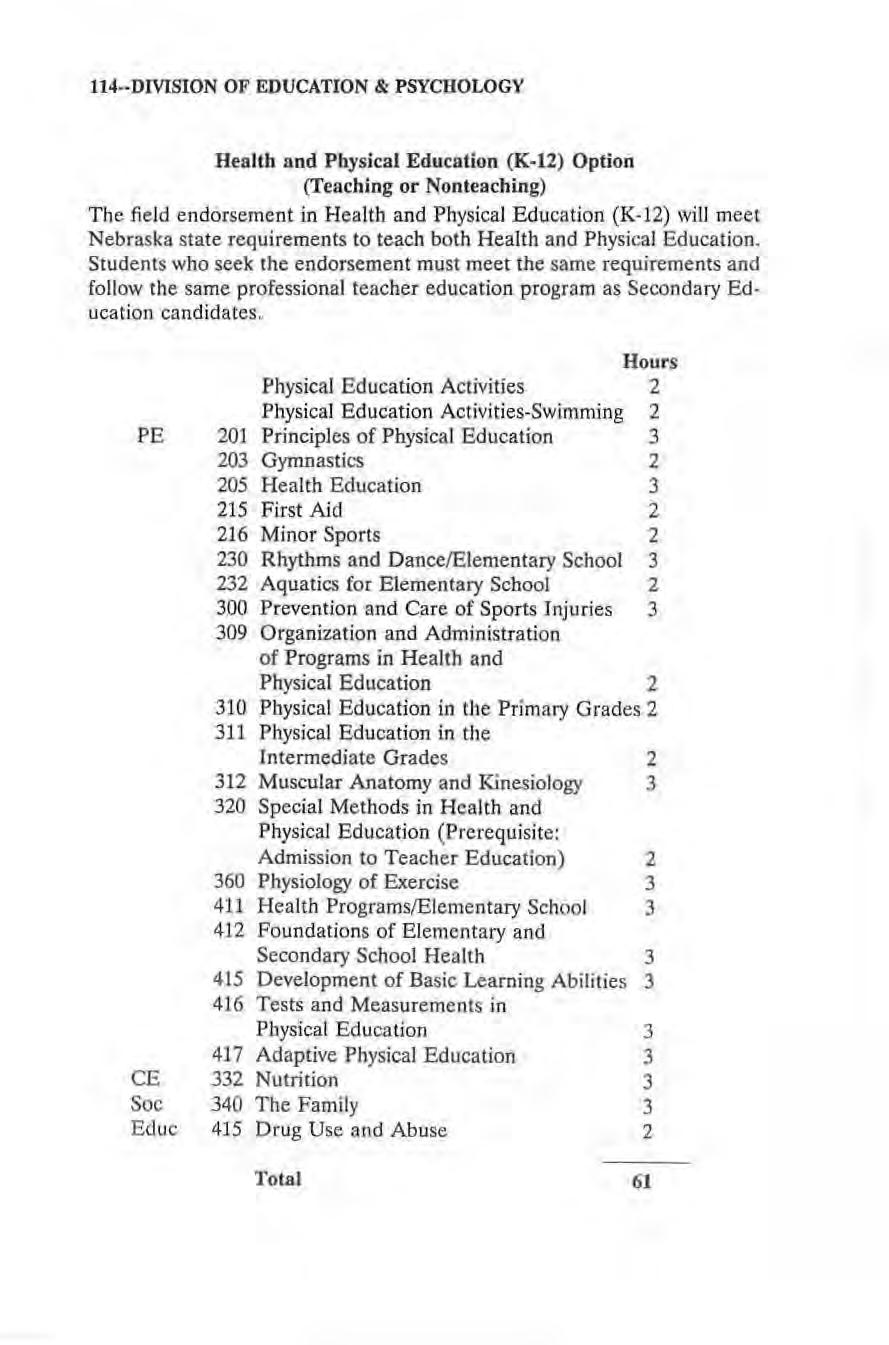
114--DMSION OF EDUCATION & PSYCHOLOGY
t eaching)
g or Non
P E CE Soc Educ Physical Ed ucation Activities Hours 2 Physical Education Activities-Swimming 201 Principl es o f Physical Education 2 3 203 Gymnastics 205 H ealth Education 215 First Aid 2 16 Minor Sports 230 Rhythms and D ance/Elementary School 232 Aquatics for E lementary School 300 Prevention and Care of Sports Injuries 309 Organization and Administratio n of Progra ms in Health and 2 3 2 2 3 2 3 Physical Education 2 310 Physical Education in the Primary Grades 2 311 Physical Education in the 1ntermediate Grades 312 Muscular Ana to my and Kinesiology 320 Specia l Methods in H ealth and Physical Education (Prer equisite: Admission to T eacher Education) 360 Physiology of Exercise 411 Health Programs/Elementary School 41 2 Fo undati o n s of E lementary an d 2 3 2 3 3 Secondary School Health 3 4 15 Development of Basic Learning Ab ilities 3 416 Tests and Measurements in Physical Ed u ca ti on 417 Adaptive Physical Education 332 Nutri ti on 340 The Family 415 Drug Use and Abuse Tota l 3 3 3 3 2 61
,
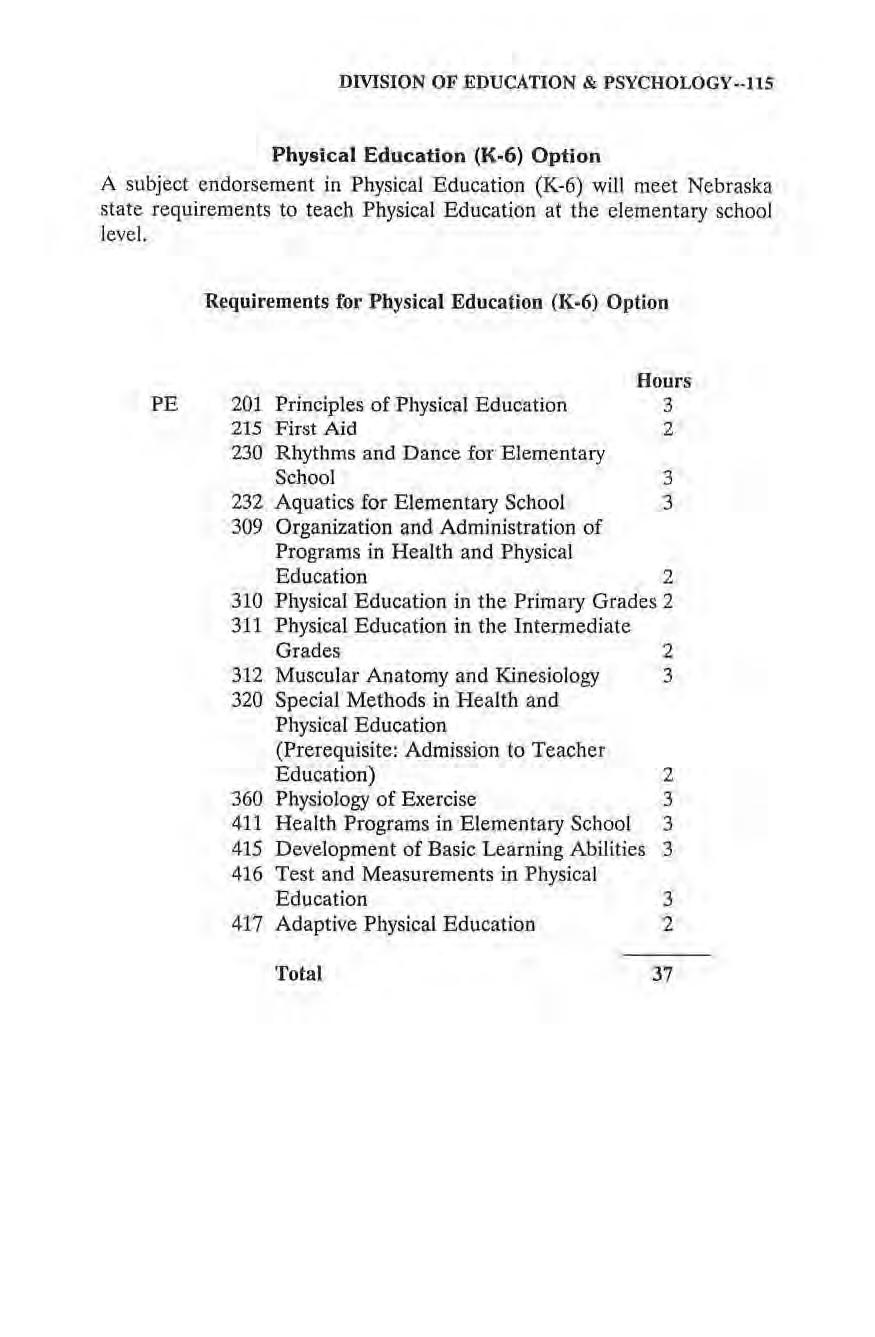
DMSION OF EDUCATION & PSYCHOLOGY --115 Physica l Education (K-6 ) Opt i o n A subject endorsement in Physical Education (K-6) will meet Nebraska state requirements to teach Physical Education at the elementary school leve l. PE Requirements for Physica l E ducation (K-6) Option 201 Principles of Physical Education 215 First Aid 230 Rhythms and Dance for Elementary School 232 Aquatics for Elemen tary School 309 Organization and Administration of Programs in Health and Physical Ho urs 3 2 3 3 Education 2 310 Physical Education in the Prima1y Grades 2 311 Physical Education in the Intermediate Grades 2 3 312 320 360 411 415 416 417 Muscular Anatomy and Kinesiology Special Methods in Health and Physical Education (Prerequisite: Admission to Teacher Education) 2 Physiology of Exercise 3 Health Programs in Elementary School 3 Development of Basic Learning Abilities 3 Test and Measurements in Physical Education Adaptive Physical Education Tota l 3 2 37
A s ubject endorsement in Physica l Education (7-12) will meet Nebraska state requiremen ts to teach Physical Education at the junior and senior high school levels.
The following program is provided for those stud ents interested in coach ing interscholastic sports. I t is designed to fit the n eeds of the hig h school coach and leads to an institutional recommendation for endorsement. S tu dents completing this program are required to have a major in Physical Educat io n.
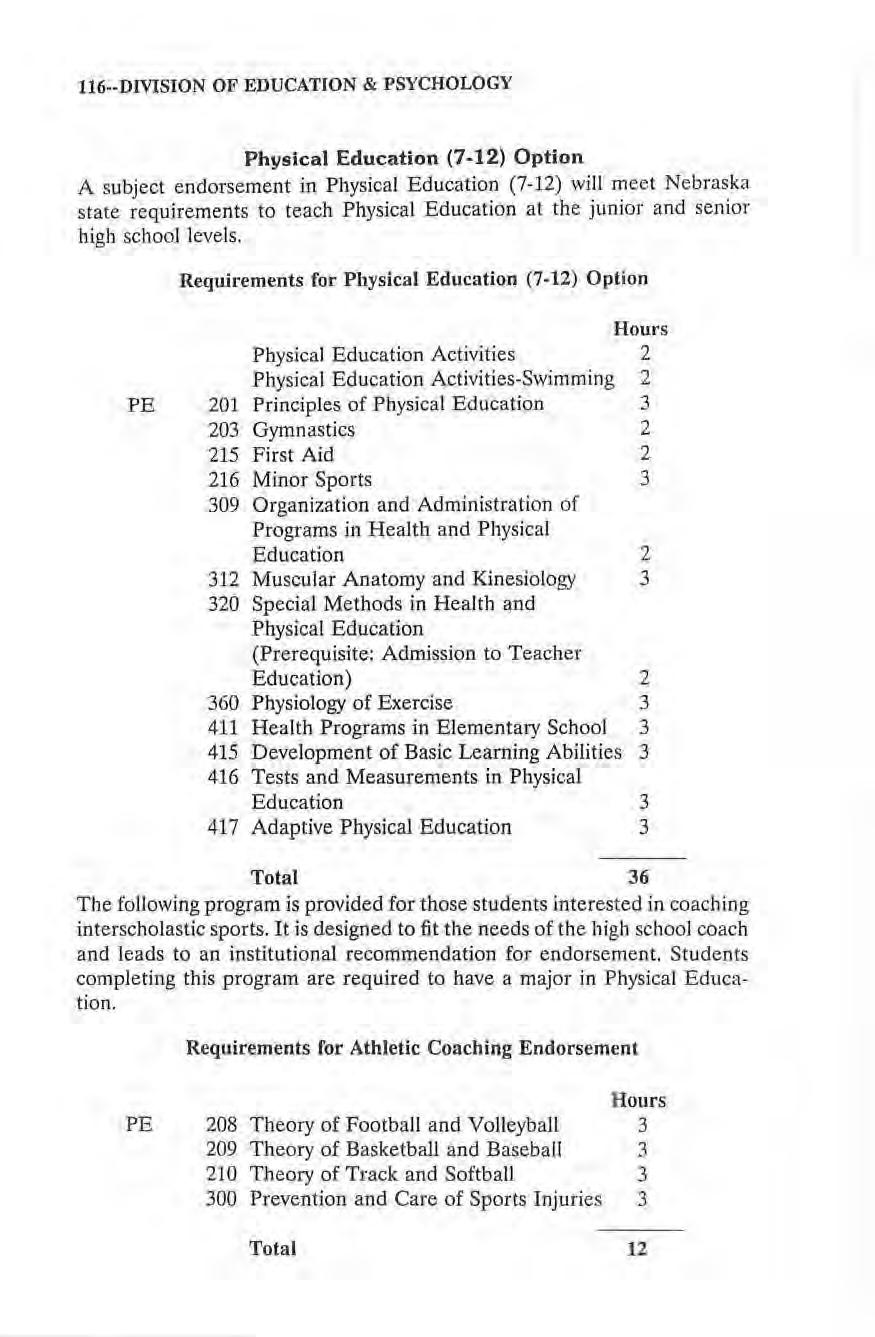
116--DMSION OF EDUCATION
& PSYCHOLOGY Physical Education (7-12) Option
PE Requirements for P hysical Ed u cation (7-12) Opt ion 201 203 215 216 309 312 320 360 411 415 416 417 Physical Education Activities Hours 2 Physical Education Activities-Swimming Principles of Physical Education Gymnastics First Aid Minor Sports Organization and Administration of Programs in Health a nd Physical Education Muscular Anatomy and Kinesiology Special Methods in Health &nd Physical Educati on ( Prereq~is ite: Admission to T eacher Education) 2 3 2 2 3 2 3 2 Physiology of Exercise 3 Health Programs in Elementary Schoof 3 Development of Basic Learning Ab ilities 3 Tests and Measurements in Physical Education 3 3 Adapt ive Phys ical Education Total 36
PE Requirements for Athle tic Coach ing Endorsement 208 Theory of Football and Volleyball 209 Theory of Basketball and Baseball 210 Theory of Track an d Softball 300 Preve ntion and Care of Sports Injuries Total Hours 3 3 3 3 12
A t hletic Coaching Endorsement for Non-Physical Education Majors
T he following program is provided for those students inte rested in coaching interscholastic sports and who do not have a major in Physical Education. It is designed to fit the needs of the high school coach and leads to an institutional recommendation for endorsemen t. Students completing t his program are requ ired to h ave a major in a n area other than Physical Education.
Sport Managem e nt Option
The Sport Management option provides t h e graduate with a combination of Physical Education and Business s tudi es which will prepare the person to enter occupations in a variety of public and private endeavors such as intercollegiate and professional sport settings, co rpo r ate or private fitness centers, park districts and the growing sport-related industries. Career opportunities include those as directors of activi ty centers, club managers, fitness facility managers, di rectors of public relations for sport teams or organizations, program directors, business managers, ticket sales managers, and directors of comm uni ty cent ers.
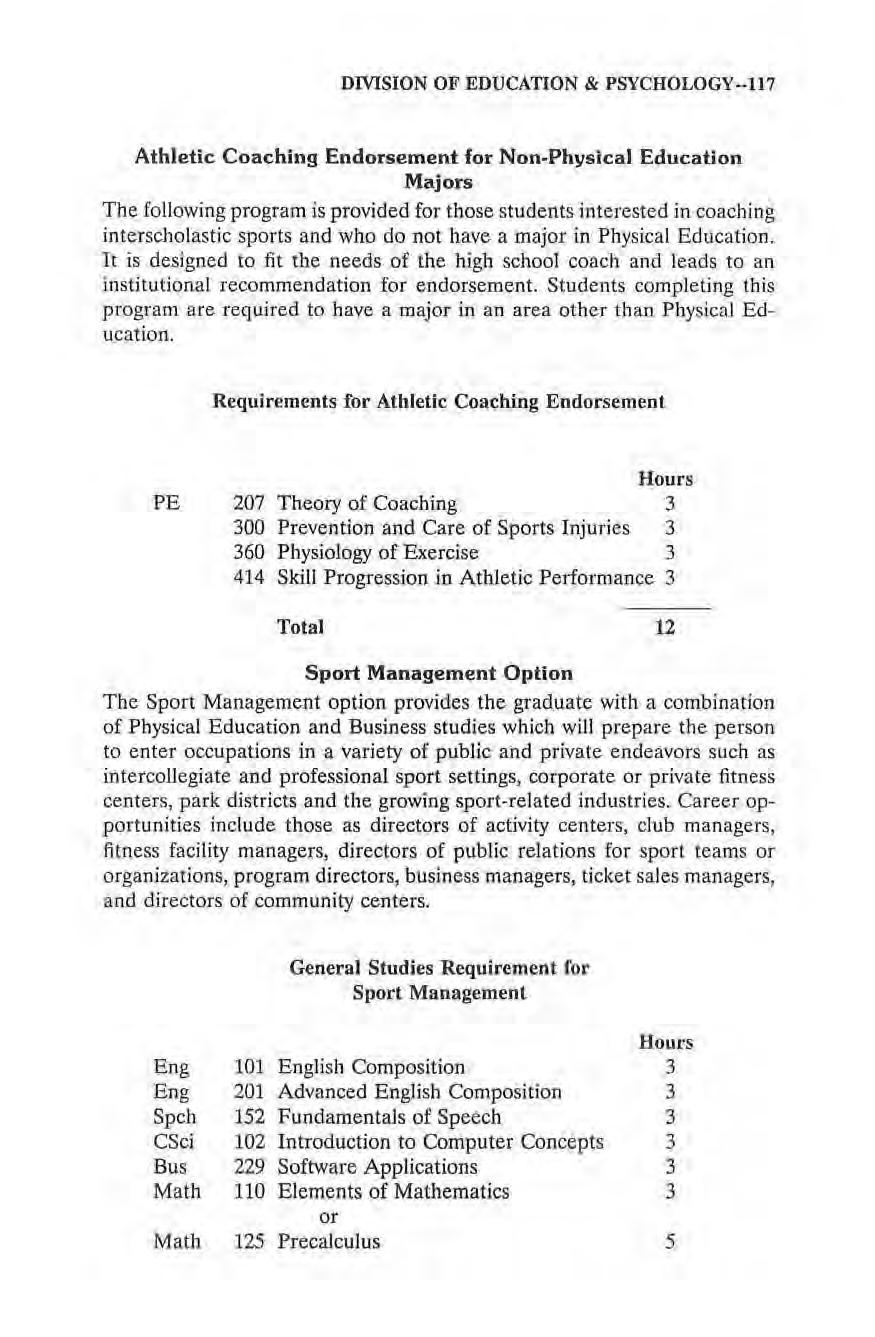
DIVISION OF EDUCATION & PSYCHOLOGY --117
for Athletic Coaching
Ho urs PE 207 Theory of Coaching 3 300 Prevention and Care of Sports Inj ur ies 3 360 Physiology of Exercise 3 414 Skill Progression in Athletic Performance 3 Total 12
Requirements
Endorsement
General Studies Requirement for Sport Management Hours Eng 101 Engl ish Composition 3 Eng 201 Advanced English Composition 3 Speh 152 Fundamentals of Speech 3 CSci 102 I ntroduction to Computer Concepts 3 Bus 229 Software Applications 3 Math 110 E lements of Mathematics 3 or Math 1'25 Precalcul us 5

118--DMSION OF EDUCATION & PSYCHOLOGY Math Math Chem Biol Psych PE Busjness Bus Econ 111 Elements of Statistics or 340 Statistics 101 General Chemistry 102 Introductory Zoology L iterature Aesthetics 255 Human Relations Non-Western Studies Western Studies American Studies 100 Wellness Physical Education Activities 231 Principles of Financial Accounting 232 Principles of Managerial Accounting 328 Principles of Marketing 339 Business Finance 351 Commercial Law 373 Organizational Behavior 380 Human Resources Management 221 Principles of Microeconomics 3 3 4 4 3 3 3 3 3 3 2 2 3 3 3 3 3 3 3 3 Physical Education PE 201 Principles of Physical Education 3 205 Health Education 3 215 First Aid 2 300 Prevention and Care of Sports 1njuries 3 309 Organization and Administration of Programs in Health and Physical Education 2 312 Muscular Anatomy and Kinesiology 3 417 Adaptive Physical Education 3 431 Legal Issues in Sport 3 432 Planning and Utilization of Facilities 2 Educ 441 Cooperative Education Internship 8 -12 Supporting courses Psych 250 Human Growth and Development 3 310 Psychology of Sports and Physical Activity 3 CE 332 Nutrition 3 SpEduc 200 Introduction to Special Education 3 Total 65-69
COURSE DESCRIPTIONS
Education
20 8 Orientation a nd Practicum (1 hour)
This course will provide a student considering education with an introduction to the Peru State College Teacher Education program and an opportunity to spend 30 clock hours in an elementary, junior high/middle, or secondary school to obsetve the inner-workings of classrooms from the point of view of a teacher. Regularly scheduled, on-campus serrunars will be held in conjunction with the school visits to discuss classroom experiences with other education students and facu lty and to meet other course requirements.
(Each semester)
241 Cooperative Education Internship (1-4 hours)
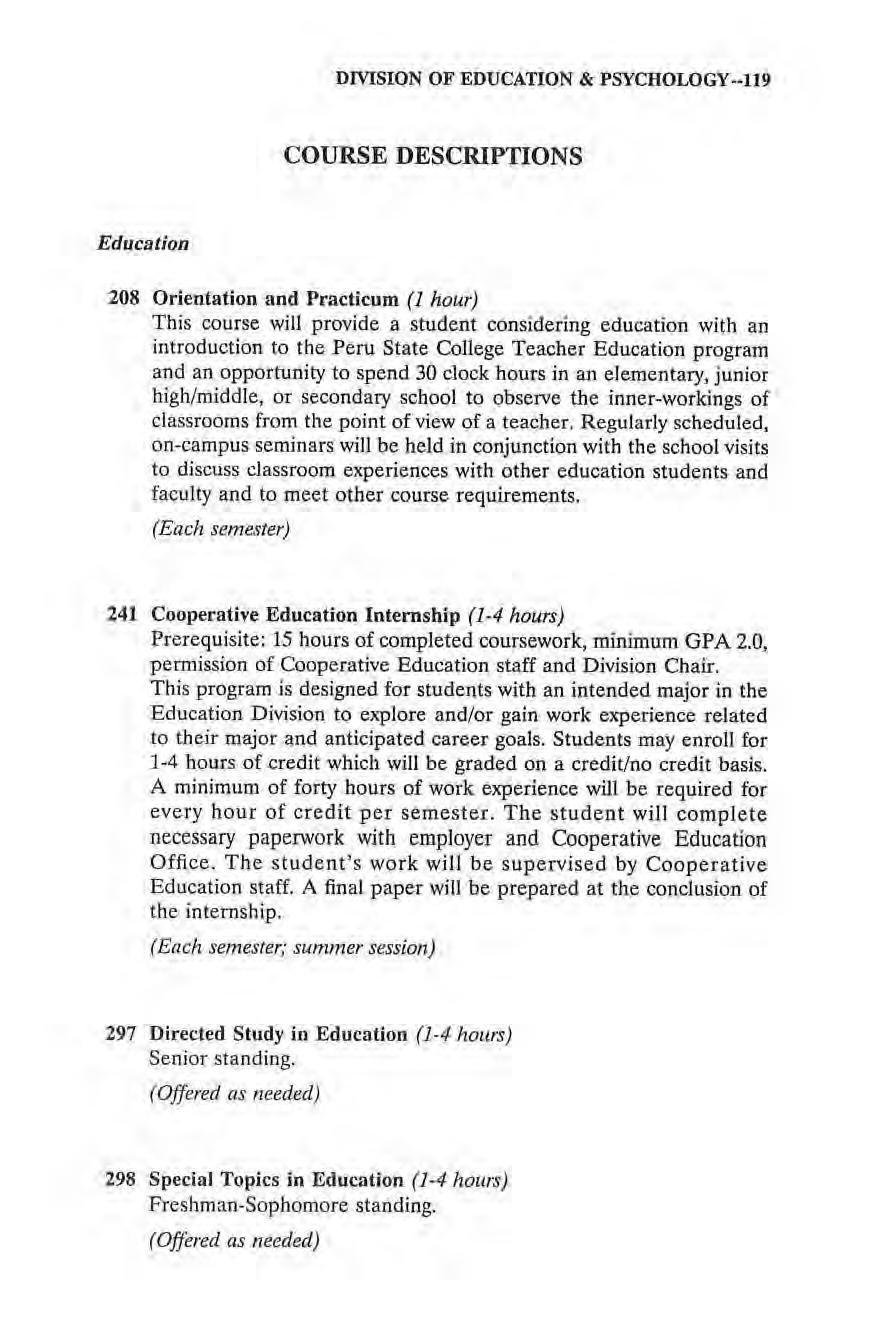
Prerequisite: 15 hours of completed coursework, minimum GPA 2.0, permission of Cooperative Education staff and Division Chair. This program is designed for students with an intended major in the Education Division to explore and/or gain work experience related to their major and anticipated career goals. Students may enroll for 1-4 hours of credit which will be graded on a credit/no credit basis. A minimum of forty hours of work experience will be required for every hour of credit per semester. The student will complete necessary paperwork with employer and Cooperative Education Office. The student's work will be supervised by Coope rati ve Education staff. A final paper will be prepared at the conclusion of the internship.
(Each semester; summer session)
297 Directed Study in Education {l-4 hours) Senior standing.
(Offered as needed)
298 Special Topics in Education (1-4 hours) Freshman-Sophomore standing.
(Offered as needed)
DMSION OF EDUCATION & PSYCHOLOGY ·-119
3 00 Classroom Management & Effecti ve Teaching in the Secon da ry School (2 hours)
Prerequisite: Admission to Teacher Education
This course is intended to provide prospective Secondary Educatio n students the opportunity to discuss the relationsh ips between classroom management and effective teaching, to research and discuss current theory , research and practice in classroom management and effective teaching, discuss and practice lesson and unit planning and curriculum design, and to discuss individual management styles an d plans for their own classroom.
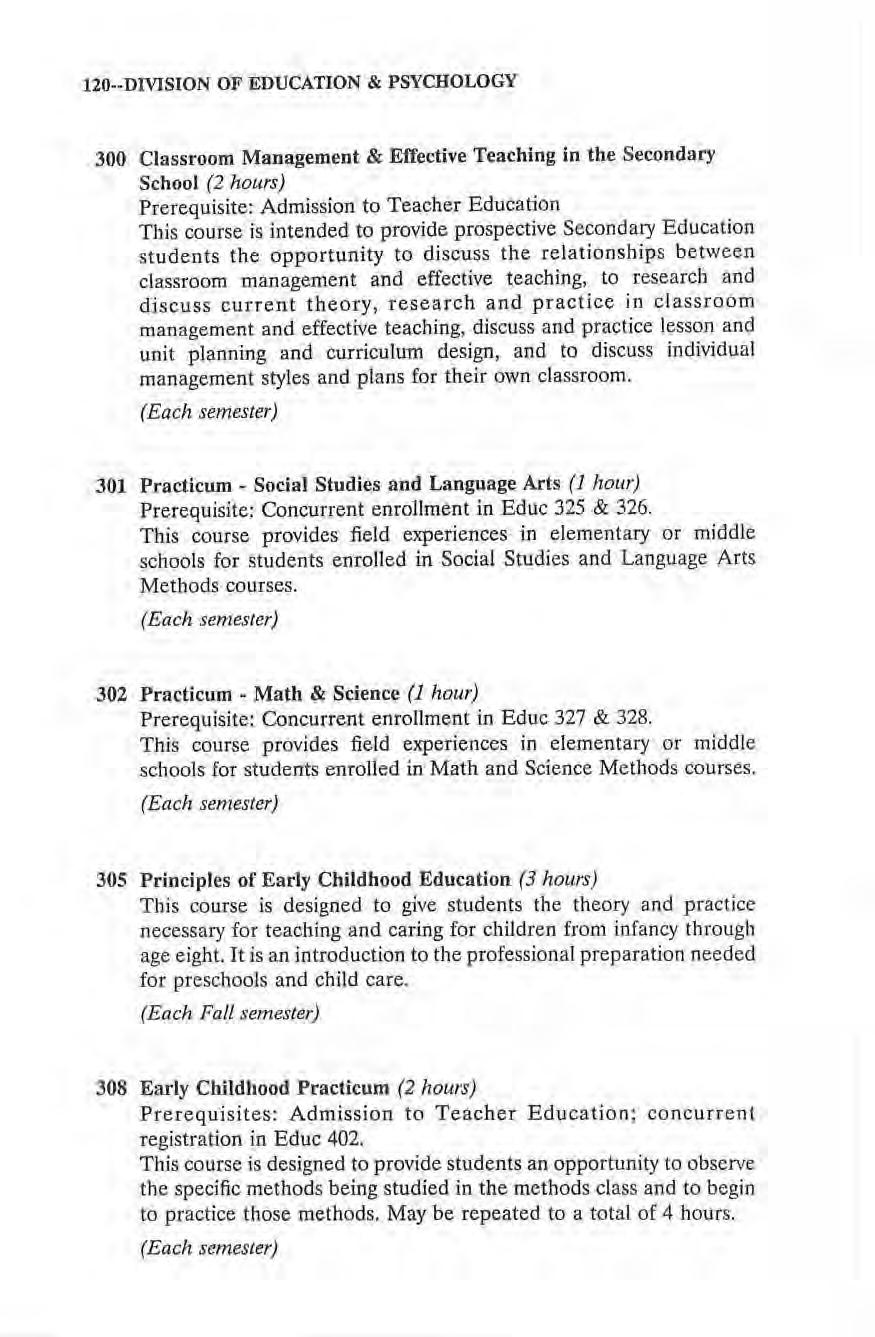
(Each semester)
301 Practicum - Social Studies and Language Arts (1 hour)
Prerequisite: Concurrent enro11ment in Educ 325 & 326. This course provides field experiences in elementary or middle schools for students enrolled in Social Studies and L anguage Arts Methods courses.
(Each semester)
302 Practicum - Math & Science (1 hour)
Prerequisite: Concurrent enrolJment in Educ 327 & 328. This course provides field experiences in elementary or middle schools for students enrolled in Math and Scie nce Me thods courses.
(Each semester)
305 Principles of Early Childhood Education (3 hours)
This course is designed to give students the theory and practice necessary for teach ing and caring for children from infancy throu gh age eight. It is an introduction to the professional preparation needed for preschools and child care
(Each Fall semester)
3 08 Early Childhood Practicum (2 hours)
Prerequisites: Admission to Teacher Education ; concurrent registration in Educ 402.
This course is designed to provide students an opportunity to observe the specific methods being studied in the methods class and to begin to practice those methods May be repeated to a tot a l of 4 hours
(Each semester)
120--DMSION OF EDUCATION & PSYCHOLOGY
3 09 Secondary Practicum (2 hours)
Prerequjsites: Take n in conjunction with each Secondary Special Methods; admission to Teacher Education and completion of Level l courses,
This course is designed to provide studen ts a n opportunity to observe the specific methods being studied in methods classes and to begin to practice those method s.
(Each semester)
317 Tests and Measurements (2 hours)
Prerequisites: Admission to Teacher Education and completion of Level I courses.
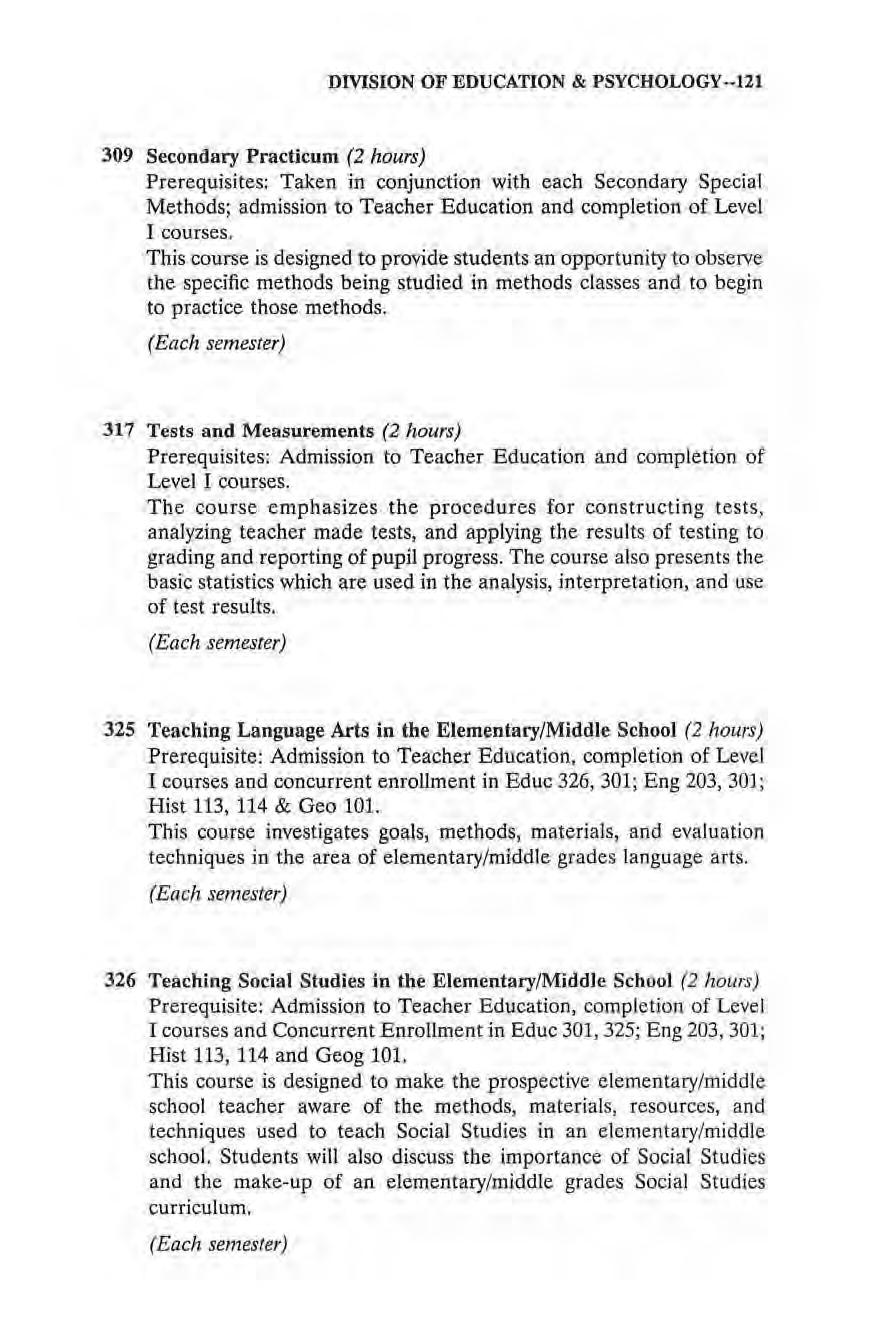
The course emp hasizes the procedures for constructing tests , analyzing teacher made tests, and applying the results of testing to grading and reporting of pupil progress. The course a lso presents the basic statistics which are used in the analysis, interpretation, and use of test resu lts.
(Each semester)
325 Teaching Language Arts in the Elementary/Middle School (2 hours)
Prerequisite: Admission to T eacher Education, completion of Level I courses and concurrent enrollment in Educ 326, 301; Eng 203, 301; Hist 113, 114 & Geo 101.
This course investiga tes goals, methods, materia ls, and evaluation techniques in the area of elementary/middle grades language arts.
(Each semester)
326 Teaching Social Studies in the E lement ary/Midd le Schoo l (2 hours)
Prerequisite: Adm ission t o Teacher Education, co mpl etion of Level I courses and Concurrent Enrollment in Educ 301, 325; Eng 203, 301; Hist 113 , 114 and Geog 101.
This course is designed to make the prospective e lementary/middle school teacher aware of the methods, materials, resources, and techniques used to teach Social Studies in an e lementary/middle school. Students will a lso discuss t he importance of Social Studies and the make-up of an elementary/middl e grades Social S tudies c urriculum .
(Each sem ester)
DMSION OF EDUCATION & PSYCHOLOGY- - 121
327 Teachin g Math in th e E le me ntary/M id d le Sch ool (2 hours)
Prerequ isites; Admission to T eacher Education, completion of Level I courses and concurrent enrollment in Ed uc 302, 328; General Studies Math and Science requirements.
This co u rse introduces and gives pract ice to students in the philosophical bas is, techniques, instructional methods, organization, and l earning ac t ivities of teaching elementary/midd l e grades mathematics.
(Each semester)
32 8 Teac hing S ci e nce in th e E lem entary/M iddl e Scho ol (2 hours)
Prerequisites: Admission to Teacher Education, completion of Level I courses and concurrent enrollment in Educ 302, 327; General Studies Math and Science requirements. The purposes of the co urse are to: (1) give direction to prospective teachers on how to orga nize and conduct meaningful science learning experiences in the element ary/m idd le school, (2) ,to provide simple and easy to u nderstand ou tl ines of science concepts a n d conceptual schemes for each area of science, and (3) to prese nt appropriate learni ng exper iences.
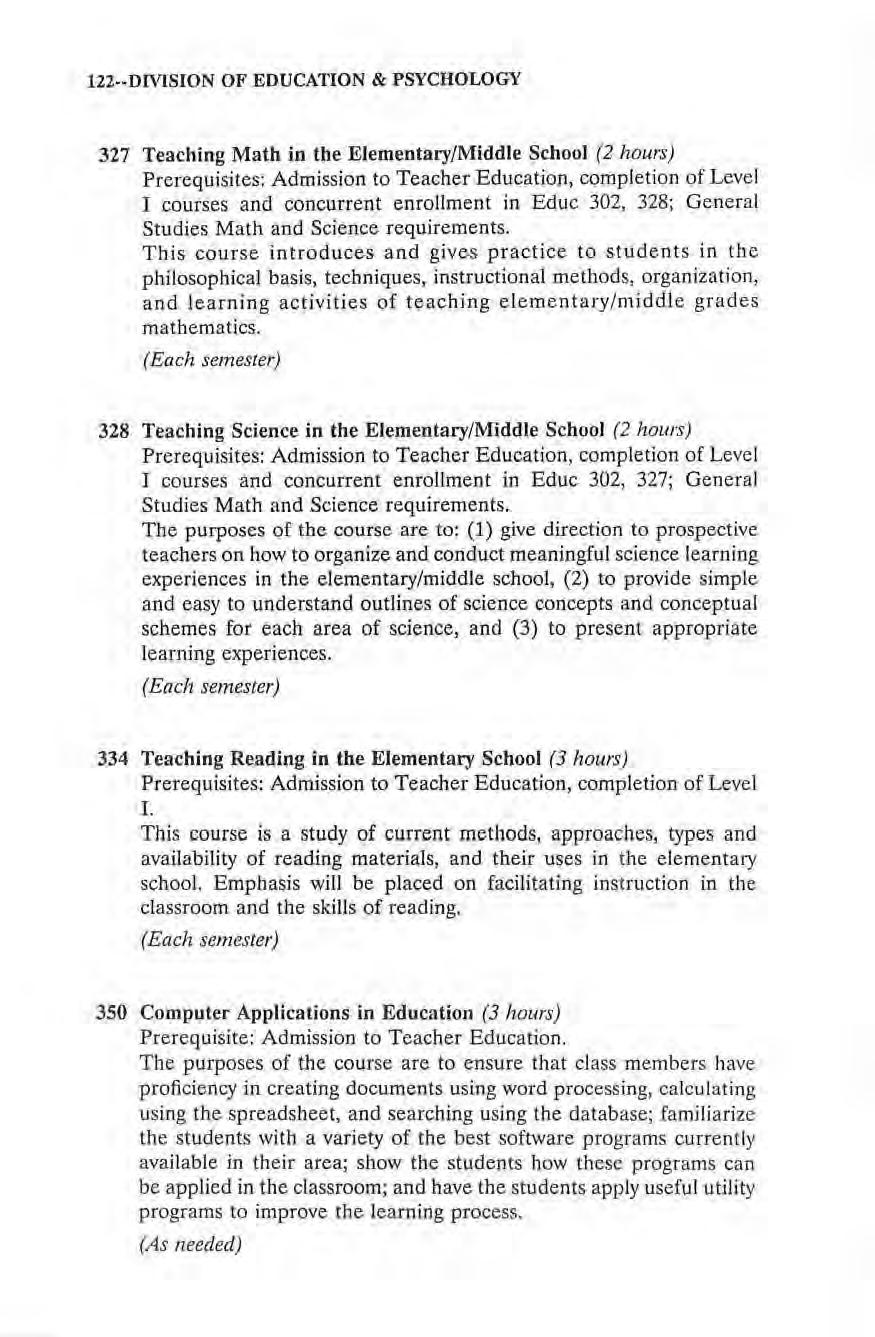
(Each semester)
334 Teaching Reading in the E lemen tary School (3 hours)
Prerequisites: Admission to T eacher Education, completion of Level I.
This course is a st udy of current methods, approaches, types and availabil ity of reading materials, and their uses i n the elementary school. Emphasis will be placed on faci li tating instruction in the classroom and the skills of reading.
(Each senzester)
350 Co mpu ter Appli catio n s in E du ca ti on (3 hours)
Prerequisite: Admission to T eacher Education. The purposes of the course are to ensure that class members have proficiency in creating documents using word processing, calculating using the spreadsheet, and searching using the database; familiarize the students with a variety of the best software programs currently available in their area; show the students bow thes e programs can be applied in the classroom; and have the students apply useful utility programs to improve the learning process.
(As needed)
122 -- D MSION OF E DUCATION & P SYC HOLOGY
375 Education of Gifted Learners (3 hour~)
This course examines the historic and currently used definitions of gifted and tale nted, ide ntifying characteristics, me a ns of identifying and c hoosing the gifted and talented individuals who have been ide ntified in the present and past , and techniques for teaching gifted and talented students in the regular classroom.
(Each Spring semester)
400 Philosop hical Fo und ations of Education (3 hours)
P rereq uisite: Taken immediately preceding Student Teaching; admission to T eacher Education.
Philosophical Foundations of Education is a capstone course designed to assist the prospective teacher entering student teaching and, ultimately, the teaching profession. So that an students can draw on previously learned information when discussing the various objectives of the course, all students will take this cou rse during the semester prior to student teaching.
(Each semester)
401 Language Dev elopment and Read ing Readin ess (2 hours)
Prerequisites: Admission to Teacher Education and Psych 250. This course is designed to provide the learner with a background in the development of language and communication as prerequisites to reading readiness. Skills leading to reading and methods facilitating those skills will be addressed in a developmental approach.
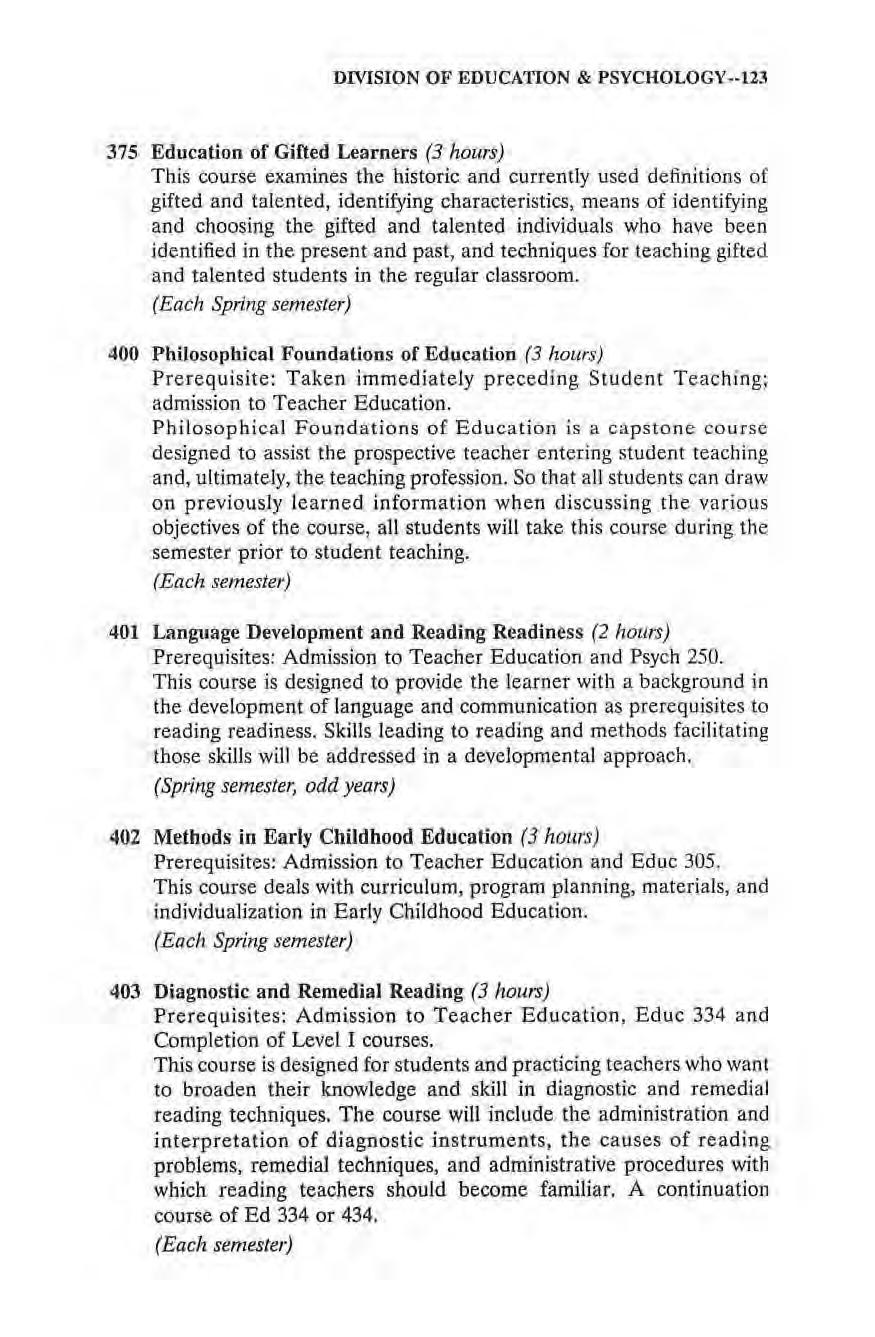
(Spring semester, odd years)
402 Methods in Early Childhood Education (3 hours)
Prerequisites: Admission to Teache r Education and Educ 305. This course deals with curriculum, program planning, materials, and individualization in Early Childhood Education.
(Each Spring semester)
4 03 Diagnostic and Remedial Reading (3 hours)
Prerequisites: Adm i ssion to T eacher Ed u cation, Ed uc 334 and Completion of Level I courses. This co1.1rse is designed for students and practicing teachers who want to broaden their knowledge and skill in diagnostic and r e medfaJ reading techniques. The course will incl ude the administration and interpretation of diagnostic instruments, the causes of reading problems, remedial techniques, and administrative procedures with which reading teache rs should become familiar. A continuation course of Ed 334 or 434.
(Each semester)
DIVISION OF EDUCATION & PSYCHOLOGY 123
405 Diagnostic and Remed ial Mathematics (2 hoiirs)
Prerequisites: SpEd 2001 Educ 327, admission to Teacher Ed ucation. This course is designed to provide a foundation in working with students who have special needs in the area of mathematics. Learning theory and general techniques for dealing with instruction of students with special mathematics needs will be emphasized.
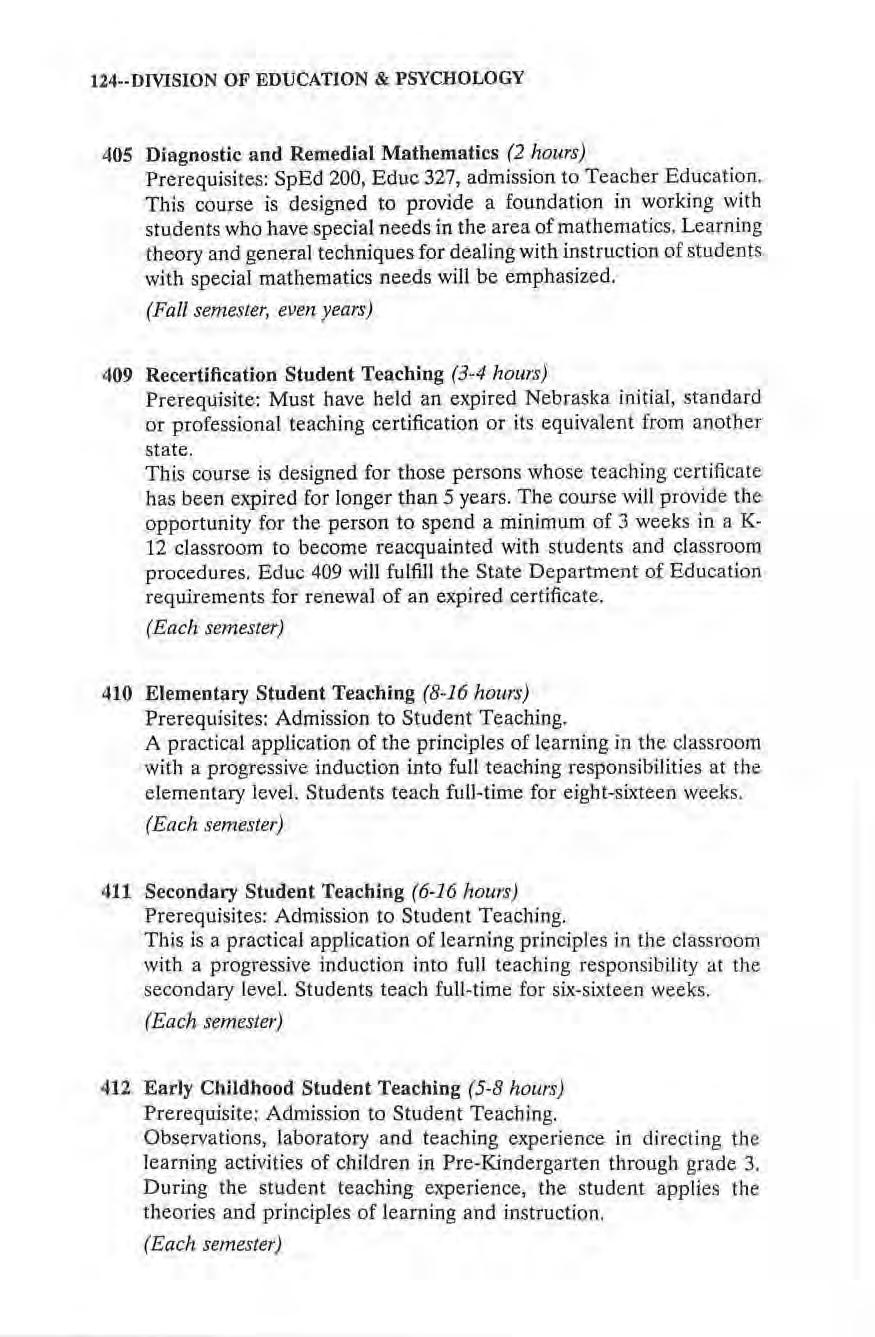
(Fall semester, even year~)
409 Recertificati o n S tude n t Teaching (3-4 hours)
Prerequislte: Must have held an expired Nebraska initial, standard or professional teaching certification or its equivalent from another state .
This course is designed for those persons whose teaching certificate has been ex'Pired for longer than 5 years. The course will provide the opportunity for the person to spend a minimwn of 3 weeks in a K12 classroom to become reacquainted with students and classroom procedures. Educ 409 will fulfill the State Department of Education requirements for renewal of an expired certificate.
(Each semester)
4 10 Elementary Studen t Teaching (8-16 hours)
Prer equisites: Admission to Student Teaching. A practical application of the principles of learning in the classroom with a progressive induction into full teaching responsibilities at th e elementary level. Students teach full-time for eight-sixteen weeks
(Each semeste,)
411 Seco ndary Stude n t Teac h ing (6-16 hours)
Prerequisites: Admission to Student Teaching. This is a practical application of learning principles in the classroom with a progressive induction into full teaching responsibility at th e secondary level. Students teach full-time for six-sixtee n weeks. (Each semester)
412 Early Chil d h ood Student Teac hin g (5-8 hours)
Prerequisite: Admission to Student Teaching. Observations, laboratory and teaching experience io directing th e learning activities of children in Pre-Kindergarten throug h grade 3. During the student teaching experience, the student applies the theories and principles of learning and instruction.
(Each semester)
124--DMSION OF EDUCATION & PSYCHOLOGY
413 Middle Gra des Student Teaching (6-16 hours)
Prerequisite: Admission to student teaching and completion of Levels I & II.
This is a practical application of learning principles in the classroom with a progressive tnduction into full teaching responsibility at the middle grades leve l. Students teach full time for s ix - sixteen weeks.
(Each semester)
415 Drug Use and Abuse (2 hours)
This course is a study of the different types of drugs that are prevalent in out American society. Emphasis will be placed on the origins of drug-taking behavior, the problems that drugs create i n our society, and the allure that drugs have in our culture today.
(Spring semester)
425 Teaching in th e Mid dle Grades (3 hours)
Prerequisite: Admission to teacher education; tak e n semester immediately preceding student teaching. This course is designed to provide students with a background in the curriculum, history, and phil osophy of the middle school. It will a lso investigate the organizational structure, team planning and coJlaboration techn iques, and teacher-student advising situations th at are unique to the middle grades.
(Eac h semester)
434 Secondary Readi ng and Writi ng across the Curriculum (3 hours)
Prerequisites: Admission to• Teacher Education and comple tion of L evel I courses.
The course will be a study of the current trends a nd practices in reading in the secondary schools. Emphasis will be placed on ways for teachers to improve reading skills for students as well as ways to use those skills to improve learning. The reading/writing r e lationsh ip will be explored and students will be introduced to the process method of writing instruction Ways to incorporate t his method of writing into content area classrooms will be presented as well as other composition methods that can be used in the content areas.
(Each semester)
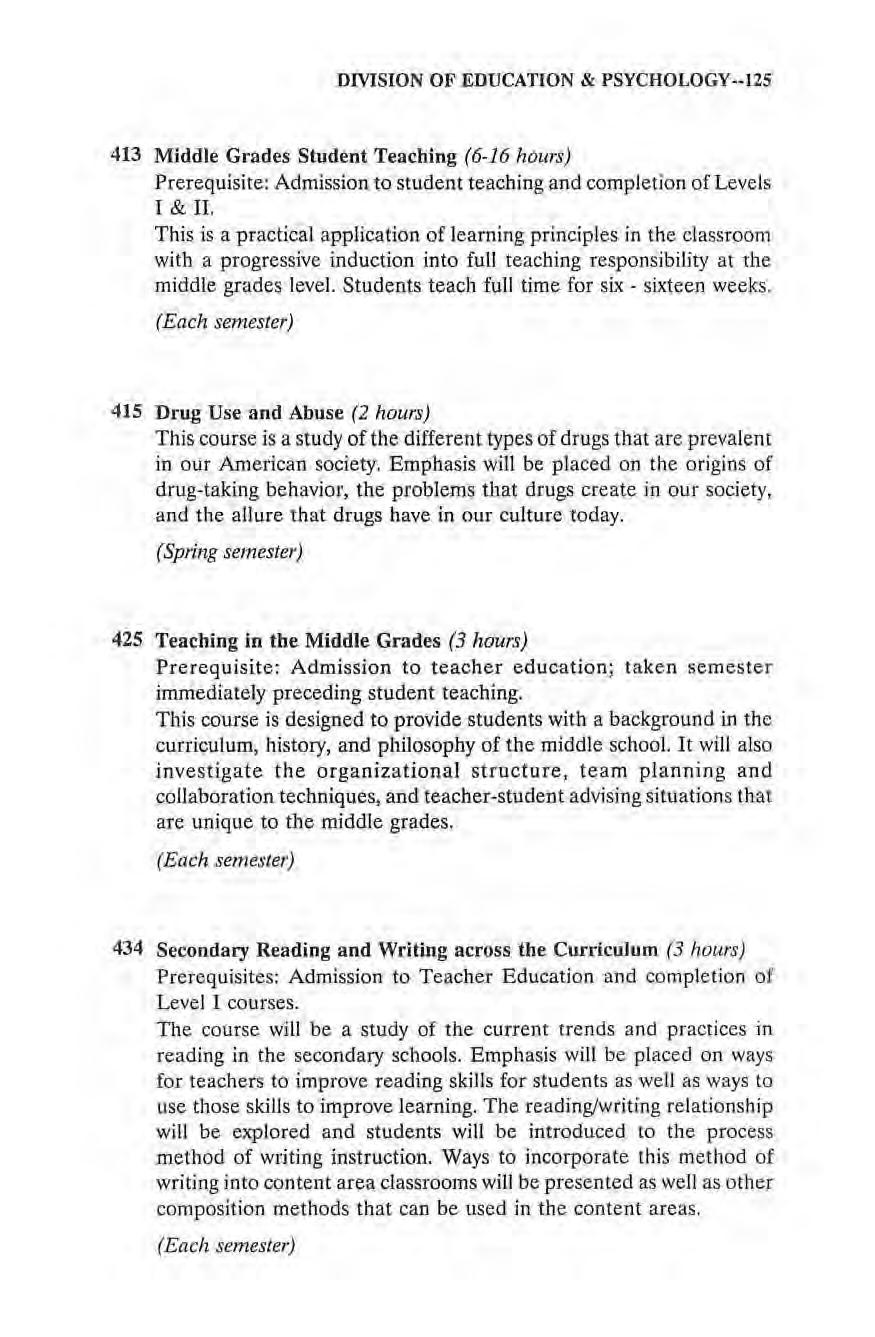
DMSION OF EDUCATION & PSYCHO LOGY- -125
441 Coo perative Edu ca ti on Internsh ip (1-12 hours)
Prerequisite: 45 hours of completed coursework, minimum GPA 2.00, permission of Cooperative Ed ucation staff and Division Chair. This program is designed for students with a major in the Educa tion Division to gain work experience related to their major and career goals. Students may enroll for 1-12 hours of graded credit. A minimum of forty hours of work experience will be required for every hour of credit per semester. The student will complete necessary paperwork with employer and Cooperative Education office. The student's work will be supervised by Cooperative Education staff. A final paper will be prepared at the conclusion of the internship. The sports management major requires an internship of 8-12 hours.
(Each semester, summer session)
497 D irected Study in Education (1-4 hours)
Senior standing.
(Offered as needed)
498 Special Topics in Ed ucation (J -4 hours)
Junior-Senior sta nding.
(Offered as needed)
499 Independen t Study in E du cation {1-3 hours)
Junior standing.
(Each semeste,)
Psychology
J 21 Introducti o n to Psychology (3 hours)

This course is a general introduction to contemporary psychology focusing on basic concepts, principles, terminology, trends in psychological research, and the application of this knowledge.
(Each semester)
205 Educatio n a l Psycbology (3 hours)
This course will focus on the psychological principles underlying learning and effective teaching, the effect of social and personality factors on the lea ming process, and the application of learning theory to teaching.
(Each semester)
126--DMSION OF E D UCATION & P SYCHOLOGY
.2 50 Human Growth a n d Development (3 hours)
This course will focus on the physical, cognitive, social and emotional aspects of growth from birth through old age. In addition, factors thought to influence this growth will also be examined.
(Each semester)
255 Human Relations (3 hours)
Students will study issues of sensitivity to biases, perpetuation of biases in the use of language, critical examination of text books and other printed material for biases; contributions to our culture which have accompani ed changes in demographic composition of the n at ion and leadership issues related to multi-cul tural i ssues and appreciation of diversity in values, customs and styles, and personal interaction.
(Each semester)
2 97 Directed Study in Psychology (1 - 4 hours)
Senior sta nding.
(Offered as needed)
298 Specia l Topics in Psychology (1-4 hours)
Freshman-Sophomore standing.
(Offered as needed)
304 Experimental Psycho logy (3 hours)
Prerequjsites : Psych 121 and Math 340. The course is designed to assist students in the comprehension and use of experime nt a l methods, basic statistica l analys i s, and experimental literature. Research exercises are provide d to illustrate course content.
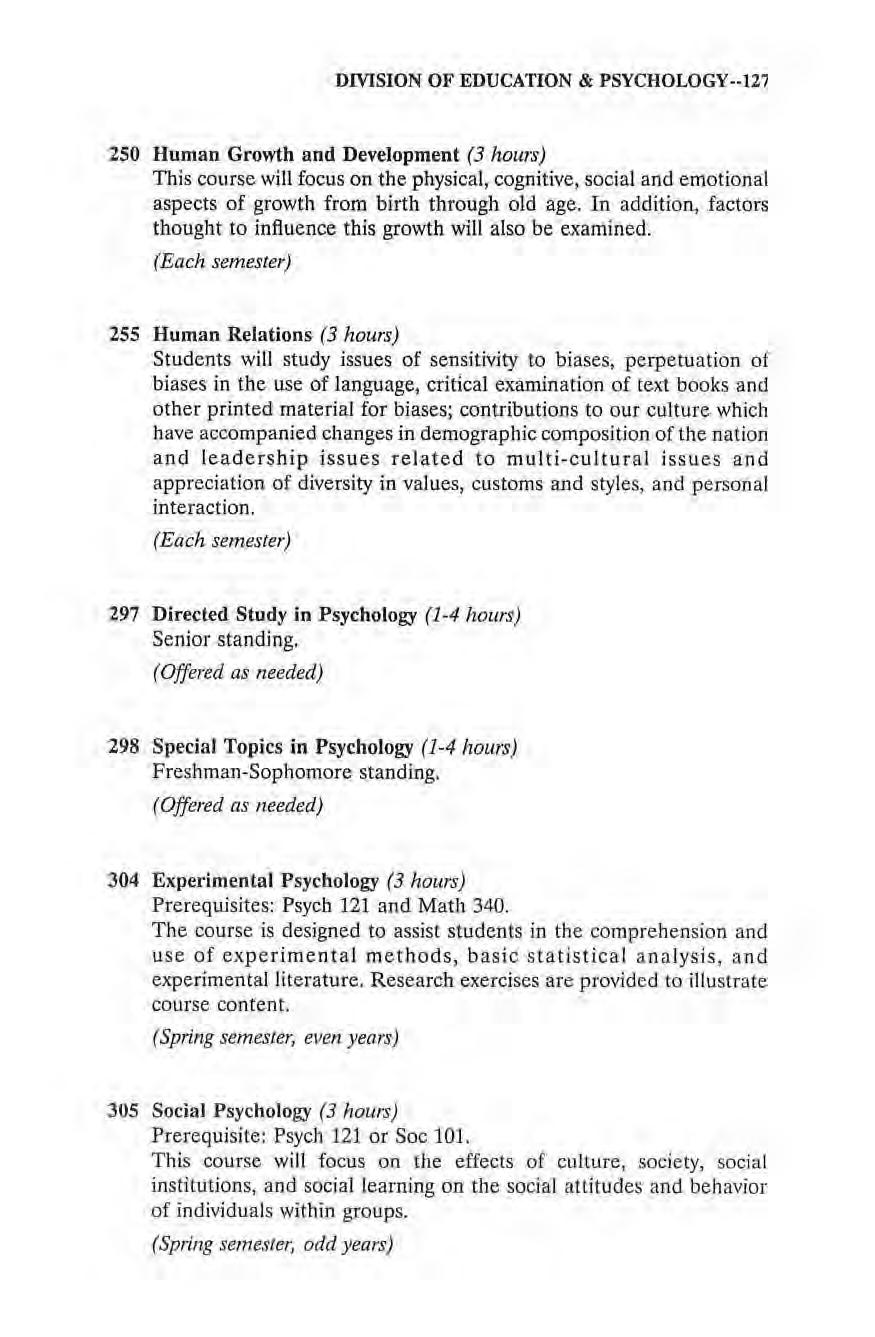
(Spring semester, even years)
305 Social Psychology (3 hours)
Prerequisite: Psych 121 or Soc 101. This course will focus on t he effects of culture, society, social institutions, and social learning on the social attitudes and behavior of jndividuals within groups.
(Spring semester, odd years)
DMSION OF EDUCATION & PSYCHO LOGY 127
310 Psychology of Sports and Physical Activities (3 hours)
Prerequisite: Psych 121.
This course examines the place of psychology in physical educat,ion and sports. 1t includes personality, attention and arousal, anxiety and intervention, theories of motivation, and social psychology of sports aggression, audience effects, team cohesion, and leaders hip in sports.
(Fall semester, even years)
32 0 Psychology of Learning (3 hours)

Prerequisite: Psych 121.
This course will provide students with a broad, eclectic coverage of the field of learning and memory by addressing the wide range of issues and problems within the field from stimulus-response to cognitive psychology.
(Spring semester, odd years)
345 Psychology of Personality (3 hours)
This course will focus on the process of personality growth and adjustment. Through an examination of selected theoretical systems, different interpretations of this process will be presented.
(Fall semester, odd years)
431 Psychological Tests and Measurements (3 h ours)
Prerequisites: Psych 121 and Math 340 or permission of the instructor.
The course wi!I focus on the issues and problems su rroundin g psychological testing. Topics to be discussed include reliability, validity, construction, admirustration, norms, and interpretation as well as a survey of curre nt psychological tests.
(Fall semester, odd years)
437 Techniques of Counseling (3 lzours)
Prerequisite: Psych 121.
The content, process, and practice of various counseling techniques will be examined for their applicability to education, psychology and social work. Practical experience in the use of these techniques will also be provided.
(Spring semester, even years)
128-·DIVISION OF EDUCATION & PSYCHOWGY
438 Approaches to Parent and Family Counseling (3 hours)
Prerequisite: SpEd 200.
Trus course is designed for persons who are preparing to work with parents in family counseling. The changing nature and definition of "family" as it relates to today's society will be introduced . The ethics, settings, referral process, basic counseling strategies and approaches will be addressed.
(Spting semester, odd years)
440 Behavior Management and Modification (3 hours)
The course will focus on the basic principles of behavio r modification as well as survey some of the practical applications of this general approach to behavior change.
(Each fall semester)
450 Abnormal Psychology (3 hours)
Prerequisites: Psych 121, 250 and junior standing. Focusing o n personality disorders, schizophrenia and manic depressives, this course would deal extensively with DSM-III-R categories of abnormal psychology.
(Spring semester, odd years)
460 Psychology of Correctional and At-Risk Youth Education and Therapy (3 hours)
Prerequisite: Jr. standing or corrections employment and instructor permission. This course applies cultural influences on behavior, multicultural considerations and techniques, and educational and therapy skills appropriate for the At Risk Youth in education, and undereducated adults in the correctional population. It incorporates learning styles, domestic violence education and prevention, cooperative learning, conflict management, social skills literacy, and leadership skills development in active learning and interest based reading.
(Each semester)
465 Corrections Practicum (3 hours)
Prerequisites: Psych 460, Math 111 or 340. This is a companion course to Psych 460, " Psychology of Correctional and At-Risk Youth Education and Therapy. " The practicum will supervise students tutoring and mentoring offenders. Students will develop library and referencing skills along with choosing a topic, formulating a research question, note tak,ing, paraphrasing, and summarizing. Other areas to be covered include interpretation of data, presentation of materials, and plagiarism.
(Each semester)
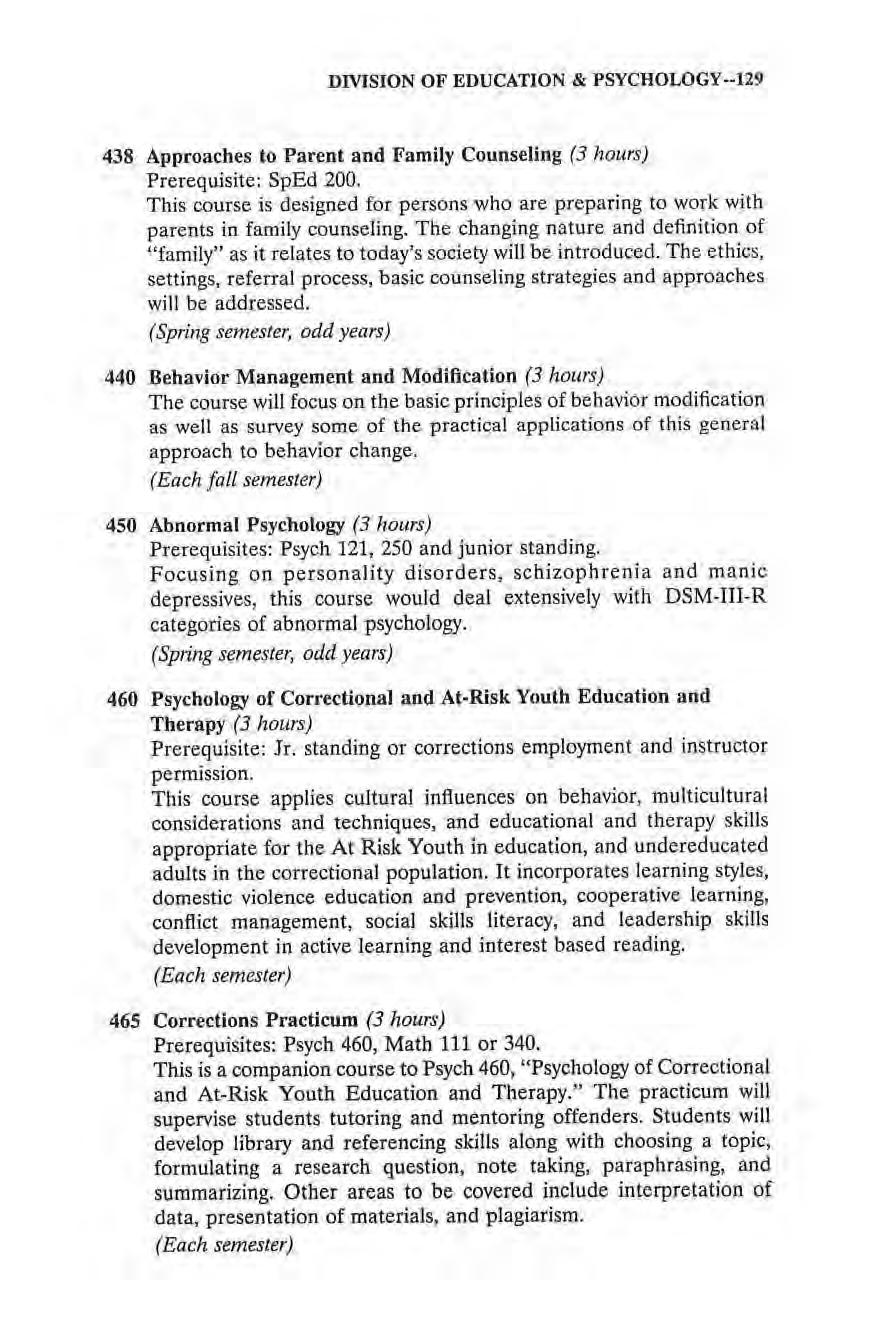
DIVISION OF EDUCATION & PSYCHOLQGY--129
497 Directed Stu dy in Psychology (1-4 hours)
Senior standing
(Offered as n eeded)
498 Special Topics in Psycho logy (1-4 hours)
Junior-Senior stal")ding.
(Offered as needed)
499 Indepen den t Study in Psychology (1-3 hours)
Junior standing.
(Each semester)
Spedal Education
2 00 Introduction to Special Educat ion (3 hours)
This course is de signed to provide a historical, political and sociological survey of the areas of exceptionality in the field of special education. The course will identify significant changes which have occurred in the education of exceptional populations a nd provide an introductory experience concerning the various disability gro upings.
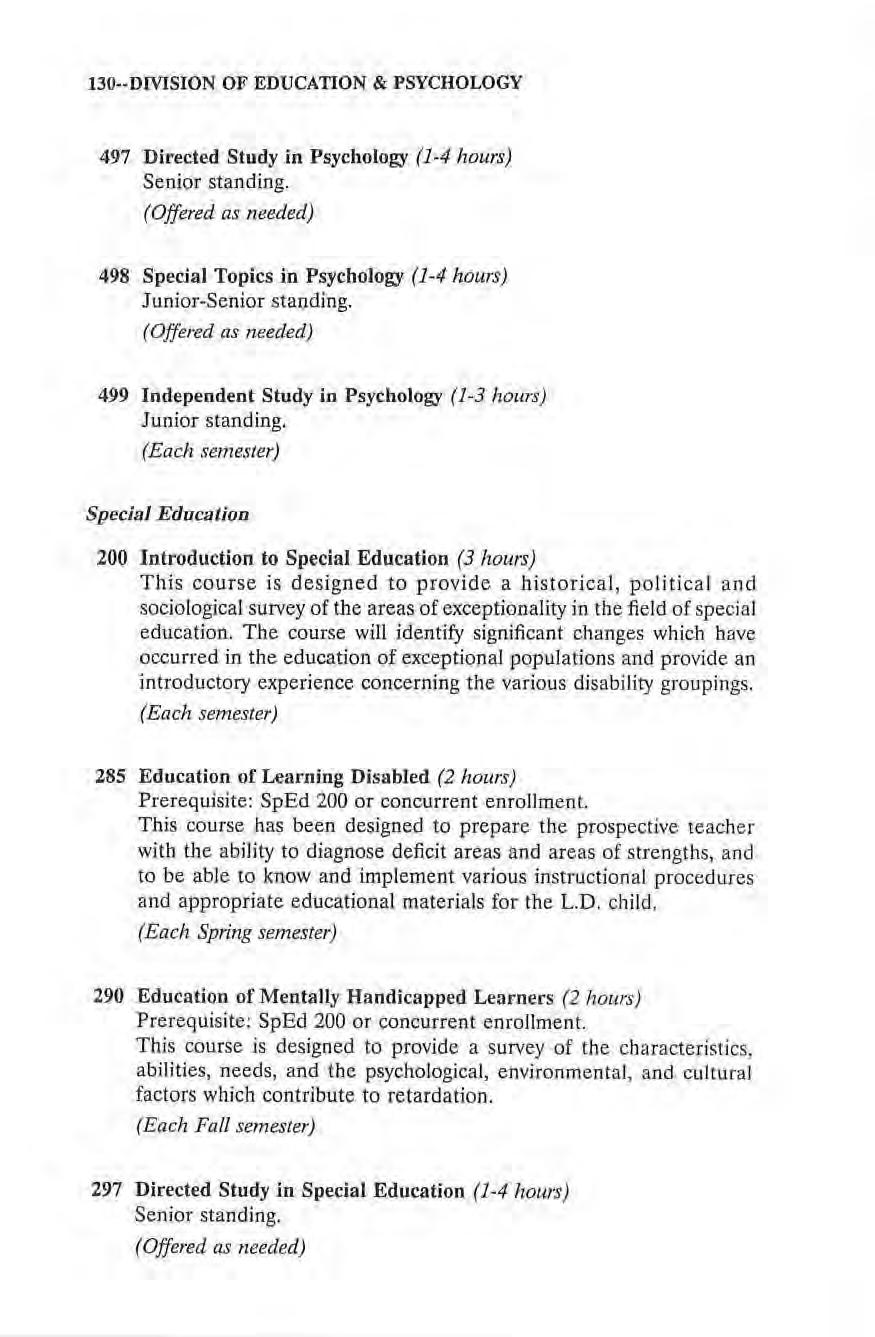
(Each semester)
285 Education of Learning Disabled (2 hours)
Prerequisite: SpEd 200 or concurrent enrollment. This course has been designed to prepare the prospective tea c her with th e ab ility to diagnose deficit areas and areas of s trengths, and to be able to know and implement various instructional procedures and appropriate educational materials for the L.D. child.
(Each Spring semester)
290 Education of Menta lly Handicapped Learners (2 hours)
Prerequisite: SpEd 200 or concurrent enrollment. This course is designed to provide a survey of the characteri st ics, abilities, needs, and tbe psychological, environmental, and cultural factors which contribute to retardation.
(Each Fall semester)
297 Directed Study in Specia l Educatio n (1-4 hours)
Senior standing.
(Offered as needed)
130--DMSION OF
&
EDUCATION
PSYCHOLOGY
3 00 As se ss me n t in Special Educat ion (3 hours)
Prerequisites: SpEd 200, SpEd 285, S pEd 290 o r concurre nt enrollment, admission to Teacher Education. T ests commonly used for children with suspected handicaps are interpreted.
(Each Falt semester)
307 Special Educatio n Practicum (2 hours)
Prerequisites: Concurrent enroJJment in SpEd 430, admission to Teacher Education.

The purpose of the co urse is to provide a classroom experience th at will go beyond the observations provided in Education 208.
(Each semester)
309 Presch oo l Handicapped Practic um (2 hours)
Pre r equisite: Admission to Teacher Education and SpEd 200; Educ 305.
This course is designed to provide students with an opportunity to observe the specific methods in Preschool through Kinderga rten being stud ied in handicapped meth ods classes and to begin to practice those methods.
(Each semester)
405 Specia l Educa ti on Early Ch ildhood Cha racterist ics and M ethod s (3 hours)
Prerequisites: SpEd 200 and admission to T eacher Education.
Th is course is designed t o e n ab l e t h e student to master the knowledge of the purposes, u niqu e features, service delivery and issues in the field of Early Childhood Specia l Education. Basic information a b out the foundations of Early C h ildhood Spec ia l Education programs and sources of current research abou t t his rapidly growing field will be stu di ed. Current best practice instructional methods will be a major focus of this course.
(Spring semester, even years)
42 1 Preschool Han dicapped Stude nt Teaching (8 hours)
Prerequisite: Admission to Student T eachi ng. Observation, laboratory and practical application of learning principles in Preschool through Kindergarten settings. The stude nt teaches fu ll-time while enrolled in this course.
(Each semester)
DMSION OF E D UCATION & PSYCHOLOGY- -13 1
430 Methods in Special Education Program Management (3 hours)
Prerequisites: SpEd 200, 285, 290, and Educ 375 or SpEd 200 and Educ 405, admission to Teacher Education. This course is designed to develop appropriate materials in the major area of academic study. Emphasis is on developing knowledge, skills, and techniques for successful teaching in special education.
(Each Fall semester)
435 Special Education Student Teaching (8 hours)
Prerequisite; Admiss ion to Student Teaching. Observation, laboratory and teaching experience in the special education classroom. The student assumes full teaching responsibility.
(Each semester)
460 Career and Vocational Education for the Handicapped (2 hours)
Prerequisites: SpEd 200, adm ission to Teacher Education. The curriculum is designed to provide background information in vocational/career education for the mild/moderately handicapped. Vocational services, vocational evaluation, vocational counseling, work-study programs, job placement and follow-up, lesson plans and current models and materials used are included in th e curriculum.

(Each Spring semeste,j
465 Education of Emotionally Impaired Learners (2 hours)
Prerequisites: SpEd 200, Psych 440, admission to Teacher Education. This course is designed to investigate the etiology, classification, and treatment for children and adolescents with emotional, social and behavioral impairments. It examines the historical and philosophical contexts , major theoretical perspectives, and instructional alternatives. Current best practice and research related to the topic will be explored.
(Eac h Spring semester)
497 Directed Study in Special Education (1-4 hours) Senior standing.
(Offered as needed)
498 Special Topics in Special Education (1-4 hours)
Junior-Senior standing.
(Offered as needed)
132--DIVISION OF EDUCATION & PSYCHOLOGY
499 Independent Study in Special Educat ion (1-3 hours)
Junior standing.
(Each semester)
Physical Education
Physica l Education activities courses (PE 101-131) require two hours of attendance. Each student will be required to enroll in PE 100 Wellness. It will be followed by two activity courses, of which one will be developmental.
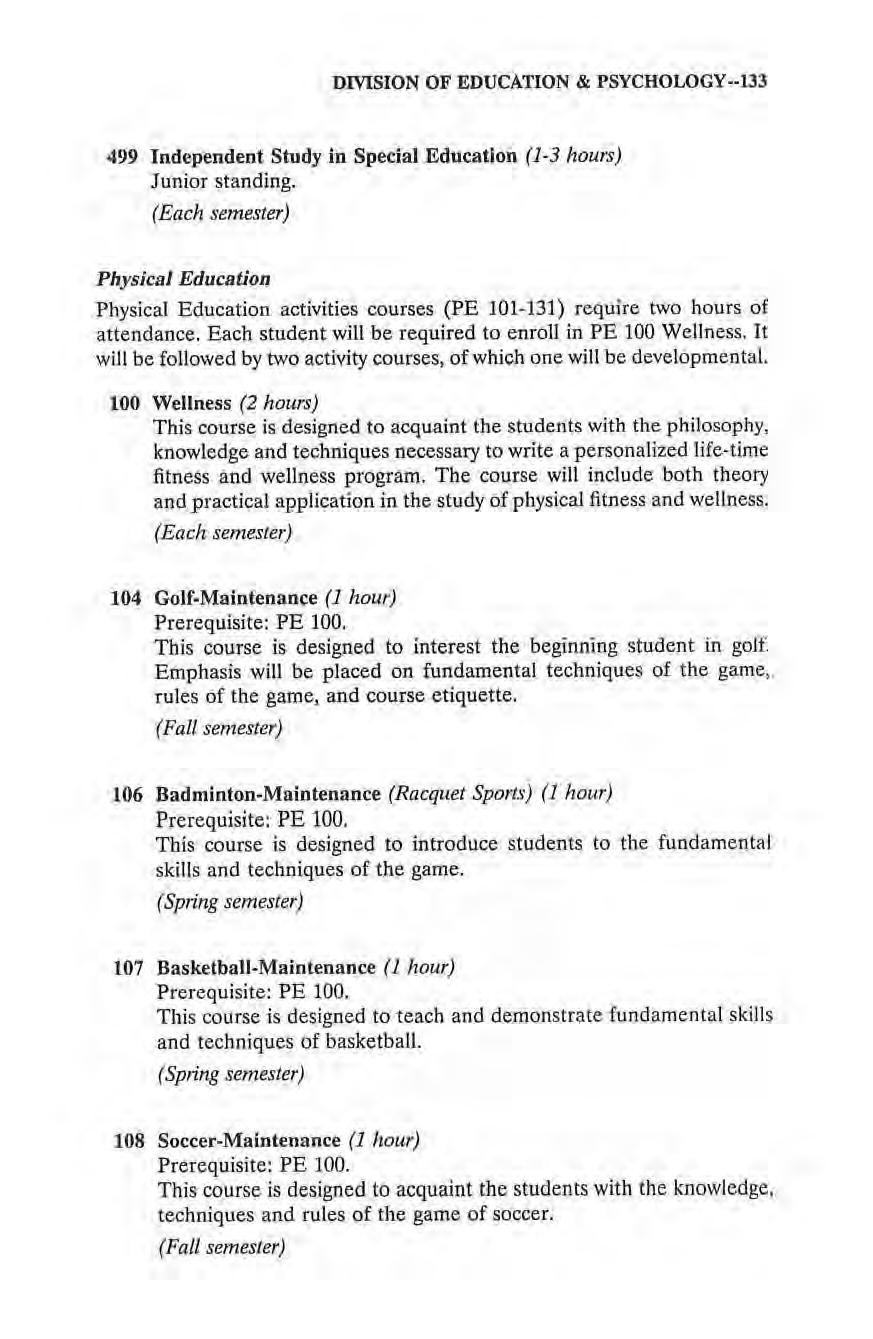
100 Wellness (2 hours)
This course is designed to acquaint the students with the philosophy, knowledge and techniques necessary to write a personalized life-time fitness and wellness program. The course will include both theory and practical application in the study of physical fitness and wellness
(Each semeste,)
104 Golf-Maintenance (1 hour)
Prerequisite: PE 100.
This course is designed to interest the beginning student in golf. Emphasis will be placed on fundamental techniques of t he game, rules of the game, and course etiquette.
(Fall semester)
106 Badminton-Maintenance (Racquet Sports) (1 hour)
Prerequisite: PE 100.
This course is designed to introduce students to the fundam en tal skills and techniques of the game.
(Spring semestet)
107 Basketball-Maintenance (1 hour)
Prerequisite: PE 100.
This coorse is designed to teach and demonstrate fundamental skills and techniques of basketball.
(Spring semester)
108 Soccer-Maintenance (1 ho ur)
Prerequisite: PE 100.
This course is designed to acquaint the students with the knowledge, techniques and rules of the game of s occer.
(Fall semesJer)
DMSION OF EDUCATION & PSYCHOLOGY--133
OF EDUCATION & PSYCHOLOGY
110 Tenn is-Maintenance (1 hour)
Prerequisite: PE 100.
This course is designed to interest the beginning tennis player. Emphasis will be placed on basic fundamental s kills of the game, rules of the game and court etiquette.
(Each semester)
111 Intermediate Tennis-Maintenance (I hour)
Prerequisite: PE 100.
This course is designed to allow students to become more proficient in the game of tennis. Emphasis will be placed on advanced fundamental techniques, strategy, and skill analysis.
(Each semester)
112 Beginning Swimmi ng, Advanced Beginning Swimm ing and Basic Water Safecy•Developmental (1 hour)
Prerequisite: PE 100.
This course is designed to introduce the student to the basic fundamentals of swimming. Emphasis will be placed on basic strokes, advanced beginning strokes, rhythmic breathing, endurance, stroke modification and basic water s afety.
(Fall semester)
113 Intermediate Swimming and Basic Rescue - Developmenta l (J hour)
Prerequisite: PE 100.
This course is designed to help students become more proficient at swimming techniques and rescue skills. Emphasis will be on endurance, versatility of swimming skills and aquatic emergencies. (Spring semester)
114 Advanced Swimming and L ifeg uard Training-Developmental (1 hour)
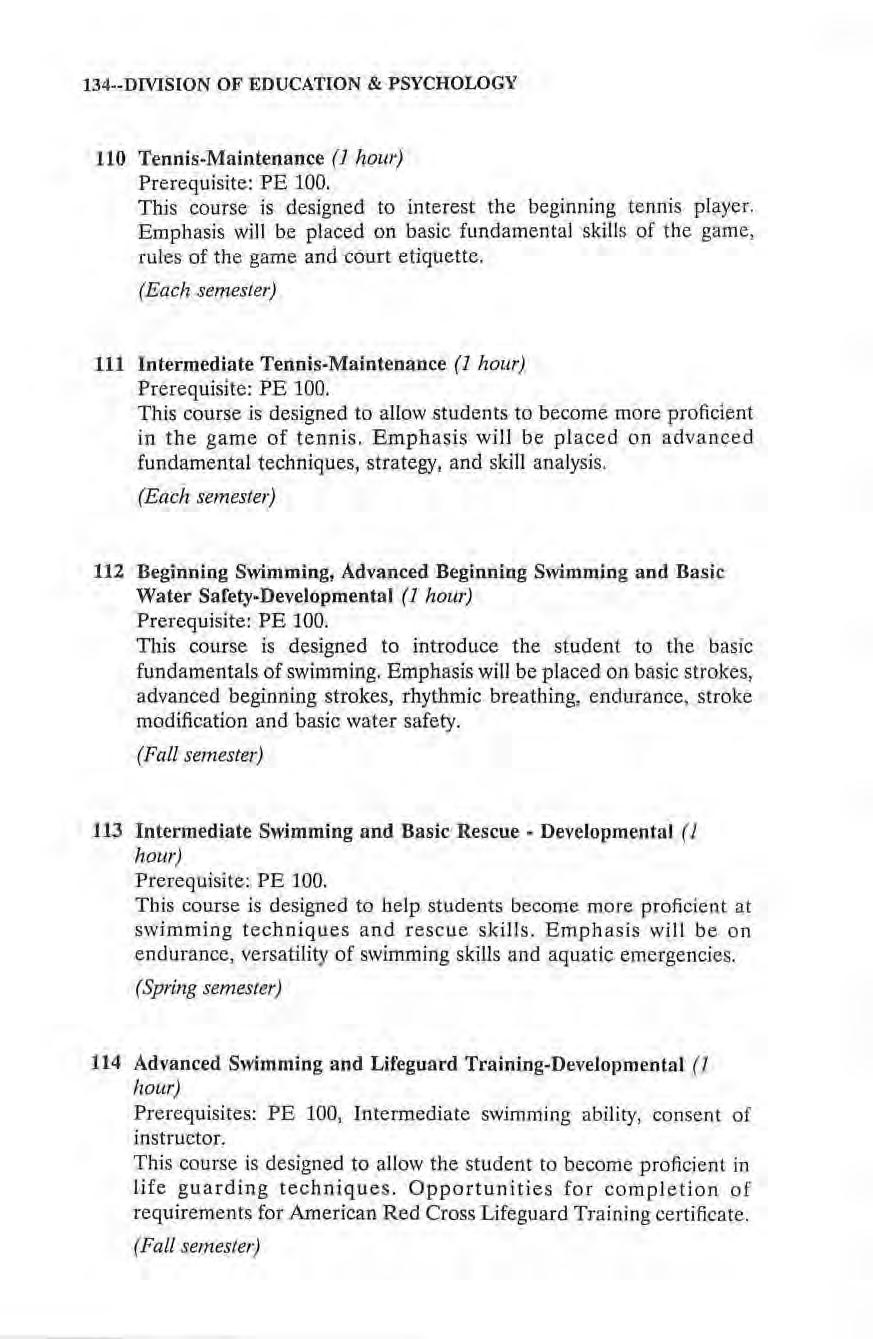
Prerequisites: PE 100, Intermediate swimm ing ability, co nsent of instructor.
This course is designed to allow the s tudent to become proficient in life guarding technique s Opportunities for completion of requirements for American Red Cross Lifeguard Training certificate. (Fall semeste,)
134--DMSION
115 Water Safety Instructor - Developmental (1 how~
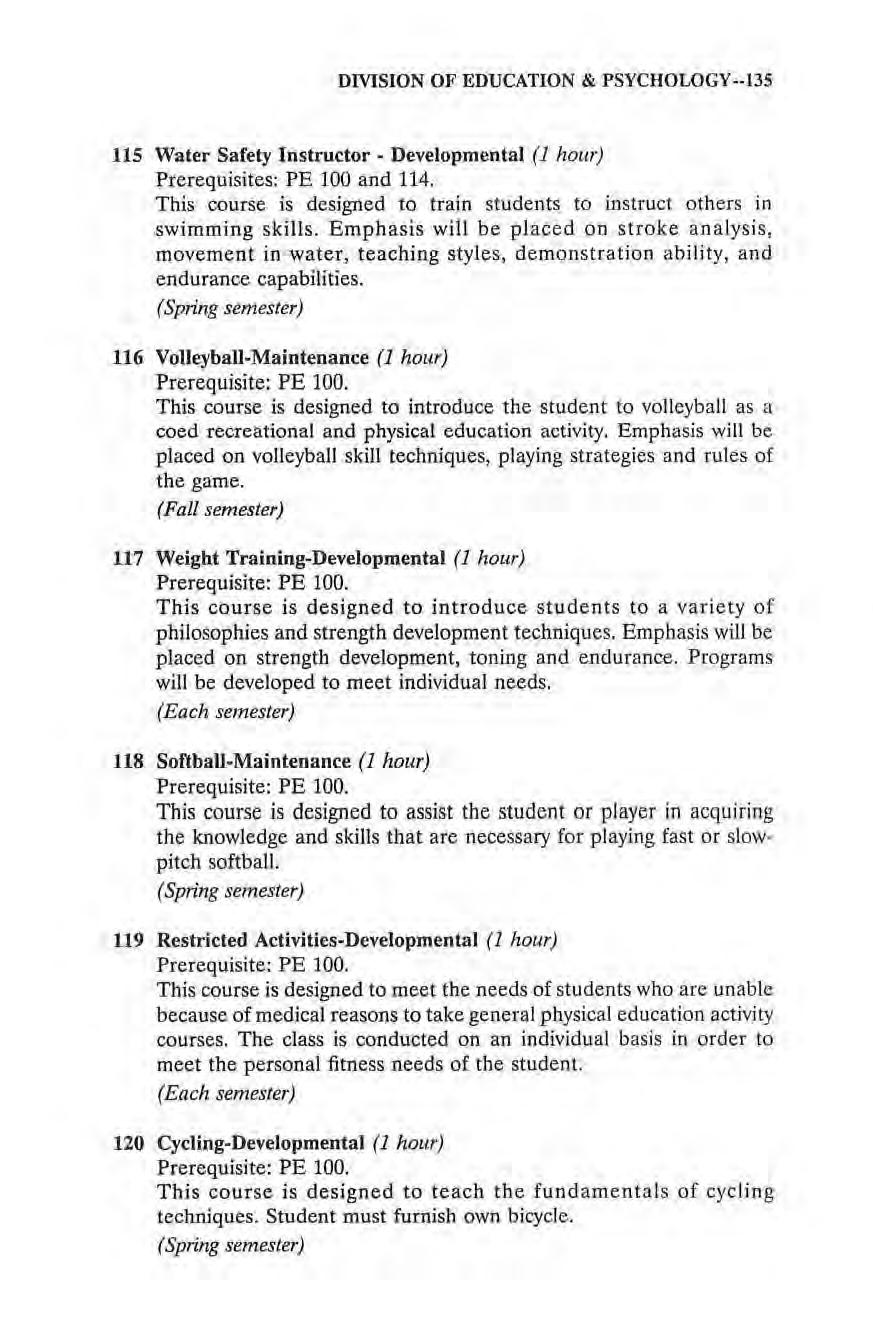
Prerequisites: PE 100 and 114.
This course is designed to train students to instruct others in swimming skins. Emphasis will be placed on stroke analysis, movement in water, teaching styles, demonstration a bility, and endurance capabilities.
(Spring semester)
116 Volleyball-Maintenance (I hour)
Prerequisite: PE 100.
This course is designed to introduce the student to volleyball as a coed recreational and physical education activity. Emphasis will be placed on volleyball skill techniques, playing strategies and rules of the game.
(Fall semester)
117 Weight Training-Developmental (I hour)
Prerequisite: PE 100.
This course i s designed to introduce students to a variety of philosophies and strength development techniques. Emphasis will be placed on strength development, toning and endurance. P rograms will be developed to meet individual n eeds
(Each semester)
118 Softball-Maintenance (] hour)
Prerequisite: PE 100.
This course is designed to assist the student or -player in acquiring the know'ledge and skills that are necessary for playing fast or slowpitch softball.
(Spring semester),
119 Restricted Activities-Developmental (1 hour)
Prerequisite: PE 100.
This course is designed to meet the needs of students who are unabl e because of medical reasons to take general physical education activity courses. The class is conducted on an individual basis in order to meet the personal fitness needs of the student.
(Each semester)
120 Cycling-Developmental (I hour)
Prerequisite: PE 100.
This course is design ed to teach the fundamenta ls of cycling techniques. Student must furnish own bicycle.
(Spring semester)
DMSION OF EDUCATION & PSYCHOLOGY--135
121 Aerobic Dance-Developmental (1 hour)
Prerequisite: PE 100.
This course is designed to introduce the student to a variety of aerobic conditioning activities and techniques. Emphasis is on body composition, body toning and cardiovascular endurance.
(Each semester)
122 Wa lking and Jogg ing-D evelop mental (1 hour)
Prerequisite: PE 100.
This course is designed to introduce the student to aerobic cond itioning. Emphasis is on techniques, aerobic capacity, fitness development and individual student needs and abilities.
(Each semester)
123 Aquatic Fitness-Developmental (1 hour)
Prerequisite; PE 100.

This course is designed to introduce the student to a variety of aquatic fitness activities and techn iques. Emphasis is on aerobic capacity, strength and flexibility.
(Each semester)
124 Archery-Maintenance (1 hour)
Prerequisite: PE 100. This course is designed to teach students the basic fundamental skills of the sport. Equipment selection and maintenance will be included as part of the instruction.
(Fall semester)
126 Intermediate Voll eyball-Maintenance (1 hout)
Prerequisite: PE 116 or permission of instructor. This course is designed to allow students to become more proficient in the game of volleyball. Emphasis will be placed on advanced fundamental techniques, strategy, and skill analysis.
( Spring semester)
130 Bowling-Maintemtnce (1 hour)
Prerequisite: P E 100.
This course is designed to interest the beginning student in bowling. Emphasis will be p laced on fundamental techn iques of t he game, rules of the game, a nd game etiquette.
(Spring semester)
136 --DMSION OF
&
EDUCATION
PSYCHOWGY
131 Folk, Square and Social Dance-Maintenance (1 hour)
Prerequisite: PE 100.
This course is designed to introduce students to dance as a recreational and physical education activity. Dance elements and social responsibilities associated with dancing will be discussed. Various social, folk and square dance patterns will be introduced
(Each semester)
190 Varsity Spot·ts (1 hour)
Requires successful participation in a varsity sport. (A maximum of 4 hours may be applied to the degree requirements.)
(Each semester)
201 Principles of Physical Education (3 hours)
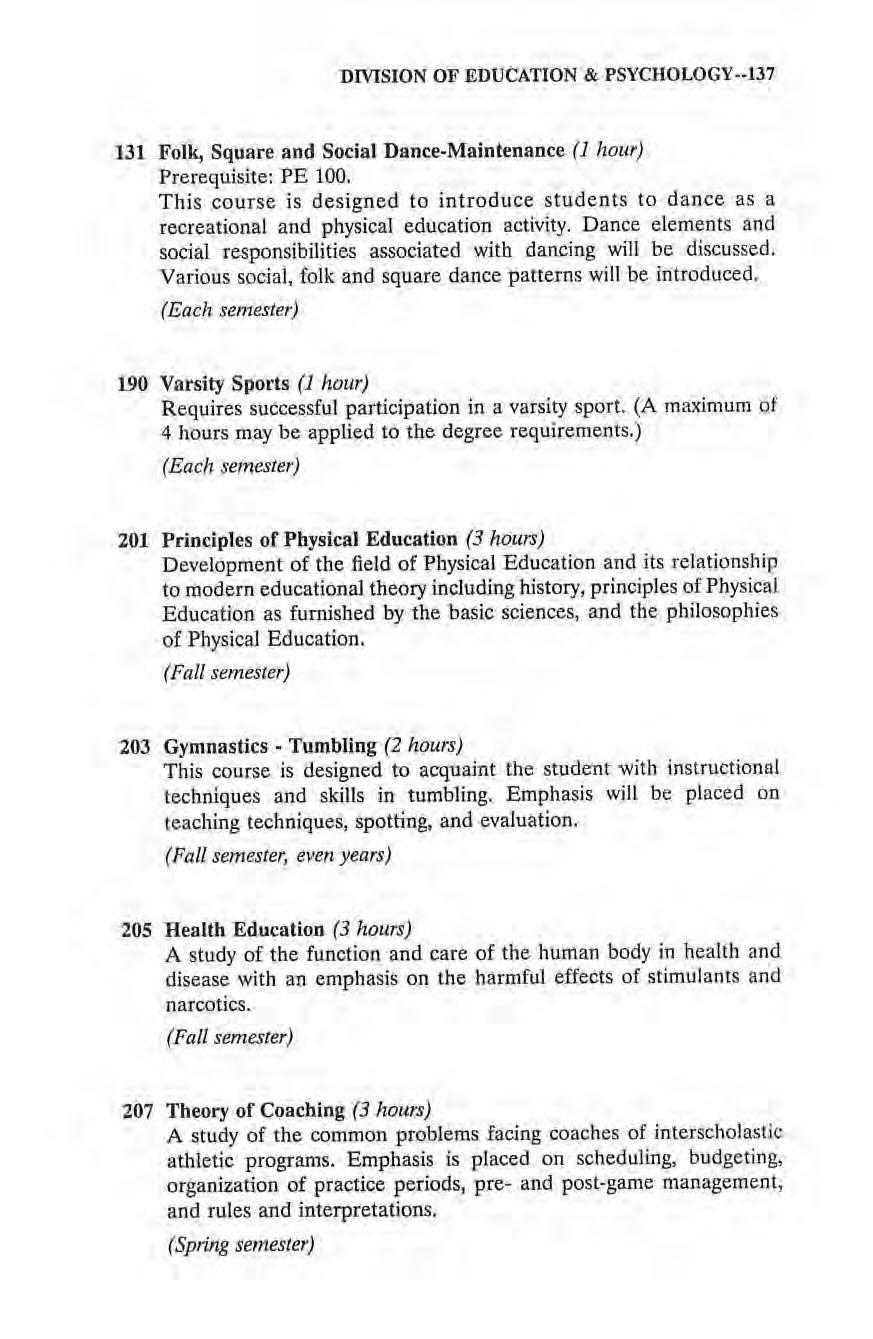
Development of the field of Physical Education and its relationship to modern educational theory including history, principles of Physical Education as furnished by the basic sciences, and the philosophies of Physical Education.
(Fall semester)
203 Gymnastics - Tumbling (2 hours)
This course is designed to acquaint the student with ins tructional techniques and skills in tumbling. Emphasis will be placed on teaching techniques, spotting, and evaluation.
(Fall semester, even years)
205 Health Education (3 hours)
A study of the function and care of the human body in health and disease with an emphasis on the harmful effects of stimulants and narcotics.
(Fall semester)
207 Theory of Coaching (3 hours)
A study of the common problems facing coaches of interscholas tic athletic programs. Emphasis is placed on scheduling, budgeting, organization of practice periods, pre- and post-game management, and rules and interpretations,
(Spring semester)
DMSlON OF EDUCATION & PSYCHOLOGY --137
208 T heory of Fo otb a ll and Vo lleyba ll (3 hours)
A study of offensive and defensive s tr ategies in footba ll and volleyball Emphasis is placed on scheduling, budgeti ng, orga ni zation of practice periods, pre- and post-game managemen t, and rules interpretation.
(Fall semeste,~ odd years)
209 Theory of Basketball and Baseball (3 hours)
A study of offensive and defensive strategies in basketball a nd baseball. Emphasis is place on sched ulin g, budge tin g, organization of practice periods, pre- and post-game man age ment, and rules interpretation.
(Sp1i11g semeste,; even years)
210 Theory of Track and Softball (3 hours)
A study of techniques and skills requi red for events, orga nization of practice periods, management of meets and games, a nd rules interpretation. Includes organization and a dministra t ion of the Peru Invi ta tional I ndoor Track: Meet.
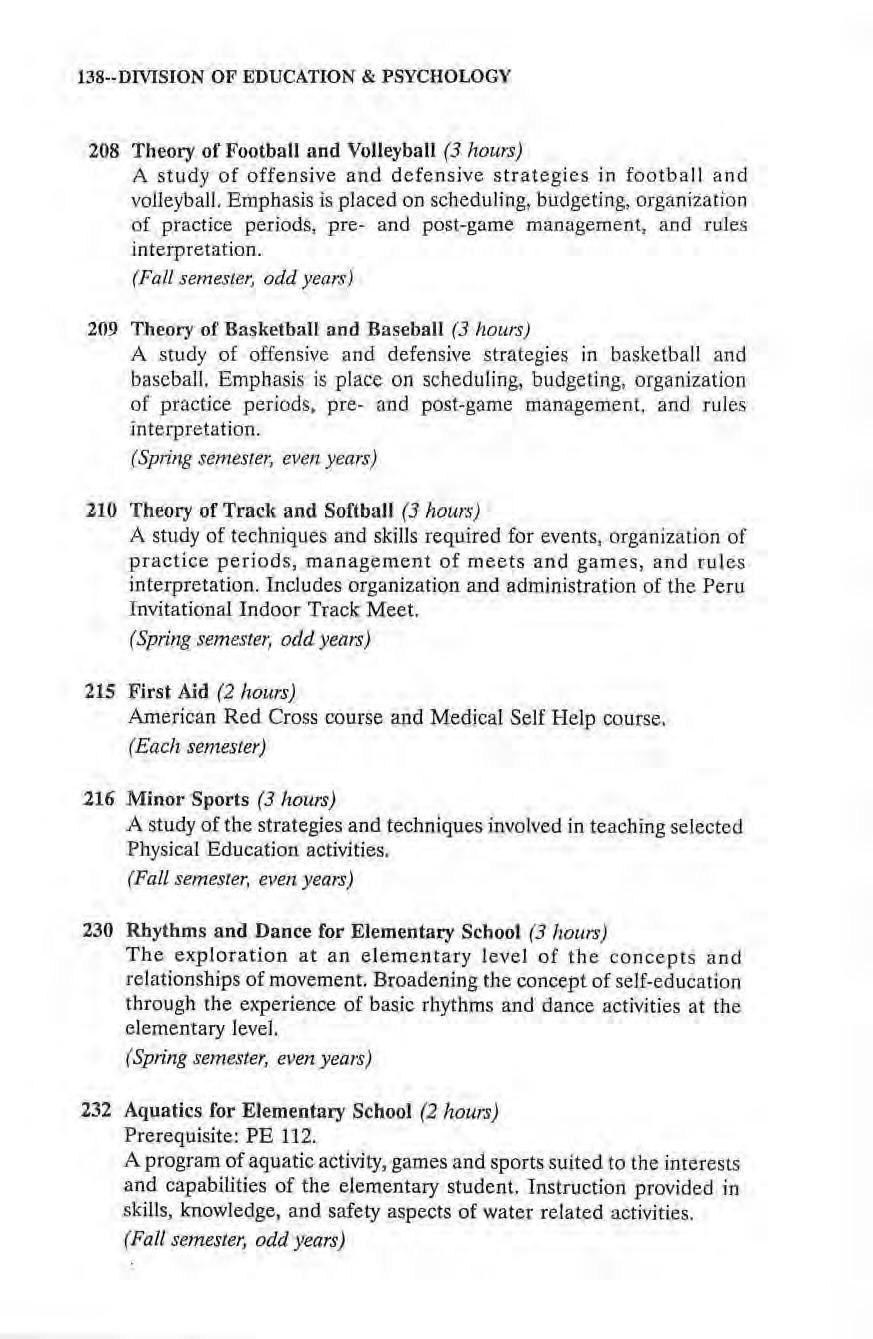
(Spring semester, odd years)
215 Fi rst Aid (2 hours)
American Red Cross course an d Medical Self Help course.
(Eac h semester)
216 M inor Sports (3 hours)
A study of the strategies and techniques involved in teaching selected Physical Education activit ies.
(Fa ll semester, even years)
230 Rhythms and Dance for Elementary School (3 hours)
The exp lo ration at an e lementary level of the c oncepts and re lations hips of movement. Broadening the concept of self-education through t he experie nce of basic rhythms a nd dance activities at the elementary level.
(Spring semester, even years)
232 Aq u atics for E lementary S chool (2 hours)
Prerequisi t e: PE 112.
A program of aquatic activity, games and sports suited to the interests and capabilities of the e lementary student. Instruction provided in skills, knowledge, and safety aspects of water r e.lated activities.
(Fall semester, odd years)
138- -DMSION OF E D
&
UCATION
PSYCHOLOGY
297 Directed Study in Physical Education (1-4 hours)
Senior standing.
(Offered as needed)
298 Special Topics in Physical Education (1-4 hours)
Freshman-Sophomore sta nding.
(Offered as needed)
300 Prevention and Care of Sports Injuries (3 hours)
Prerequisite: PE 312.
The nature and ca use of injuries related to the physical activities of children and athletes.
(Spring semester)
309 Organization and Administration of Programs in Health and PE (2 hours)
Consideration of general principles of administrative techniques and responsibilities for the field of Health and Physical Education.
(Spring semester, odd years)
310 Physical Ed ucation in the Primary Grades (2 hours)
The selection and organization of materials and techniques of instruction for the primary grades.
(Fall semester, odd years)
311 Physical Education in the Intermediate Grades (2 hours)
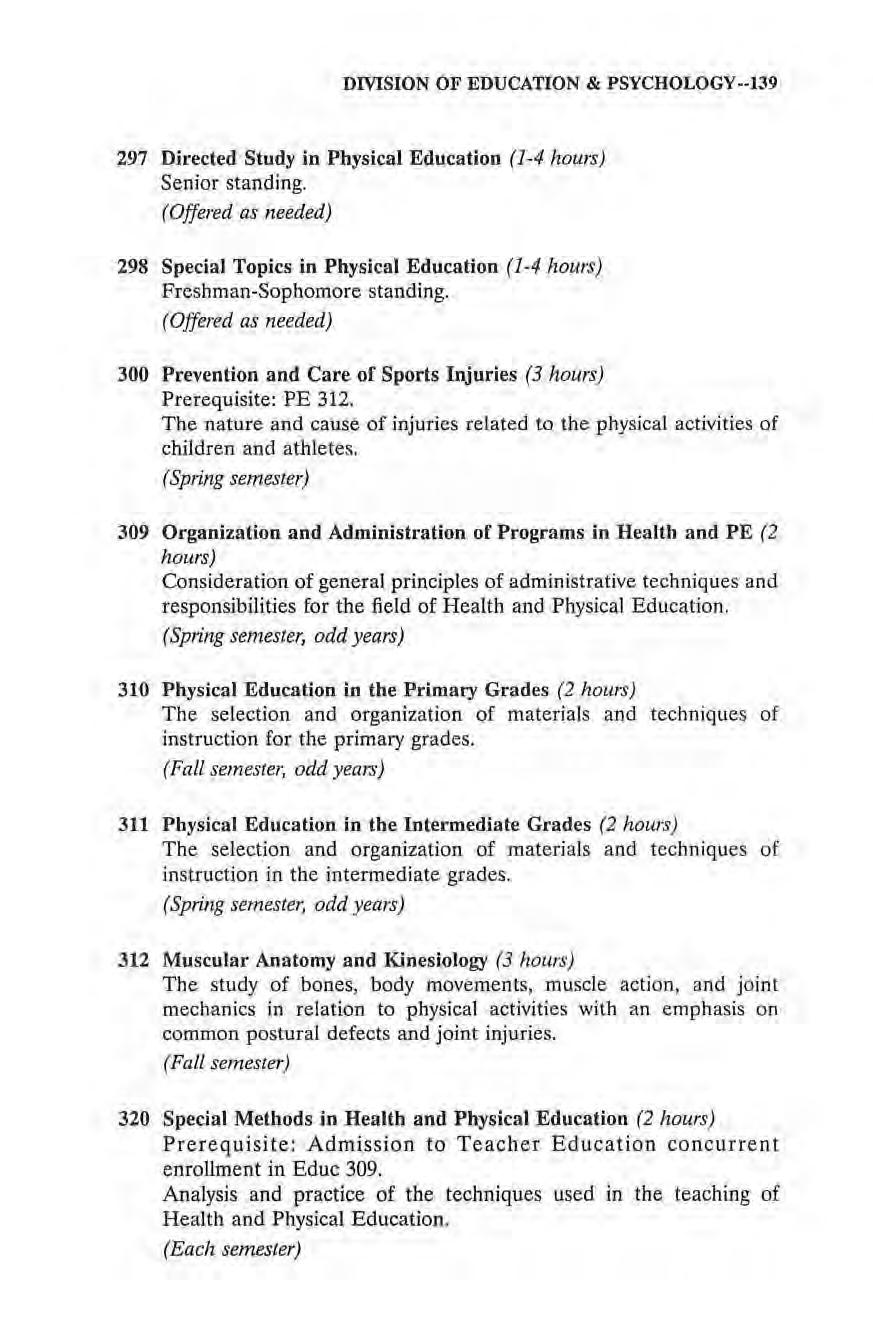
The selection and organization of materials and techniques of ins truction in the intennediate grades.
(Spring semester, odd years)
312 Muscular Anatomy and Kinesiology (3 hours)
The study of bones, body movements, muscle action, and joint mech anics in relation to physical activities with an emphasis on common postural defects and joint injuries.
(Fall semester)
320 Special Methods in Health and Physical Education (2 hours)
Prerequisite: Admission to Teacher Education concurrent enrollment in Educ 309.
Analysis and practice of the techniques used in the teaching of Health and Physical Education
(Each semester)
DMSION OF EDUCATION & PSYCHOLOGY--139
360 Physiology of Exer cise (3 hours)
A working understanding of how exercise affects the different systems of the body.
(Spring semester)
411 Health Programs in the Elementary School (3 hours)
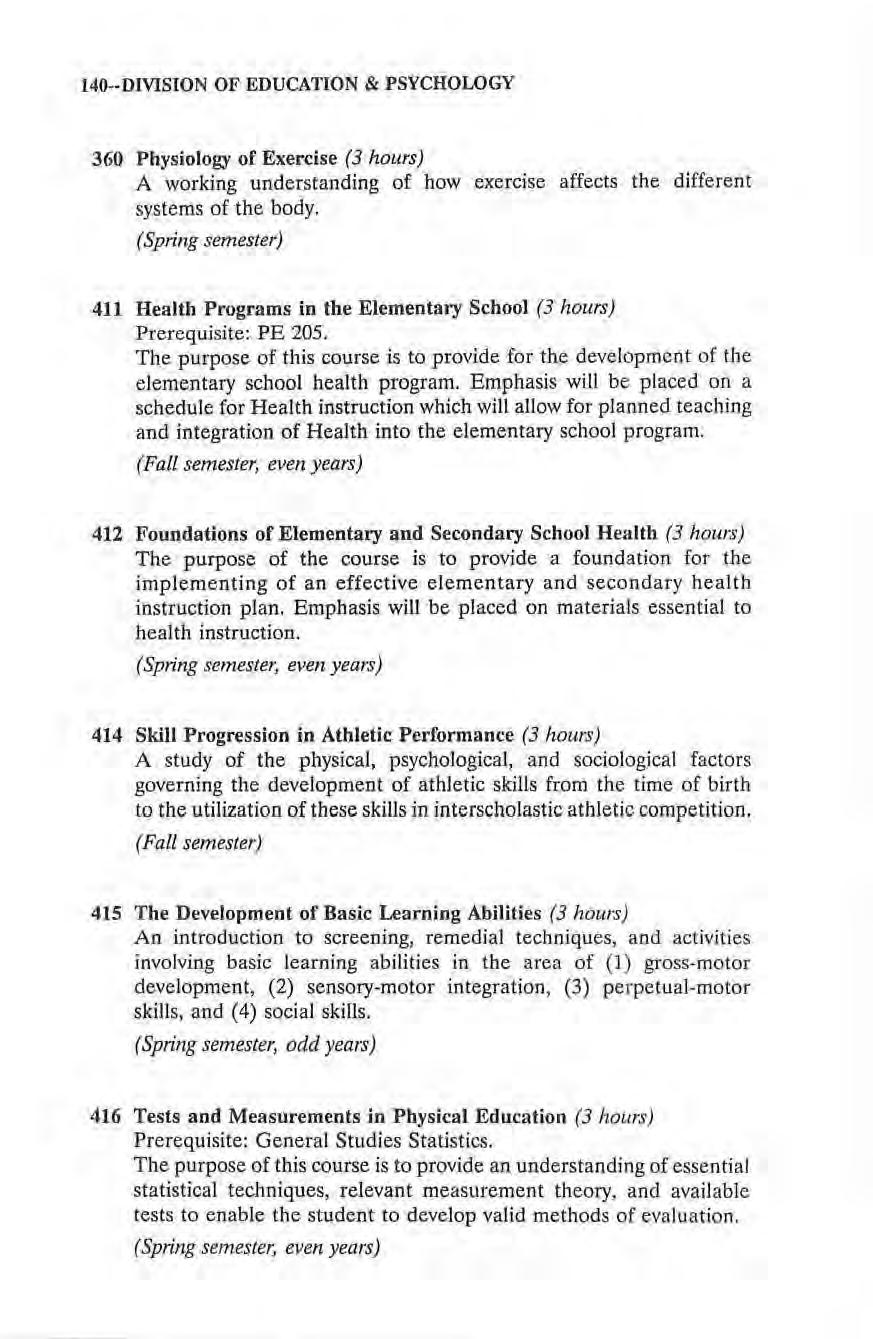
Prerequisite: PE 205.
The purpose of this course is to provide for the dev elopment of the e lementary scbool health program. Emphasis will be placed on a schedu le for Health instruction which will allow for planned teaching and integration of Health into the elementary school program.
(Fall semester, even years)
412 Foundations of E l ementary and Secon dary School Health (3 hours)
The purpose of the course is to provide a foundation for the implementing of an effective elementary and secondary health instruct ion plan. Emphasis will be placed on materials essential to health instruction.
(Spring semester, even years)
414 Ski ll Progressio n in Athletic Performance (3 hours)
A study of the physical, psychological, and sociological factors governing th e development of athl etic skills from th e time of birth to the utilization of these skills in interscholastic athletic competition .
(Fall semester)
415 The Developm ent of Basic Learning Abili t ies (3 hours)
An introduction to screening, remedial techniques, and act1V1t1es involving basic learning abilities in the area of (1) gross-motor development, (2) sensory-motor integration, (3) per petual-motor skills1 and (4) social skills.
(Sp ring semester, odd years)
416 Tests and Measu rements in Physical Education (3 hours)
Prerequisite: General Studies Statistics. The purpose of this course is to p rovide an understanding of essential statistical techniques, relevant measurement theory, and available tests to e nable the student to develop valid methods of evaluation.
(Spring semester, even years)
140--D MSION OF EDUCATION & PSYCHOLOGY
417 Ada ptive Physical Educa tion (3 hours)
Prerequisites: Psych 250 and PE 312. A study of philosophy, procedures, and practices in adapted physical education.
(Spring semester, odd years)
418 Administration of Interschool Athletics (2 hours)

T his course includes a h i story of the development of athletic programs, a study of various national and state organizations, the role of athletics in education, and the responsibilities of the Athletic D irector.
(Spring semester)
431 Legal Iss ues in S port (3 hours)
This course is designed to provide the student with a background which will enable him/her to identify and apply various areas of law to the sport industry.
(Fall semester, even years)
432 Planning and Utilization of Facilities ( 2 hours)
An introd uction to the study of facilities p lanning, financing, utilization and maintenance.
(Spring semester, odd years)
497 Directed Study in Phys ical Edu catio n (J-4 hours) Senior standing.
(Offered as needed)
4 98 Special Topics in Physical Education (1-4 hours)
Prerequisite: Junior standing.
(Offered as needed)
499 Independent Study in Phys ical Education (1-3 hour.'>)
Prerequisite: Junior standing.
(Each semester)
DMSION OF EDUCATION & PSYCHOLOGY- -14 J
OF HUMANITIES
DMSION OF HUMANITIES
Dr. David M. Ed1·is, Chairperson
Profes sors: Anderson, Davis, Ediger, Edris, Harper, Smith
Associate Professors: Holtz, McCrann
Ass istant Professors: Clemente, Crook, Jones, Makris
Instructors: Emerson, Fryer
The Division of Humanities offers majors in Art, English, Music, Psychology-Sociology, Social Science, and Speech and Drama. A curriculum has been developed for each of these areas designed to meet specific degree requirements and provide preparation for careers in teaching and nonteaching professions. The English Major provides options for either English or the broader area of Language Arts. The Social Science Major provides options for History, and the broader area of Social Sciences. The Psychology-Socio lo gy major provides options for Psychology, Sociology, P sychology/ Sociology combined, and a Composite Human Services option. Majors in the visual and perfonn ing arts areas provide various teach.ing and nontea c hing o ptions in Art, Music, and Speech and Drama.
ART MAJOR
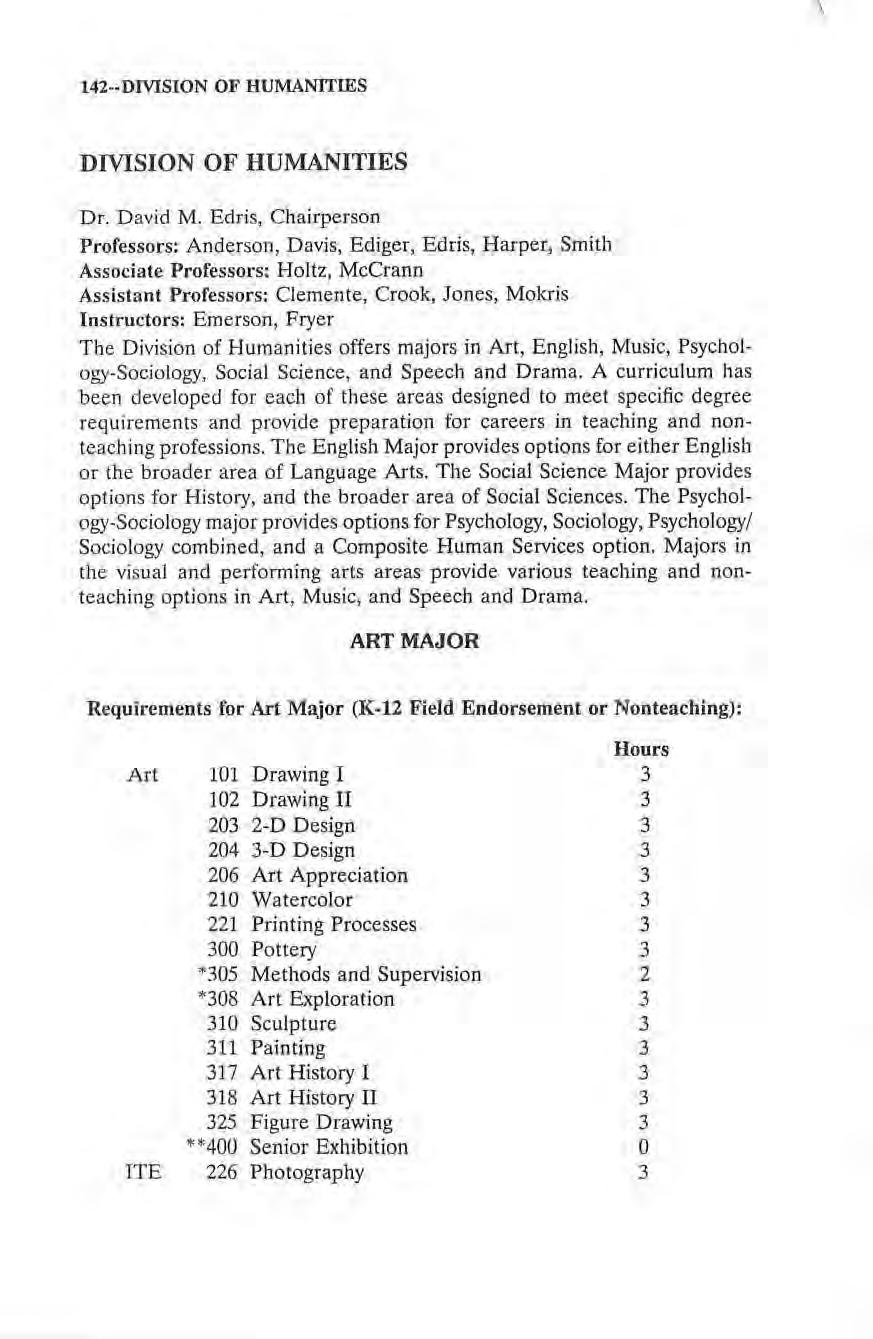
142--DMSION
uirements
Art 101 Drawing I 102 Drawing II 203 2-D Design 204 3-D Design 2 06 Art Appreciation 210 Watercolor 221 Printing Processes 300 Pottery "'305 Methods and Supervision "'308 Art Exploration 310 Sculpture 311 Painting 317 Art History I 318 Art History II 325 Figure Drawing "'*400 Senior Exhibition ITE 226 Photography Hours 3 3 3 3 3 3 3 3 2 3 3 3 3 3 3 0 3 \
Req
for Art Major (K-12 Field E ndorsem ent or Nonteaching):
Art electives (select 6 hours from the following)
(in addition to required 3 hours)
3
498
" Students taking a nonteach ing option in Art may substitute any art elective for Art 305 and Art 308,
**Art 400 Senior Exhibition produces no credit hours but is a graduation requirement for ALL Art Majors.
ENGLISH MAJOR
A. Requirem ents fo r E nglis h L an guage Arts Option (7-12 Field Endorsem e nt):
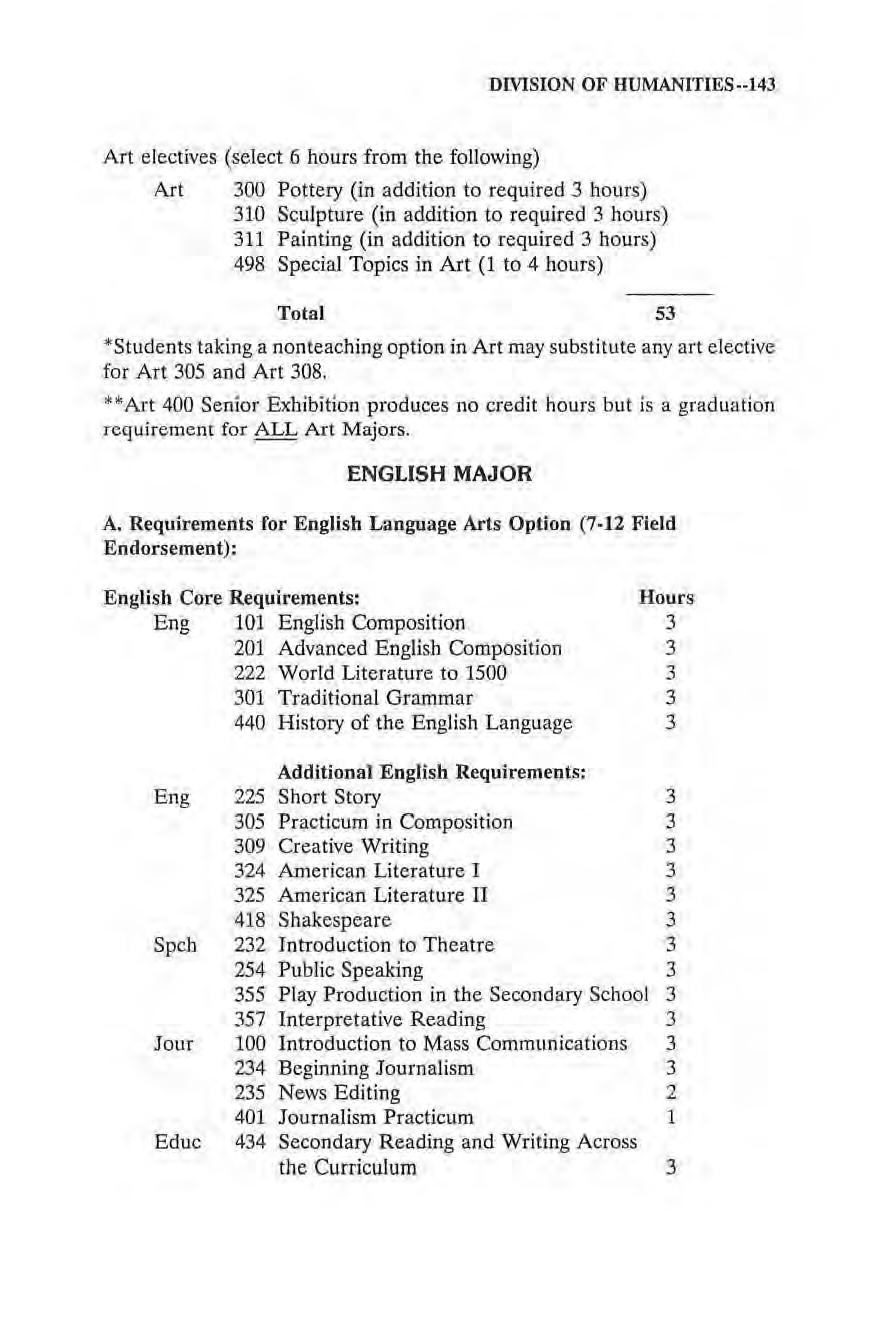
DMSION OF HUMANITIES--143
Pottery
Sculpture
Painting (in
Art 300
310
( in addit ion to required
hours) 311
addition to required 3 hours)
Special Topics in Art
Tota
(1 to 4 h ours)
l 53
E ngli sh Core R.e quirements : Eng 101 English Composition Eng Speh 201 Advanced English Composition 222 World L iterature to 1500 301 Traditional Grammar 440 History of the English Language Additional English Requirements: 225 Short Story 305 Practicum in Composition 309 Creative Writing 324 American Literature I 325 Amer ican Literature I1 418 Shakespeare 232 Introduction to Theatre 254 Public Speaking Hours 3 3 3 3 3 3 3 3 3 3 3 3 3 355 Play Production in the Secondary School 3 357 Interpretative Reading 3 Jour 100 Introduction to Mass Communications 3 234 Beginning J ournalism 3 235 N ews Editing 2 401 Journalism Practicum 1 Educ 434 Secondary Reading and Writing Across the Curric ulum 3
Select 9 hours from the following with at least one course from the Br,itish Literature and
Literature selections.
"'Students preparing to teach in middle school are r equired to take English 203.
B. Require.me nt s for English Option (7-l2 S ubject Endorsement or Nonteaching):

144--DMSION
OF HUMANITIES
Modern
Britis h Literature: Eng 318 Early Euro pean L iterature 321 Romantic P eriod 323 Victorian Period Modern Literature: Eng 306 Nebraska Literature 307 Seminar in the Modern Novel 328 Modern Poetry 443 Mode rn Drama General Literature: <t<Eng 203 Literature for Children through Adolescence 441 Pre-Shakespearean Drama 442 Post-Shakespearean D rama Tota l 3 3 3 3 3 3 3 Hours 3 3 3 66
English Core R equ irem ents: Eng 101 English Composition 201 Advanced English Composition 222 World Literature to 1500 301 T raditional Grammar 440 History of the E n glish Language Add itiona l English Requirements: or Eng 305 Practicum in Composition 309 Creative Writing Speh J our 324 American Li terature I 325 American Literature II 418 Shakespeare 357 Interpretative Reading 234 Beginning J ournalism *Educ 434 Teaching Secondary R eading Hours 3 3 3 3 3 3 3 3 3 3 3 3 3
Select 9 hours from the following with at least one course each from the British Literature and Modern Literature selections,
*Students taking a nonteaching option in English may substitute for Eng 305 and Ed 434 any course from the English electives.
*"Students preparing to teach in middle school are required to take Eng 203.
History • See under Social Science Major, Option B.
MUSIC MAJOR
The Music Minor (Nonteaching) option and the Music-Marketing (Nonteaching) option are open to all students who have prior experience reading music and have the ability to perform on a wind or percussion instrumen t , piano, or as a vocalist, Those students seeking to earn the Music-Education (K-6 or K-12 endorsements) or Music-Performance (Nonteaching) options will be conditionalty accepted into the program. Besides needing to have the ability to read music and perform, students must also satisfy two levels of qualification before being fully accepted into the music education or performance programs.

Level I Qualification: Music-Education or Music-Perfoi,-mance
1. The student must have achieved at le ast a 2.5 overall GPA after completing two consecutive semesters.
DMSION OF HUMANITIES--145
British Literature: Eng 318 Early European Literamre 321 Romantic Period 323 Victorian Period Modern Literature: Eng 306 Nebraska Literature 307 Seminar in the Modern Novel 328 Modern P oetry 443 Modern Drama General Literatu re: **Eng 203 L iterature for Children through Adolescence 225 The Short Story 441 Pre-Shakespearean Drama 442 Post-Shakespearean Drama Total 3 3 3 3 3 3 3 3 3 3 3 48
Level II Qualification: Music-Education
1 The student must be free from disciplinary probation.
2. The student must have achieved at least a 2.5 overall GPA after completing four consecutive semesters.
3. The student must achieve on the Pre-Professional Skills Test (PPST) a minimum score of 170 - reading comprehension, 171 - math, and 172 - composition.
4. Letters of recommendation from three faculty (two should be music faculty) who are in a position to assess the student as a prospective teacher.
5. Complete an interview conducted by a Department of Music faculty member.
Level II QuaHfication: Music-Performance
L. The student must be free from disciplinary probation.
2 . The student must have achieved at least a 2.5 overall GPA after completing four consecutive semesters.
3. Letters of recommendation from three faculty (two should be musi c faculty) who are in a position to assess the student's a ttitude, motivation, and enthusiasm toward music performahce.
4. After four consecutive semesters, the student must perform a qualifying audition consisting of a prepared piece and a demonstration of fundamental music performance skills, such as, sight read ing, scales, or other skills appropriate to the performance medium.
Special Music Major Regulations and Information
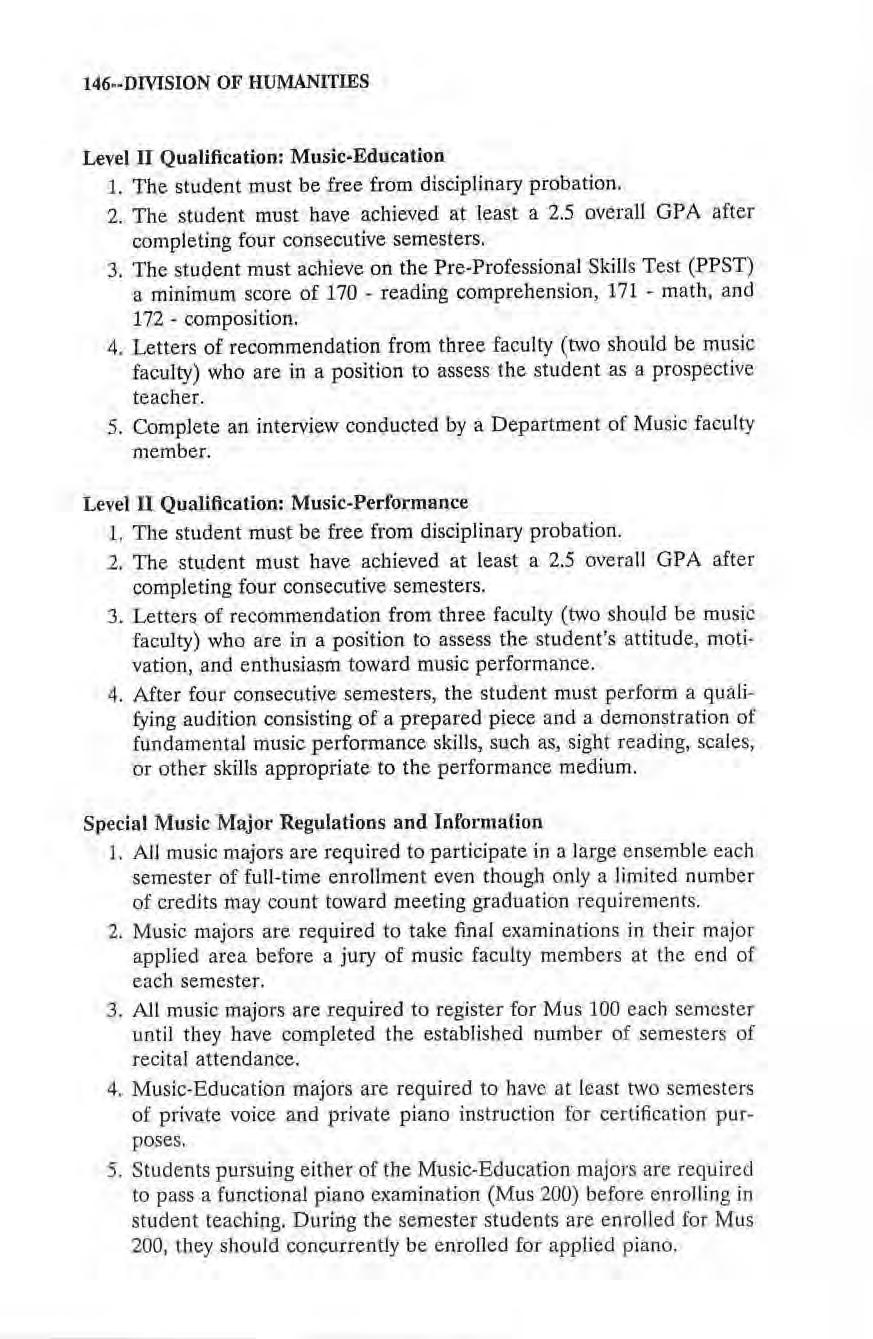
1. All music majors are required to participate in a large e nse mble each semester of full-time enrollment even though only a limited number of credits may count toward meeting graduation requi re ments.
2. Music majors are required to take final examinations in their major applied area before a jury of music faculty membe rs at the e nd of each sem es te r .
3. All music majors are required to register for Mus 100 each semester u ntil they have completed the established number of semesters of recital attendance.
4. Music-Education majors are required to have at least two semesters of private voice and private piano instruction for certification purposes.
5. Students pursuing ei th er of the Music-Education majors are required to pass a functional piano exami nation (Mus 200) before enrolling in student teaching. During the semester students are enrolled for Mus 200, they should concurrently be enrolled for applied pia no .
146--DMSION
OF HUMANITIES
6. Music-Education (K-12 V~tif.fnstrumental) majors a re r equired to give a ~"recital (Mus~- Music-Perfonnance majors are r equired to give a junior recital (Mus 340) and a senior recital (Mus 440) . Students should concurrently be enrolled fo r applied music during the semester they are enrolled for the junior or senior recital.
7 Music-Performance majors during the Freshman ye,ar are limited to taking only one hou r of applied music instruction in the major applied area. Commencing with the Sophomore year, Music-Performance majors will need to take two hours of private music instr uction in the major applied area each semester in order to complete the required number of hours within the four years of attendance.
8. Applied music fees are listed in the financial section of the catalog. Declared music majors are not charged an addi tional fee for private music instruction. Others taking applied private music instruction will be charged at the established rate.
*If the major applied area is piano, then two hours of applied voice or applied instrument will be substituted for the two hour applied piano requirement.
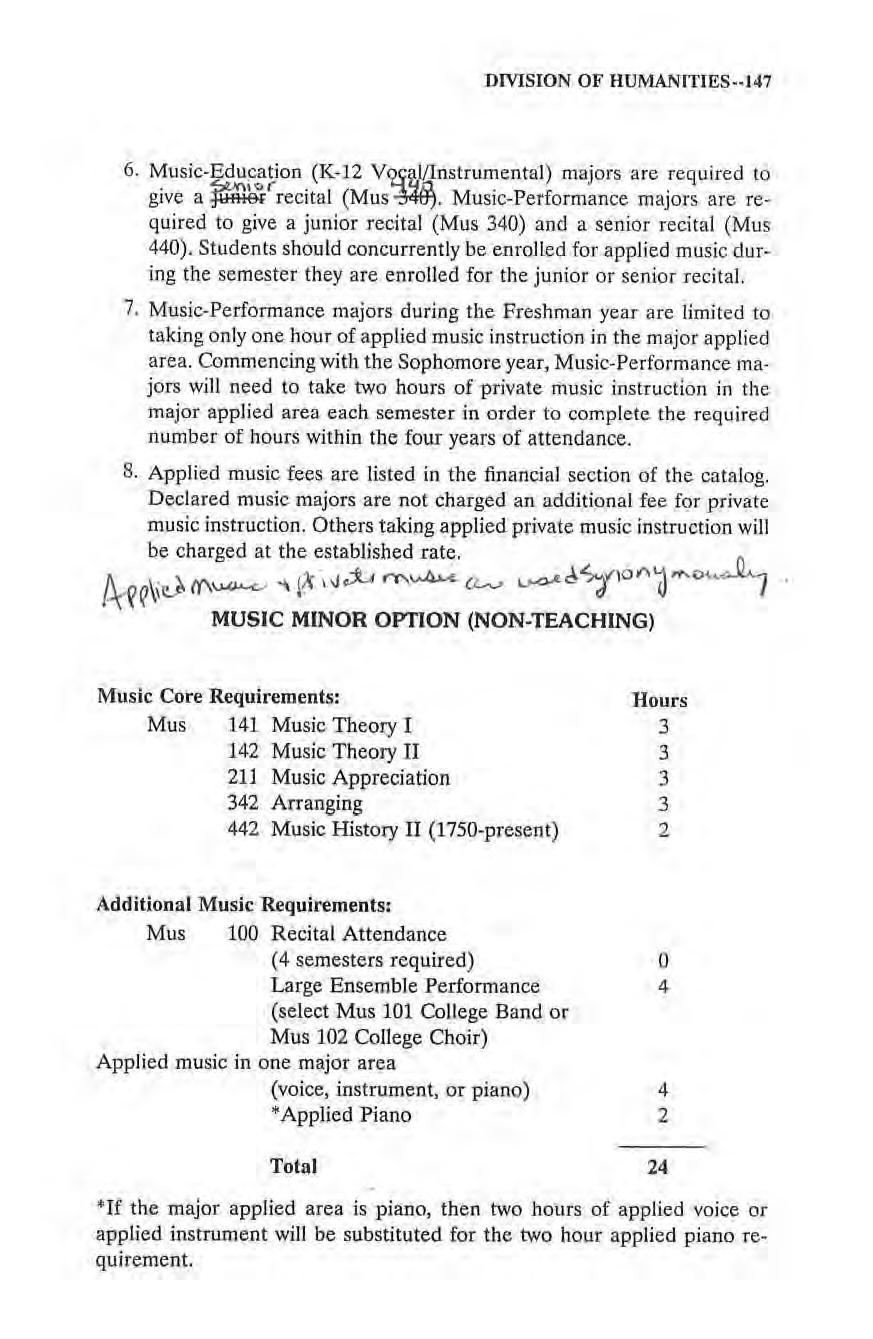
DMSION OF HUMANITIES--147
~q~\\f!.) ((\~ ""l.X 1 ,J.j.J t"r\~ (L-v u-o-t-~~v,o"' 'J ""-O ~ I MUSIC MINOR OPTION (NON-TEACHlNG) Music Core Requirements: Mus 141 Music Theory I 142 Music Theory II 211 Music Appreciation 342 Arranging 442 Music History II (1750-present) Additional Music Requirements: Mus 100 Recital Attendance (4 semesters required) Large Ensemble P erformance (select Mus 101 College Band or Mus 102 College Choir) Applied music in one major area (voice, instrument, or piano) *Appiied Piano Total Hours 3 3 3 3 2 0 4 4 2 24
MUSIC-MARKETING OPTION (NONTEACHING)
*If the major applied area is piano, then two hours of applied voice or applied instrument will be substituted for the two hour applied piano requirement.
K-6 VO CALJELEMENTARY MUSIC EDUCATION OPTION (SUBJECT ENDORSEMENT)
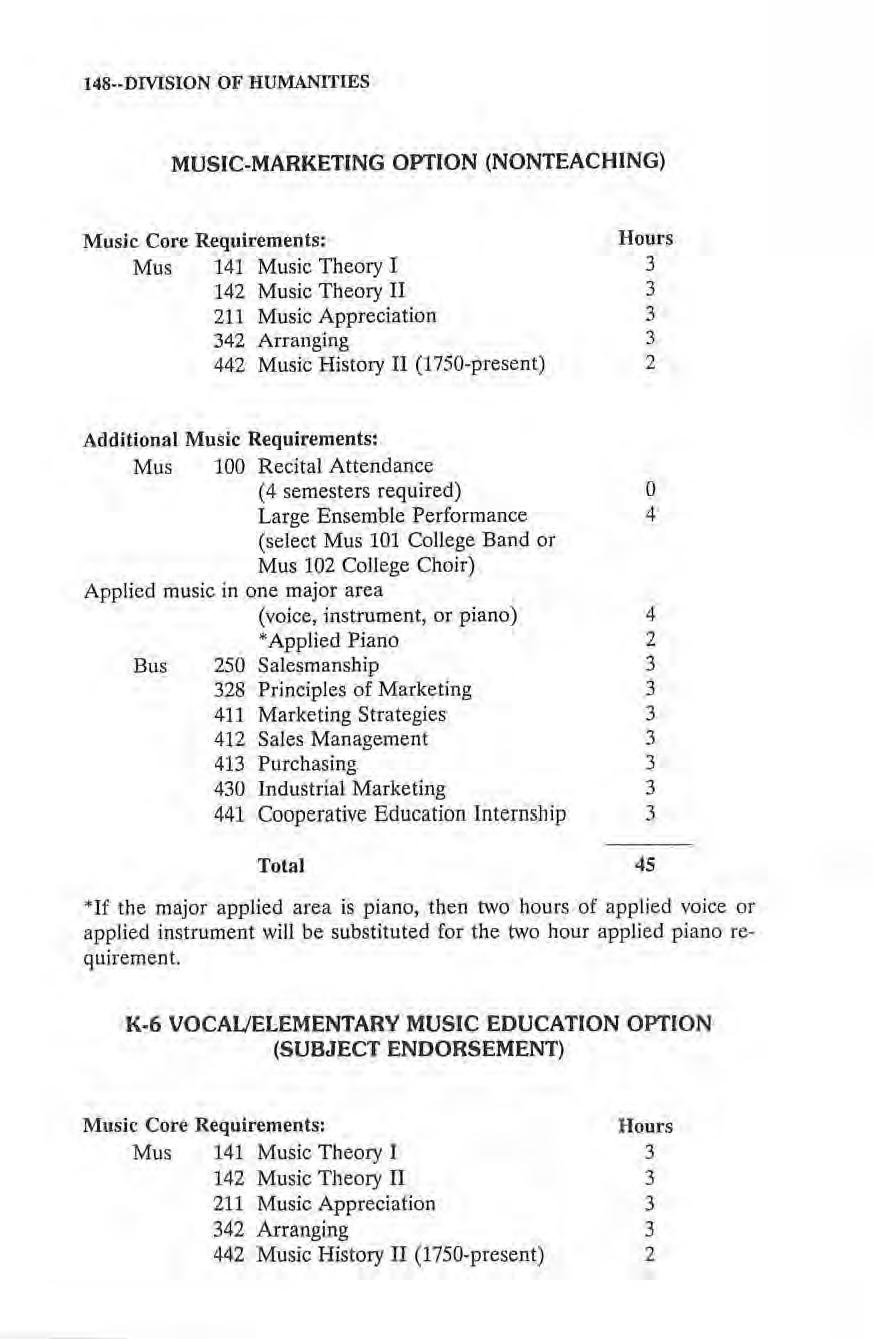
148--DMSION OF HUMANITIES
Music Core Requirements: Mus 141 Music Theo1y I 142 Music T heory II 211 Music Appreciation 342 Arranging 442 Music History II (1750-present) Additiona l Musk Requirements: Mus 100 Recital Attendance (4 semesters required) Large Ensemble Performance (select Mus 101 College Band or Mus 102 College Choir) Applied music in one major area (voice, instrument, or piano) *Applied Piano Bus 250 Salesmanship 328 Principl es of Marketing 411 Marketing Strategies 412 Sales Management 413 Purchasing 430 Industrial Marketing 441 Cooperative Education Internship Total Hou.rs 3 3 3 3 2 0 4 4 2 3 3 3 3 3 3 3 45
Music Core Requirements: Mus 141 Music Theory I 142 Music Theory II 211 Music Appreciation 342 Arranging 442 Music History II (1750-present) Hours 3 3 3 3 2
*If the major app lied area is piano, then three hours of applied voice or applied instrument will be substituted for t h e thr ee hour applied p iano requi rement.
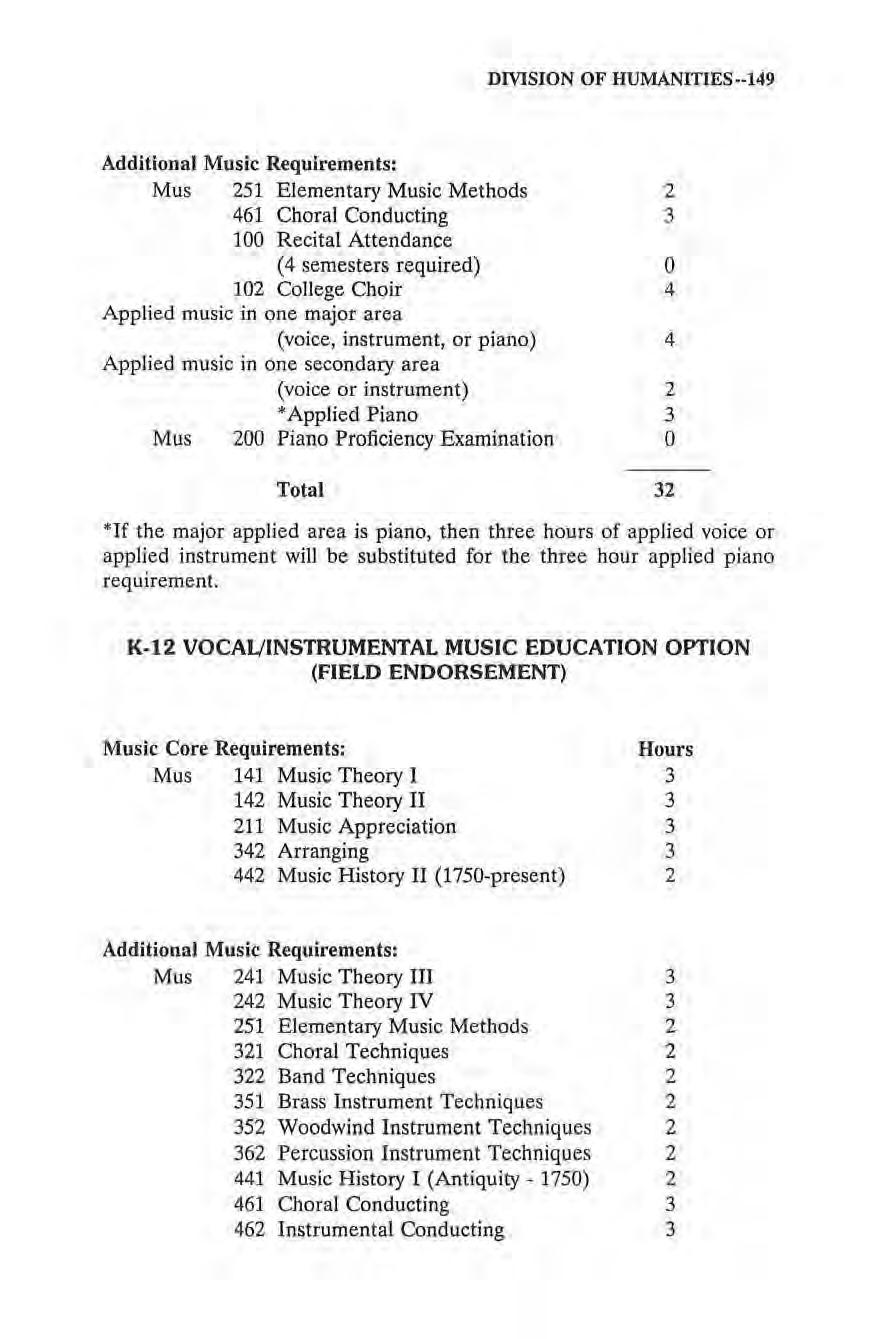
DMSION OF HUMANITIES --1 4 9 Additiona l Music Requirements: Mus 251 Elementary Music Methods 461 Choral Conducting 100 R ecital Attendance (4 semesters r equired) 102 College Choir Applied m usic in one major area (voice, instrument, or piano) Applied musi c in one secondary area (voice or ins trum e nt ) * Applied Piano Mus 200 Piano Proficiency Examination Total 2 3 0 4 4 2 3 0 32
K-12 VOCA L/INSTRUM ENTAL MUSIC EDUCATION OPTION (FIELD ENDORSEMENT) Music Core Requirements ; Mus 141 Music Theory I 142 Music Theory II 211 Music Appreciation 342 Arranging 442 Music History II (1750-present) Additional Music 'Requirements: Mus 241 Music Theory III 242 M usic Theory IV 251 Elementary Music Methods 321 Cho r a l Techniques 322 Band Techniques 351 Brass Instrument Techniques 352 Woodwind Instrument T echniques 362 Pe rcussion Instrument T echniques 441 Music History I (Antiquity - 1750) 461 Choral Conducting 462 I nstrumental Conducting Hours 3 3 3 3 2 3 3 2 2 2 2 2 2 2 3 3
*If the major applied area is piano, then three hours of applied voice or applied instrument will be substituted for the three hour applied piano requirement.
MUSIC-PERFORMANCE OPTION (NONTEACHING)
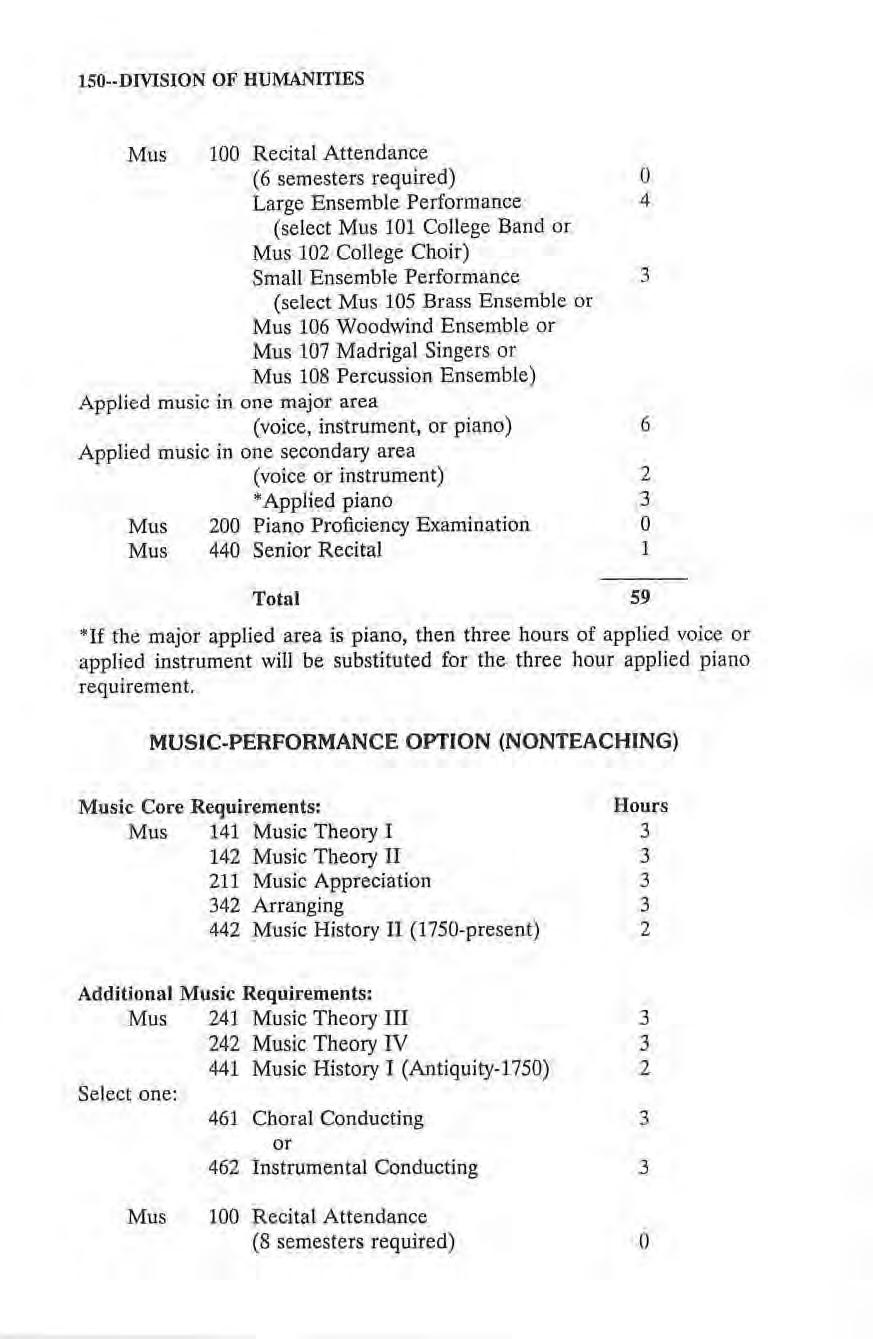
150--DMSION
Mus 100 Recital Attendance (6 semesters required) 0 Large Ensemble Performance 4 (select Mus 101 College Band or Mus 102 College Choir) Small Ensemble Performance 3 (select Mus 105 Brass Ensemble or Mus 106 Woodwind Ensemble or Mus 107 Madrigal Singers or Mus 108 Percussion Ensemble) Applied music in one major area (voice, instrument, or piano) 6 Applied music in one secondary area (voice or instrument) 2 *Applied piano 3 Mus 200 Piano Proficiency Examination 0 Mus 440 Senior Recital 1 Total 59
OF HUMANITIES
Music Core Requirements: Mus 141 Music Theory l 142 Music Theory Il 211 Music Appreciation 342 Arranging 442 Music History Il (1750-present) Additional Music Requirements: Mus 241 Music Theory ill 242 Music Theory IV 441 Music History I (Antiquity-1750) Select one: Mus 461 Choral Conducting o r 462 Instrumen tal Conducting 100 Recital Attendance (8 semesters required) Hours 3 3 3 3 2 3 3 2 3 3 0
* If the major applied area is piano, then two hours of applied voice or app li ed instrument will be substituted for the two hour appl ied piano requirement.
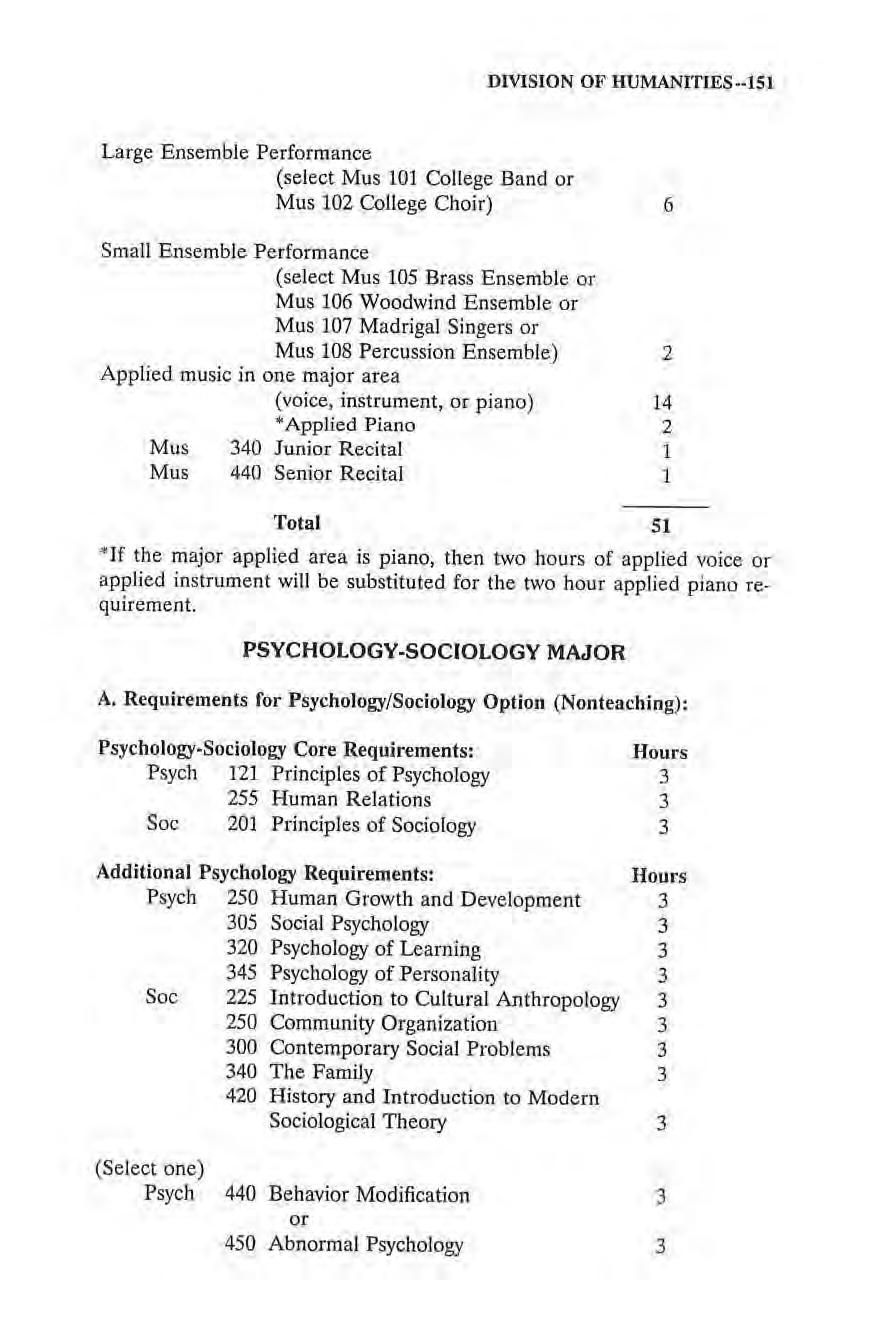
DMSION OF HUMANITJES --151 Large Ensemble Performance (select Mus
College Band or Mus
College Choir) Small Ensemble P erformance (select Mus
Brass Ensemble
Mus
Ensemble or Mus
Madrigal Singers or Mus
Percussion Ensemble) Applied music in one major area Mus Mus (voice, instrument, or piano) "Applied Piano 340 Junior Recital 440 Senior R ecital Total 6 2 14 2 1 1 51
101
102
105
or
106 ,Woodwind
107
108
Requirements for Psychology/Sociology Option (Nonteacbiag): Psychology-Sociology Core R,equirements: Psych 121 Principles of Psychology 255 Human Relations Soc 201 Principles of Sociology Additional Psychology Requirements: P sych 250 Human Growth and Development 305 Social Psychology 320 Psychology of L eaming 345 Psychology of P ersonality Soc 225 Introduction to Cultural Anthropology 250 Community Organization (Select one) 300 Contemporary Social Problems 340 The Family 420 History and Introduction to Modern Sociological Theory Psych 440 Behavior Modification or 450 Abnormal Psychology Hours 3 3 3 Hours 3 3 3 3 3 3 3 3 3 3 3
PSYCHOLOGY-SOCIOLOGY MAJOR A.
Electives (select 9 hours in one or more areas listed below)
Electives from one or more of the social science cognate areas of anthropology, economics, geography, history (not including Hist 400),
*Students taking a nonteaching option in Psychology may substitute any psychology elective for Hist 400.
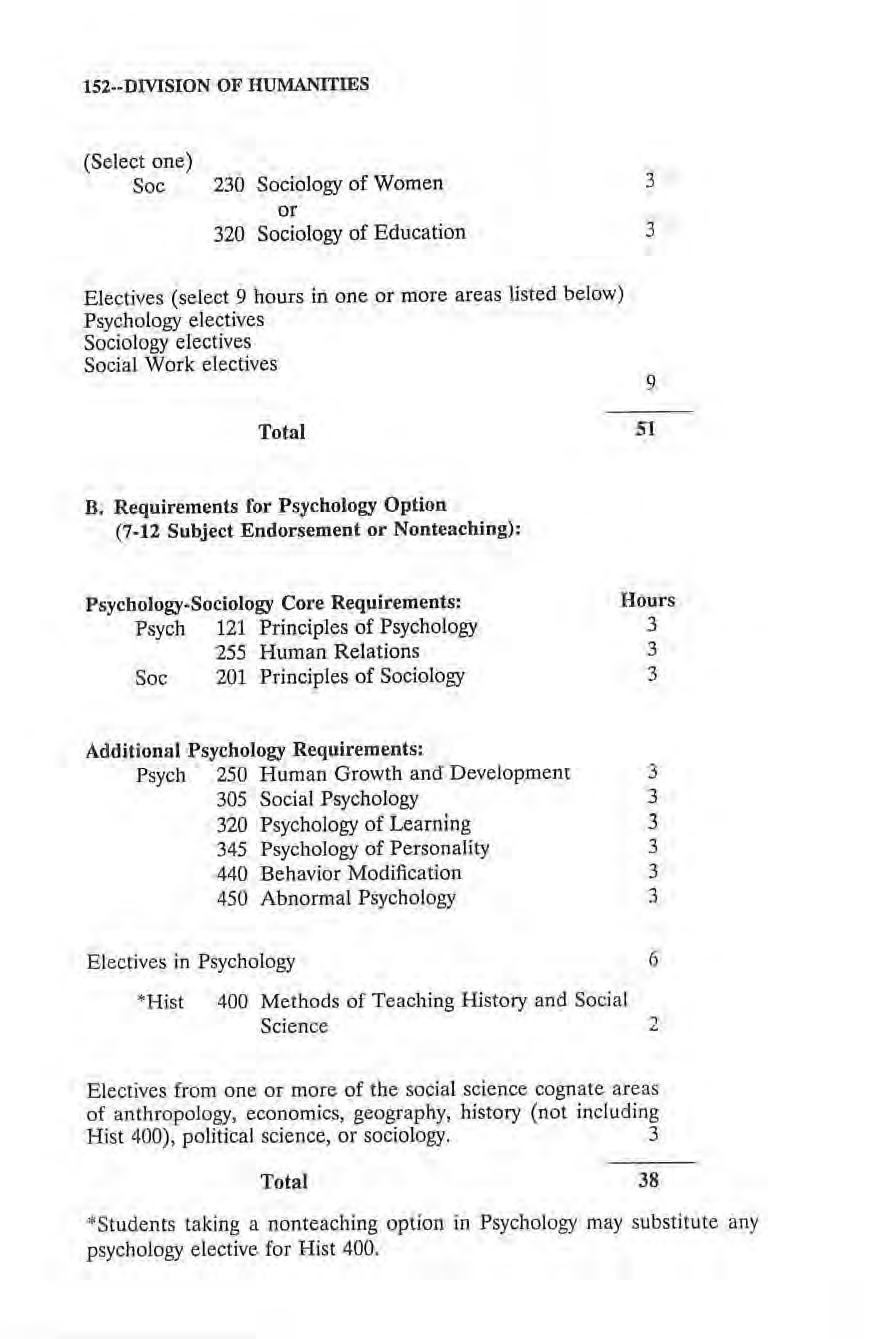
152 --DMSION OF HUMANITIES
one) Soc 230 Sociology of Women or 320 Sociology of Education
Psychology electives Sociology electives Social Work electives Total B. Requ ireme nts for Psycho logy Option (7-12 Subj ect Endorsement or Nonteaching): 3 3 9 .51 Psychology-Sociology Core Requirements : Psych 121 Principles of Psychology 255 Human Relations Hou rs 3 Soc 201 Principles of Sociology Addit iona l Psychology Requirements: Psych 250 Human Growth and Developmem 305 Social Psychology 320 Psychology of Learning 345 Psychology of Personality 440 Behavior Modification 450 Abnormal Psychology Electives in Psychology "Hist 400 Methods of Teaching History and Social 3 3 3 3 3 3 3 3 6 Science 2
(Select
sdence,
sociology. 3 Total 38
political
or
*Students taking a nonteaching option in Sociology may substitute any sociology elective for Hist 400.
In addition to completing the Psychology-Sociology Core Requirements , the student must complete the Additional Human Services Requirements and one other cognate area listed (1, 2, or 3). Field Work practicums or internships taken to satisfy requirements in one cognate area may not be appl ied to another.
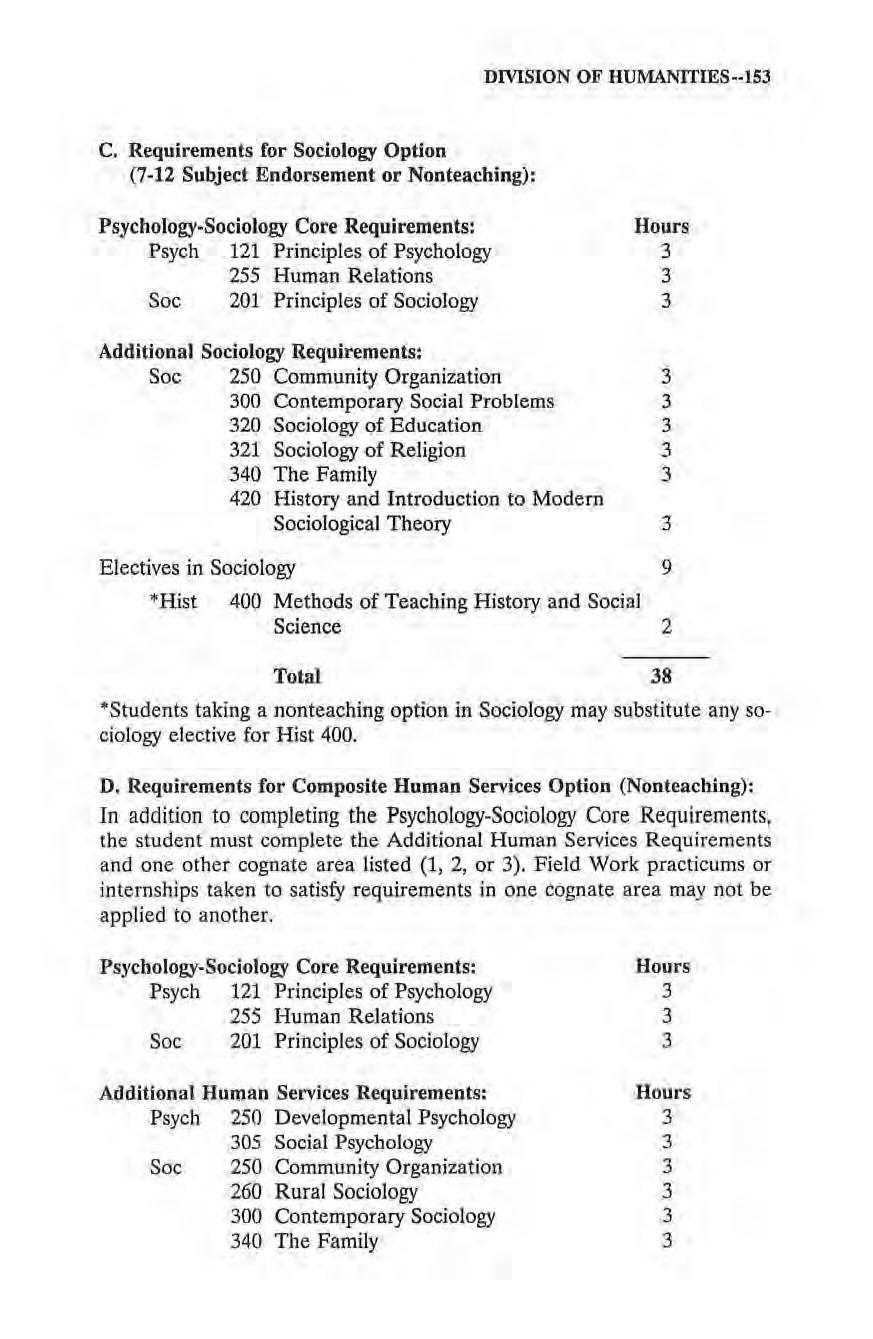
DMSION OF HUMANITIES--153
Psychology-Sociology Core Requirements: Psych 121 Principles of Psychology 255 Human Relations Soc 201 Principles of Sociology Additional Sociology Requirements: Soc 250 Community Organization 300 Contemporary Social Problems 320 Sociology of Education 321 Sociology of Religion 340 The Family 420 History and Introduction to Modem Sociological Theory Hours 3 3 3 3 3 3 3 3 3 Electives in Sociology 9 *Hist 400 Methods of Teaching History and Social Science 2 Total 38
C. Requirements for Sociology Option (7-12 Subject
Endorsement or Nonteaching):
D. Requirements for Com posite Human Services Option (Nonteaching):
Psychology-Sociology Core Requirements: Psych 121 Principles of Psychology 255 Human Relations Soc 201 Principles of Sociology Additional Hum an Services Requirements: Psych 250 Developmental Psychology 305 Social Psychology Soc 250 Community Organization 260 Rural Sociology 300 Contemporary Sociology 340 The Family Hours 3 3 3 Hours 3 3 3 3 3 3
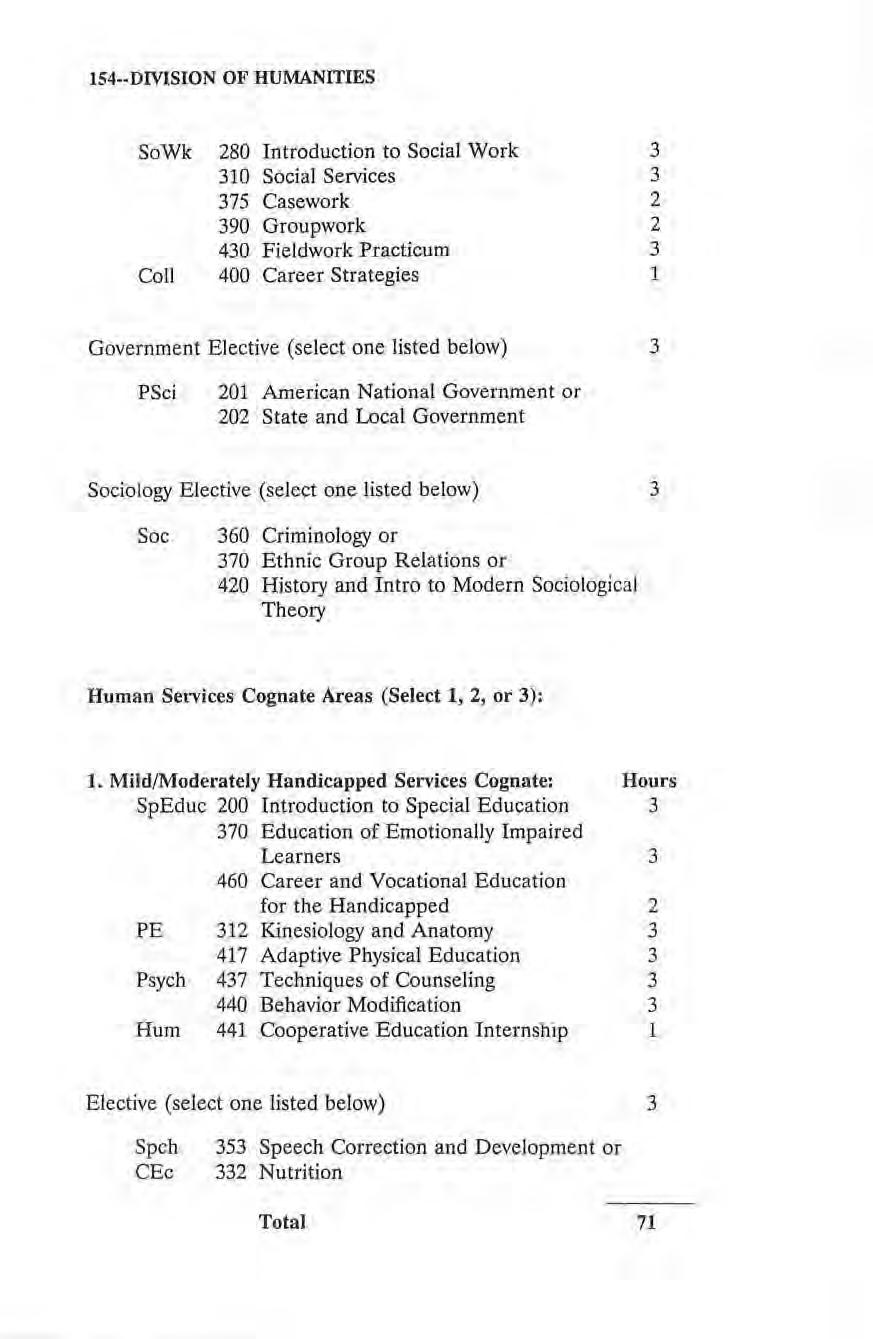
154-- DMSION OF H UMANITIES SoWk 280 Introduction to Social Work 310 Social Services 375 Casework 390 Groupwork 430 Fieldwork Practicum Coll 400 Career Strategies Government Elective (select one listed below) PSci 201 American National Government or 202 State and Local Government Sociology Elective (select one listed below) Soc 360 Criminology or 370 Ethnic Group Re lations or 3 3 2 2 3 1 3 3 420 History and Intro to Modern Sociological Theory Human Senices Cognate Areas (Select 1, 2, or 3): 1. Mild/Moderately Handicapped Services Cognate: SpEduc 200 Introduction to Special Education 370 Education of Emotionally Impaired Learners 460 Career and Vocational Educa tion for the Handicapped PE 312 Kinesiology and Anatomy 417 Adaptive Physical Education Psych 437 Techniques of Counseling 440 Behavior Modification Hours 3 3 2 3 3 3 3 Hum 441 Cooperative Education Internship 1 Elective (select one listed below) 3 Speh 353 Speech Correction and D evelopment or CEc 332 Nutrition Total 71
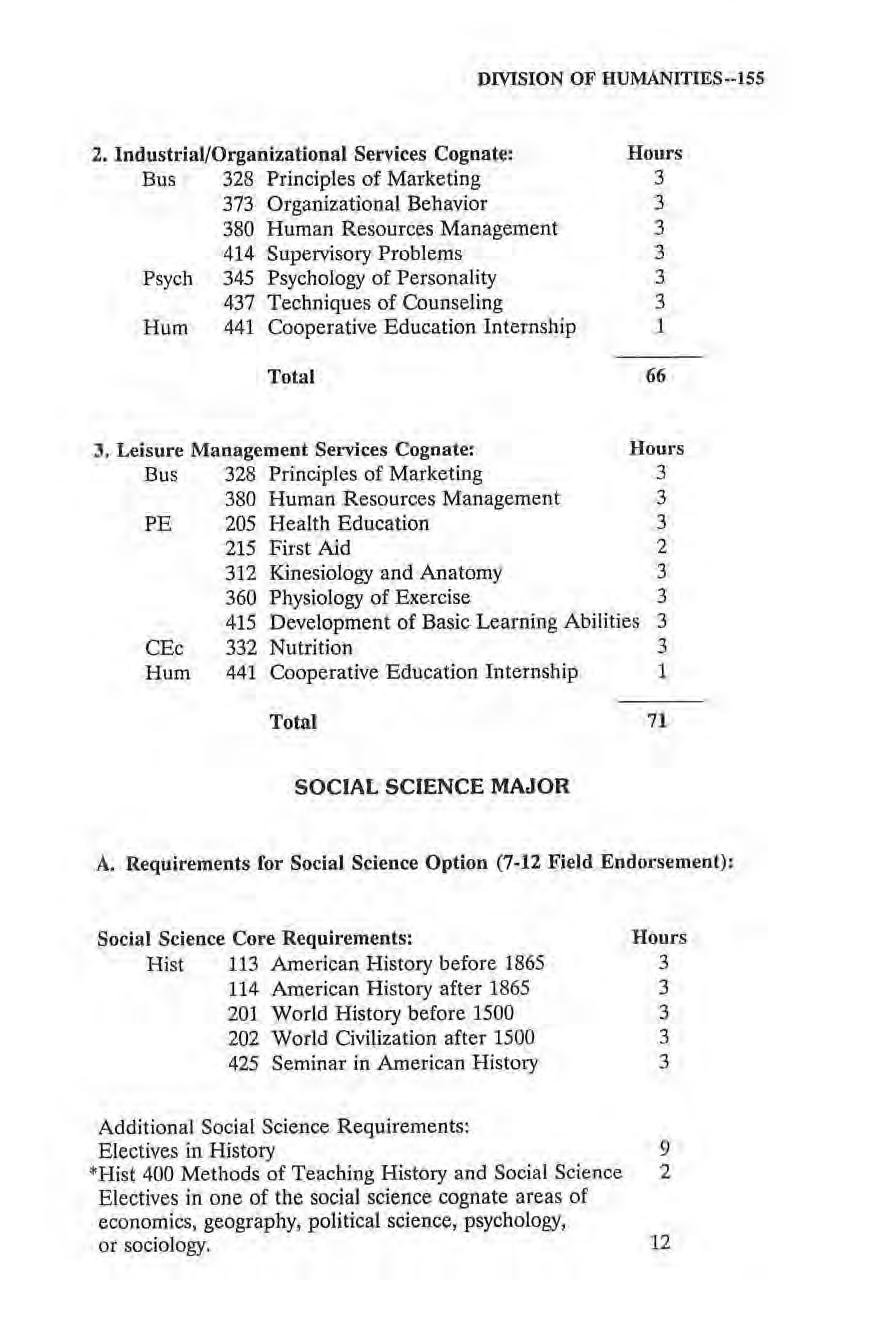
DMSION OF HUMANITIES--155 2. Industrial/Organi zationa l Services Cognate: Bus 328 Principles of Marketing 373 Organizational Behavior 380 Human Resources Manage ment 414 Supervisory Problems Psych 345 Psychology of Personality 437 Techniques of Counseling Hum 441 Cooperative Education Internship Total
Leisure Management Services Cognate: Bus 328 Principles of Marketing PE 380 Human Resources Management 205 Health Education 215 First Aid 312 Kinesiology and Anatomy 360 Physiology of Exercise Hours 3 3 3 3 3 3 1 66 Hours 3 3 3 2 3 3 CEc 415 Development of Basic Learning Abilities 332 Nutrition 3 3 1 Hum 441 Cooperative Education In ternship Total 71 SOCIAL SCIENCE MAJOR A. Requirements for Social Science Option (7-12 Field Endorsement): Social Science Co re Requirements: Hist 113 American History before 1865 114 American History after 1865 201 World History before 1500 202 World Civilization after 1500 425 Seminar in Amer ican History Additional Social Science Requirements: Electives in History *Hist 400 Methods of Teaching History and Social Science Electives in one of the social science cognate areas of economics, geography, political science, psychology, or sociology, Hours 3 3 3 3 3 9 2 12
3.
Excluding the 12 hour social science cognate area above, se lect electives in the remaining social science cognate areas of
*Students taking a nonteaching option in Social Science may substitute any history elective for Hist 400.
B. Requirements for History Option (7-12 Subj ect En d orsement or N on

'"Students taking a nonteach ing option in History may substitute any history elective for Hist 400.
SPEECH AND DRAMA MAJOR
A. Requiremen ts for Speech and Drama Education Op tion (7-12 Subj ect Endorsement:)
156--DMSION OF HUMANITIES
psychology, or sociology,
hours
cognate area . 24 Total 62
anthropology, economics, geography, political science,
with at least 3
in each
Social Science Co re Requirements: Hist 113 American History before 1865 114 American History after 1865 201 World History before 1500
World Civilization after 1500 425 Seminar in American History
History
Electives in History
from one
science
of a nthropology, economics, geography, political science, psychology, and sociology. Total H ours 3 3 3 3 3 15 2 6 38
teaching) :
202
Additional
Requirements:
*Hist 400 Methods of Teaching History and Social Science Electives
or more of the social
cognate areas
Speech and Drama Core Requirements: Speh 152 Fundamentals of Speech 232 In troduction to Theatre 235 Stagecrafts 254 Public Speaking 353 Speech Correction artd Development 357 I nterpretative Reading Hours 3 3 3 3 3 3
Acting/Directing Electives (Select three courses shown below):
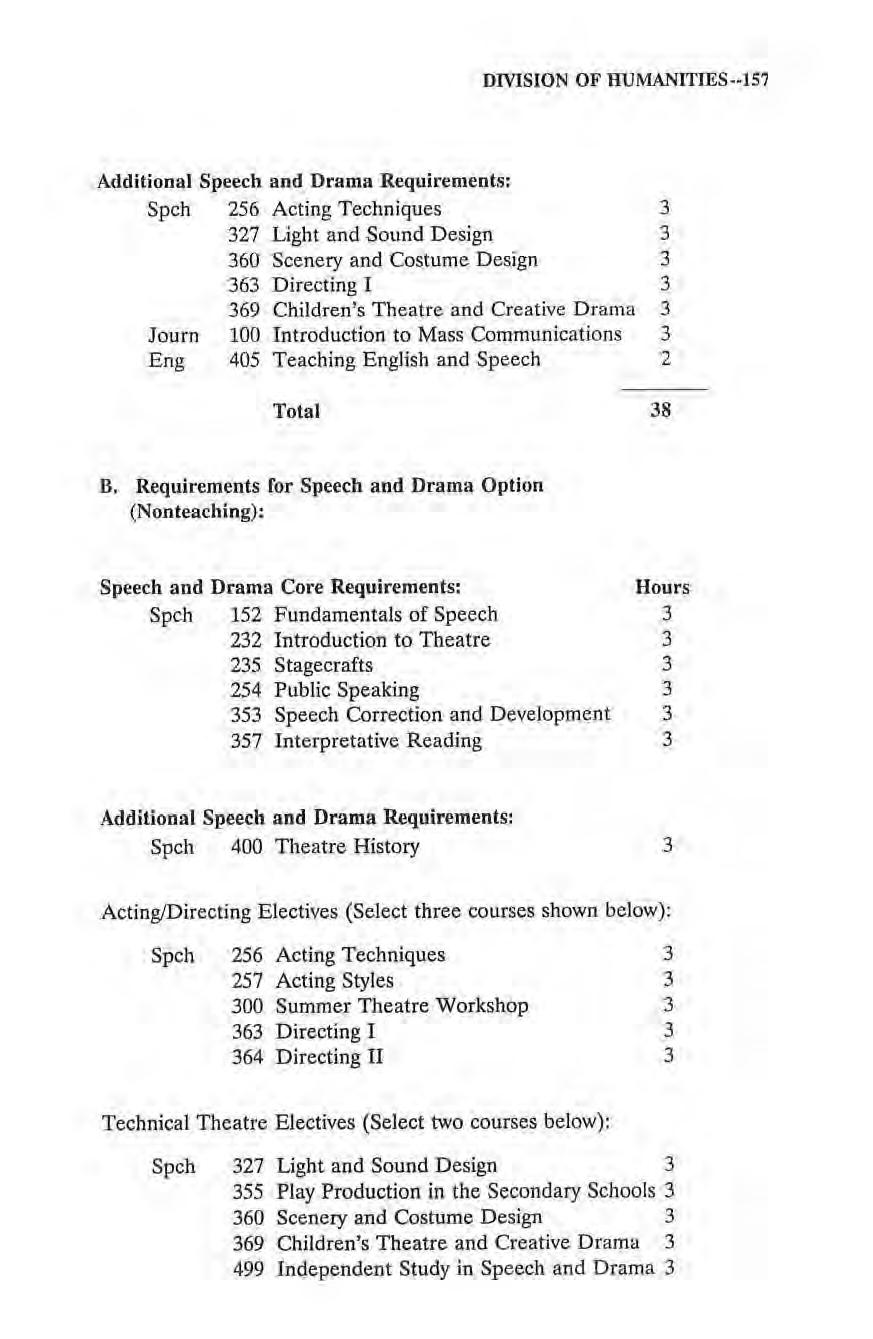
DMSION OF HUMANITIES 157 Additional Speech and Drama Requirements: Speh 256 Acting Techniques 3 327 Light and Sound Design 3 360 Scenery and Costume Design 3 363 Directing I 3 369 Children's Theat r e and Cr eative Drama 3 Journ 100 Introduction to Mass Communications 3 Eng 405 Teaching English and Speech 2 B. Requirements for Speech and Drama Opti on (Nonteac hin g): Speech and Drama C ore R equireme n ts: Speh 152 Fundamentals of Speech 232 Introduction to Theatre 235 Stagecrafts 254 Public Speaking 353 Speech Correction and D evelopment 357 Interpretative Reading Additional Speech an d Dra ma Requirements: Speh 400 Theatre History Hour s. 3 3 3 3 3 3 3
Speh 256 Acting Techniques 3 257 Acting Styles 3 300 Summer Theatre Workshop 3 363 D irecting I 3 364 Directing II 3
Theatre Electives
Speh 327 Light and Sound Design 3 355 Play Production in the Secondary Schools 3 360 Scenery and Costume Design 3 369 Childre n 's Theatre and Creative Drama 3 499 Independent Study in Speech and Drama 3
Technical
(Select two courses below):
Pre-Legal Study
Adequate preparation for entrance into a ranking law school requires a bachelor's degree. Neither the committee on pre-legal education of the American Bar Association nor leading law schools specify a particular undergraduate. major or prescribe a specific pre-law program, but they do stress the ability to read perceptively, to write intelligently, to use a library, and to evaluate evidence. Success in law school requires intellectual depth and breadth as well as certain skills and insights r e levant to law study. Since many of the goals of legal education are also the goals of liberal education, law schools recommend that pre-law students obtain the widest possible undergraduate experience consistent with their professional objectives. Literate; well-informed students with broad general educations tend to succeed in law school. Those students aspiring to enter law school, then, may major and/or minor in any number of fields that will ajd them in attaining the following:
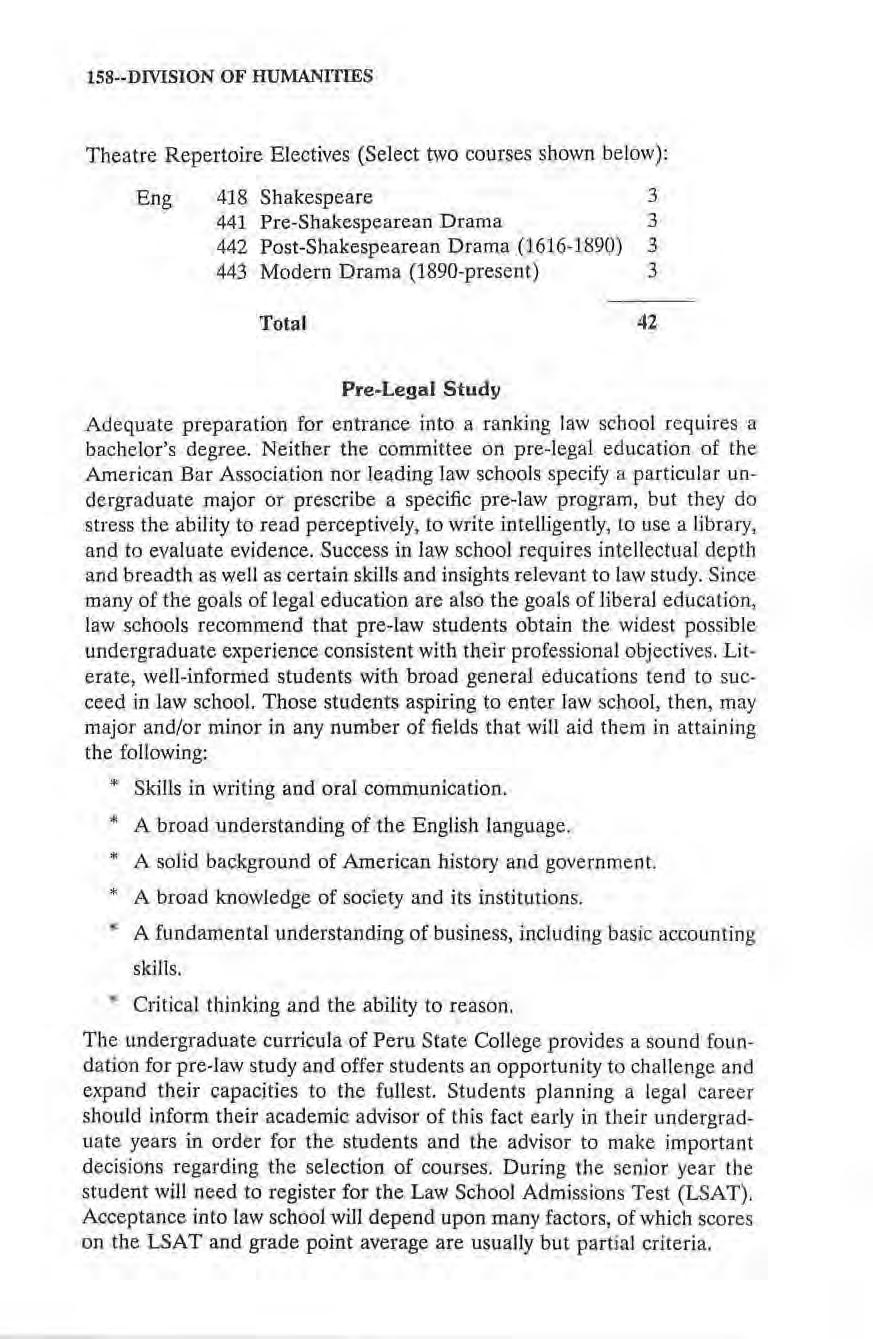
* Skills in writing and oral communication.
"' A broad understanding of the English language.
* A solid background of American history and government.
'" A broad knowledge of society and its institutio ns .
A fundamental understanding of business, including basic accounting skjlls.
$ Ciitical thinking and the ability to reason.
Tbe undergraduate curricula of Peru State College provides a sound foundation for pre-law study and offer students an opportunity to challenge and expand their capacities to the fullest. Students planning a legal career should inform their academic advisor of th is fact early in their undergraduate years in order for the students and the advisor to make important decisions regarding the selection of courses. During the senlor year the student will need to register for the Law School Admissions Test (LSAT). Acceptance into law school will depend upon many factors, of which scores on the LSAT and grade pomt average are usually but partial criteria.
158--DIVISION OF HUMANITIES Theat re Repertoire Electives (Select two co urses shown below): Eng 418 Shakespeare 3 441 Pre-Shakespearea n Drama 3 442 Post-Shakespearean Drama (1616-1890) 3 443 Modern Drama (1890-present) 3 Total 42
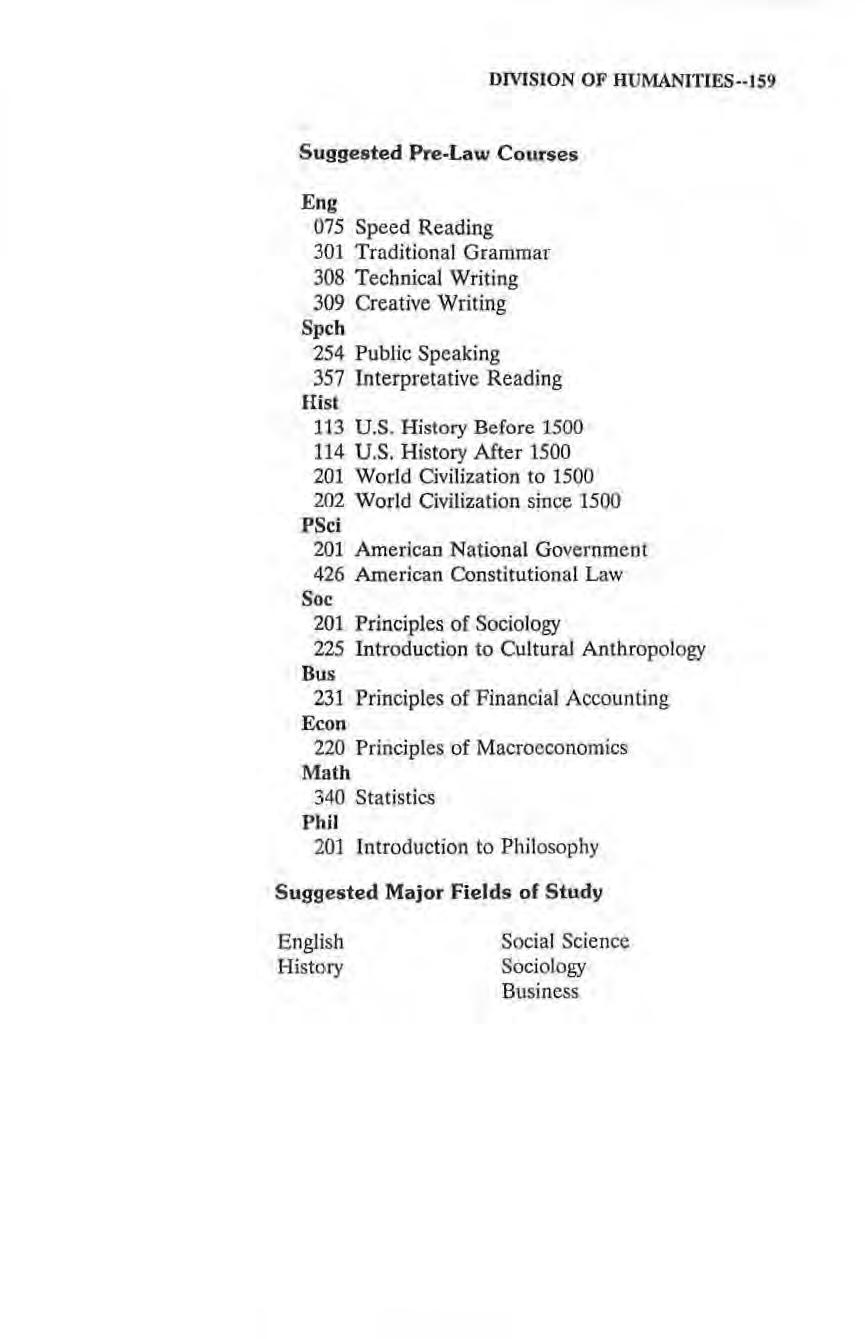
DMSION OF HUMANITIES · - 159 S uggested Pre-Law Courses Eng 075 Speed Reading 301 Tradi ti o nal Grammar 308 TechnicaJ Writing 309 Creative Wr iting Speh 254 Public Speakin g 357 Interpretative Reading Hi st 113 U.S. History Before 1500 114 U.S. His to ry After 1500 201 World Civilization to 1500 202 World Civilization since 1500 PSci 201 American National Government 426 American Cons t itutional Law Soc 201 Pri nciples of Socio logy 225 Intro ductio n to C ultur aJ Anthropology Bus 231 P rinc iples of Financial Accounting Econ 220 Principles of Macroeconomics Math 340 Statistics Ph il 201 Introduction to Philosophy Suggested Major Fie l ds of Study English H istory Social Science Sociology B usiness
Course Descriptions

101 Drawing I (3 hours)
A study of basic drawing techniques using a variety of drawing media.
(Each Fall semester)
102 Drawing II (3 hours)
Prerequisite: Art 101.
A co ntinu ation of Drawing I with an emp hasis on fig ure drawing and improvi ng of techiniques.
(Each Spring semester)
203 2-D Design (3 hours) 204
A st udy of two-dimensional design wit h an e mph asis on color theory.
(Each Spring semester)
3-D Des ign (3 hours)
A study of three-dimensional d esign usi ng a variety of media .
(Each Fall semester)
Art Ap preciation (3 hours)
The st udy of a rt principles thro ugh crafts, painting, sculp ture, and a rchitecture.
(Each semester)
Water Color Painting (3 hours)
Pre r equi site: Art 101 , 102, 203.
T his course e mphas izes compositions in tran spa re nt wateT color.
(Each Spring semester)
Printing Processres (3 hours) >- -'-
color using opaque and , A ' •~
This course introduces the history and techniques of the graphic arts of block printing, etching, lithography, and silk screen printing.
(Each Spring semester)
Directed Study iu1 Art (1 -4 hours)
Senior Stan ding.
(Offered as needt·d)
160--DMSION OF HUMANITIES
A rt
206 210 221 297
:'._o.,.'f.
,,...J Cr \ 1,.1\
Special Topics in Art (1-4 hours)
Freshman-Sophomore standing.
(Offered as needed)
Pottery (3 hours)
Prerequisite: Art 204.
This course offers experiences in hand-built and thrown projects including a basic study of glaze preparation and clay analysis. Students are limited to 3 h9urs credit p e r semester. This course may be repeated for a total ofI'. hours.
(Each Fall semester) 12..
Methods and Supervision (2 hours)
Prerequisites: Art 101, 103, and 203 or 204. The study of contemporary art education teaching techniques, lesson plans, teaching experiences, and the ordering of materials with an emphasis upon the use of materials in the school art program.
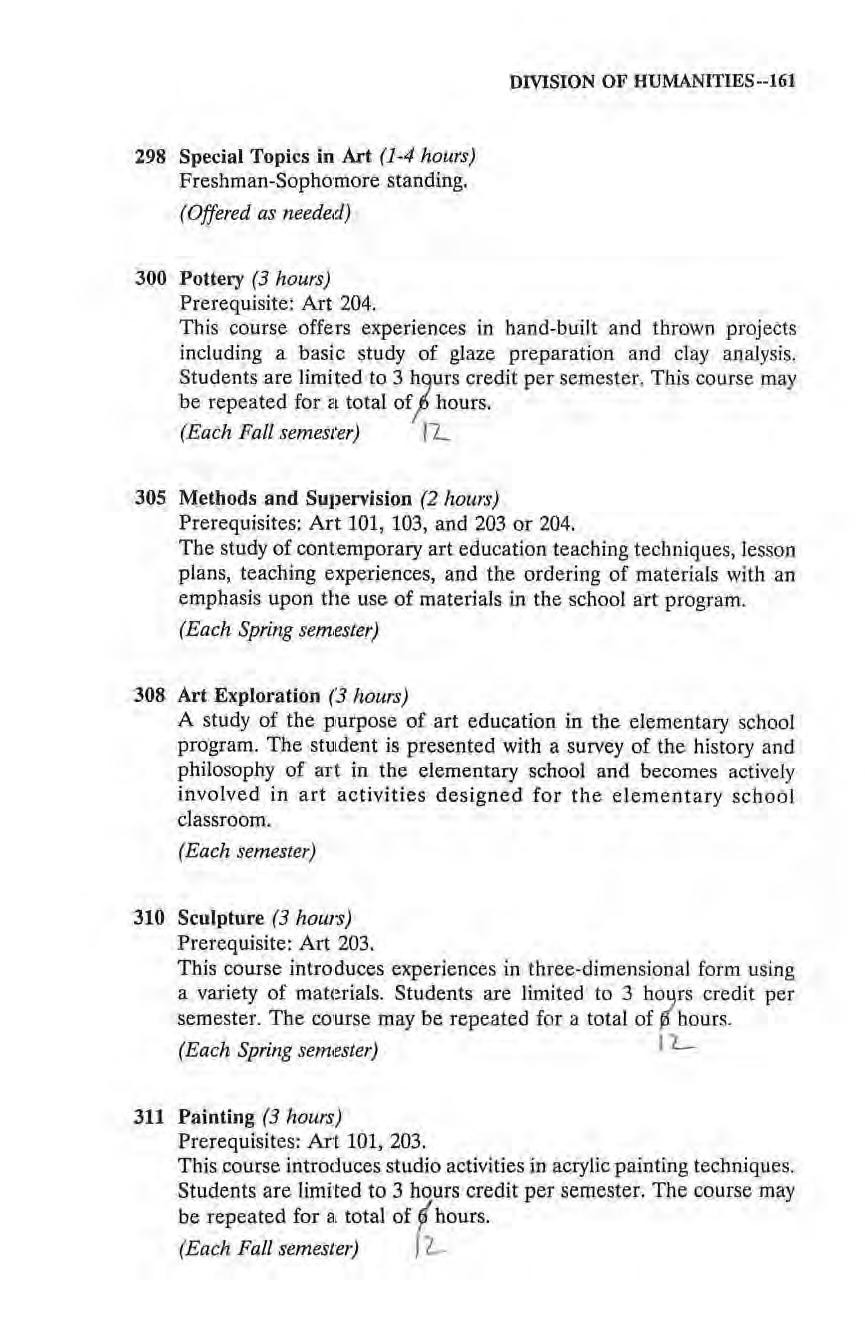
(Each Spring semester)
Art Exploration (3 hours)
A study of the purpose of art education in the elementary school program. The strndent is presented with a survey of the history and philosophy of art in the elementary school and becomes actively involved in art activities designed for the e l ementary school classroom.
(Each semester)
Scu lpture (3 hours)
Prerequisite: Art 203.
This course introduces experiences in three-dimensional form using a variety of materials. Students are limited to 3 bo~rs credit per semester. The course may be repeated for a total of fi hours.
(Each Spring sem,ester)
Pai nting (3 hours)
Prerequisites: Art 101, 203.
This course introduces studio activities in acrylic painting techniques. Students are limited to 3 hours credit per semester. The course may be repeated for a. total of hours.
(Each Fall semester) fL-
298 300 305 308 310 311 OMSION OF HUMANITIES--1 61
IL
317 Art History I (3 hours)
A study of painting, sculpture, and architecture from ancient tim es to the Baroque.
(Fall semeste1; even- years)
318 Art History II (3 hours)
A study of art from the 1800s through contemporary art trends. (Fall semester, odd years)
325
F igure Drawing (3 hours)
Prerequisite: Art 101, 102, 203. Figure Drawing is a course that de a ls with drawin g of th e human anatomy from live models.
(Each Fall semeste,r)
350
Studio Activities (3 hours)
An integrated cou,rse consisting of students working in various art mediums, Students will be allowed to work in the field of th eir choosing: painting, sculpture, etc. Offered as other s tudio courses: section 1, section 21, section 3, section 4. These sections will be taugh t concurrently. c- r\- V'7

(Each semester) \1
400
Senior Exhibition (0 hours)
Prerequisite: Senior standing. Senior Exhibition is the capstone course for a student's c r e ative experience in art at PSC. A student in this course must create a minimum of 2 new major pieces, mount and hang their exhjbition, design and print announcements/mailers, create their resum e, as well as document their work by the use of s lides (20 slides s ubmitte d to the department).
(Each semester)
497 Directed Study in Art (1 -4 hours) Senior Standing.
(Offered as needed)
498 Special Topics in Art (1-4 hours) Junior-Senior standing.
( Offered as needed)
499 Independent StudJf in Art (1-3 hours) Junior standing.
( Offered as needed)
162--DMSION
OF HUMANITIES
E nglish
060 Study Skills (1 hour, credit/no credit)
This course is designed to he lp students learn effective study skills which can be us(:d to promote academic success in college. Units to be covered include managing time, improving memory, taking lecture notes, rea din g te>.1.books, taking exa min atio ns, writing themes and reports, making ora l reports, improving scholastic moti vatio n , improving interpe rsonal skills, and improvi ng concen tration. This course is req uir ed of all freshman probationary studen t s who have attempted 2 1 h ours or less. Tllis course is open to a ll st udents.
(Each semester)
070 Readin g (I hour, credit/no credit)
This course is designed to help students learn effective reading ski lls which can be usc!d to promote academic success in college. Units to be co vered include r e adin g comprehens ion, vocabulary development, and word knowledge. This cou rse is a developmental requirement for students identified as needing reading improvement training. Students required to e nroll in English 070 must su ccessfu ll y complete the post - test with the necessary passing sco r e before enrolling in English 101. Stu.dents who do not earn the necessary passing score will be required to enroll in Englis h 071.
(Each semester)
071 Reading (J hour, credit/no credit)
This course is a co ntinu ation of English 070 reading; that is, this course is designed to help st ud ents learn effective reading skills which can be used to promote academic success in college. Uni ts to be covered include reading comprehension, vocabu lary developm e nt, and word knowledge. This co u rse is a developmental requirement for students idi,ntified as neerung reading improveme nt training. Students required to enroll in English 071 must successfully complete the post-test wi th th e necessary passing score before enrolling in English 101. Students who do not earn the necessary passing sco re will be required to visit with the Vi ce President for Student Affairs to di scuss independent course options th at can be devised by the director of th e Communication Skills Center to pro mote student success.
(Each semester)
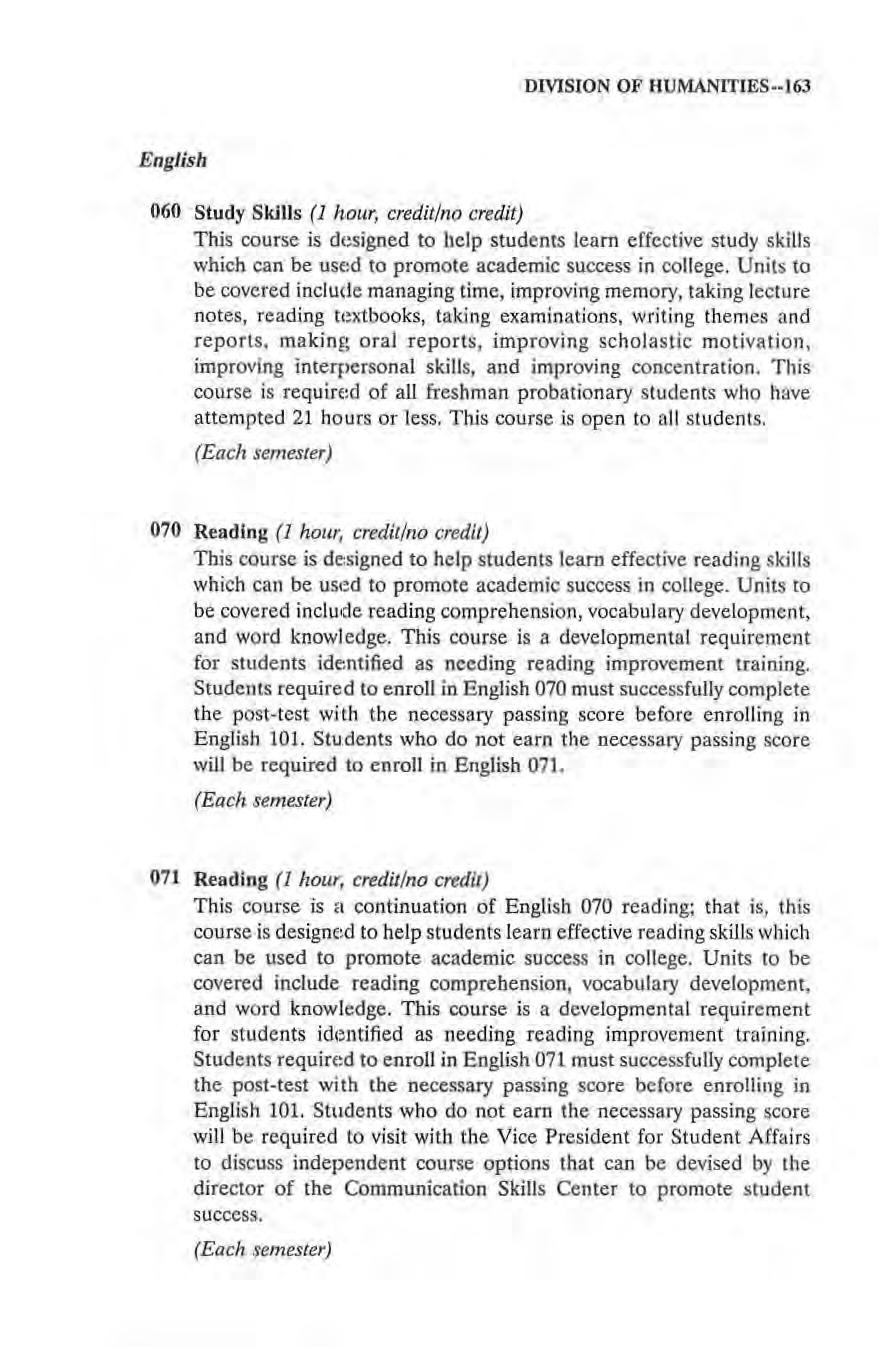
DMSION OF R UMANITIES--163
075 Speed Reading (1 hour, credit/no credit)
This course is designed to help students learn effective speed read ing skills which can be used to promote academic success in college. Units to be covered include warm-up letters, warm-up words, column reading, eye movement, paced reading, and timed reading. This course is open to all students.
(Offered as needed)
080 Composition (1 hour, credit/no credit)
This course is des1igned to help students learn effective writing skills which can be used! to promote academic success in college. Units to be covered includle capitalization, grammar, punctuation , spelling, planning, developing paragraphs, composition skills, and English fundamentals. T his -course is a developmen ta l requirement fo r students ide ntified as needing writing improvement training. Students required to enroll :in English 080 must successfully complete th e posttest with the necessary passing score before enrolling in English 101. Students who do not earn the necessary passing score wilJ be required to enroll in Englis•h 081.
(Each semester)
081 Compos it ion (1 how; credit/no credit)
This course is a continuation of English 080 composition; that is, this course is designed to help students learn effective writing skills which can be used to promote academ ic success in college. Units to be covered include capitalization, grammar, punctuation , spelling, planning, develop.ing paragraphs, composition skills, and English fundamentals. This course is a developm e ntal requirement fo r s tudents identified as needing writing improvement training. Stud e nts required to e nroll in English 081 must successfully complete the posttest with the necessary passing score before enrolling in English 101. Students who do not earn the necessa ry passing score will be required to visit with the Vice President for Student Affairs to discuss independent course options tbat can be devi sed by the director of the Communication Skills Center to promote student success.
(Each semester)
101 English Compositi,on (3 hours)
A study of the principles of clear and effective expression as app lied to the sentence, paragraph, and the who le composition. A review of grammar, mechanics, and correct usage. Training in organization, and the writing of short and long papers. Required course for all freshmen. (Note: Students who rank at the 85th percentile or higher on the English po:rtion of the ACT may be excused from English 101.)
(Each semester)

164 --DMSION OF HUMANITIES
201 Advanced English Composition (3 hours)
Prerequisite: One semester e lap sed time foJlowing success ful completion of Eng 101.
Advanced training in writing a variety of types of p apers with emphasis placed on wr iting which requires th e student to think critically, support generalizations, and appropriately acknowledge sources of information.
(Each semester)
2 02 Appreciation of ll,iterature (3 hours)
Meets a generall e ducation requirement designed to increase the student's apprec:iation of literature with an emphasis on modern literary forms .

(Each semeste,)
203 Literature f'or Children through Adolescence (3 hours)
A survey of literature for children through adolescence with an emphasis on applying the principles of evaluation to selected books from both traditional and modern picture books, poems, and stories.
(Each Spring semester)
222 World Literature? to 1 500 (3 hours)
An introd uction to classical and med ieval traditions in Western literature.
(Spring semester, even years)
223 Non-Western Literature (3 hours)
An examination of significant literary works of Afri ca, the Middle East, Asia, Australia, New Zealand, L atin Amer i ca, and the Caribbean.
(Each Semester)
225 Short Story (2 hours)
The major emphasis of this course is on the development of the sho rt s tory in Amer ican literature.
(Spring semester, odd years)
275 Film C riticism ( 3 hours)
Pre requisite: English 202 or p e rmission of instructor.
An examination of the several points of view from which fi lm may be criticized with an emphasis on authorship and techniques of the film -maker.
(Offered as needi?d)
DMSION OF HUMANITIES--16S
297 Directed Study in E nglish (1-4 hours) Senior Standing.
(Offered as needed')
298 Special Topics in English (1-4 hours)
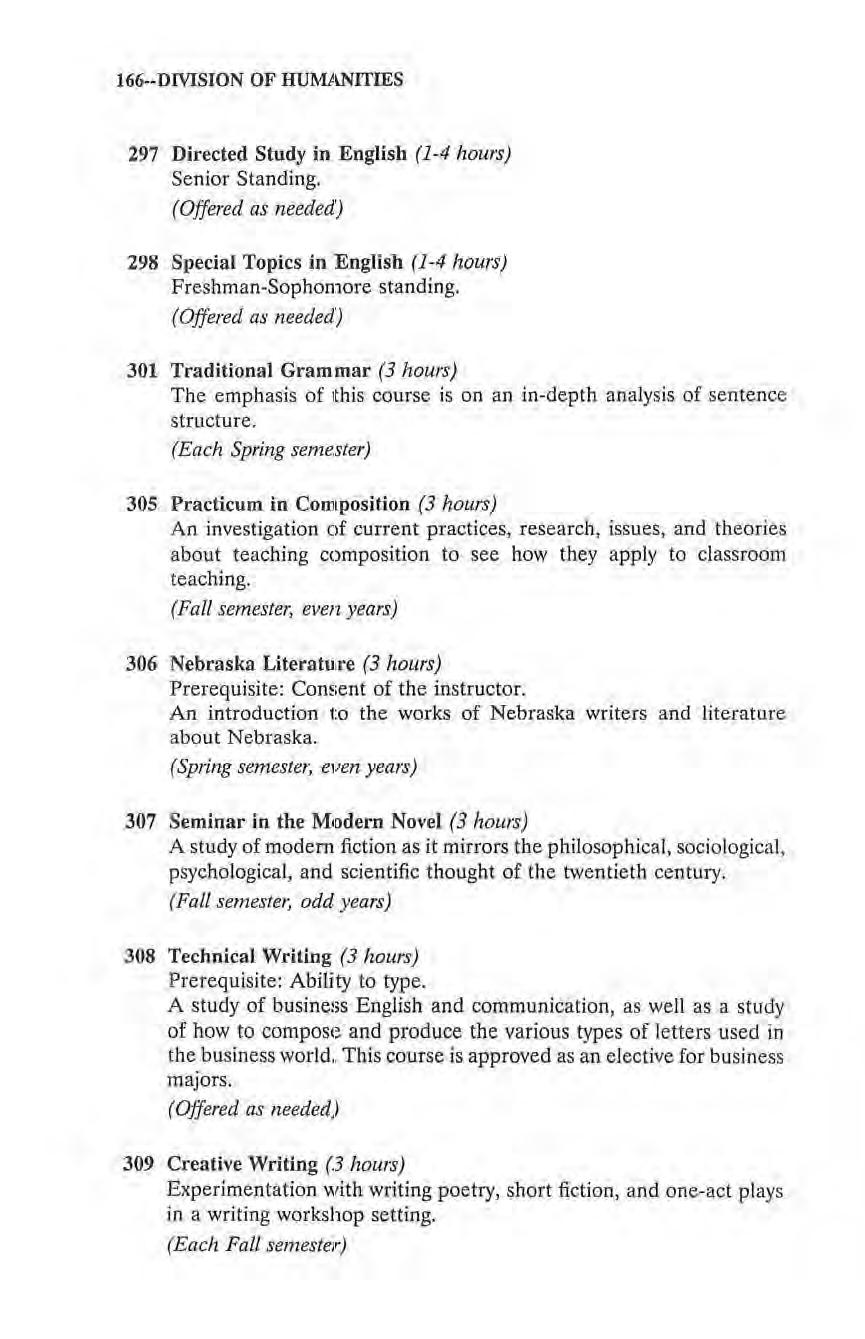
Freshman-Sophomore stand ing {Offered as needed')
301 T raditio na l Grammar (3 hours)
The emphasis of 1this course is on an in-depth analysis of sentence structure .
(Each Spring semester)
305 Practicum in Com1position (3 hours)
An investigation of current practices, research, issues, and theories about teaching composition to see how they apply to classroom teaching.
(Fall semester, even years)
306 Nebraska Literature (3 hours)
Prerequisite: Consent of th e instructor. An introduction to the works of Nebraska writers and literature about Nebraska.
(Spring semester, e11en years)
307 Seminar in the Modern Novel (3 hours)
A study of modern fiction as it mirrors the philosophical, sociological , psychological, and scientific thought of the twentieth century.
(Fall semeste,; odd years)
308 Technica l Writing (3 hours)
Prerequisite : Ability to type. A study of business English and communication, as well as a study of how to compose and produce the various types of letters used in the business world .. This course is approved as an elective for business majors.
(Offered as 1teeded)
309 Creative Writing (.3 hours)
Experimentation with writing poetry, s.hort fiction, and one-~ct plays in a writing workshop setting.
(Each Fall semester)
166--DMSION
OF HUMANITIES
318 Early Europ ean Literature (3 hours)
A survey of representative works of E u ropean writers from the Norman conquest to the sta rt of the English Romantic period . Emphasis will be placed on English writers. (Fall semester, odd years)
321 Romantic Periool (3 hours)
A study of the major Romant ic poets. Some attention is given to the novel and pre-Romantics such as Blake. (Spring sem ester, odd yea rs)
3'23 Victorian P eriod (3 hours)
Nineteenth century England as seen by the major poets and novelists with some attenltion given to the prose writers.
(Fall semester, e~•en years)
324 American Literature I (3 hours)
An historical survey of significant American writing from the Colonial Period to 1865. Major writers receive chief emphasis. (Fall semester, odd years)
325 American Literature U (3 hours)
A conti nu ation of English 324 from 1865 to present. (Each Spring semester)
328 Modern Poetry (3 hou rs)
A study of Briitish and American poet ry of this century and its relevance to co111temporary literature an d life.
(Spring semester, even years)
405 Teaching English and Speech (2 hours)
A study of the basic objectives and the scope of English, speech, and debate in the secondary curriculu m. Current techniques used in teaching the three areas are examined and evaluated. (Spring semester, even years)
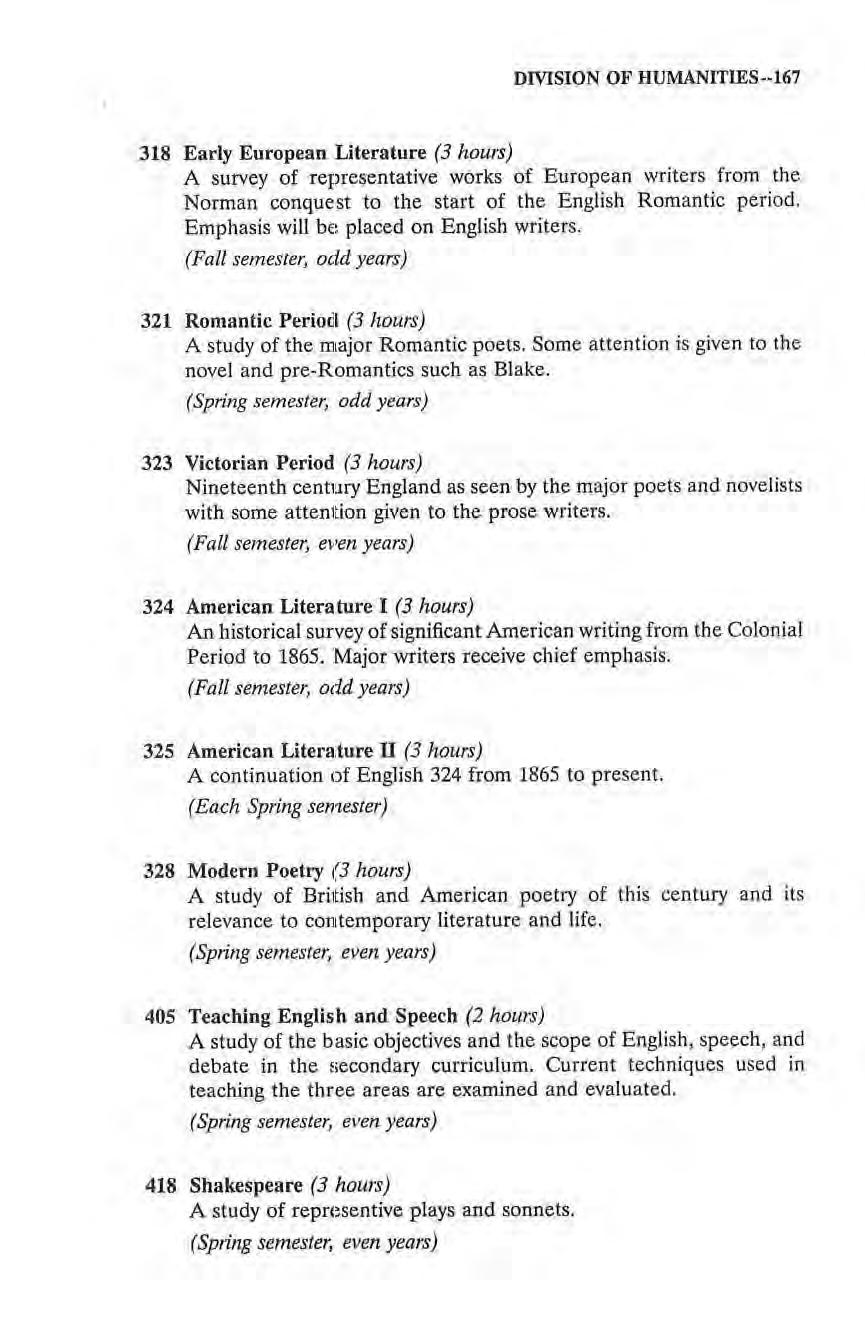
418 Shakespeare (3 hours)
A study of represen tive plays and sonnets. (Spring semester, even years)
DMSIO N OF HUMANITlES-- 167
440 History of the EnRlish Lan~age (3 hours)
A study of the growth of modern English through examination of changes in the sounds, forms, and syntax that have occurred in the language and the development of vocabulary.
(Fall semeste,~ odd years)
441 Pre-Shakespearean Drama (3 hours)
The development of drama and theatre through classical and native channels to their c;ulmination in Elizabethan drama.
(Fall semester, odd years)
442 Post-Shakespearean Drama (1616-1890) (3 hou,;s)
This course provides the basis for the appreciation and understanding of the variety and growth of dramatic literature during the years following the death of Shakespeare to the advent of modern theatre.
(Fall semester, even years)
443 Mode.rn Drama 1890-present (3 hours)
This course provides the student the opportunity to follow the growth of modern dramatic techniques in the western world; the interaction of these techniqu<:s with the modern movements in art, music and other art forms; and awareness of the recent heritage of dramatic literature and its position in the world of thought and emotion.
(Spring semester, odd years)
497 Directed Study in English (1-4 hours) Senior Standing.
(Offered as needed)
498 Special Topics in English (1 -4 hours)
Junior -Senior standing.
(Offered as needed)
499 Independent Study in English (1-3 hours) Junior standing.
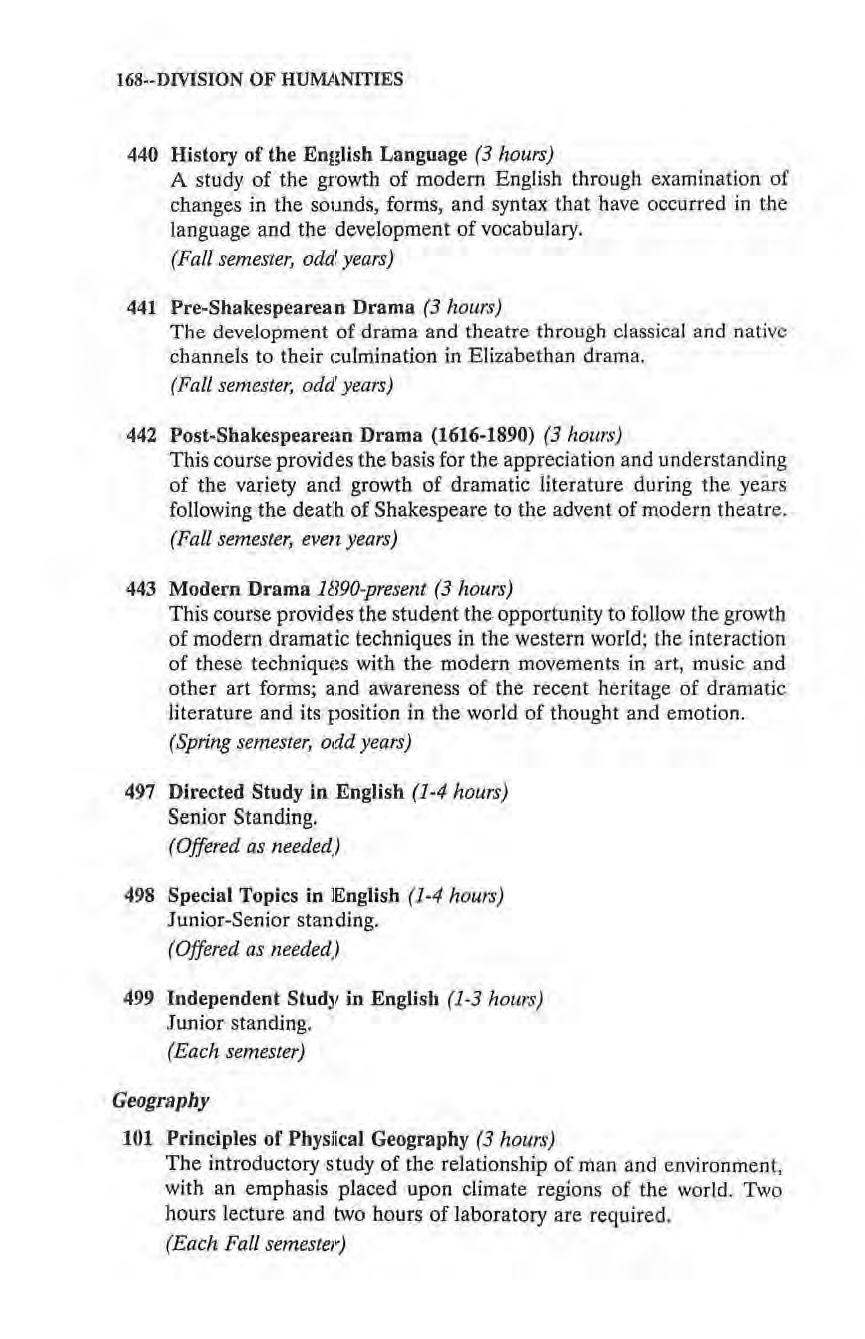
(Each semester)
Geography
101 Principles of Physiical Geography (3 hours)
The introductory study of the relationship of man and environment, with an emphasis placed upon climate regions of the world. Two hours lecture and two hours of la boratory are required.
(Each Fall semester)
168--DMSION OF
HUMANITIES
103 Human Geography (3 hours)
Hum an Geogr:iphy is the study of the human elements of the environment with emphasis on the origins of culture, population trends, world cultures, economies of man, and urban and political systems.
(Spring semester, odd years)
297 Directed Study ii.n Geography (1-4 hours)
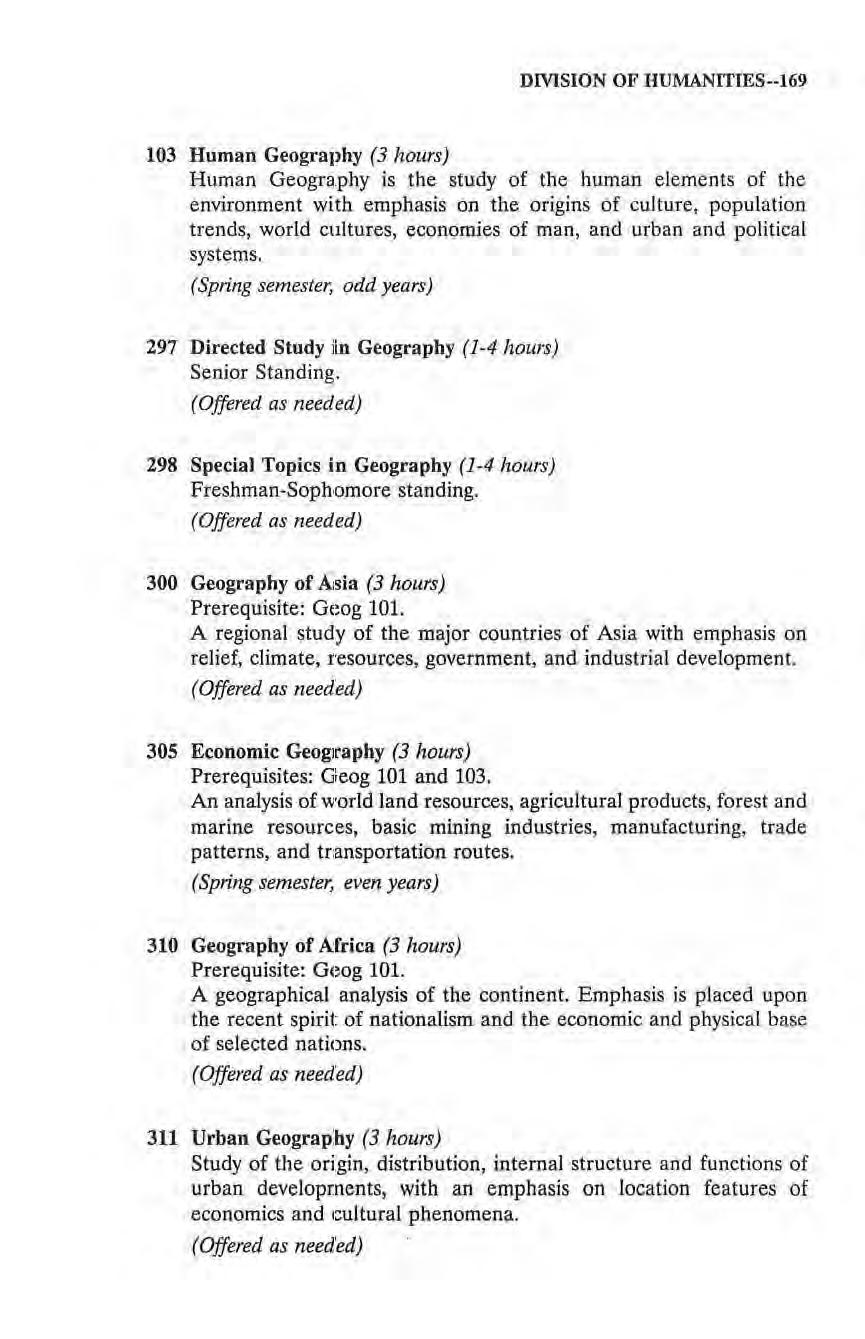
Senior Standing.
(Offered as needed)
298 Special Topics in Geography (1-4 hours)
Freshman-Sophomore standing.
(Offered as needed)
300 Geography of Aisia (3 hours)
Prerequisite: Geog 101.
A regional study of the major countries of Asia with emphasis on relief, climate, resources, government, and industrial development
(Offered as needed)
305 Economic Geog1raphy (3 hours)
Prerequis ites: Geog 101 and 103.
An analysis of world land resources, agricultural products, forest and marine resources, basic mining industries, manufacturing, trade patterns, and tr:ansportation routes. (Spring semester, even. years)
310 Geography of A£rica (3 hours)
Prerequisite: Geog 101.
A geographical analysis of the continent. Emphasis is placed upon the r,ecent spirit of nationalism and the economic and physical base of selected nations.
(Offered as needed)
311 Urban Geography (3 hours)
Study of the origin, distribution, internal structure and functions of urban developments, with an emphasis on location features of eco nomics and cultural phenomena.
(Offered as needed)
DMSION OF HUMANITIES --169
3 12 Geography of Angl,o-America (3 hours)
Prerequisite : Geog 101 or sen ior standing.
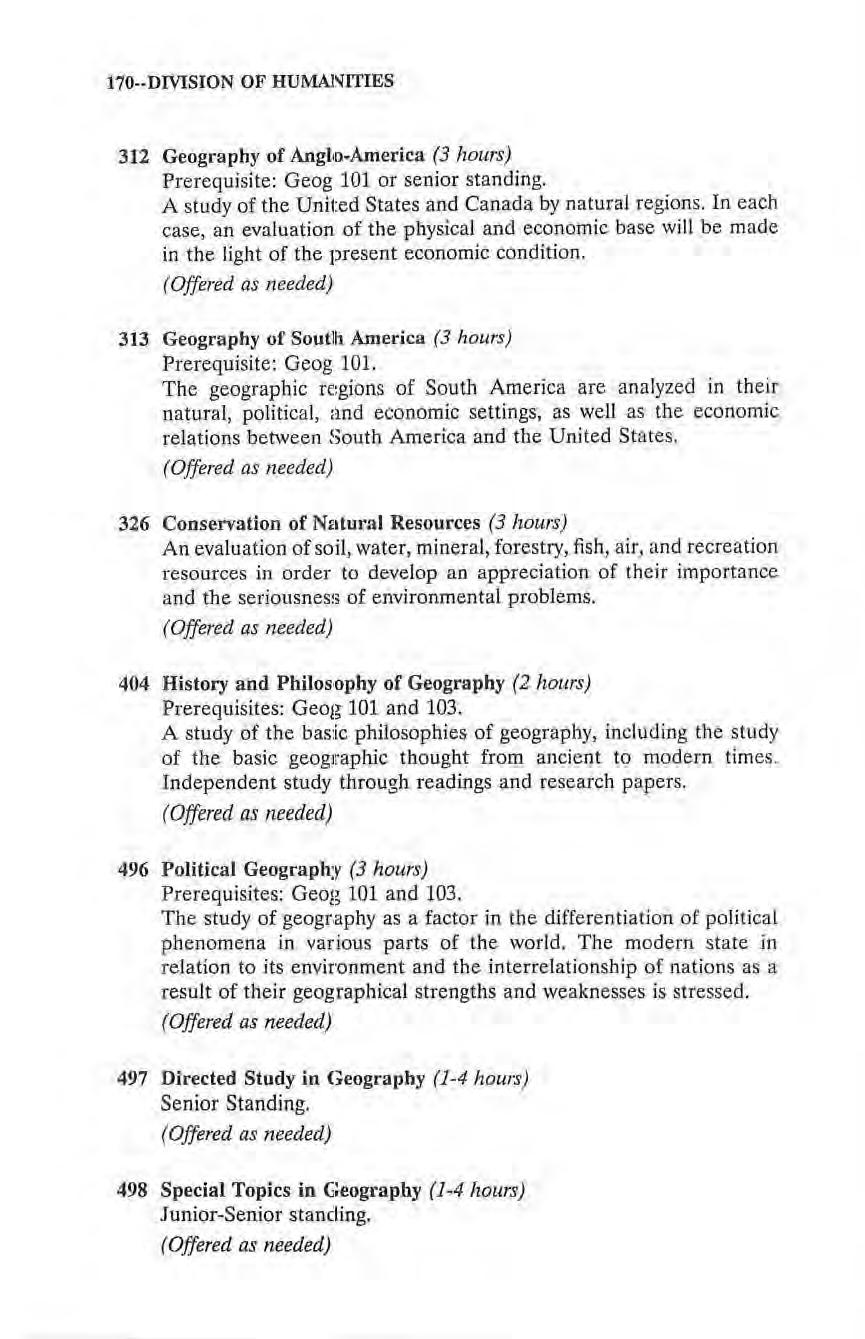
A study of the United States and Canada by natural regions In each case, an evaluation of t he physical and economic base will be made in the light of the present economic condition.
(Offered as needed)
313 Geog rap hy o f Soutlh. America (3 hours)
Prerequisite: Geog 101.
The geographic re:gions of South America are analyzed in their natural, politica l, and economic settings, as well as the economic re lations between South America and the United States.
(Offered as needed)
326 Co nservation of Natural Resources (3 hours)
An evaluation of soil, water, mineral, forestry, fish, air, and recreation resources in order to d evelop a n appreciation of their importance a nd the seriousness of environmental problems.
(Offered as needed)
404 History and Philos,ophy of Geography (2 hours)
Pre r eq ui sites : Geog 101 and 103 .
A study of the bas:ic philosophies of geography, including the study of the basic geog1raphic thought from ancient to modern times. Independent study through readings and research papers,
(Offe red as needed)
496 Political Geograph;y (3 hours)
Prerequisites: Geog 101 and 103.
The study of geography as a factor in the diffe re ntiation of political phe nomena in vari ous parts of the world. T he modern state in relation to its environment and the in terre lat ionsh ip of nations as a resu lt of their geographical st ren gths a nd weakn esses is stressed
(Offered as needed)
497 Directed Study in Geography (1-4 hours)
Senior S t anding.
(Offered as needed)
498 Special Topics in Geography (l-4 hours)
Junior-Senior standing.
(Offered as needed)
170--DMSION OF HUMANITIES
499 Independent St1udy in Geography (1 -3 hours)
Junior standing
(Each semester)
History
113 American History to 1865 (3 hours)
A study of the discovery, exploration, colonization, the Revolution of the U.S. and its problems to the end of the CiviJ War.
(Each Fall semester)
114 American History after 1865 (3 hours)
A study of reco:nstruction, the last frontiers, the rise of big business, imperialism, and the rol e of the U.S. in the two World Wars and their aftermath.
(Each Sp1ing semester)
201 World Civilizatitoo to 1500 (3 hours)
A survey of the beginnings of civilizations in the great river valleys and their diffusion to later civilizations in the Middle East and Europe. Particular attention will be given to the cultural and political institutions of the West which furnish our own cultural heritage.
(Each Fall semester)
2 02 World Civilizati,on Since 1500 (3 hours)
The rise and d,ecline of European predominance will be analyzed with emphasis upon the major socia l , political , and econom ic ideologies and institutions that evolved.
(Each Spring semester)
251 Modern Africa ,(3 hours)
Modern Africa presents tb e history of sub-Saharan Africa, concentrating on the events of the last three centuries. The course illumin.ates the history of Africa and provides comparisons with European and American history.
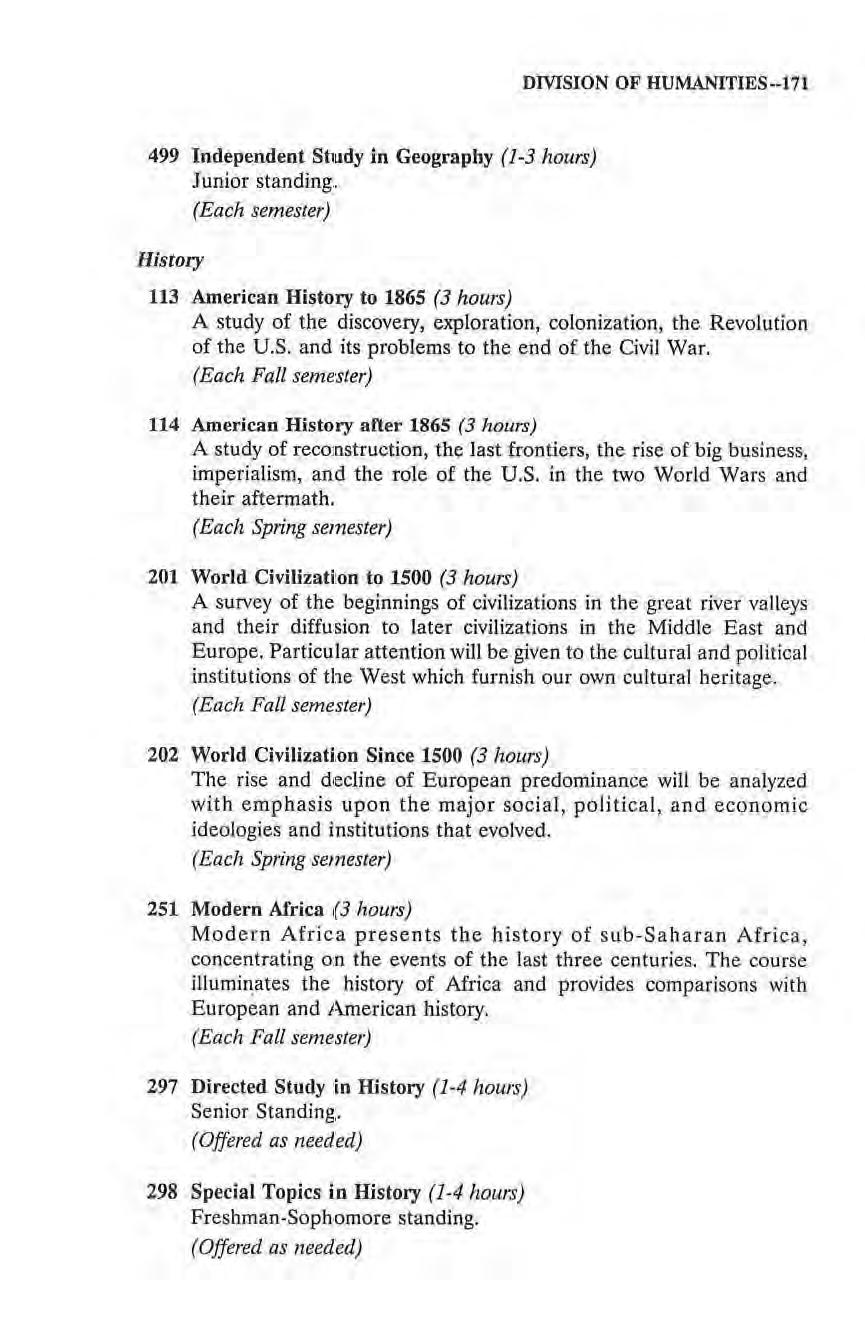
(Each Fall semester)
297 Directed Study in History (1-4 hours) Senior Standing.
(Offered as needed)
298 Special Topics in Hi story (1-4 hours)
Freshman-Sophomore standing.
(Offered as needed)
DMSION OF HUMANITIES--171
301 Colonial America (3 hours)
Prerequisite: Hist 113 or instructor' s permission.
A study of colonial irivalry between the Spanish, French , English, and Dutch in North America, the Revolution, and U.S. history to 1823.
(Offered as needed)
302 The Civil War and Reconstruction (3 hours)
A study of the U.S from 1823 through Mani fest Destiny to the war with Spain.
(Fall semester, even years)
303 U. S. In the Twentieth Century (3 hours)
Prerequisite: Hist 114 or instructor's permission.
A study of the U.S. in modern times with an emphasis upon the changing social and economic theories of the period and the internal forces that influenc,ed their development.
(Spring semester, odd years)
304 Black Experience in America (3 hours)
This survey course investigates black life and culture in America from 1619 to the present .
(Fall semester, odd years)
329 History of Nebraska (3 hours)
A survey of the political, economic, social, and constitutional development of Ne1braska from prehistoric times to the present.
(Spn'ng semester, even years)
343 English History from 1688 (3 hours)
Prerequisite: Hist 202 or instructor's permission.
A survey of the social, political, and economic development of England since the Glorious Revolution. The course covers the social and religious impact of the English Parliamentary syste m, the effects of the Industrial Revolution upon the British Empire, and th e prospects of tbe mc1dern welfar e state of contemporary England.
(Spring semester, odd years)
345 Modern Europe (3 hours)
Prerequisite: Hist 2·02 or instructor's permission.
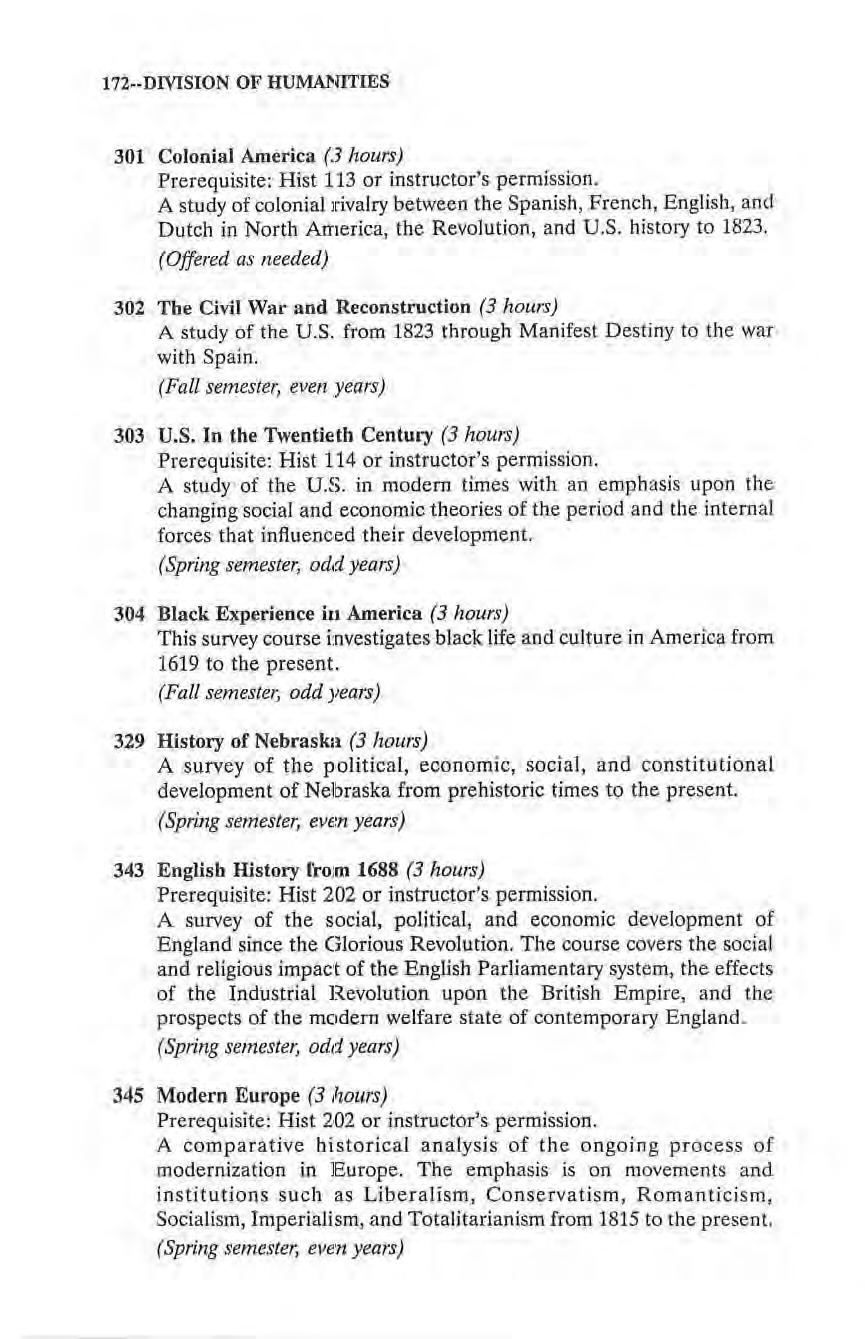
A comparative historical analysis of the ongoing process of modernization in ]Europe. The emp hasis is on movements and institutions such as Liberalism, Conservatism, Romant icism, Socialism, Imperialism, and Totalitarianism from 1815 to the present.
(Spring semester, even years)
172--DMSION OF
HUMANITIES
400 Methods of Teaching History and Social Science (2 hours)
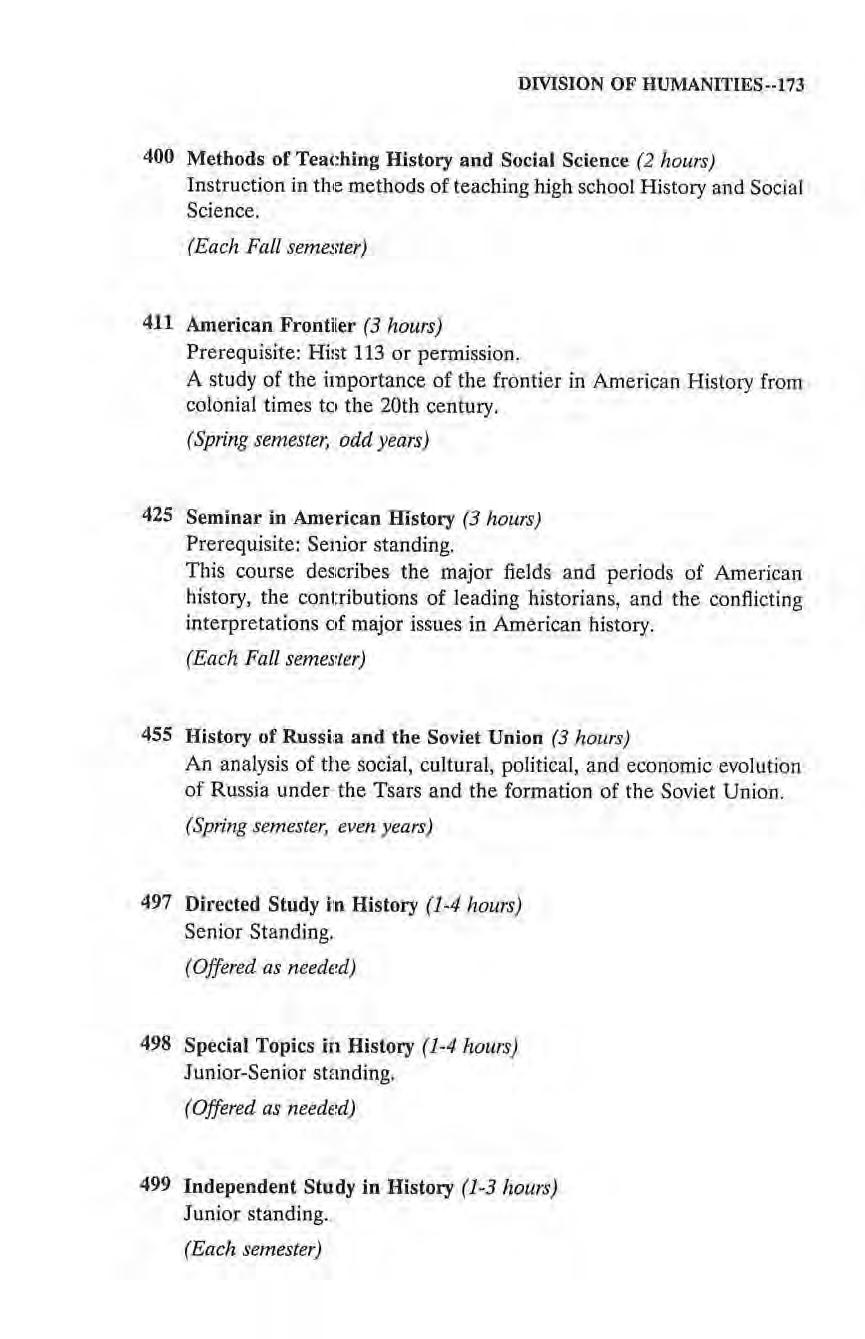
Instruction in th,e methods of teaching high school History and Social Science.
(Each Fall semester)
411 American Frontiier (3 hours)
Prerequisite: Hist 113 or permission.
A stu dy of the importance of t he frontier in American History from colonial times tc, the 20th century.
(Spring semester, odd years)
425 Seminar in American History (3 hours)
Prerequisite: Senior standing. This course des:cribes the major fields and periods of American history, the contributions of leading historians1 and the conflicting interpretations of major issues in American history.
(Each Fall semester)
455 History of Russia and the Soviet Union (3 hours)
An analysis of the social, cuJtural, political, and economic evolution of Russia under t he T sars and the formation of the Soviet Union. (Spring semester, even years)
497 Directed Study in History (1-4 hours) Senior Standfag.
(Offered as needed)
498 Special Topics in History (1-4 hours) Junior-Senior standing.
(Offered as needEid)
499 Independent Study in History (1-3 hours) Junior standing.
(Each semester)
DMSION OF HUMANITCES--173
174-DMSION OF HUMANITIES
Humanities
241 Cooperative Education Internship (1-4 hours)
Prerequisite: 15 hours of completed coursework, minimum GPA 2.0, permission of cooperative education staff and division chair. This program is de:signed for students with an intended major in the Humanities Division to explore and/or gain work experience related to their major and anticipated career goals. Students may enroll for 1-4 hours of credit which will be graded on a credit/no credit basis. A minimum of forty hours of work experience will be required for eve ry hour of cre dit per semester. The student will compl ete necessary paperwork with employer and cooperative education office. T he student's work will be supervised by cooperative education staff. A final paper will be prepared at the conclusion of the internship.
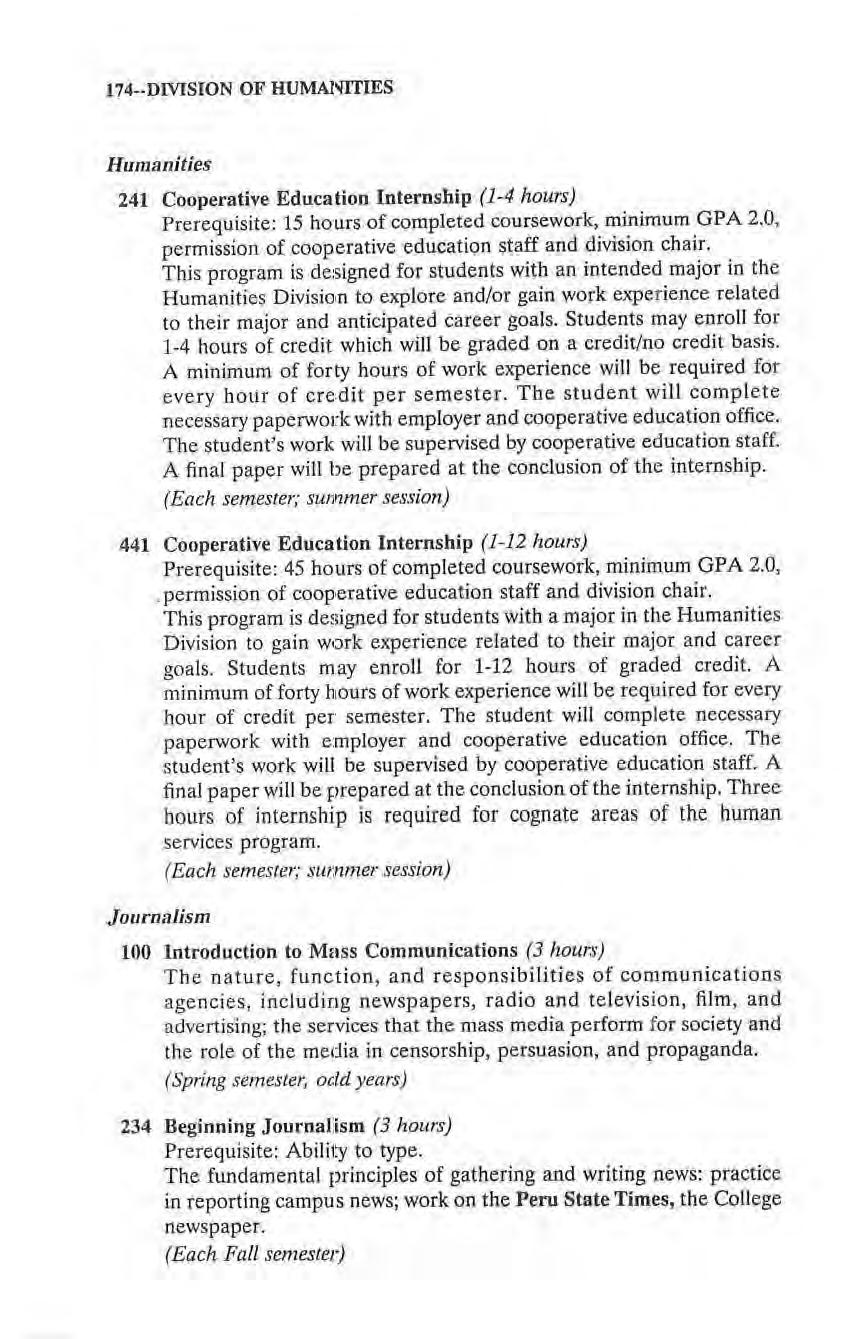
(Each semester; simuner session)
441 Cooperative Education Internship (J-12 hours)
Prerequisite: 45 hours of completed coursework, minimum GPA 2.0, permission of cooperative education staff and division chair. This program is designed for students with a major in the Humanities Division to gain work experience re lated to their major and career goals. Students may enroll for 1-12 hours of graded credit. A minimum of forty hours of work experience will be required for every hour of credit per semester. The student will complete necessary paperwork with employer and cooperative education office . The student's work wilJ be supervised by cooperative education staff. A final paper will be prepared at the conclusion of the internship. Three hours of internship is required for cognate areas of the human services program.
(Each semester; summer session)
Journalism
100 Introductio n to Mass Communications (3 hours)
The nature, function , and responsibilities of commun ic ations age ncies, including newspapers, radio and televis io n, film , and advertising; the services that the mass media perform fo r society and the role of the media in censorship, pe rsuasion, and propaganda.
(Sp ring semester, odd years)
234 Beginning Journal'ism (3 hours)
Prerequisite: Ability to type.
The fundamental principles of gathering and writing news: practice in reporting campus news; work on the Peru State Times, the College newspaper.
(Each Fall semester)
235 Newspaper EditJing (2 hours)
Prerequisite: Journ 234 or permission of instructor. An intensive course in journalistic desk work that includes copy preparation, headline writing, page layout; extensive work on the Peru State Time·s desk. Credit not to exceed a total of four hours.
(Each Fall semester)
297 Directed Study in JournaJism (1-4 hours)
Senior Standing,.
(Offered as needed)
298 Special Topics illl Journalism (2 hours)
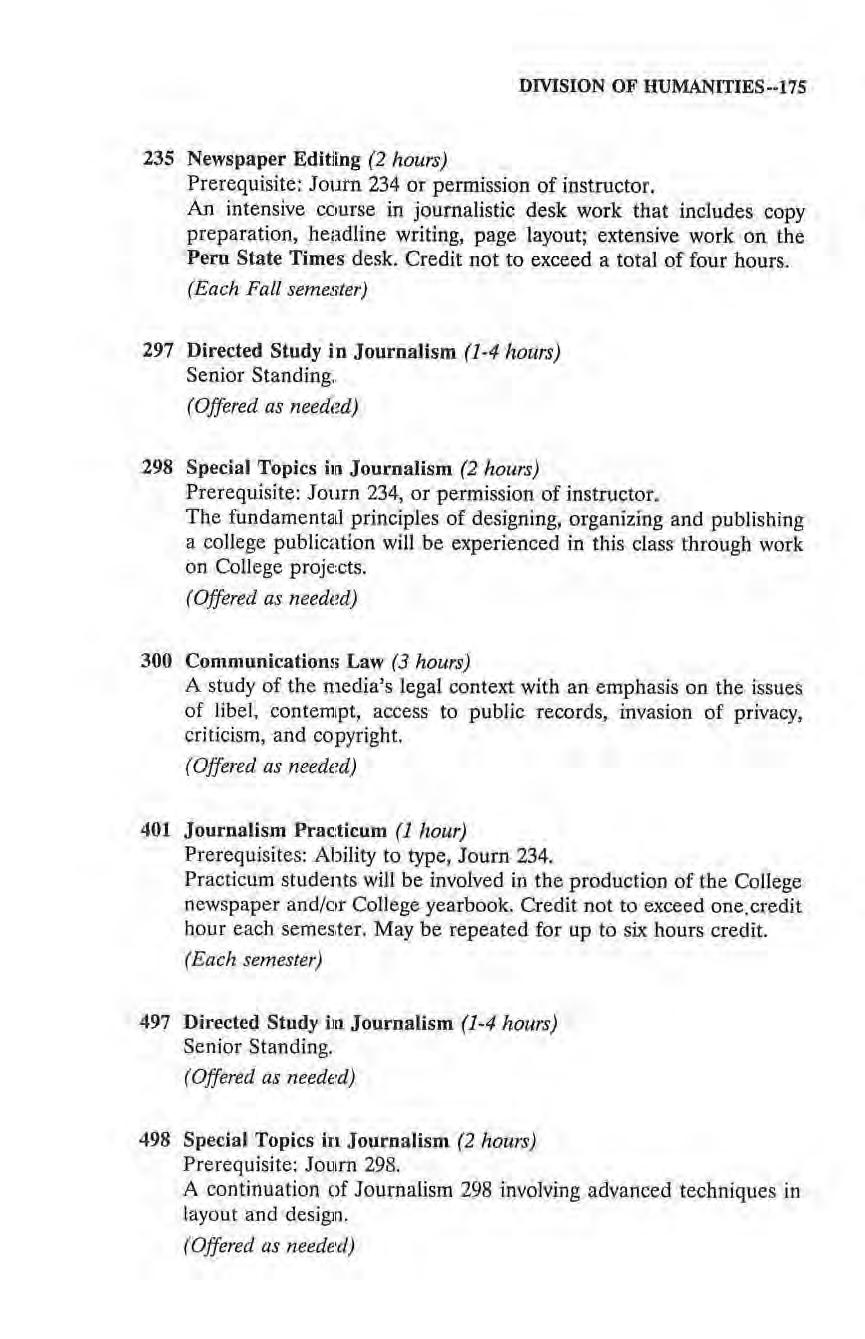
P rerequisite: Journ 234, or permission of instructor. The fundamenta~ principles of designing, organizing and publishing a college publication will be experienced in this class through work on College proje,cts.
(Offered as needed)
300 Communications Law (3 hours)
A study of t h e media's legal context with an em phasis on the issues of libel, contempt, access to public records, invasion of privacy, criticism, and copyright.
(Offered as needed)
401 Journalism Prac:ticum (1 hour)
Prerequisites: Ability to type, Journ 234. Practicum students will be involved in the production of the College newspaper and/or College yearbook. Credit not to exceed one. credit hour ea.ch semes,ter. May be repeated for up to six hours credit.
(Each semester)
497 Directed Study iin Journalism (1-4 hours)
Senior Standing.
(Offered as needed)
498 Special Top ics in Journalism (2 hours)
Prerequisite: Jou1m 298.
A continuation of Journalism 298 involving advanced techniques in layout and desigm.
(Offered as needed)
DMSION OF HUMANITIES--175
Music
100 Recital Attendance (0 hours)
All students in mU!Sic are required to re gister for this course each semester o n a credit/no credit basis for the appropriate number of semesters indicated in their selected program. Attendance at a minimum of eighty percent (80%) of all recitals each se mester is required.
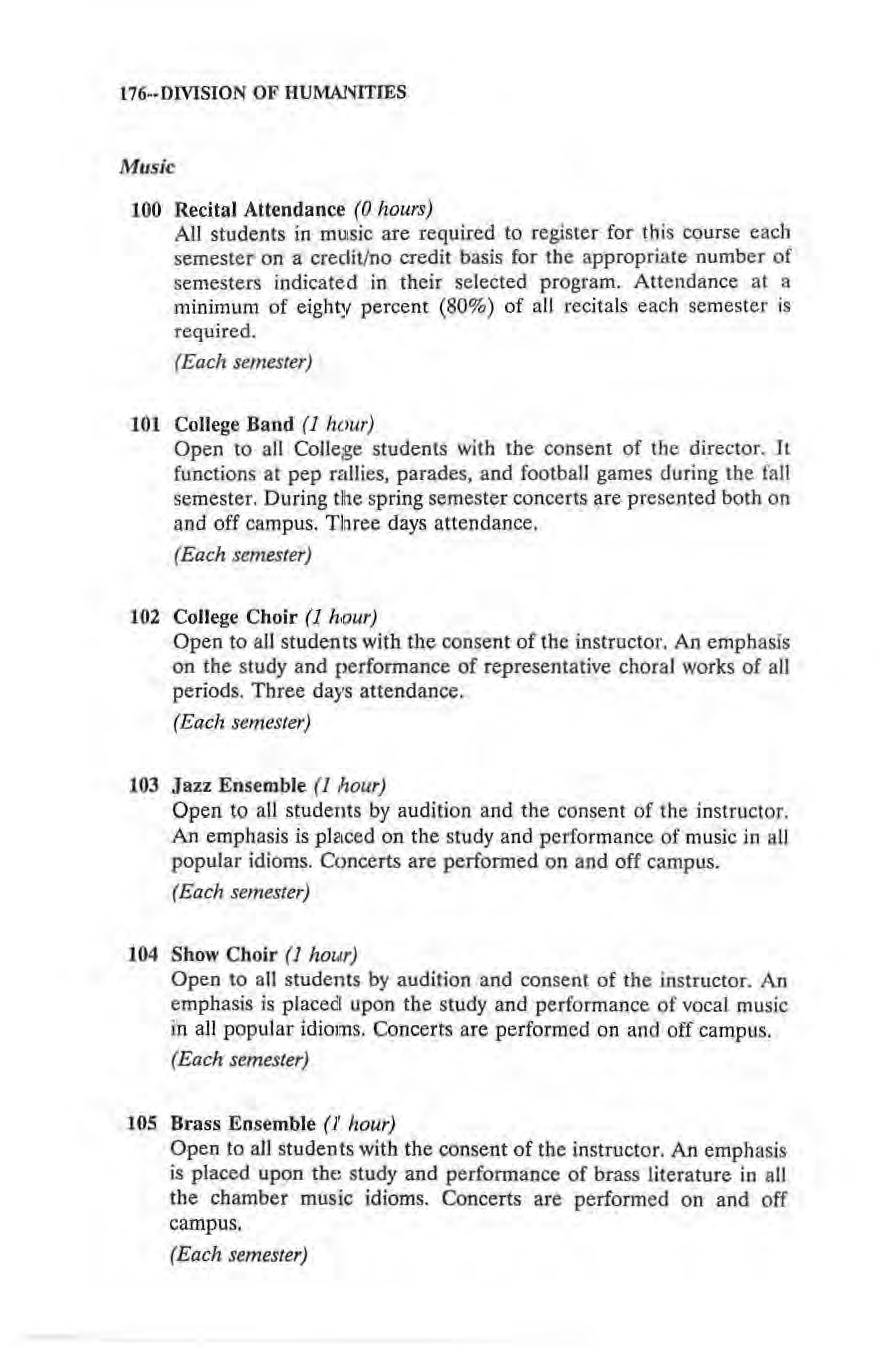
(Each semester)
101 College Band (1 hour)
Open to all College students with tbe consent of the director. It functions at pep rallies, parades, and football games duri ng the fall semester. During tlhe spring semester concerts are presented both on and off campus. Tlnree days attendance,
(Each semester)
102 College Choir (1 h,our)
Open to aJJ students with the consent of the instructor. An emphasis on the study and performance of representative choral works of all periods. Three days attendance.
(Each semester)
103 Jazz Ensemble (1 hour)
Open to all students by audi ti on and the consent of the instructor. An emphasis is pla1ced on the study and performance of music in all popular idioms. Concerts are performed on and off campus.
(Each semester)
104 Show Choir (1 hoi.,r)
Open to all students by audition and consent of the instructor. An emp hasis is placed! upon the study and performance of vocal mu sic in all popular idioms. Concerts are performed on and off campus.
(Eac h semester)
105 Brass Ensemble (l' hour)
Open to all students with the consent of the instructor. An emphasis is placed upon the study and performance of brass lite rature in all the chamber music idioms. Concerts are performed on and off campus.
(Each semester)
176--
DIVISION OF HUMN~ITIES
106 Woodw ind Ensemble (1 hour)
Open to all students with the consent of the instructor. An emphasis is placed upon the study and performance of woodwind literature in all the chamber music idioms. Concerts are performed on and off campus.
(Each semester)
107 Madrigal Singer·s (1 hour)
Open to all students with the consent of the instructor. An emphasis is placed upon the study and performance of vocal literature in a ll the chamber music idioms. Concerts a re performed on and off campus.
(Each semester)
108 Percussion Ense,mble (1 hour) (each semester)
Open to all students w ith the consent of the instructor. An emphasis is placed upon the study a n d performance of percussion ensemble literature in a variety of chamber music idioms. Concerts are performed on and off campus.
(Each semester)
111 Fundamentals 0 1 f Music (2 hours)
An introduction to the rudiments of music, including letter and syllable names o;f notes, tim e values of notes a nd rests, time and key signatures, chromatics, intervals, chords, keyboard experie n ce, and the writing of original melodies.
(Each Fall semester)
112 B egin n ing Class Piano ( 1 how)
Beginning instruction on the piano.
(Each semester)
120 Applied Music O hour)
Private music irns truction for voice, ins t rumen ts, or piano on the freshman level. May be repeated for credit.
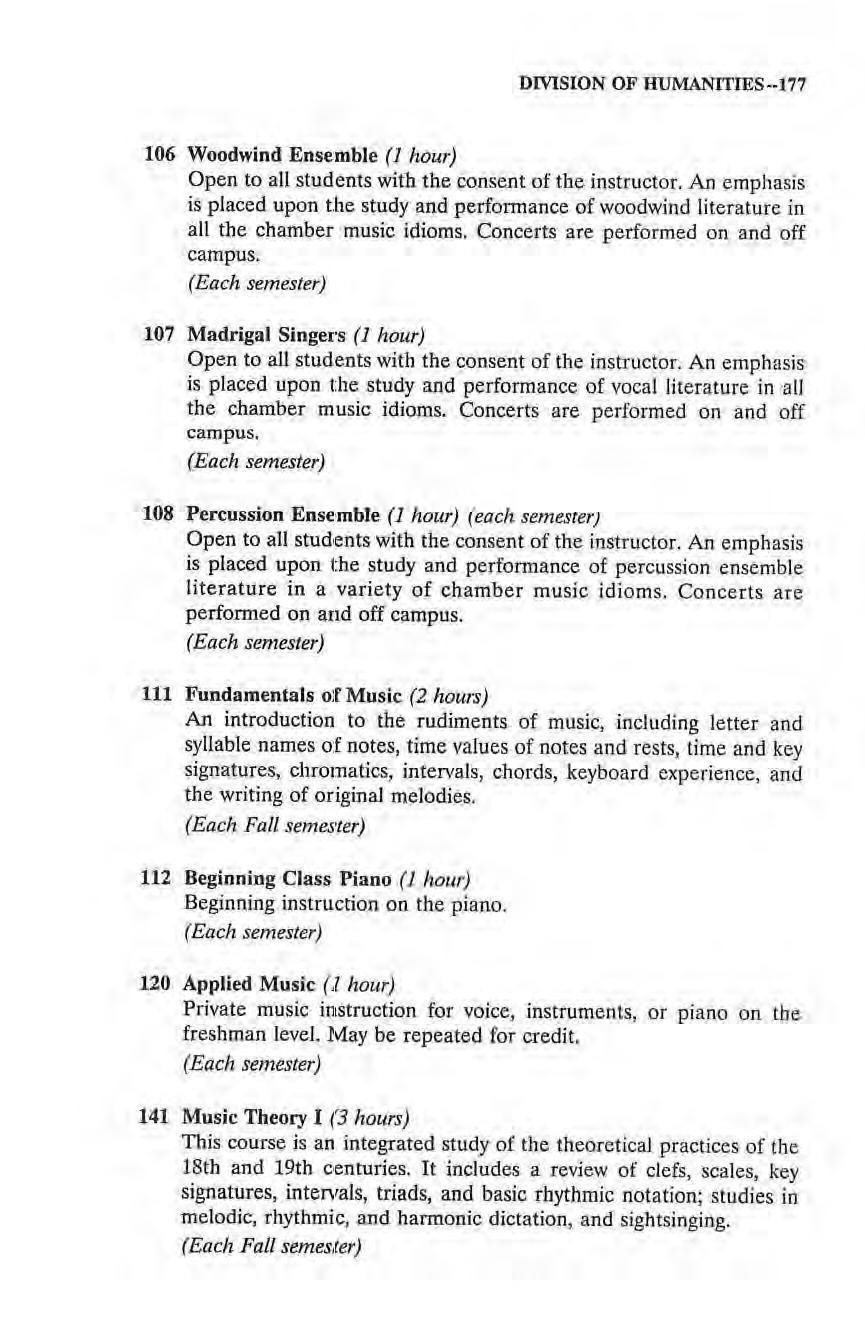
(Each semester)
141 Mus ic T heory I (3 hours)
This course is an integrated study of the theoretical practices of the 18th and 19th c,enturies. It includes a review of clefs, scales, key signatures, in tervals, triads, and basic rhythmic notation; studies in mel o dic, rhythmic, and harmonic dictation, and sightsinging.
(Each Fall semester)
DMSION OF BUMANITIES--177
142 Music Theory II (3 hours)
This course is an integrated study of the theoretica l practices of the 18th and 19th centuries. It includes the study of secondary triads, six-four chords, dominant and supertronic sevenths, elementary modulation, studies in me lodic rhythmic and harmonic dictation, and sightsinging.
(Each Spring semester)
200 Piano Proficiency Examination (0 hours)
All st udents in music education (K-6 or K-12) are required to register for Music 200 on a credit/no credit basis during the semester they intend to take the required p iano proficiency examination . Successfu l completio n of Music 200 is required before enrolling for st udent teachi ng. Students must be enrolled in Applied Piano concurre ntl y with Music 200.
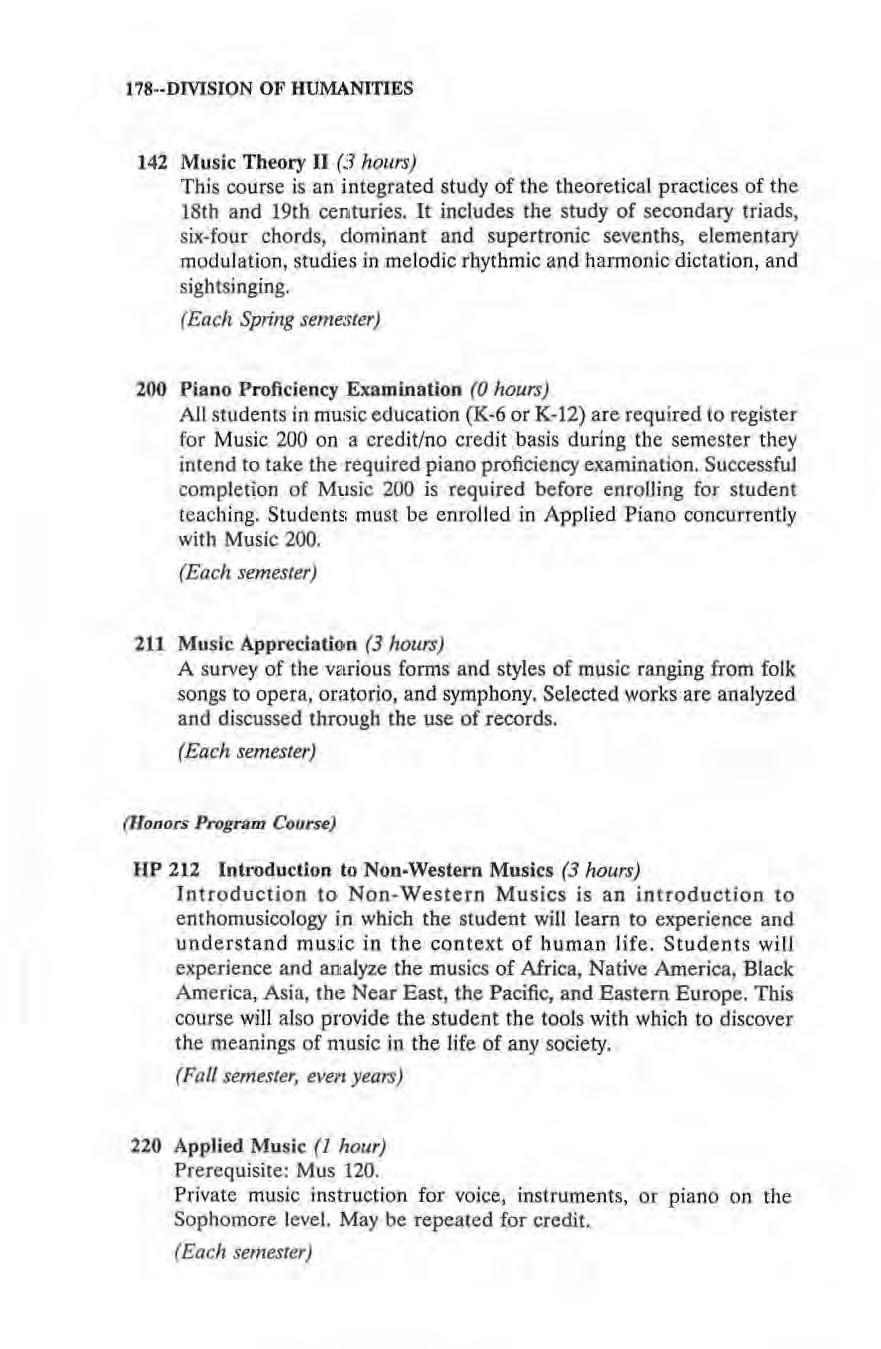
(Each semester)
211 Music Apprec iation (3 hours)
A survey of the various fonns and styles of music ranging from folk songs to opera, oratorio, and symphony. Selected works are analyzed and discussed through the use of records.
(Each semester)
(Honors Program Course)
HP 212 Introductio n to Non-Western Musics (3 hours)
Intr o duction to Non-Western Musics is an introduction to enthomusicology i n which the student will learn to experience and understand mus:ic in the context of human l ife. S tu dents will experience and analyze the musics of Afr ica, Native America, Black America, Asia, the Near East, the Pacific, and Eastern Europe. This course will also provide the stud ent the tools with which to discover the meanings of music in the life of any society.
(Fall semester, evel'I years)
220 Appli ed Mu sic (1 hour)
Prerequisite: Mus 120.
Private music instruction for voice, instruments, or piano on the Sophomore level. May be repeated for credit.
(Each semester)
178--DMSION OF
HUMANITIES
241 Music Theory Ill (3 hours)
Prerequisite: Mus 142.
This course is am integrated study of the th eoretical practices of t he 18th and 19th centuries. It includes a detailed study of the chromatic harmonic practices of the 19th century, a survey of 20th century theoretical practices, studies in melodic, rhythmic, and harmonic dictation, and sightsinging.
(Each Fall semester)
242 Music Theory IV (3 hours)
Prerequisite: Mus 241
This course is an integrated s tudy of the theoretical practices of the 18th and 19th ce:nturies. It includes a detailed st udy of the ch r omat ic hannonic practices of the 19th century, a survey of 20th century theoretical practices and studies in melodic, rhythmic, a nd harmonic dictation, and sightsinging.
(Spring semester, odd years)
251 E lementary Music Methods (2 hours)
Prerequisite: Mus 111 or music major. A study of modern teaching techniques for children's music literature.
(Eac h Spring semester)
297 Directed Study in Mus ic (1-4 hours)
Senior Standing,.
(Offered as needed)
298 Specia l Topics i111 Music (J-4 hours)
Freshm a n-Sophomore standing.
(Offered as needed)
320 Applied Music (1 how)
Prerequisite: Mus 220.
Private music instruction for voice, instruments, or piano on the Junior level. May be repeated for credit.
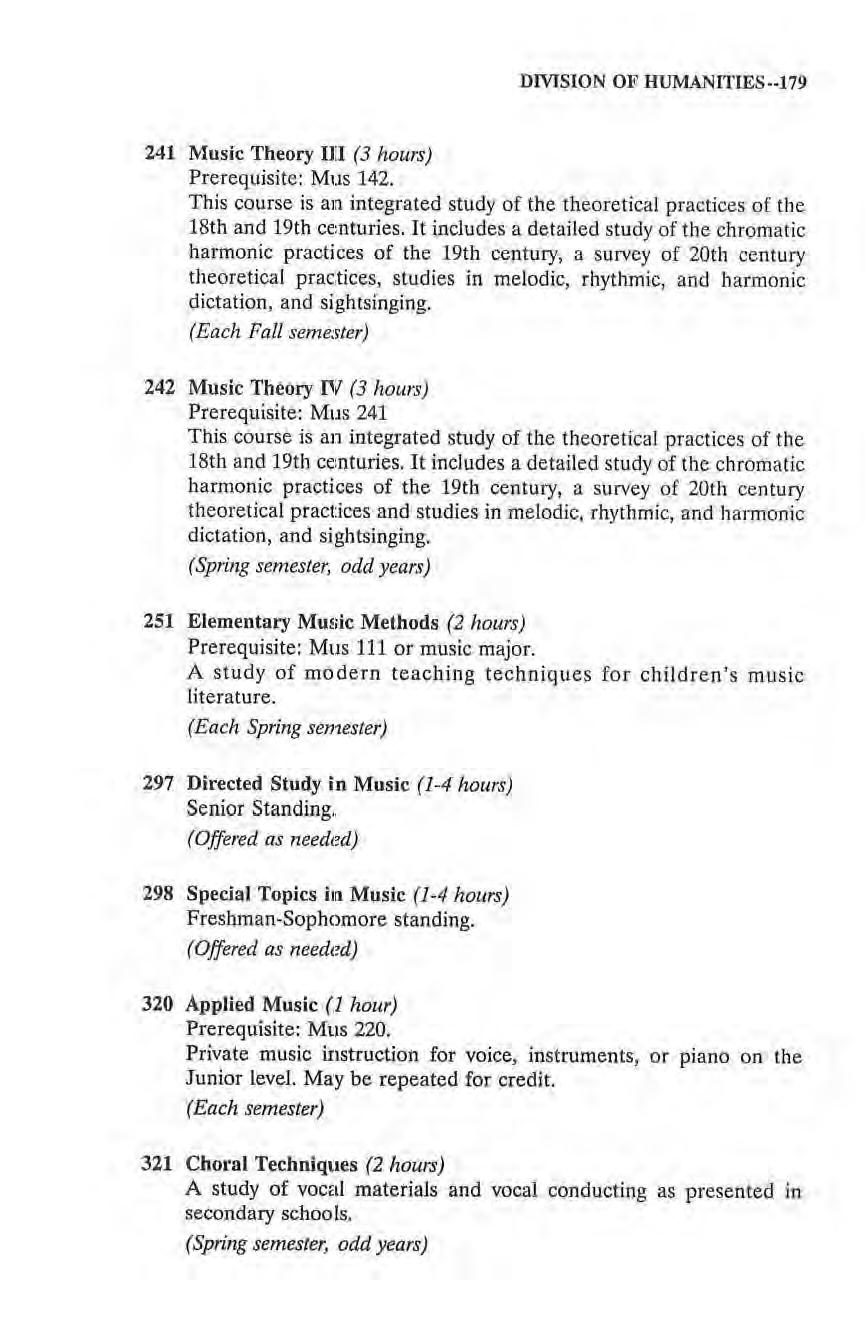
(Each semester)
321 Chol'a l Techniques (2 hours)
A study of vocal materials and vocal conducting as presented in secondary schools.
(Spring semester, odd years)
DIVISIO N OF HUMANITIES 179
OF HUMANITIES
322 Band Techniques (2 hours)
Prerequisite: Sophomore standing
An introductory i; tudy of organizational skills and pedagogical techniques for tbe. concert band, jazz band, elementary band and middle school band. Special emphasis will be given to march ing band charting te chnique s, (Spring semester, e~·en years)
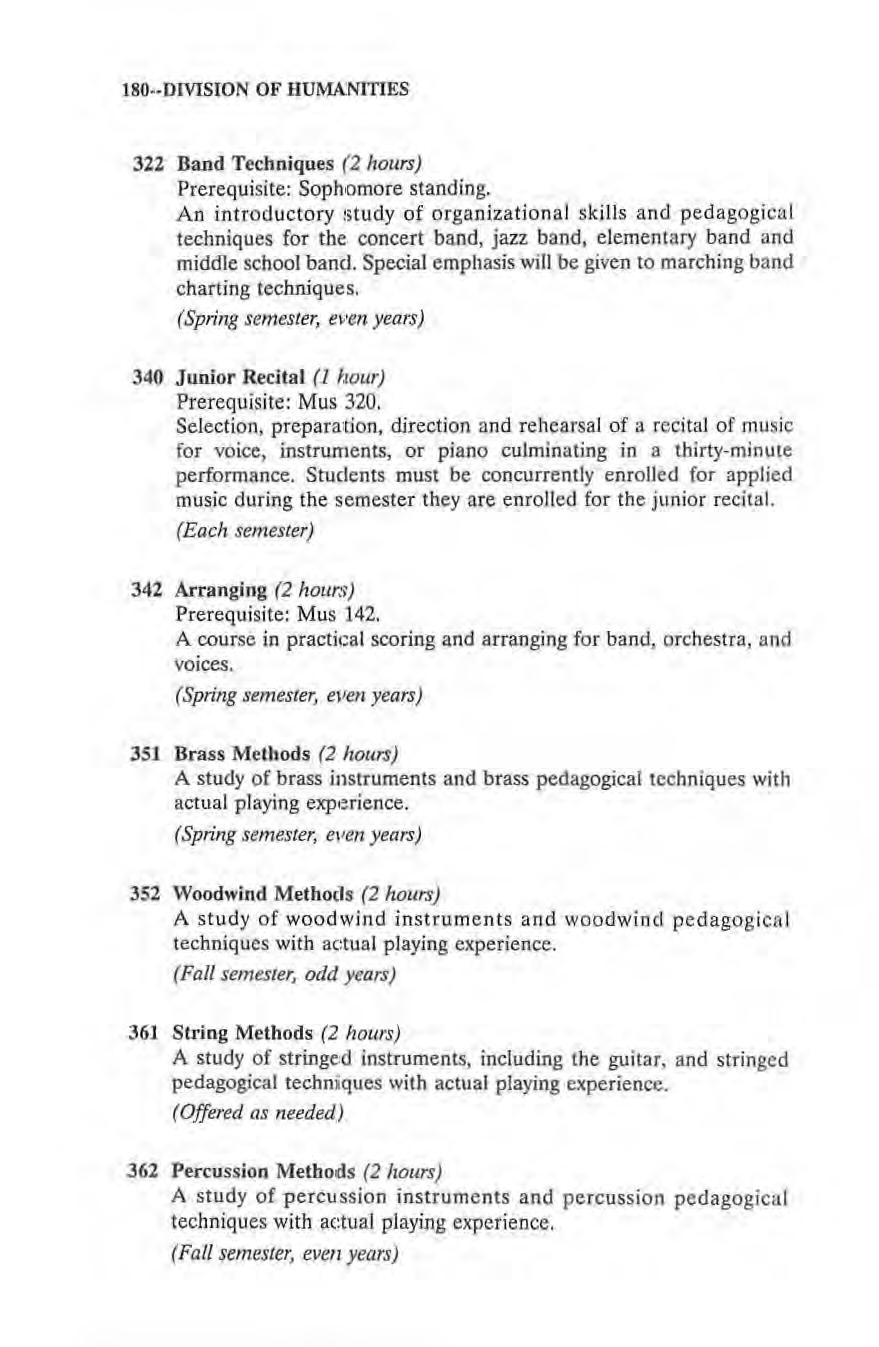
340 Junior Reci tal (1 hour)
Prerequisite: Mus 320.
Selection, preparait io n, direction a nd rehears al of a recital of music for voice, instruments, or p ia no c ulmin ating in a thirty-minute performance. Students must be co ncurrently enrolled for applied music during the semester they a re enrolle d for the junior recit al.
(Ea ch sem ester)
3 42 Arranging (2 hours)
Prerequisite: Mus 142.
A course in practical scoring and arranging for band, o rchestra, and voices.
(Spring semester, even years)
3S1 Bra ss Methods (2 hours)
A study of brass instruments a nd brass pedagogical techniques with actual playing exp,~rience.
(Spring semester, even years)
352 Woodwind Methods (2 hours)
A study of woodwind instruments and woodwind pedagogical techniques with ac:tual playing expe rien ce.
(Fall semester, odd years)
361 String Methods (2 hours)
A study of stringe,d instrume nts, including the guitar, an d stringed pedagogical techn i ques with actual playing experience.
(Offered as n eeded)
362 Percussion Method s (2 hours)
A st ud y of percussion instrum e nts and pe r c us sion pedagogical tec hniqu es with actual playing experience.
(Fall semester, even years)
180
--DMSION
420 Applied Music (1 hour)
Prerequisite: Mus 320
Private mus ic iinstruction for voice, instrum ents, or piano on the senior level. May be repea ted for credit.
(Each semester)
440 Senior Recital (I hour)
Prerequis ite: Mus 420. Selection, preparation, direction, and reh earsal of a recital of music for voice, instruments, or piano culminating in a s ixty-minute performance. Students must be concurrently enrolled for applied music during the semester they are enrolled for the senior recital.
(Each semester)
441 Music History I (antiquity to 1750) (2 hours)
A study of the development of music from antiquity through tbe end of the Baroque ]period with stylistic analysis of musical examples. (Fall semester, odd years)
442 Music History Ilf (1750 to Present) (2 hours)
A study of the development of music from the beginning of the Classical period to the present with stylistic analysis of musical examples.
(Spn'ng semester, odd years)
461 Choral Conductiing (3 hours)
Prerequisite: Pe1rmission of instructor. In this course, s:tudents will learn the basics of choral conducting, including score preparation and conducting rehe a rsals. (Fall semester, ei,•en years)
462 Instrumental Co,nducting (2 hours)
The knowledge of baton techniques, readin g and interpre tin g a musical score, and the presentation of te chniques of re hearsi ng instrumental organizations are stressed.
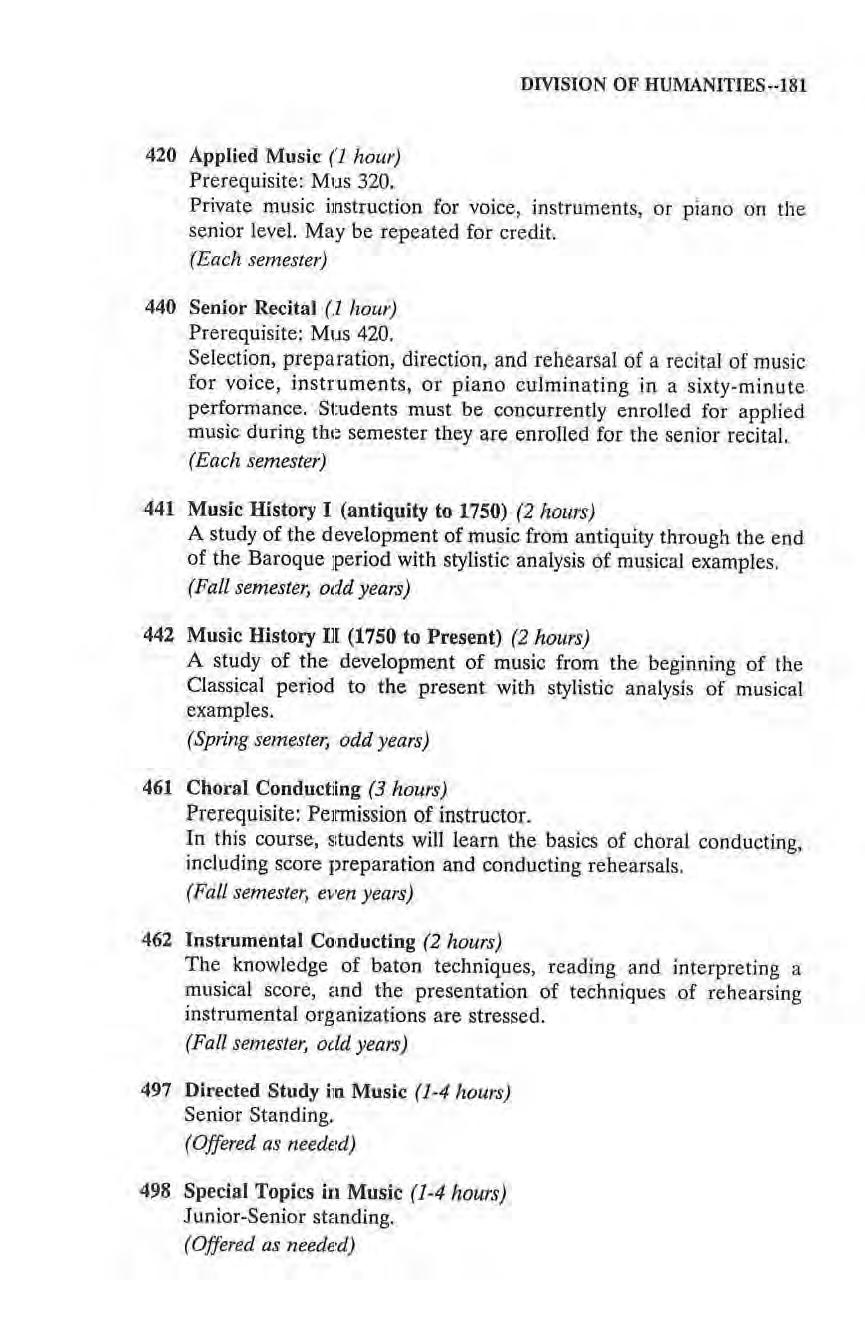
(Fall semeste,~ odd years)
497 Directed Study i1n Music (1-4 hours) Senior Standing.
(Offered as needt:d)
498 Special Topics in Music (1 -4 hours)
Junior-Senior standing.
(Offered as needed)
DMSION OF HUMANITIES--181
499 Indep end e n t S tu dy in M u s ic (1-3 hours) Junior standing.
(Each semester)
P h i losophy
201 I n t ro d uct ion to P bilosophy (3 hours)
An introduction to philosophy through the selected writings of outstand ing philosophers. Lectures and class dis c uss ions on such topics as ethics, philosophy of history, ph ilosophy o f religion , a nd metaphysics are stressed.
(Each Fall semes ter)
Political Scien ce
201 American Nationa1 J Gove rn me nt (3 hours)
A thorough introduction to the U.S. political system, its ins tit u tions and processes. Topics will in c lude the co nstituti ona l founding, fe dera lism, political culture, Co ngress, th e Presidency, j ud iciary, bureauc racy, publiic opinion and the media, t he electoral process, a nd civil liberties.
(Each semester)
202 State a n d Lo ca l Go vern me nt (3 hours)
Description and analysis of political institutions and behavior in American states with interstate comparisons and co mp a ri sons between st a te and national political systems. Lecture topics include the development and role of American local government, its forms and structures, anid t he relatio nship to the fe deral government.
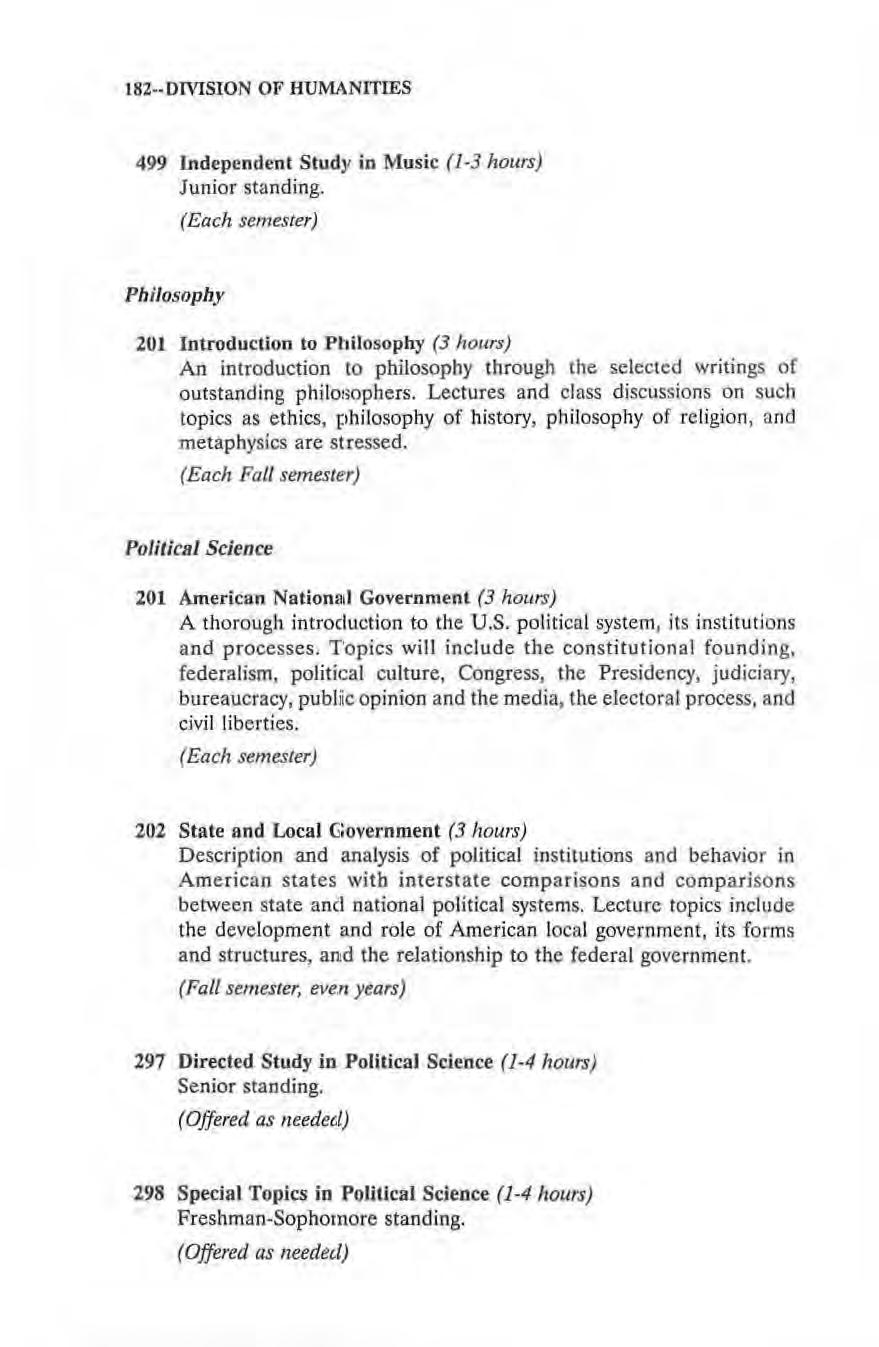
(Fall semester, even years)
297 D irected S tudy in Politica l Science (J-4 hours) Senior standi ng.
(Offe red as needed)
298 Special Topics in Poli tical Scie nce (1-4 hours) Freshman-Sophomore standing.
(Offered us needed)
182--DM SION OF H UMANITIES
301 Comparative Go-vernment (3 hours)
A comparative a:nalysis of political systems and institutions of Great Britain, France, the Federal Republic of Germany, and the Soviet Union. The course emphasis is on political culture, comparative politicaJ. history, chief executives, legislatures, political parties, interest groups, ,courts, and policy making with ample comparisons to the U.S.
(Fall semester, odd years)
426 American Constitutional Law (3 hours)
Prerequisite: PSc:i 201 or 202 or instructor's permission. A study of the historical and political context of constitutional doctrine through major decisions. The emphasis is on constitutional growth as it rellates to the fundamental structure of American government and the social order.
(Spring semester, ,even years)
467 T h e Far East (3 hours)
This course is concerned with the political traditions and historical evolution of the area, the impact of the West and its profound influences on the political order, and today 's revo lutionary situation , (Offered as neede,d)
468 Pub lic Administration (3 hours)
Prerequisite: PSci 201.
Students will study a range of topics involved in the administration of public agencies. Topics will include the history of America's public service, the development of intergovernmental relations , bureaucracies, ipublic personnel, budgeting, decision-making, evaluation procedures, and regulatory administration. This class will encourage students to investigate the role of public administration in the past and today, as well as to conjecture the possibilities for the future.
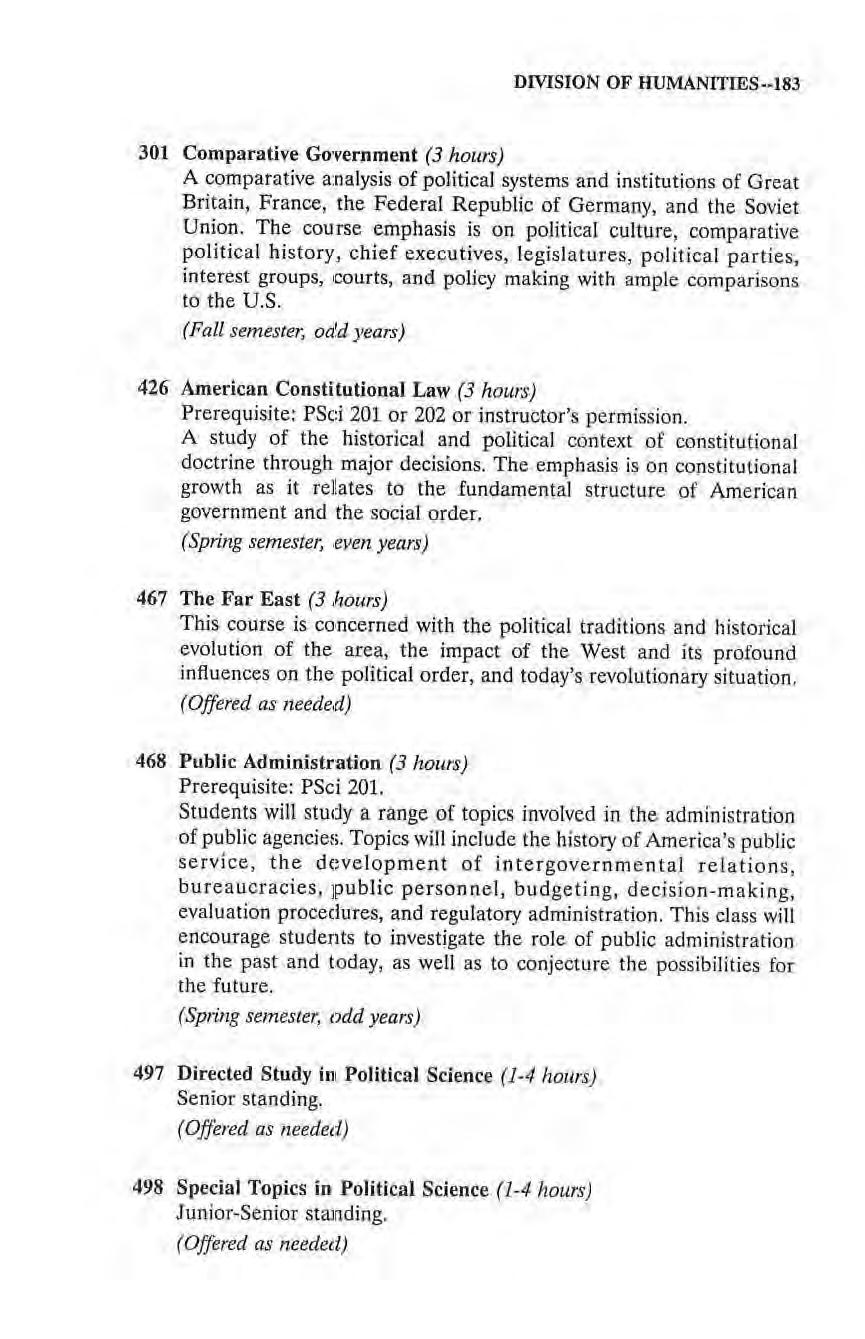
(Spring semester, odd years)
497 Directed Study int Political Science (1-4 hours) Senior standing.
(Offered as needed)
498 Special Topics in Political Science (1-4 hours) Junior-Senior stainding.
(Offe red as needed)
DMSION OF HUMANITIES--183
499 Independent Stud:r in Politica l Sc ience (1-3 hours)
Junior stan ding.
(Each semester)
Socia l Work
280 Introduction to So,cial Work (3 hours)
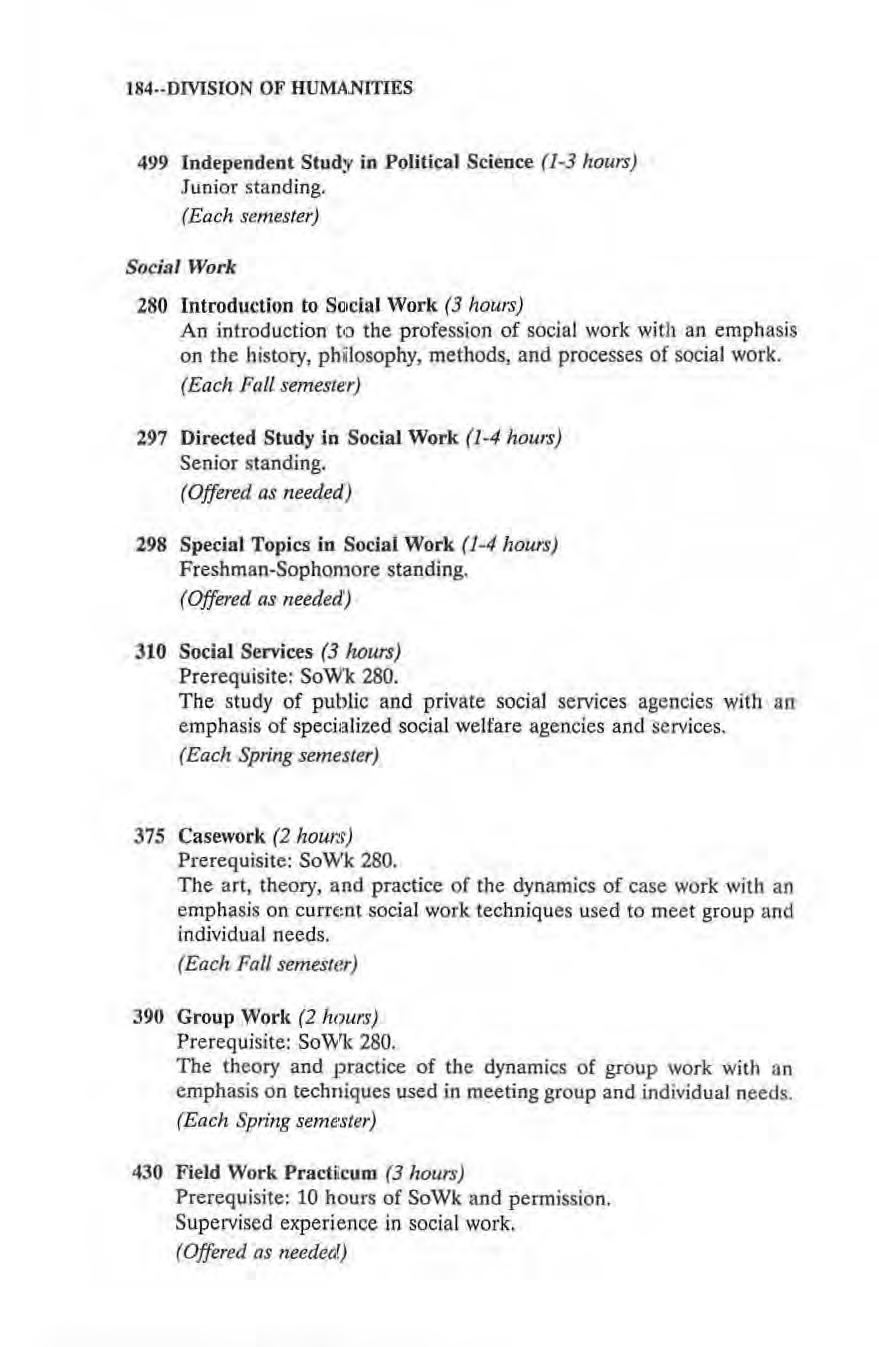
An introduction t,o the profession of social work with an emphasis on the h istory, ph i losophy, methods, and processes of socia l work.
(Each Fall semester)
297 Directed Study in Socia l Work (1-4 hours) Senior standing.
(Offered as needed )
298 Specia l Top ics in Social Work (l-4 hours)
Freshman-Sophomore standing.
(Offered as needed')
310 Social Services (3 hours)
Prerequisite: SoWk 280.
The study of public and private social services agencies with an emphas is of speci1alized social welfare agencies and services.
(Each Spring semester)
375 Casework (2 houm)
Prerequis ite: SoWk 280.
The art, theory, and practice of the dynamics of case work with an emphas is on current social work techniques used to meet group and individual needs.
(Each Fall semester)
390 Group Work (2 hqurs)
Prerequisite: SoWk 280.
The theory and practice of the dynamics of group work w ith an emphasis on techniques used in meeting g roup and individual needs.
(Each Sp1ing semester)
430 Field Work Practiicum (3 hours)
Prerequisite: 10 h ours of SoWk and permission. Supervised experience in social work.
(Offered as needed)
184--0MSION OF
HUMANITIES
497 Directed Study i111 Social Work (1-4 hours) Senior standing~ (Offered as neede'd)
498 Special Topics in Social Work (1-4 hours) Junior-Senior standing. (Offered as needeid)
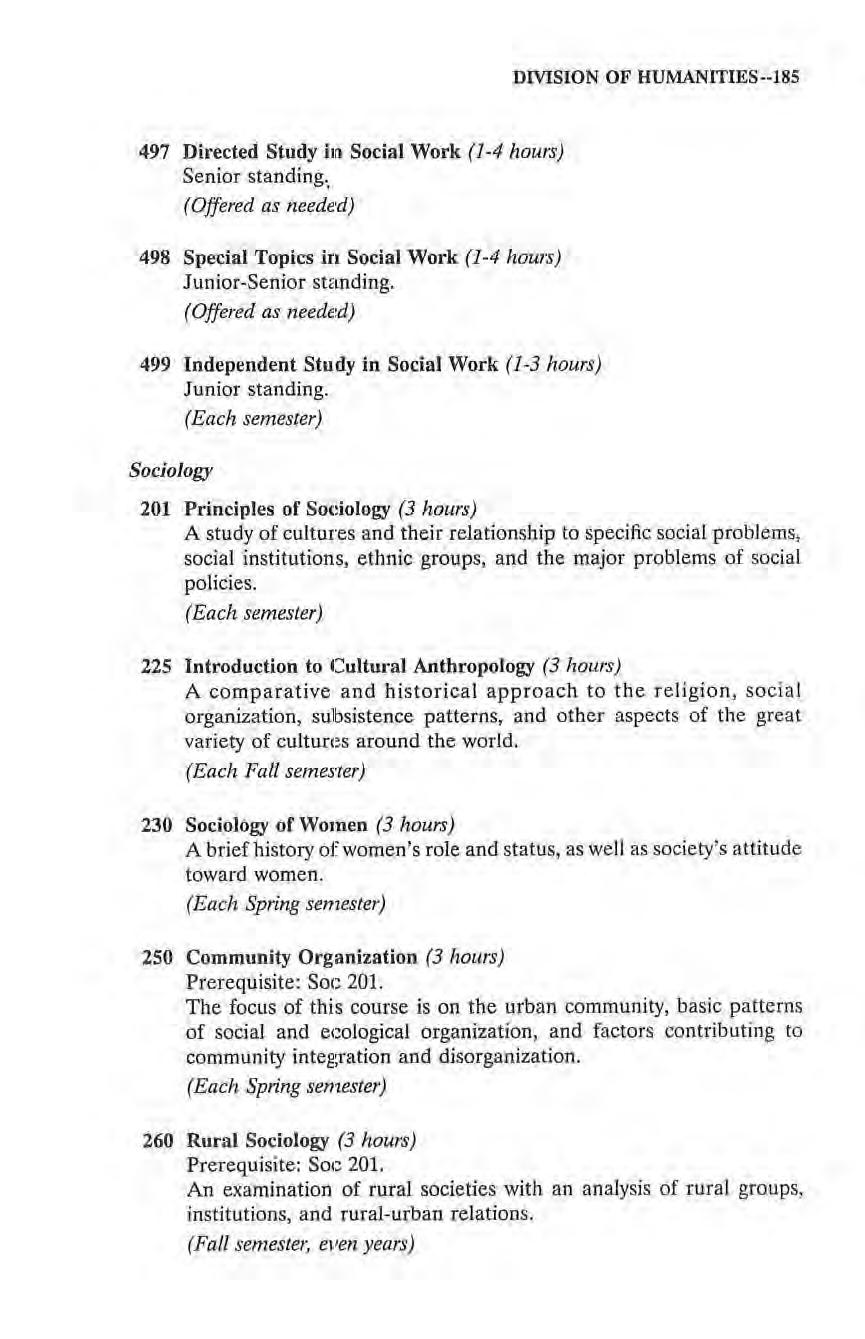
499 Independent Study in Socia l Work (1-3 hours) Junior standing.
(Each semester)
Sociology
201 Principles of Sodology (3 hours)
A study of cultures and their relationship to specific social problems, social institutions, ethnic groups, and the major problems of social policies.
(Each semester)
225 Introduction to C ultural Anthropology (3 hours)
A comparative and historical approach to the religion, social organization, sulbsistence patterns, and other aspects of the great variety of cultums around the world.
(Each Fall semester)
230 Sociology of Women (3 hours)
A brief history of women ' s role and status, as well as society' s attitude toward women.
(Each Spring semester)
250 Community Organization (3 hours)
Prerequisite: Soc 201.
The focus of this course is on the urban community, basic patterns of social and ecological organization, and factors contributfng to community integration and disorganization.
(Each Spring semester)
260 Rural Sociology (3 hours)
Prerequisite: S01 ; 201.
An examination of rural societies with an analysis of rural groups, ,institutions, and rural-urban relations.
(Fall semeste,~ even years)
DMSION OF HUMANITIES --185
2 97 Di rected Study i n Sociology (J-4 hours) Senior standing.
(Offered as needed)
298 S pecia l Topics i n Socio logy (1-4 hours)
Freshman-Sophomore standing.
(Offered as n eeded)
300 Co n temporary So cial Probl em s (3 hours)
An introduction to the causes, treatment, and preve ntion of selected socia l problems with particu lar emphasis on the problems of conflict and inequality.
(Spring semeste,; even years)
320 Sociology of Ed ucm t ion (3 hours)
Prerequisite: Soc 201.
An application of sociological principles to the education process. The relationship between stratification and education, the importance of inte:raction patterns on the educational process, the effect of other institutions on education, and the role of education as a dynamic institution in a changing society are stressed.
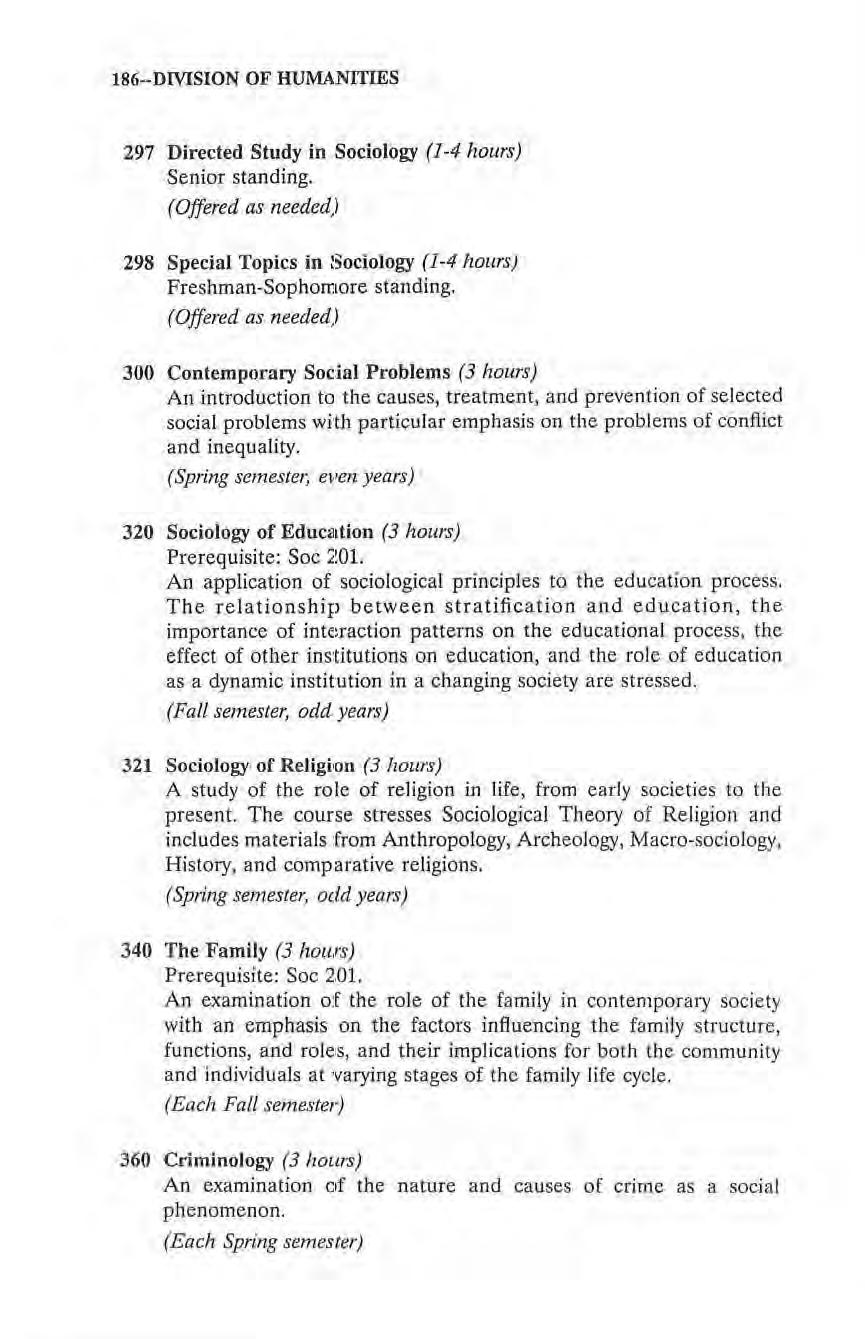
(Fall semester, odd years)
321 Sociology of Reli gi on (3 hours)
A study of the role of religion in life, from early societies to the present. The course stresses Sociological Theory of Religion and includes materials from Anthropology, Archeology, Macro-sociology, History, and comparative religions.
(Spring semester, odd years)
340 Th e Fa m ily (3 hours)
Prerequisfte: Soc 2.01.
An examination of the role of the famjly in contemporary society with an emphasis on the factors influencing the family str uctur e, functions, and role,s, and their implications for both the community and individuals at varyi ng stages of the family life cycle.
(Each Fall semester)
360 Crim inol ogy (3 hours)
An examination etf the nature and causes of c rime as a social phenomenon.
(Eac h Spring semester)
186--DMSION OF HUMANITIES
370 Ethnic-Group Relations (3 hours)
Prerequisite: Soc 201.
A study of the nature of minority groups and their distribution in American society with an examination of the m elting pot thesis in a pluralistic society.
(Fall semester, odd y ears)
420 History and Introduction to Modern Sociological Theory (3 hours)
Prerequisite: Soc 201 and permission.
An overview of e,arlier sociological theorists and their contributions to current sodological theory.
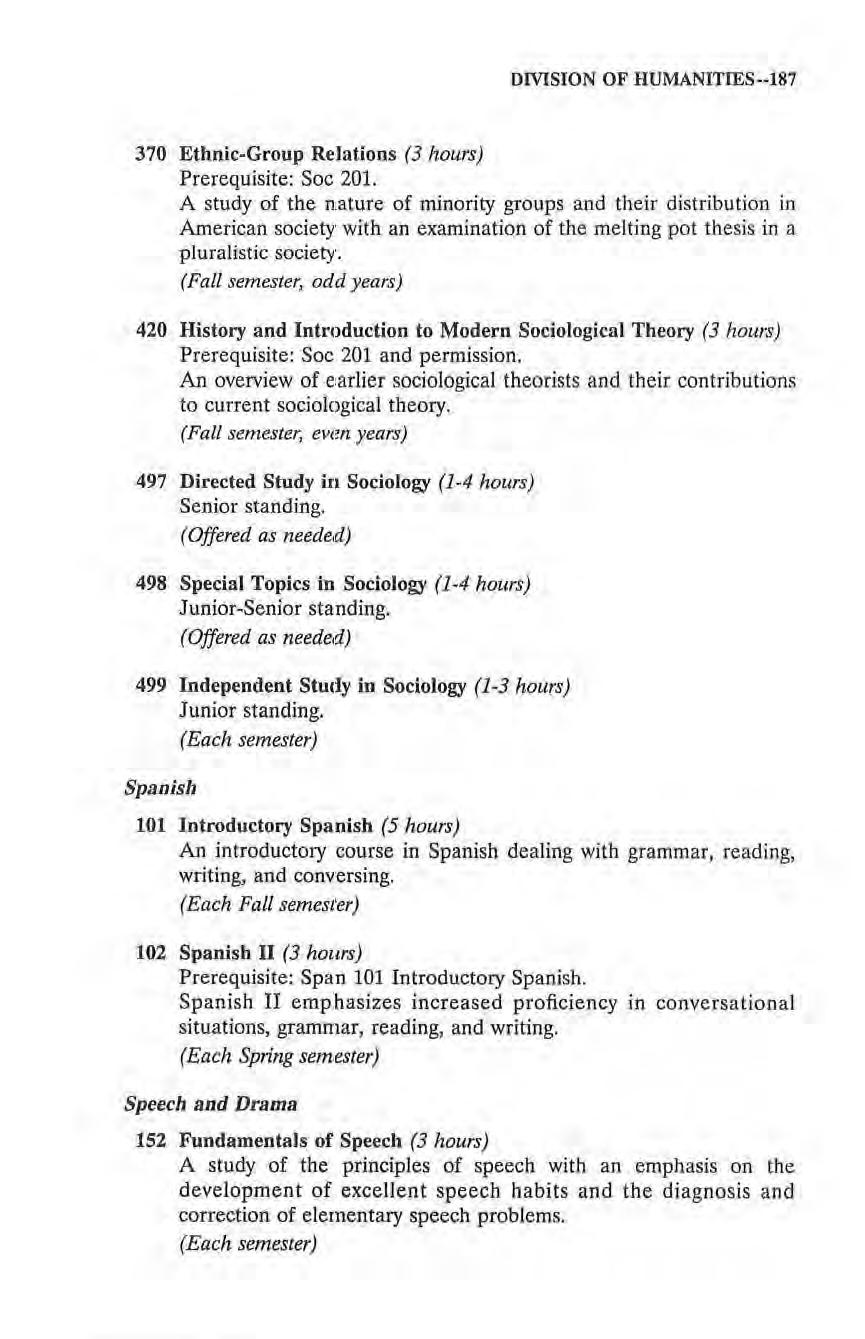
(Fall semester, evim years)
497 Directed Study in Sociology (1-4 hours) Senior stancling.
(Offered as needed)
498 Special Topics in Sociology (1-4 hours) Junior-Senior standing.
(Offered as nee4ed.)
499 Independent Study in Sociology (1-3 hours) Junior standing.
(Each semester)
Spanish
101 Introductory Spanish (5 hours)
An introductory course in Spanish dealing with grammar, reading, writing, and conversing.
(Each Fall semester)
102 Spanish ll (3 hours)
Prerequisite: Span 101 Introductory Spanish . Spanish II emphasizes increased proficiency in conve rsational situations, grammar, readrng, and writing.
(Each Spring semester)
Speech and Drama
152 Fundamentals of Speech (3 hours)
A study of the principles of speech with an e mph asis on t he development of excellent speech habits and the diagnosis and correction of elementary speech problems.
(Each semester)
DMSION OF HUMANITIES--187
232 Introduct ion to Theatre (3 hours)
An introduction to all forms of drama and styles of theatrical presentation and production as a means of developing the student's critical appreciation of the theatre arts.
(Each semester)
235 Stagecrafts (3 hol',/.rS)
An introduction to the study and practice of the basic aspects of technical theatre production including sets, lighting, costuming, sound, properties., and make-up.
(Sp!ing semester, c~ven years)
254 Public Speaking ,(3 hours)
A study of the forms of address, speech organization, composition, delivery, and Parliamentary rules with practice required in various public speaking situations including public meetings and group discussions, radio and television broadcasting, interviewing, ro leplaying, and debate.
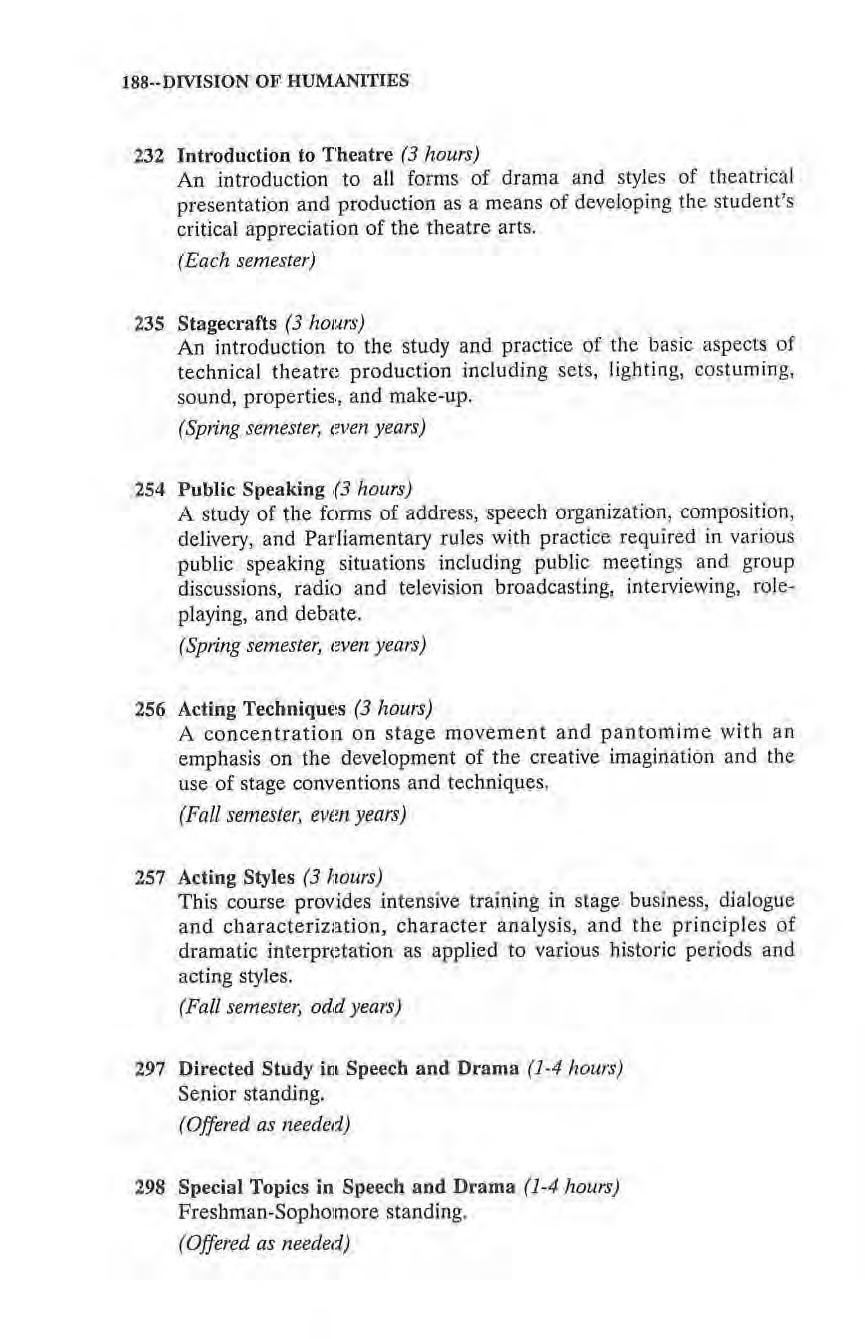
(Spring semester, even yea rs)
256 Acting Techniqu€is (3 hours)
A concentration on stage movement and pantomime with an emphasis on the development of the creative imagination and the use of stage conventions and techniques.
(Fall semester, even years)
257 Acting Styles (3 hours)
This course provides intensive training in stage business, dialogue and characterization, character analysis, and the principles of dramatic interpretation as applied to various historic periods and acting styles.
(Fall semester, od,d years)
297 Directed Study i111 Speech and Drama (1-4 hours) Senior standing.
(Offered as needed)
298 Special Topics in Speech and Drama (1-4 hours) Freshman-Sophomore standing
(Offered as needed)
188--DMSION OF HUMANITIES
300 Summer Theatre Workshop (3 hours)
This course offers practical training in all aspects of theatre production including acting, set design, lighting, costuming, make-up, improvisation, music, and dancing.
(Offered as needed, Summers only)
327 Light and Sound Design for Stage and Television (3 hours)
Prerequisite: Speh 235.
This course studies the theory and practice of stage and television lighting and sound systems with an emphasis on color, acoustical, and light problems.
(Spring semester, odd years)
353 Speech Correction and Development (3 hours)
This course ide ntifies the unique educational problems of children with speech deficiencies with an emphasis on identification and remediation.
(Each Spring semester)
355 Play Production in the Secondary School (3 hours)
Thfa course for the director of dramatics in schools and communities answers the fundamental questions of play selection, cast in g, directing, steps in rehearsal, scenery, lighting, costume, make-up, and business organization.
(Fall semester, odd years)
357 Interpretative Reading (3 hours)
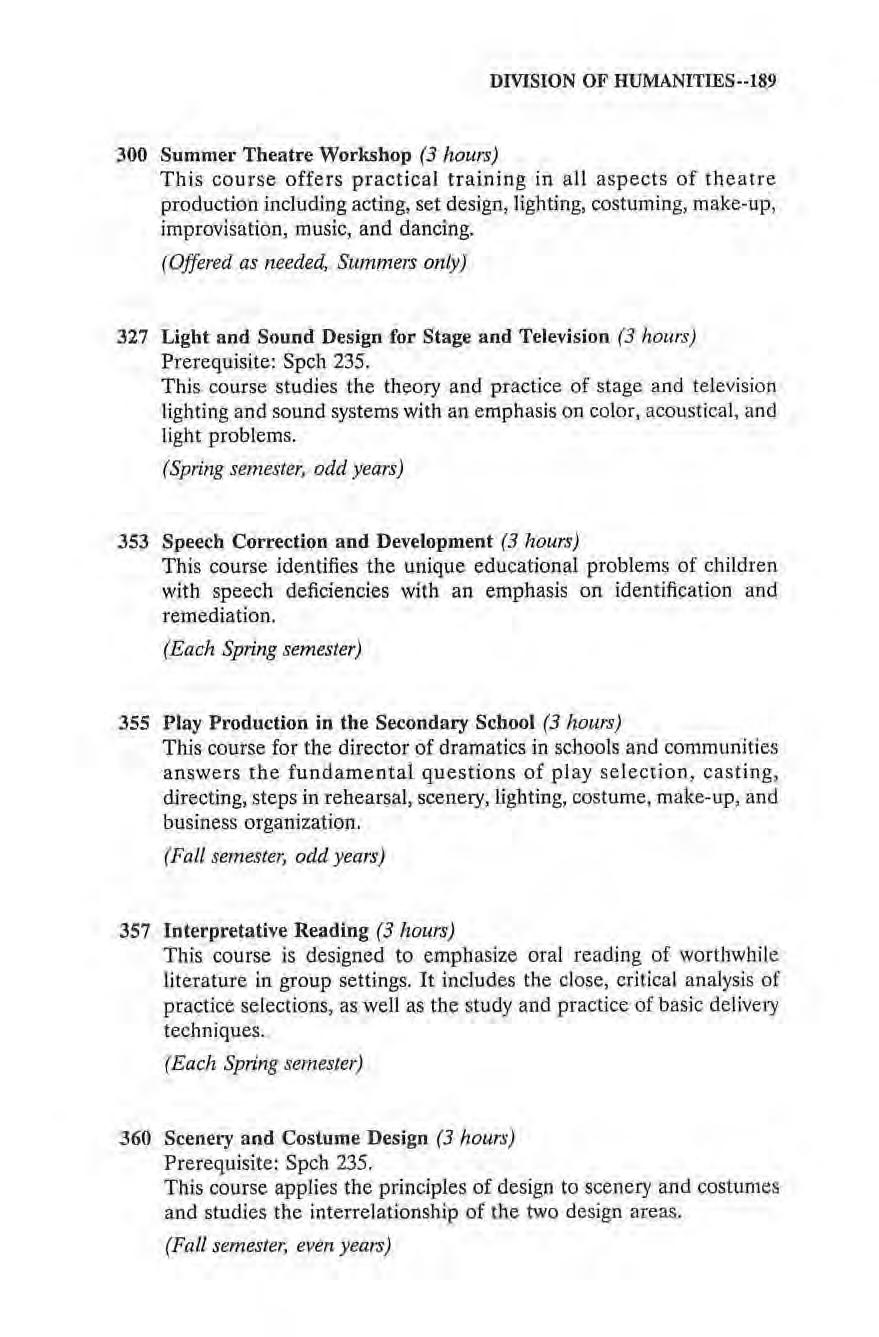
This course is designed to emphasize oral reading of worthwhile literature in group settings. It includes the close, critical analysis of practice selections, as well as the study and practice of basic delivery techniques.
(Each Sp,-ing semester)
360 Scenery and Costume Design (3 hours)
Prerequisite: Speh 235.
This course applies the principles of des ign to scenery and costumes and studjes the interrelationship of the two design areas.
(Fall semeste1~ even years)
DIVISION OF HUMANITIES -·189
363 Directing l (3 hours)
Prerequisite: Speh 256. This course answers the fundamental questions of play selection, casting, directing, scenery, lighting, costume, and make-up for the one-act play.
(Spring semester, odd years)
364 Directing II (3 hours)
Prerequisites: Speh 256 and 363. Further study in the historical interpretations of action, and an intense practical application of the fundamentals learned in Directing I in staged scenes and staging a one-act play.
(Spring semeste1~ e11en years)
369 Children's Theatre and Creative Dramatics (3 hours)
The study and active participation in the two different concepts of drama for young people. Creative dramatics, in which children with the guidance of an imaginative leader create scenes or plays and perform them using improvised dialogue and action with personal development as the goal, and Children's Theatre which utilizes written scripts directed and performed as a complete production for child audiences.
(Fall Semester, even years)
400 Theatre History (3 hours)
This course will examine the nature, function, and literature of the theatre from its beginning to the present day. The approach will consist of a study of each of the major periods in theatre history and representative plays of that period.
(Fall semester, odd years)
497 Directed Study in Speech and Drama (1-4 hours)
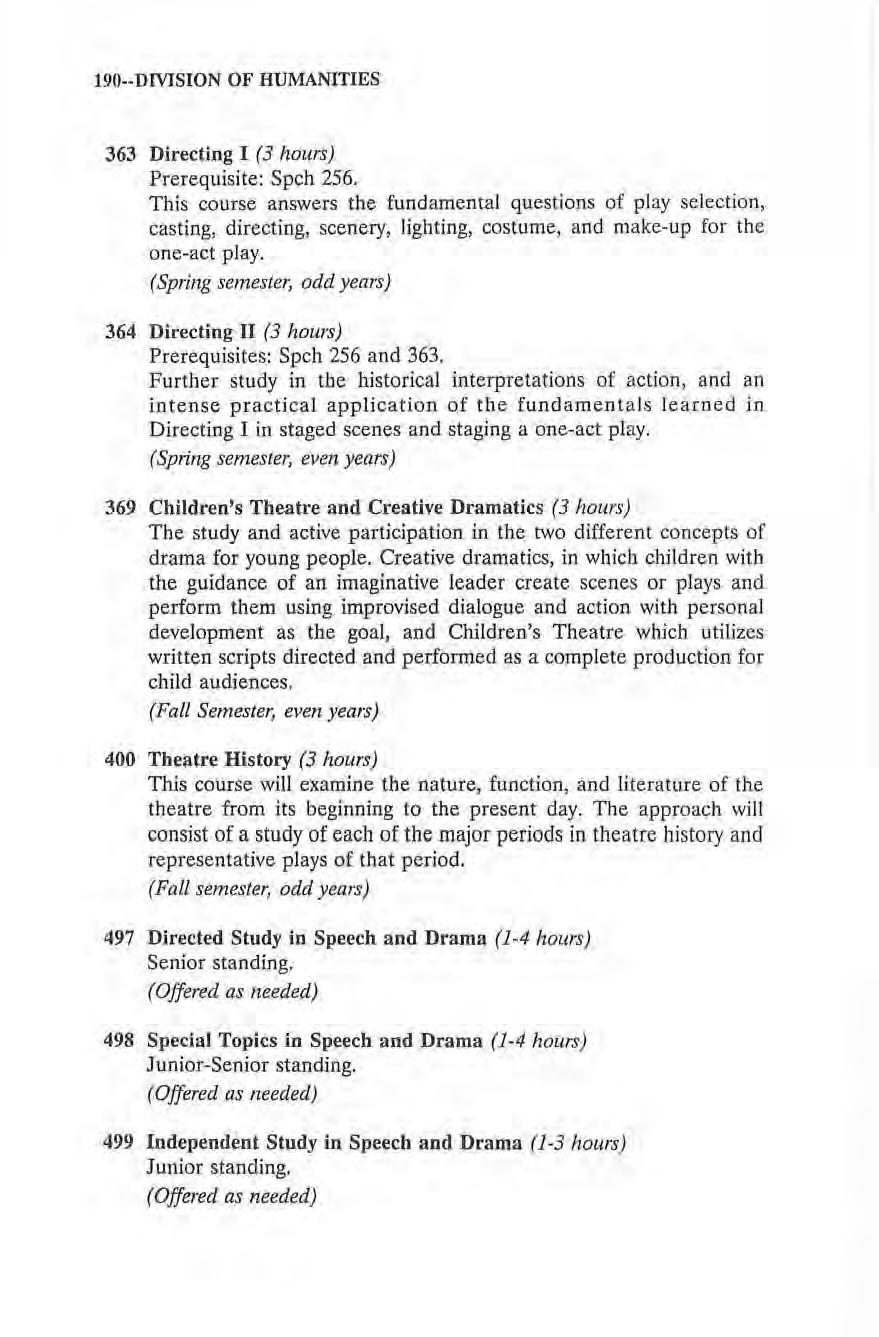
Senior standing.
(Offered as needed)
498 Special Topics in Speech and Drama (1-4 hours)
Junior-Senior standing.
(Offered as needed)
499 Independent Study in Speech and Drama (1 -3 hours)
Junior standing.
(Offered as needed)
190 DMSION OF HUMANITIES
DMSION OF SCIENCE AND TECHNOLOGY
Dr. David L. Pippert, Chairperson
Professors: Long, Pappas, Pippert, Russ ell
Associate Professors: Longley
Ass istant Professors: Evans, Fegan, K.lubertanz, Mccaslin, Udey
Instructors: Hinrichs
The Divis ion of Science and Technology offers course work in the areas of Biological Science, Chemistry, Computer Science, General Science, Geology, I ndustrial Technology and Education, Mathematics, and Physics. Specific programs within the Division are designed to sa tisfy a wide variety of career goals by providing prerequisites for graduate study, offe ring teaching endorsements at the secondary level, and providing course work for personal enrichme nt.
The Division offers B.A. and B.S. degrees with majors in Computer Science, Natnral Science, Mathematks and 1ndustrial Technology and Education. Area of specialization (options) within the Natural Science major include Biological Science, Wildlife Ecology, Chemistry, Natural Science, Nuclear Technology, and Physical Science. Areas of specialization within the Industrial Technology and Education major include Industrial Management Technology, Electronics/Robotics Technology, Power and Transportation T echnology, and Construction T echnology.
Teacher education programs for endorsement in Biology, Chemistry, Computer Science, Natural Science, I ndustrial Technology, Mathematics, and Physical Science are also available. The subject endorsements in Biology and Chemistry do not satisfy the requirements for a major unless a second s ubje ct endorsement is obtained. The Computer Science endorsement is designed to complement the requirements for one field or two subject endorsements in other areas.
The technology options within the Division provide practical applications and the understanding of modern technology. The major objective is to enable individuals to prepare for professional, occupational, or personal living needs through study and laboratory activities. The curriculum is designed to help student~ acquire the knowledge and skills necessary to obtain entry level employment in their area of preparation or to pmvide a basis for further advanced study.
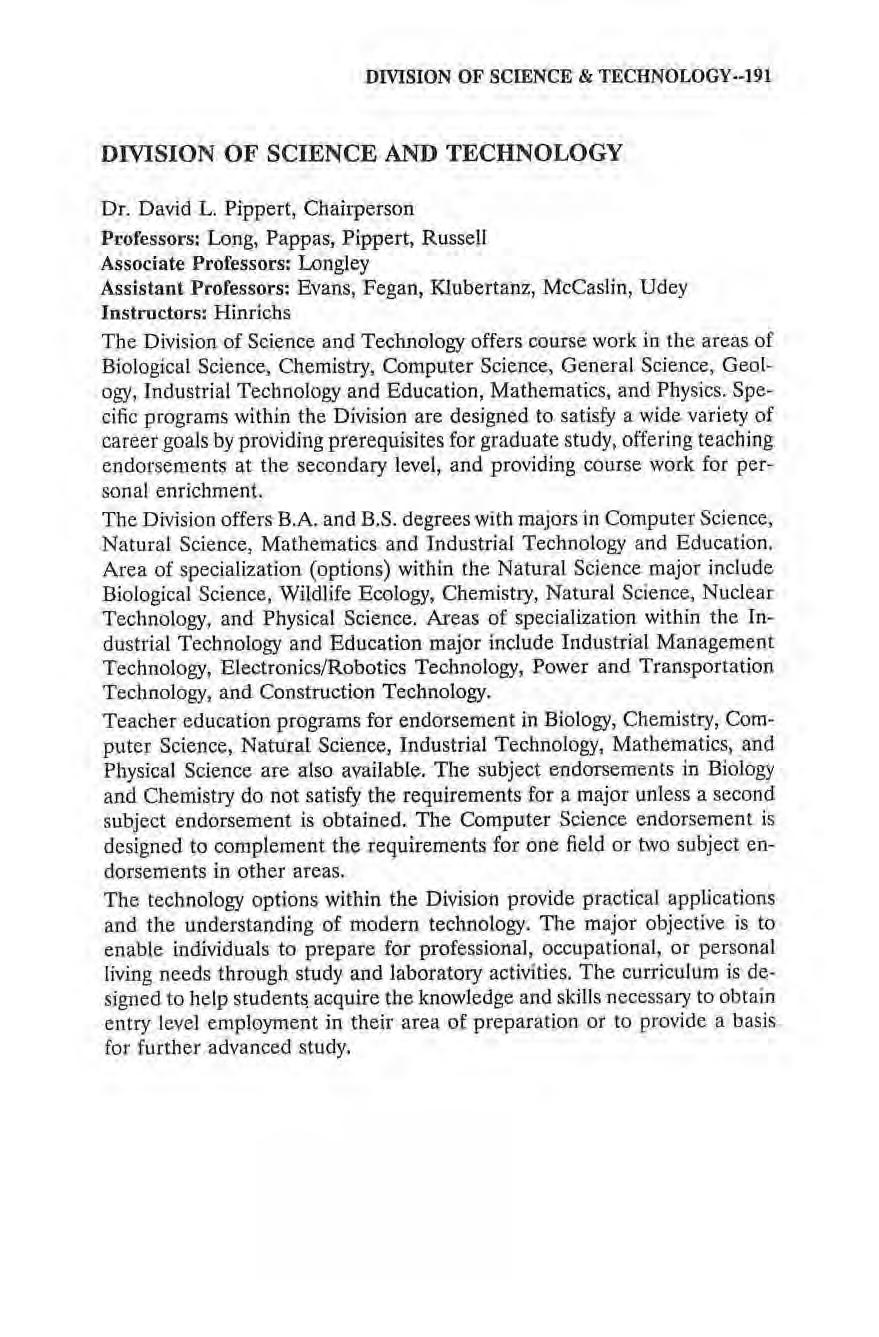
DMSION OF SClENCE & TECHNOLOGY--19 1
Natural Science
The Natural Science Bachelors Degree Program (B.S., B.A.) consists of a core of courses to provide the students with a general background. In addition to completing these core courses, the student must also select and complete one of the several options within the curriculum. These options will allow the student to work towards one of a variety of career and occupational goals.
Requirem ents for Biological Science Option
The Biological Science option is designed for st ud ents planning to enroll in a graduate or professional school after completion of the baccalaureate degree.
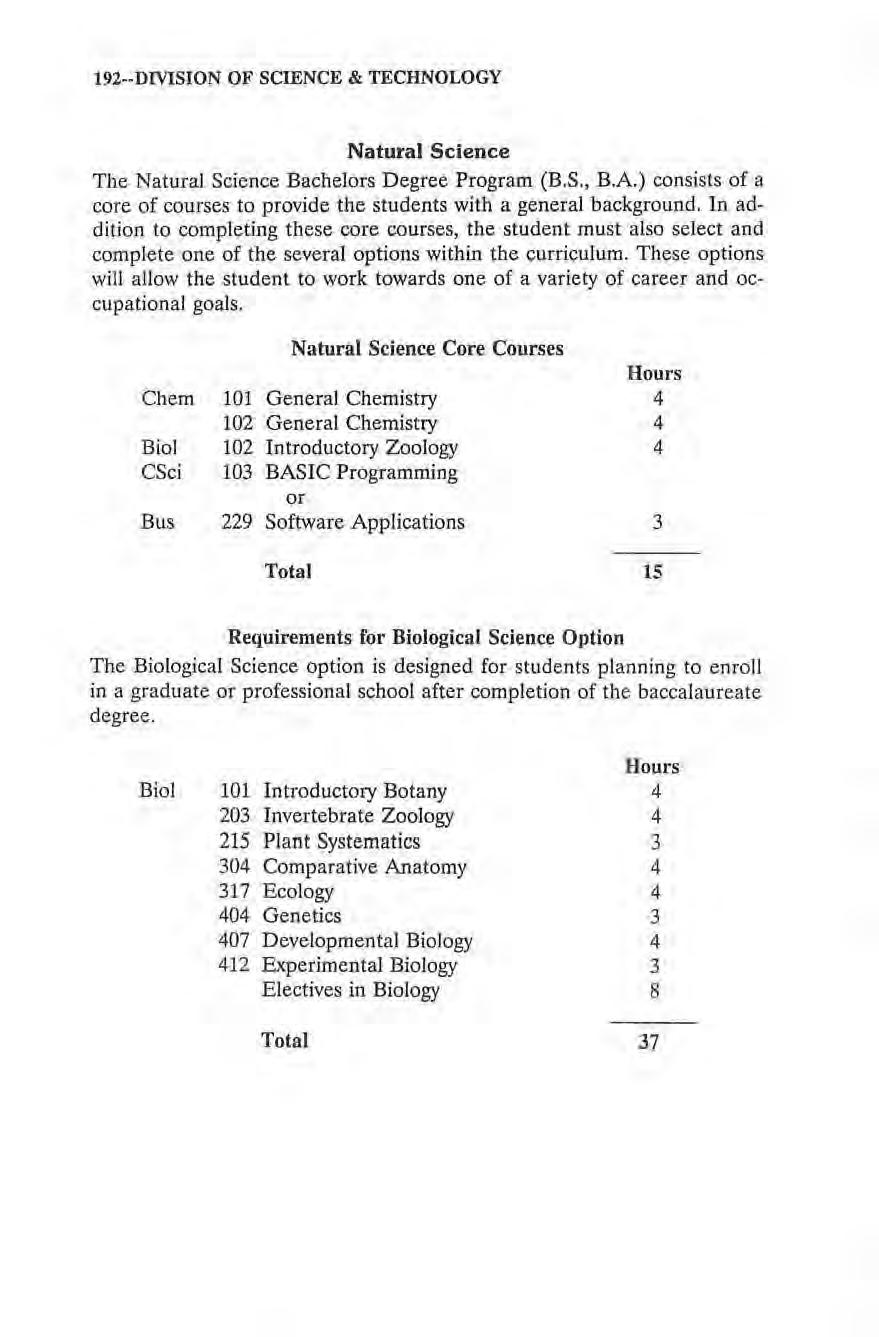
192--DIVISION OF SCIENCE & TECHNOLOGY
Natural Science Core Courses Hours Chern 101 General Chemistry 4 102 General Chemistry 4 Biol 102 Introductory Zoology 4 CSci 103 BAS IC Programming or Bus 229 Software Applications 3 Tota l 15
Hours Biol 101 Introductory Botany 4 203 Invertebrate Zoology 4 215 Plant Systematics 3 304 Comparative Anatomy 4 317 Ecology 4 404 Genetics 3 407 Developmental Biology 4 412 Experimental Biology 3 Electives in Biology 8 Total 37
Requirements for Wildlife Ecology Option
The Wildlife Ecology option is designed for students interested in careers as conservation officers or park rangers.
Requirements for Biology Subject Endorsement Option
A biology subject endorsement is offered as part of the teacher education program. A second subject endorsement is required in order to satisfy the requirement for a major.
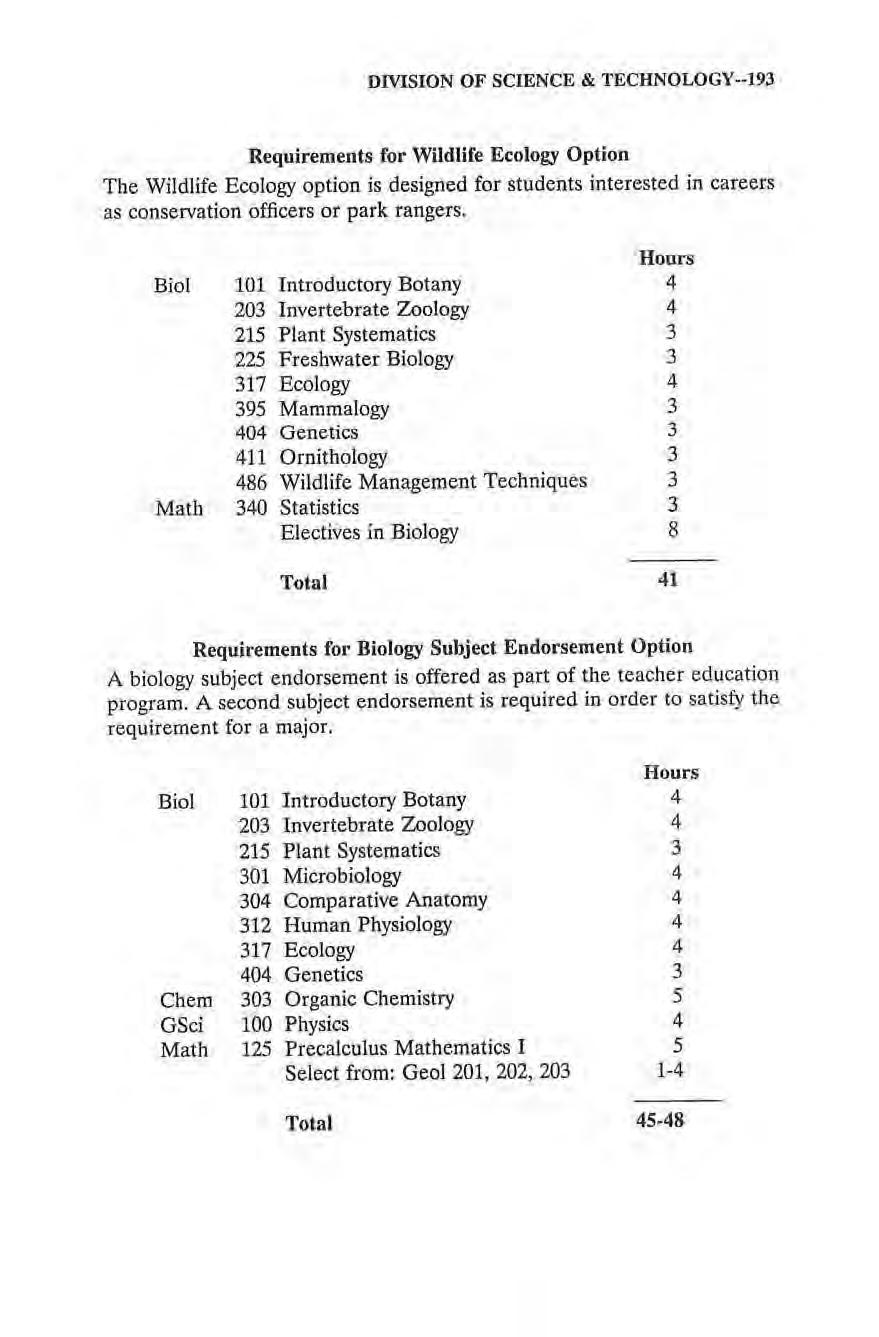
DIVISION OF SClENCE & TECHNOLOGY--193
Biol 101 Introductory Botany 203 Invertebrate Zoology 215 Plant Systematics 225 Freshwater Biology 317 Ecology 395 Mammalogy 404 Genetics 411 Ornithology 486 Wildlife Management Techniques Math 340 Statistics Electives in Biology Total Hours 4 4 3 3 4 3 3 3 3 3 8 41
Biol Chem GSci Math 101 Introductory Botany 203 Invertebrate Zoology 215 Plant Systematics 301 Microbiology 304 Comparative Anatomy 312 Human Physiology 317 Ecology 404 Genetics 303 Organic Chemistry 100 Physics 125 Precalculus Mathematics I Select from: Geol 201, 202, 203 Total Hours 4 4 3 4 4 4 4 3 5 4 5 1-4 45-48
A chemistry s ubje ct endorsement is offered as part of th e tea c her education program , A second subject endorsement is required in order to satisfy the requirement for a major.
Requirements for Natura l Sci ence Option
T he requirements listed represent both the education and non-education degree programs. If the teaching endorsement is chosen, attention must be given to the additional courses required for entrance into the teacher education program professional semester. In the teacher education program , Natural Science is a field endorsement.
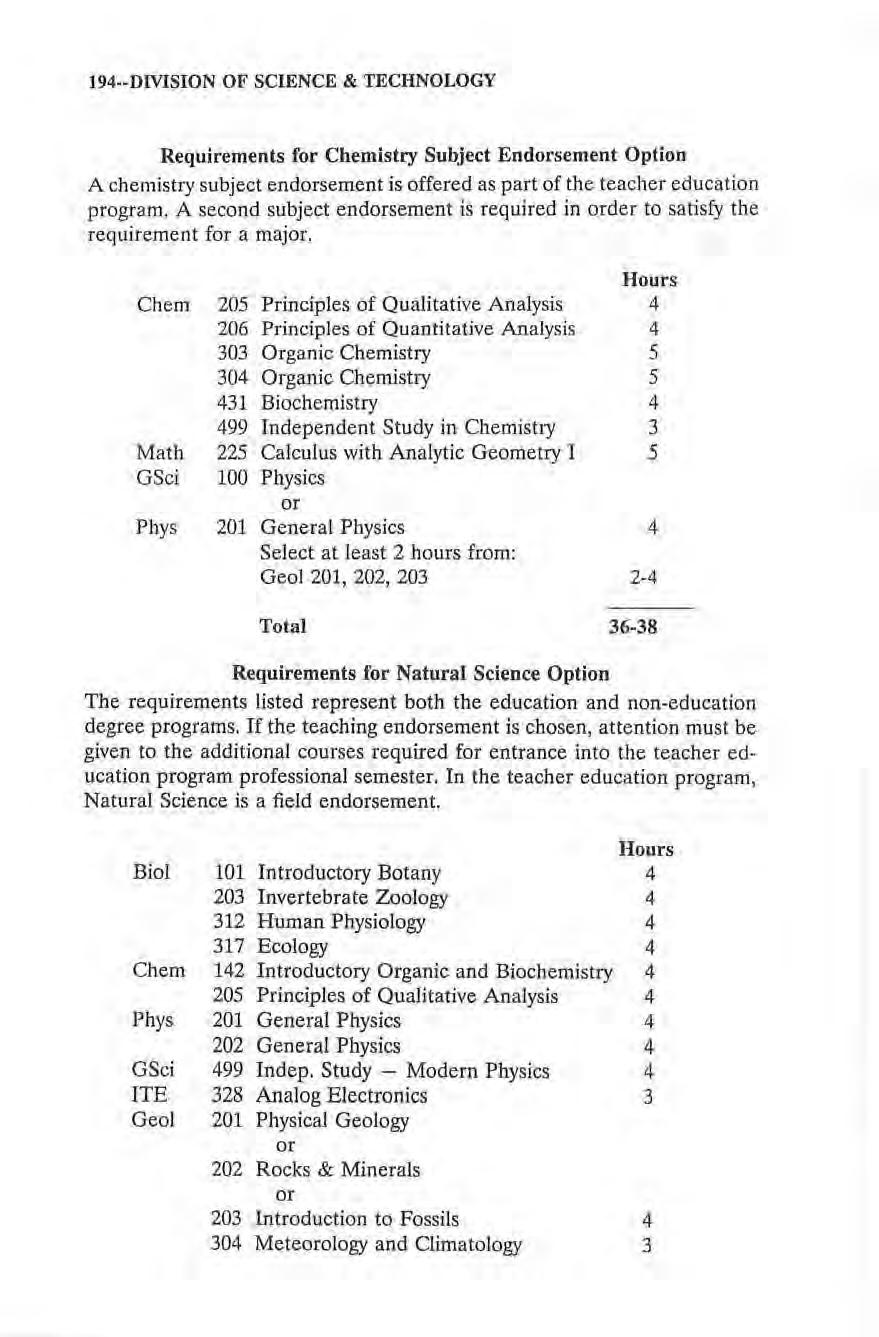
194--DMSION OF SCIENCE & TECHNOLOGY
Req uirements for Chemistry Subject Endorseme n t Optio n
Chem Math GSci Phys Ho urs 2 05 Principles of Qualitative Analysis 4 206 Principles of Quantitative Analysis 4 303 O rganic Chemistry 5 304 Organic Chemistry 5 431 Biochemistry 4 499 Independent Study in Chemistry 3 225 Calculus with Analytic Geometry I 5 100 Physics or 201 General Phys ics 4 Select at least 2 hours from: Geo! 201, 202, 203 2-4 Tot:al 36-38
Biol Chem Phys GSci ITE Geol 101 Introductory Botany 203 Invertebrate Zoology 312 Human Physiology 317 Ecology 142 Introductory Organic and Biochemistry 205 Principles of Qualitative Analysis 201 General Physics 202 General Physics 499 Indep. Study - Modern Physics 328 Analog Electronics 201 Physical Geology or 202 Rocks & Minerals or 203 Introduction to Fossils 304 Meteorology and Climatology Hours 4 4 4 4 4 4 4 4 4 3 4 3
Additional work in either Biology, Chemistry, Physics or Earth Science is required so that the candidate has completed at least 20 semester hours in one of these subjects. Requirements
In addition to the specific coursework requirements listed below, the candidat e for this option must a lso be a licensed reacto r operator. Questions regarding this program should be directed to the Chairperson of the Divisio n of Science and Technology.
The requirements listed represen t both the education and non-education degree programs. If the teaching endorsement is chosen, attention must b e given to the additional course required for entran ce into the teacher ed ucation program professional semester. In the teacher education program, Physical Science is a field endorsement
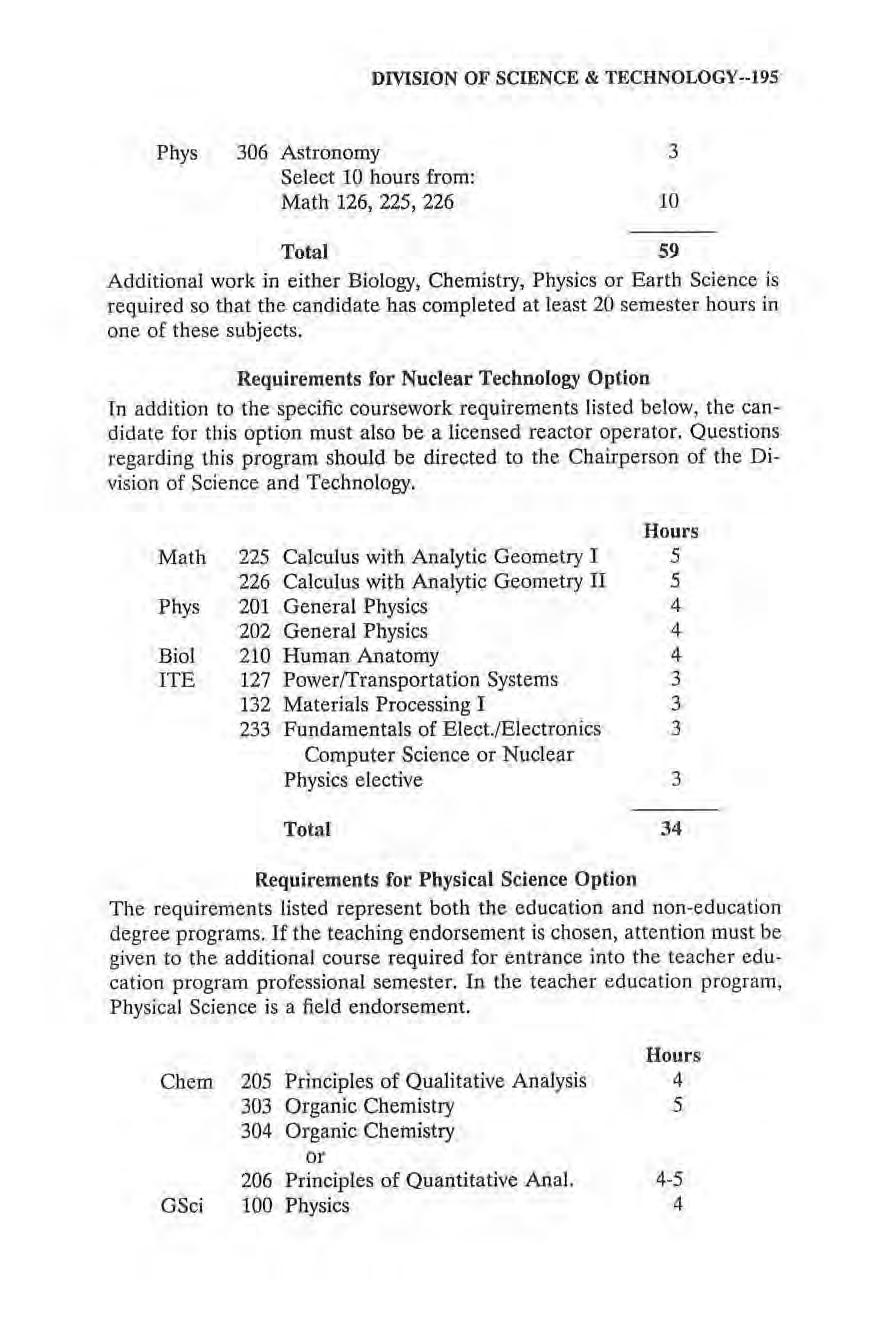
DMSION OF SCIENCE & TECHNOLOGY--195 Phys 306 Astronomy 3 Select 10 hours from: Math 126, 225, 226 Total 59
for Nuclear Technology Option
Math 225 Calculus with Analytic Geometry I 226 Calculus with Analytic Geometry JI Phys 201 General Physics 202 Gene ral Physics Biol 210 Human Anatomy ITE 127 Power/fransportation Systems 132 Materials Processing I 233 Fundamentals of Elect/Electronics Computer Science or Nuclear Physics elective Total Requirements for Physical Science Option Hours 5 5 4 4 4 3 3 3 3 34
Hours Cbem 205 Principles of Qualitatjve A nalysis 4 303 Organic Chemistry 5 304 Organic Chemistry or 206 Principles of Quantitative Anal. 4-5 GSci 100 Physics 4
After completing a core curriculum, two options are available to students interested in a Computer Science major-the technical option and the business application option. Students majoring in other areas and seeking background in computers may select the Computer Science minor.
"'Students who have successfully completed mathematics courses equivalent to Math 125 and Math 126 may have these courses waived. Consent of Division Chairperson is required. If consent is given, only 54 hours are required for the major.
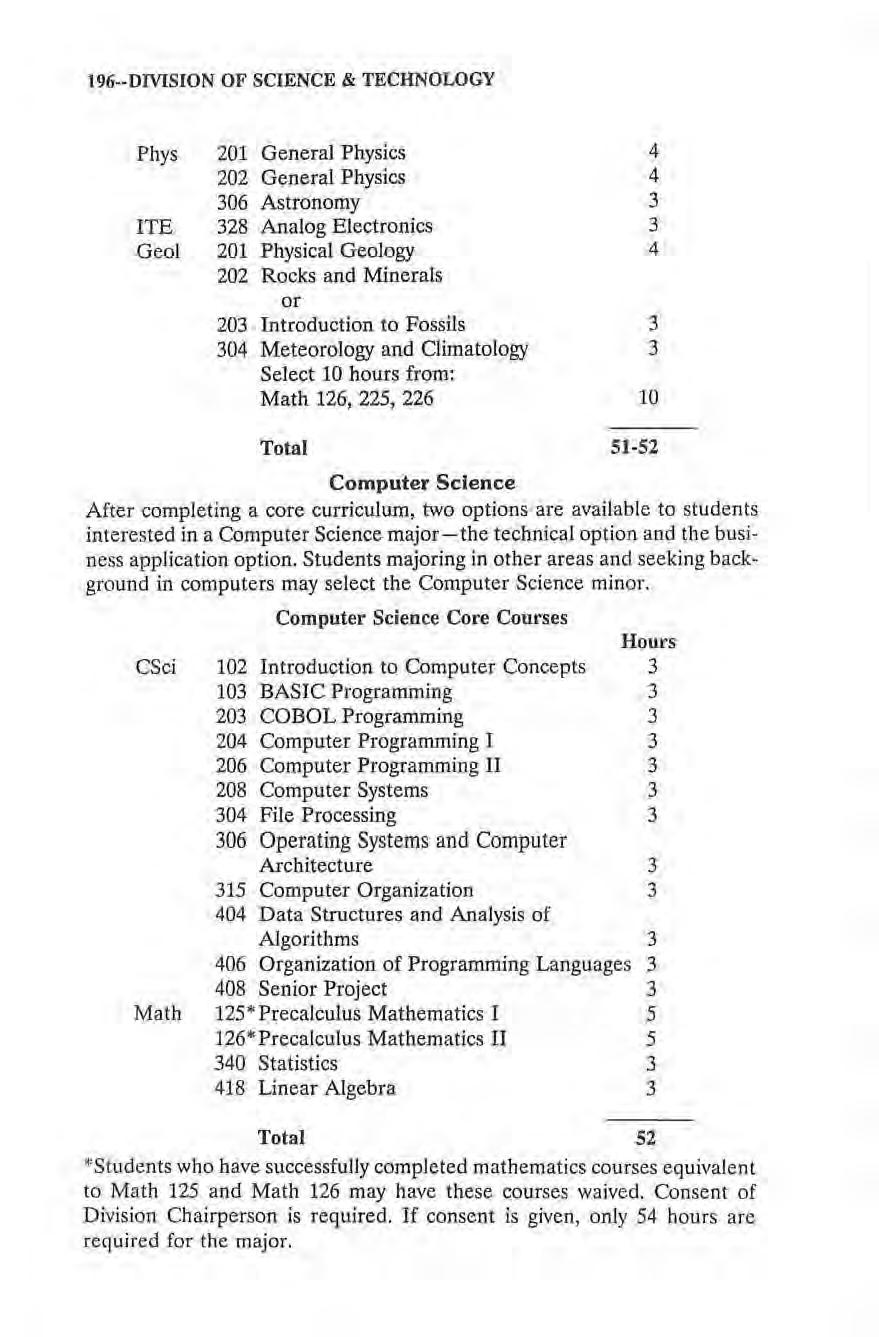
196--DMSION OF SCIENCE & TECHNOLOGY Phys 201 General Physics 4 202 General Physics 4 306 Astronomy 3 ITE 328 Analog Electronics 3 Geo! 201 Physical Geology 4 202 Rocks and Minerals or 203 Introduction to Fossils 3 304 Meteorology and Climatology 3 Select 10 hours from: Math 126, 225, 226 10 Total 51 -52
Computer Science
Computer Science Core Courses Hours CSci 102 Introduction to Computer Concepts 3 103 BASIC Programming 3 203 COBOL Programming 3 204 Computer Programming I 3 206 Computer Programming II 3 208 Computer Systems 3 304 File Processing 3 306 Operating Systems and Computer Architecture 3 315 Computer Organization 3 404 Data Structures and Analysis of Algorithms 3 406 Organization of Programming Languages 3 408 Senior Project 3 Math 125""Precalculus Mathematics I 5 126*Precalculus Mathematics II 5 340 Statistics 3 418 Linear Algebra 3 Total 52
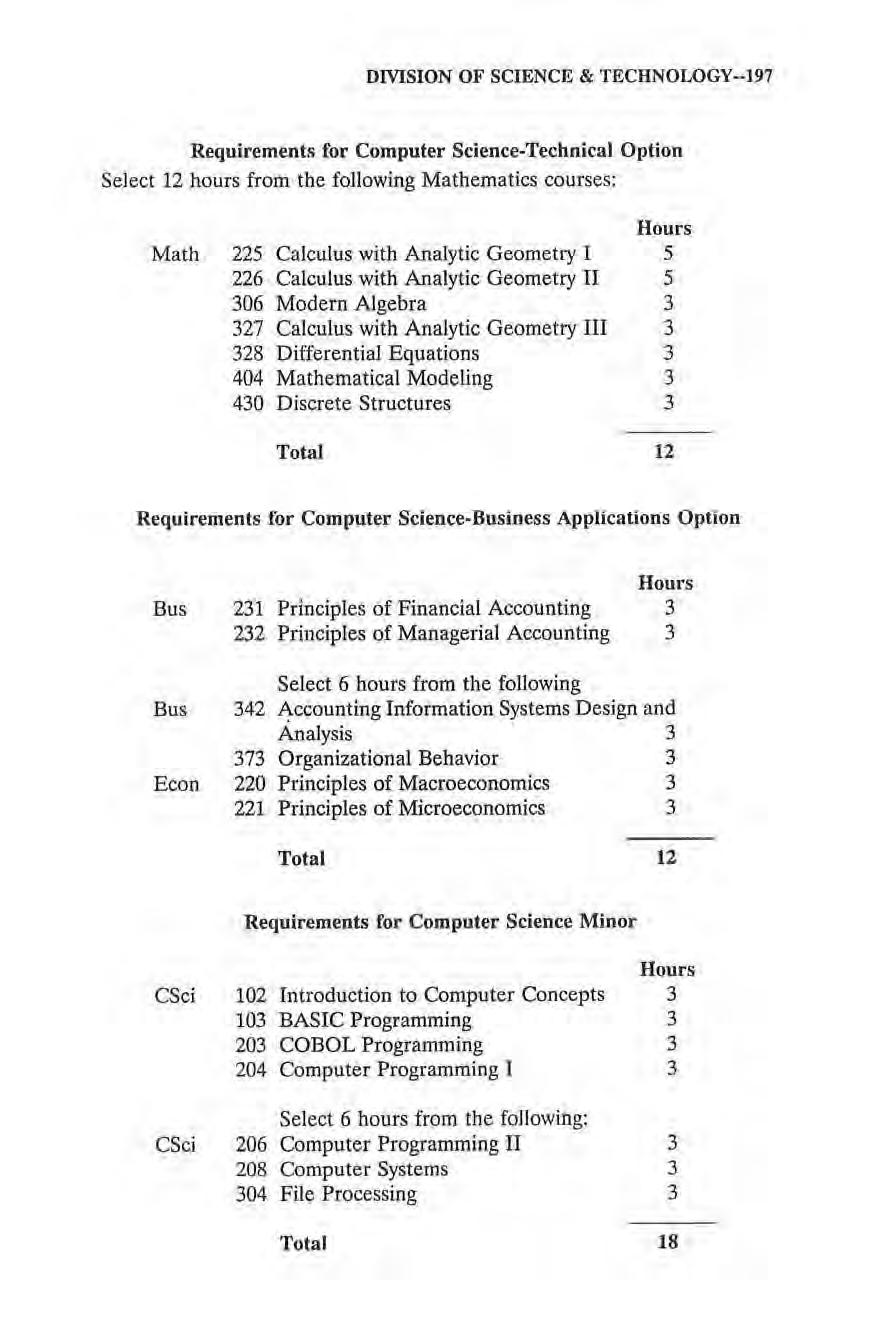
DMSION OF SCIENCE & TECHNOLOGY--197 Requirements for Computer Science-Technical Option Select 12 hours from the following Mathematics courses: Math 225 Calculus with Analytic Geometry I 226 Calculus with Analytic Geometry II 306 Modem Algebra 327 Calculus with Analytic Geometry Ill 328 Differential Equations 404 Mathematical Modeling 430 Discrete Structures Total Hours 5 5 3 3 3 3 3 12 Requirements fo r Computer Science-Business Applications Option Bus 231 Principles of Financial Accounting 232 Principles of Managerial Accounting Select 6 hou rs from the foJJowing Hours 3 3 Bus 342 ~ccounting Information Systems Design and Analysis 3 373 Organizational Behavior 3 Econ 220 Princ iples of Macroeconomics 3 CSci CSci 221 Principles of Microeconomics 3 Total Requirements for Computer Science Minor 102 Introduction to Computer Concepts 103 BASIC Programming 203 COBOL Programming 204 Computer Programming I Select 6 hours from the following: 206 Computer Programming II 208 Computer Systems 304 File Processing Total 12 Hours 3 3 3 3 3 3 3 18
Requirements for Computer Science Supp lemental Endorsement
To obtain the endorsement, teacher education students must also satisfy the requirement of a major in either one field or two subjects.
The mathematics major has two options, a mathematics option and a mathematics education option (field endorsement).
If the mathematics education option is chosen, attention must be given to the additional cou rse work requirements for entrance into the secondary teacher education program and to the professional semest er. Mathematics is a field endorsement in the teacher education program. Students who have taken mathematics courses equivalent to Math 125 a nd 126 should begin their program with Math 225. Consent of the Division Chairperson is required.
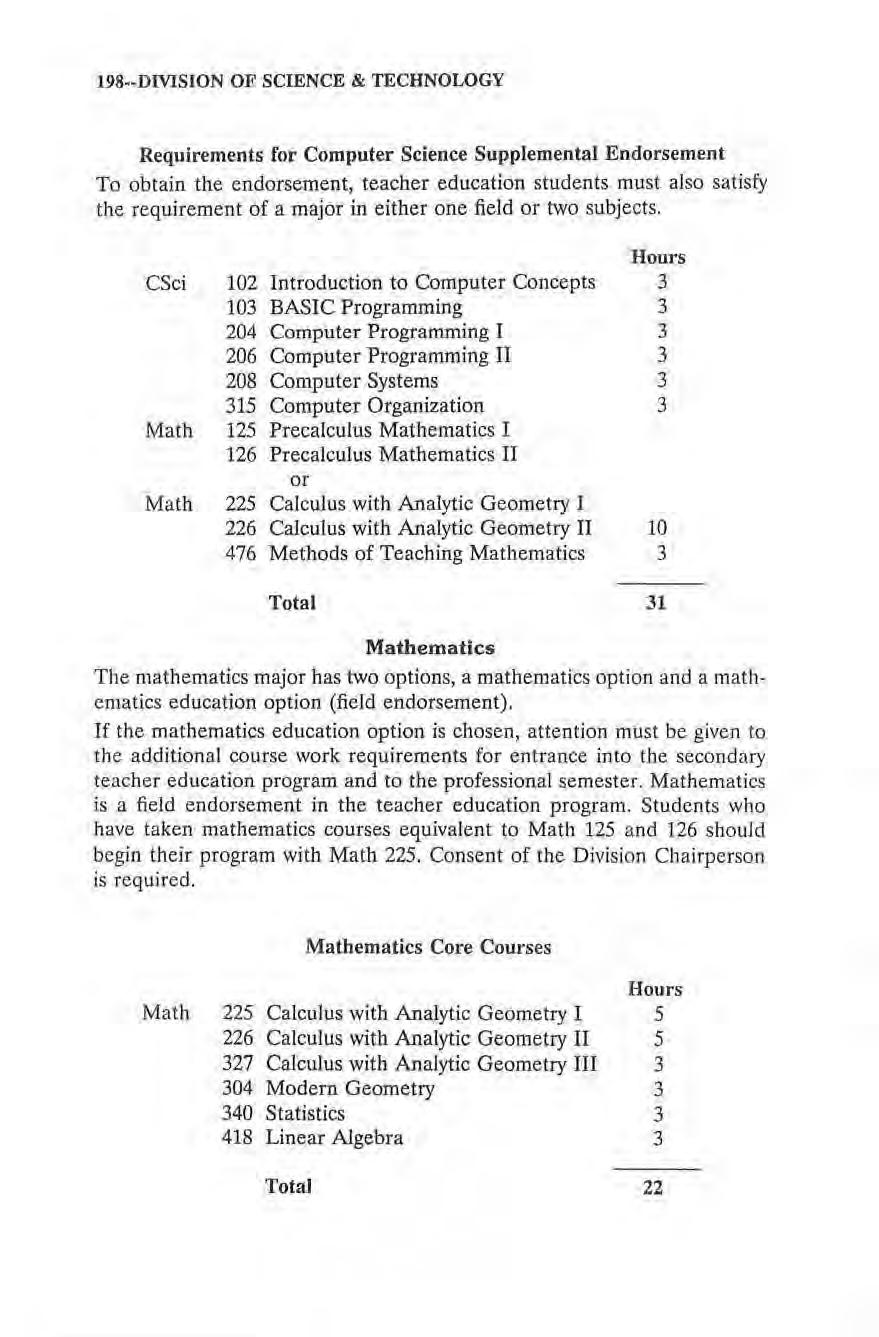
198--DMSTON OF SCIENCE & TECHNOLOGY
CSci 102 Introduction to Computer Concepts 103 BASIC Programming 204 Computer Programming I 206 Computer Programming II 208 Computer Systems 315 Computer Organization Math 125 Precalculus Mathematics I 126 Precalcu1us Mathematics II or Math 225 Calculus with Analytic Geometry I Hours 3 3 3 3 3 3 226 Calculus with Analytic Geometry II 10 476 Methods of Teaching Mathematics 3 Total 31 Mathematics
Math Mathematics Core Courses 225 Calculus with Analytic Geometry I 226 Calculus with Analytic Geometry II 327 Calculus with Analytic Geometry III 304 Modern Geometry 340 Statistics 418 Linear Algebra Total Hours 5 5 3 3 3 3 22
major with the consent of the Division Chairperson.
* A student who has taken Mathematics courses eq uivalent to Math 125 and 126 may waive the precalculus requirement. In such cases, a total of 42 hours are needed for the field endorsement. Consent of the Division Chairperson is required.
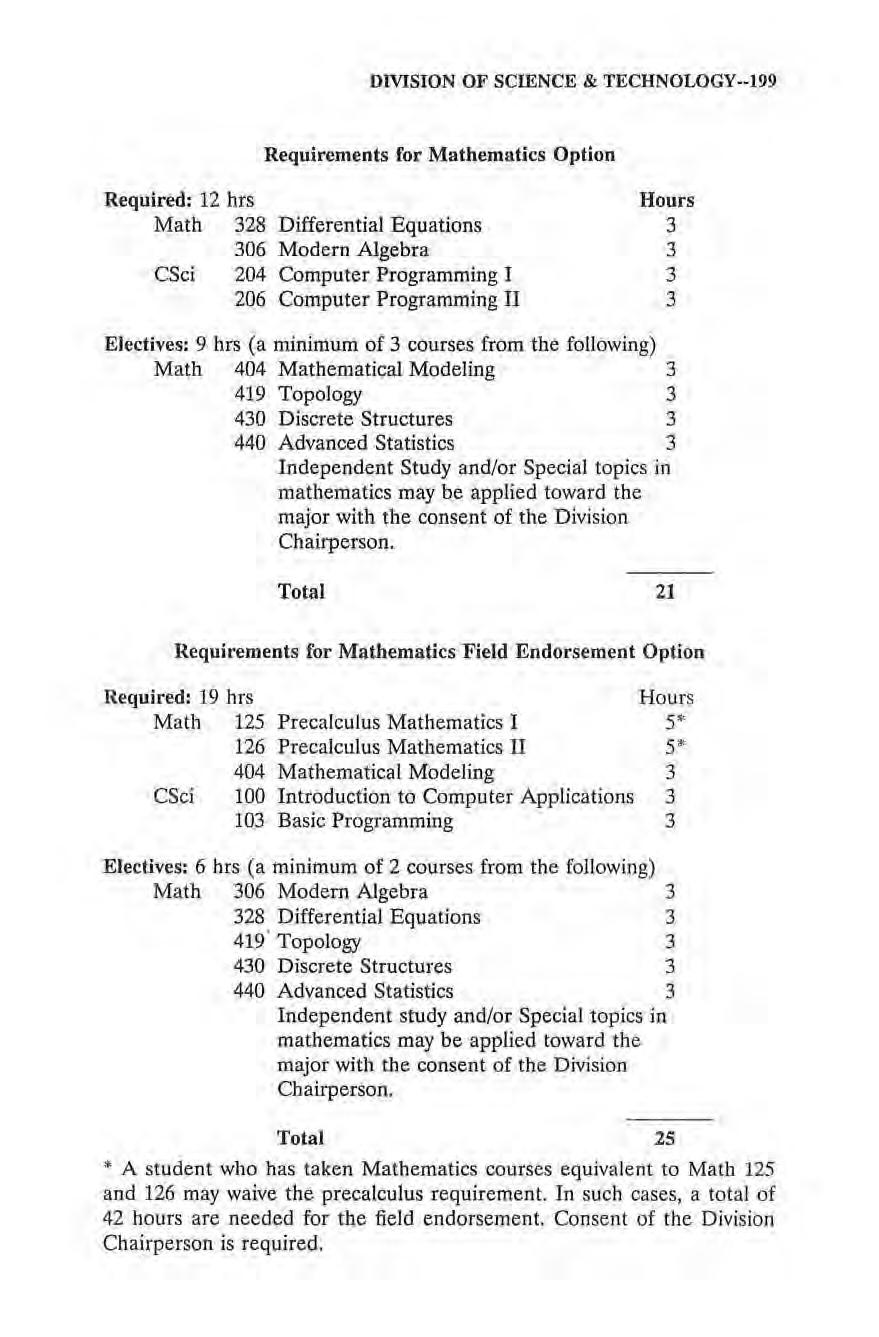
DIVISION OF SCIENCE & TECHNOLOGY--199 Requi rements for Mathematics Option Required: 12 hrs Math 328 Differential Equations 306 Modern Algebra CSci 204 Computer Programming I 206 Computer Programming TI Hours 3 3 3 3 Electi ves: 9 hrs (a minimum of 3 courses from the following) Math 404 Mathematical Modeling 3 419 Topology 3 430 Discrete Structures 3 440 Advanced Statistics 3 Independent Study and/or Special top ics in mathematics may be applied toward the major with the consent of the Division Chairperson. Total 21 Requirements for Mathematics Field En dorsemen t Option Required: 19 hrs Hours Math 125 Precalculus Mathematics I 5" 126 Precalculus Mathematics II 5"' 404 Mathematical Modeling 3 CSci 100 Introduction to Computer Applications 3 103 Basic Programming 3 Electives: 6 hrs (a minimum of 2 courses from the following) Math 306 Modern Algebra 3 328 Differential Equations 3 419. Topology 3 430 Discrete Structures 3 440 Advanced Statistics 3 Independent study and/or Special topics in mathematics may be
Total
applied toward the
25
Industrial Technology and Education
The Industrial Technology and Education Bachelors D egree Program consists of a core of technical courses to provide the student with a broad general background of technology. The several options available within the curriculum enable the student to specialize in one of a number of different occupational or professional areas.
Industrial Technology Education Option
The Industrial Technology Educa tion option is for those who plan to teach Industrial Technology in public or private secondary schools. The professional education requirements must be met in addition to the courses listed for a teaching endorsement.
Requirements for Industrial Technology Education Option
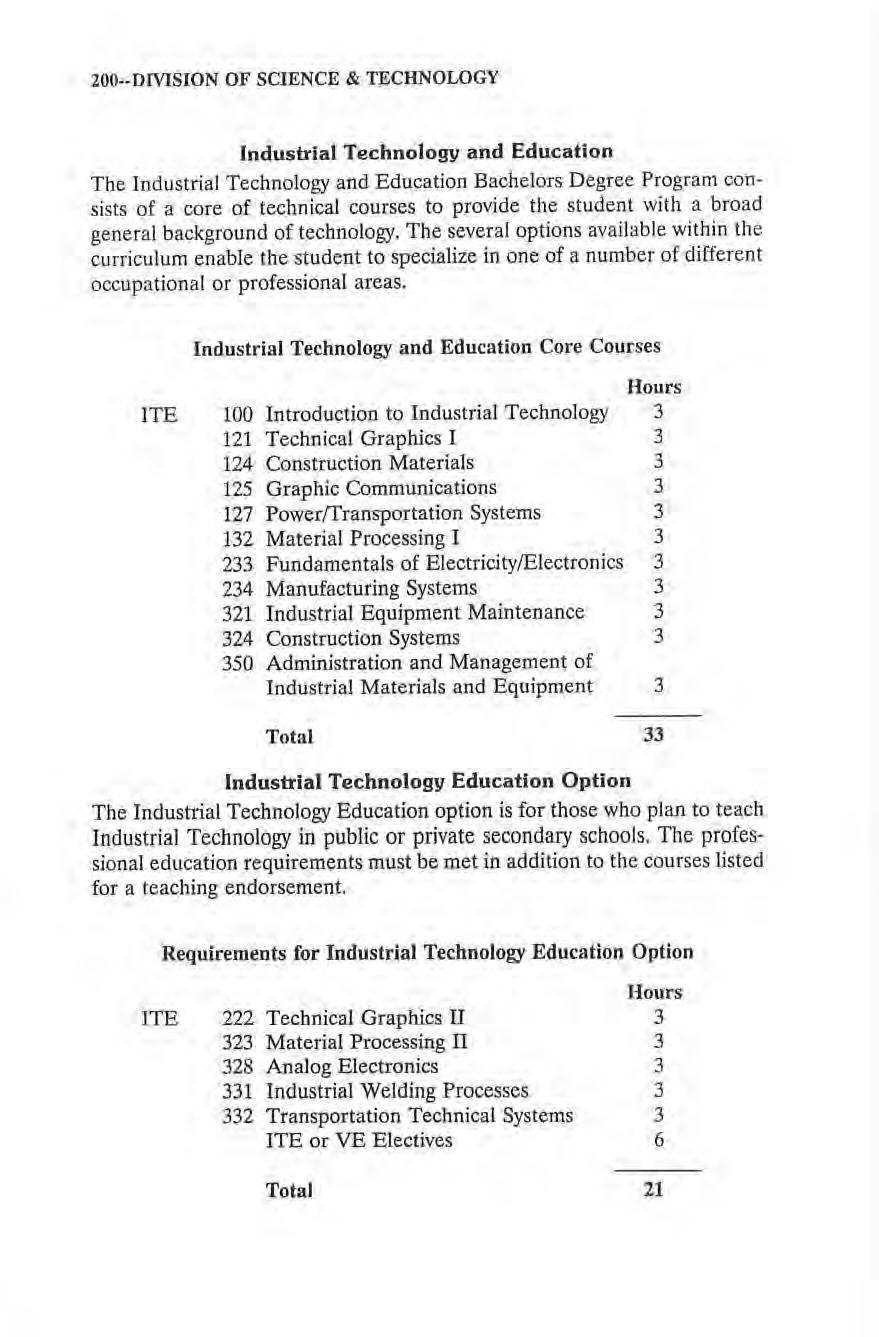
200--DMSION OF SCIENCE & TECHNOLOGY
1TB Industrial Technology and Education Core Courses 100 121 124 125 127 132 233 234 321 324 350 I ntroduction to Industrial Technology Technical Graphics I Construction Materials Graphic Communications Power{fransportation Systems Material Processing I Fundamentals of Electricity/Electronics Manufacturing Systems Industrial Equipment Maintenance Construction Systems Administration and Management of Indus trial Materials and Equipment Total Hours 3 3 3 3 3 3 3 3 3 3 3 33
I T E 222 Technical G raphics II 323 Material Processing Il 328 Analog Electronics 331 Industrial Welding Processes 332 Transportation Technical Systems ITE or VE Electives Total Hours 3 3 3 3 3 6 21
Industria l Management Technology Option
The curricul um for the Industrial Management Technology option is de• signed for students whose main objective is preparation for technician and managerial positions in industry. The curriculum has been developed to include a combination of technical and business courses in order to prepare the graduate for employment in an industrial enterprise.
Technology Option
The Electronics/Robotics Technology option provides the graduate with a background in math and science, as well as an emphasis in theory and laboratory work in electronics and robotics technology. Graduates may qualify for positions in technical sales, supervision of technicians, s up ervision of maintenance or similar positions dealing with electronics or robotics .
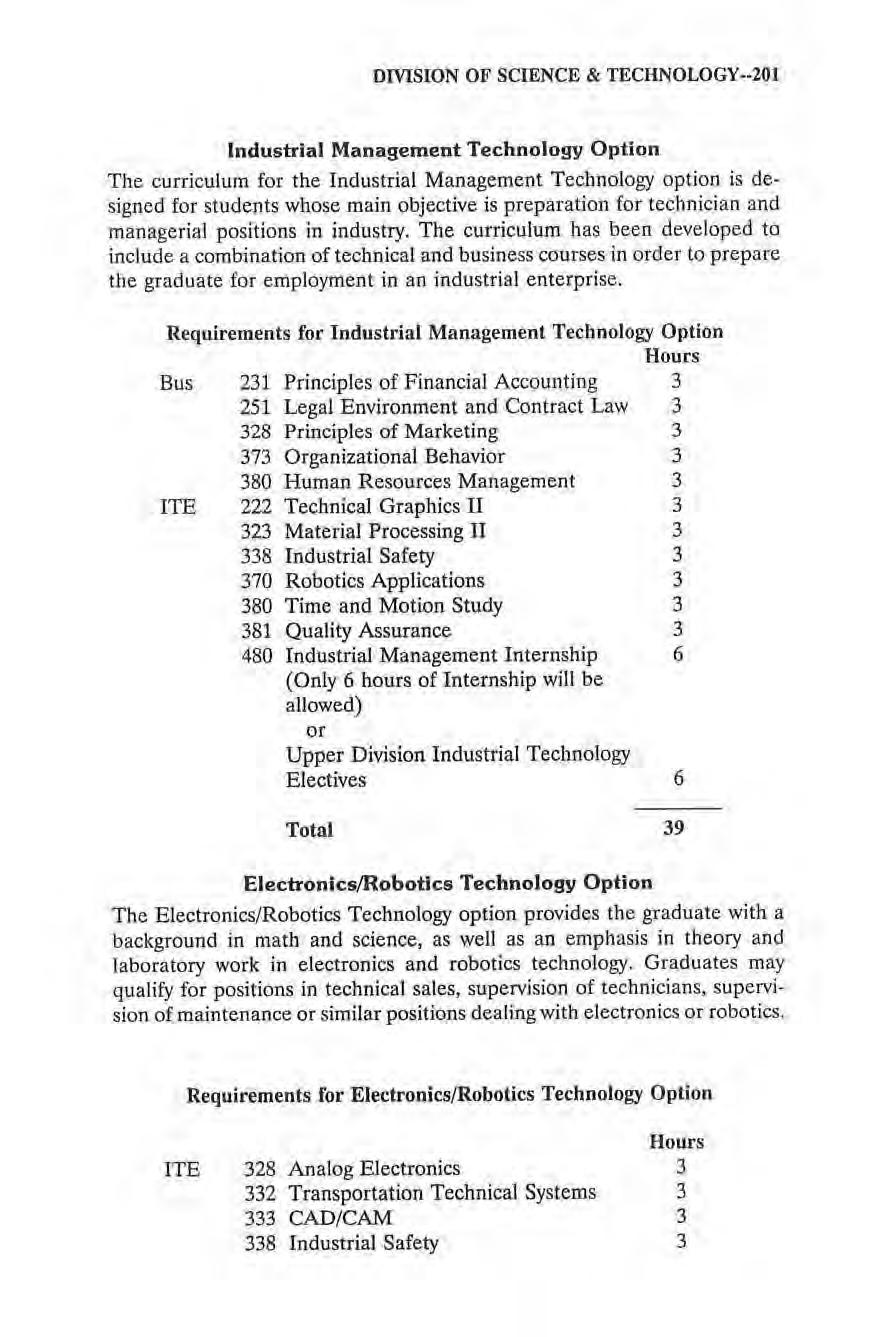
DIVISION OF SCIENCE & TECHNOLOGY··201
Requirements for Industrial Management Technology Option Bus ITE 231 Principles of Financial Accounting 25 1 Legal Environment and Contract L aw 328 Principles of Marketing 373 Organizational Behavior 380 Human Resources Management 222 Technical Graphics Il 323 Material Processing IT 338 Industrial Safety 370 Robotics Applications 380 Time and Motion Study 381 Quality Assurance 480 Industrial Management Internship (Only 6 hours of Inte rnship will be allowed) or Upper Division Industrial Technology Ho urs 3 3 3 3 3 3 3 3 3 3 3 6 Electives 6 Total 39 Electronics/Robotics
Requirements for Electronics/Robotics Technology Opt ion 328 Analog Electronics 332 Transportation Technical Systems 333 CAD/CAM 338 Industrial Safety Hours 3 3 3 3
Power and Transportation Technology Option
The Power and Transportation Technology option provides the education necessary to qualify for positions of technical supeivision, and technical sales or service The curriculum includes technical studies in powe r and transportation, math1 science, and b usiness.
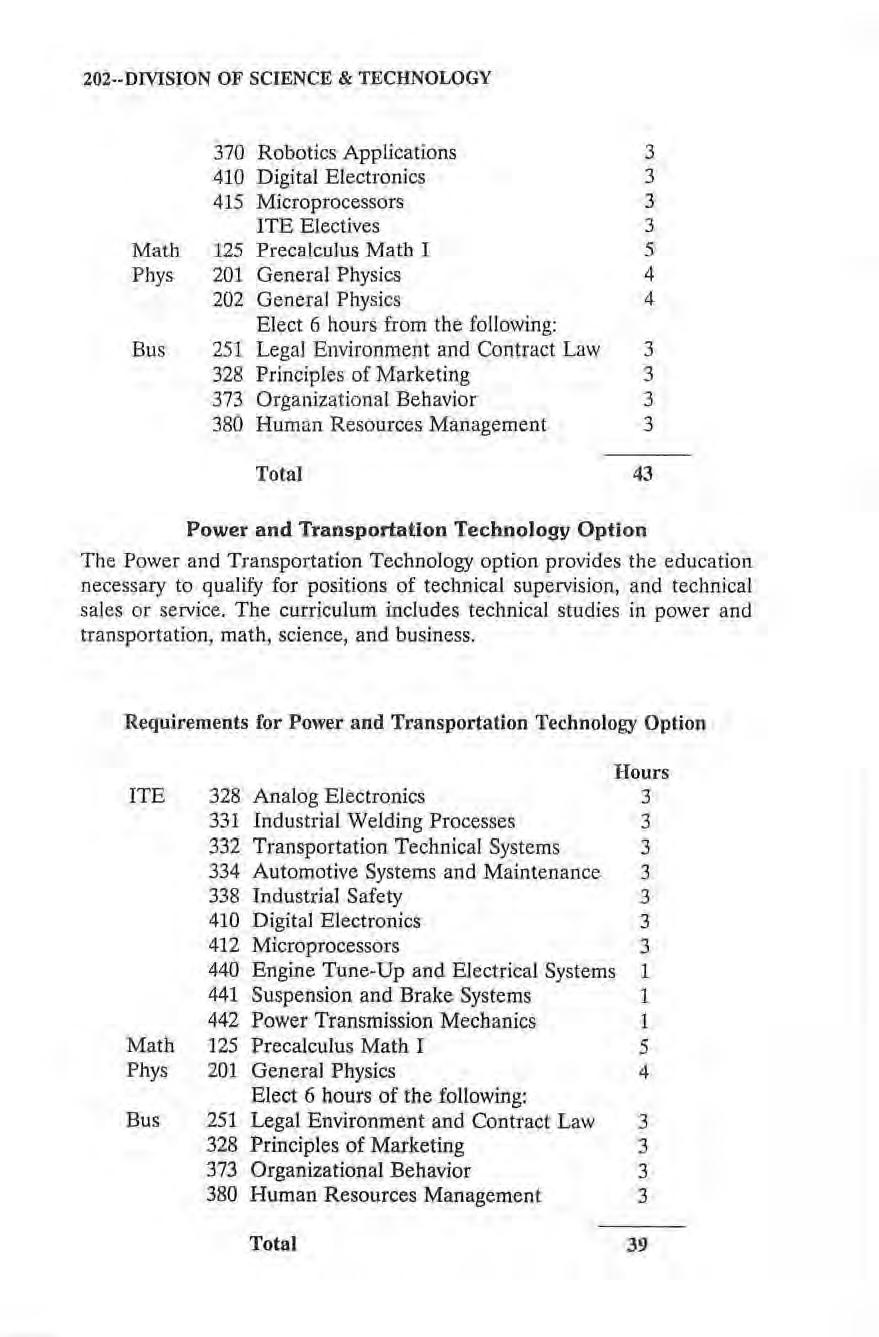
202--DMSION OF SCIENCE & TECHNOWGY 370 Robotics Applications 3 .410 Digital Electronics 3 415 Microprocessors 3 lTE Electives 3 Math 125 Precalculus Math I 5 Phys 201 General Physics 4 202 General Physics 4 Elect 6 hours from the following: Bus 251 Legal Environmen t and Contract Law 3 328 Principles of Marketing 3 373 Organizational Behavior 3 380 Human Resources Management 3 Total 43
Requirements for Power and Transportati on Technology Option ITB Math Phys Bus 328 331 332 334 338 410 412 440 441 442 125 201 251 328 373 380 Analog Electronics Industrial Welding Processes Transportation Technical Systems Automotive Systems and Maintenance Industrial Safety Digital Electronics Microprocessors Hours 3 3 3 3 3 3 Engine Tune-Up and Electrical Systems Suspension and Brake Systems 3 1 1 Power Transmission Mechanics Precalculus Ma th I General Physics Elect 6 hours of the following: Legal Environment and Contract Law Principles of Marketing Organizational Behavior Human Resources Management Total 1 5 4 3 3 3 3 39
Construction Technology Optio n
The Construction Technology option is designed to prepare individuals for positions in the construction industry as estimators, inspectors, technical specification writers, project managers, maintenance supervisors, quality control specialists, and labor~management relations personnel.
For those seeking an endorsement in Vocational Trades and Industrial Education, the following is required in addition to the general degree program.
1. An emphasis in Industrial Technology Education
2. A minimum of 12 semester hours in an area of specialization, e g., carpentry, auto mechanics, etc.
3. Six hours from the fo llowing vocational courses:
a. Vocational Education 441/541
b. Vocational Education 442/542
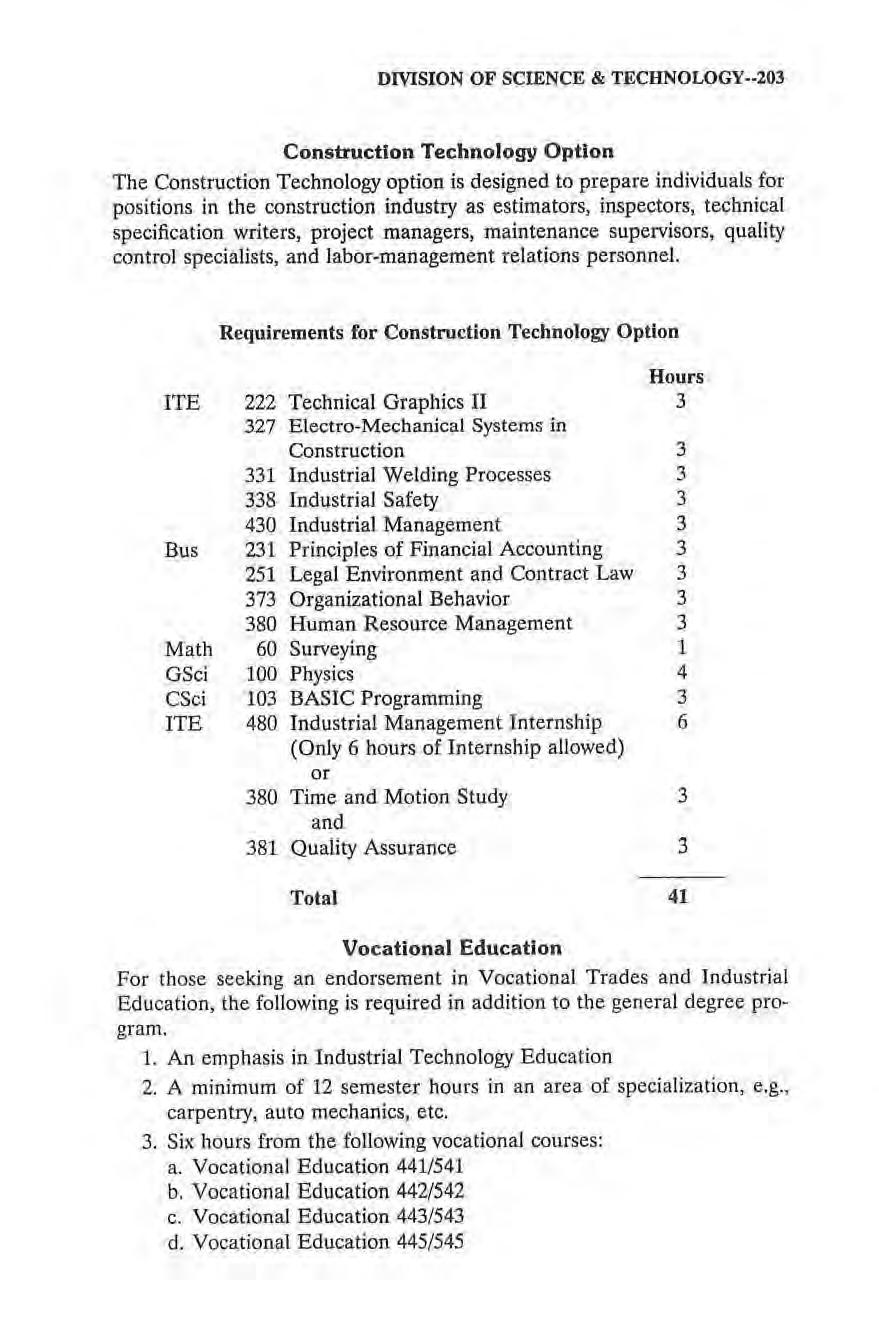
c. Vocational Education 443/543
d. Vocational Education 445/545
DMSION OF SCIENCE & TECHNOLOGY- -203
Requ irements for Construction Technology Option ITE Bus Math GSci CSci ITE 222 Technical Graphics II 327 E lectro-Mechanical Systems in Construction 331 Industrial Welding Processes 338 Industrial Safety 430 Industrial Management 231 Principles of Financial Accounting 251 Legal Environment and Contract L aw 373 Organizational Behavior 380 Human Resource Management 60 Surveying 100 Physics 103 BAS IC Programming 480 Industrial Management Internship (Only 6 hours of Internship allowed) or 380 Time and Motion Study and 381 Quality Assurance Total Vocational Educa t ion Hours 3 3 3 3 3 3 3 3 3 1 4 3 6 3 3 4 1
4. Student teaching in a vocationally approved program. If student teaching is not done in an approved program, an extra 3 semester hours of professional vocational courses are required.
5. The candidate shall have a minimum of 2000 hours of paid occupational e:\'Perience in an area closely related to the field in which he/ she is preparing to teach.
a . If more than 5 years has elapsed since the experience, a maximum of 1000 hours of tbe occupational experience can be accepted and the program shall require, in addition, V.E. 444: Industrial Internship with a minimum of 360 clock hours of supervised employment in an area closely related to the field in which the candidate is preparing to teach.
OR
The cand idate shall have a minimum of 1000 clock hours of fullti me employment or th e equivalent in accumulated part-time employment plus completion of V.E. 444: Industrial Internship, with a minimum of 360 clock hours of supervised work experience in an area closely related to the field in which the candidate is preparing to teach.
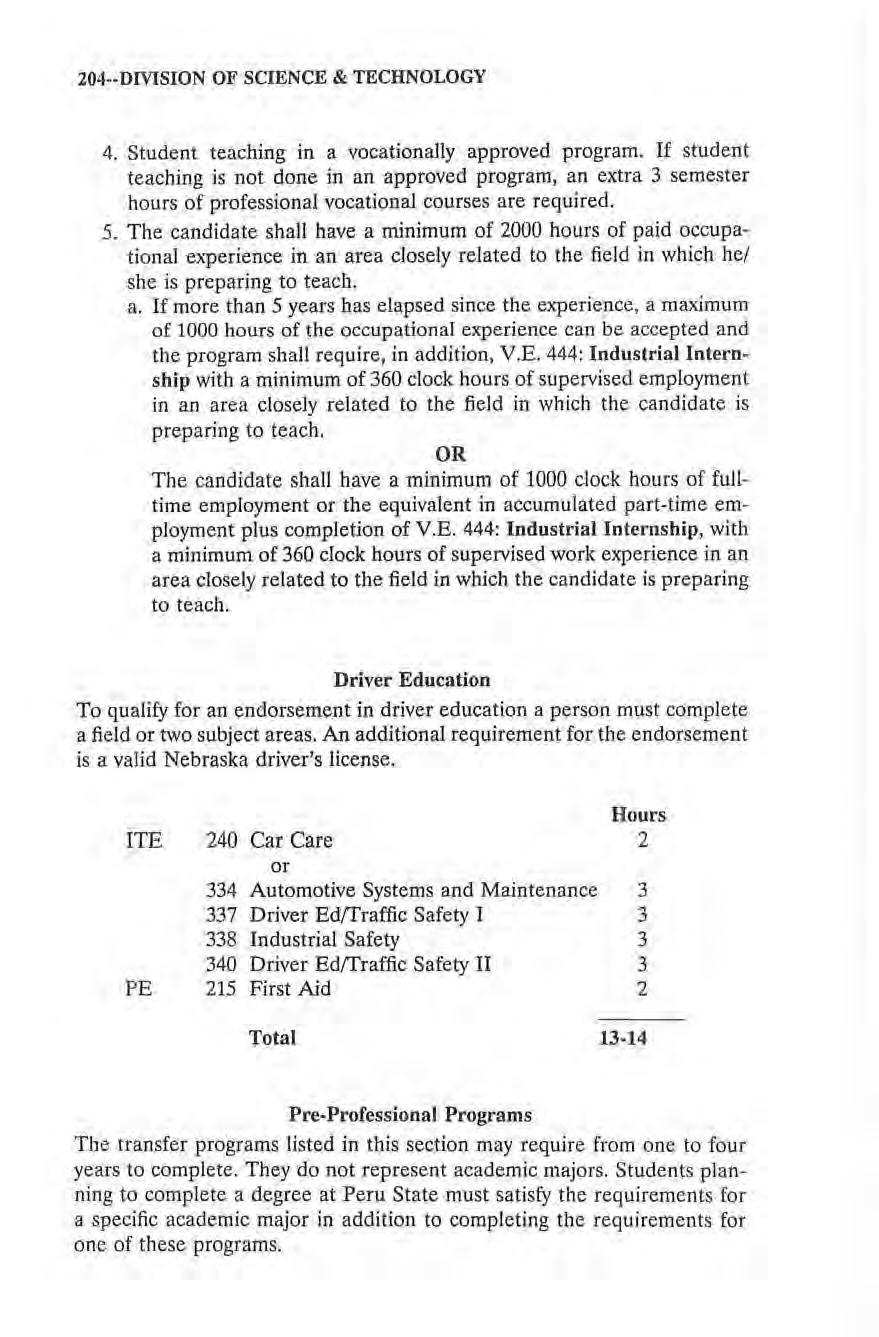
Driver Education
To qualify for an endorsement in driver education a person must complete a fi e ld or two subject areas. An additional requirement for the endorsement is a valid Nebras ka driver's license.
Pre-Professional Programs
The transfer programs listed in this section may require from one to four years to complete. They do not represent academic majors. Students planning to complete a degree at Peru State must satisfy the requirements for a specific academic major in addition to completing the requirements for one of these programs.
204-- DMSION OF SCIENCE & TECHNOLOGY
Hours ITE 240 Car Care 2 or 334 Automotive Systems and Maintenance 3 337 Driver Ed/Traffic Safety I 3 338 Industrial Safety 3 340 Driver Ed/Traffic Safety II 3 PE 215 First Aid 2 Total 13-14
Below is a suggested outline for both programs . The students are advised to secure a catalog from the professional school they expect to attend as individual schools may vary in requirements for pre-dental and pre-medical programs.
The requirements for forestry schools vary. Early in the pre-forestry program students s hould consult the catalog of the college they plan to a tt end late r.

DMSION OF SCIENCE & TECHNOLOGY--205 Pre-Dental and Pre-Medical
English Composition Chemistry Statistics Calculus Psychology Biology Physics Humanities Electives and additional r equirements Pre-Engineering Suggested program for the first two years: E nglish Composition M athematics TecbnicaJ Graphics Chemistry Physics E lec tives Pre-Forestry Hours 6 24 3 5 3 12 8 12 Hours 6 26 3 8 8 10
English Composition Biology Chemistry Mathematics Economics Political Sciences Speech Physics Hours 6 15 8 12 6 3 3 3
Pre-Mottuary
The following program is suggested as a prerequisite foi- ente ring a college of mortuary science:
The follow ing coursework is suggested for students in radiation therapy, radiography, nuclear medicine technology, or medical sonography.
English Composition
Mathematics (Algebra or higher)
Basic Sciences (Biology and Chemistry)
Humanities or Social Science
(Psychology or Sociology) Elective
recommended)
Applicants for a physician assistant program must have satisfactorily comp leted a minimum of 90 semester hours including the following courses:
English Composition
Biology
(Human Anatomy, Physiology and Microbiology Required)
Chemistry
(General and Organic required; Biochem istry recommended)
Mathematics (Statistics required; College Algebra recommended)
Psychology (Abnormal required; Developmental recommended)
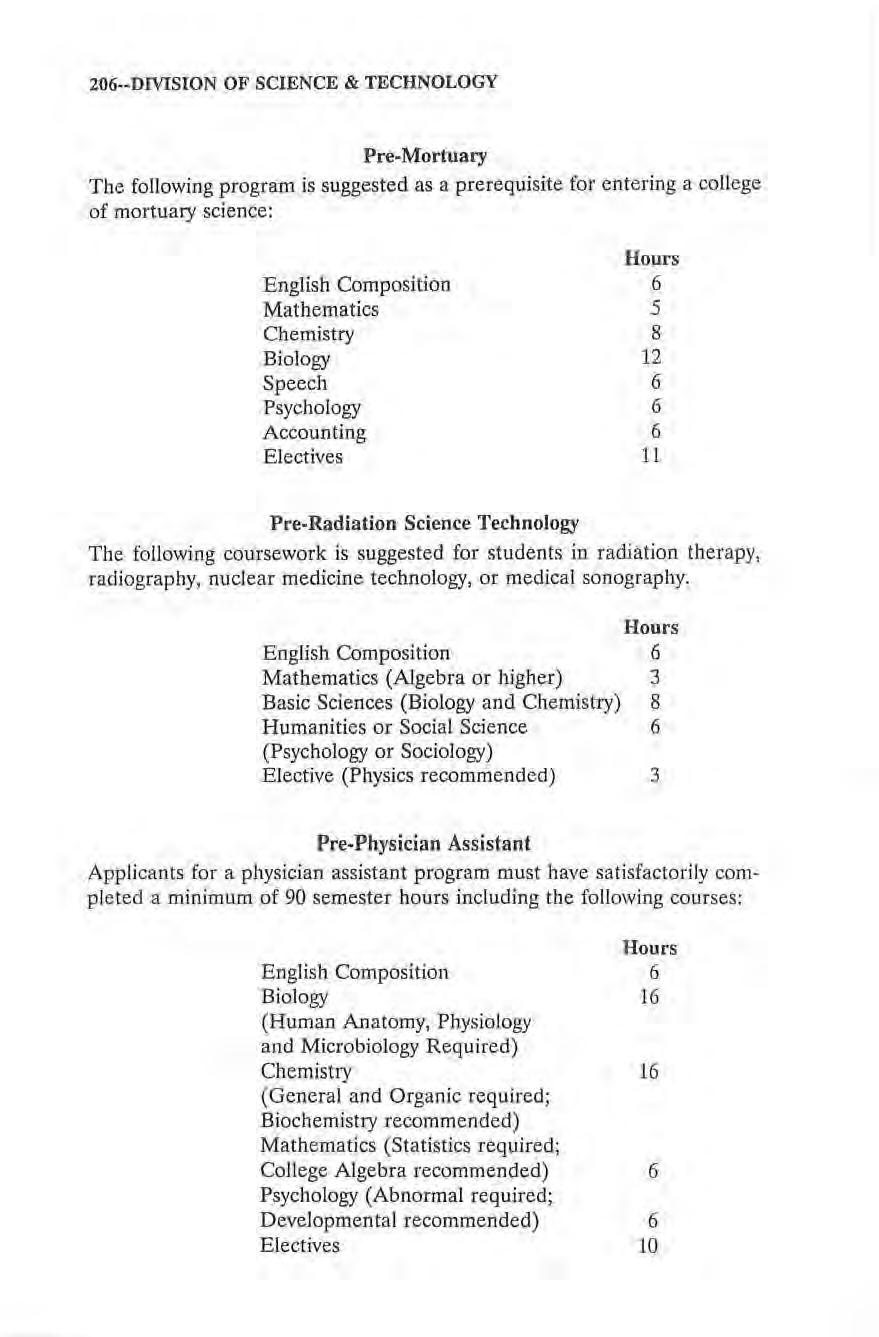
206--DMSION
OF SCIENCE & TECHNOLOGY
English Composition Mathematics Chemistry Biology Speech Psychology Accounting Electives Pre-Radiation Science Techno logy Houl's 6 5 8 12 6 6 6 11
Pre-Physician Assis tant Hours 6 3 8 6 3
(Physics
Hours
Electives
6 16 16 6 6 10
App licants to a college of pediatric medicine must have comple ted the following prerequisite courses: ·
The following cou rses are suggested for admittance into a dental hygi ene program:
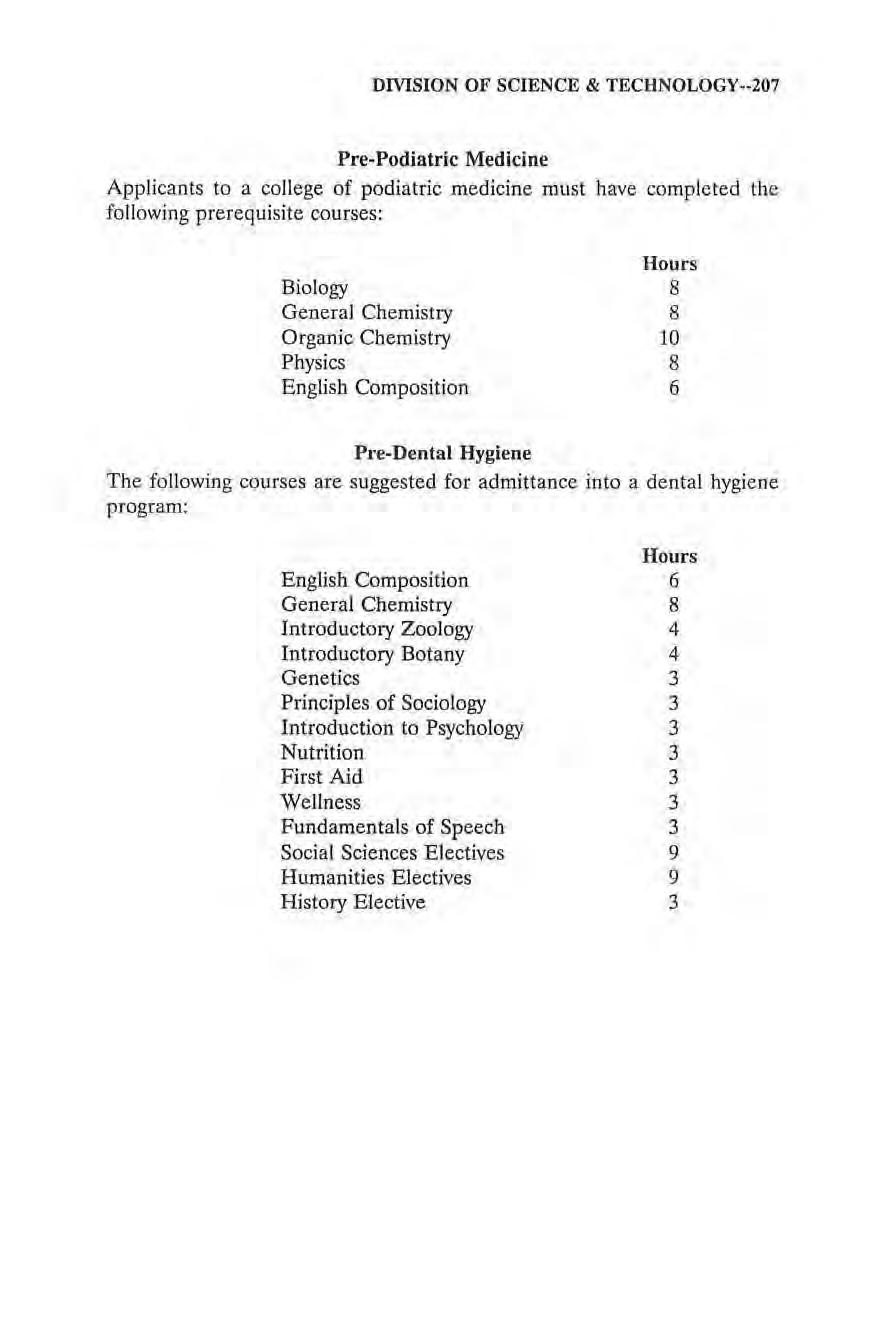
DMSION OF SCIENCE & TECHNOLOGY--2 07
Pre-Podiatric Medicine
Biology General Chemistry Organic Chem istry Physics English Composition Pre-Den tal Hygiene Hours 8 8 10 8 6
English Composition General Chemistry !ntroductory Zoology Introductory Botany Genetics Principles of Sociology Introduction to Psychology Nutrition First Aid Wellness Fundamentals of Speech Social Sciences E lectives Humanities Electives History Elective Hours 6 8 4 4 3 3 3 3 3 3 3 9 9 3
Pre-Osteopathic Medicine
In addition to a tota l of at least 90 semester hours of cred it, stude nts accepted for admissjon must have completed coursework in the following specific areas:
English Composition
Physics
Biology
G ene ral Chemistry
Organic Chemistry
Introduction to Psychology
Human it ies and Social Science
Electives
Additional Biology courses in Physiology, Anatomy, Microbiology, Embryology a nd Histology.
Hours 6 8 8 8 10 3
Pre-Nursing
The basic science and humanities r equirements for nursing programs vary depending on the school select ed and the level of t raining offered (i .e., dip loma, associate degree or baccalaureate degree program) . The pre-nursing student is urged to obtain a copy of the catalog of the nursing school selected to insu re proper planning for transfer. The following courses are suggested for a o ne-year pre-nursing program. A second year of coursework may be necessary for students e ntering a B.S.N. p r ogram.
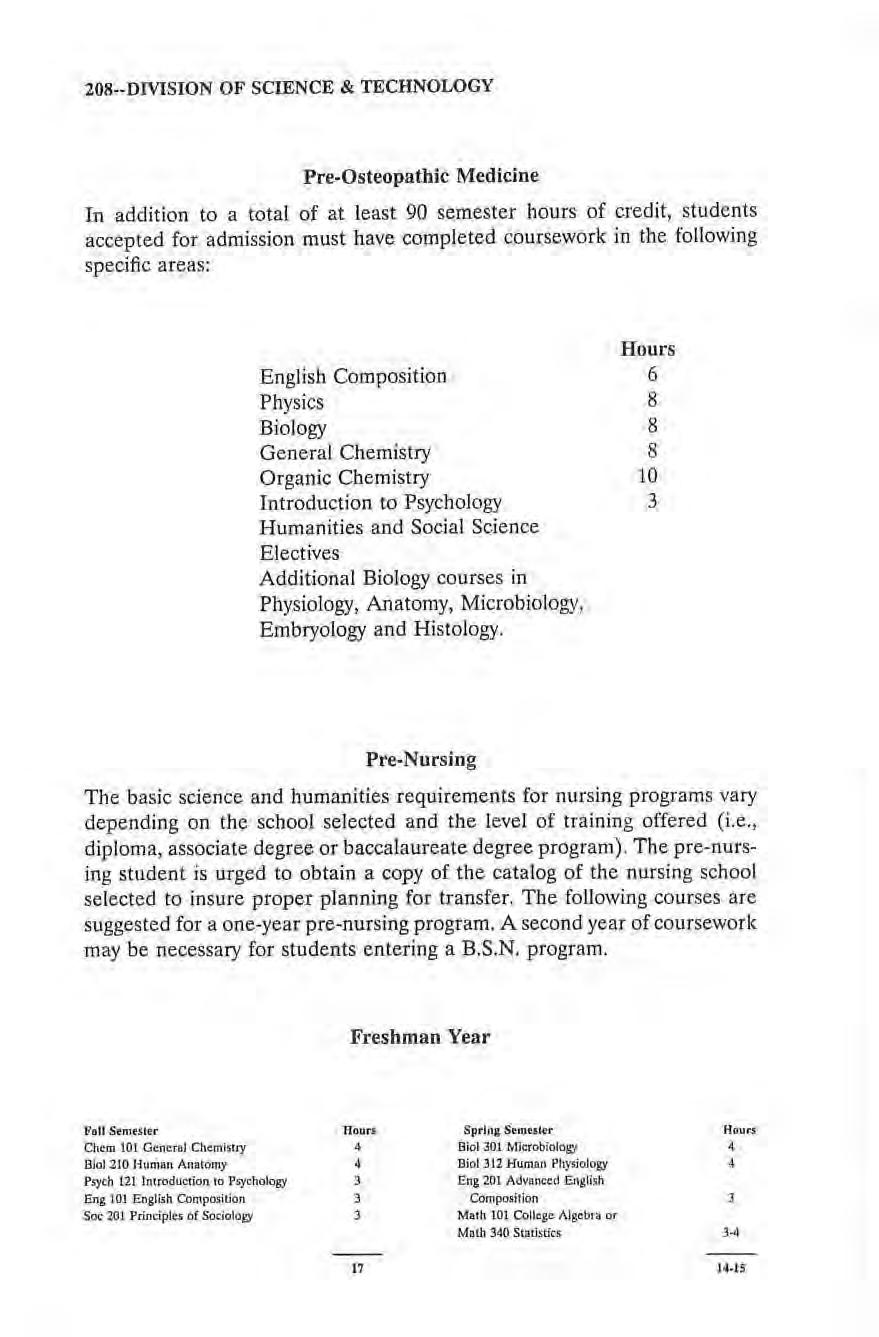
208--DMSION OF SCIENCE & TECHNOLOGY
Foll Semulu Chem 101 General Chem11rry Biol 210 liuman Anatomy Psych 121 fn1roducr ion 10 P,-ychology Eng 1OJ Eogl is h composition Soc WI Principles Of Sociology Freshman Year flours 4 4 3 3 3 17 Sprl 11g St.lOUler Biol 301 M1crobiolo!l,l' Biol 312 Human Physiology Eng -WI Advanced £ nglish Composition Mat h 101 Colloge Algebra or Moth 340 Statistics Houri 4 4 3-4 14-15
Transfer to a college of pharmacy requires a minimum of 60 semester hours of coursework which must include the folJowing:
Restricted e l ectives should be from the following areas: Humanities, Social Sciences, a nd Behavioral Sciences. Additional electives should be selected from the areas of Physics, Chemistry, Computer Science, Mathematics, Business Administration. Students should refer to college pharmacy catalogs for more information.
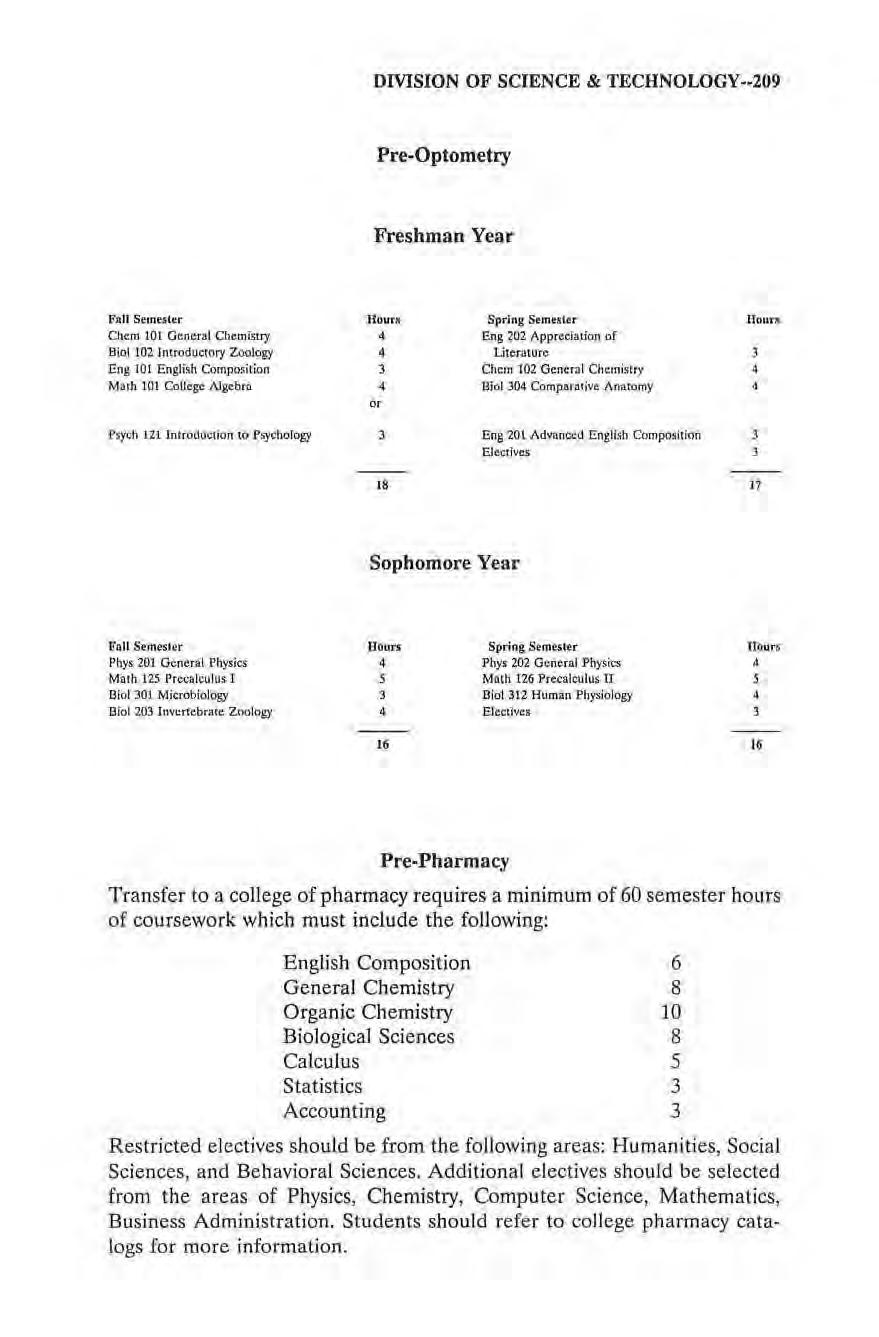
DMSION OF SCIENCE & TECHNOLOGY--209 Fall Seinr.sttr Chern IOI General Chemistry Bi<>I wi lntroduc1ory Zoology Eng 101 English Composition Jvfath 101 Co llege Algebra Psy011 l2i Introduction t o P')'chology Fall Semester Phys 201 Gene ral Physics Math 125 Precalculus I Blol 301 Microbiology Bfot 203 lnvcrtebrnre Zoo lngy
Freshman
Hour~ Sptittg StmHle r 4 Eng '202 Apprcciotion or 4 Literature 3 Chem 102 General Chemistry 4 Biol 304 Compar:i.tivc Anatomy or 3 Eng 201 Advanocd English Composition Electives 18 Sophomore Year 1-laurs 4 s 3 16 Spring Semester Phys 202 G eneral Physics Math 126 Precalculus II Biol 312 Human Physio logy Efective:s Pre-Pharmacy llanr,i 3 3 17 Hou.rs 4 5 4
Pre-Optometry
Year
English Composition General Chemistry Organic Chemistry Biological Sciences Calculus Statistics Accounting 6 8 10 8 5 3 3
Pre-Physical Therapy
The following courses are suggested for students interested m Physical
The following courses ate suggested for students interested in entering a baccalaureate program in respiratory therapy.
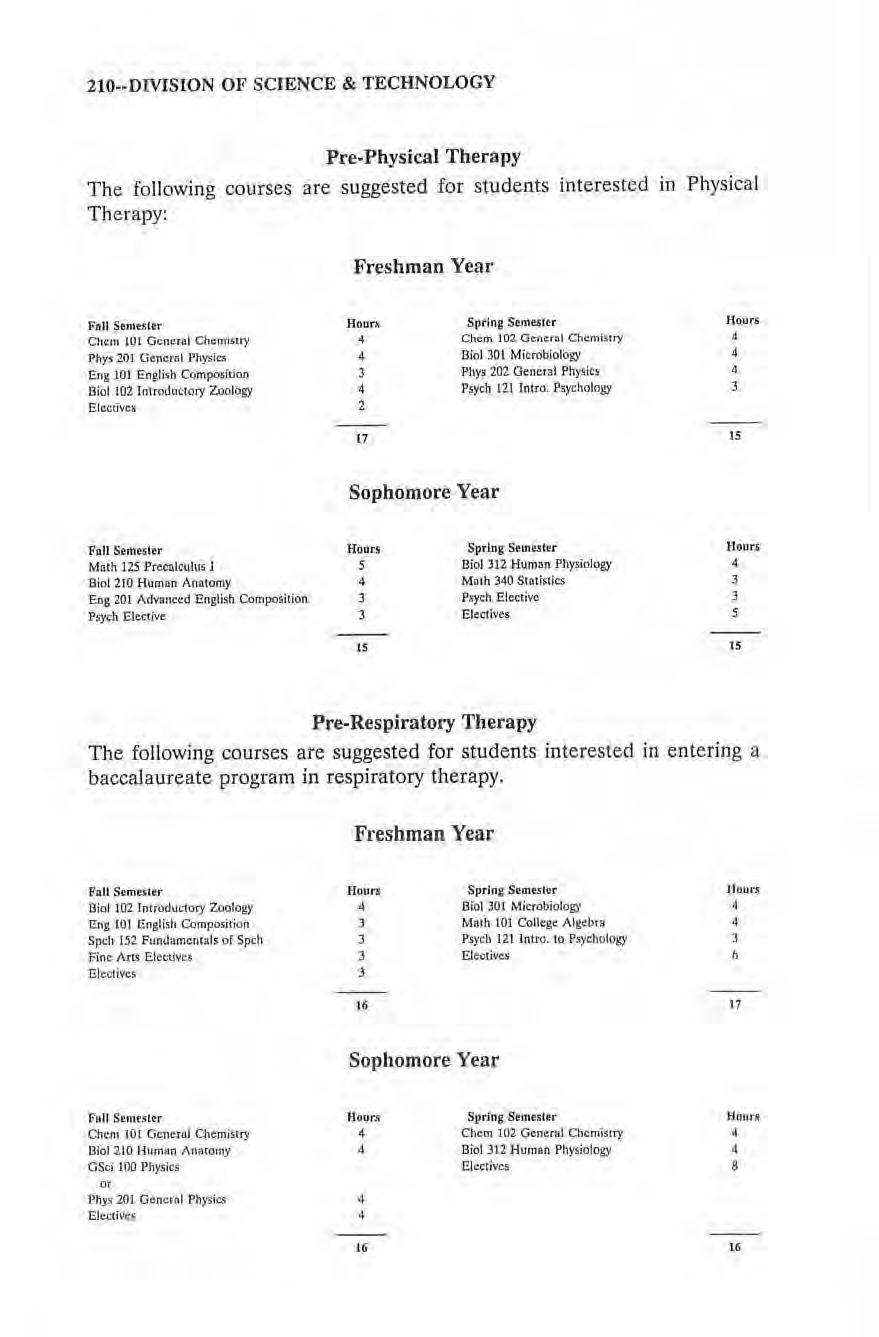
2 10-•DMSION OF SCIENCE & TECHNOLOGY
Th erapy: Fnll Sarnt'ster CJH:m 101 Ocncrul Chemisny Phys 201 G•nerol Physics Er,g 101 Engli,h Compo,ftlon lliol 102 Introductory Zoology Elcctivca Foll Seme.sttr Math l2S l'rec:lloulus I Biol 210 Human Anatomy Eog 201 Advanced English Composition P,yeh Ele(tlve Fres hman Year HOUl"Ji 4 4 3 4 2 17 Sp<lng Semwtr Chem 10'2. Oct1e.,~I Chcmi"1ry Biol 301 Miarobfology Phys 202 General Physic, Psych 121 Intro Psychology Sophomore Year Hours s 4 3 3 15 Spring Seu,e,ter Biol 312 Humon Physiology Mooh 340 Stati,tics Psych Elective Elecrives Pre-Respiratory Therapy Hours 4 4 IS Hours 4 3 3 s 15
Fall Seme..sltr Olol 102 Introductory Zoology Eng 101 l!oglish C.Omposition Speir 152 Fundumentals of Speh Pirie Arts Elettivt:s Electives FPll Semester Chem 101 General Chemiury Biol 210 Hl1n1,u1 An;nomy GSci 100 Physics or Phy, 201 G6nor•I Ph)iics Electivu Freshman Year .Roura; 4 J 3 3 3 16 S pring Se.mtsl'!r Biol 301 Microbiolo!:)' Math 101 Colkge Al~cbta Psych 121 Intro. lo PsycholO!Q' Electives Sophomore Year Hour.s 4 4 4 4 16 Spring Semester Chem 100. General Cbcmi!Hr)' Biol 312 H\Jmdn Physiology EkctivCi Houn; 4 4 17 .tJourH 16
Pre-Veterinary Medicine
The coUises listed below are suggested for Veterinary Science.
Foll Semo,lcr
Chem 101 General Chcrnisrry
Biol 102 ln1ro<luctory Zoology
M~ lh IOI College Algebra
or
Marh 125 Prcci:llculus Mruhcmtuics: I
GSci 100 Phy,icy
Spring Semo,lor
Chem 102 Ocnorol Chcrnislry
Speh 152 Fundnmenrnl, a{ Speech
Biol 312 Human P~ysiology
Eng 101 Errgli1h Composition
Electives
Full s~111es tcr
Chem 205 Principles of Qualimlvc Analysis
qr
Chem 303 Orgonic Chemi,iry
Eng 201 Advanced Englfsb
Composi llon
Biol 407 Developmental lltology
Spring Sc.mesl~r
Chem 206 Principle, of Quantitative Annlys i.s or
Chem 304 Organic CJ, em isrry
Biol 304 Comparaiive Anatomy
Biol 404 Gcnc1fes
Medical Technology
This is a transfer program During the first three years, the student must satisfy the General Studies requirements for graduation, complete a minimum of 90 semester hours applicable toward a bacc alaurea te degree, complete 24 se mester hours of Chemistry, 16 hours of Biology, and at least one course each in Mathematlcs and Physics. The fourth year, whi ch consists of a full twe lve-month program, is spent in residence at an approved school of Medical Technology which awards the degree.
Suggested Program for Medical Technology
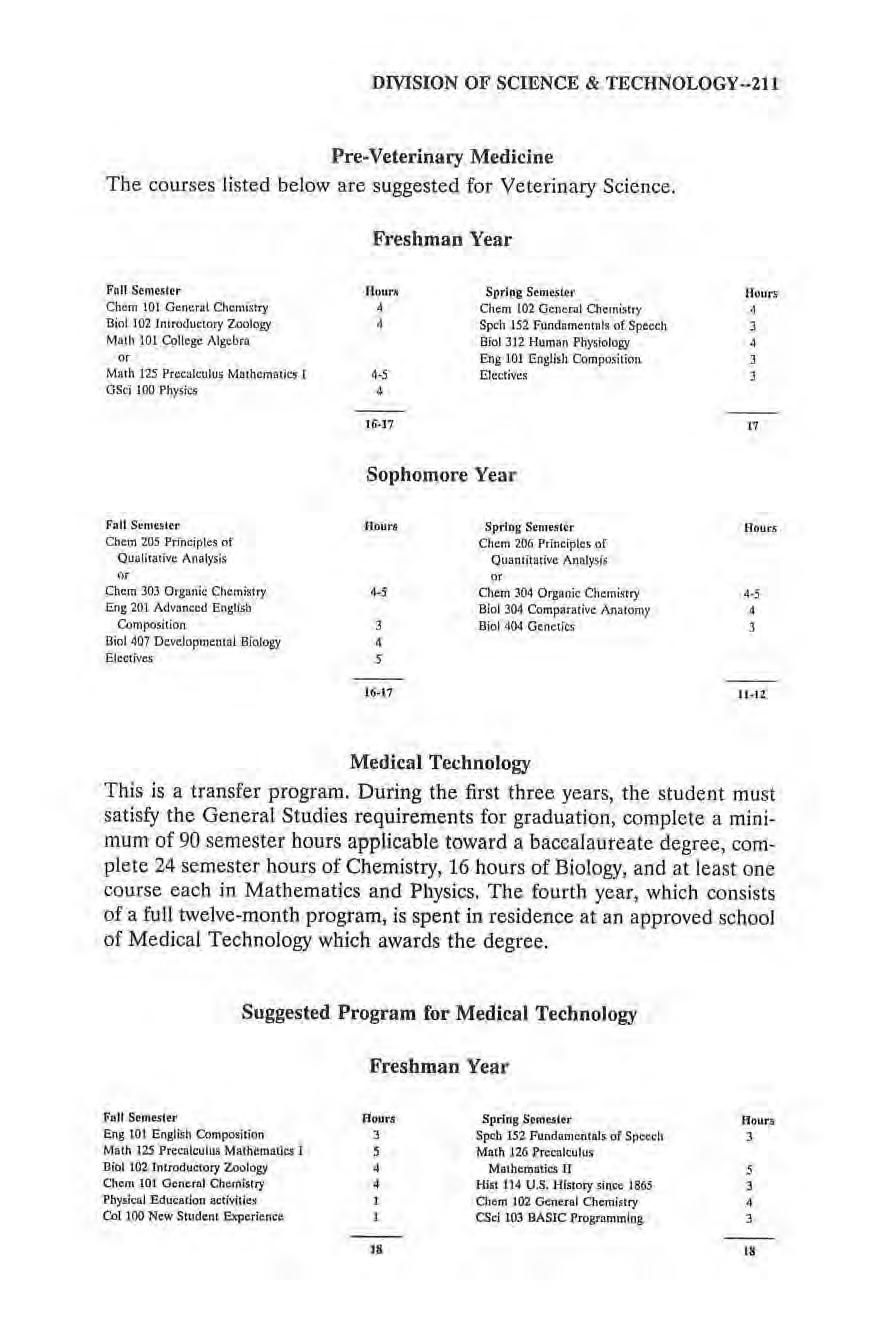
Freshman
Year
Foll Scmcsl<r
Eng lOI English Compo•irion
Ma1h 125 l'recalculus Mathcmntlcs r
Biol 102 lllrrodu ctory Zoology
Chem 101 Ocncrnl Chemistcy
Phy1.ical Education act ivil1e!l
Spoh 152 Flrndomcnlnls of Speech
Moth 126 Prccakulu, Malhcmolics JI
Hill 114 U.S. Hfsrory >incc 1865
Chem 102 General Chemlury
Programming Hours 3 s 3 4 3
DMSION OF SCIENCE & TECHNOLOGY -2 11
4 4 4-5 16-17
EJcttlve.s Freshman Year Rours
Year
4-S 16- l?
Sophomore
'Hours
tluurs ,t J 17 11, 12
Col 100 New S1udcn1 Experie nce Hours 3 5 4 18
Spring Scmosl•r
CScl L03 BASIC
Twelve month program at an approved school of
Natural Resources
2 Plus 2 Agreement
The 2 Plus 2 Agreement in Natural Resources is a joint program bet-veen Peru State College (PSC) and the Colleges of Agricu ltural Sciences and Natural Resources (CASNR) at the University of Nebraska - Lincoln (UNL) which allows PSC students to co ntinue thei r education and study in a major leading to a Bachelor of Science Degree in Natural Resources. The agreement provides a basic knowledge plus specialized course work in natural resources. A student en rolled in this program may transfe r all satisfactorily completed academic credits identified in the course schedule listed below, and enter CASNR to study in a major leading to a Bachelor of Science Degree in Natural Resources. Details of the agreement may be ob t ained from the Chairperson of the Division of Science and T echnology.
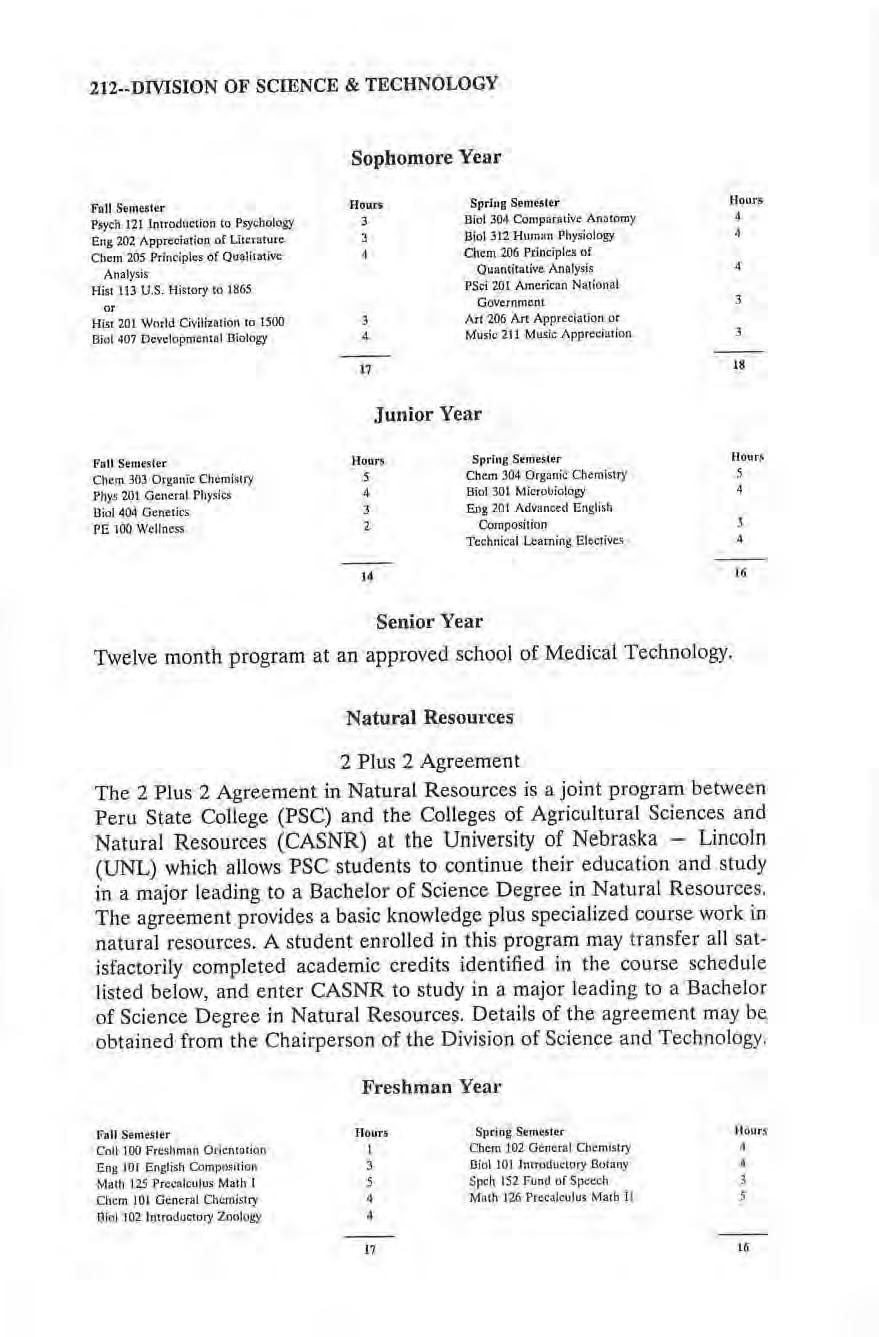
212 -- DMSION OF SCIENCE & TECHNOLOGY F•II Semestn Psych 121 Introduction to Psychology Eng 202 Apprcoietion of Li tc:nuure Chem 205 Principles of Qu:alltat fvcA1,alysit Hist 113 U S History to 1865 or Hist 201 World Civiliu1ion to 1500 Biol 407 Devclopmontnl Biology Fn11 Semester Chem 303 Organic Chemistry Phys 201 General Physics lliol 404 Generics PE 100 Wcllncso Sophomore Year Hours 3 3 417 Spring Semester Biol 304 Comparative An;,tomy l3io1 312 Human Physiology Chem 206 P;locip lt! of Quantit.alive Ana..lysis PScf 201 Americon Nation•! Govornmant Art 206 Art Appreciation or Musici 2.11 Mu.sic Appredation Junior Year Houris 3 2 14 Sprh1g Semester Chem 304 Organic Chemistry B!ol 301 Microbiology Eng 201 Advanced English Composit ion Technical Lc:aming Elcotivcs Senior Year Hour~ 4 4 18 J 4 16
Medical Technology.
fnll Se1netltr Coll 100 Frt.shn,an Oricntorion Eng JO I English Composit io n Math 125 l'rcCOlct1lus Moth I Chem 101 General Chemistry !)fol 102 Introductory Zoolugy Freshman Ye ar Hours I 3 s 4 4 11 Spring Seme:su:r Chem 102 General ChemiSlry Bio l IOI Introductory Sot,ny Speh I52 Fund or Speech Math 126 Precalculu, Matb II 16
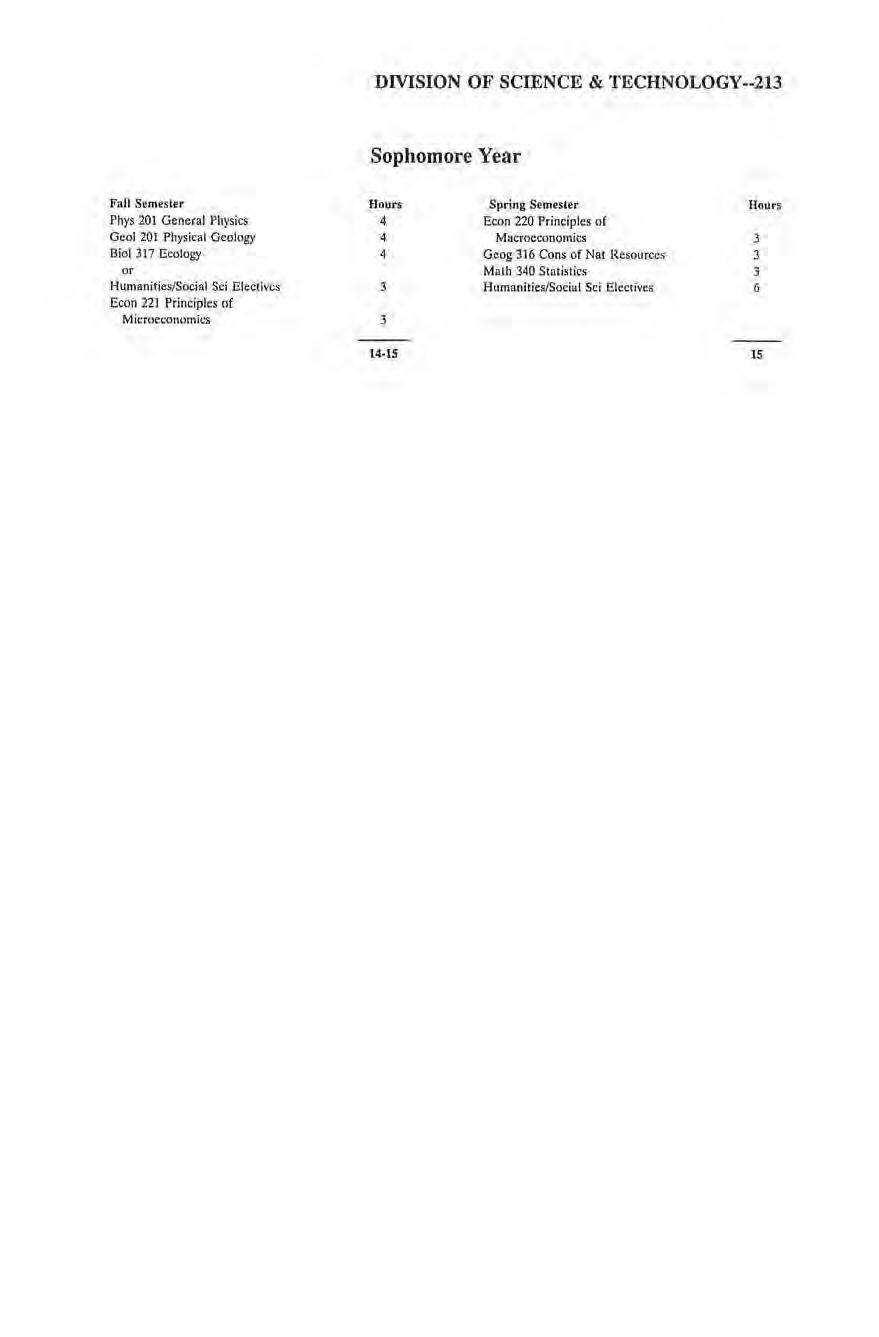
Fall Stmester Phys 201 General Physics Gcol 201 Physical Gcolo!l)' Biol 3I7 Ecology or Humanities/Social Sci Elec1ivcs Econ 221 Principles of Microeconom ics DMSION OF SCIENCE & TECHNOLOGY--2 13 Sophomore Year HouD 4 4 4 14-1S Spring Semeslt r Econ 220 Principles ol Macroeconomics Geog 316 Cons of Nar Resources Malh 340 Stnlistics Humaniric$,1Socia l Sci Elc:c, ives Houn 15
Course Descriptions
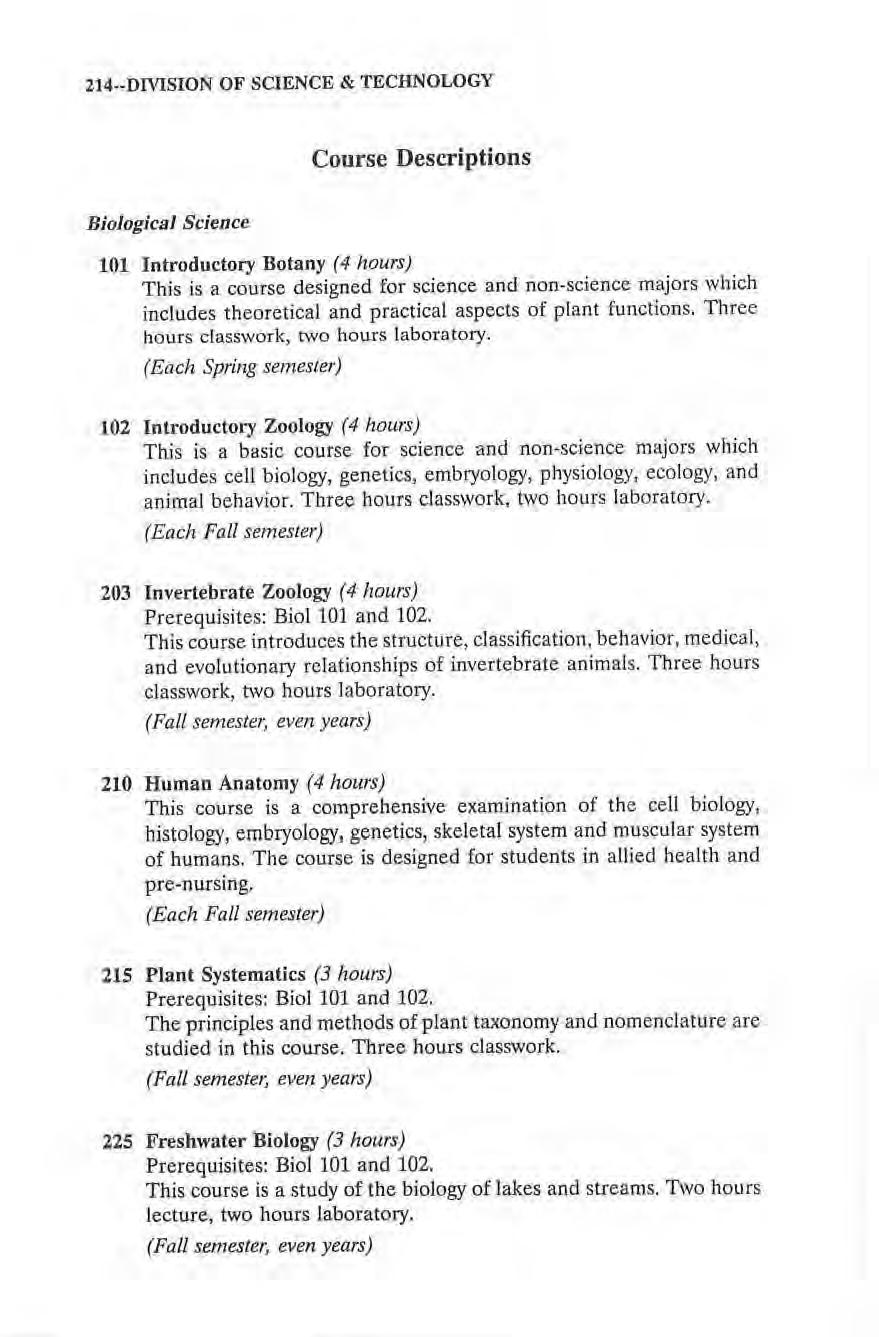
Biological Science
101 Introductory Jlota n y (4 hours)
This is a course designed for science and non-science majors which includes theoretical and practical aspects of plant functions. Three hours classwork , two hours laboratory.
(Each Spring semester)
102 Introductory Zoology (4 hours)
Th.is is a basic course for science and non-science majors which includes cell biology, genetics, e mbryol ogy, physiology, ecology, and animal behavior. Three hours classwork, two hours laboratory.
(Each Fall semester)
203 Invertebrate Zoo logy (4 hours)
Prerequjsites: Biol 101 and 102. This course introduces the structure, classification, behavior, medical, and evolutionary relationships of invertebrate animals . Three hours classwork, two hours laboratory.
(Fall semester, even years)
210 H uman Anatomy (4 hours)
This course is a comprehensive examination of th e cell biology, histology, embryology, genetics, skeletal system and muscular system of humans. The course is designed for students in allied health and pre-nursing
(Each Fall semeste,)
215 Plant Systematics (3 hours)
Prerequisites: Biol 101 and 102. The principles and methods of plant taxonomy and nomenclature are studied in thjs course. Three hours classwork.
(Fall semester, even years)
225 Freshwater Biology (3 hours)
Prerequisites: Biol 101 and 102.
This course is a study of the biology of lakes and streams. Two hours lecture, two hours laborato1y.
(Fall semester; even years)
2 14 --DMSION OF SCIENCE & TECHNOLOGY
297 Directed S tudy in Biology (1-4 hours)
Senior standing.
(Offered as n eeded)
298 S p ecial Topics in B iology (1-4 hours)
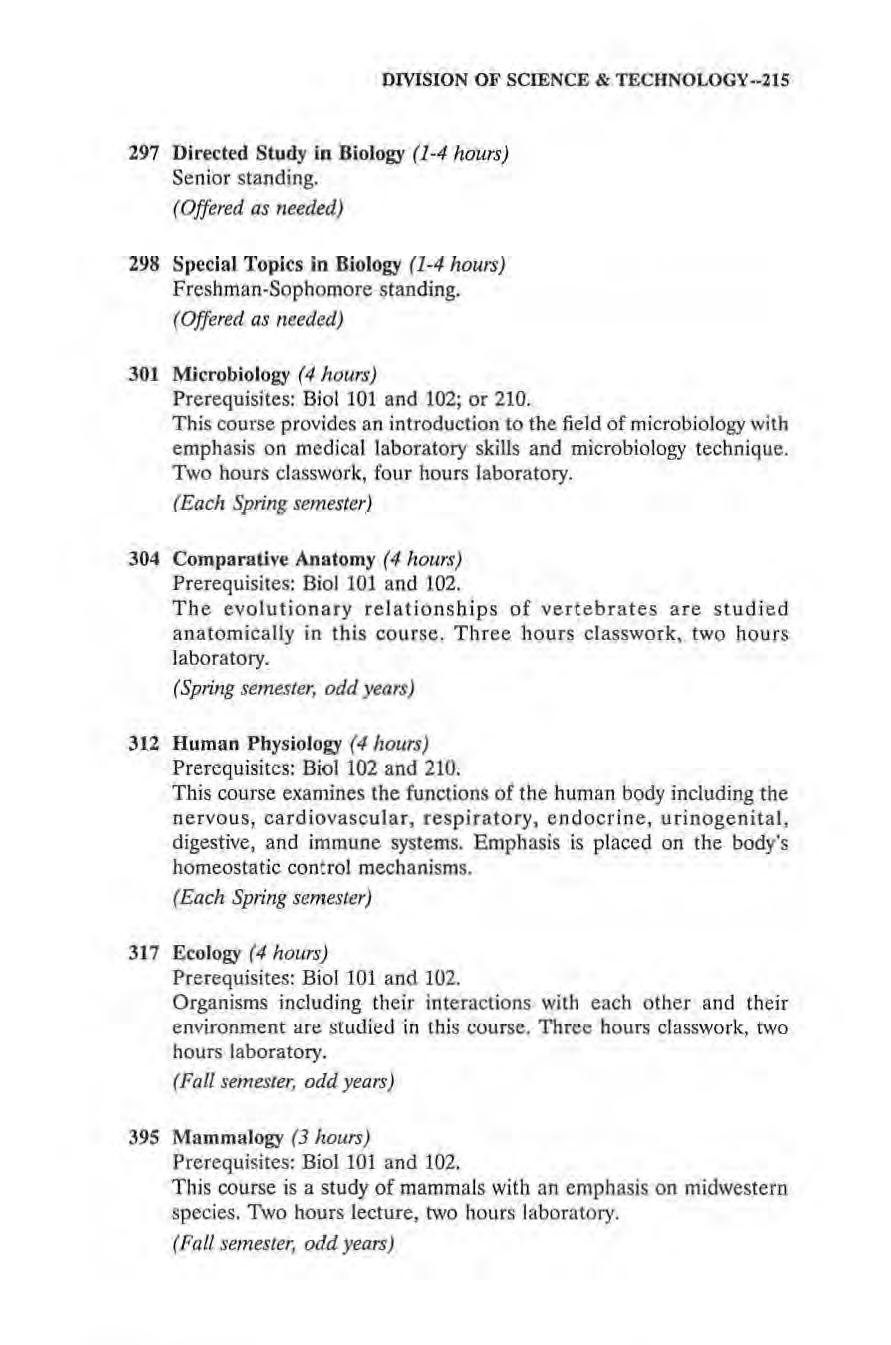
Fres hman-Sophomore standi ng.
(Offered as needed)
301 Microbio logy (4 hours)
Prerequisites: Biol 101 and 102; or 210.
This course provides an introduc ti on to th e fi e ld of mi crobiology with e mph asis o n me dical laboratory skills and microbio logy techniqu e.
Two hours classwork, four hours labo ratory.
(Each Spring semester)
304 Comparative Anatomy (4 hours)
Prerequisites: Biol 101 and 102.
The evolutionary relationsh i ps of vertebrates are s tudi e d anatomically in thi s course. Three hours classwork, two hours laboratory.
(Spring semester, odd years)
312 H uman Phys iology (4 hours)
Prerequisite s: Biol 102 and 210.
This course examines the functions of the human body including the nervous, cardiovascular, respiratory, e ndocrin e, u r inogenital, digestive, and immune systems. Emphasis is placed on the body's homeostat ic control mechanisms.
(Each Spring semester)
3 17 Ecology (4 hours)
Prerequisites: Biol 101 and 102.
Organisms incl uding their interactions with eac h other and their environment an:: stutlit:d in t his course. Three hours classwork, two hours laboratory.
(Fall semester, odd yea rs)
395 Mammalogy (3 hours)
Prerequisites: Biol 101 and 102
This course i s a study of mammals with an emphasis on midwestern species Two hours lecture, two hours laboratory.
(Fall semester, odd yea rs)
DMSION OF SCIENCE & TECHNOLO GY--215
216--DMSION OF SCIENCE & TECHNOLOGY
404 Gene t ics (3 hours)
Prerequisites: Biol 101 and 102.
I n this course, Mendelian principles of heredity with special emphasis on current advances are covered. Three hours classwork.
(Fall semeste1; odd years)
405 Histo l o gy (4 hours)
Prerequisite: Biol 102. This course studies the microscopic anatomy of mammalian tissue and organ systems with an emphasis on medical applications. Three hours classwork, two hours laboratory.
(Offered as needed)
407 Develop me n ta l Bio logy (4 hours)
P rerequisites: Biol 101 and 102. This course is a study of the mechanisms of development in plants and animals. Three ho urs classwork. two hours laboratory.

(Spring semeste1; even years)
411 Ornithology (3 hours)
Prerequisites: Biol 101 and 102. This course is a study in avian biology including morphology, physiology, taxonomy, breeding, and ecology. Two hours lecture, two hours laboratory.
(Spring semester, odd years)
412 Experimental B iol ogy (3 hours)
Prerequisites: Biol 101 and 102, and 8 hours upper division Biology courses.
Students will examine current biological topics of interest that emphasize scientific method, interpretation, and analys is. Three hours lecture.
(Spring semester, even yea,:r)
486 Wild li fe Management Techniqu es (3 hours)
Prerequisites: Biol 101 and 102.
Contemporary techniques of co nservation and management of wildlife are studied. T hree hours lecture .
(Spring semester, even years)
497 Directed Study in Biology (1-4 hours)
Senior standing.
(Offered as needed)
498 Special Topics in Biology (1-4 hours)
Junior-Senior standing.
( Offered as needed)
499 Independ ent Stu dy in B iology (J-3 hours)
Junior standing.
(Each semester)
Chemistry
101 Genera l C hem ist ry (4 hours)
Prerequisite : High school algebra.
An introduction to the fundamentals of chemistry. Topics sllch as atomic theory, chem ical bonding, stoichiometry, solu tions, and pff are cove red . T hree hours classwork, two hours laboratory.
(Each Fall semester)
102 General Chemistry (4 hours)
Prerequisite: Chern 101.
This cou rse is an application of th e fundamentals of chemistry, including states of matter, oxidation-red uction, thermochemistry, chemical eq uilibrium, kinetics, nuclear chemistry, a nd descriptive chemistry. Three hours classwork, two hours laboratory.
(Each Spring semester)
142 Introductory Organic and Biochemistry (4 hours)
This is a terminal course in organic an d biochemistry. Three hours classwork, two hours laboratory.
(Offered as needed)
205 Principles of Qualitative Analysis (4 hours)
Prerequisit e: Chem 102.
The principles of qualitative analysis and their application in the laboratory are studi ed, Two hours classwork, four hours laboratory.
(Fall semester, odd years)
206 Principles of Q uantita tive Analysis (4 hours)

Prerequisite: Chem 205.
The principles of quantitative analysis and their application in the laboratory are studied. Two hours classwork, foUI hours laboratory.
(Spring semester, even yea rs)
DMSION OF SCIENCE & TECHNOLOGY- -217
297 Directed Study in Chemistry (1-4 hours)
Senior standing.
(Offered as needed)
298 Special Topics in Chemistry (1·4 hours)
Freshman-Sophomore standing. (Offered as needed)
303 Organic Chemistry (5 h ours)
Prerequisite: Chem 102.
This course introduces the chemistry of aliphatic and aromatic compounds with the mechanisms and stereochemistry. Three hours classwork, four hours laboratory, (Fall semester, even years)
304 Organic Chemistry (5 hours)
Prerequisite: Chem 303.
This course is a continuation of Chem 303 with emphasis on the chemistry and detection of functional groups. T he laboratory emphasis is on methods of qualitative organic anaJysis. Three hours classwork, four hours laboratory. (Spring semester, odd years)
431 Biochemistry (4 hours)
Prerequisite: Chem 304.
The chemical foundations of molecular biology with an emphasis on the molecular aspects of intermediary metabolism are studied. Three hours classwork, two hours laboratory, (Fall semesce,~ odd years)
497 Directed Study in C hemistry (1-4 hours) Senior standing.
(Offered as needed)
498 Spec ial Topics in Chemistry (1-4 hours)
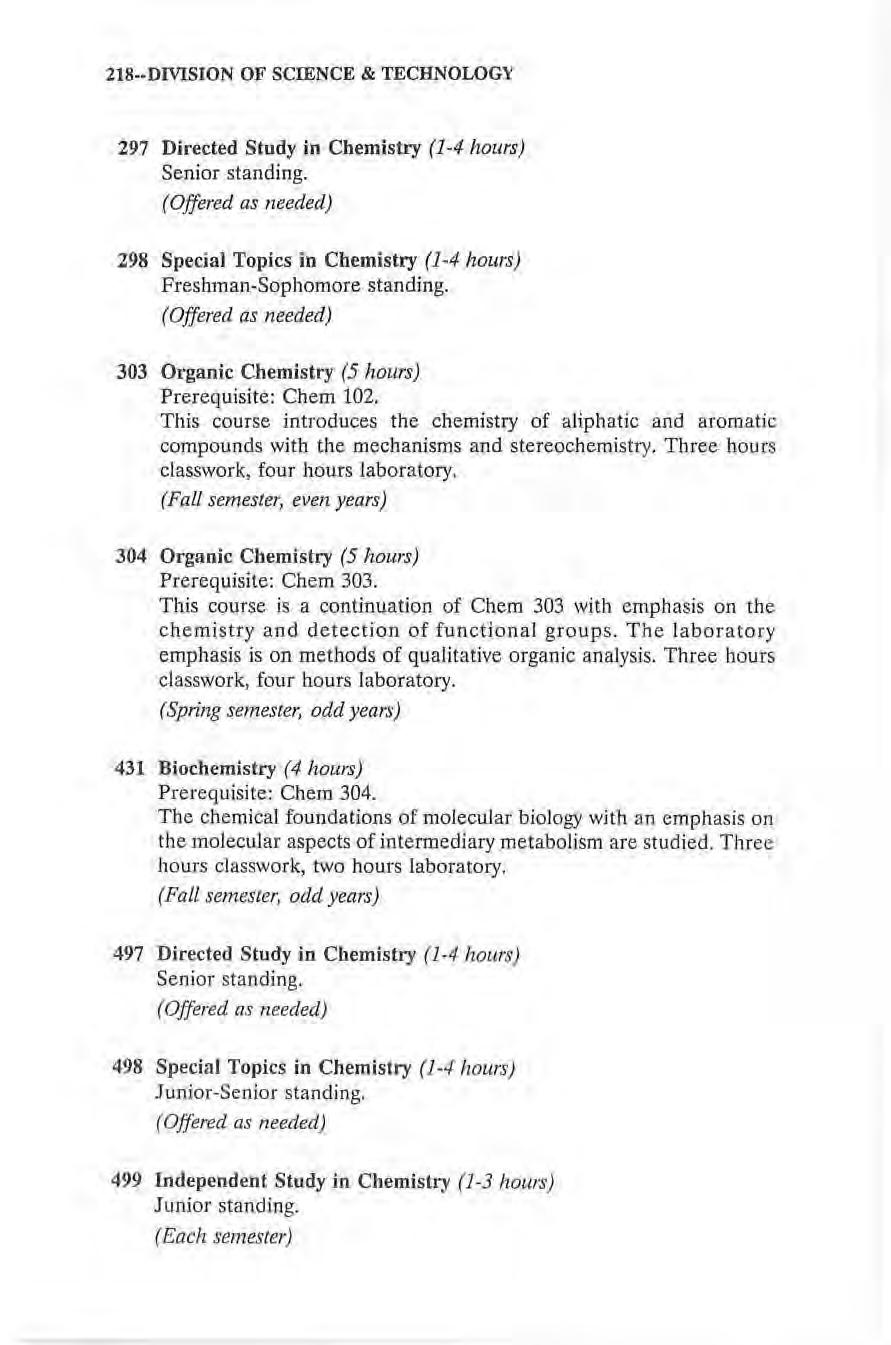
Junior-Senior standing.
(Offered as needed)
499 Independent Study in Chemistry (l -3 hours)
Junior standing.
(Each semester)
218--DMSION OF SCIENCE & TECHNOLOGY
Computer Science
100 Introduction to Computer Applications (3 hours)
This course provides an ove1view of the history and evolution of computers and software. Issues such as the future of computers, their social impact, and the ethics of computer use are also considered. Students receive direct instruction and directed experience on an integrated software package that includes word processor, spr,eadsheet, and data file manager. Two hour lecture, two hours laboratory.
(Each semester)
102 Introduction to Computer Concepts (3 hours)
This course is designed to develop a general knowledge about computers. This includes technical knowledge about hardware and softwa re with regard to their operation a nd how they are used to solve problems. The course also includes an awareness of how computers affect society. Students will use software s imul ation projects that demonstrate the use of the computer to solve common problems.
(Each semeste1)
103 BASIC Programming (3 hours)
The BASIC language and its application to problem solving i n mathematics, science, and business. Microcomputer applications are emphasized, starting with simple operations and progressing into string manipulation , arrays, subroutines, graphics -and file manipulation.
(Each semester)
203 COBOL Programming (3 hours)
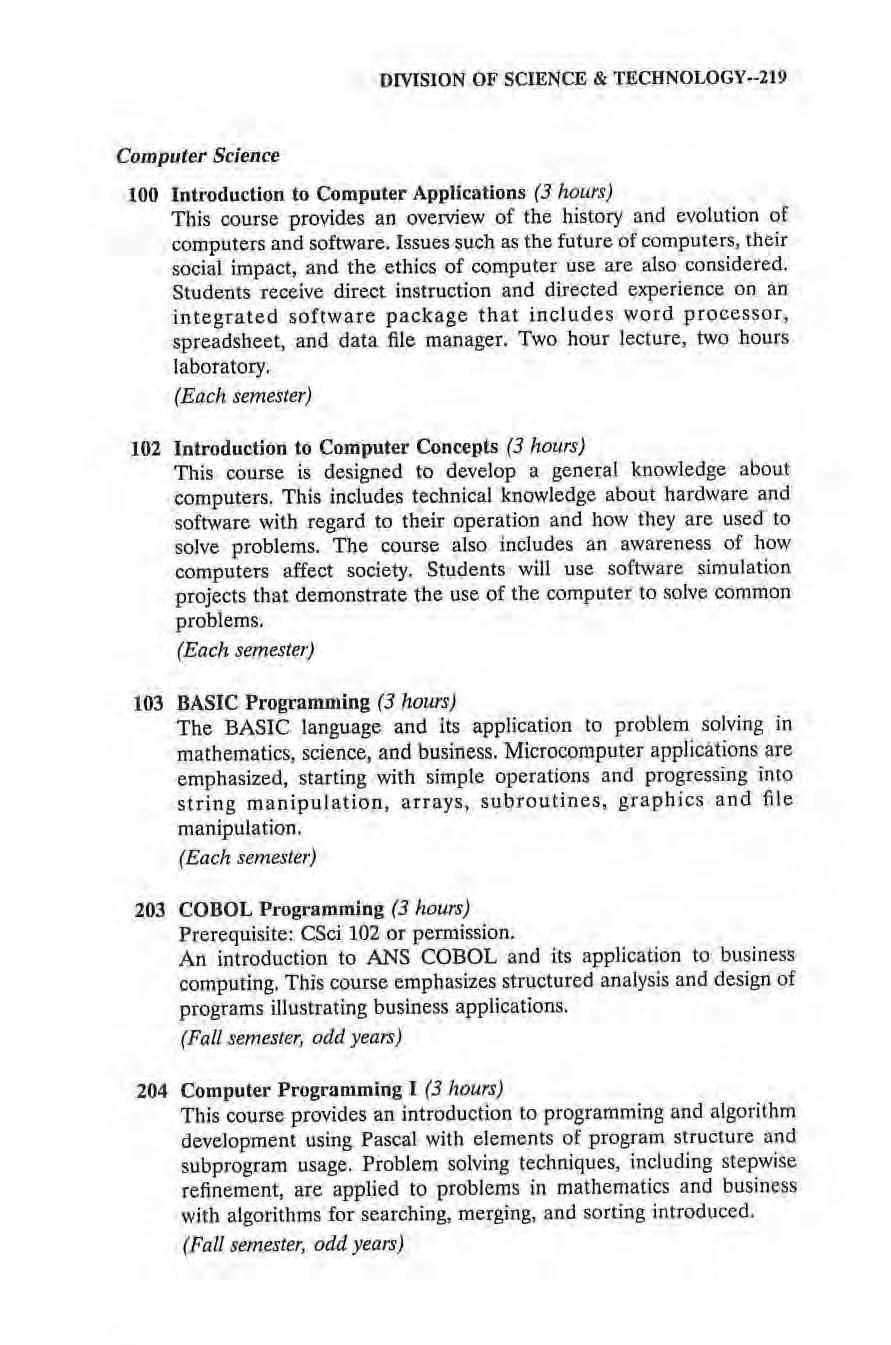
Prerequisite: CSci 102 or permission. An introduction to ANS COBOL and its application to business computing. This course emphasizes structured analysis and design of programs illustrating business applications.
(Fall semester, odd years)
204 Computer Programming I (3 hours)
This course provides an introduction to programming and algorithm development using Pascal witb elements of program structure a nd subprogram usage. Problem solving techniques, including stepwise refinement, are applied to problems in mathem at ics a nd business with algorithms for searching, mergi ng, and sor ting in troduced .
(Fall semester, odd years)
DIVISION OF SCIENCE & TECHNOLOGY--219
206 Computer Programm ing II (3 hours)
Prerequisite; CSci 204. This course introduces programming and algorithm development using the C Programming Language. The study of stepwise refinement and top-down programming, testing, and debugging is continued with an emphasis on string processing, inte rnal searching and sorting, and recursion. Data structures including stacks, queues, deques and linked lists are also built and manipulated.
(Spdng semester, even years)
208 Computer Systems (3 hours)
Prerequisite: CSci 203 or 204.
The principles of operation and assembly programming of the DEC VAX. systems are introduced. Topics to be studied incl ude computer structure and machine language, addressing techniques, macros, program segmentation and linkage conventions, file input-output, assemblers, and interpreters.
(Fall semester, even years)
297 Directed Study in Computer Science (1-4 hours) Senior standing.
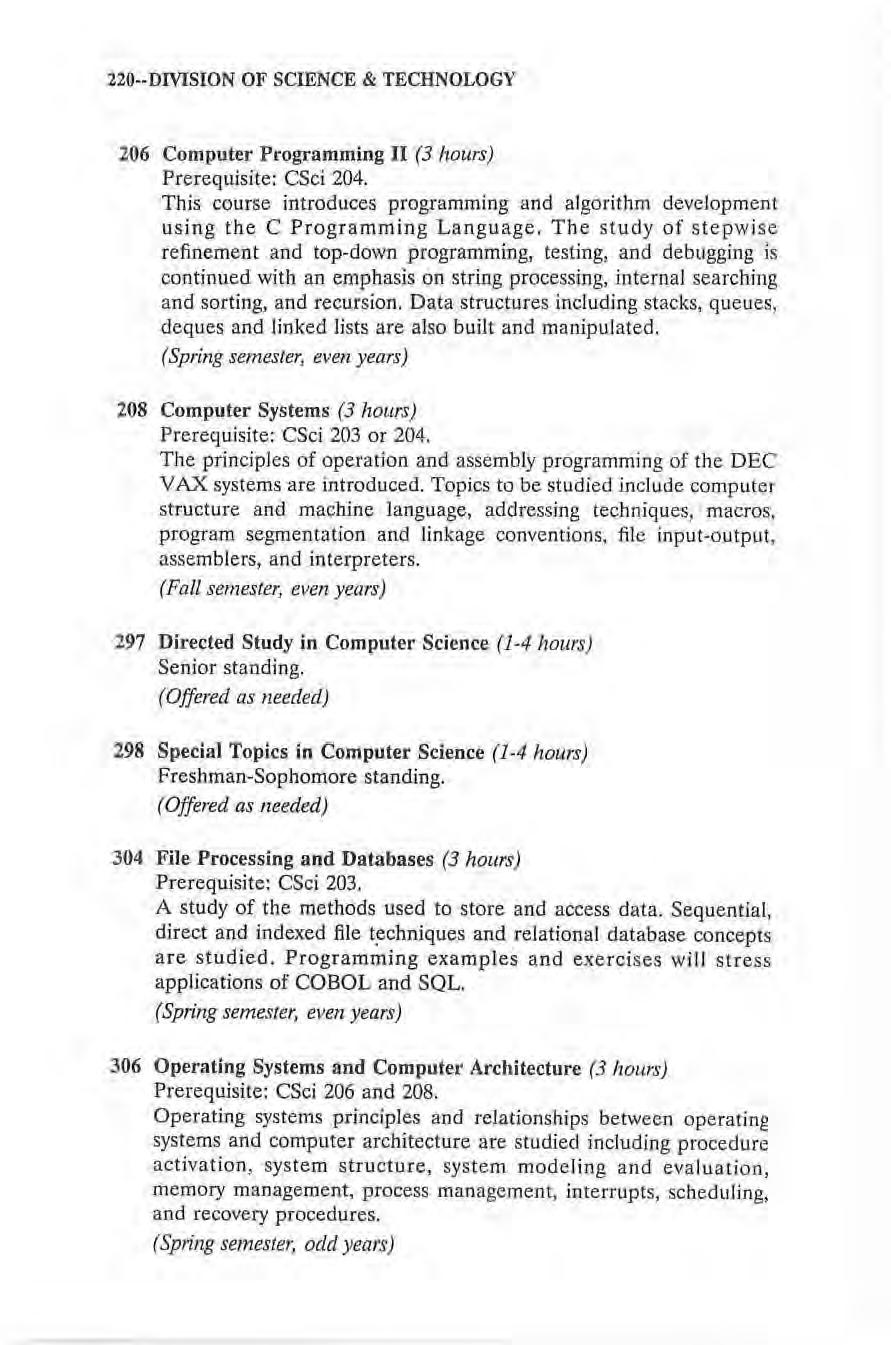
(Offered as needed)
298 Special Topics in Computer Science (1-4 hou rs) Freshman-Sophomore standing.
(Offered as needed)
304 File Processing and Databases (3 hours)
Prerequisite: CSci 203.
A study of the methods used to store and access data. Sequential, direct and indexed flle t!!chniques and relational database concepts are studied. Programming examples and exercises will stress applications of COBOL and SQL.
(Spring semester, even years)
306 Operating Systems and Computer Architecture (3 hours)
Prerequisite: CSci 206 and 208.
Operating systems principles and relationships between operating systems and computer architecture are studied including procedure activation, system structure, sys tem model ing and evaluation, m e mory management, process management, interrupts, scheduling, and recovery procedures.
(Sp1ing semester, odd years)
220 DMSION OF SCIBNCE & TECHNOLOGY
312 Systems Analysis and Design (3 hours)
Prerequisite: CSci 203.
A study of the methods used in design of computer programs and app lications systems, with emphasis on Computer Aided Software Engineering (CASE) tools and prototyping using fourth generation languages (4GL).
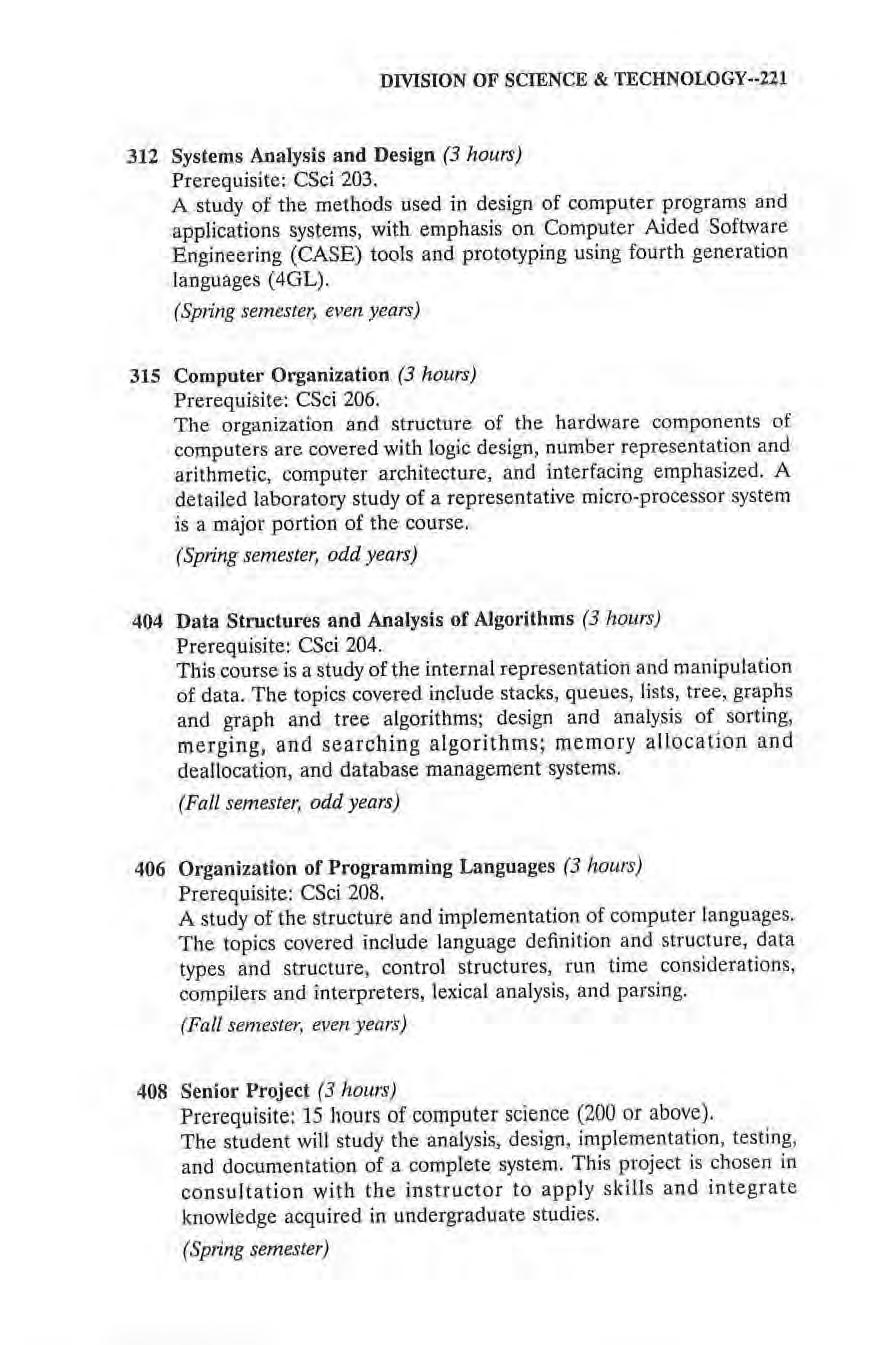
(Sp ring sem este1; even years)
315 Comp uter Organ izat ion (3 hours)
Prerequisite : CSci 206.
The organization and structure of the hardware components of computers are covered with logic design, number representation and arithmetic, computer architecture, and interfacing emp hasized. A detailed laboratory study of a representative micro-processor system is a major portion of the course.
(Spring semester, odd years)
404 Data Structures and Ana lysis of Algorithms (3 hours)
Prerequisite: CSci 204.
This course is a study of the internal representation and manipulation of data. The topics covered include stacks, queues, lists, tree, graphs and graph and tree algorithms; design and analysis of so rting, merging, and searching algorithms; memory allocation a nd deallocation, and database management systems.
(Fall semester, odd years)
406 Organization of Programming Languages (3 hours)
Prerequisite: CSci 208.
A study of the structure and implementation of comp ute r languages. The topics covered include language definition and structu re, data types and structure, control structures, run time considerations, compilers and interpreters, lexical analysis, and parsing.
(Fa ll semester, even years)
408 Senio r Project (3 hours)
Prerequisite: 15 hours of computer science (200 or above).
The s tudent will study the analysis, design, implemen t ation , testing, and documentation of a comple te system. This project is chosen in consultation with the instructor to apply skills and integrate knowledge acquired in undergraduate studies.
(Sp ring semester)
DMSION OF SCIENCE & TECHNOLOGY- -221
497 Directed Study in Computer Science (1-4 hours)
Senior standing.
(Offered as needed)
498 Special Topics in Computer Science (1-4 hours)
J unior- Senior standing.
(Fall semester, even years)
499 Independent Study in Computer Science {1-3 hours) Junior standing.
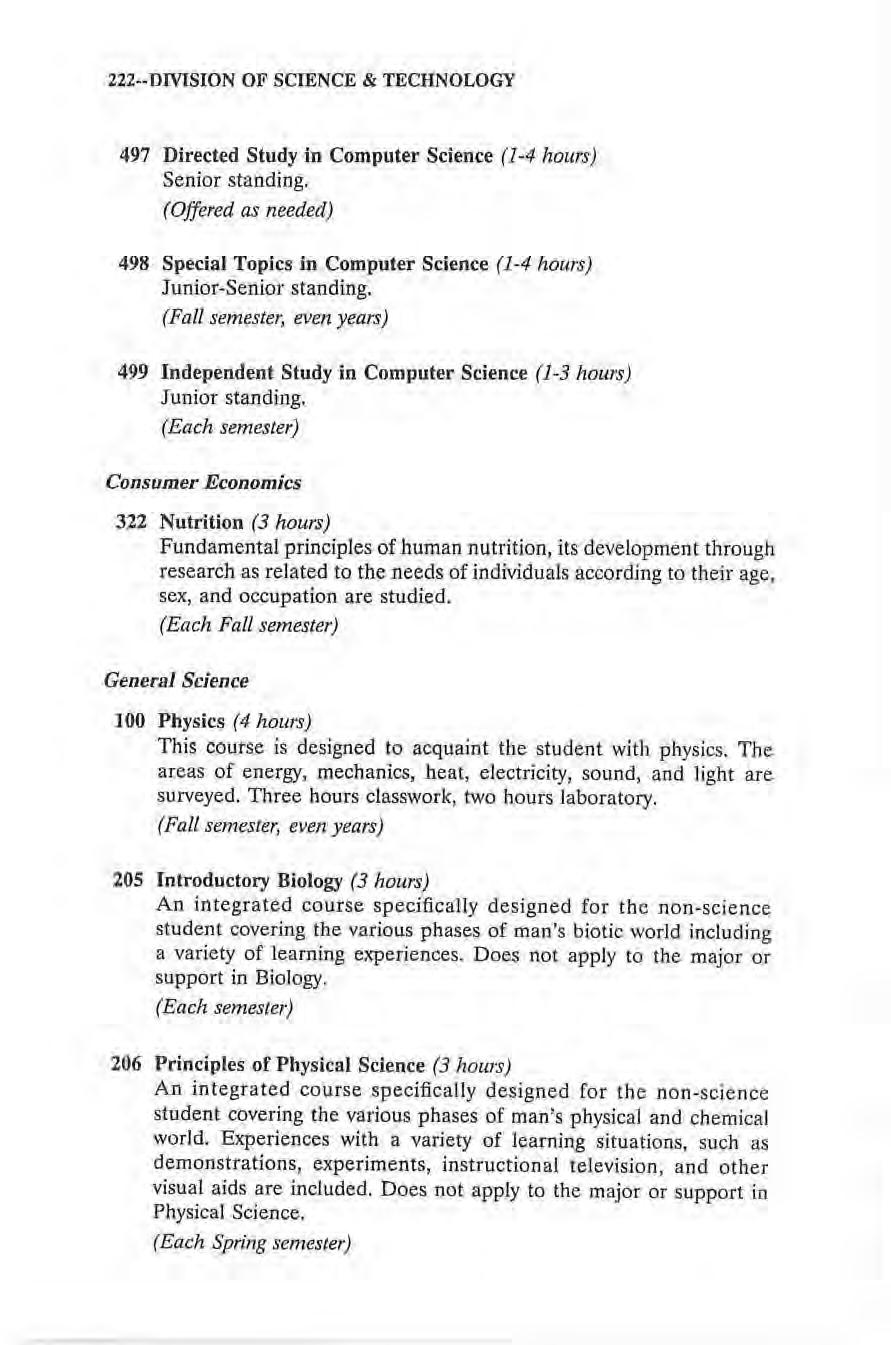
(Each semester)
Coosumer Economics
322 Nutrition (3 hours)
Fundamental principles of human nutrition, its development through research as related to the needs of individuals according to the ir age, sex, and occupation are studied.
(Each Fall semester)
General Science
100 Physics (4 hours)
This course is designed to acquaint the student with physics. The areas of energy, mechanics, heat, electricity, sound, a nd light are surveyed. Three hours classwork, two hours laboratory.
(Fall semester, even years)
205 Introductory Biology (3 hours)
An integrated course specifically designed fo r the non-science student covering the various phases of man's biotic world including a variety of learning experiences. Does not app ly to the major or support in Biology.
(Each semeste,)
206 Principles of Phys ica l Science (3 hours)
An integ r ated course specifically designed for the non-science s tud ent covering the various phases of man's physical and chemical world. Experiences with a variety of learnjng situations, such as demonstrations, experiments, instructional television, and other vis ual aids a r e included Does not apply to th e major or support in Physical Science..
(Each Spring semester)
222--DIVISION OF SCIENCE & TECHNOLOGY
232
A study of energy resources with a focus on both nuclear and convention a l power sta tions, design operation, cost, governmental regu lationst safety, and environmental effects. Field trips to nuclear and conventional generation stations are required.
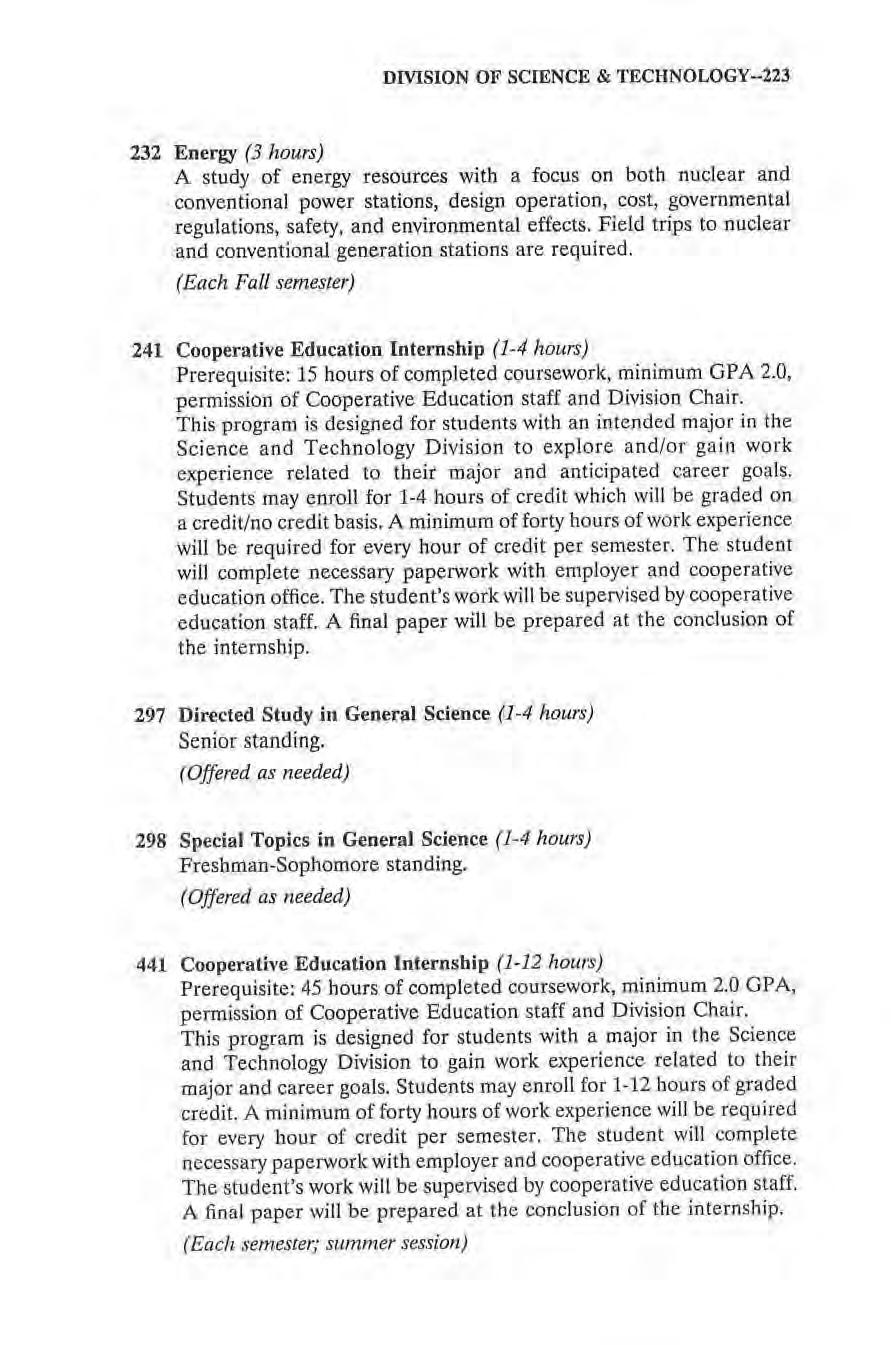
(Each Fall semester)
Prerequisite: 15 hours of completed coursework, m inimum GPA 2.0, permission of Cooperative Ed ucation staff and Division Chair. This program is designed for students with an inte11ded major in the Science and Tec h nology Division to explo r e and/or gain work experience related to their major and anticipated career goals. Students may enroll for 1-4 hours of credit which will be graded on a c r edit/no credit basis. A minimum of forty hours of work experience will be required for every hour of credit per semester. The student will comp lete necessary paperwork with employer and cooperative education office. The student's work will be supervised by cooperative education staff. A final paper will be prepared at the conclusion of the internship.
Sen ior stand ing.
(Offered as needed)
Freshman-Sophomore standing.
(Offered as needed)
441
Prerequisite: 45 hours of completed coursework, minimum 2.0 GPA, permission of Cooperative Education staff and Division Chair. This program is designed for students with a major in the Science and Technology Division to gain work experience re lated to their major and career goals. Students may enroll for 1-12 hours of graded credit. A minimum of forty hours of work experience wi ll be required for every hour of credit per semester. The student will complete necessary paperwork with employer and cooperative education office. The stude nt's work will be supervised by cooperative education staff. A final paper will be prepared at the conclusion of the internship.
(Ea ch semeste,~· summer session)
DMSION OF SClENCE & TECHNOLOGY--223
Energy (3 hours)
2 4 1 Coo perati ve Ed ucation Intern s h ip (1-4 hours)
297 Di rected Stu dy in General Science {1-4 hours)
298 Special T opics in Genera l Science (1 - 4 hours)
Coo pe ra tive Ed u cation Internsh i p (1-12 hours)
476 Methods of Teaching Science (3 hours)
This co urse introduces the objectives, content and methods of classroom and laboratory teaching techniques.
( Fall semester, even years)
497 Directed Study in General Scien ce (1-4 hours) Senior standing

(Offered as needed)
498 Special Topics in General Science (1-4 hours)
Junior-Senior standing.
(Offered as needed)
499 In dependent St udy in General Science {1-3 hours) Junior standing.
(Eac h semester)
Geology
201 Physical Geology (4 hours)
An introduction to the theories of the earth's origin and th e study of the earth's structure and materials with a special emphasis on rock, mineraJs, landforms, oceanography and environmental studies. Three hours lecture, two hours laboratory.
(Offe red as n eeded)
202 Rocks and Minerals (1-3 hours)
An introductory course to the st udy of the physical properties of rocks and minerafs stressing field work at mineral and rock localities in South eas t Nebraska.
(Offered as needed)
203 Introd u ctio n to Fossils ( 1-3 hours)
Th is is an introductory course to the me thods of interpreting the fossil record through actual field work at fossil locations in Southeast Nebraska.
(Offered as needed)
297 Directed Study in Geology (1-4 hours)
Senior standing.
(Offered as needed)
224--DMSION
OF SCIENCE & TECHNOLOGY
298 S pecial Topics in Geology (1-4 hours)
Freshman-Sophomore standing.
(Offered as needed)
301 Historical Geology (4 hours)
This course introduces the geological history of the earth and the e volution of its animal and p lant inhabitants. It includes work at fossil locaJities in S E. Nebraska utilizing stratigraphic methods. Three hours lecture, two hours laboratory.
(Offered as needed)
304 Meteorology a nd Climatology (3 hours)
The physical factors influencing the climate with practical work in interpreting meteorological records and forecasting are studied. Two hours lecture, two hours laboratory.
(Offered as needed)
315 Physiography of the United States (4 hours)
Prerequisites: Geog 101 and 103.
As a regional study of landform provinces, this course gives special emphasis to the relationship between landforms, climate, soils, vegetation, and mineral resources. Three hours lecture, two hours labora tory.
(Offered as needed)
497 Di rected Study in Geology (1-4 hours) Senior sta nding
(Offered as needed)
498 S pecial Topics in Geology (J-4 hours)
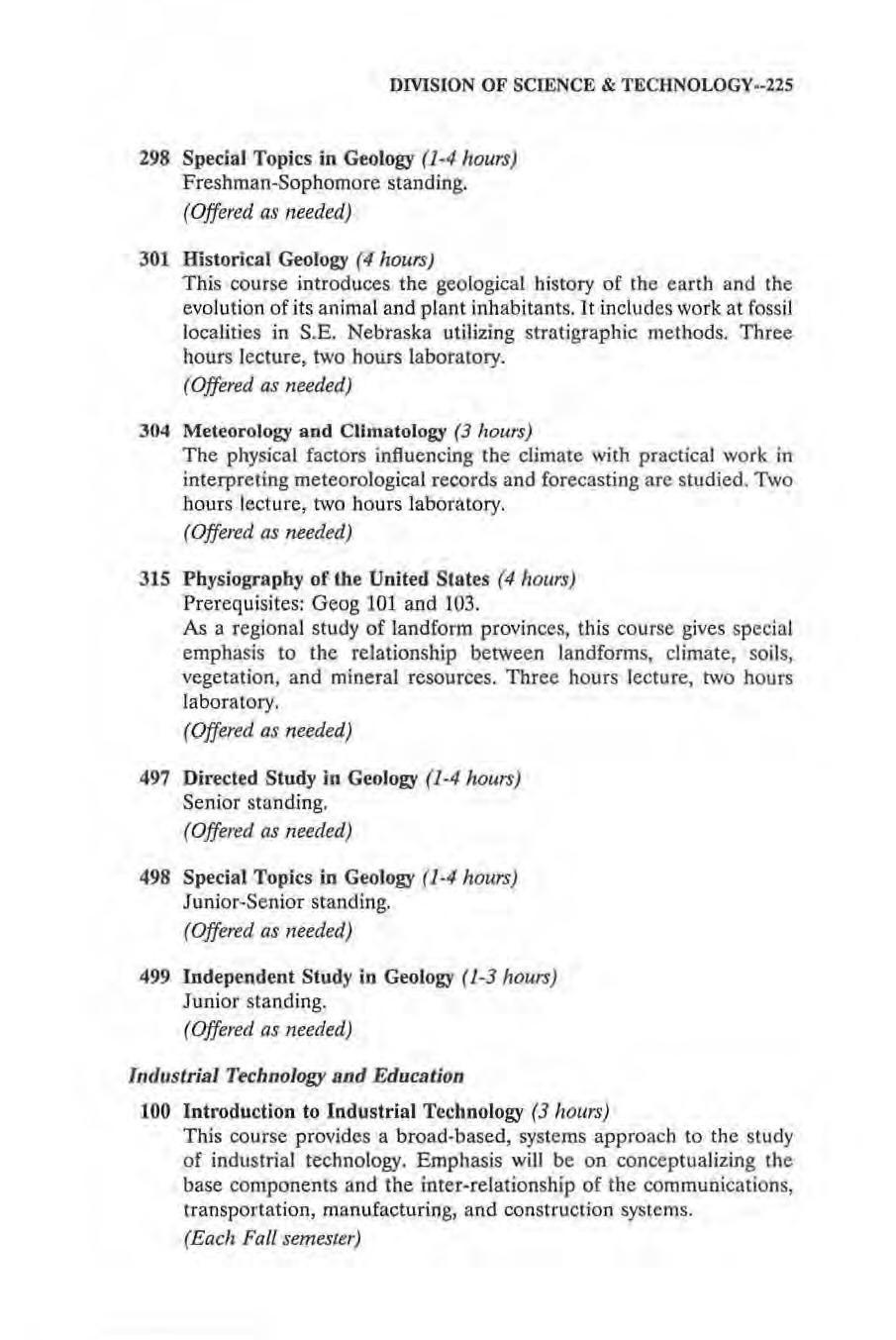
Junior-Senior standing.
(Offered as needed)
499 Independent Study in Geology (J-3 hours) Junior standing.
(Offered as needed)
Industrial Techno logy and Education
100 Introduction to Industrial Technology (3 hours)
This course provides a broad-based, systems approach to the study of industriaJ technology. Emphasis will be on conceptualizing the base components and the inter-relationship of the commun ications, transportation, man ufacturin g, and construction systems.
(Each Fall semester)
DMSION OF SCIBNCE & TECHNOLOGY --225
121 Technical Graphics I (3 hours)
As a course concerned with the fundamentals of Technical Graphic communications, it includes the following areas of study and lab e>..1)eriences: graphic design, shape description, multiview projection, compu t er graphics and sectional views.
(Each Spring semester)
124 Constmction Materia ls (3 hours)
This course provides an introduct01y study of construction materials. Topics include the selection, application, and proce ssing of those materials used in typical residential and light commercial construction systems.
(Each Spring semeste1)
125 Graphic Communications (3 hours)
A course to study the theory and practice of graphic communications and related careers. The course will include basic study and practice in drafting, design, graphic arts, and photography. A series of interrelated activities will be completed to demonstrate the industrial practices utilized in each area
(Each Fall semester)
127 Power(fransportation Systems (3 hours)
This course is a basic study of the production control and transportation of mechanical1 e lectrical, and fluidic power. It deals with the interrelationships of the se three factors as they a re integrated into the power/transportation systems of modern technology.
(Each Fall semester)
132 Material Processing I (3 hours)
This course provides an introduction to the study of separating, forming, and combining of industrial materials. Areas of study will include the processing technology associated with metals, composites, and synthetic materials.
(Each Spting semester)
222 Technica l Graph ics II (3 hours)
Prerequisite: ITE 121.
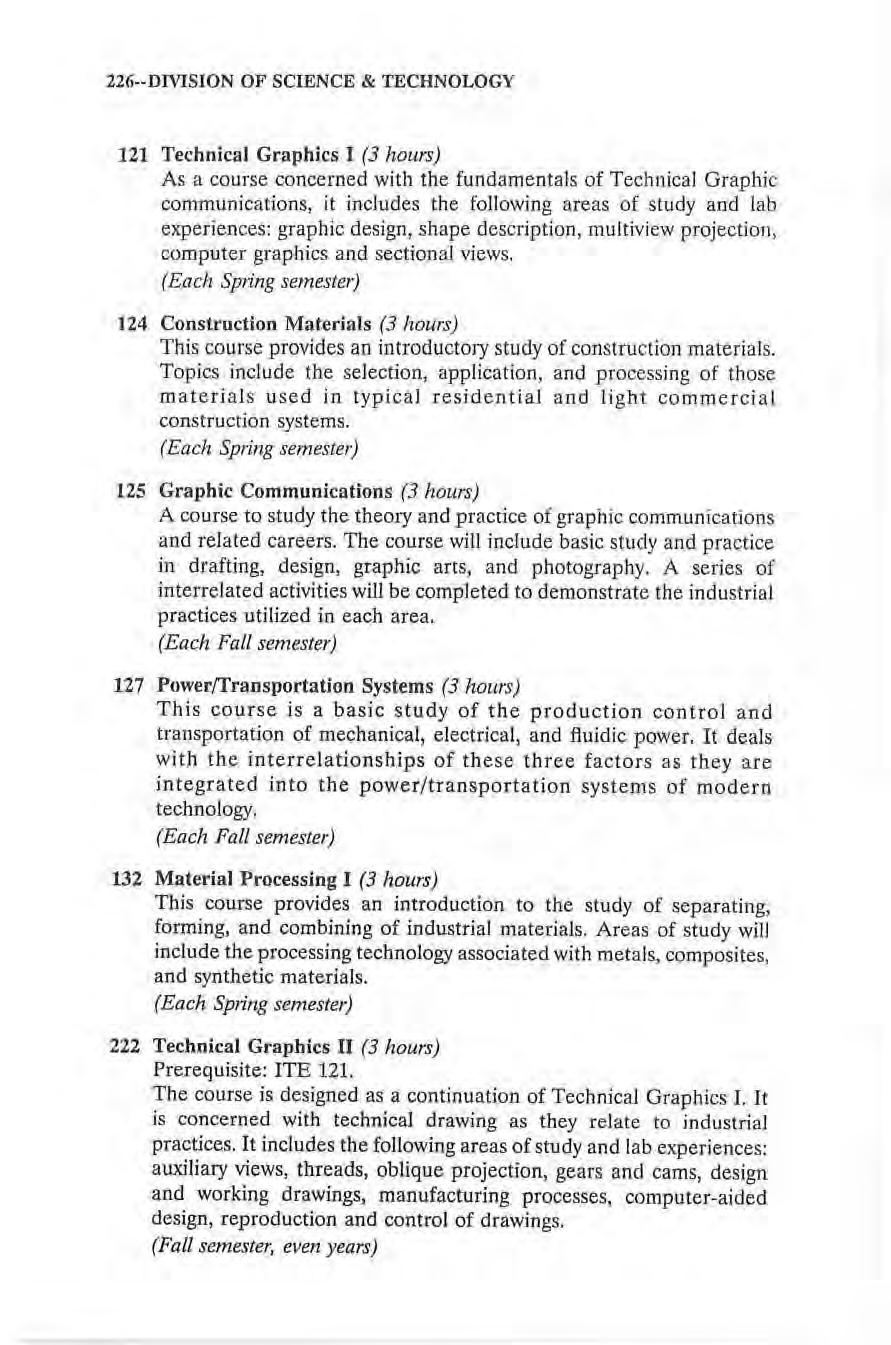
The cou rse is designed as a continuation of Technical Graphics I . It is con cerned with technical drawing as they relate to industrial practices. It includes the following areas of study and lab experiences: auxi liary views, threads, oblique projection, gears and cams, design and working drawings, manufacturing processes, computer-aided design, reproduction and control of drawings.
(Fall semester, even years)
226--DMSION OF SCIENCE & TECHNOLOGY
226 Photography I (2-3 hours)
This course studies the theory and practice in the basic fundamentals of photography including composition, expos ure, lighting, developing, contact printing and enlarging. The third hour credit is gained by additional assignments. Each student must have a came ra.
(Each Fall semester)
233 Fundame ntal s of Electricity/Electronics (3 hours)
Prerequisite: ITE 127 or special permission. Principl es and applications of AC and D C theory as utilized in home, business, and industry are covered. Areas of instruction include: electrical/e lectronic theory, lighting, heating, motors and generators, residential and industrial wiring, and basic automotive electrical systems.

(Each Spring semester)
234 Manufacturing Systems (3 hours)
Prerequisite: ITE 124.
This course is an introduction to manufacturing systems and production techniques. Typical units of study include manage ment, personnel, and production systems with emphasis on product design, process engineering, line p roduction, and product marketing.
(Each Spring semester)
239 Silk Screenin g Techni ques (3 hours)
This course is a study of the basic theory, materials, and processes used in silk screen printing.
(Offered as needed)
240 Car Care (2 hours)
This course is designed to provide the student with a basic knowledge of purchasing, maintaining, insuring, and operating the mod e rn automobile. Consumer information is stressed together wit h basic knowledge of automotive lubrication, tune-up, and diagnosis. This course does not apply on the Industrial Technology and Education major.
(Offered as needed)
297 Directed Study in Industrial Tech nology a nd Ed ucation (1-4 hours)
Senior standi ng.
(Offered as needed)
DMSION OF SCIBNCE & TECHNOLOGV--227
298 Specia l Topics in Indu s tria l Tech nol ogy and E du catio n (1-4 hours)
Freshman-Sophomore standing.
(Offered as needed)
310 Wo od L a the (1-2 hours)
This course provides a study of the various techniques of spindle and facep l ate woodturning Emphasis wil l be placed on wood preparation, turning techniques, fin i sh ing procedures, and duplication techniques.
(Offered as needed}
321 Ind ustrial Eq uipm ent M a inte n a n ce (3 hours)
The managing, ma intaining, conditioning, and repairing of too ls and equipment in industrial shops and labora tories are emphasized in this course.
(Each Fall semester)
322 Elementary Tech n ology Education (3 hou rs)
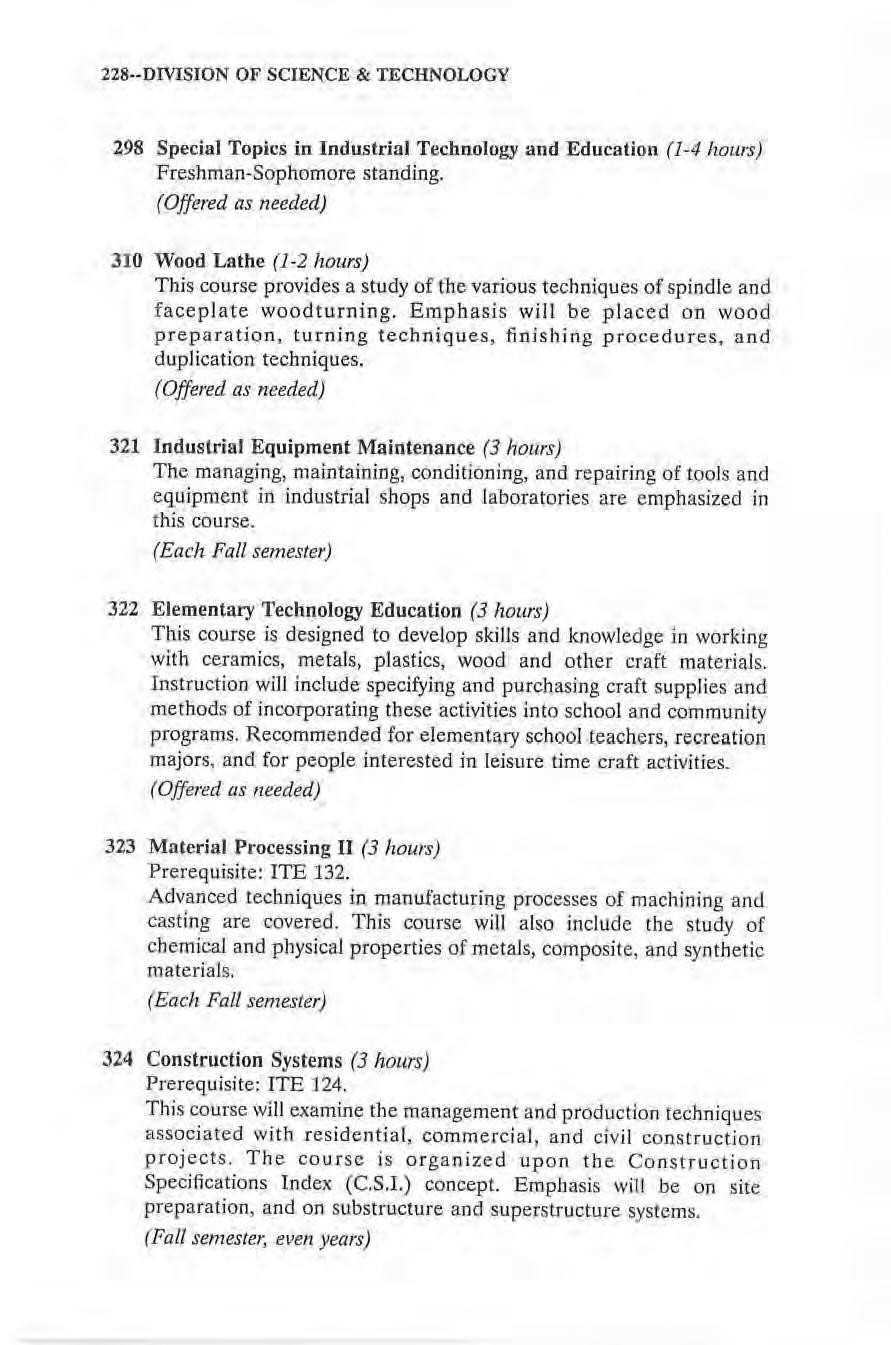
This course is designed to develop skills and knowledge in working with ceramics, metals, plastics, wood and other craft materials. Inst r uction wiJI include specifying and purchasing craft supplies and methods of incorporating these actiyjties into school and community programs. Recommended for element<\ry school teachers, recreation majors, and for people interested in leisure time craft activities.
(Offered as needed)
323 Material P rocessin g II (3 hours)
Prerequisite: I TE 132.
Advanced techniques in manufacturing processes of machining and casting are covered. This course will also include the study of chem ical and physical properties of metals, composite, and synthetic materials.
(Each Fall semester)
324 Con s truction Systems (3 hours)
Prerequisite: ITE 124.
This course will examine the management and production techniques associated with resi dential, commercial, and civil construction projects. The course is organized upon the Construction Specifications Index (C.S.l.) concept. Emphasis wil l be on site preparation, and on substructure and superstructure systems.
(Fall semester, even years)
228--DMSION OF SCIENCE & TECHNOLOGY
325 P hotograp hy II (2-3 hours)
Prerequisite: ITE 226. A course designed to continue with the practices and tech niques learned in Photography I. The subject matter will include such items as: types of cameras, lenses, films and developers, as well as color sl ides and color prints.
(Offered as needed)
327 Electro-Mec han ica l Systems in Co nstru c ti on (3 hours)
This cou rse will examine the design, selection, and installation of electrical mechanical systems in residential and light co mm ercia l applications. Emphasis will be on electrical, plumbing, and heating, ventilating and air conditioning (HVAC) systems.
(Offered as needed)
328 Analog E lec tronics (3 hours)
Prerequisi te: ITE 233 or special permission. As a study of the principles and applications of e lectronics in control and communicat ion equipment. Instruction in th e theory and application of solid state and electronic devices in power supplies, amplifiers, oscillator, and various other circuits will be give n .
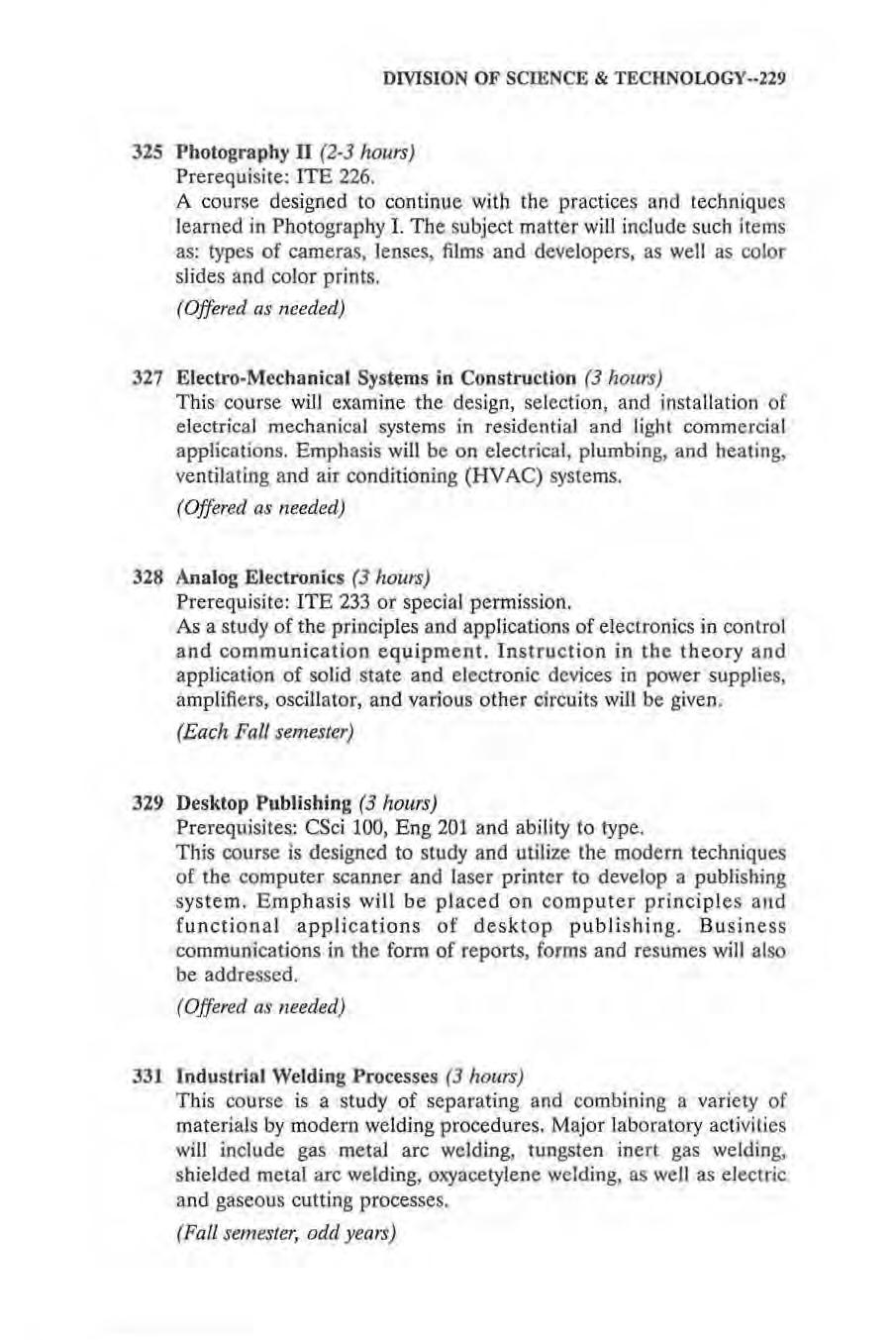
(Each Falt semester)
329 Desktop Publishing (3 hours)
Prerequisites: CSci 100, Eng 201 a nd ability to type. This course is designed to study and utilize the modern techniques of the computer scanner and laser printer to develop a publishing system. Emphas is will be placed on computer principles and functional applications of desktop publishing. B u siness communications in the form of reports, forms and resumes will also be addressed .
(Offe red as needed)
331 Industrial Welding Processes (3 hours)
This course is a study of separating and combining a variety of materials by modern welding proced u res. Major laboratory activities will include gas metal arc welding, tungsten inert gas welding, shielded metal arc welding, oxyacetylene welding, as well as elect r ic and gaseous cutting processes.
(Fall semester, odd yea rs)
DMSION OF SCIENCE & TECHNO LOGY--229
332 Transportation Technical Systems (3 hours)
This course is a study of the applications of e lectric, mechanical and flujd power as utilized in transportation systems. Units of study include hydraulics, pneumatics, internal combustion engines, alternative power sour ces.
(Spring semester, odd years)
333 Computer Aided Design/Computer Aided Ma nufacturing (3 hours)
The purpose of this course is to integrate the design process (CAD) with the manufacturing process (CAM). Emphasis will be placed on CAD applications (AutoCad) and CNC operation and control.
(Spring semeste1; even years)
334 Automotive Systems and Maintenance (3 hours)
The student will acquire technical informatiol} in the fundamentals and economics operation of the modern automobile in this course.
(Offered as needed)
337 D river Education and Traffic Safety I (3 hours)
Prerequisite: Twenty thousand miles or two years of driving experience free of repeated chargeable accidents and moving violations.
This course will include presentati on of materials and methods of traffic safety and driver training, with emphasis upon attitude, skill development, organization and administration, driving regulations and safe automotive operatjon.
(Summer Session, offered as needed)
338 Industrial Safety (3 hours)
This course is designed to familiarize the student with safe t y man agement and accident prevention as related to industry. Emphasis will be placed in the fo ll owing areas: Occupational, Personnel, Transportation, Waste Management, and Management of Safety Programs.
(Spring semester, odd years)
339 Computer Aided Design (2 hours)
Prerequisite: ITE 121.
Computer Aided D esign is a course designed to introduce the student to the use of computers, digitizing pad and plotters in designing and drawing products in the industrial world. Projects will be encountered that will deal with graphs and charts, architectural design and technical drawings.
(Offered as needed)
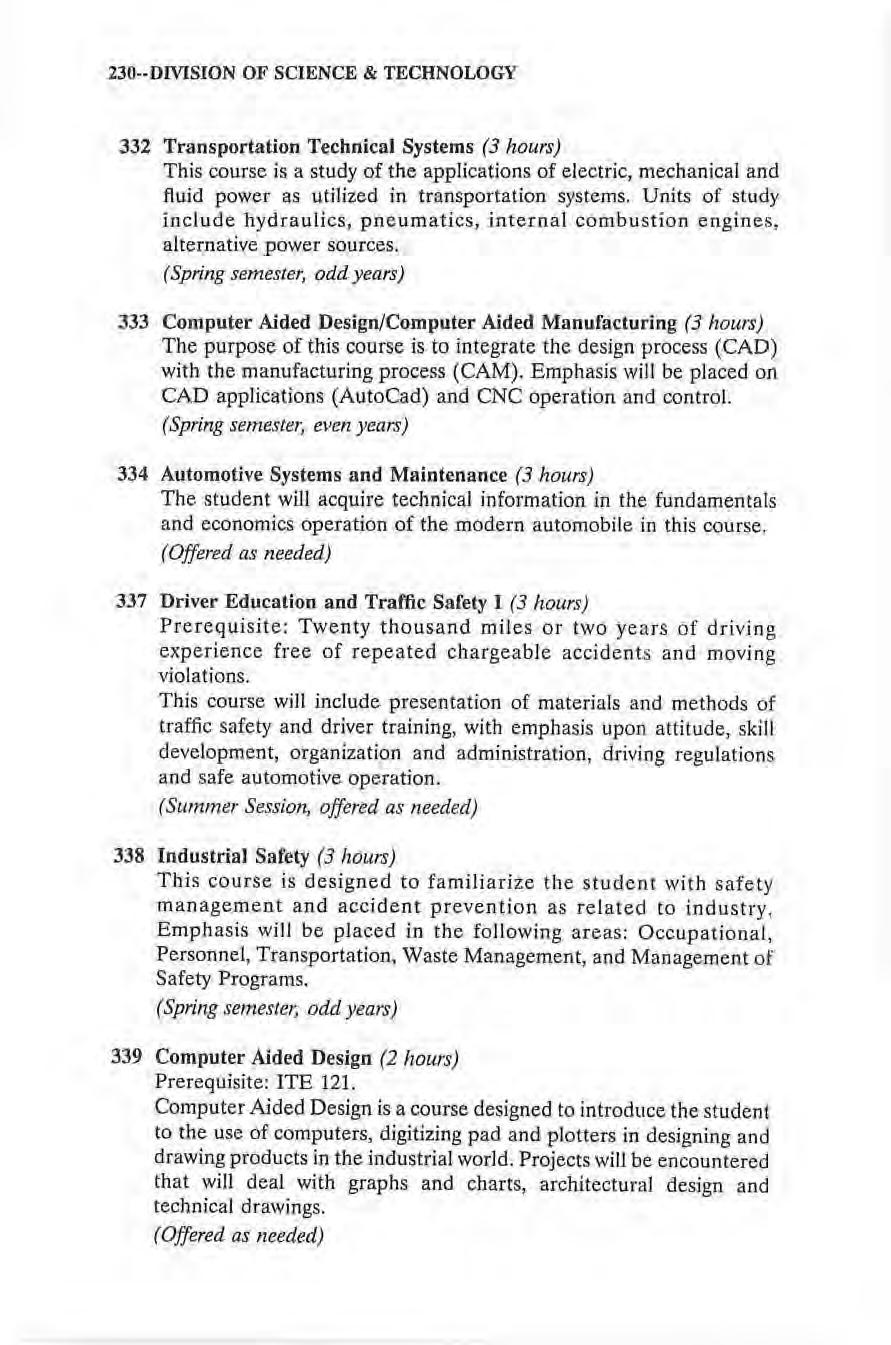
230--DMSION OF SCIENCE & TECHNOWGY
340 Dri"er Education and Traffic Safety II (3 hours)
This course will provide an opportunity to construct materials relating to and experimenting with methods of presenting lessons in traffic safety and behind-the-wheel driving. Each student will be expected to teach a beginning driver.
(Summer Session, offered as needed)
343 Hydraulics and Pneumatics (3 hours)
This course will cover fluid power principles with practical appUcation of hydraulics, pneumatics, and fluidics
(Offered as needed)
35 0 Administration and Ma nagement of Industrial Materials and Equipment (3 hours)
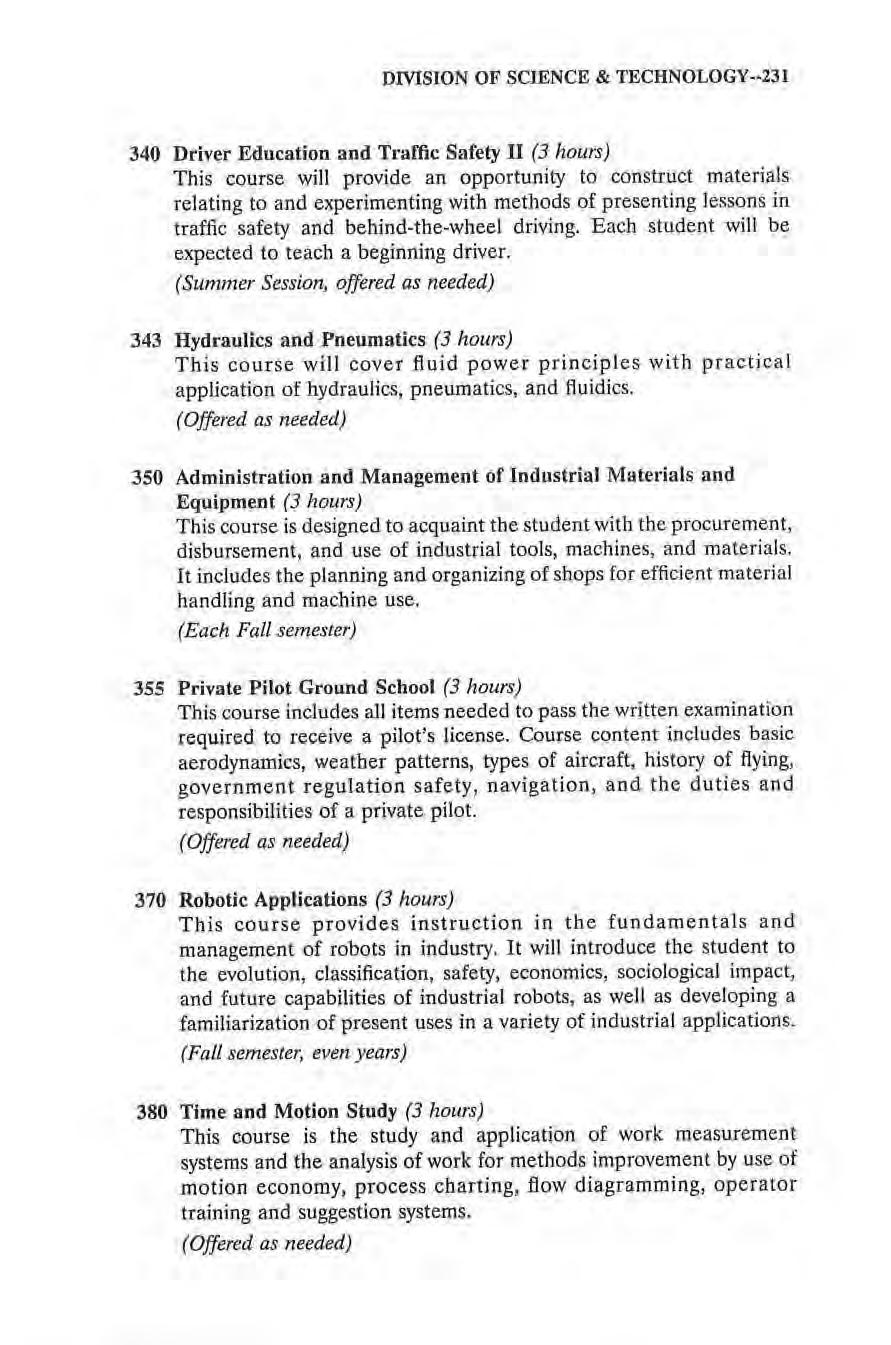
This course is designed to acquaint the student with the procurement, disbursement, and use of industrial tools, machines, and materials. It includes the planning and organizing of shops for efficient material handling and machine use.
(Each Fall semester)
355 Private Pilot Ground School (3 hours)
This course includes all items needed to pass the written examination required to receive a pilot's license. Course content includes basic aerodynam ics, weather patterns, types of aircraft, history of flying, government regulation safety, navigation, and the duties and responsibilities of a private pilot.
(Offered as needed)
370 Robotic Applications (3 hours)
This course provides instruction in the fundamentals and management of robots in industry. It will introduce the student to the evolution, classification, safety, economics, sociological impact, and future capabilities of industrial robots, as well as developing a familiarization of present uses in a variety of industrial applications, (Fall semester, even years)
380 Time and Motion Study (3 hours)
Thi s course is the study and application of work measurement systems and the analysis of work for methods improvement by use of motion economy, process charting, flow diagramming, operator training and suggestion systems.
(Offered as needed)
DMStoN OF SCIENCE & TECHNOLOGY--231
381 Quality Assurance (3 h ours)
The techniques and procedures of determining and maintaining the quality of industrial products, random sampling and othei· statistical procedures used in the manufacturing and service sector to determ ine if prod ucts meet specifications are covered in this course. A lso, product quality improvement by design and structural feat ures is d iscovered.
(Offered as needed)
400 Community Facilities (2 hours)
This course reviews water tre a tment and d istribution systems, wastewater collecti on and disposa l systems, street a nd highway des ign, solid waste disposal, and e nvironm ental sta ndards.
(Offered as needed)
405 Study of Industries Workshop (3 hours)
This cour se is designed to develop an awa reness of technological adva ncements in a variety of contemporary industries. A broadbased overview of the orga ni2 a ti o n a nd the taxonomy of American industry will be observed.
(Offered as needed)
410 Digital Electronics (3 hours)
Prerequisite: ITE 328 or pe1mission.
As a study of digital integrated circuits, topics covered will include numb ering systems, logic gates, flip flops, r egisters, clocks, a nd memories.
(Spring semester, even years)
415 Microprocessors (3 hours)
Prerequisite; ITE 410.
The fundamental concepts of microprocessors including software, hardware, and inte rfac e techni qu es are covered. Industr ial applica tions will also be examined.
(Spring semeste1; odd years)
425 E ducational Methods in Industria l Technology (3 hours)
The course will emphasize history, philosophy, and t rends of th e industr i al technology movement; the goal s and objectives of Industria l Technology Education in the secondary sc hool; teachin g methods and aids, .l aboratory discipline, testing, grad ing, and safety in Industrial Technology Education classes; a nd an introduc tion to Ind ustria l Tech nology clubs and their values in the to ta l schoo l program.
(Each Spring semester)
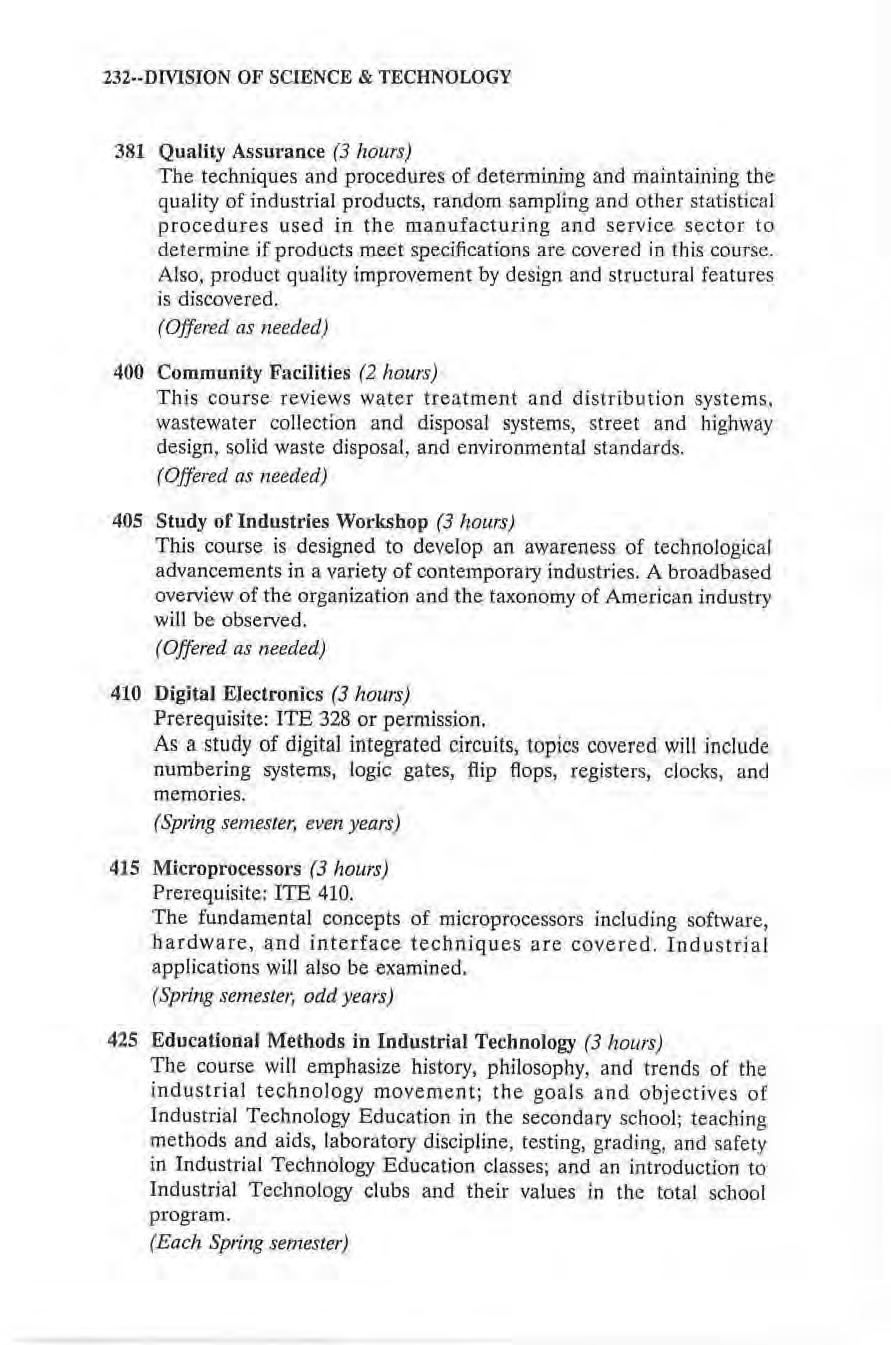
232--DMSION OF SCIENCE & TECHNOLOGY
427 Construction Planning and Design (3 hours)
Prerequisite: ITE 222.
The principles of planning a dwelling to fit modern needs are discussed. D rawings will include a plot plan, floor p l an, four elevations, sections and details. Specifications will be deternuned by the student for the dwelling.
(Offered as needed)
430 Industrial Management (3 hours)
The study of Industrial M anagement for indus t ry. Topic areas wi ll include cost est imating, production contro l , in ventory control, forecasting, and sch eduling.
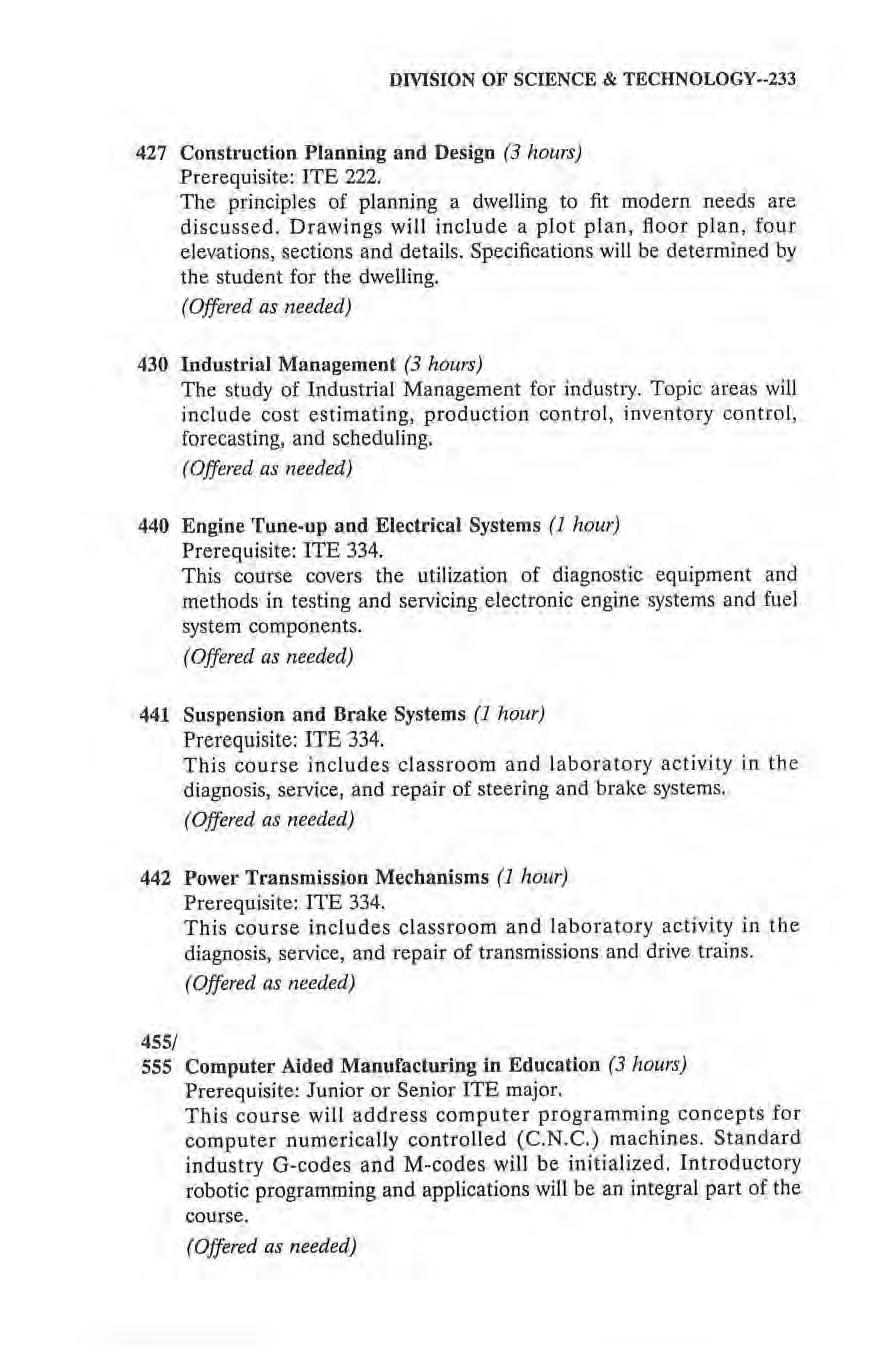
(Offered as needed)
440 E ngin e Tune- up and Electrical Systems (1 hour)
Prerequ isite: ITE 334.
This cou r se covers the u til ization of diagnostic equipmen t and methods in testing and servicing electronic engin e systems and fuel syste m components .
(Offered as needed)
441 Suspension an d Brake Syste ms (1 hour)
Prerequisite: I TE 334.
Th is course i n cludes classroom and l aboratory activ ity in the diagnosis, service, and repair of steering and brake sys tems.
(Offered as needed)
442 Power Transmission Mechanisms (1 hour)
Prerequisite: ITE 334.
This course includes c l assroom and laboratory activity in the diagnosis, service, and repair of transmissions and drive trains.
(Offered as needed)
455/
55 5 Co mputer Aided Manufacturing in Educa tion (3 hou r~)
Prerequisite.: Junior or Senior ITE major.
This course wi ll address computer programming concepts for computer numerically controlled (C.N .C .) machines. Standard industry G-codes and M-codes will be initialized. In troductory robotic programming and applications will be an integral part of the cour se.
( Offered as needed)
DMSION OF SCIENCE & TECHNOLOGY--233
450/
550 Flexible Manufacturing Systems (3 hours)
Prerequisite : Junior or Senior ITE major. This course will address computer programming co ncepts for computer numericaJly controlled (C.N.C.) machin es. Standard industry G-codes a nd M-codes will be utilized. Introductory robotic progra mming and applications will be an integral part of the course.
(Offe red as needed)
480 Industrial Management Internship (6 hours)
Prerequisite: Junior or Senior ITE major with approval of the Science and Technology .Chairp e rson.
A student may enroll in six hours of credit for an approved work expe rience program. A minimum of 40 hours of work experience will be required for every hour of credit awarded. The learning experience is organized and supervised by the Ind ustrial Technology staff.
(Offe red as needed)
497 Directed Study in In dust rial Technology and Education (1-4 hours) Senior standing.
(Offered as needed)
498 Special Topics in Industrial Technology and Education (1 -4 hours)
Prerequisite: Junior-Senior standing.
(Offered as needed)
499 Independent Study in Industrial Technology an d Edu cat ion (l-3 hours)
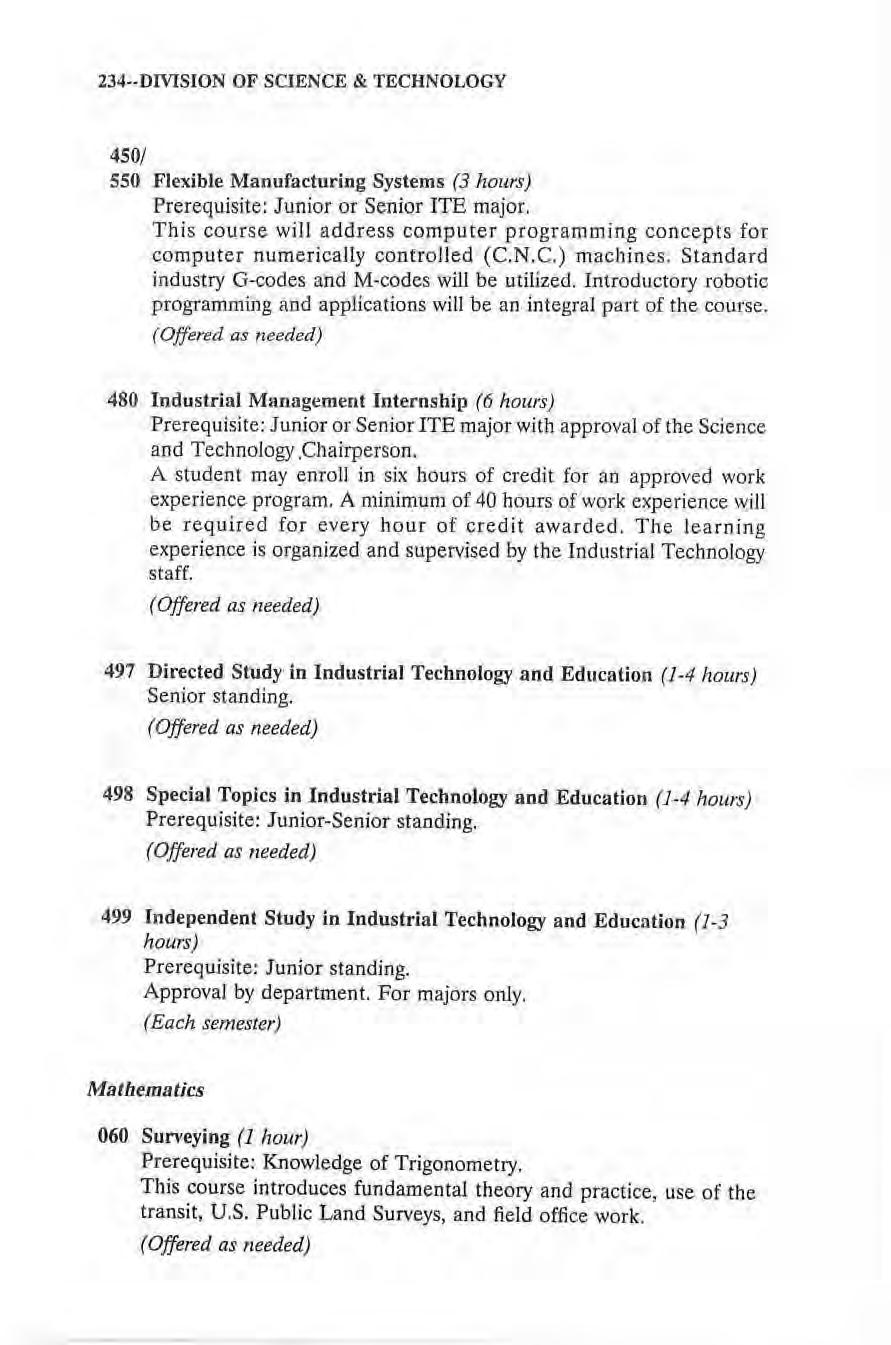
Prerequisite: Junior standing.
Approval by department. For majors only. (Each semester)
Mathematics
060 Surveying (I hour)
Prerequisite: Knowledge of Trigonometry. This course introduces fundamental theory and pract ice, use of the transit, U.S. Public Land Surveys, and field office work.
(Offered as needed)
234- -DMSION OF
&
SCIENCE
TECHNOLOGY
08 0 Arith metic (1 hour, credit/no credit)
This course is designed to help students learn effective mathematics skills which can be used to promote academic success in college. Units to be covered include computations, concepts, word problems, and algebra and geometr y. This course is a developme n tal requirement for students identified as needing mathematics improvement training. Studen ts requ ired to enroll in Math 080 Arithmetic must successfully comp l ete the post-test with the necessary passing score before enrolling i n the general studies mathematics elective. Students who do not earn the necessary passing score will be requ ired to enroll in Math 081 Ari thmetic.
(Each semester)
081 Ari thm eti c (1 hour, credit/no credit)
T his course is a continuation of M ath 080 Arithmetic; that is, this course is designed to help student s learn effective mathematics skills which can be used to promote academic success in college . Units to be covered include computations, concepts, word problems, and algebra and geometry. T his course is a developmental requirement for students identified as needing mathematics improvement training. Students required to enroll in Math 081 Arithmetic must successfully complete the post-test with the necessary passing score before enrolling in the gener al studies mathematics elective. Students who do not earn the necessary passing score will be required tq visit with the Vice President for Student Affairs to d iscuss independent course options that can be devised by the director of the Communications Skills Center to promote student success.
(Each semester)
101 Co ll ege Algebra (4 hours)
P rerequisite: One year of h igh school algebra. This cou rse is for students who specifically need algebra in certain pm-professional programs It covers fundamental algebraic principles and processes and is not to be taken for credit by students who have completed Math 125.

(Offered as needed)
107 Algeb ra/Tr igonom etry (4 hours)
This course is a study of basic algebraic and trigonometric concepts with an emphasis on linear and quadratic equations and syst ems. Trigonometric concepts will be studied from the rig)1t triangle and the oblique triangle approach
(Offered as needed)
DMSION OF SCIENCE & TECHNOLOGY--235
llO Elements of Mathematics (3 hours)
This course is designed to give the non-mathematical student the opportunity to use basic operations, succeed in mathematical modeling and understand deductive and inductive reasoning. Th e general concepts covered will include sets, logic, numeration systems, the number system (natural numbers t hrough the reals), metric system, equations, inequalities, problem solving, graphs, functions and geometry.
(Each semester)
lll Elements of Statistics (2 hours)
This course is designed to give the non-mathematical st udent an association with elementary probability and descriptive s tatistics. The course will give the student the opportunity to u se the basic ope rations, succeed in mathematical modeling, understand deductive reasoning and, most of all, become familiar with statistical procedures. The general concepts covered will include permutations, combinations, probability, frequency distributions, graphs, measures of central tendency and dispersion, use of the Normal Curve, and regression and correlation.
(Each semester)
125 Precalculus Mathematics I (5 hours)
This course is intended for students who plan to pursue a college program requiring a substantial amount of training in mathematics. The content of the course includes a review of algebra, including number systems, equations, inequalities and graphing, an introduction to the study of functions and their graphs, the study of algebraic, exponential and logarithmic functions, and an introduction to systems of equations and linear algebra.
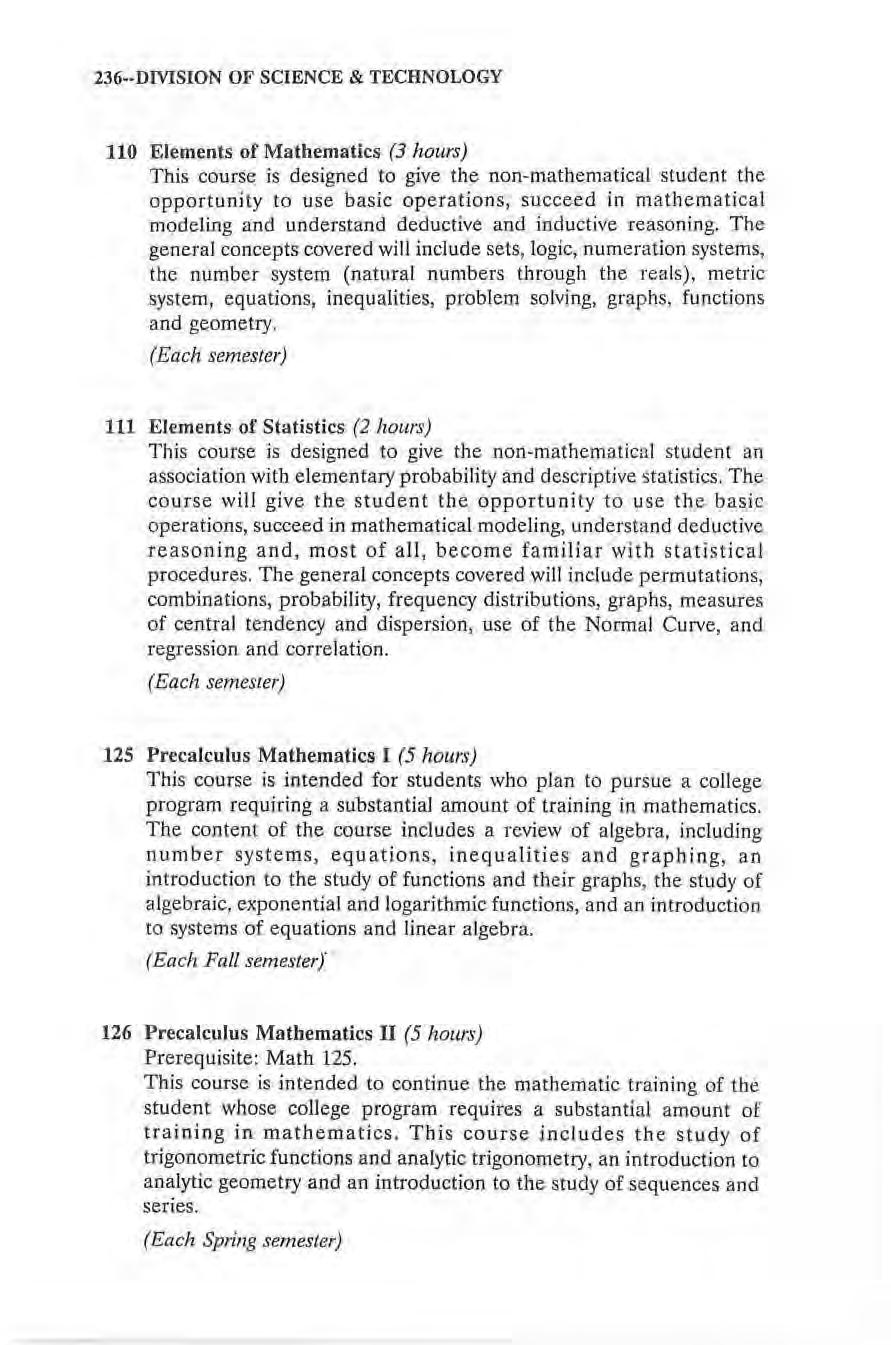
(Each Fall semeste,)' ·
126 Precalculus Mathematics II (5 hours)
Prerequisite: Math 125.
This course is intended to continue the mathematic training of the student whose college program requires a substantial amount of training in mathematics. This course includes the study of trigonometric functions and analytic trigonometry, an introduction to analytic geometry and an introduction to the study of sequences and series.
( Each Spring semester)
236•-DMSION OF SCIENCE & TECHNOLOGY
209 Business Calculus (3 hours)
Prerequisite: Math 107 and 125 or equivalent. This course introduces the theory and application of differentiation and integration to business decisions. Does not apply towar d the Mathematics major.
(Each Spring semester)
225 Calculus with Analytic Geometry I (5 hours)
Prerequisite: Math 125 and 126 or equivalent.
T his course includes the study of analytic geometry, functions, limits, continuity, velocity, differentiation, maxima and minima, higher order derivatives, techn iques of graphing, and related topics.
(Each Fall semester)
226 Calculus with Analytic Geometry II (5 hours)
Prerequisite : Math 225 or equivalent. This course includes the study of the differentiation of logarithmic and exponential functions, antiderivatives and the definite integral, integration, inverses and related topics.
(Each Spring semester)
297 Directed Study in Mathematics (1-4 hours) Senior standing.
(Offered as needed)
298 Special Topics in Mathematics (1•4 hours)

Freshman-Sophomore standing.
(Offered as needed)
304 Modern Geometry (3 hours)
Prerequisite: 10 hours of college Mathematics. This is a course designed primarily to prepare mathematics teachers for dealing with a modern high school mathematics program including the point set approach to geometry.
(Fall semester, even years)
306 Modei:n Algebra (3 hours)
Prerequisite: 10 hours of college Mathematics, This course is a study of the various a lgebraic systems arising in modern mathematical computations. It includes a study of sets, mappin g and operations, relations, development of the real number system1 integral domains and fields, polynomial domains, and the complex number field.
(Spring semester; odd years)
DIVISION OF SCIENCE & TECHNOLOGY--237
327 Calcul us with Analyt ic Geometry 111 (3 hours)
Prerequisite: Math 225 and 226 or equivalent. This course includes the study of further techniques in integration , infinite limits, improper integrals, polar equations, an introduction to vector calculus, and an introduction to mult ivariable calculus.
(Fall semester, odd years)
328 Differential Equations (3 hours)
Prerequisite: Math 327 or equivalent. This course wiU review differentiation and integration. Solutions and methods for solving first and second order ordina1y differential equation will be discussed and applied.
(Spring semeste,; even years)
340 Statistics (3 hours)
A study of the methods of summarizing and interpreting data, e lementary probability, and its relation to distributions. The meanings, importance, and application of the normal and binomial distributions and the methods of random sampling, testing of hypotheses, analysis of pair ed data, and interp r etation of standardized test scores are covered.
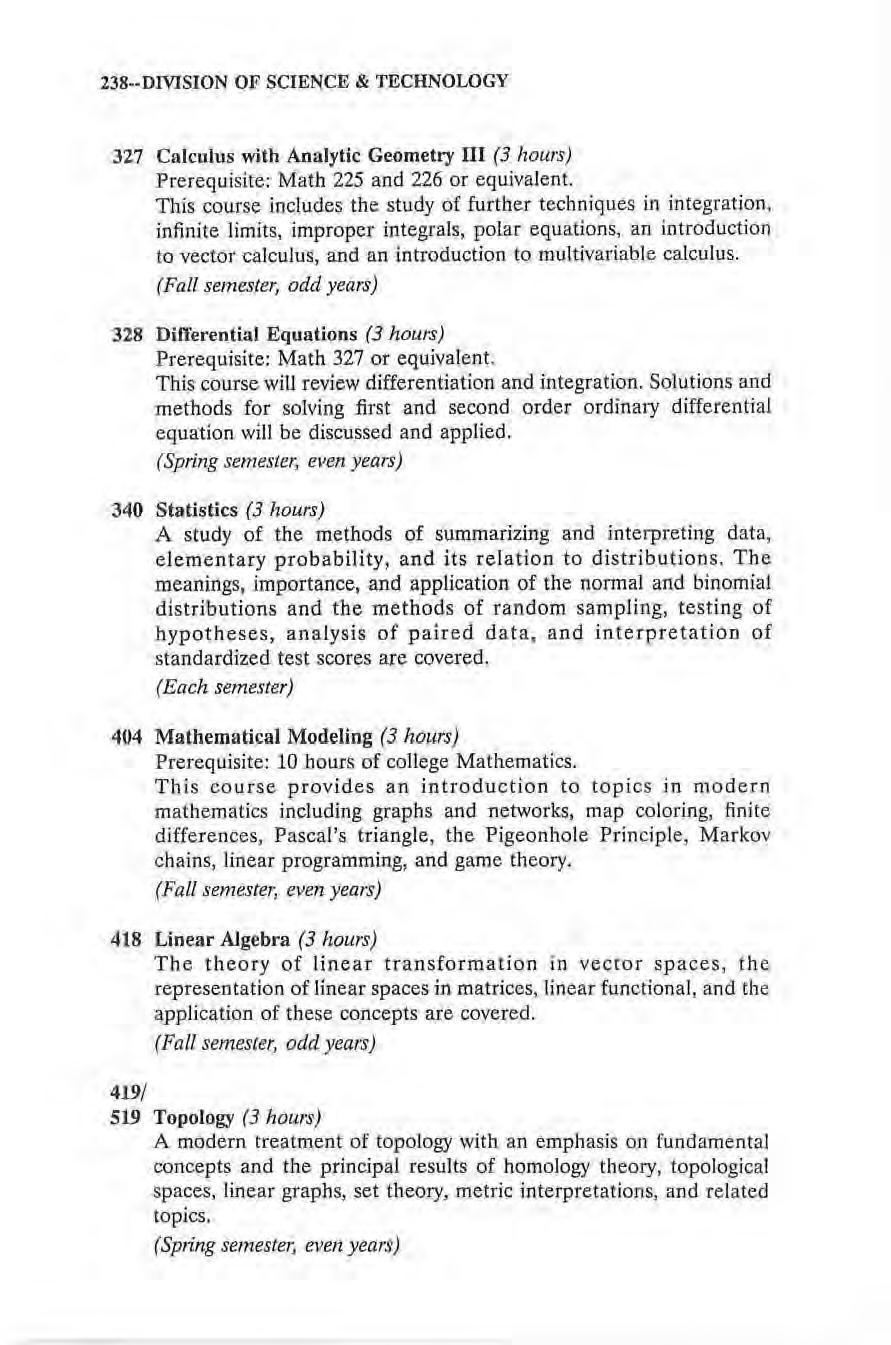
(Each semester)
404 Mathematical Modeling (3 hours)
Prerequisite: 10 hours of college Mathematics. This course provides an introduction to top ics in modern mathematics including graphs and networks, map coloring, finite differences, Pascal's triangle, the Pigeonhole Prin ciple, Markov c hains, linear programming, and game theory.
(Fall semester, even years)
418 Linear Algebra (3 hours)
The theory of linear transformation i n vector spaces, the representation of linear spaces in matrices, linear functional, and the application of these concepts are covered.
(Fall semester, odd years)
419/
519 Topo logy (3 hours)
A modern treatment of topology with an emphasis on fundamental co ncepts and the principal results of homology th eory, topological spaces, linear graphs, set theory, metric interpretations, and related topics.
(Sp,ing semeste,~ even years)
238--DMSION OF SCIENCE & TECHNOLOGY
430/ 530 Discrete Structures (3 hours)
Prer equisite: Math 126.
A study of some of the mathematical concepts useful to the computer sciences includ ing number systems, logic, truth tables, sets and relations, boo l ean algebra, logic circuits, vectors, m atr ices, determ i nants, graphs, directed graphs, finite machines, and automata.
(Offered as needed)
440/
540 Adva nced S tati stics (3 hours)
Prerequisite: Math 340
This course continues the s tudy of methods of summadzing and interpreting data, wi tb special emphasis on non-norma lly d ist ributed statistics, hypotheses testing, multivariate analysis and non-linear analysis of data.
(Spring semester, odd years)
4 76 Methods of Teaching Mathematics (3 hours)
T his course introduces the objectives, conten t and methods of classroom teaching in mathematics.
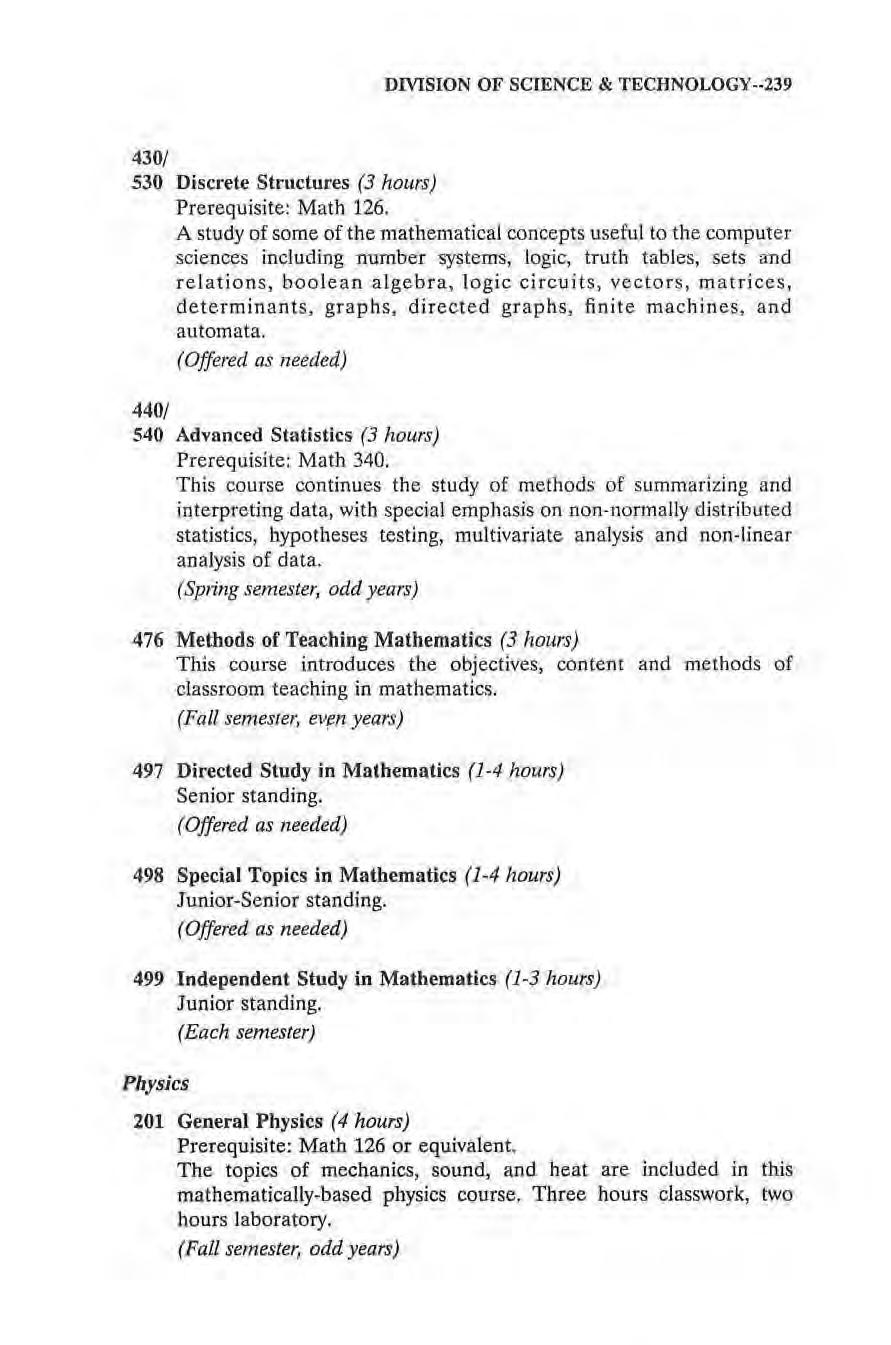
(Fall semester~ evrm years)
497 Directed Study in Mathematics (1-4 hours)
Senior standing.
(Offered as needed)
498 Specia l Topics in Mathematics (1-4 hou rs)
Juni or-Senfor st anding.
(Offered as needed)
499 Independent Study in Mathematics (1-3 hours)
Junior standing.
(Each semest er)
Physics
201 General Physics (4 hours)
Prerequisite: Math 126 or equivalent.
The topics of mechanics, so und, and heat are inclu ded in this mathematically-b ased physics course, Three hours cl asswork, two ho urs labo r atory.
(Fall semester, odd years)
DMSION OF SCIENCE & TECHNOLOGY--239
202 Gene ral Physics (4 hours)
Prerequisite: Physics 201 or pennission. The topics of light, electricity, and magnetism are included in this mathematically-based physics class. Three hours classwork, two hours laboratory.
(Spring semester, even years)
206 Great Ideas in Astron omy {3 hours)
This course is an introduction to astronomy, with emphasis on thos e ideas and discoveries which have had, and continue to have, strong influence on our modern culture and world view.
(Offered as needed)
297 Directed Stu dy in Physics (1-4 hours)
Senior standing.
(Offered as needed)
298 Specia l To pics i n Pl1ysics (1-4 hours)
Freshman-Sophomore standing.
(Offered as needed)
306 Astrono my (3 hours)
A basic course dealing with a study of the heavenly bodies, the solar system, and the universe. Telescopic observation is a part of this co urse.
(Sp,ing semester; odd years)
497 Directed S tu dy in Phys ics (1-4 hours)
Senior standing.
(Offered as needed)
498 Speci a l Topics in Ph ysics (1-4 hours)
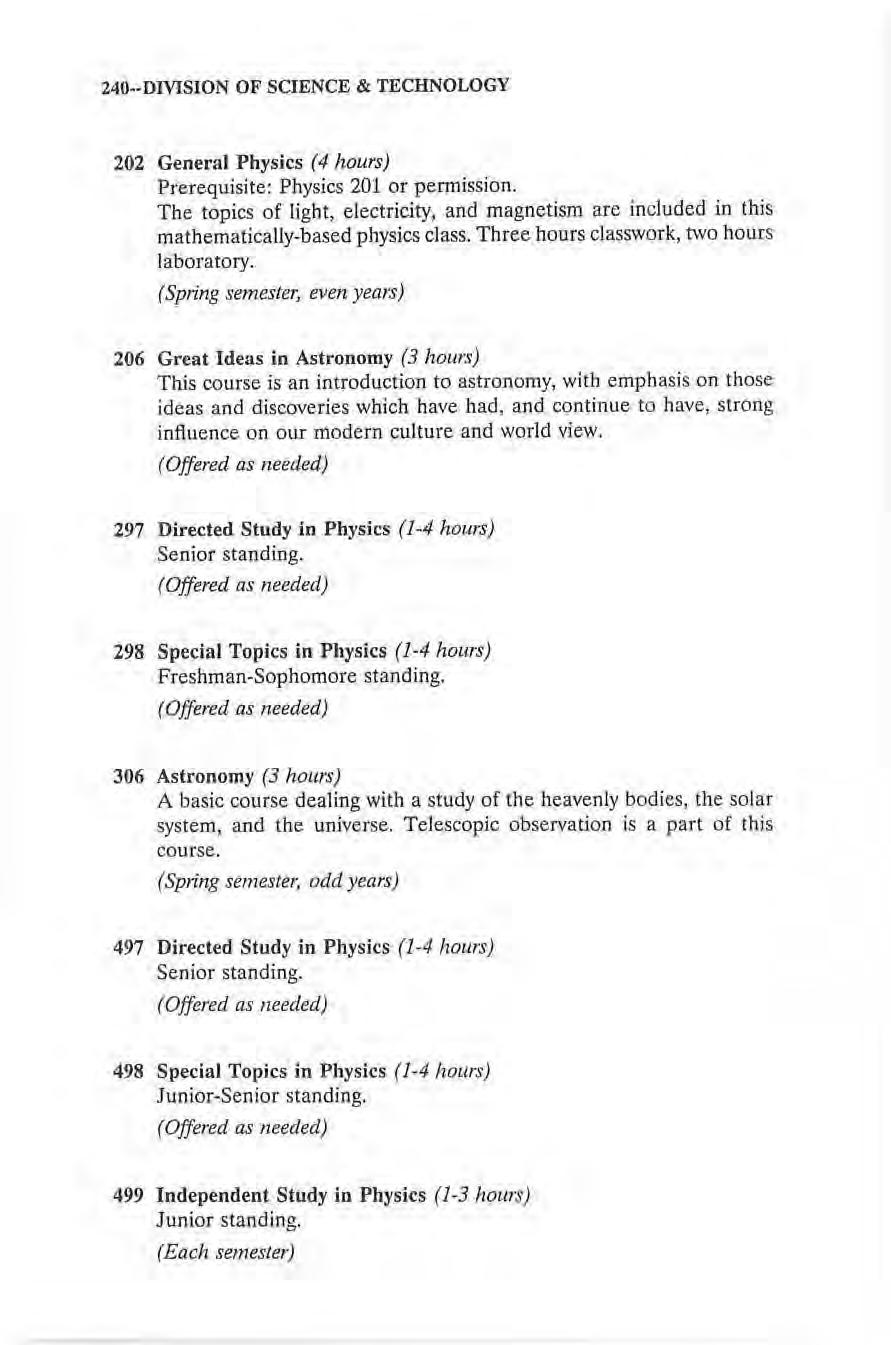
Junior-Senior standing.
(Offered as needed)
499 Inde pe n dent Study in Phys ics (1-3 hours)
Junior standing.
(Each semester)
240--DMSION OF SCIENCE & TECHNOLOGY
Vocational Education
441/
541 History and Philosop hy of Vocational Education (3 hours)
The origins and philosophy of vocational e ducation and its relationship to the school curriculum are covered. This course is required for vocational certification and recommended as an elective for school administrators.
(Offered as needed)
442/
542 Organization and Administration of Vocational Edu cat ion (3 hours)
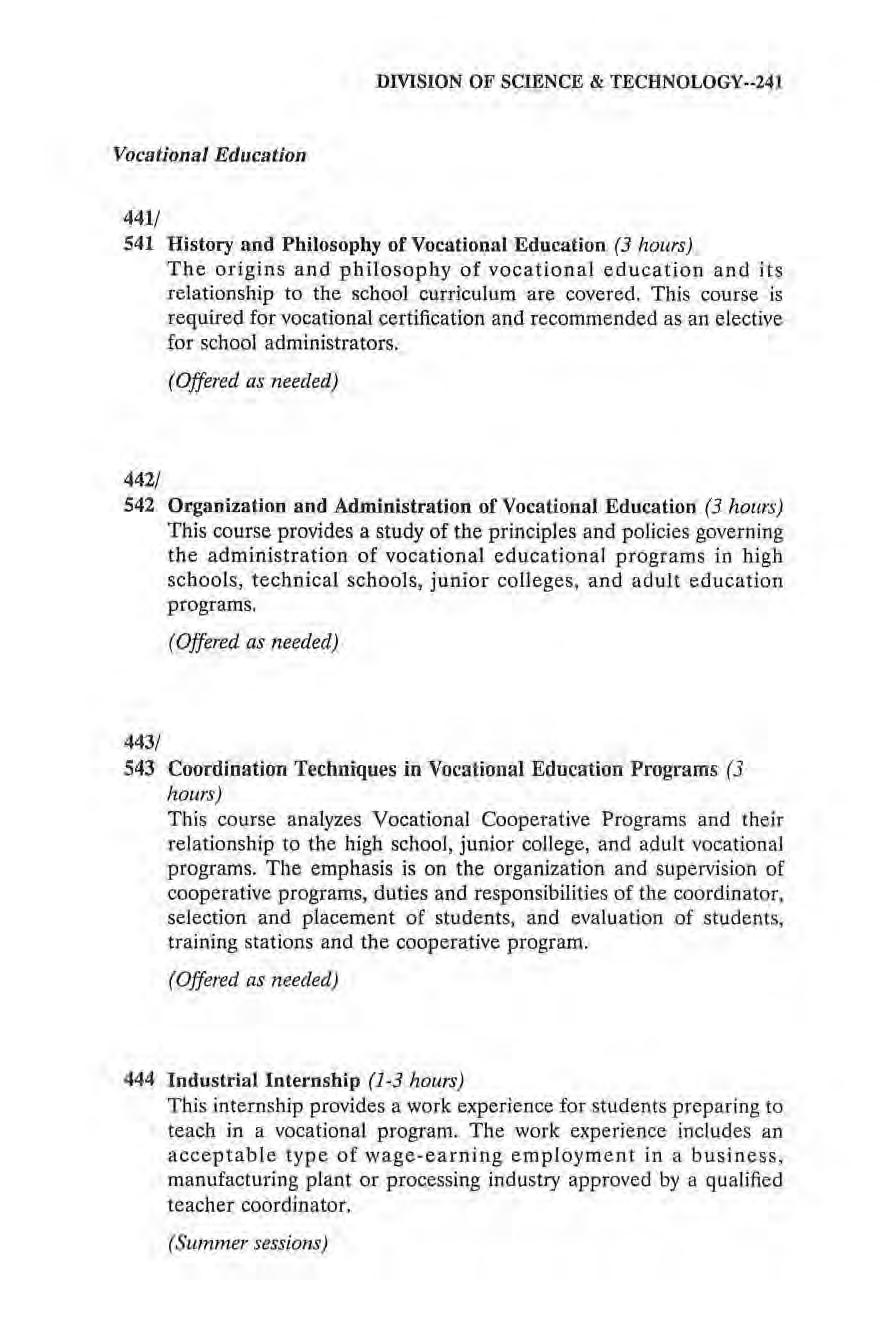
This course provides a study of the principles and policies governing the administration of vocational educational programs in high schools, technical schools, junior colleges, and adult e ducation programs.
(Offered as needed)
443/
543 Coordination Techniques in Vocational Edu cation Programs (3 hours)
This course analyzes Vocational Cooperative Programs and their relationship to the high school, junior college, and adult vocational programs. The emphasis is on the organization and supe1vision of cooperative programs, duties and responsibilities of the coordinator, selection and placement of students, and eval uation of students, training stations and t he cooperative program.
(Offered as needed)
444 Industrial Internsh ip (1-3 hours)
This internship provides a work experience for students preparing to teach in a vocational program. The work experience includes an acceptable type •Of wage-earning employment in a business, manufacturing plant or processing industry approved by a qualified teacher coorclinator,
(Summer sessions)
DMSION OF SCIENCE & TECHNOLOGY- -24J
445/ 545 Vocational Specia l Needs (3 hours)
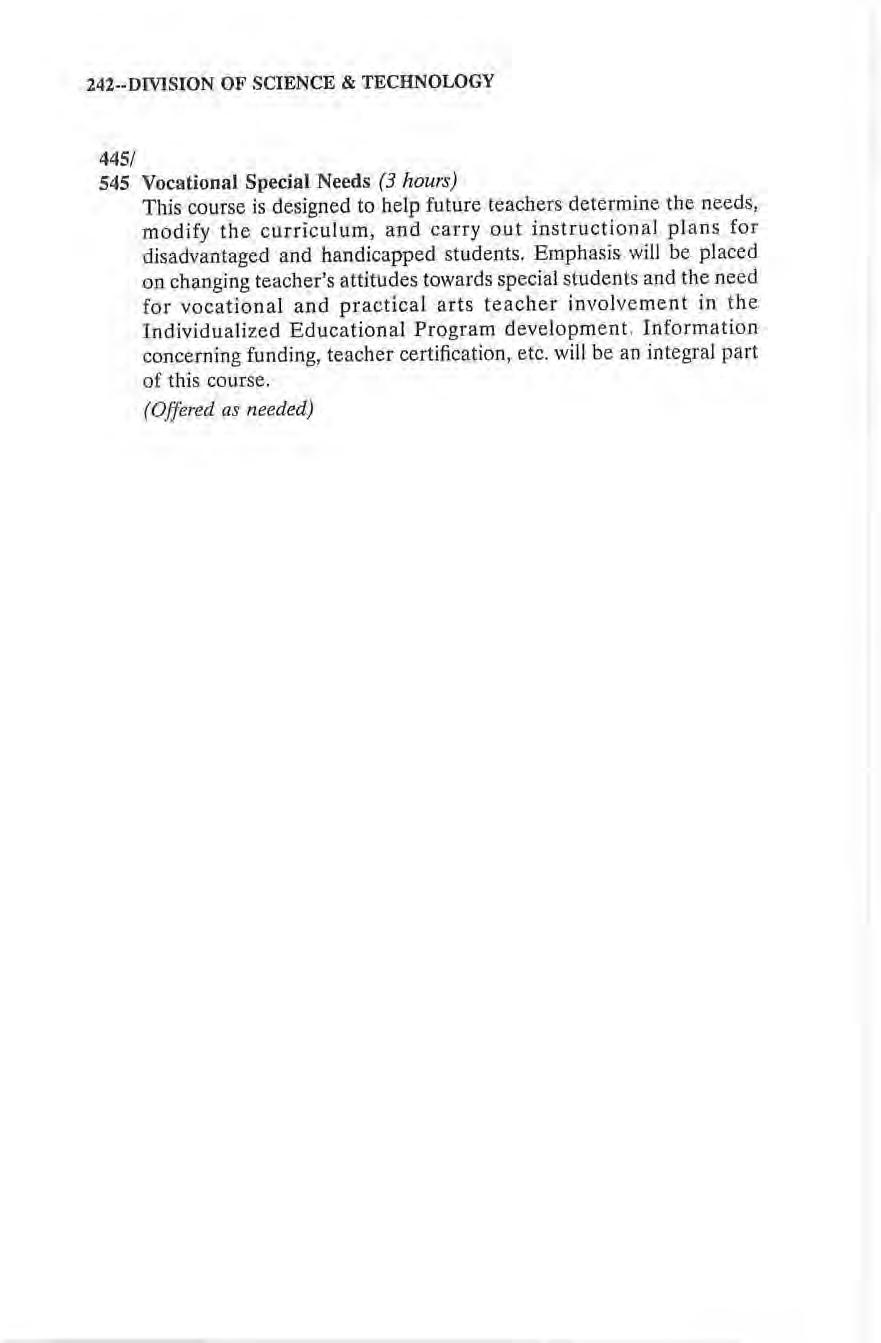
This course is designed to help future teachers determine the needs, modify the curriculum, and carry out instructional plans for disadvantaged and handicapped students, Emphasis will be placed on changing teacher's attitudes towards special students and the ne ed for vocational and practical arts teacher involveme nt in the Individualized Educational Program development. Information concerning funding , teacher certification, etc. will be an integral part of this course .
(Offered as needed)
242--DM.SION OF SCIENCE & TECHNOLOGY
Board of Trustees Of The Nebraska State Colleges
P eter H, Claussen ......................................... ... ,.. .... .........................., ...... ........ ..... ... ............. Omaha
Gerald Conway , , Wayne
L,H. ttruck" Kolkma n North Plaue
Wynn S. Nuckholl s , , , Fairbury
Wendell L. Quist , , Omaha
Kathi J. Swanson Scottsbluff
Jo e E. Lutjeharms, State Commissioner of Education Lincoln
Carrol Krause, Executive Director , Lincoln
E~eriti
Alma Ash ley (1946-1 970)
Clyde Barrett (1965-1993)
Faye Brandt (1959-1985)
Everett Browning (1969-1986)
Mary Clnrke (1951- 1964)
Esther Divney (1975-1990)
Royal Eckert (1975-1994)
John Hahn (1968-1993)
Wreathea Hicks (1968-1985)
Lu cy Hovey (1967-1972)
Don Jacobs (1980-1994)
Dee Jarvis (1948-1978)
Harold Johnson (1951-1982)
Lyle McKercher (1959-1990)
Ervin R , Pitts (1964-1982)
Frieda D. Rowoldt (1952-1970)
Leland Sherwood (1963-1993)
Scott Will iams (1966-1990)
Gilbert Wilson (1957-1982)
Mary Ruth Wilson (1966-1982)
Faculty
Prqfessor Emeritus of Elementary Education
Professor Emeritus of English
Professor Emeritus of Library Science
Profes,sor Emeritr.s of Journalism
Professor Emeritus of Education
Professor Emeritus of Education
Professor Emeritus of Speech/Theatre
Professor Emeritus of Political Science
Professor Emerillls of English
Professor Emeritus of Home E conomics
Profes.wr Emeritus of Bmi11ess
Professor Emerillls of lnd11s1rial Arts
Professor Emeritus of Education
Professor Emeritus of Mathematics
Professor Emeritus of Health rmd Physical Education
Professor Emeritus of Business
Professor Emeritus ofArt
Professor Emeritus of Geography
Professor Errum·tus of Music
Professor Emeritus of English
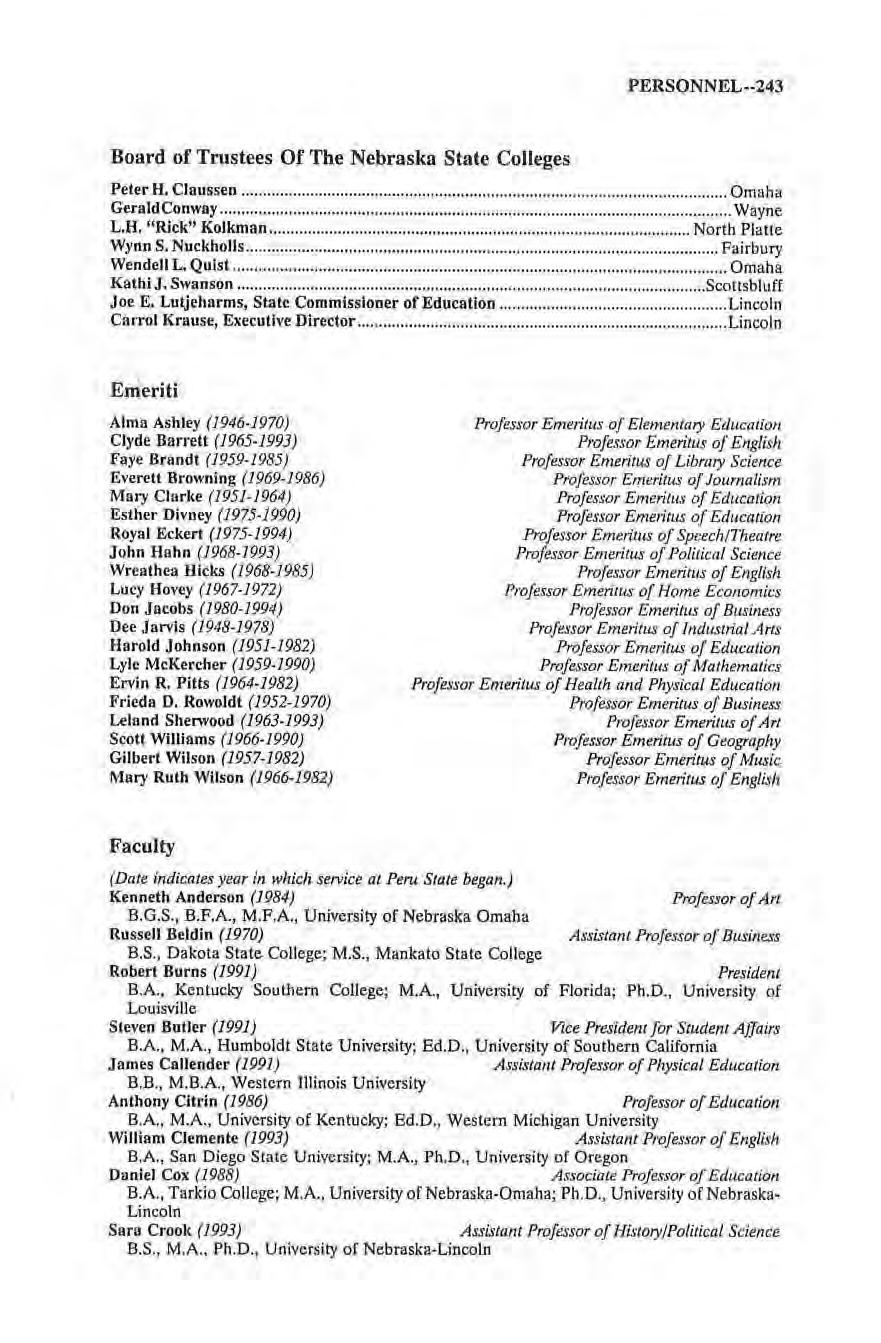
{Date indicates year in which service at Pem State began.)
Ken neth Anderson (1984) Professor of Art
B.G.S., B.F.A., M.F.A., University of Nebraska Omaha
Russell Beldin {1970) Assistant Professor of Business
B.S., Dakota State College; M.S., Mankato State College
Robert Burns (1991) President
B.A., Kentucky Southern College; M.A., University of Florida; Ph.D., University of Louisville
Steven Butler (1991)
Vice President for Student Affair$
B.A., M.A., Humboldt State University; Ed.D., University of Southern California
James Call ender- (1991) Assistant Professor of Physical Education
B.B., M.B.A., Western Illinois University
Anthony C itrin (1986) Professor of Education
8.A., M.A., University of Kentucky; Ed.D., Western Michigan University
William C lemente (1993) Assistant Professor of English
B A., San Diego State University; M.A., Ph.D., University of Oregon
Daniel Cox (1988) Associate Professor ofEducation
B.A., Tarkio College; M.A., University of Nebraska-Omaha; Ph.D., University of NebraskaLincoln
Sara C r ook (1993)
Assista/11 Professor of History/ Political Science
B.S., M.A., Ph.D., University of Nebraska-Lincoln
PERSONNEL--243
Wa) nc Davidson (1982) Associate Professor of Physical Education
B.A., Anderson College; M.A., Kansas State College-Emporia; Ed.D., University of Misso uri-Columbia
Spencer Davis (1983) ProfcJsor of I-Ji.story
B.A., Brown University; M.A., University of Nebraska-Lin coln; Ph.D , University of Toronto
Thomas Ediger (1979) Professor of Music; Director of Choral Activities
A.B.. Unive rsity of Nebraska-Lincoln; M.A., O.A., University of Northern Colorado
David Ed ris (1974) Professor of Music; Chair of Humanilies
B.M.A., M.M.. University of Tu lsa; D.M.A., Unive rsity of Missou ri-Ka nsas City
Na ncy Emer so n (1977) lnstmctor of Social Work/Sociology
B.S., M.S., Kansas St ate Conege-Pillsburg
Robley Eva ns (1978) Assistam Professor of lndusrrial Technology
B.S., Western Kentucky Un iversity; M.S., Indiana University
Mark Fegan (1988) Assistant Professor of Computer Science
B.A., Morningside College; M.S., Kearney State College
Victor Fe rre (1978) Professor of Education
B.A., Weber State College; M.S., Utah State University; Ed.O., New Mexico State University
Cheryl Fryer (1994) l11stmctor of Music; Director of Ba11ds
B.M.. We stern Michiga n Universi ty; M.M., Unive rsity of Missouri-Ka nsas City
J ohn GabrieJ (1991) !11s1mc1or of Physical Education
B S., M.A., University of Northern Iowa
John Gibbs (1981) lnstmctor of Physical Ed11ca1io11
S.S., William Jewell College; M.S., Ce ntral Missouri State University
Jack Hnmlllon (1972) Assistant Profe.ssor of Business
B.S., M.S., Kansas State College- Pittsburg
Jerrold Hanso n (1988) Professor of Educa1io11
B.S., M.A., University of Minnesota; Ed.D., University of Colorado
Cha rl es Harper (1978) Professor of Speechm,eatre
8 .A., Ta rkio Co llege; M A., Ph.D., Unive rsity of Nebraska-Lincoln
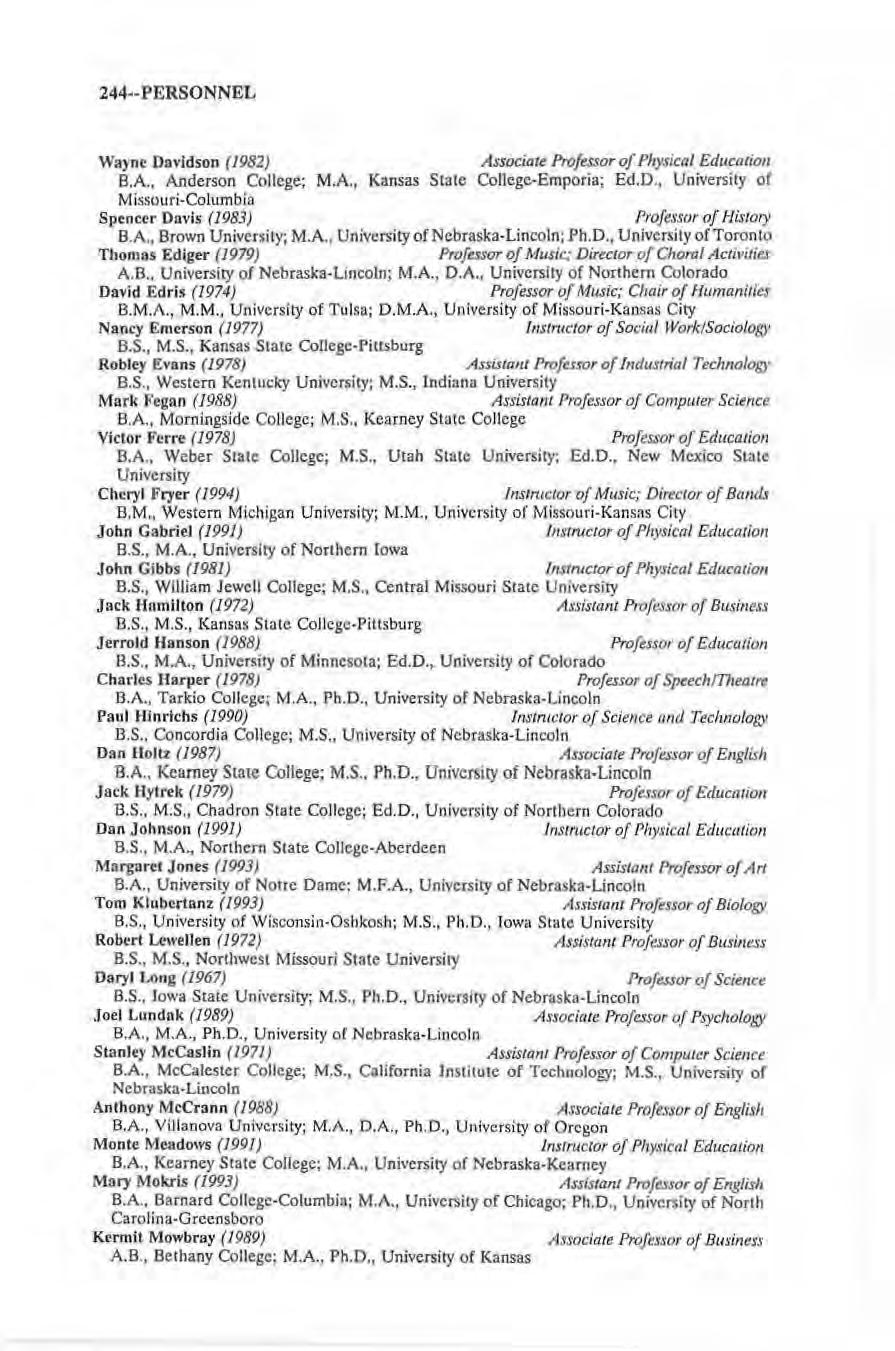
Pa ul Hi nr ichs (1990) !11stn1ctor of Scien ce a11 d Tech110/ogy
B.S.. Co ncordia College; M.S., University of Nebraska-Lincoln
Dan ll olt z (1987) Associate Professor of English
B.A., Kearney State College; M.S Ph D., University of Nebras ka•Lincoln
Ja ck Hylrek (1979) Professor of Education
B.S., M.S., Chadron Stale College; Ed. D ., University of Northern Colorado
Dan J ohn son (1991) Instructor of Physical Ed11ct1tia11
B.S., M .A., No rth ern State College-Aberdeen
Margaret Jones (1993) Assista11t Professor of An
B.A., University of Notre Dame; M.F.A., University of Nebras ka-Lincoln
Tom Klubcrtanz (1993) Assistant Professor of Biology
B.S., Un iversity o f Wisconsin-Oshkosh ; M.S., Ph.D., Iowa State U niv ersity
Robert u.>wellen (1972) Assis11111 t Professor of 811si11ess
B.S., M.S., Northwest Missouri State University
Daryl Long (1967) Professor of Science
B.S., Iowa State Unive rsity; M.S., Ph.D., University of Nebraska-Lincoln
.Joel Lundnk (1989) Associate Professor of P~ychology
B.A., M.A., Ph.D., Un ive rsity of Nebraska-Li ncoln
Stanley Mccaslin (1971) Assistant Professor of Compu ter Science
8.A., McCalestc r College; M.S., California Instit ute of Technology; M.S., University of Nebraska-Lincoln
Anthony McCra n n (1988) Associa te Professor of Eng/isl,
B.A. , Villanova Unive rsity; M.A., D.A., P h D., University of Oregon
Monie Meadows (1991) lnsrructor of Pliysical Education
B.A., Kearney State College; M.A., Univer sity of Nebraska-Kearney
Mory Mokrls ( 1993) Assistant Professor of English
B.A., Barnard College-Columbia; M.A., University of Chicago; Ph.D., University of North Caroli na-Greensboro
Kermit Mowbray (1989) Assoc/ale Professor of Business
A.B., Bethany College; MA., Ph.D., University of Kansas
244-- PERSONNEL
Larry Pa ppas (1979) Professor of Biology
B.S., Hiram Scott College; M.S., University of Wyoming; Ph.D., University of IllinoisUrbana
David Pippert (1977) Professor of Natural Science; Chair of Science and TechnolQgy
B.A., Augus t ana College; M.S., State Univers ity of Iowa; Ph.D., University of Wyomin g
Ph illip Phillips (1993) DirectQr of Economic Development
B.A., M.A., University of Jllinois-Urbana; Ph.D., University of Minnesota
Kat h ryn Rempp (1993) Assistant Professor of Elementary Education
B.A., Yank ton Coll ege; M.A., South Dakota State University
Carol Ruck (1989) Assistam Professor of 811si11ess
CM.A., B .S., M.S., California State University-Chico
Lester Russell (1956) Professor of Industrial Techno!Qg;'
B.A., Peru S tate Teachers College; M.A., University of Minnesoca; Ed.D , University of Nebraska-Lincoln
Terry Smith (1993) Professor of Political Science; Vice President fo r Ac4demic Affairs
B.A., Central Methodist College; M.A., Ph D., Michiga n State Universi ty
William S n yd er (1979) Professor of Business
B.S., M.Ed., Ed.D., University of Nebraska-Lincoln
Gregory St11uffer (1991) Vtce President for Ad.ministra1ion and Finance
8 .8.A., Washburn University; M B.A., Southwest Misso uri State Univer sity; Ed.D , U nivers ity of Kansas
Hnrry T11bnta (1989) lnsnuctor of Business
B.A., University of Washington; M.B.A., Auburn U niversity-Mo n tgomery
James Thomas (1985) Professor of B11sinesJ;· Dean of Co11ti1111i11g Education
B.S., Wayne State University; M A., Ph.D , Michigan State U niversity
Ross Udey (1988) Assistam Professor of Industrial Technology
B.A., M .S., Wayn e State College
Barbara WIimes (1990) Assisranr Professor of Education
B.S., M.S., Mankato State University
Administrative Officers
Robert Burns (1991) Preside/!/
B.A., Kentucky Southern College; M .A., University of Florida; Ph.D., University of Looisvllle
S teven Butler (1991) Vice President for Student Affairs
B.A., M.A., Humboldt State University; Ed.D ., University of Southern CaJifornia
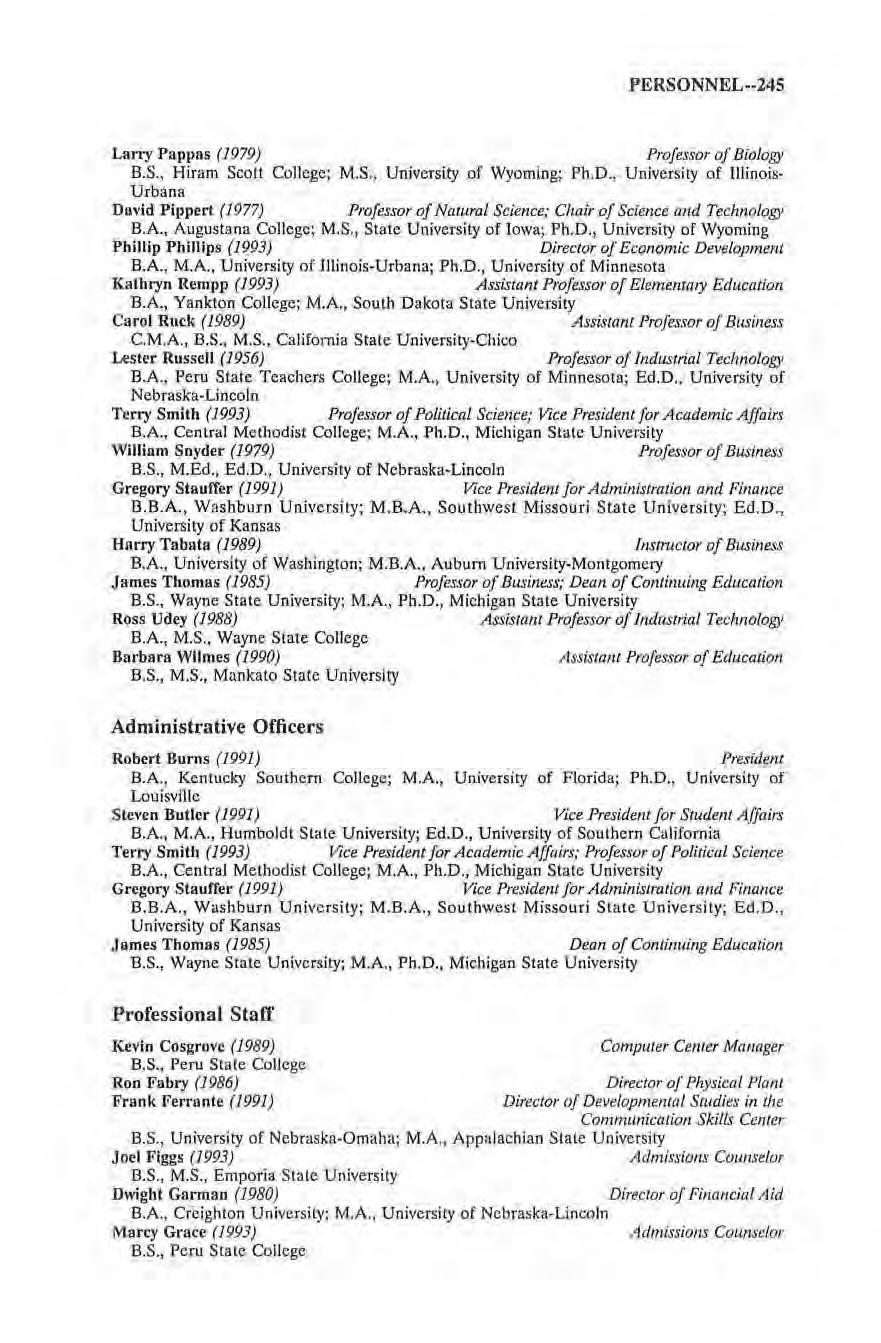
Terry Smith (1993) Vice President for Academic Affairs; Professor of Political Science
B.A., Central Methodist College; M.A., Ph.D., Michigan State Universiry
Gregory Sta uffe r (1991) Vice President for Administratio11 and Finance
B.B.A., Washburn Unive r sity; M.B.A., Sou thwest Missouri State Uni ve r s ity; Ed.D., University of Kansas
James Thomas (1985) Dean of Contim,ing Education
B.S., Wayne Stale University; M .A., Ph.D., Mich igan State U niversity
Professional Stafl'
Kevin Cosgrove (1989)
B.S., Peru State College
Ron Fabry (1986)
Frank Ferrnnte (1991)
Computer Center Ma11ager
Director of Physical Plant Director of Developmental Swdies in the Communication Skills Center
B.S., University of Nebraska-Omaha; M.A., Appa lachian State University
J oe l Figgs (1993) Admissions Counselor
B.S., M.S , Emporia State University
Dwigh t Garman (1980) Director of Fi11ancial Aid
B.A., Creighton University; M.A., University of Nebraska-Lincoln
Marcy Grace (1993)
B.S., Peru State College AdmissiQns Cou11selor
PERSONNEL--245
T ed Ha rshb arger (1989) Director of Cooperalive Education and Career Services
B.S., Peru State College; M.Ed , University of Nebraska-Lincoln
Dan Ha ug land (1984) Director of R esidence Life
B.S., Dakota State College; M.Ed., South Dakota State University
Vin ce He.nzel (1983) Assistanl 10 Athletic Director
B.S., Pe_ru State College
Da n John son (1991) Direclor of Athletics
B.S., M.A., Northern State College-Aberdeen
Tara Kreklau (1994) Stu.dent Advisor
B.S , University of Nor th Dakota • Grand Forks; M.S., St. Cloud State
Ba r b Lewellen (1989) Direclor of Studcm Programs
B.S., Nort hwest Missouri State University
Ke lly Liewer ( 1968) Registrar; Director of Institutional Research
13.S., Peru State College; M.Ed., 8d.D., University of Nebraska-Lincoln
W illia m Lon gley (1983) As:.·ist1111t Compmer Center Manager
B.A., M.A., Ph. D., University of Colorado-Boulder
Curt Luttrell ( 1993) Director of Admissions am/ School Re/a/ions
B.A., Central Washin,gton Un iversity; M.A.T., Alaska Pacific University
S haron McCasli n (1971) Technical Services Libranan
B.A., Kansas State UniveTSity; M.S., Kansas State Teach.e rs College; Ph.D , U niversity of Nebraska-Lincoln
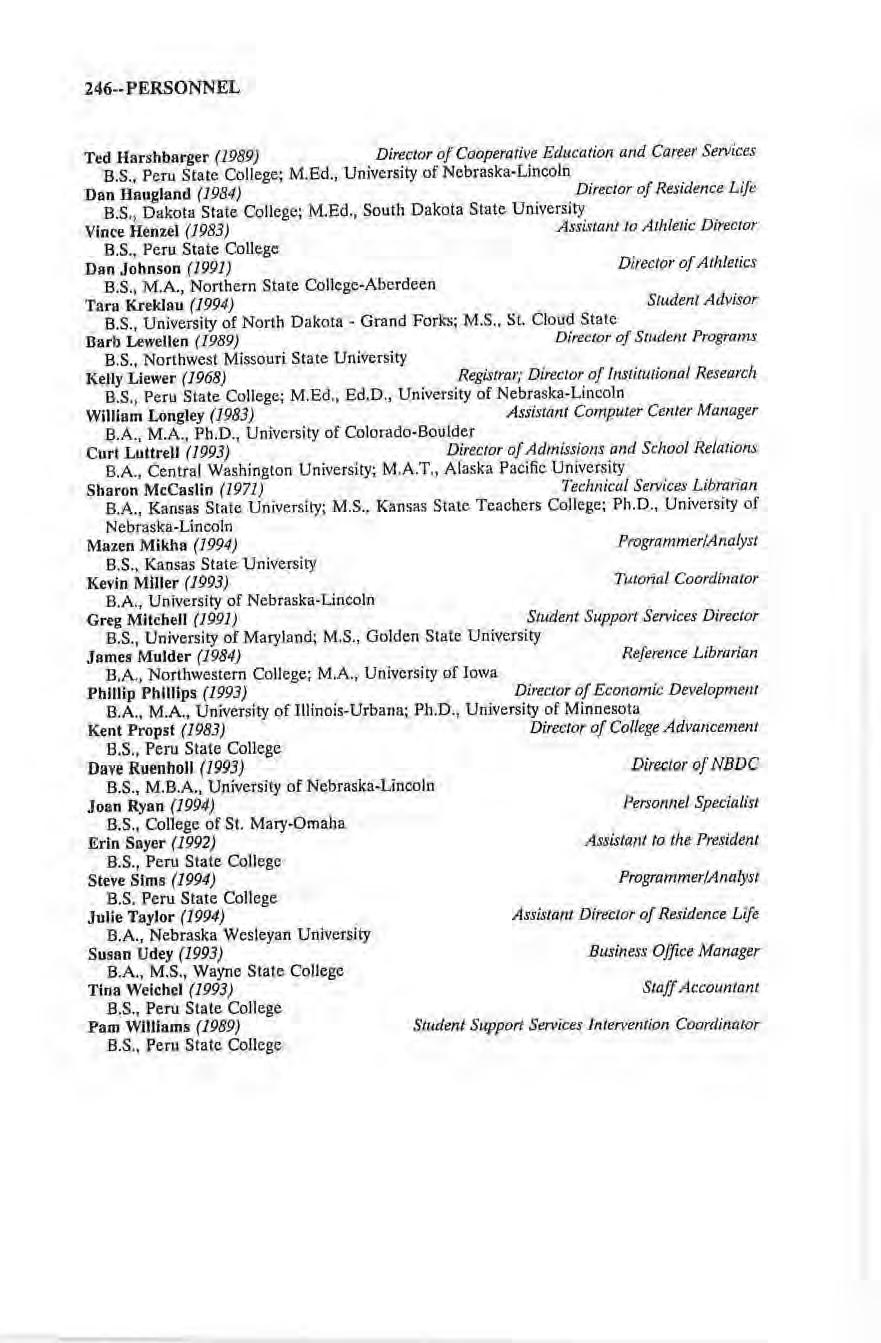
Ma2,en M ikh a (1994) Programmer/A nalyst
B.S. , Kansas State Universi ty
Kevi n M iller (1993) Tutorial Coordinator
B.A., University of Nebraska-Lincoln
G r eg M itch ell (1991) Student Support Services Director
B.S., University of Maryland; M,S., Golden State University
J a mes M ulder (1984) Reference Librarian
B.A. , Northwestern College; M.A., University of Iowa
Phillip P hillips (1993) Director of Economic Deve/opme111
B.A., M.A., Un iversity of Illinois-Ur bana: Ph.D., University of Minnesota
Ke nt P rops t (1983) DireclOr of College Advancement
B.S., Peru State College
Dave Ru enholl (1993) Dire&.tor of NBDC
B.S., M.B.A., University of Nebraska-Lincoln
J oan Rya n (1994) f'ersonnel Specialist
B.S , College of St. Mary-Omaha
E rin Sayer (1992) Assistanl 10 the President
B.S., Peru State College
Steve Sims (1994) Programmer/Analyst
B.S. Peru State College
Ju lie Taylor (1994) Assistant Director of Residence Life
B.A., Nebraska Wes leyan University
S usan U dey (1993) Business Office Manager
B.A., M S., Wayne State College
Tina We ichel (1993) Staff Accounlant
B.S., Peru State College
Pam W illia m s (1989) Student Support Services frtten•ention Coordinator
D.S., Peru State- College
246-- PERSO NNEL
INDEX
-A·
Ac.idcmic Appeals
Acnde mic Bankruptcy
Academic Calendar
Academic Credit
Academic Dishonesty
Academic Policies an d Procedures
How to Dc1crmine Credit Transfer
Armed Services
Extra-instilUlional
l nstitutlonol Examination
Standardized Examination
High School Early Entry .
Corresponden ce Courses
Variable Credit Courses
Repeal Courses . . . . .
Audit
Incomplete Coursewor k
Ch,ssification or St udents
Academic Progress Sheet
Full-time Student Status
Offutt Air Force Base and Southeast
Community College S tudents
Academic Probation
Academic Suspension
Administrative Officers
Admission
Ent ering Freshman
Transfer Stude n lS
Non-High School Grad11ates
International Students
Transfer from Non-Accredited Colleges
Mid Yea r Advanced Standing . . . . . .
Tuition
and Financial Aid
Nebraska Reside ncy Regulations for Tuition
Fees
Facili1ics Fee
Health Center F ee
Student Ac tivity Fee
Admission Fee
Computer Lab Fee
Course Fees
Credential File Fee
Degree Fee
Identification Card
Replacement JD Card
Late R egistration Fee
Motor Vehicle R egistration
orr Campus Service Fee
Private Music Lessons
Publications Fee Transcript . . . . . .
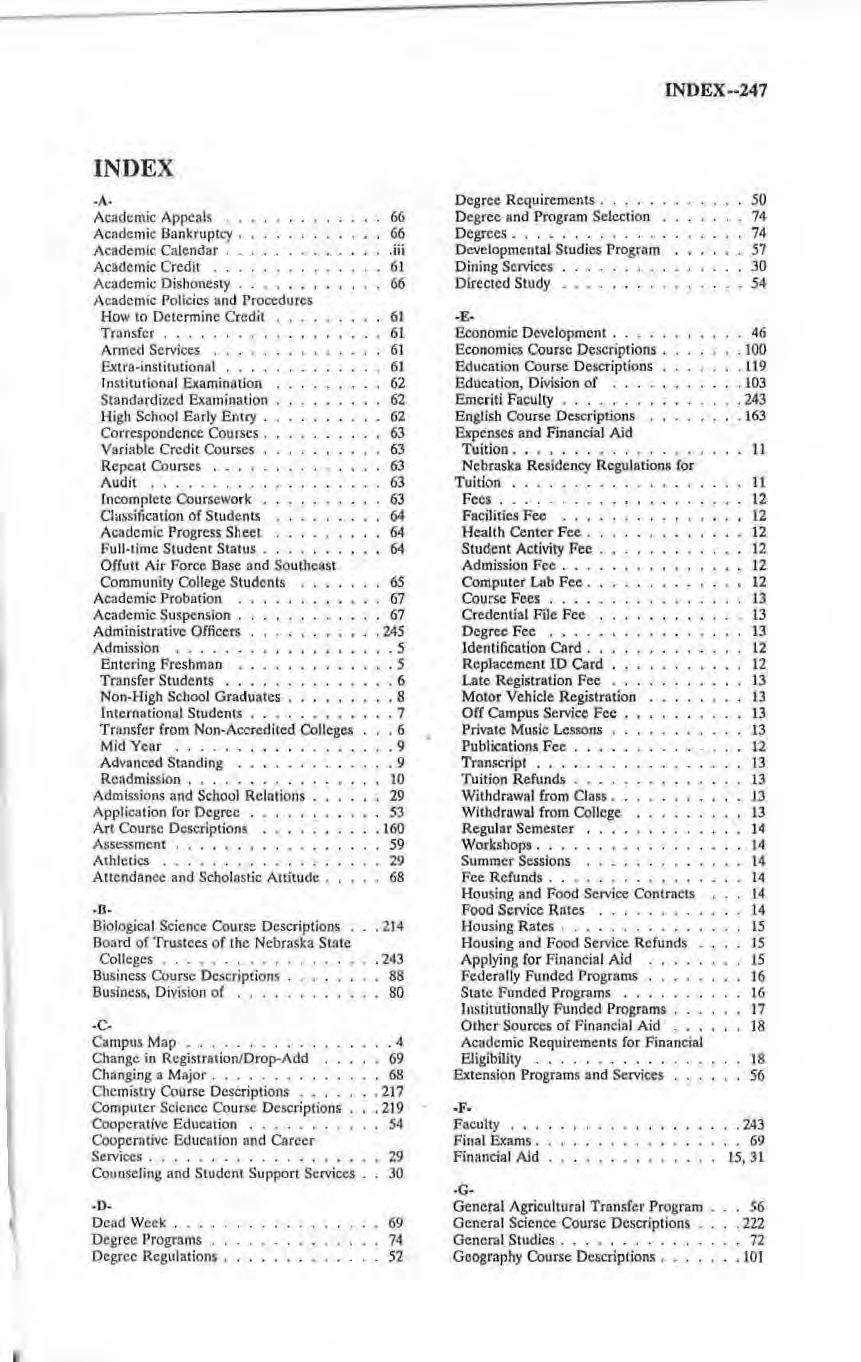
Tuition R efunds •
Withdrawal fro m Class
Withdrawal from College
Regul a r Semester Worksh op,.
Federally
h1stirutionally
Readmission Admissions and
Relations Applicat ion for Degree Art Course Description• Assessment . • Ath letics Attendance and Scholnstic Attitude -BBiological Science Cours. Descriptions Board of Trustees of the Nebraska State Colleges . . ...... . . Business Course Descriptions Business, Division or -CCampus Map Change in Registration/Drop-Add Changi ng • M ajor , Chemistry Cou rse Descriptions Comp ute r Science Co urse Descriptions Cooperative Education Cooperative Ed
and Car•er Services
, Counseling and S1udcnt Support Services l). Dead Wec k. Degr ee Programs Degree Regul ations , 66 66 .iii 61 66 61 61 61 61 62 62 62 63 63 63 63 63 64 64 64 65 67 67 .2AS . s . s .6 .8 .7 • 6 9 9 10 29 53 160 59 29 68 214 . 243 88 80 . 4 69 68 217 219 54 29 30 69 74 52 IND EX--247 D egree Requirements Degree and Program Select ion Degrees . . ...... . .. . . Developmenlal Studies Program Dining Services Directed Study -EEconomic Development Eco11omics Course Descriptions Education Course D escripti ons Education, Division o f . . Emer iti Faculty E nglish Course Descriptions Expenses
School
ucn1ion
.
Summer Sessions
.
efunds
and Food Service Contracts
Rntcs . . . . . . .
es , Ho using and F
Service Refunds
for Financial Aid
. .
Fee R
Housing
Food Service
Housin g R a t
ood
Applying
Funded Programs
Programs
State Funded
Fu
Programs
nded
Aid
for Financial Ehg1b1l11y
& ten sion Programs and Services
Foeully Final Exams Financial Aid
Gencral Agricultura l Transfer P rogram General Science Course Descriptions Gen eral Studies Geography Course Descriptions . 50 74 74 57 30 54 46 100 119 . 103 243 163 11 11 12 12 12 12 12 12 13 13 13 12 12 13 13 13 13 12 13 13 l3 J3 ]4 14 14 14 14 14 15 15 15 16 16 17 18 .18 56 243 69 15, 31 56 222 72 IOI
Other Sources of Fi nancial
A~•~~~ic Requirements
•
F·
-G-
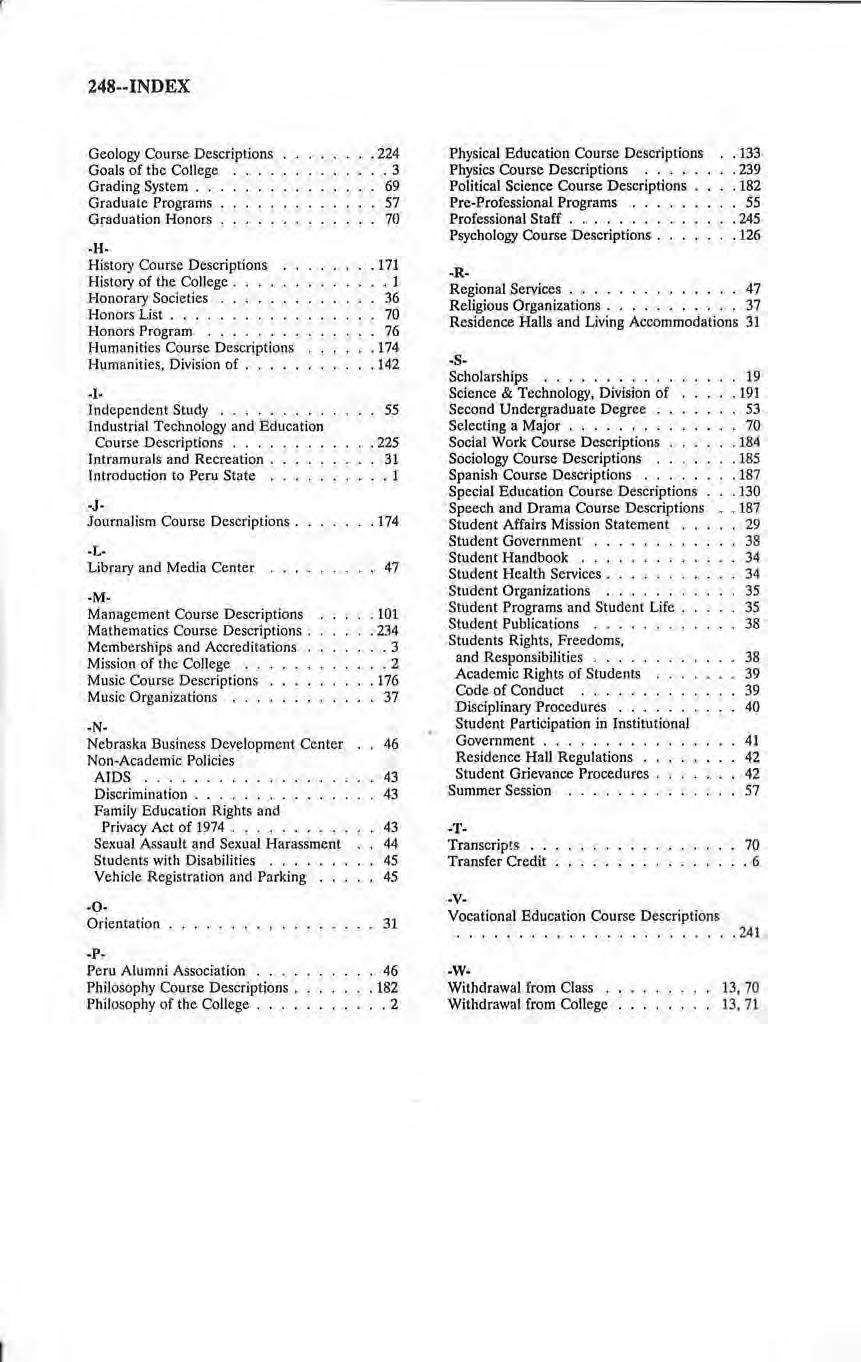
248--INDEX Geology
Goals
Grading System Graduate Programs Graduation Honors -HHistory Course Descriptions History of the College Honorary Soc1eties Honors List Honors Program Humanities Course Descriptions Humanities, Division of -1lndepcndent Study , . In dustrial Technology and Educatio n Course Descriptions , , lntramurals and Recreation Introduction to Peru State , ·J· Journa lism Course Descriptions -L· Library and Media Center -MManagement Cou rse Descrip tion s Mathematics Course Descriptions . Memberships a n d Accreditations Mission o f the College Music Cou rse Descriptions Music Organizations · N· Nebraska Business Development Center Non-Academic Policies AIDS Discrimination Family Education Rights and Privacy Act of 1974 • . . , . Sexu al Assault and Sex ual Harassment Students wfth Disabilities· Vehicle Registration a nd Pa rking .224 . 3 69 57 70 171 ' J 36 70 76 , 174 .142 55 . 225 31 .• I 174 , 47 101 234 3 2 176 37 46 43 43 43 44 45 45 -00rientation • • , 31 .p. Peru Alumni Association , Philosophy Cowse Descriptions , Philosophy of the College . . . . 46 182 ' '2 Physical Education Course Descriptions Physics Course Descriptions Polit ical Science Course Descriptions Pre-Professional Programs Professional Staff Psych o logy Course Descriptions -R· .133 239 .182 Ss 245 . 126 Regional Services . , . . , , . , . . . . , . 47 Religious Organizations 37 Residence Halls and Living Accommodations 31 .s. Sch olarships , . 19 Science & Technology, Division of 191 Second Undergraduate Degree 53 Selecting a Major , , 70 Soclal Work Course Descriptions 184 Sociology Course Descriptions 185 Spanish Course Descriptions 187 Special Educa tion Course Descriptions 130 Speech and Drama Course Descriptions • 187 Student Affairs Mission Statement 29 Student Government . . 38 Student Handbook , 34 Student Health Services 34 Student Organizations 35 Student Programs a n d Student Life 35 Student Publications . . . 38 Students Rights, Freedoms, and Responsibilities 38 Academic Rights of Students 39 Code of Con d u ct 39 Disciplinary Procedures 40 Stu dent Partic ipation in Institutional Government , 41 Residence Hall Regulations , 4.2 Student Grievance Procedures , 42 Summer Session , 57 -TTranscrip!s Transfer Credit .y. Vocati onal Education Course Descriptions -WWithdrawal from Class Withdrawal from College 70 .6 241 13, 70 13, 7l
Course Descriptions
of the College
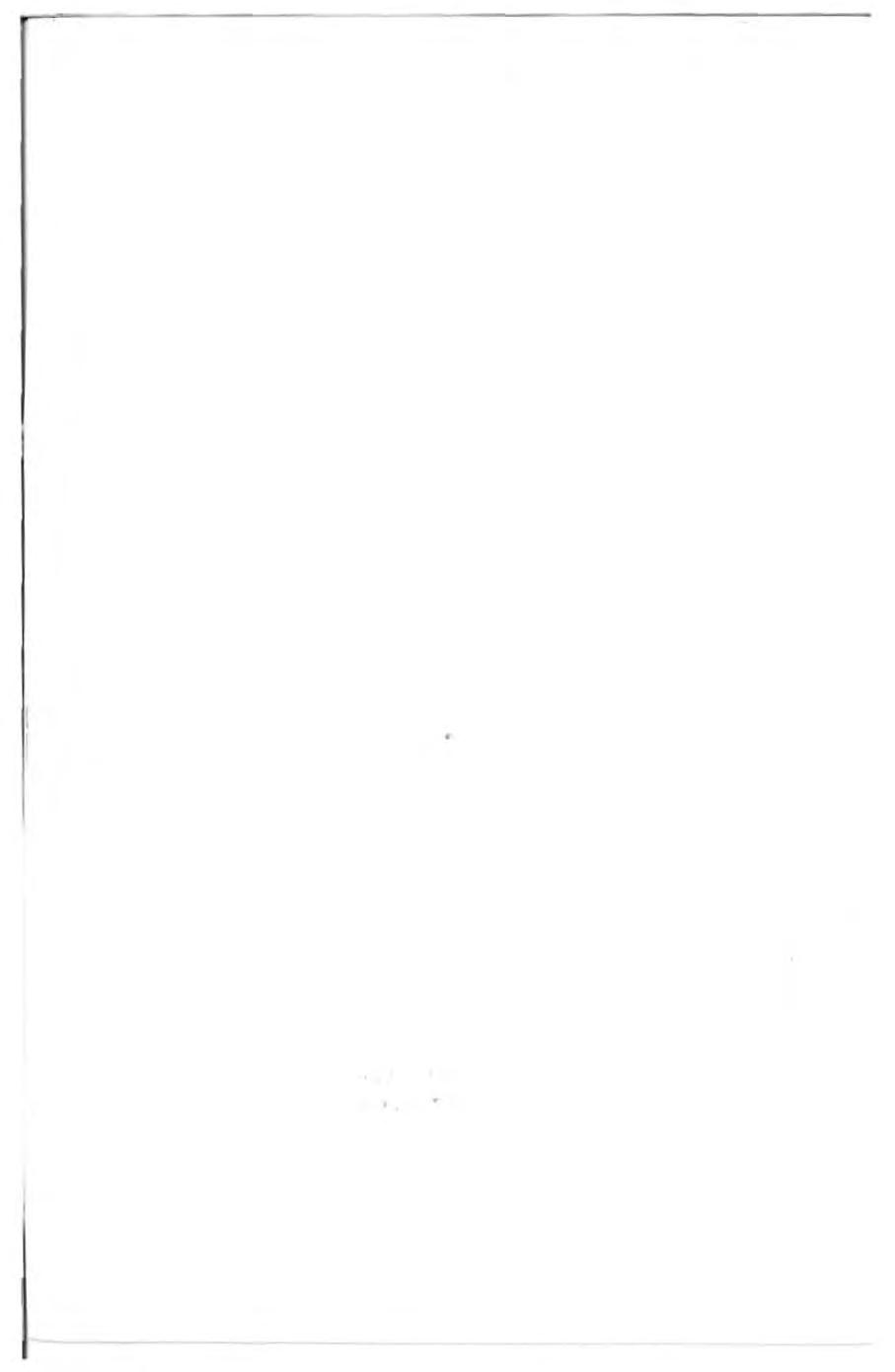
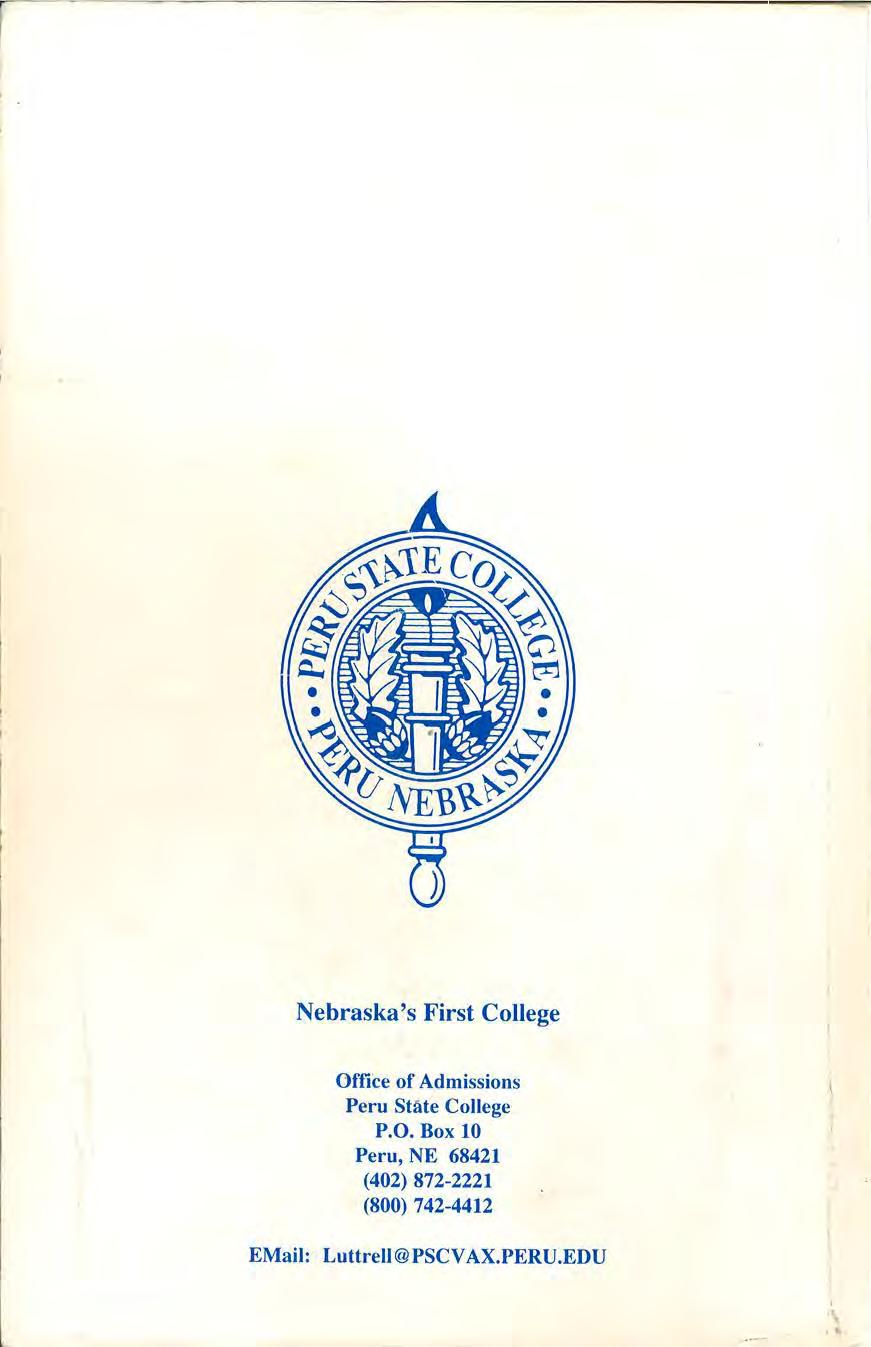
Nebraska's First College Office of Admissions Peru StMe College P.O. Box 10 Peru, NE 68421 (402) 872-2221 (800) 742-4412 EMail: Luttrell@PSCVAX.PERU.EDU \ ...


































































































































































































































































